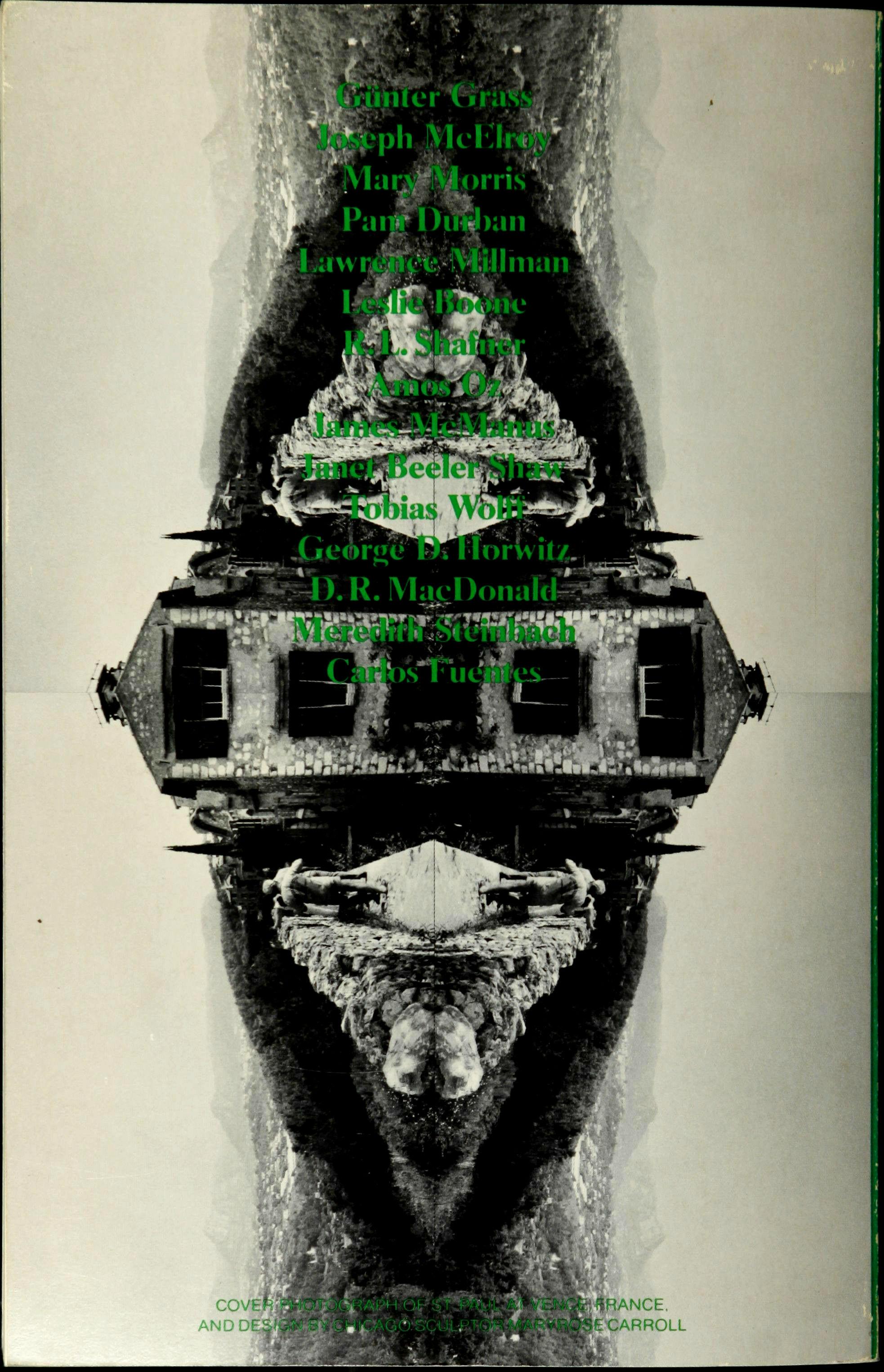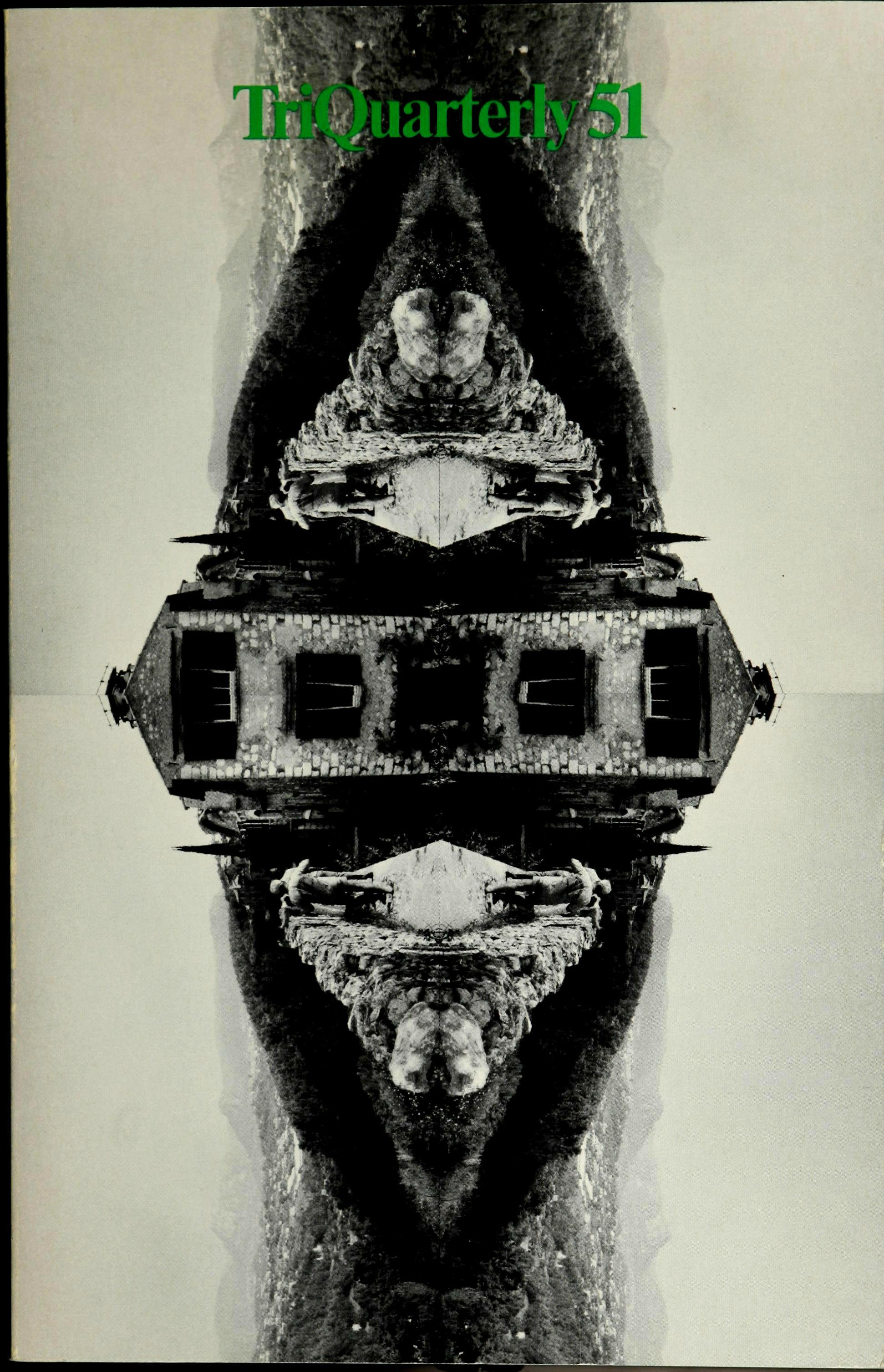






Editors:
Elliott Anderson, Jonathan Brent
Art Director: Cynthia Anderson
Managing Editor: Michael McDonnell
Associate Editor: Anne-Marie Zwierzyna
Assistant Editors:
Susan Hahn, Lisa Johnson, Judy Marrs, Fred Shafer, Mary Elinore Smith
Advisory Editors: Lawrence Levy, Charles Newman
Advertising Consultant: Sandy Moltz
Fulfillment: Denise Smith
Contributing Editors:
Robert Alter, Michael Anania, Gerald Graff, John Hawkes, David Hayman, Bill Henderson, Ian MacMillan, Joseph McElroy, Peter Michelson, Robert Onopa, Robert Ray, Tony Tanner, Nathaniel Tam
TriQu&rterly is an international journal of art, writing. and cultural inquiry published in the fall, winter, and spring at Northwestern University, Evanston, UJinois 60201. ISSN: 0041-3097.
Subscription rates: One year $14.00; two years $25.00; three years $35.00. Foreign subscriptions $1.00 per year additional. Single copies usually $5.95. Back issue prices on request. Contributions, correspondence, and subscriptions should be addressed to TriQuarterly, 1735 Benson Avenue, Northwestern University, Evanston, Illinois 60201. The editors invite submissions, but queries are strongly suggested. No manuscripts will be returned unless accompanied by a stamped, self-addressed envelope. All manuscripts accepted for publication become the property of TriQgarterly, unless otherwise indicated. Copyright ©1981 by TriQuarterly. All rights reserved. The views expressed in this magazine are to be attributed to the writers, not the editors or sponsors. Printed in the United States of America. Claims for missing numbers will be honored only within the four-month period after month of issue.
This publication is made possible in part by grants from the illinois Arts Council, a state agency, and the Coordinating Council of Literary Magazines.
NAllONAL DISTRIBL:lOR TO RETAIL TRADE B. DEBOER. 113 E. CENTRE STREET-REAR. NUTLEY. NEW JERSEY 07110. DISTRIBUTOR FOR WEST COAST TRADE BOOK PEOPLE. 2940 7TH STREET. BERKELEY. CALIFORNIA 94710
MIIJWEST: BOOKSlINGER. POBOX 1651.2163 FORD PKWY, ST. PAUL MINNESOTA 55116.
REPRINTS OF BACK ISSUES OF TriQuarterly ARE NOW AVAILABLE IN FULL FORMAT FROM KRAUS REPRINT COMPANY, ROUTE 100, MILLWOOD. NEW YORK 10546, AND IN MICROFILM FROM UMI. A XEROX COMPANY, ANN ARBOR, MICHIGAN 48106
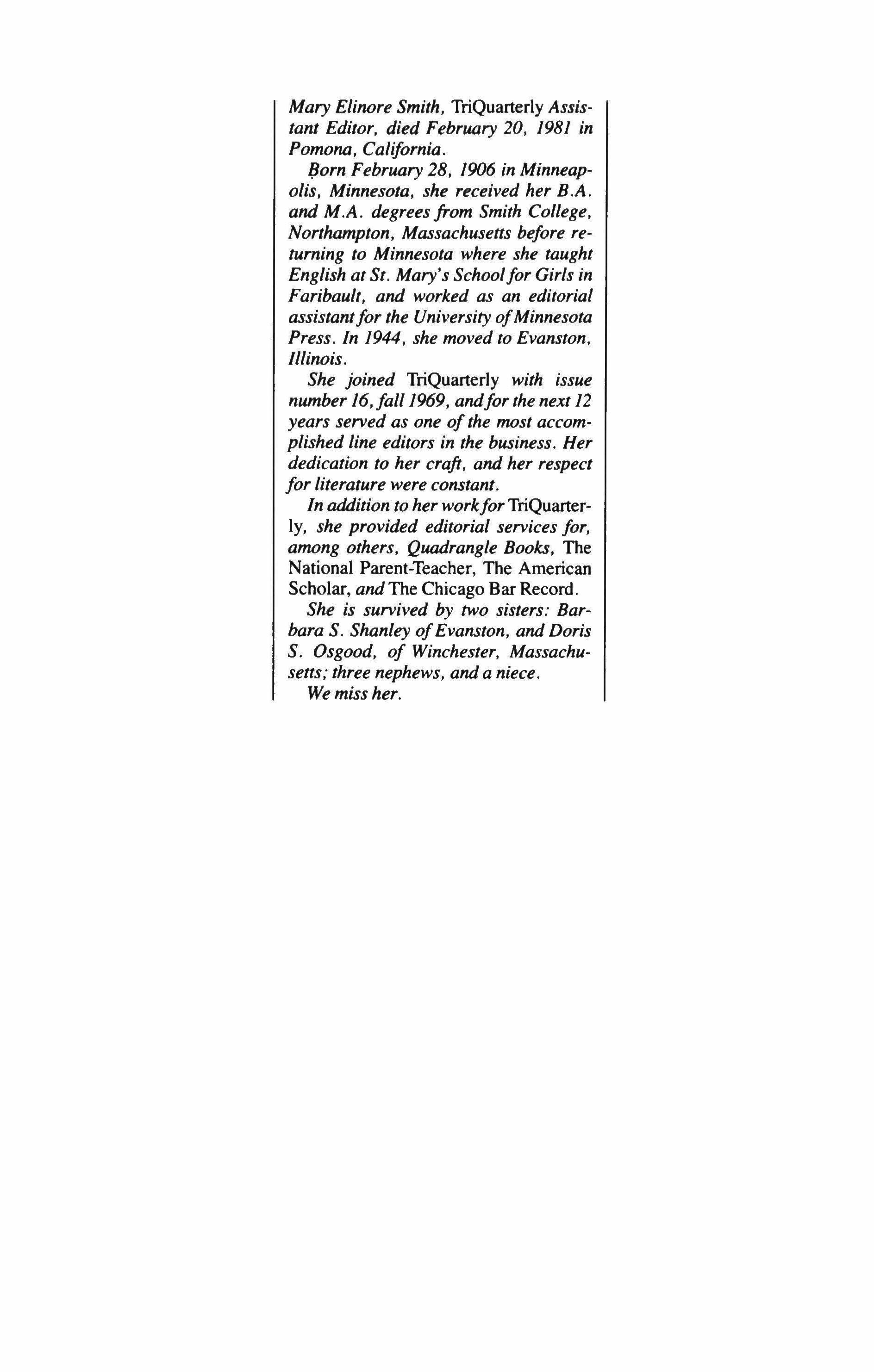
Mary Elinore Smith, TriQuarterly Assistant Editor, died February 20, 1981 in Pomona, California.
Born February 28, 1906 in Minneapolis, Minnesota, she received her B.A. and M.A. degreesfrom Smith College, Northampton, Massachusetts before returning to Minnesota where she taught English at St. Mary's Schoolfor Girls in Faribault, and worked as an editorial assistantfor the University ofMinnesota Press. In 1944, she moved to Evanston, Illinois.
She joined TriQuarteriy with issue number 16,fall 1969, andfor the next J2 years served as one of the most accomplished line editors in the business. Her dedication to her craft, and her respect for literature were constant.
In addition to her workforTriQuarterly, she provided editorial services for, among others, Quadrangle Books, The National Parent-Teacher, The American Scholar, and The Chicago Bar Record. She is survived by two sisters: Barbara S. Shanley ofEvanston, and Doris S. Osgood, of Winchester, Massachusetts; three nephews, and a niece.
We miss her.
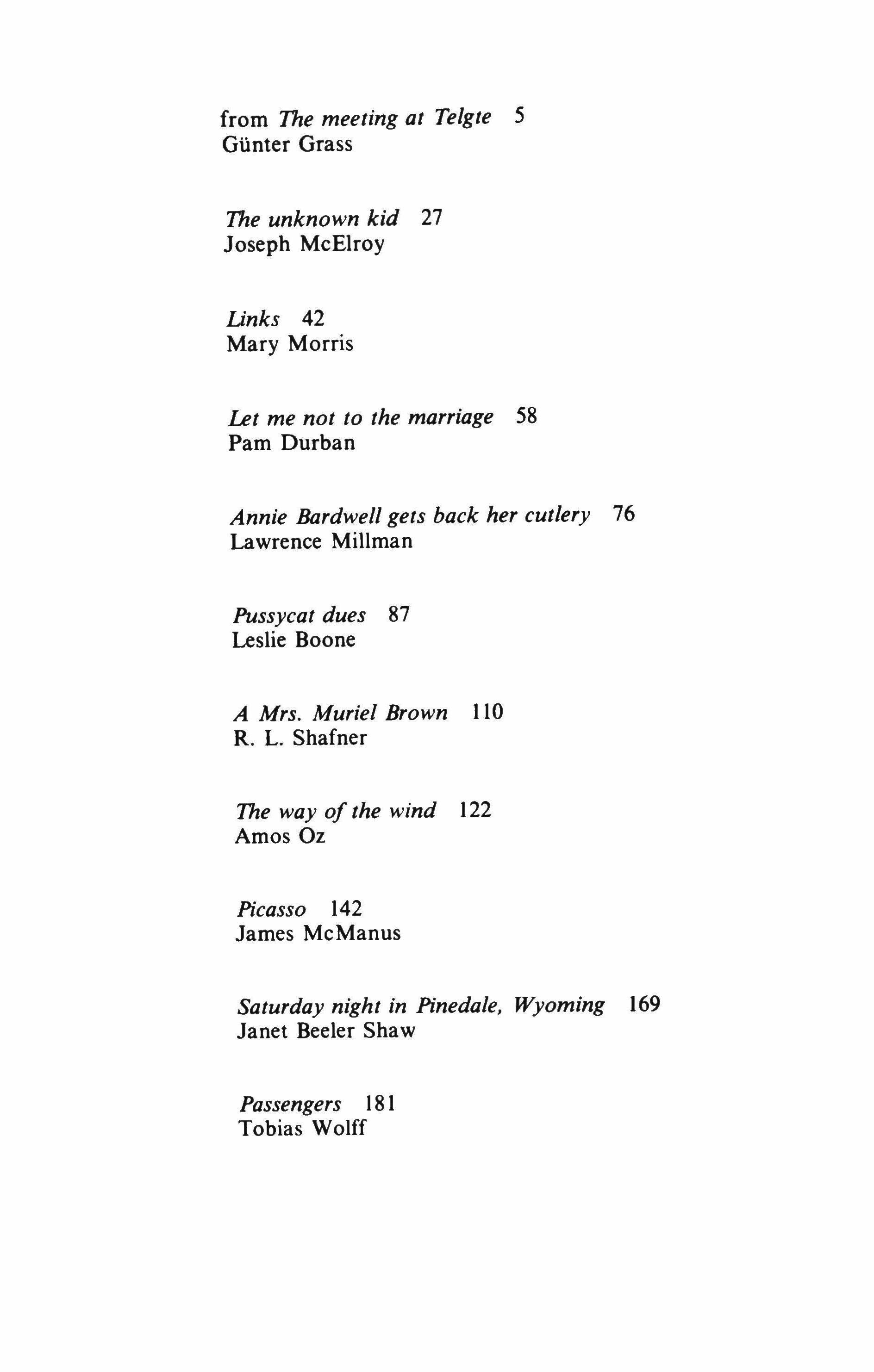
from The meeting at Telgte 5
GUnter Grass
The unknown kid 27 Joseph McElroy
links 42 Mary Morris
Let me not to the marriage 58 Pam Durban
Annie Bardwell gets back her cutlery 76 Lawrence Millman
Pussycat dues 87 Leslie Boone
A Mrs. Muriel Brown Ito R. L. Shafner
The way of the wind 122 Amos Oz
Picasso 142 James McManus
Saturday night in Pinedale, Wyoming 169 Janet Beeler Shaw
Passengers 181 Tobias Wolff

O'Dea, O'Dea 217 Meredith Steinbach
The other K 256 Carlos Fuentes
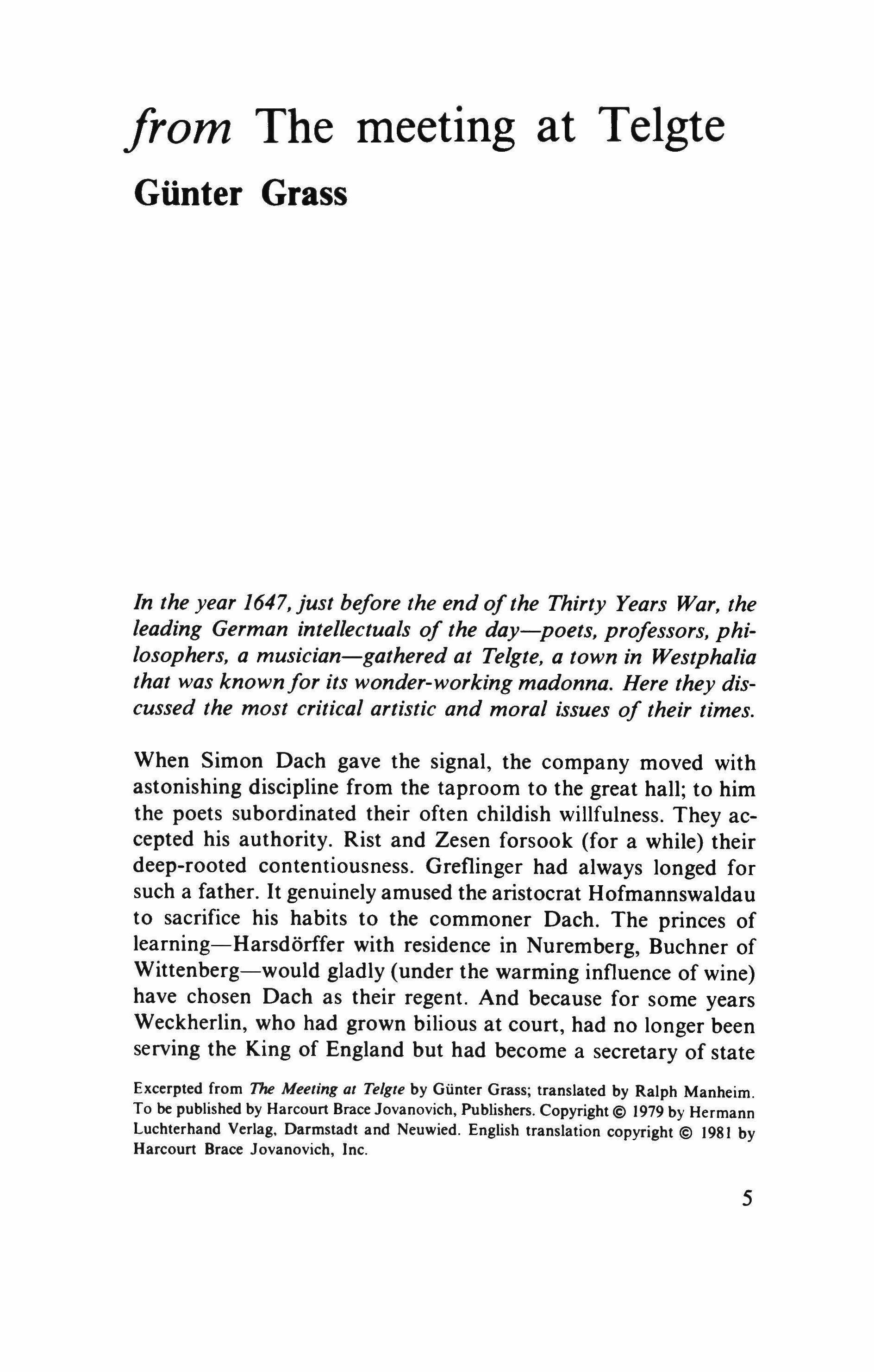
In the year 1647, just before the end of the Thirty Years War, the leading German intellectuals of the day-poets, professors, philosophers, a musician-gathered at Telgte, a town in Westphalia that was knownfor its wonder-working madonna. Here they discussed the most critical artistic and moral issues of their times.
When Simon Dach gave the signal, the company moved with astonishing discipline from the taproom to the great hall; to him the poets subordinated their often childish willfulness. They accepted his authority. Rist and Zesen forsook (for a while) their deep-rooted contentiousness. Greflinger had always longed for such a father. It genuinely amused the aristocrat Hofmannswaldau to sacrifice his habits to the commoner Dach. The princes of learning=-Harsdorffer with residence in Nuremberg, Buchner of Wittenberg-would gladly (under the warming influence of wine) have chosen Dach as their regent. And because for some years Weckherlin, who had grown bilious at court, had no longer been serving the King of England but had become a secretary of state
Excerpted from The Meeting at Telgte by Gunter Grass; translated by Ralph Manheim. To be published by Harcourt Brace Jovanovich, Publishers. Copyright © 1979 by Hermann Luchterhand Verlag, Darmstadt and Neuwied. English translation copyright © 1981 by Harcourt Brace Jovanovich, Inc.
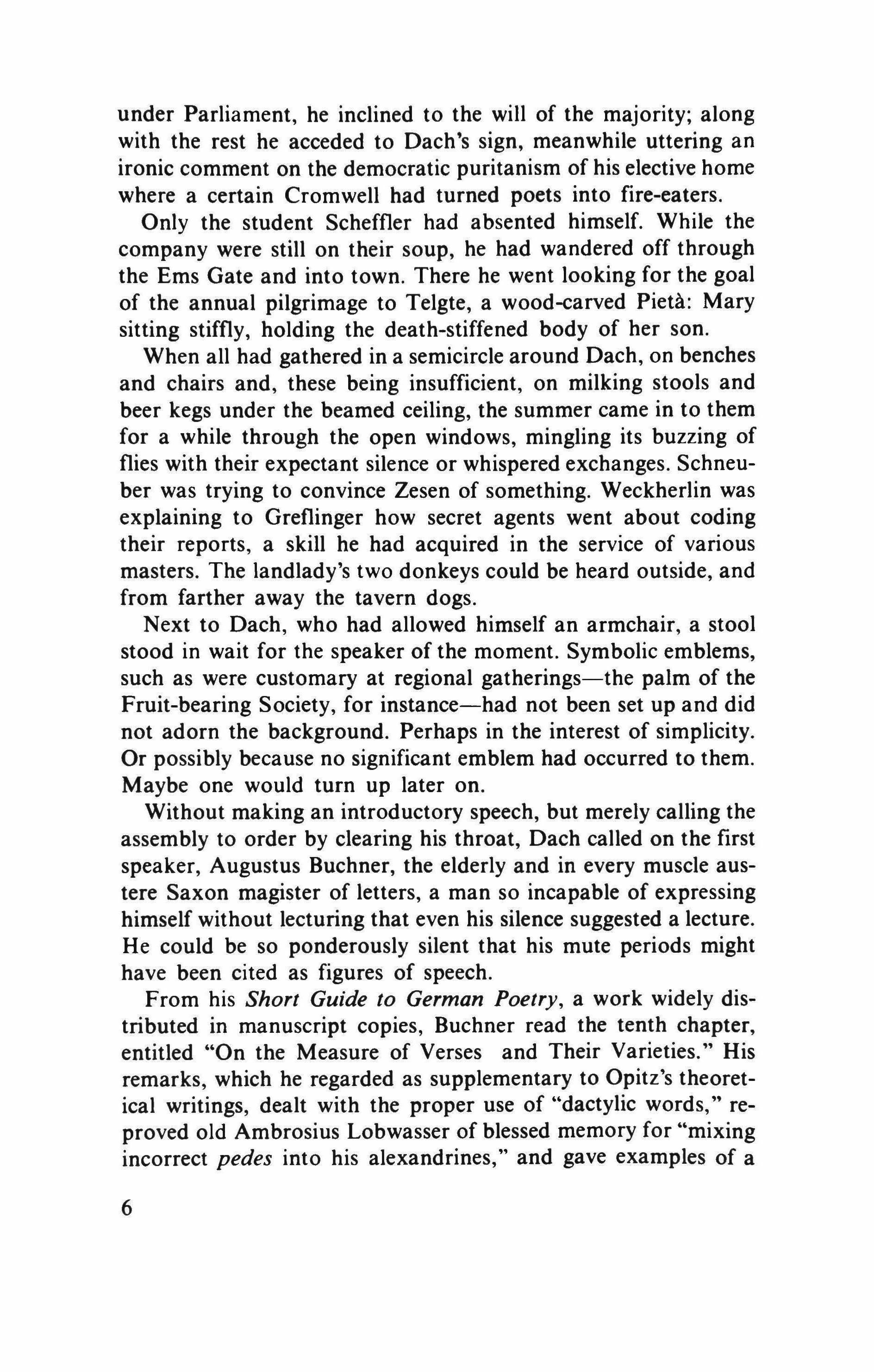
under Parliament, he inclined to the will of the majority; along with the rest he acceded to Dach's sign, meanwhile uttering an ironic comment on the democratic puritanism of his elective home where a certain Cromwell had turned poets into fire-eaters.
Only the student Scheffler had absented himself. While the company were still on their soup, he had wandered off through the Ems Gate and into town. There he went looking for the goal of the annual pilgrimage to Telgte, a wood-carved Pieta: Mary sitting stiffly, holding the death-stiffened body of her son.
When all had gathered in a semicircle around Dach, on benches and chairs and, these being insufficient, on milking stools and beer kegs under the beamed ceiling, the summer came in to them for a while through the open windows, mingling its buzzing of flies with their expectant silence or whispered exchanges. Schneuber was trying to convince Zesen of something. Weckherlin was explaining to Greflinger how secret agents went about coding their reports, a skill he had acquired in the service of various masters. The landlady's two donkeys could be heard outside, and from farther away the tavern dogs.
Next to Dach, who had allowed himself an armchair, a stool stood in wait for the speaker of the moment. Symbolic emblems, such as were customary at regional gatherings-the palm of the Fruit-bearing Society, for instance-had not been set up and did not adorn the background. Perhaps in the interest of simplicity. Or possibly because no significant emblem had occurred to them. Maybe one would turn up later on.
Without making an introductory speech, but merely calling the assembly to order by clearing his throat, Dach called on the first speaker, Augustus Buchner, the elderly and in every muscle austere Saxon magister of letters, a man so incapable of expressing himself without lecturing that even his silence suggested a lecture. He could be so ponderously silent that his mute periods might have been cited as figures of speech.
From his Short Guide to German Poetry, a work widely distributed in manuscript copies, Buchner read the tenth chapter, entitled "On the Measure of Verses and Their Varieties." His remarks, which he regarded as supplementary to Opitz's theoretical writings, dealt with the proper use of "dactylic words," reproved old Ambrosius Lobwasser of blessed memory for "mixing incorrect pedes into his alexandrines," and gave examples of a
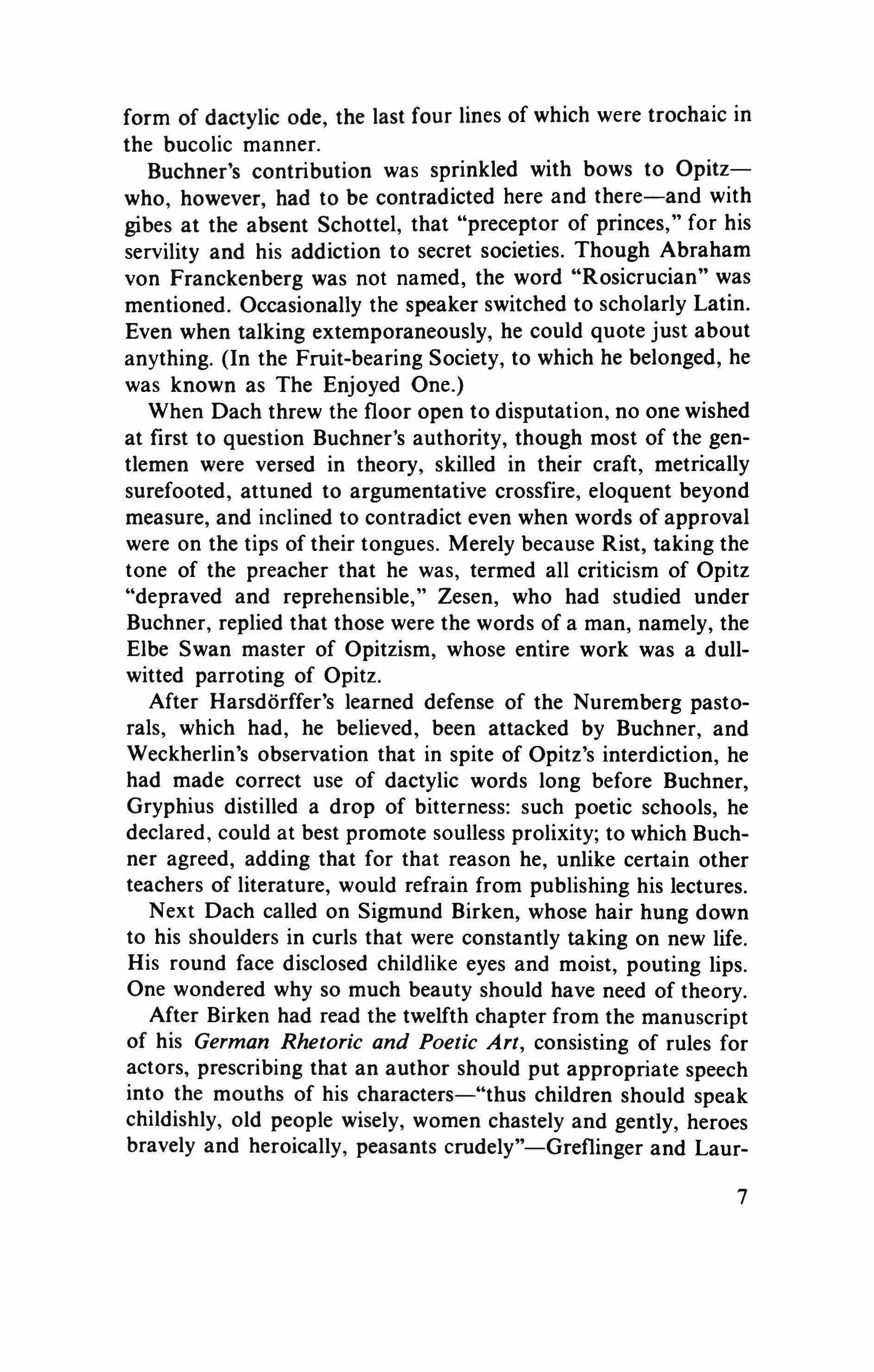
form of dactylic ode, the last four lines of which were trochaic in the bucolic manner.
Buchner's contribution was sprinkled with bows to Opitzwho, however, had to be contradicted here and there-and with gibes at the absent Schottel, that "preceptor of princes," for his servility and his addiction to secret societies. Though Abraham von Franckenberg was not named, the word "Rosicrucian" was mentioned. Occasionally the speaker switched to scholarly Latin. Even when talking extemporaneously, he could quote just about anything. (In the Fruit-bearing Society, to which he belonged, he was known as The
When Dach threw the floor open to disputation, no one wished at first to question Buchner's authority, though most of the gentlemen were versed in theory, skilled in their craft, metrically surefooted, attuned to argumentative crossfire, eloquent beyond measure, and inclined to contradict even when words of approval were on the tips of their tongues. Merely because Rist, taking the tone of the preacher that he was, termed all criticism of Opitz "depraved and reprehensible," Zesen, who had studied under Buchner, replied that those were the words of a man, namely, the Elbe Swan master of Opitzism, whose entire work was a dullwitted parroting of Opitz.
After Harsdorffer's learned defense of the Nuremberg pastorals, which had, he believed, been attacked by Buchner, and Weckherlin's observation that in spite of Opitz's interdiction, he had made correct use of dactylic words long before Buchner, Gryphius distilled a drop of bitterness: such poetic schools, he declared, could at best promote soulless prolixity; to which Buchner agreed, adding that for that reason he, unlike certain other teachers of literature, would refrain from publishing his lectures.
Next Dach called on Sigmund Birken, whose hair hung down to his shoulders in curls that were constantly taking on new life. His round face disclosed childlike eyes and moist, pouting lips. One wondered why so much beauty should have need of theory.
After Birken had read the twelfth chapter from the manuscript of his German Rhetoric and Poetic Art, consisting of rules for actors, prescribing that an author should put appropriate speech into the mouths of his characters-"thus children should speak childishly, old people wisely, women chastely and gently, heroes bravely and heroically, peasants crudely"-Greflinger and Laur-
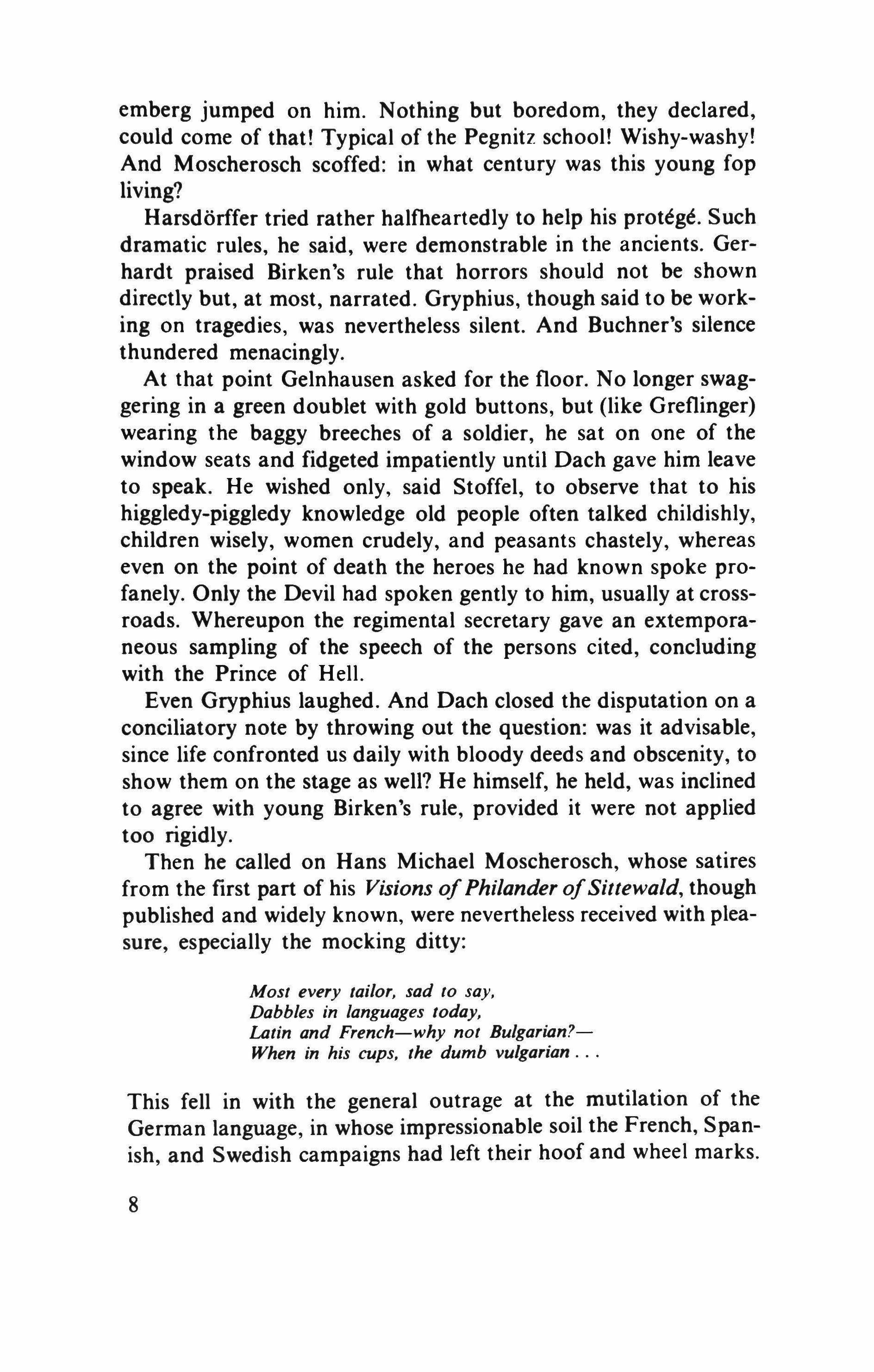
ernberg jumped on him. Nothing but boredom, they declared, could come of that! Typical of the Pegnitz school! Wishy-washy! And Moscherosch scoffed: in what century was this young fop living?
Harsdorffer tried rather halfheartedly to help his protege. Such dramatic rules, he said, were demonstrable in the ancients. Gerhardt praised Birken's rule that horrors should not be shown directly but, at most, narrated. Gryphius, though said to be working on tragedies, was nevertheless silent. And Buchner's silence thundered menacingly.
At that point Gelnhausen asked for the floor. No longer swaggering in a green doublet with gold buttons, but (like Greflinger) wearing the baggy breeches of a soldier, he sat on one of the window seats and fidgeted impatiently until Dach gave him leave to speak. He wished only, said Stoffel, to observe that to his higgledy-piggledy knowledge old people often talked childishly, children wisely, women crudely, and peasants chastely, whereas even on the point of death the heroes he had known spoke profanely. Only the Devil had spoken gently to him, usually at crossroads. Whereupon the regimental secretary gave an extemporaneous sampling of the speech of the persons cited, concluding with the Prince of Hell.
Even Gryphius laughed. And Dach closed the disputation on a conciliatory note by throwing out the question: was it advisable, since life confronted us daily with bloody deeds and obscenity, to show them on the stage as well? He himself, he held, was inclined to agree with young Birken's rule, provided it were not applied too rigidly.
Then he called on Hans Michael Moscherosch, whose satires from the first part of his Visions ofPhilander ofSittewald, though published and widely known, were nevertheless received with pleasure, especially the mocking ditty:
Most every tailor, sad to say, Dabbles in languages today, Latin and French-why not Bulgarian?When in his cups, the dumb vulgarian
This fell in with the general outrage at the mutilation of the German language, in whose impressionable soil the French, Spanish, and Swedish campaigns had left their hoof and wheel marks. 8
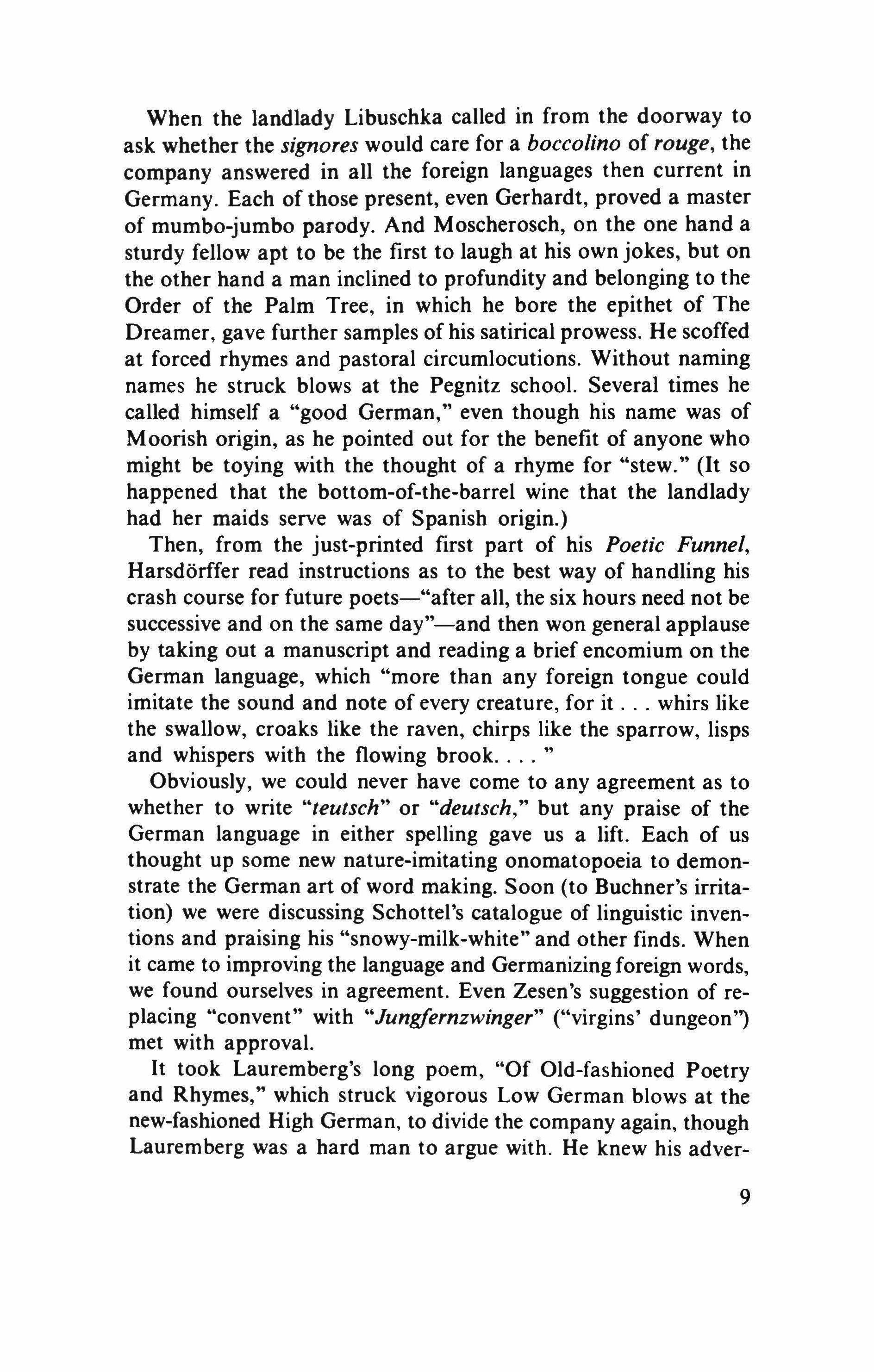
When the landlady Libuschka called in from the doorway to ask whether the signores would care for a boccolino of rouge, the company answered in all the foreign languages then current in Germany. Each of those present, even Gerhardt, proved a master of mumbo-jumbo parody. And Moscherosch, on the one hand a sturdy fellow apt to be the first to laugh at his own jokes, but on the other hand a man inclined to profundity and belonging to the Order of the Palm Tree, in which he bore the epithet of The Dreamer, gave further samples of his satirical prowess. He scoffed at forced rhymes and pastoral circumlocutions. Without naming names he struck blows at the Pegnitz school. Several times he called himself a "good German," even though his name was of Moorish origin, as he pointed out for the benefit of anyone who might be toying with the thought of a rhyme for "stew." (It so happened that the bottom-of-the-barrel wine that the landlady had her maids serve was of Spanish origin.)
Then, from the just-printed first part of his Poetic Funnel, Harsdorffer read instructions as to the best way of handling his crash course for future poets-"after all, the six hours need not be successive and on the same day"-and then won general applause by taking out a manuscript and reading a brief encomium on the German language, which "more than any foreign tongue could imitate the sound and note of every creature, for it whirs like the swallow, croaks like the raven, chirps like the sparrow, lisps and whispers with the flowing brook
Obviously, we could never have come to any agreement as to whether to write "teutsch" or "deutsch," but any praise of the German language in either spelling gave us a lift. Each of us thought up some new nature-imitating onomatopoeia to demonstrate the German art of word making. Soon (to Buchner's irritation) we were discussing Schottel's catalogue of linguistic inventions and praising his "snowy-milk-white" and other finds. When it came to improving the language and Germanizing foreign words, we found ourselves in agreement. Even Zesen's suggestion of replacing "convent" with "Jungfernzwinger" ("virgins' dungeon'') met with approval.
It took Lauremberg's long poem, "Of Old-fashioned Poetry and Rhymes," which struck vigorous Low German blows at the new-fashioned High German, to divide the company again, though Lauremberg was a hard man to argue with. He knew his adver-
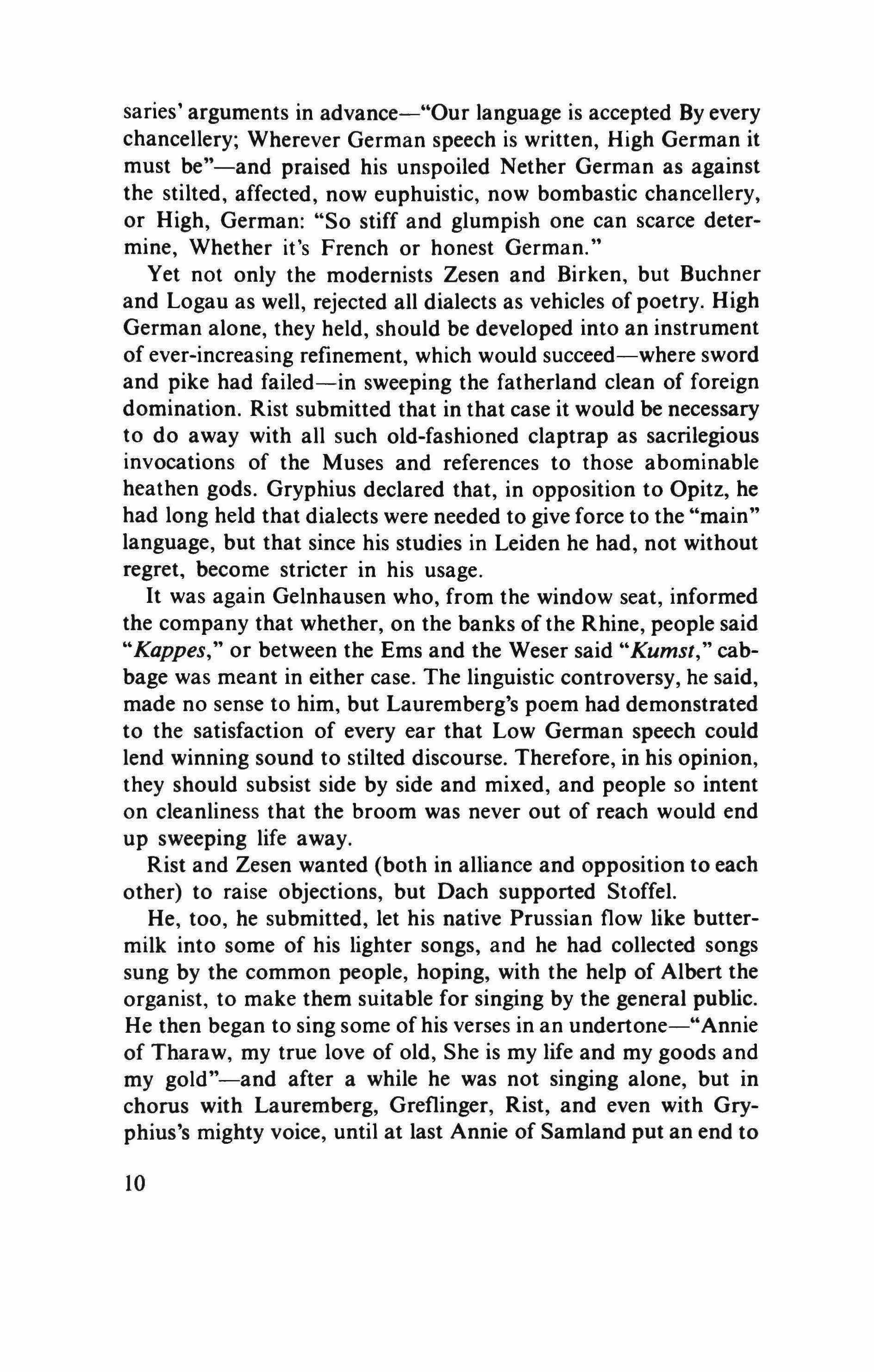
saries' arguments in advance-"Our language is accepted By every chancellery; Wherever German speech is written, High German it must be"-and praised his unspoiled Nether German as against the stilted, affected, now euphuistic, now bombastic chancellery, or High, German: "So stiff and glumpish one can scarce determine, Whether it's French or honest German."
Yet not only the modernists Zesen and Birken, but Buchner and Logau as well, rejected all dialects as vehicles of poetry. High German alone, they held, should be developed into an instrument of ever-increasing refinement, which would succeed-where sword and pike had failed-in sweeping the fatherland clean of foreign domination. Rist submitted that in that case it would be necessary to do away with all such old-fashioned claptrap as sacrilegious invocations of the Muses and references to those abominable heathen gods. Gryphius declared that, in opposition to Opitz, he had long held that dialects were needed to give force to the "main" language, but that since his studies in Leiden he had, not without regret, become stricter in his usage.
It was again Gelnhausen who, from the window seat, informed the company that whether, on the banks of the Rhine, people said "Kappes," or between the Ems and the Weser said "Kumst," cabbage was meant in either case. The linguistic controversy, he said, made no sense to him, but Lauremberg's poem had demonstrated to the satisfaction of every ear that Low German speech could lend winning sound to stilted discourse. Therefore, in his opinion, they should subsist side by side and mixed, and people so intent on cleanliness that the broom was never out of reach would end up sweeping life away.
Rist and Zesen wanted (both in alliance and opposition to each other) to raise objections, but Oach supported Stoffel.
He, too, he submitted, let his native Prussian flow like buttermilk into some of his lighter songs, and he had collected songs sung by the common people, hoping, with the help of Albert the organist, to make them suitable for singing by the general public. He then began to sing some of his verses in an undertone-"Annie of Tharaw, my true love of old, She is my life and my goods and my gold"-and after a while he was not singing alone, but in chorus with Lauremberg, Greflinger, Rist, and even with Gryphius's mighty voice, until at last Annie of Samland put an end to
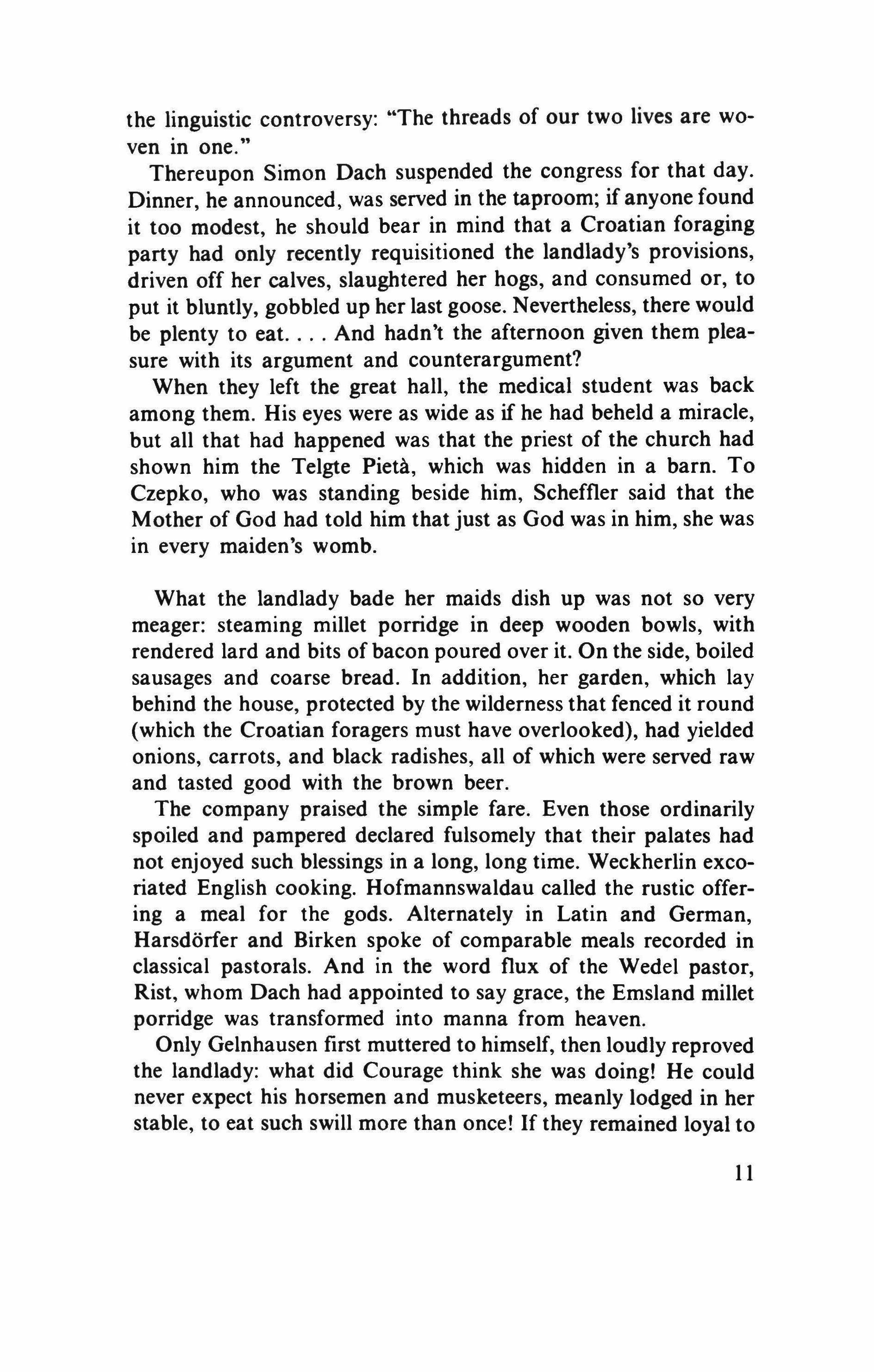
the linguistic controversy: "The threads of our two lives are woven in one."
Thereupon Simon Dach suspended the congress for that day. Dinner, he announced, was served in the taproom; if anyone found it too modest, he should bear in mind that a Croatian foraging party had only recently requisitioned the landlady's provisions, driven off her calves, slaughtered her hogs, and consumed or, to put it bluntly, gobbled up her last goose. Nevertheless, there would be plenty to eat And hadn't the afternoon given them pleasure with its argument and counterargument?
When they left the great hall, the medical student was back among them. His eyes were as wide as if he had beheld a miracle, but all that had happened was that the priest of the church had shown him the Telgte Pieta, which was hidden in a barn. To Czepko, who was standing beside him, Scheffler said that the Mother of God had told him that just as God was in him, she was in every maiden's womb.
What the landlady bade her maids dish up was not so very meager: steaming millet porridge in deep wooden bowls, with rendered lard and bits of bacon poured over it. On the side, boiled sausages and coarse bread. In addition, her garden, which lay behind the house, protected by the wilderness that fenced it round (which the Croatian foragers must have overlooked), had yielded onions, carrots, and black radishes, all of which were served raw and tasted good with the brown beer.
The company praised the simple fare. Even those ordinarily spoiled and pampered declared fulsomely that their palates had not enjoyed such blessings in a long, long time. Weckherlin excoriated English cooking. Hofmannswaldau called the rustic offering a meal for the gods. Alternately in Latin and German, Harsdorfer and Birken spoke of comparable meals recorded in classical pastorals. And in the word flux of the Wedel pastor, Rist, whom Dach had appointed to say grace, the Emsland millet porridge was transformed into manna from heaven.
Only Gelnhausen first muttered to himself, then loudly reproved the landlady: what did Courage think she was doing! He could never expect his horsemen and musketeers, meanly lodged in her stable, to eat such swill more than once! If they remained loyal to 11
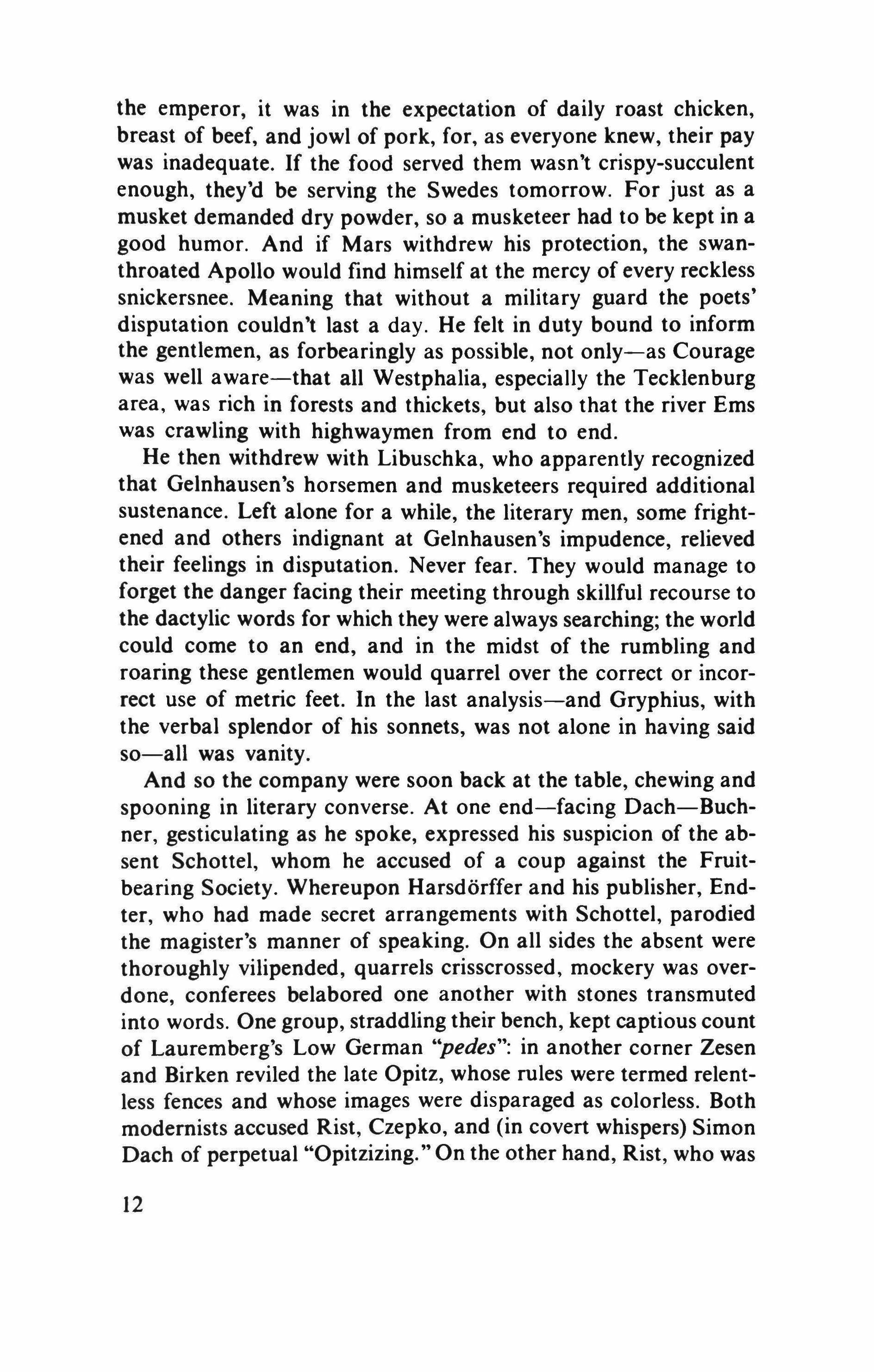
the emperor, it was in the expectation of daily roast chicken, breast of beef, and jowl of pork, for, as everyone knew, their pay was inadequate. If the food served them wasn't crispy-succulent enough, they'd be serving the Swedes tomorrow. For just as a musket demanded dry powder, so a musketeer had to be kept in a good humor. And if Mars withdrew his protection, the swanthroated Apollo would find himself at the mercy of every reckless snickersnee. Meaning that without a military guard the poets' disputation couldn't last a day. He felt in duty bound to inform the gentlemen, as forbearingly as possible, not only-as Courage was well aware-that all Westphalia, especially the Tecklenburg area, was rich in forests and thickets, but also that the river Ems was crawling with highwaymen from end to end.
He then withdrew with Libuschka, who apparently recognized that Gelnhausen's horsemen and musketeers required additional sustenance. Left alone for a while, the literary men, some frightened and others indignant at Gelnhausen's impudence, relieved their feelings in disputation. Never fear. They would manage to forget the danger facing their meeting through skillful recourse to the dactylic words for which they were always searching; the world could come to an end, and in the midst of the rumbling and roaring these gentlemen would quarrel over the correct or incorrect use of metric feet. In the last analysis-and Gryphius, with the verbal splendor of his sonnets, was not alone in having said so-all was vanity.
And so the company were soon back at the table, chewing and spooning in literary converse. At one end-facing Dach-Buchner, gesticulating as he spoke, expressed his suspicion of the absent Schottel, whom he accused of a coup against the Fruitbearing Society. Whereupon Harsdorffer and his publisher, Endter, who had made secret arrangements with Schottel, parodied the magister's manner of speaking. On all sides the absent were thoroughly vilipended, quarrels crisscrossed, mockery was overdone, conferees belabored one another with stones transmuted into words. One group, straddling their bench, kept captious count of Lauremberg's Low German "pedes": in another corner Zesen and Birken reviled the late Opitz, whose rules were termed relentless fences and whose images were disparaged as colorless. Both modernists accused Rist, Czepko, and (in covert whispers) Simon Dach of perpetual "Opitzizing." On the other hand, Rist, who was
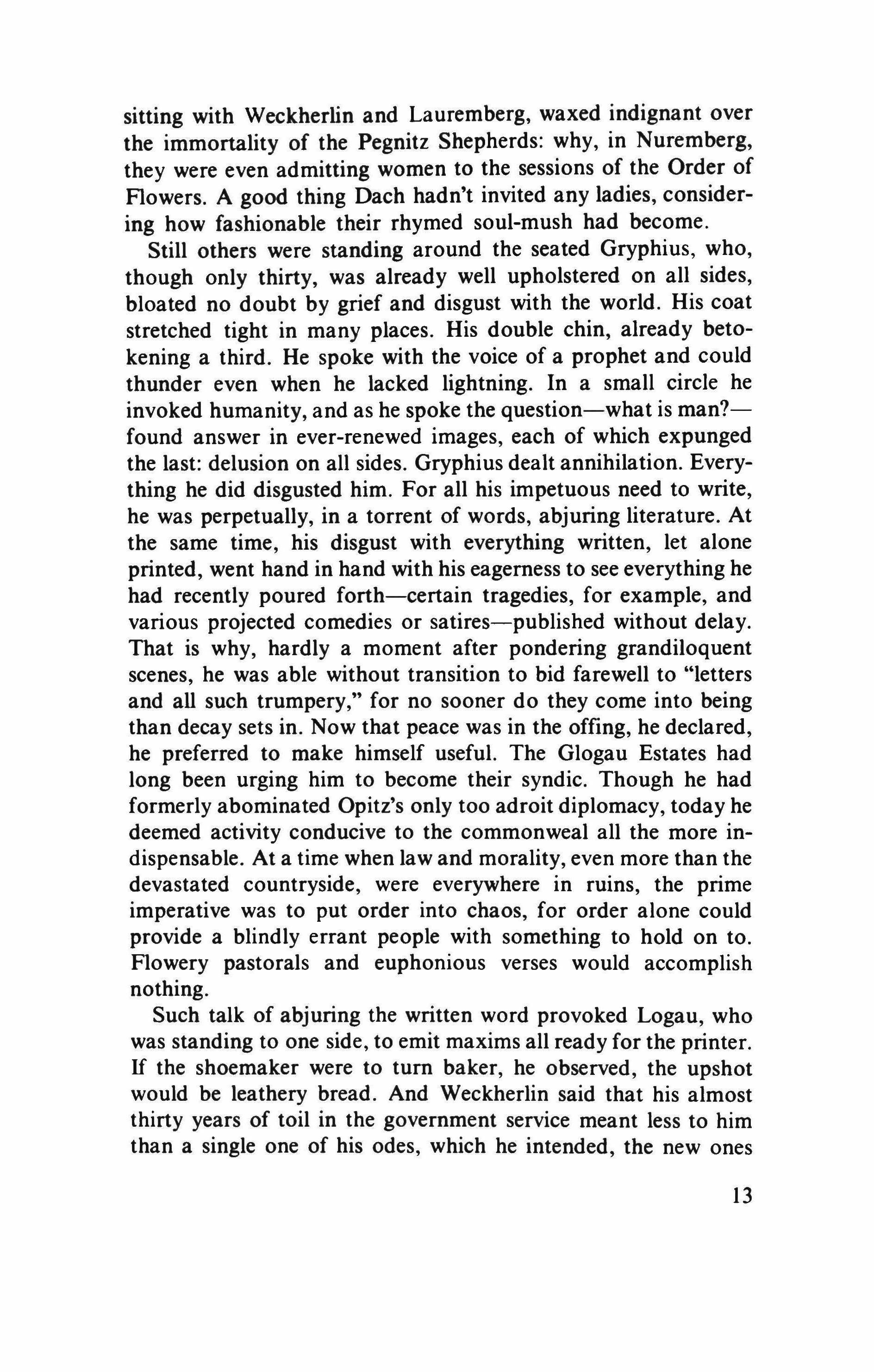
sitting with Weckherlin and Lauremberg, waxed indignant over the immortality of the Pegnitz Shepherds: why, in Nuremberg, they were even admitting women to the sessions of the Order of Flowers. A good thing Dach hadn't invited any ladies, considering how fashionable their rhymed soul-mush had become. Still others were standing around the seated Gryphius, who, though only thirty, was already well upholstered on all sides, bloated no doubt by grief and disgust with the world. His coat stretched tight in many places. His double chin, already betokening a third. He spoke with the voice of a prophet and could thunder even when he lacked lightning. In a small circle he invoked humanity, and as he spoke the question-what is man?found answer in ever-renewed images, each of which expunged the last: delusion on all sides. Gryphius dealt annihilation. Everything he did disgusted him. For all his impetuous need to write, he was perpetually, in a torrent of words, abjuring literature. At the same time, his disgust with everything written, let alone printed, went hand in hand with his eagerness to see everything he had recently poured forth-certain tragedies, for example, and various projected comedies or satires-published without delay. That is why, hardly a moment after pondering grandiloquent scenes, he was able without transition to bid farewell to "letters and all such trumpery," for no sooner do they come into being than decay sets in. Now that peace was in the offing, he declared, he preferred to make himself useful. The Glogau Estates had long been urging him to become their syndic. Though he had formerly abominated Opitz's only too adroit diplomacy, today he deemed activity conducive to the commonweal all the more indispensable. At a time when law and morality, even more than the devastated countryside, were everywhere in ruins, the prime imperative was to put order into chaos, for order alone could provide a blindly errant people with something to hold on to. Flowery pastorals and euphonious verses would accomplish nothing.
Such talk of abjuring the written word provoked Logau, who was standing to one side, to emit maxims all ready for the printer. If the shoemaker were to tum baker, he observed, the upshot would be leathery bread. And Weckherlin said that his almost thirty years of toil in the government service meant less to him than a single one of his odes, which he intended, the new ones

along with those that were feeble with age, to send to the printer's soon.
And undeterred by Gryphius, who continued in ever-new images to proclaim the death of literature and the order-fostering rule of reason, the publishers, who had hitherto maintained a certain reserve, now went weaseling around the room in quest of promising manuscripts. Weckherlin's new book had already been placed in Amsterdam. Moscherosch lent ear to the advances of Naumann, the Hamburg bookseller. After as good as closing a deal with Rist, whose works had hitherto appeared in Luneburg, for a voluminous manuscript celebrating the forthcoming peace, the publisher Endter vied with Miilbe of Strassburg and Elzevihr of Holland in trying to persuade the resourceful Hofmannswaldau to procure for them-that is, for one of the three-the manuscript of the deceased Jesuit Spee's The Nightingale's Rival, for, they said, provided it had merit, they would be willing to publish the work of a Papist. Hofmannswaldau held out hope to all three and allegedly-so Schneuber vituperated later on-accepted advances from all three. Nevertheless, The Nightingale's Rival by Friedrich von Spee was not published until 1649, and then by Friessem in Catholic Cologne.
So the evening waxed. A few of the gentlemen were moved to take the air in the landlady's garden but were soon driven back by the veils of gnats blown in from the Ems. Dach was amazed at the stubborn industry of Libuschka, who, warring with nettles and thistles, had managed to grow vegetables in the wilderness. With just such courage his friend Albert had induced his little garden to grow around the cucumber bower. Nothing remained of it. Soon there would be nothing left to praise but the thistle, that latter-day flower and symbol of adverse times.
Then they stood for a while in the courtyard or stretched their legs in the direction of the outer Ems, where stood an abandoned fulling mill. From there they were able to see that their meeting was being held on an island (Emshagen by name) separated from the town, between two arms of the river. They spoke knowingly of the damaged, towerless town wall and admired Moscherosch's tobacco pipe. They chatted with the maids, one of whom (like the late Fleming's beloved) was named Elsabe, and, while the tavern dogs cavorted around them, apostrophized the tethered mules in Latin. They made biting or comical remarks against or about one
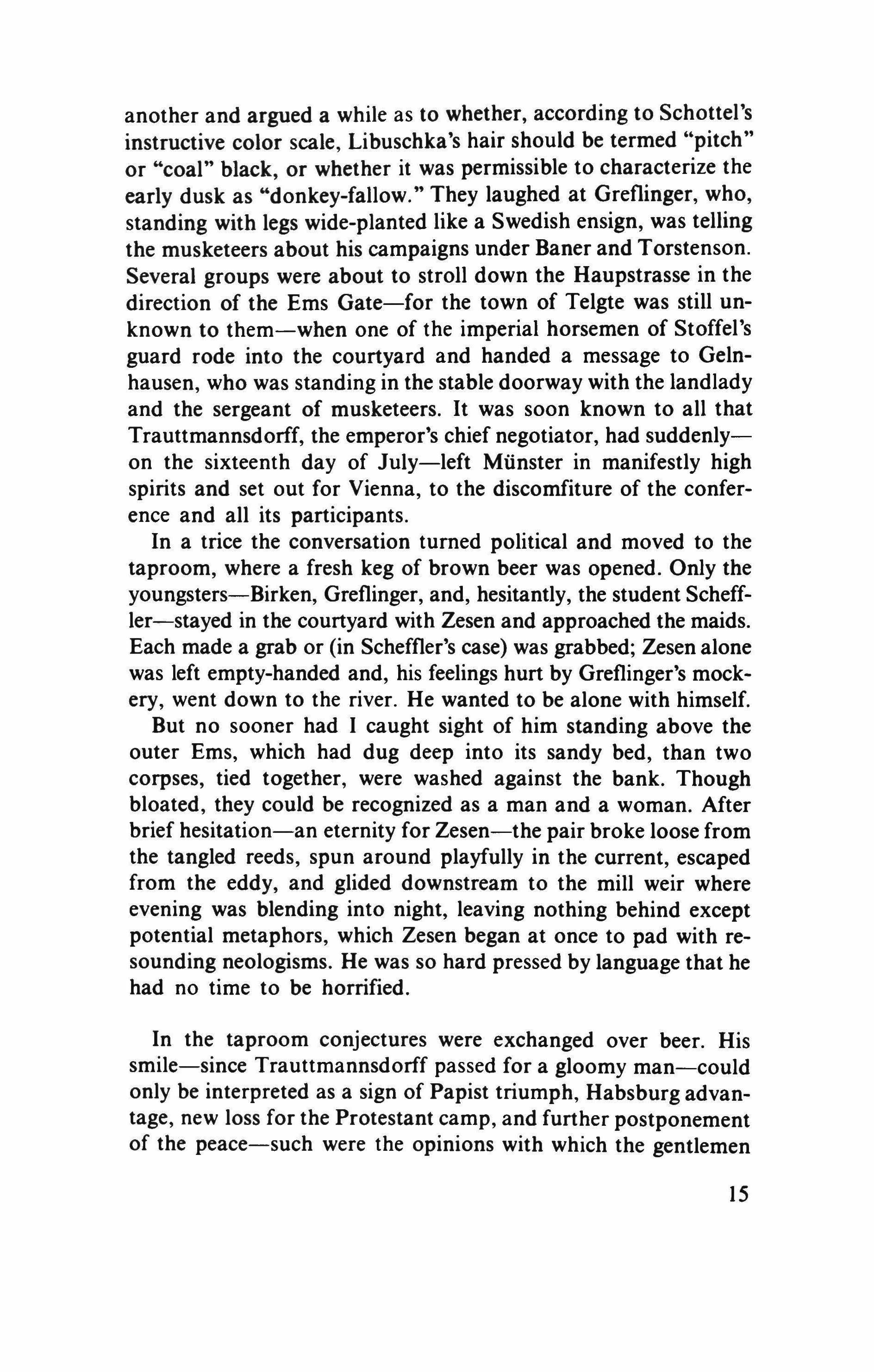
another and argued a while as to whether, according to Schottel's instructive color scale, Libuschka's hair should be termed "pitch" or "coal" black, or whether it was permissible to characterize the early dusk as "donkey-fallow." They laughed at Greflinger, who, standing with legs wide-planted like a Swedish ensign, was telling the musketeers about his campaigns under Baner and Torstenson. Several groups were about to stroll down the Haupstrasse in the direction of the Ems Gate-for the town of Telgte was still unknown to them-when one of the imperial horsemen of Stoffel's guard rode into the courtyard and handed a message to Gelnhausen, who was standing in the stable doorway with the landlady and the sergeant of musketeers. It was soon known to all that Trauttmannsdorff, the emperor's chief negotiator, had suddenlyon the sixteenth day of July-left Munster in manifestly high spirits and set out for Vienna, to the discomfiture of the conference and all its participants.
In a trice the conversation turned political and moved to the taproom, where a fresh keg of brown beer was opened. Only the youngsters-Birken, Greflinger, and, hesitantly, the student Scheffler-stayed in the courtyard with Zesen and approached the maids. Each made a grab or (in Scheffler's case) was grabbed; Zesen alone was left empty-handed and, his feelings hurt by Greflinger's mockery, went down to the river. He wanted to be alone with himself.
But no sooner had I caught sight of him standing above the outer Ems, which had dug deep into its sandy bed, than two corpses, tied together, were washed against the bank. Though bloated, they could be recognized as a man and a woman. After brief hesitation-an eternity for Zesen-the pair broke loose from the tangled reeds, spun around playfully in the current, escaped from the eddy, and glided downstream to the mill weir where evening was blending into night, leaving nothing behind except potential metaphors, which Zesen began at once to pad with resounding neologisms. He was so hard pressed by language that he had no time to be horrified.
In the taproom conjectures were exchanged over beer. His smile-since Trauttmannsdorff passed for a gloomy man-could only be interpreted as a sign of Papist triumph, Habsburg advantage, new loss for the Protestant camp, and further postponement of the peace-such were the opinions with which the gentlemen

added to one another's fears. Especially the Silesians saw themselves forsaken. Czepko had a foreboding that they would all be abandoned to the Jesuits.
They edged away from Gelnhausen, who made light of the imperial legate's sudden departure. What, he asked, was there to be surprised at, when you stopped to think that ever since Wrangel had replaced the gout-ridden Torstenson, he had done nothing but carry on private warfare to fill his pockets, preferring an invasion of Bavaria in quest of spoils to a march on Vienna through gaunt Bohemia. Nor were the French doing very well by the Protestant cause, now that-according to a street song current in Paris-Anne of Austria was darning Mazarin's socks while the cardinal was anointing her royal courage."
Exactly, cried Libuschka; she had known the score ever since she had lost her maidenhead. Seven times she had been married, mostly to imperial, but also to Hessian cavalry captains, and once almost to a Dane. And each time, whether a priest or a Lutheran minister had blessed the union, she had been used and reviled as a "courage." That's the military for you, as bad on one side as on the other. And Stoffel here, whom everybody, first in Hanau, later in Soest, and then again at the spa where they had gone to cure the love pox, had addressed as Simpel-Run, Simpel! Come here, Simpel! Hurry up, Simpel!-had no more in his codpiece than her dear departed captains.
"You shut your trap, Courage, or 111 shut it for you!" Gelnhausen shouted. Didn't she know that an account had been open since their course of medical treatment in Swabia?
·How did "courage" get to mean the female sex organ and by extension a peddler of the same? And how, for that matter, did Libuschka come to be known as Courage? Thereby hangs a tale. As a young girl Libuschka, to protect her virginity from the imperial troops who had occupied the Bohemian town of Bragoditz, where she lived, dressed as a boy, took the name of Janko, and went to work as a groom for a German cavalryman, who soon passed her on to a captain. Libuschka-Janko served the captain well, acquired the ways of a fighting man, and even took part in foraging expeditions. One day she got into a fight with another groom, who had insulted the Bohemian nation. When her antagonist tried to grab her "by the utensil which she had not," her fear of being unmasked redoubled her strength and she gave him a sound thrashing. The story came to the captain's ears. To continue in Libuschka's own words: "When he asked me why I had beaten the fellow so villainously, I replied: 'Because he grabbed at my courage, where no man's hand had ever ventured before.' You see, I wanted to express myself allusively and not with Swabian crudeness And since my virginity was on its last legs in any case, for that groom would surely have betrayed me, I bared my snow-white bosom and showed the captain my hard, alluring breasts." Grimmelshausen, Lebensbeschreibung der Erzbetriigerin und Landstorzerin Courasche.-Trans.

She'd open an account for him, all right, she replied; she'd make him pay for all the brats born in his wake in one garrison town after another.
What, he cried, was this nonsense about brats? When she, Courage, had never brought any brats into the world, but sat barren on a donkey that ate nothing but thistles. She herself was a thistle that needed to be hacked out wherever it grew. Roots and all!
Whereupon landlady Libuschka, as though Gelnhausen had actually taken a knife to her, jumped on the table among the beer mugs, stamped till the beer mugs danced, suddenly picked up her skirts, dropped her breeches, turned her arse in Stoffel's direction, and gave him a well-aimed answer.
"Hey, Gryf!" cried Moscherosch. "What do you think of that? What splendid dialogues and curtain scenes the writers of German tragedies could cull from her!"
Everyone laughed. Even from Gryphius, who a moment before had been deep in gloom, laughter erupted. Weckherlin wanted to hear "Courage's thunder" again. And after Logau had delivered himself of a maxim to the effect that a fart had deeper meaning than the sound might suggest, the company soon recovered from the dismay caused by Trauttmannsdorffs sudden departure. (Only Paul Gerhardt sought out his room in horror. For he had an intimation of the turn that the landlady's nether wind would give the gentlemen's conversation.)
Ovec their brown beer they treated one another to crude and double-meaningful anecdotes. Moscherosch had several unprinted calendars full of them in readiness. With turns of phrase that obscured more than they revealed, Hofmannswaldau related how shamelessly Opitz had carried on with several daughters of Breslau burghers, yet avoided paying alimony. Old Weckherlin drained the sink of London's iniquity, taking special pleasure in exhibiting the nakedness of the Puritan hypocrites, the new ruling class. From Schneuber the company learned the intimate secrets of aristocratic ladies who, in frequenting the Society of the Pine Tree, had not only couched their thoughts in rhyme but had also couched themselves with Rompler and his friends. Naturally Lauremberg contributed. Everyone opened his tap. Even Gryphius, inclining to pressure, served up a few tidbits brought back from his trip to Italy, for the most part anecdotes about whoring monks, which Harsdorffer tried to outdo and Hofmanns-

waldau embroidered into stories about triangles and squares: this exercise gave them occasion to display their learning, for, in introducing or winding up a tale about bumptious trollops or randy monks, they would indicate their French or Italian sources.
When the amazed Simon Dach remarked that he evidently lived in the wrong place, since he could report no such happenings from Konigsberg-Kneiphof, where the goings-on were sometimes crude but never so outrageous, his contribution was found particularly amusing. And if, prodded by Harsdorffer and others, landlady Libuschka and Gelnhausen (temporarily reconciled) had not told a few stories, he from his life as a soldier-the Battle of Wittstock-she from her days as a sutler at the camp outside Mantua, and then a few bawdy tales from their time together at the spa, the evening would have gone on merrily with storytelling and keg tapping. But when the two of them lined up the gruesome particulars of what had happened in Magdeburg when Tilly and his butchers fell on the city, the listeners were numbed; brazenly Libuschka told them how much she had gained in the looting. She boasted of baskets full of gold chains she had cut off the necks of slaughtered women. In the end Gelnhausen poked her to make her stop. Magdeburg's suffering admitted of no reaction but silence.
Speaking into the stillness, Dach said it was late, time for sleep. Stoffel's and especially Libuschka's unvarnished report, which had thoughtlessly been asked of them, showed, said Dach, where laughter had to stop and how dearly we pay for too much laughter, with the result that they all, with their laughter in their throats, were driven to gulping. And this had happened because horror had become a commonplace even to persons of sensibility. May the Lord forgive them and favor them in His mercy.
Dach sent the company to bed like children, without even the nightcap that Lauremberg and Moscherosch tried to insist on. He wanted to hear no more laughter, however subdued. Enough wit had been squandered. Luckily, he said, the pious Gerhardt had gone early to his room. Rist-ordinarily a vigorous preacherought really to have put a stop to the verbal whoring. No, he wasn't angry with anyone; he, too, had joined in the laughter. For the present there was nothing more to be said. But tomorrow, when manuscripts would again be read for the benefit of all, he hoped, as anyone who knew him would testify, to be of good cheer with the rest of them.

When all was still in the house-except for the landlady, who was putting her kitchen in order and most likely had Gelnhausen with her-Simon Dach passed once again through the corridors and looked in at the attic, where the youngsters were bedded on straw. There they lay, and the maids with them. Birken lay held in arms like a child. How deeply they had exhausted themselves. Only Greflinger started up and wanted to explain. But Dach motioned him with his fingers to stay quiet and under his blanket. Let them enjoy themselves. If anyone had sinned, it was not here in the straw, but in the taproom. (And I had joined in the laughter, I had let stories occur to me, I had started the trouble, and-once it was started-I had willingly sat in the seat of the scornful.) After casting a last look, Dach was glad to see that the bashful Scheffler had ended up with one of the maids.
When at last he started back to his room-possibly to write a letter-he heard horses, wagon wheels, the dogs, and then voices in the courtyard. That must be my Albert, Dach hoped.
He did not come alone. The Konigsberg cathedral organist, who had made a name for himself well beyond the borders of Prussia as a composer and a publisher and was known in particular for the successive volumes of his "arias," was accompanied by his cousin Heinrich Schutz, Kapellmeister at the court of Saxony, who was on his way to Hamburg and then to Gluckstadt, where he hoped to find a long-coveted invitation to the Danish court. There was nothing more to keep him in Saxony. In his early sixties like Weckherlin, but more robust than the Swabian, who had worn himself out in government service, Schutz was a man of austere authority and stern grandeur, whom no one (except Albert, and he only in part) could fathom. His presence-far from overbearing, he seemed troubled by fear of being in the wayraised the tone of the poets' gathering but at the same time reduced the measure of its importance. A man whom no group could endure had come to their meeting.
I won't claim to be wiser than I was then-but everyone knew that, little as Schutz questioned his God and devoted as he had proved to his prince in spite of repeated Danish offers, his only true allegiance was to his own aspirations. Never, even in his incidental compositions, had he achieved the mediocrity required by Protestants for their daily use. He had provided neither his elector nor Christian of Denmark with anything more than the strictest
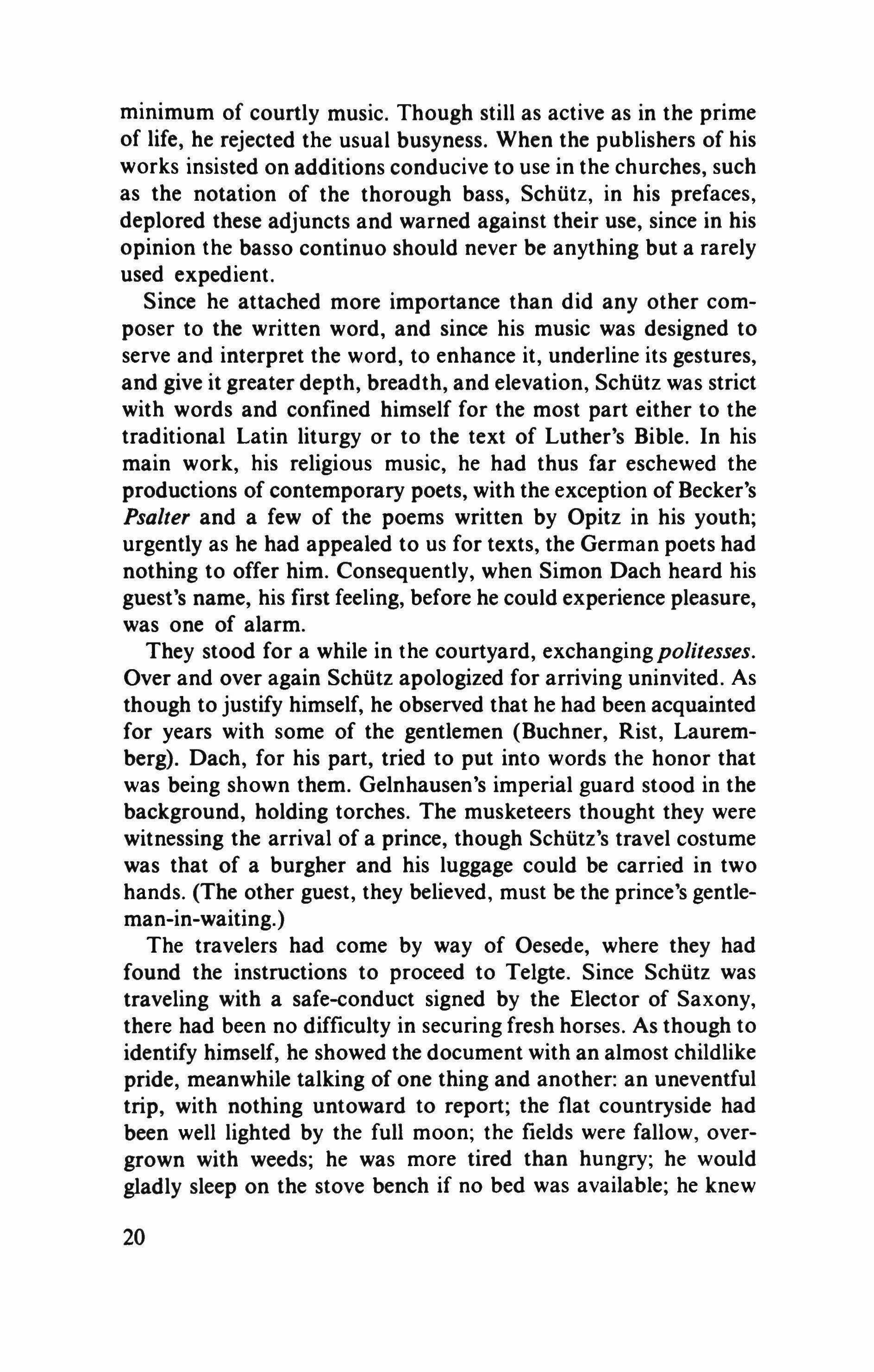
minimum of courtly music. Though still as active as in the prime of life, he rejected the usual busyness. When the publishers of his works insisted on additions conducive to use in the churches, such as the notation of the thorough bass, Schutz, in his prefaces, deplored these adjuncts and warned against their use, since in his opinion the basso continuo should never be anything but a rarely used expedient.
Since he attached more importance than did any other composer to the written word, and since his music was designed to serve and interpret the word, to enhance it, underline its gestures, and give it greater depth, breadth, and elevation, Schutz was strict with words and confined himself for the most part either to the traditional Latin liturgy or to the text of Luther's Bible. In his main work, his religious music, he had thus far eschewed the productions of contemporary poets, with the exception of Becker's Psalter and a few of the poems written by Opitz in his youth; urgently as he had appealed to us for texts, the German poets had nothing to offer him. Consequently, when Simon Dach heard his guest's name, his first feeling, before he could experience pleasure, was one of alarm.
They stood for a while in the courtyard, exchangingpolitesses. Over and over again Schutz apologized for arriving uninvited. As though to justify himself, he observed that he had been acquainted for years with some of the gentlemen (Buchner, Rist, Lauremberg). Dach, for his part, tried to put into words the honor that was being shown them. Gelnhausen's imperial guard stood in the background, holding torches. The musketeers thought they were witnessing the arrival of a prince, though Schutz's travel costume was that of a burgher and his luggage could be carried in two hands. (The other guest, they believed, must be the prince's gentleman-in-waiting.)
The travelers had come by way of Oesede, where they had found the instructions to proceed to Telgte. Since Schutz was traveling with a safe-conduct signed by the Elector of Saxony, there had been no difficulty in securing fresh horses. As though to identify himself, he showed the document with an almost childlike pride, meanwhile talking of one thing and another: an uneventful trip, with nothing untoward to report; the flat countryside had been well lighted by the full moon; the fields were fallow, overgrown with weeds; he was more tired than hungry; he would gladly sleep on the stove bench if no bed was available; he knew
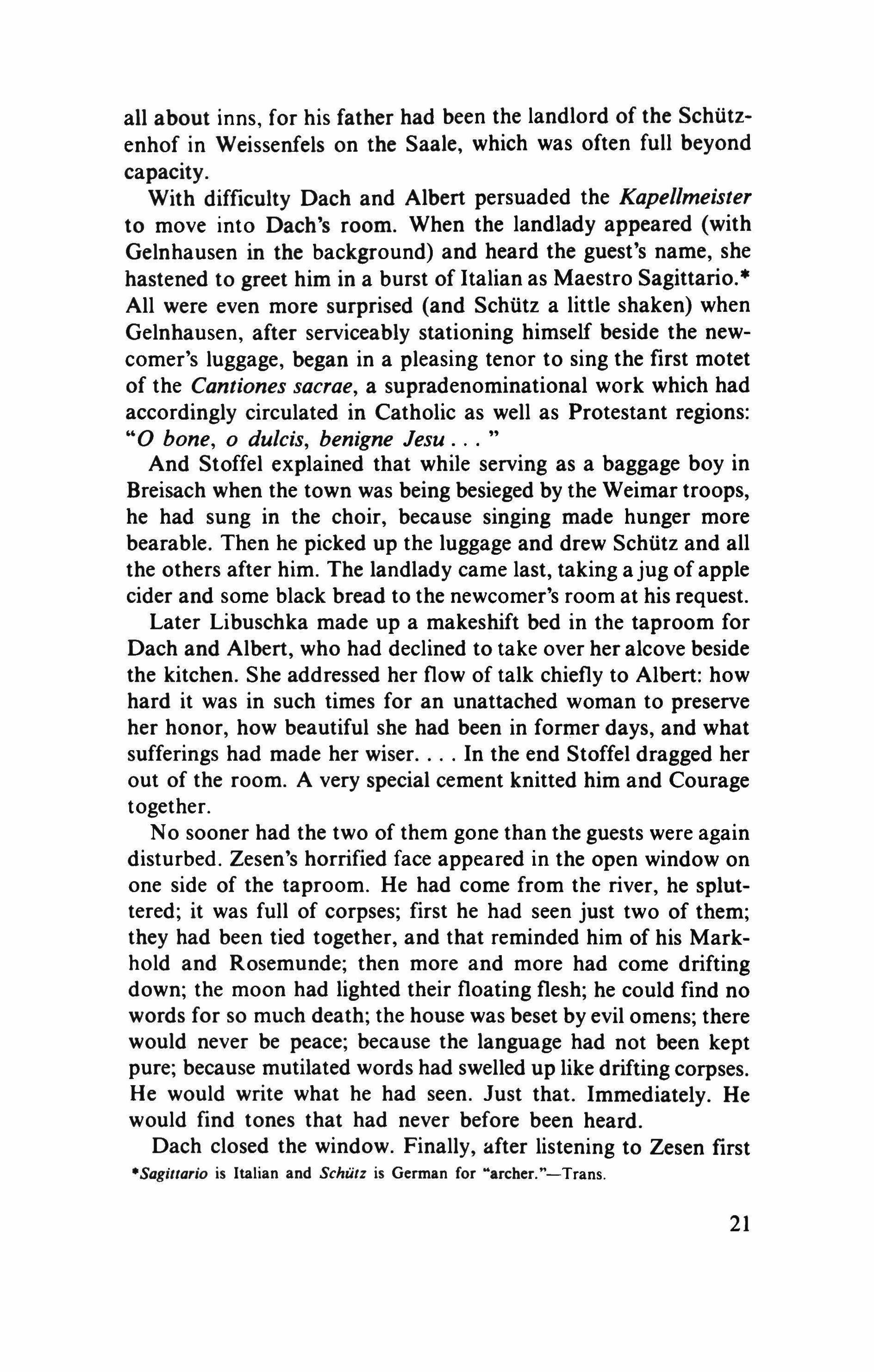
all about inns, for his father had been the landlord of the Schutzenhof in Weissenfels on the Saale, which was often full beyond capacity.
With difficulty Dach and Albert persuaded the Kapellmeister to move into Dach's room. When the landlady appeared (with Gelnhausen in the background) and heard the guest's name, she hastened to greet him in a burst of Italian as Maestro Sagittario. *
All were even more surprised (and Schutz a little shaken) when Gelnhausen, after serviceably stationing himself beside the newcomer's luggage, began in a pleasing tenor to sing the first motet of the Cantiones sacrae, a supradenominational work which had accordingly circulated in Catholic as well as Protestant regions: "0 bone, 0 du/cis, benigne Jesu
And Stoffel explained that while serving as a baggage boy in Breisach when the town was being besieged by the Weimar troops, he had sung in the choir, because singing made hunger more bearable. Then he picked up the luggage and drew Schutz and all the others after him. The landlady came last, taking a jug of apple cider and some black bread to the newcomer's room at his request.
Later Libuschka made up a makeshift bed in the taproom for Dach and Albert, who had declined to take over her alcove beside the kitchen. She addressed her flow of talk chiefly to Albert: how hard it was in such times for an unattached woman to preserve her honor, how beautiful she had been in former days, and what sufferings had made her wiser In the end Stoffel dragged her out of the room. A very special cement knitted him and Courage together.
No sooner had the two of them gone than the guests were again disturbed. Zesen's horrified face appeared in the open window on one side of the taproom. He had come from the river, he spluttered; it was full of corpses; first he had seen just two of them; they had been tied together, and that reminded him of his Markhold and Rosemunde; then more and more had come drifting down; the moon had lighted their floating flesh; he could find no words for so much death; the house was beset by evil omens; there would never be peace; because the language had not been kept pure; because mutilated words had swelled up like drifting corpses. He would write what he had seen. Just that. Immediately. He would find tones that had never before been heard.
Dach closed the window. Finally, after listening to Zesen first ·Sagittario is Italian and Schutz is German for "archer."-Trans.
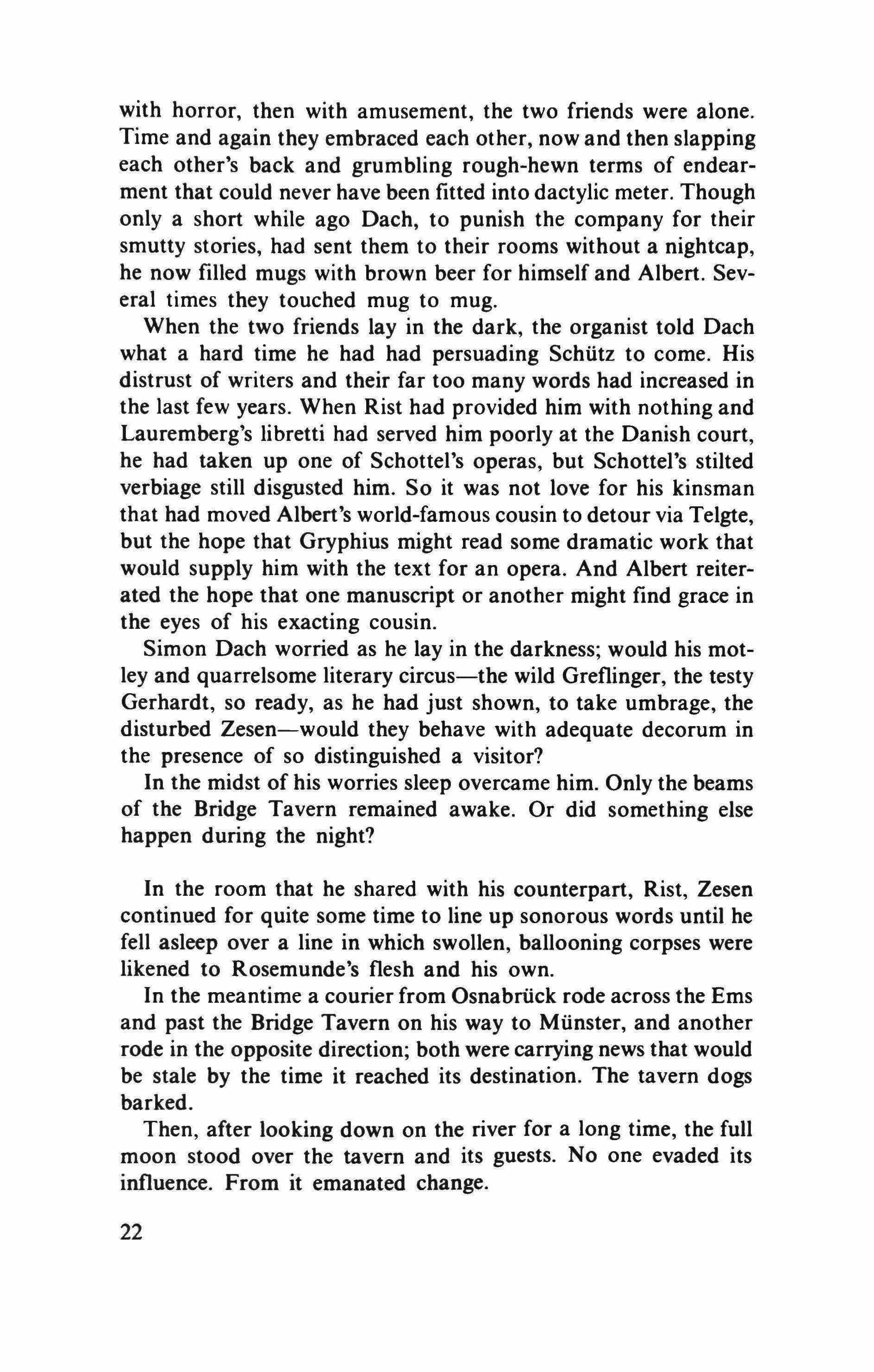
with horror, then with amusement, the two friends were alone. Time and again they embraced each other, now and then slapping each other's back and grumbling rough-hewn terms of endearment that could never have been fitted into dactylic meter. Though only a short while ago Dach, to punish the company for their smutty stories, had sent them to their rooms without a nightcap, he now filled mugs with brown beer for himself and Albert. Several times they touched mug to mug.
When the two friends lay in the dark, the organist told Dach what a hard time he had had persuading Schutz to come. His distrust of writers and their far too many words had increased in the last few years. When Rist had provided him with nothing and Lauremberg's libretti had served him poorly at the Danish court, he had taken up one of Schottel's operas, but Schottel's stilted verbiage still disgusted him. So it was not love for his kinsman that had moved Albert's world-famous cousin to detour via Telgte, but the hope that Gryphius might read some dramatic work that would supply him with the text for an opera. And Albert reiterated the hope that one manuscript or another might find grace in the eyes of his exacting cousin.
Simon Dach worried as he lay in the darkness; would his motley and quarrelsome literary circus-the wild Greflinger, the testy Gerhardt, so ready, as he had just shown, to take umbrage, the disturbed Zesen-would they behave with adequate decorum in the presence of so distinguished a visitor?
In the midst of his worries sleep overcame him. Only the beams of the Bridge Tavern remained awake. Or did something else happen during the night?
In the room that he shared with his counterpart, Rist, Zesen continued for quite some time to line up sonorous words until he fell asleep over a line in which swollen, ballooning corpses were likened to Rosemunde's flesh and his own.
In the meantime a courier from Osnabrock rode across the Ems and past the Bridge Tavern on his way to Munster, and another rode in the opposite direction; both were carrying news that would be stale by the time it reached its destination. The tavern dogs barked.
Then, after looking down on the river for a long time, the full moon stood over the tavern and its guests. No one evaded its influence. From it emanated change.
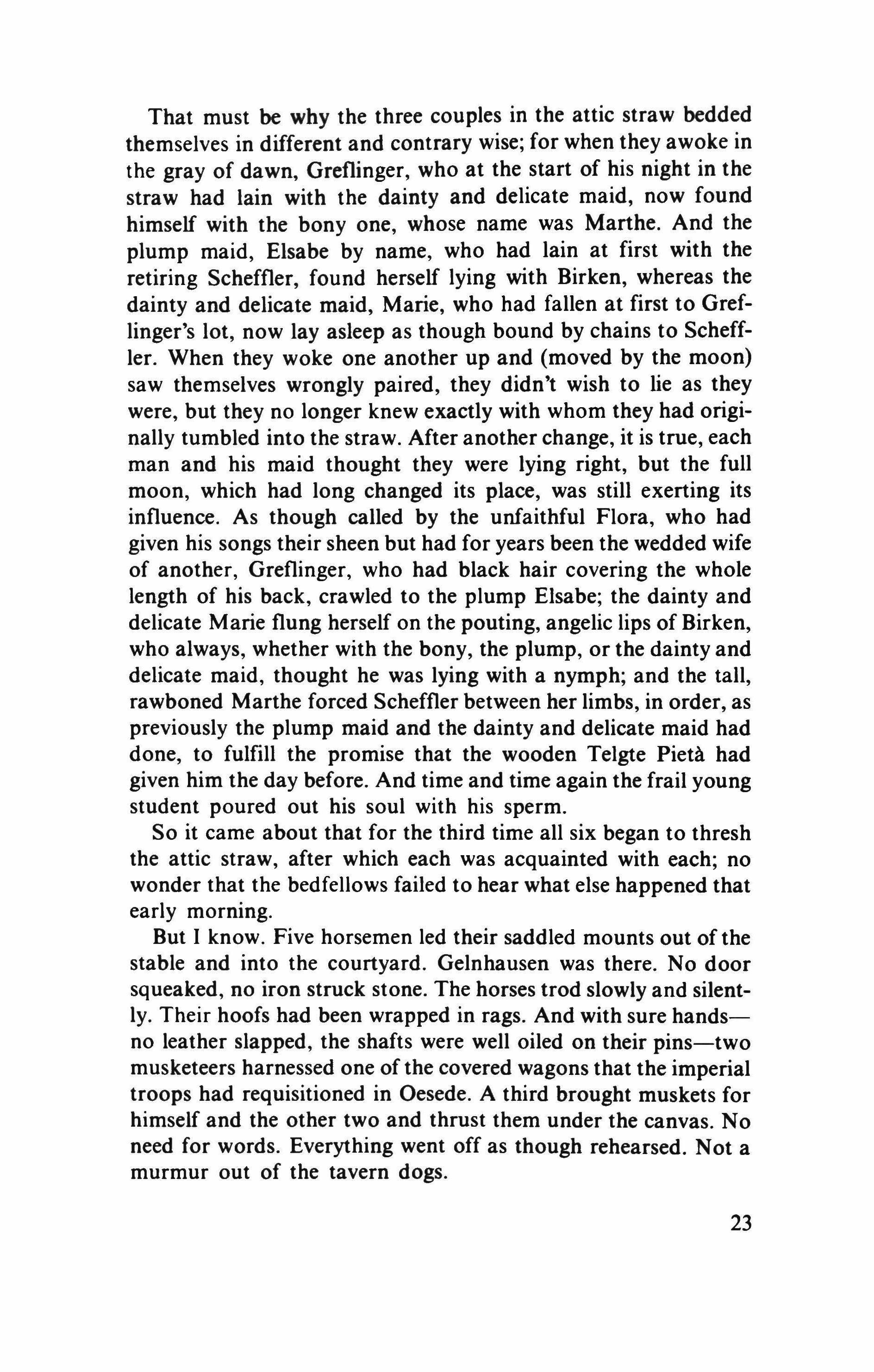
That must be why the three couples in the attic straw bedded themselves in different and contrary wise; for when they awoke in the gray of dawn, Greflinger, who at the start of his night in the straw had lain with the dainty and delicate maid, now found himself with the bony one, whose name was Marthe. And the plump maid, Elsabe by name, who had lain at first with the retiring Scheffler, found herself lying with Birken, whereas the dainty and delicate maid, Marie, who had fallen at first to Greflinger's lot, now lay asleep as though bound by chains to Scheffler. When they woke one another up and (moved by the moon) saw themselves wrongly paired, they didn't wish to lie as they were, but they no longer knew exactly with whom they had originally tumbled into the straw. After another change, it is true, each man and his maid thought they were lying right, but the full moon, which had long changed its place, was still exerting its influence. As though called by the unfaithful Flora, who had given his songs their sheen but had for years been the wedded wife of another, Greflinger, who had black hair covering the whole length of his back, crawled to the plump Elsabe; the dainty and delicate Marie flung herself on the pouting, angelic lips of Birken, who always, whether with the bony, the plump, or the dainty and delicate maid, thought he was lying with a nymph; and the tall, rawboned Marthe forced Scheffler between her limbs, in order, as previously the plump maid and the dainty and delicate maid had done, to fulfill the promise that the wooden Telgte Pieta had given him the day before. And time and time again the frail young student poured out his soul with his sperm.
So it came about that for the third time all six began to thresh the attic straw, after which each was acquainted with each; no wonder that the bedfellows failed to hear what else happened that early morning.
But I know. Five horsemen led their saddled mounts out of the stable and into the courtyard. Gelnhausen was there. No door squeaked, no iron struck stone. The horses trod slowly and silently. Their hoofs had been wrapped in rags. And with sure handsno leather slapped, the shafts were well oiled on their pins-two musketeers harnessed one of the covered wagons that the imperial troops had requisitioned in Oesede. A third brought muskets for himself and the other two and thrust them under the canvas. No need for words. Everything went off as though rehearsed. Not a murmur out of the tavern dogs.

Only the landlady of the Bridge Tavern whispered something to Gelnhausen, instructions no doubt, for Stoffel, already mounted, punctuated her words with nods of the head. As though playing a part, Libuschka (formerly known as Courage) stood wrapped in a horse blanket beside the sometime huntsman of Soest, who still (or once again) looked dashing in a green doublet with gold buttons and a plumed hat.
Only Paul Gerhardt woke up when the team tugged at the covered wagon and the emperor's horsemen rode out of the courtyard. He was just in time to see Gelnhausen turn in his saddle, draw his sword, and with his free hand wave laughingly at the landlady, who made no sign in answer, but was still standing stiffly in the courtyard, wrapped in her blanket, when the wagon and riders were curtained off by the alders before being swallowed up by the Ems Gate.
Then the birds started in. Or perhaps it was only then that Gerhardt heard how many birds had been ushering in the Telgte morning. Larks, finches, blackbirds, titmice, starlings. In the elderberry bushes behind the stable, in the copper beech in the middle of the courtyard, in the four lime trees that had been planted on the weather side of the tavern, from the birch and alder woods invaded by the scrub from the outer bank of the Ems, also in the nests the sparrows had built themselves in the weatherbeaten thatched roof that was falling apart around the rear gable. From all directions the morning began with birds. (There were no cocks left in the town.)
When landlady Libuschka broke loose from her freeze and slowly, shaking her head and muttering plaintively, shuffled out of the courtyard, she, who the day before had raucously set the tone and had still impressed the gentlemen as a valid target, became an old woman, abandoned to herself, wrapped in her horse blanket.
For which reason Paul Gerhardt, who now started on his morning prayers, included poor Courage in his plea: he prayed that the Lord and merciful Father might not in His wrath punish the wretched woman too severely for her sins; that He might look with forbearance upon her future trespasses, for the war had made this poor woman what she was and corrupted many another pious soul besides her. Then he prayed, as he had every morning for years, that peace might come soon, bringing safety to all true believers, and to the heretics, who denied the true God, either
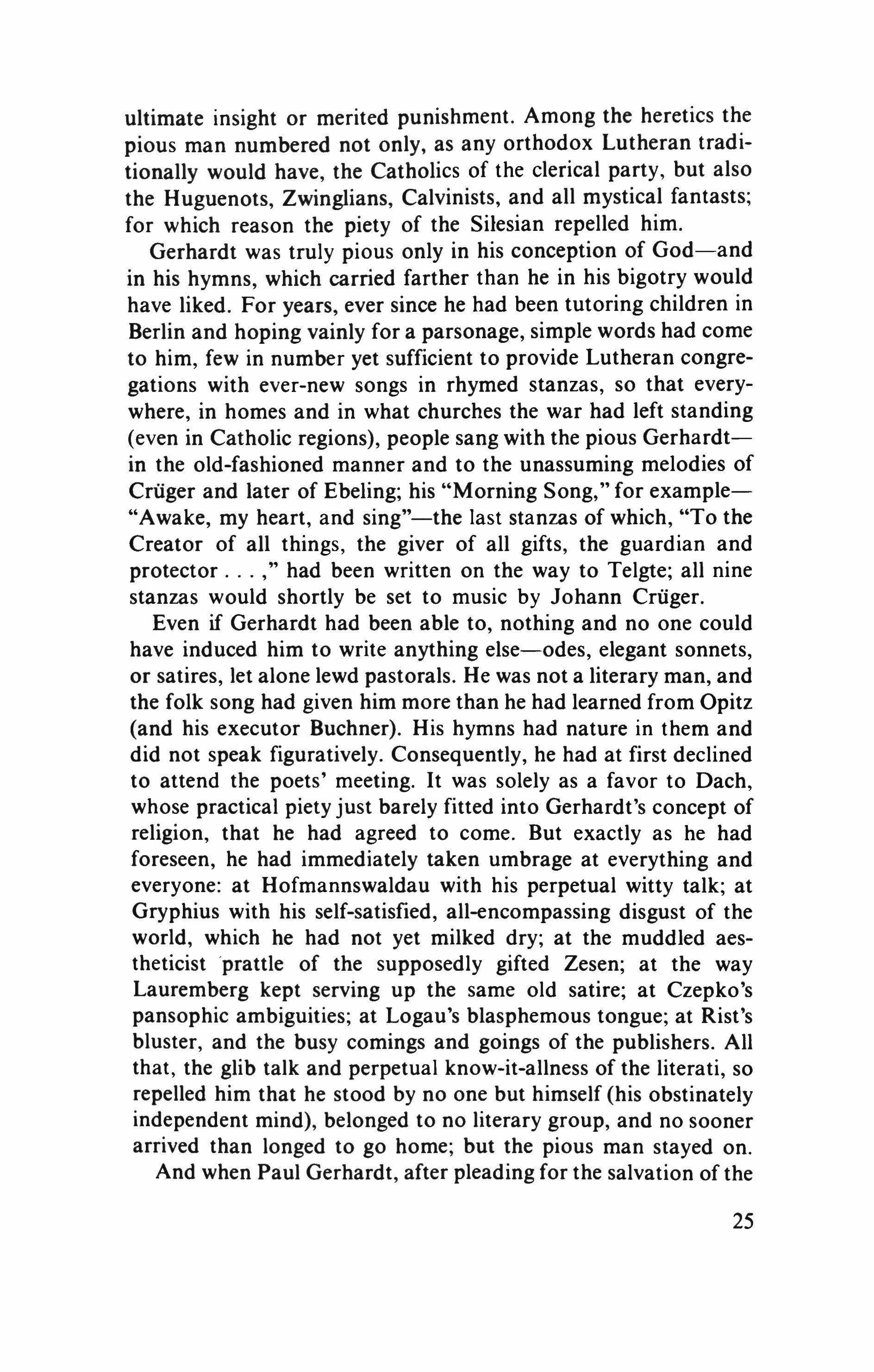
ultimate insight or merited punishment. Among the heretics the pious man numbered not only, as any orthodox Lutheran traditionally would have, the Catholics of the clerical party, but also the Huguenots, Zwinglians, Calvinists, and all mystical fantasts; for which reason the piety of the Silesian repelled him.
Gerhardt was truly pious only in his conception of God-and in his hymns, which carried farther than he in his bigotry would have liked. For years, ever since he had been tutoring children in Berlin and hoping vainly for a parsonage, simple words had come to him, few in number yet sufficient to provide Lutheran congregations with ever-new songs in rhymed stanzas, so that everywhere, in homes and in what churches the war had left standing (even in Catholic regions), people sang with the pious Gerhardtin the old-fashioned manner and to the unassuming melodies of Cruger and later of Ebeling; his "Morning Song," for example"Awake, my heart, and sing"-the last stanzas of which, "To the Creator of all things, the giver of all gifts, the guardian and protector ," had been written on the way to Telgte; all nine stanzas would shortly be set to music by Johann Cruger.
Even if Gerhardt had been able to, nothing and no one could have induced him to write anything else-odes, elegant sonnets, or satires, let alone lewd pastorals. He was not a literary man, and the folk song had given him more than he had learned from Opitz (and his executor Buchner). His hymns had nature in them and did not speak figuratively. Consequently, he had at first declined to attend the poets' meeting. It was solely as a favor to Dach, whose practical piety just barely fitted into Gerhardt's concept of religion, that he had agreed to come. But exactly as he had foreseen, he had immediately taken umbrage at everything and everyone: at Hofmannswaldau with his perpetual witty talk; at Gryphius with his self-satisfied, all-encompassing disgust of the world, which he had not yet milked dry; at the muddled aestheticist 'prattle of the supposedly gifted Zesen; at the way Lauremberg kept serving up the same old satire; at Czepko's pansophic ambiguities; at Logau's blasphemous tongue; at Rist's bluster, and the busy comings and goings of the publishers. All that, the glib talk and perpetual know-it-allness of the literati, so repelled him that he stood by no one but himself (his obstinately independent mind), belonged to no literary group, and no sooner arrived than longed to go home; but the pious man stayed on.
And when Paul Gerhardt, after pleading for the salvation of the
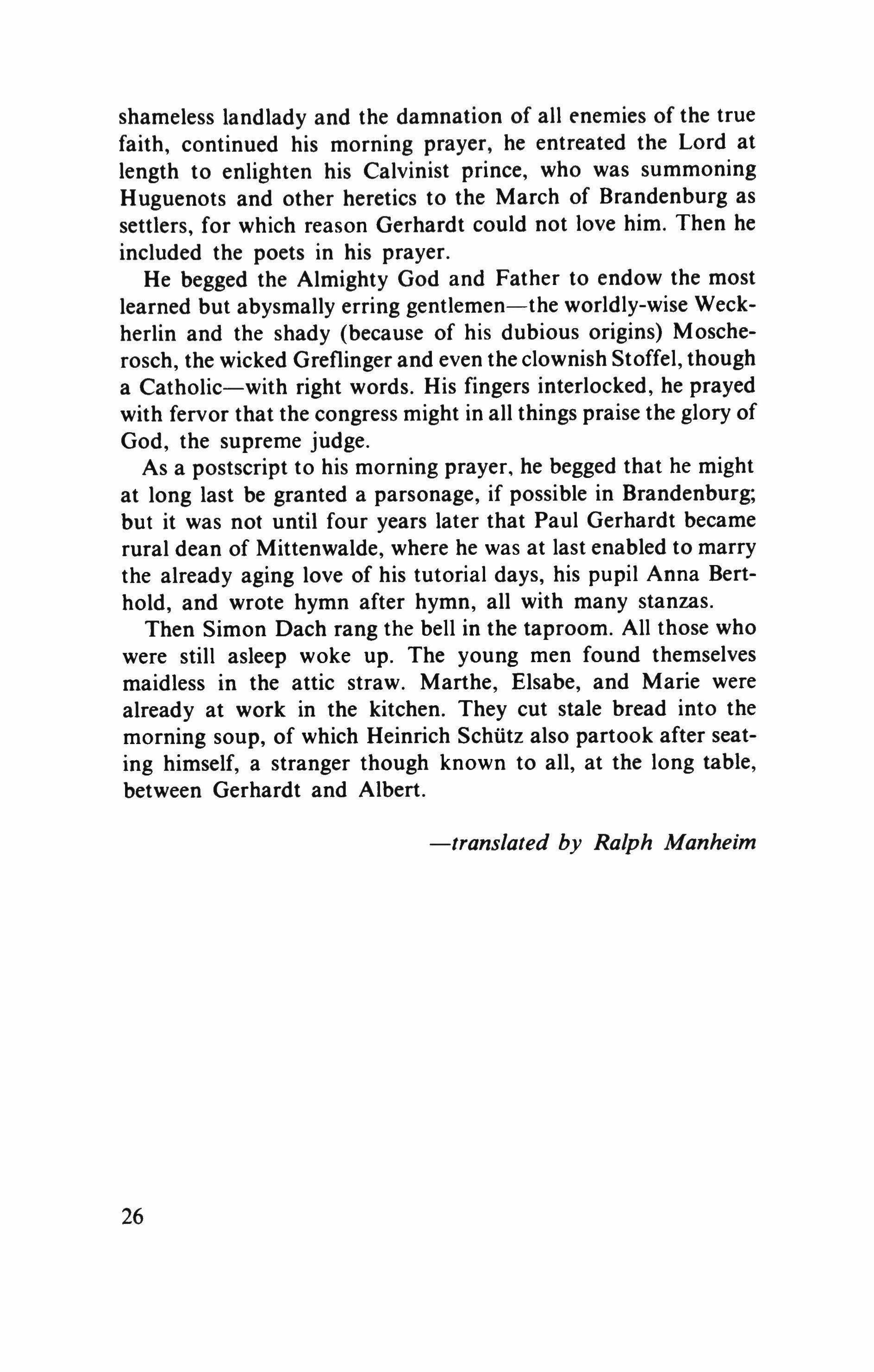
shameless landlady and the damnation of all enemies of the true faith, continued his morning prayer, he entreated the Lord at length to enlighten his Calvinist prince, who was summoning Huguenots and other heretics to the March of Brandenburg as settlers, for which reason Gerhardt could not love him. Then he included the poets in his prayer.
He begged the Almighty God and Father to endow the most learned but abysmally erring gentlemen-the worldly-wise Weekherlin and the shady (because of his dubious origins) Moscherosch, the wicked Greflinger and even the clownish Stoffel, though a Catholic-with right words. His fingers interlocked, he prayed with fervor that the congress might in all things praise the glory of God, the supreme judge.
As a postscript to his morning prayer, he begged that he might at long last be granted a parsonage, if possible in Brandenburg; but it was not until four years later that Paul Gerhardt became rural dean of Mittenwalde, where he was at last enabled to marry the already aging love of his tutorial days, his pupil Anna Berthold, and wrote hymn after hymn, all with many stanzas.
Then Simon Dach rang the bell in the taproom. All those who were still asleep woke up. The young men found themselves maidless in the attic straw. Marthe, Elsabe, and Marie were already at work in the kitchen. They cut stale bread into the morning soup, of which Heinrich Schutz also partook after seating himself, a stranger though known to all, at the long table, between Gerhardt and Albert.
-translated by Ralph Manheim
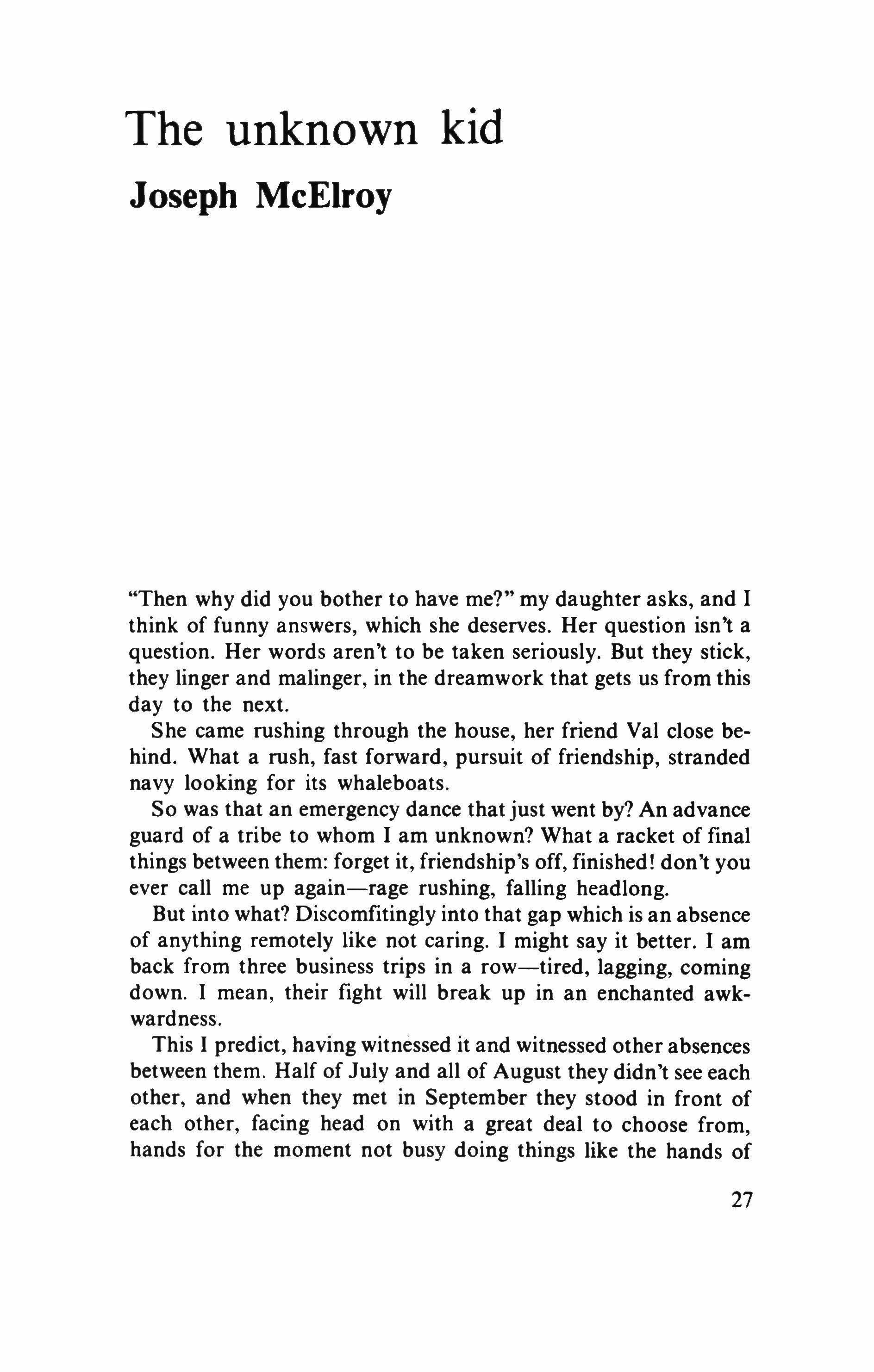
"Then why did you bother to have me?" my daughter asks, and I think of funny answers, which she deserves. Her question isn't a question. Her words aren't to be taken seriously. But they stick, they linger and malinger, in the dreamwork that gets us from this day to the next.
She came rushing through the house, her friend Val close behind. What a rush, fast forward, pursuit of friendship, stranded navy looking for its whaleboats.
So was that an emergency dance that just went by? An advance guard of a tribe to whom I am unknown? What a racket of final things between them: forget it, friendship's off, finished! don't you ever call me up again-rage rushing, falling headlong.
But into what? Discomfitingly into that gap which is an absence of anything remotely like not caring. I might say it better. I am back from three business trips in a row-tired, lagging, coming down. I mean, their fight will break up in an enchanted awkwardness.
This I predict, having witnessed it and witnessed other absences between them. Half of July and all of August they didn't see each other, and when they met in September they stood in front of each other, facing head on with a great deal to choose from, hands for the moment not busy doing things like the hands of
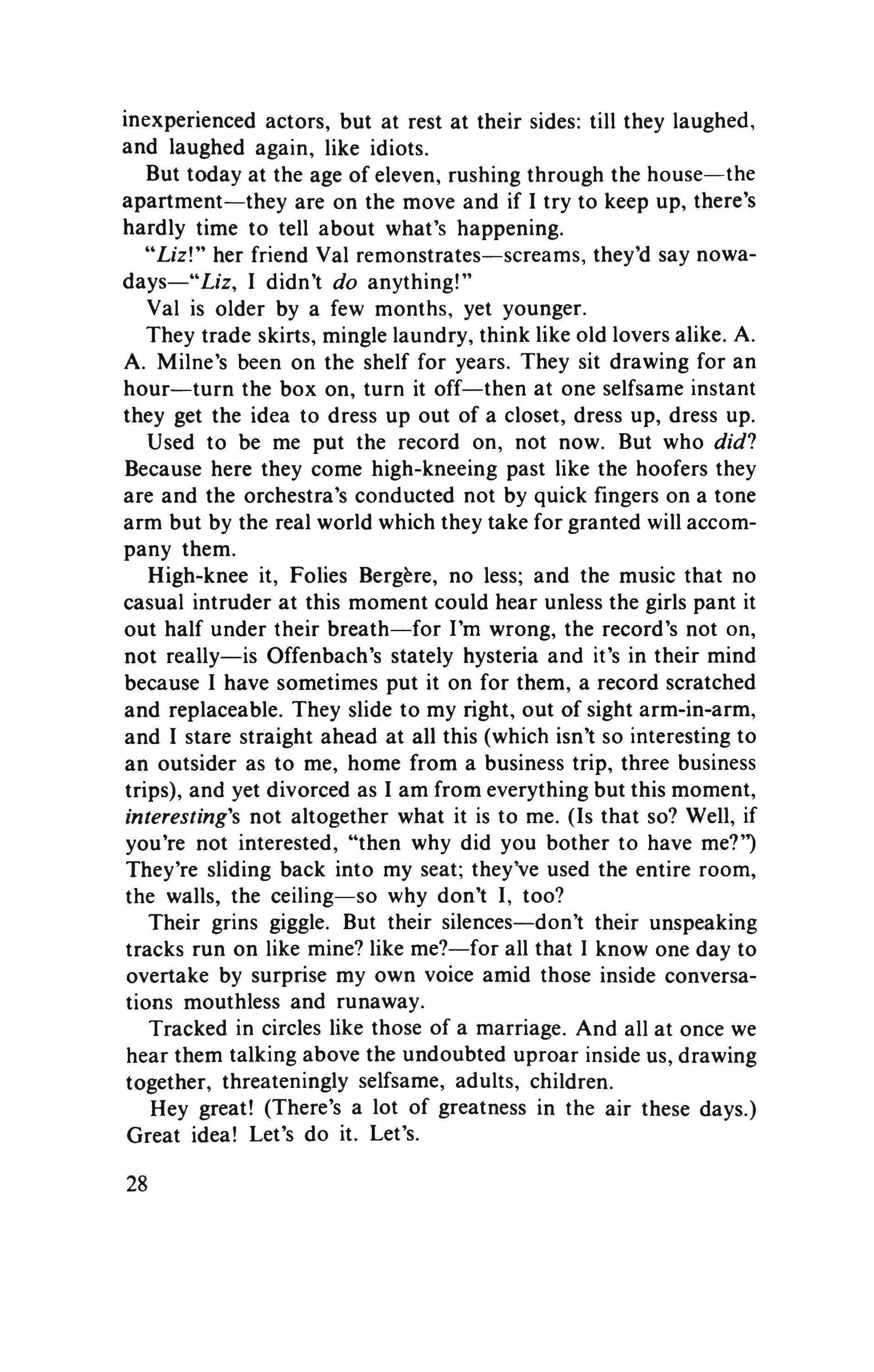
inexperienced actors, but at rest at their sides: till they laughed, and laughed again, like idiots.
But today at the age of eleven, rushing through the house-the apartment-they are on the move and if I try to keep up, there's hardly time to tell about what's happening.
"Liz!" her friend Val remonstrates-screams, they'd say nowadays-"Liz, I didn't do anything!"
Val is older by a few months, yet younger. They trade skirts, mingle laundry, think like old lovers alike. A. A. Milne's been on the shelf for years. They sit drawing for an hour-turn the box on, turn it off-then at one selfsame instant they get the idea to dress up out of a closet, dress up, dress up.
Used to be me put the record on, not now. But who did? Because here they come high-kneeing past like the hoofers they are and the orchestra's conducted not by quick fingers on a tone arm but by the real world which they take for granted will accompany them.
High-knee it, Folies Bergere, no less; and the music that no casual intruder at this moment could hear unless the girls pant it out half under their breath-for I'm wrong, the record's not on, not really-is Offenbach's stately hysteria and it's in their mind because I have sometimes put it on for them, a record scratched and replaceable. They slide to my right, out of sight arm-in-arm, and I stare straight ahead at all this (which isn't so interesting to an outsider as to me, home from a business trip, three business trips), and yet divorced as I am from everything but this moment, interesting's not altogether what it is to me. (Is that so? Well, if you're not interested, "then why did you bother to have me?") They're sliding back into my seat; they've used the entire room, the walls, the ceiling-so why don't I, too?
Their grins giggle. But their silences-don't their unspeaking tracks run on like mine? like me?-for all that I know one day to overtake by surprise my own voice amid those inside conversations mouthless and runaway.
Tracked in circles like those of a marriage. And all at once we hear them talking above the undoubted uproar inside us, drawing together, threateningly selfsame, adults, children.
Hey great! (There's a lot of greatness in the air these days.) Great idea! Let's do it. Let's.
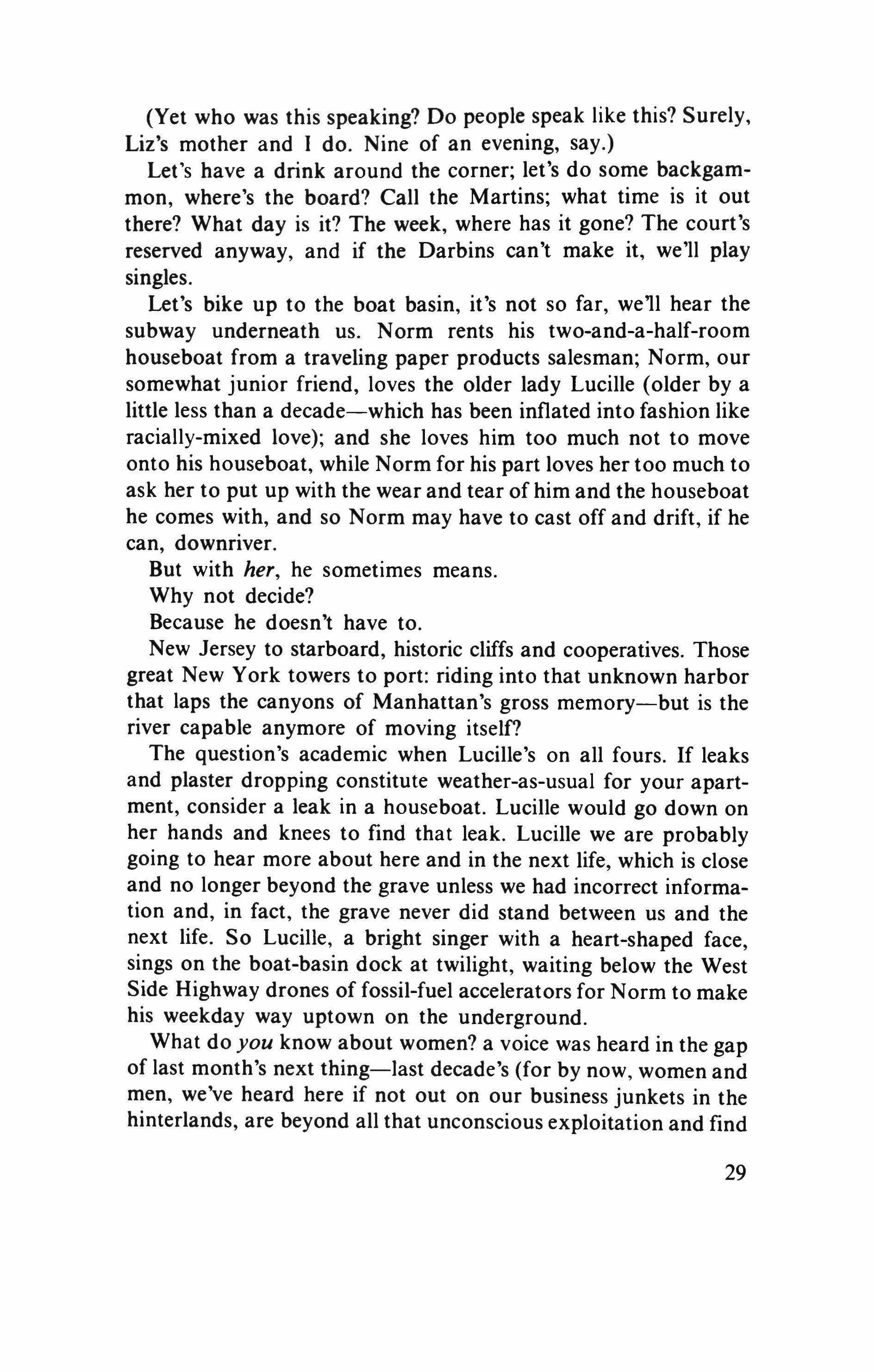
(Yet who was this speaking? Do people speak like this? Surely, Liz's mother and I do. Nine of an evening, say.)
Let's have a drink around the corner; let's do some backgammon, where's the board? Call the Martins; what time is it out there? What day is it? The week, where has it gone? The court's reserved anyway, and if the Darbins can't make it, we'll play singles.
Let's bike up to the boat basin, it's not so far, we'll hear the subway underneath us. Norm rents his two-and-a-half-room houseboat from a traveling paper products salesman; Norm, our somewhat junior friend, loves the older lady Lucille (older by a little less than a decade-which has been inflated into fashion like racially-mixed love); and she loves him too much not to move onto his houseboat, while Norm for his part loves her too much to ask her to put up with the wear and tear of him and the houseboat he comes with, and so Norm may have to cast off and drift, if he can, downriver.
But with her, he sometimes means.
Why not decide?
Because he doesn't have to.
New Jersey to starboard, historic cliffs and cooperatives. Those great New York towers to port: riding into that unknown harbor that laps the canyons of Manhattan's gross memory-but is the river capable anymore of moving itself?
The question's academic when Lucille's on all fours. If leaks and plaster dropping constitute weather-as-usual for your apartment, consider a leak in a houseboat. Lucille would go down on her hands and knees to find that leak. Lucille we are probably going to hear more about here and in the next life, which is close and no longer beyond the grave unless we had incorrect information and, in fact, the grave never did stand between us and the next life. So Lucille, a bright singer with a heart-shaped face, sings on the boat-basin dock at twilight, waiting below the West Side Highway drones of fossil-fuel accelerators for Norm to make his weekday way uptown on the underground.
What do you know about women? a voice was heard in the gap of last month's next thing-last decade's (for by now, women and men, we've heard here if not out on our business junkets in the hinterlands, are beyond all that unconscious exploitation and find
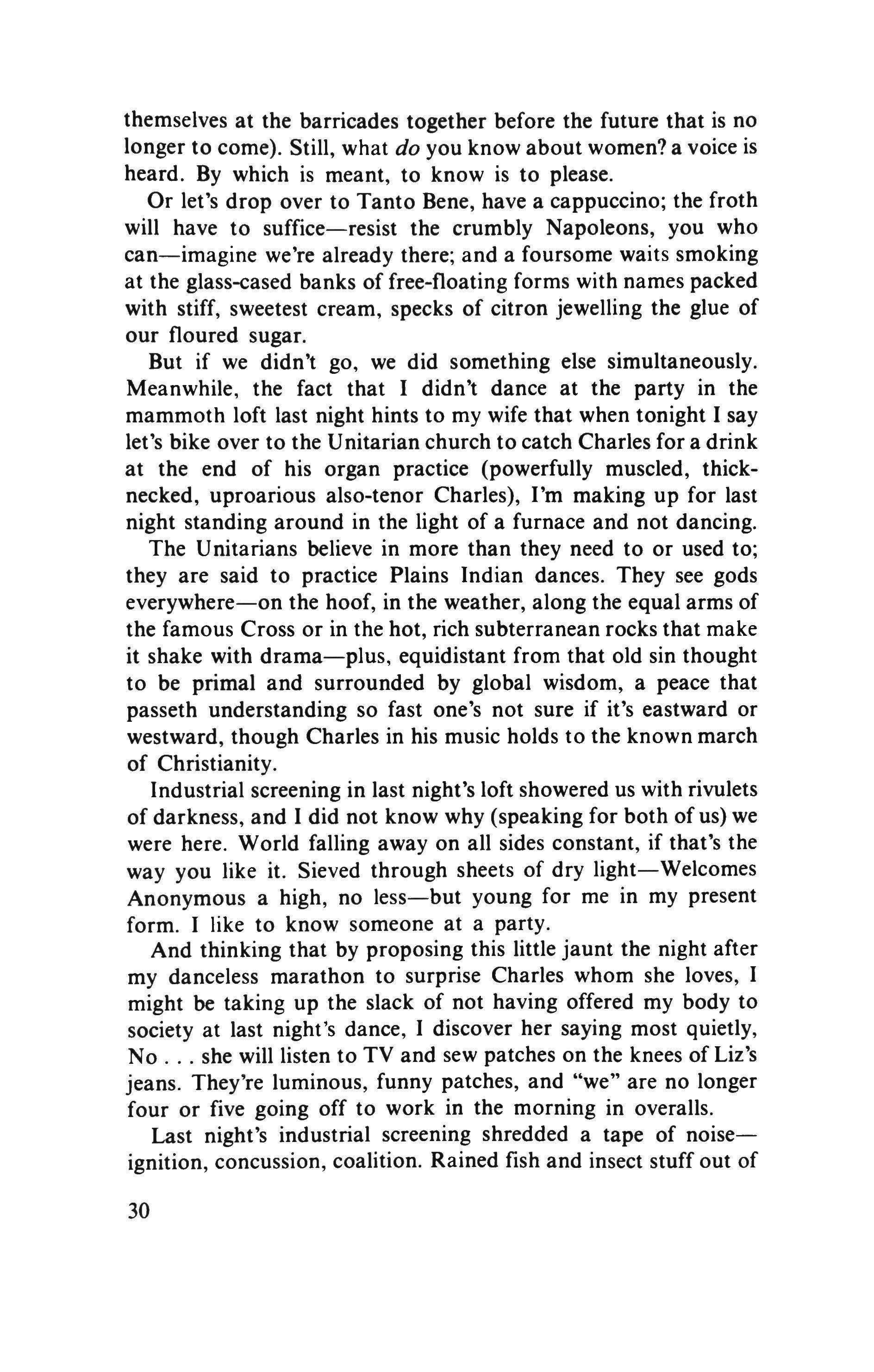
themselves at the barricades together before the future that is no longer to come). Still, what do you know about women? a voice is heard. By which is meant, to know is to please.
Or let's drop over to Tanto Bene, have a cappuccino; the froth will have to suffice-resist the crumbly Napoleons, you who can-imagine we're already there; and a foursome waits smoking at the glass-cased banks of free-floating forms with names packed with stiff, sweetest cream, specks of citron jewelling the glue of our floured sugar.
But if we didn't go, we did something else simultaneously. Meanwhile, the fact that I didn't dance at the party in the mammoth loft last night hints to my wife that when tonight I say let's bike over to the Unitarian church to catch Charles for a drink at the end of his organ practice (powerfully muscled, thicknecked, uproarious also-tenor Charles), I'm making up for last night standing around in the light of a furnace and not dancing.
The Unitarians believe in more than they need to or used to; they are said to practice Plains Indian dances. They see gods everywhere-on the hoof, in the weather, along the equal arms of the famous Cross or in the hot, rich subterranean rocks that make it shake with drama-plus, equidistant from that old sin thought to be primal and surrounded by global wisdom, a peace that passeth understanding so fast one's not sure if it's eastward or westward, though Charles in his music holds to the known march of Christianity.
Industrial screening in last night's loft showered us with rivulets of darkness, and I did not know why (speaking for both of us) we were here. World falling away on all sides constant, if that's the way you like it. Sieved through sheets of dry light-Welcomes Anonymous a high, no less-but young for me in my present form. I like to know someone at a party.
And thinking that by proposing this little jaunt the night after my danceless marathon to surprise Charles whom she loves, I might be taking up the slack of not having offered my body to society at last night's dance, I discover her saying most quietly, No she will listen to TV and sew patches on the knees of Liz's jeans. They're luminous, funny patches, and "we" are no longer four or five going off to work in the morning in overalls.
Last night's industrial screening shredded a tape of noiseignition, concussion, coalition. Rained fish and insect stuff out of

the thundering shifts so that the long, long ceiling of the mammoth loft furnished by the unknown lessee of that blast area got sifted; rained bombs, fire, rotation, geometry, dreams, and (if you looked at how the moving, for-a-moment-apparently-counterclockwise-spinning folk swung around) rained ants.
Moved, though, not with that aim and life when Liz and Val blow by and leave behind them a wake. Val older physically a little than Liz, but younger in the mettle of maturity's magic. Could I say it better?
Maturity beyond question. I'll always give her that. A rhetorical answer if there's such a thing, coming home off a business trip. But no answer to the dreamwork's rhetorical question, "Then why did you bother to have me?"
What she has had to put up with I've had bad dreams about. Daydreams that are the despairing, would-be insanity of my class. And when it builds and hurries between her mother and me, Liz stays the same. That's strength.
So strong I might forget she's eleven. So strong I can't ever get over it, or won't for years.
Glad and able to be left alone (in this city) should we go out. And able to see more than she needs or wants. A story of real life, a dose of her parents sometimes not seeing straight to launch salvos at each other's doubled blurs, you might think it the middle of the night, and just as well no one gets hurt if a few healthy salvos heard round the apartment aren't just on target.
I've found too many words, I've found too few. For this kid has had an unknown (not hard to guess, these days) amount of wake to vector through. But is it love, then, that lets her see her parents as they are, or strange maturity? So let the light shine in, shine down her long, brown-shining hair, longer the more I think, and upon her mother's short, dark curls. The light comes in one end of a bedroom, passes through to be augmented by diagonally opposing mirrors that at first divide the morning influx of sun which then pours itself together again when it fills the bathroom threshold and reaches these two largely naked people approaching each other in height, if not always in looks, having an impromptu hipto-hip analysis in the bathroom mirror, me fixed some paces behind them across the threshold over their shoulders.
They're talking hair, the long and the short. I've heard the subject in a song sung at twilight at the boat basin on the West
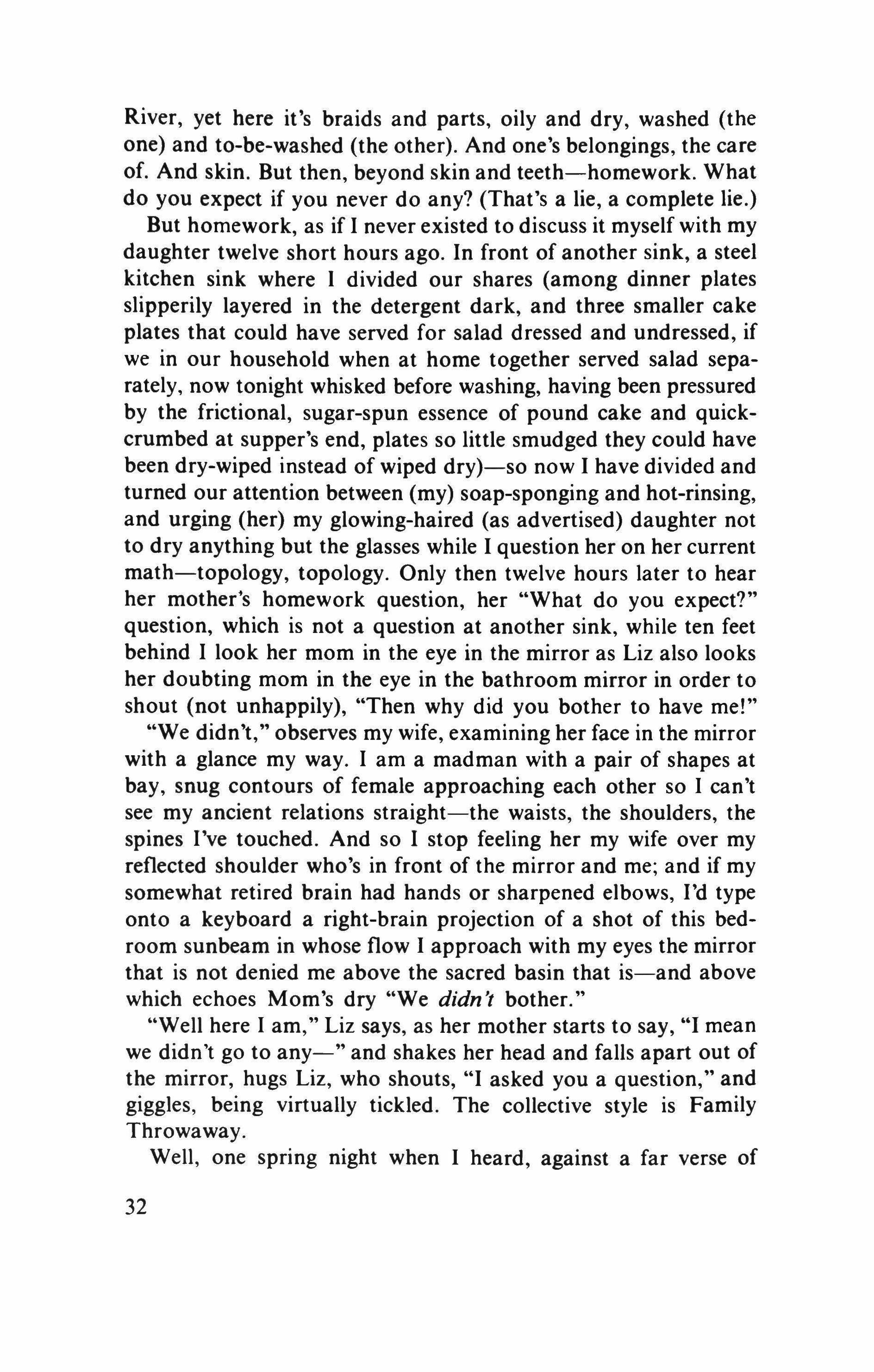
River, yet here it's braids and parts, oily and dry, washed (the one) and to-be-washed (the other). And one's belongings, the care of. And skin. But then, beyond skin and teeth-homework. What do you expect if you never do any? (That's a lie, a complete lie.)
But homework, as if I never existed to discuss it myself with my daughter twelve short hours ago. In front of another sink, a steel kitchen sink where I divided our shares (among dinner plates slipperily layered in the detergent dark, and three smaller cake plates that could have served for salad dressed and undressed, if we in our household when at home together served salad separately, now tonight whisked before washing, having been pressured by the frictional, sugar-spun essence of pound cake and quickcrumbed at supper's end, plates so little smudged they could have been dry-wiped instead of wiped dry)-so now I have divided and turned our attention between (my) soap-sponging and hot-rinsing, and urging (her) my glowing-haired (as advertised) daughter not to dry anything but the glasses while I question her on her current math-topology, topology. Only then twelve hours later to hear her mother's homework question, her "What do you expect?" question, which is not a question at another sink, while ten feet behind I look her mom in the eye in the mirror as Liz also looks her doubting mom in the eye in the bathroom mirror in order to shout (not unhappily), "Then why did you bother to have me!"
"We didn't," observes my wife, examining her face in the mirror with a glance my way. I am a madman with a pair of shapes at bay, snug contours of female approaching each other so I can't see my ancient relations straight-the waists, the shoulders, the spines I've touched. And so I stop feeling her my wife over my reflected shoulder who's in front of the mirror and me; and if my somewhat retired brain had hands or sharpened elbows, I'd type onto a keyboard a right-brain projection of a shot of this bedroom sunbeam in whose flow I approach with my eyes the mirror that is not denied me above the sacred basin that is-and above which echoes Mom's dry "We didn't bother."
"Well here I am," Liz says, as her mother starts to say, "I mean we didn't go to any-" and shakes her head and falls apart out of the mirror, hugs Liz, who shouts, "I asked you a question," and giggles, being virtually tickled. The collective style is Family Throwaway.
Well, one spring night when I heard, against a far verse of

Stephen Foster sung three miles away by Lucille dockside, the language of the low-splaying copters reach toward the receptors of our high-rising apartment house and the language of all the dogs in the street below hounding some being in their midst, and I could hear the silence of a known displaced owl-hawk walking our terrace walls and parapets eyeing the city and eyeing the tiles for long-ago-eaten pet rodents while hardly twitching in response to the crying, through the horizon of the twilight time and through glass and brick, of a large-ishjungle cat belonging to our neighbor who is a one-handed actor who's been enjoying a long run at the other edge of the continent (and has farmed out his flat rent-free in the meantime to an electronically oriented shadow of a college girl who's seldom in), I found the opportunity upon me going by instinct from strength to strength to capitalize on a blinding point of energy that came between my wife and me as we, from above, watched our daughter on the carpet watch television and were substantially ignored by her.
Wasn't there a strength in her, separating her from me?
Lengths of light brown hair grew to cascades in the light from the screen. America comes into your living room, your TV room, what have you.
You have Indians. I remember Indians. Real ones, because on the screen it wasn't a western but a commercial. A serious, corporate progess-report commercial for a firm that makes digging machines. The biggest in the world and in the history of the world. Monumental earth-movingengines bright-painted and fine, that dig, lift, let go, tilt, turn, all in one curving act, and are, I was set up to think at a glance, run by Indians. Indians represented by the unknown personable one in a red shirt with a sun-ray design like false eyelashes on the upper part of the sleeve, and the unknown personable one was right here concentrated in the screen with a grin of white teeth and strong wrinkles carved by heritage and fed by all the plump bloods of youth-a heritage of lines.
I'm really pretty sick of Indians, my wife murmured, or did I just know this was what she felt?
And this Indian's hands, enriched by centuries of sun and of knowing who he was, gripped the controls of the giant earthmover, and he spoke to us of this and other machines as if the firm that created them employed him to run them. Or sold them to itself.
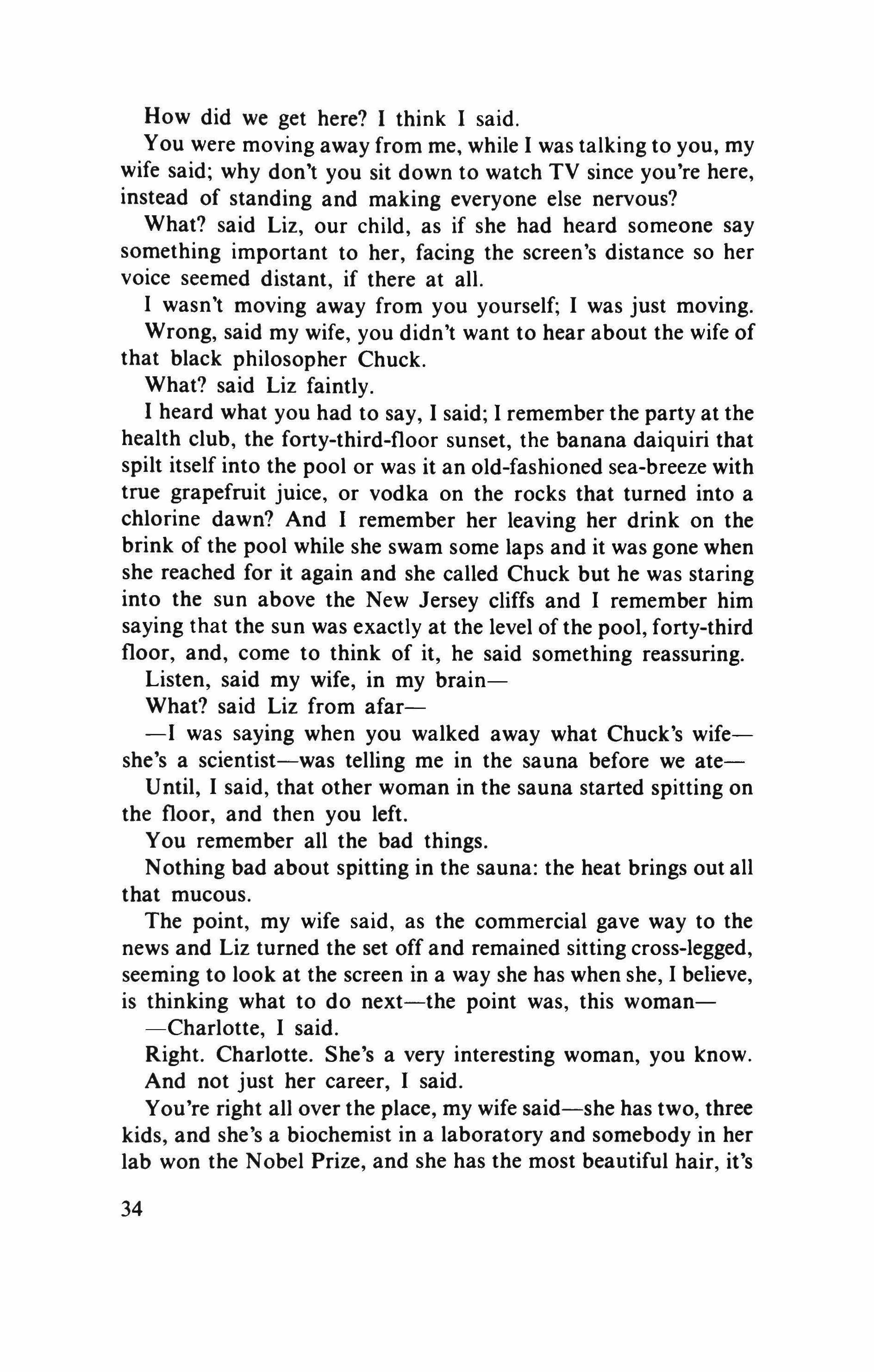
How did we get here? 1 think 1 said.
You were moving away from me, while 1 was talking to you, my wife said; why don't you sit down to watch TV since you're here, instead of standing and making everyone else nervous?
What? said Liz, our child, as if she had heard someone say something important to her, facing the screen's distance so her voice seemed distant, if there at all.
1 wasn't moving away from you yourself; 1 was just moving. Wrong, said my wife, you didn't want to hear about the wife of that black philosopher Chuck.
What? said Liz faintly.
1 heard what you had to say, 1 said; 1 remember the party at the health club, the forty-third-floor sunset, the banana daiquiri that spilt itself into the pool or was it an old-fashioned sea-breeze with true grapefruit juice, or vodka on the rocks that turned into a chlorine dawn? And 1 remember her leaving her drink on the brink of the pool while she swam some laps and it was gone when she reached for it again and she called Chuck but he was staring into the sun above the New Jersey cliffs and 1 remember him saying that the sun was exactly at the level of the pool, forty-third floor, and, come to think of it, he said something reassuring.
Listen, said my wife, in my brain
What? said Liz from afar-
-I was saying when you walked away what Chuck's wifeshe's a scientist-was telling me in the sauna before we ate
Until, 1 said, that other woman in the sauna started spitting on the floor, and then you left.
You remember all the bad things.
Nothing bad about spitting in the sauna: the heat brings out all that mucous.
The point, my wife said, as the commercial gave way to the news and Liz turned the set off and remained sitting cross-legged, seeming to look at the screen in a way she has when she, 1 believe, is thinking what to do next-the point was, this woman-Charlotte, 1 said.
Right. Charlotte. She's a very interesting woman, you know. And not just her career, 1 said.
You're right all over the place, my wife said-she has two, three kids, and she's a biochemist in a laboratory and somebody in her lab won the Nobel Prize, and she has the most beautiful hair, it's
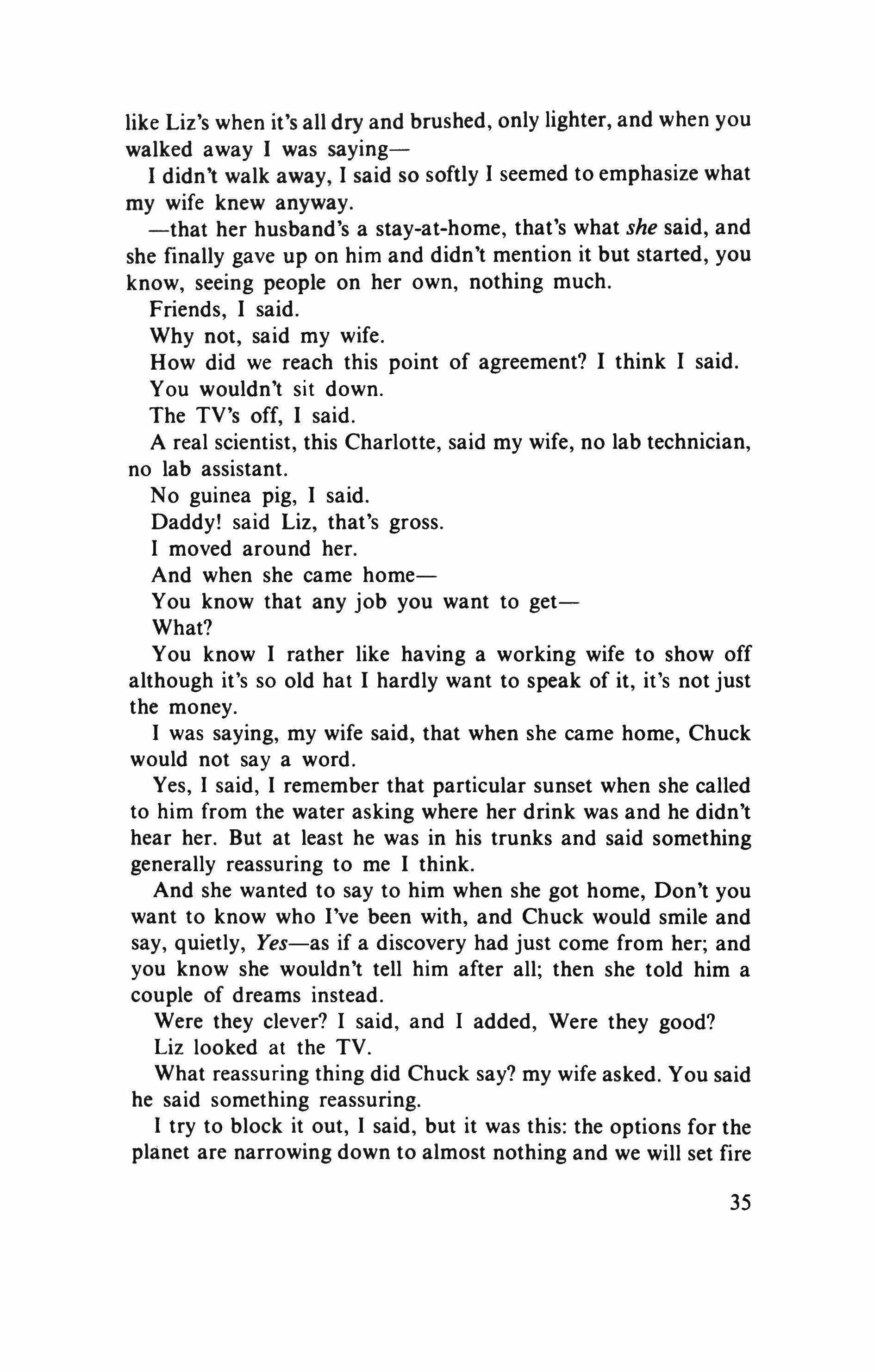
like Liz's when it's all dry and brushed, only lighter, and when you walked away I was saying-
I didn't walk away, I said so softly I seemed to emphasize what my wife knew anyway.
-that her husband's a stay-at-home, that's what she said, and she finally gave up on him and didn't mention it but started, you know, seeing people on her own, nothing much.
Friends, I said.
Why not, said my wife.
How did we reach this point of agreement? I think I said.
You wouldn't sit down.
The TV's off, I said.
A real scientist, this Charlotte, said my wife, no lab technician, no lab assistant.
No guinea pig, I said.
Daddy! said Liz, that's gross.
I moved around her.
And when she came home-
you know that any job you want to get
What?
You know I rather like having a working wife to show off although it's so old hat I hardly want to speak of it, it's not just the money.
I was saying, my wife said, that when she came home, Chuck would not say a word.
Yes, I said, I remember that particular sunset when she called to him from the water asking where her drink was and he didn't hear her. But at least he was in his trunks and said something generally reassuring to me I think.
And she wanted to say to him when she got home, Don't you want to know who I've been with, and Chuck would smile and say, quietly, Yes-as if a discovery had just come from her; and you know she wouldn't tell him after all; then she told him a couple of dreams instead.
Were they clever? I said, and I added, Were they good?
Liz looked at the TV.
What reassuring thing did Chuck say? my wife asked. You said he said something reassuring.
I try to block it out, I said, but it was this: the options for the planet are narrowing down to almost nothing and we will set fire
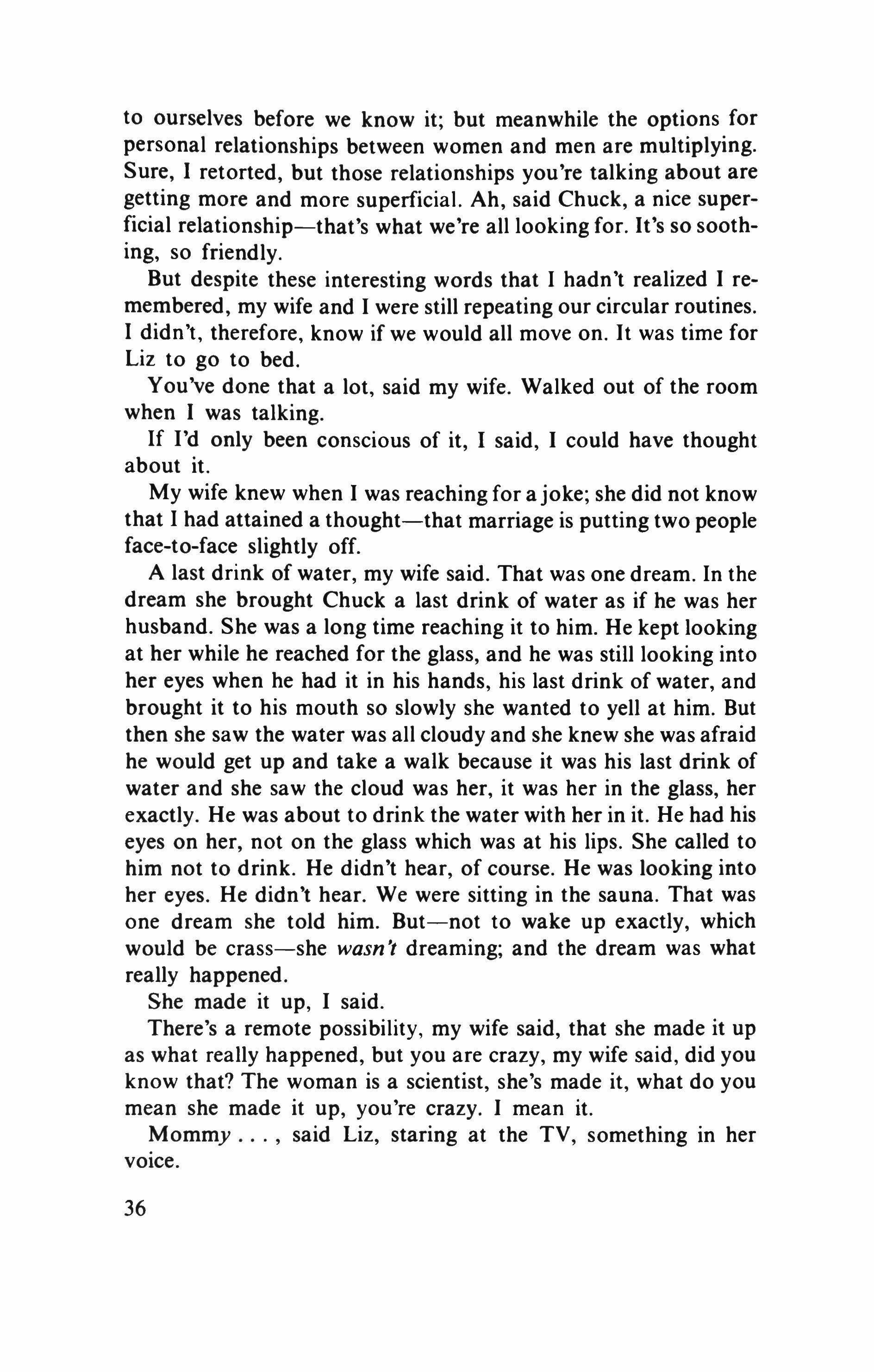
to ourselves before we know it; but meanwhile the options for personal relationships between women and men are multiplying. Sure, I retorted, but those relationships you're talking about are getting more and more superficial. Ah, said Chuck, a nice superficial relationship-that's what we're all looking for. It's so soothing, so friendly.
But despite these interesting words that I hadn't realized I remembered, my wife and I were still repeating our circular routines. I didn't, therefore, know if we would all move on. It was time for Liz to go to bed.
You've done that a lot, said my wife. Walked out of the room when I was talking.
If I'd only been conscious of it, I said, I could have thought about it.
My wife knew when I was reaching for a joke; she did not know that I had attained a thought-that marriage is putting two people face-to-face slightly off.
A last drink of water, my wife said. That was one dream. In the dream she brought Chuck a last drink of water as if he was her husband. She was a long time reaching it to him. He kept looking at her while he reached for the glass, and he was still looking into her eyes when he had it in his hands, his last drink of water, and brought it to his mouth so slowly she wanted to yell at him. But then she saw the water was all cloudy and she knew she was afraid he would get up and take a walk because it was his last drink of water and she saw the cloud was her, it was her in the glass, her exactly. He was about to drink the water with her in it. He had his eyes on her, not on the glass which was at his lips. She called to him not to drink. He didn't hear, of course. He was looking into her eyes. He didn't hear. We were sitting in the sauna. That was one dream she told him. But-not to wake up exactly, which would be crass-she wasn't dreaming; and the dream was what really happened.
She made it up, I said.
There's a remote possibility, my wife said, that she made it up as what really happened, but you are crazy, my wife said, did you know that? The woman is a scientist, she's made it, what do you mean she made it up, you're crazy. I mean it.
Mommy said Liz, staring at the TV, something in her voice.
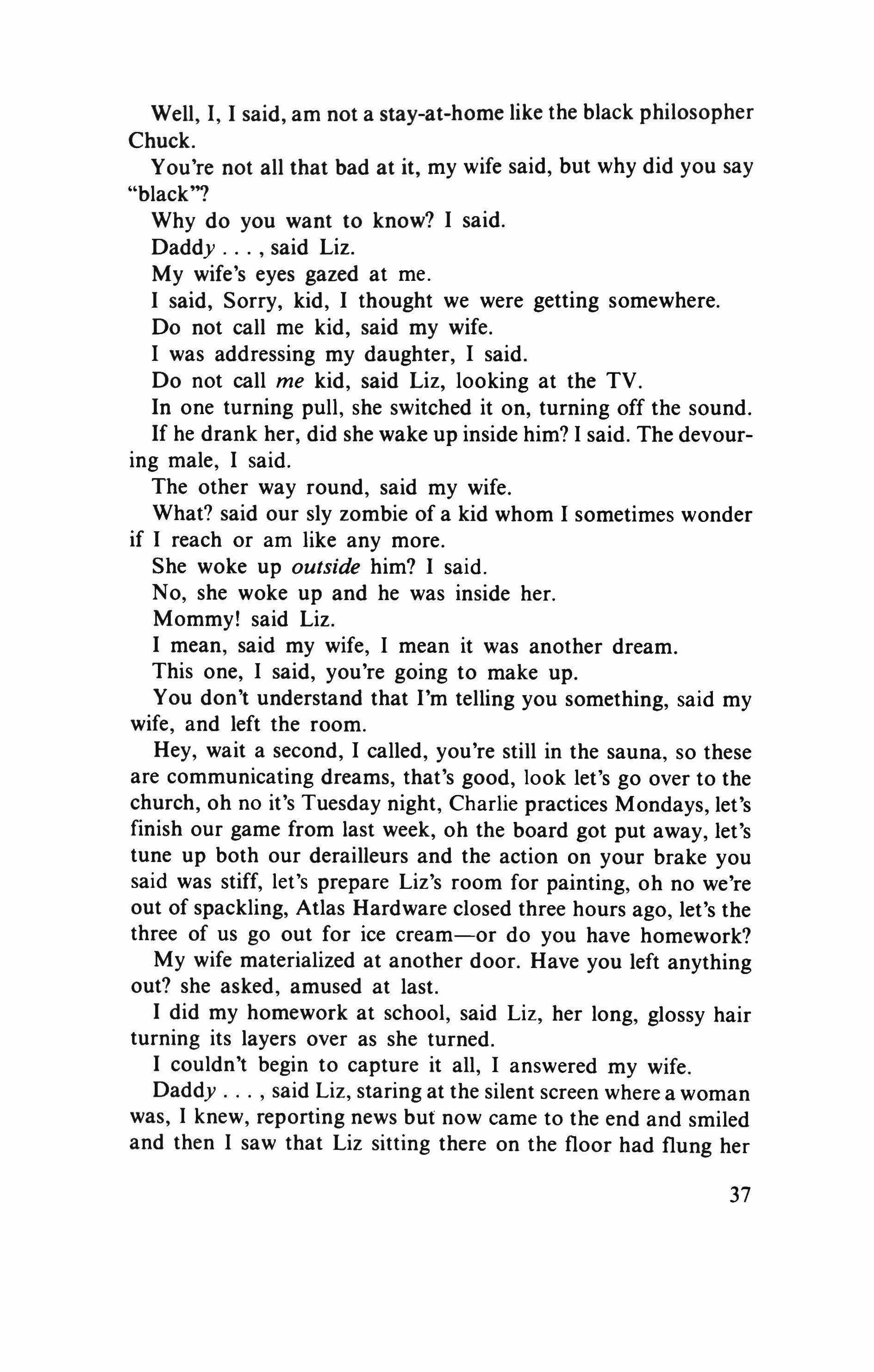
Well, I, I said, am not a stay-at-home like the black philosopher Chuck.
You're not all that bad at it, my wife said, but why did you say "black"?
Why do you want to know? I said.
Daddy said Liz.
My wife's eyes gazed at me.
I said, Sorry, kid, I thought we were getting somewhere. Do not call me kid, said my wife.
I was addressing my daughter, I said.
Do not call me kid, said Liz, looking at the TV.
In one turning pull, she switched it on, turning off the sound. If he drank her, did she wake up inside him? I said. The devouring male, I said.
The other way round, said my wife.
What? said our sly zombie of a kid whom I sometimes wonder if I reach or am like any more.
She woke up outside him? I said.
No, she woke up and he was inside her.
Mommy! said Liz.
I mean, said my wife, I mean it was another dream.
This one, I said, you're going to make up.
You don't understand that I'm telling you something, said my wife, and left the room.
Hey, wait a second, I called, you're still in the sauna, so these are communicating dreams, that's good, look let's go over to the church, oh no it's Tuesday night, Charlie practices Mondays, let's finish our game from last week, oh the board got put away, let's tune up both our derailleurs and the action on your brake you said was stiff, let's prepare Liz's room for painting, oh no we're out of spackling, Atlas Hardware closed three hours ago, let's the three of us go out for ice cream-or do you have homework?
My wife materialized at another door. Have you left anything out? she asked, amused at last.
I did my homework at school, said Liz, her long, glossy hair turning its layers over as she turned.
I couldn't begin to capture it all, I answered my wife.
Daddy said Liz, staring at the silent screen where a woman was, I knew, reporting news but now came to the end and smiled and then I saw that Liz sitting there on the floor had flung her
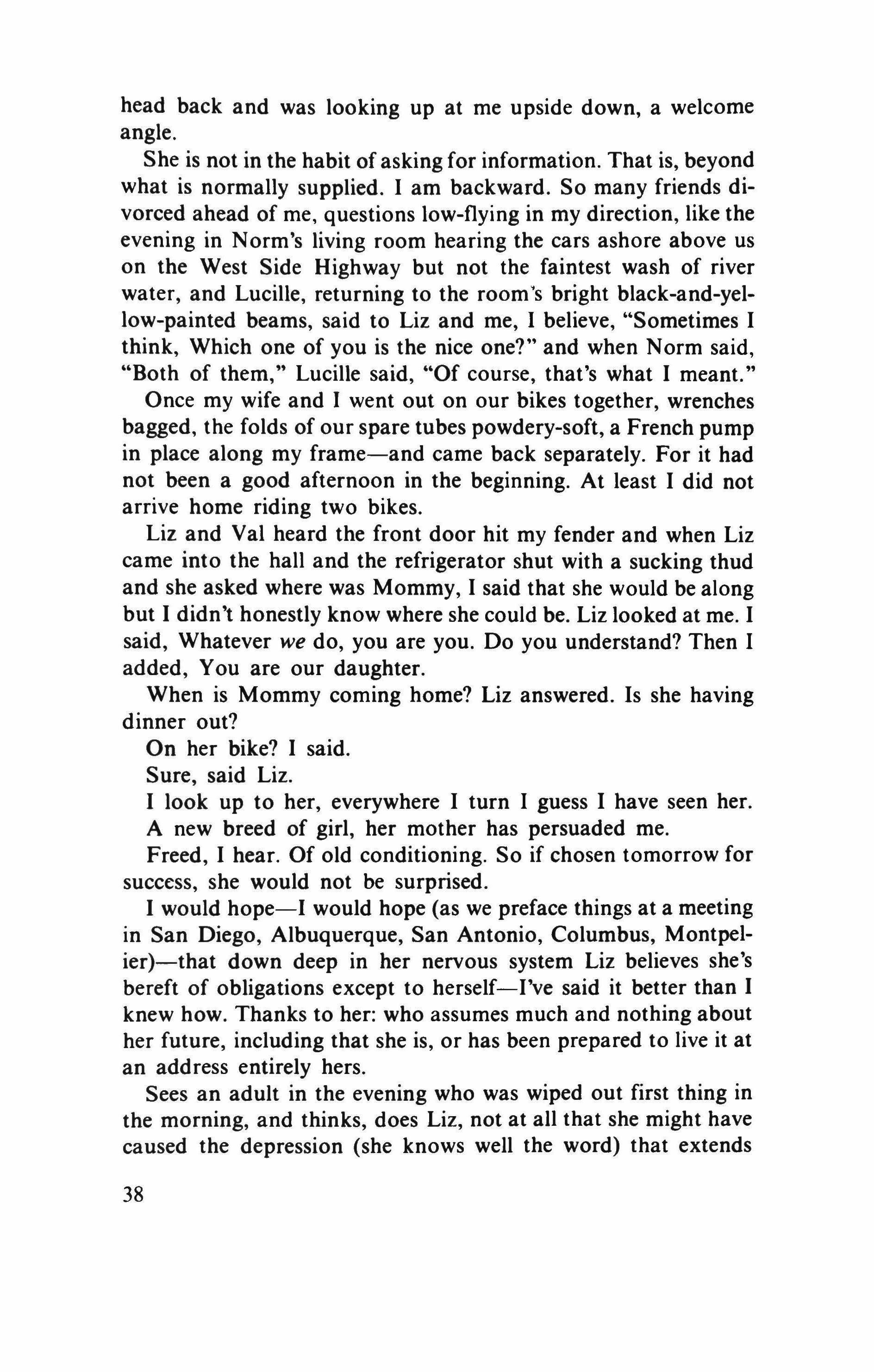
head back and was looking up at me upside down, a welcome angle.
She is not in the habit of asking for information. That is, beyond what is normally supplied. I am backward. So many friends divorced ahead of me, questions low-flying in my direction, like the evening in Norm's living room hearing the cars ashore above us on the West Side Highway but not the faintest wash of river water, and Lucille, returning to the room's bright black-and-yellow-painted beams, said to Liz and me, I believe, "Sometimes I think, Which one of you is the nice one?" and when Norm said, "Both of them," Lucille said, "Of course, that's what I meant."
Once my wife and I went out on our bikes together, wrenches bagged, the folds of our spare tubes powdery-soft, a French pump in place along my frame-and came back separately. For it had not been a good afternoon in the beginning. At least I did not arrive home riding two bikes.
Liz and Val heard the front door hit my fender and when Liz came into the hall and the refrigerator shut with a sucking thud and she asked where was Mommy, I said that she would be along but I didn't honestly know where she could be. Liz looked at me. I said, Whatever we do, you are you. Do you understand? Then I added, You are our daughter.
When is Mommy coming home? Liz answered. Is she having dinner out?
On her bike? I said.
Sure, said Liz.
I look up to her, everywhere I turn I guess I have seen her.
A new breed of girl, her mother has persuaded me.
Freed, I hear. Of old conditioning. So if chosen tomorrow for success, she would not be surprised.
I would hope-I would hope (as we preface things at a meeting in San Diego, Albuquerque, San Antonio, Columbus, Montpelier)-that down deep in her nervous system Liz believes she's bereft of obligations except to herself-I've said it better than I knew how. Thanks to her: who assumes much and nothing about her future, including that she is, or has been prepared to live it at an address entirely hers.
Sees an adult in the evening who was wiped out first thing in the morning, and thinks, does Liz, not at all that she might have caused the depression (she knows well the word) that extends

hollow and banal and lasting before that adult who shall be nameless and genuinely without regard to sex, while with calm before this spectacle she lets the adult get on with it.
She does not cry except in anger, which gets exhaled and is gone. She falls into home-makerly locutions, such as asking if I will be in for dinner tonight as if she were planning the meal. Her future-what can I say? She has hidden powers. Gives good advice if approached in the right way, not as a simple adult but one to one.
I pass to and from one aerodrome or the other, promoting steel in major cities, my program mapped a month or two months in advance, yet nothing if not flexible. I wake up, having been awake deep-seated in the multiplied upholstery of a system that works, and correct my slouch, guarding my lower back as a thing, a being, a moral that could come true. I straighten up and then I squeeze back my shoulders and I arch my spine; time empties in front of me along its main, and its overhead and cupped sides pave my way beyond me with what you think's an elusive new material, you see through it, so the main is known to be there and you to be in it but you don't exactly see it, and that goes for the bends up ahead, the turns built into it tunneled into the mountainous field through which time never knows itself.
Or am I a new breed of man, hearing my lies yet clear that they are not-and believing them so very honest I then doubt.
Chuck the philosopher's wife has her dream. She does well to share it. I have mine. Or, rather, Liz's. Cupped in the middle of the night in my one unpillowed ear. Not like the answer I got at dinner when, just the two of us, I'd asked if she felt Val's parents were different from her own, more strict, more together, that kind of thing; and she said, No, she didn't think so, not much; and I said did they have fights? She guessed so, sometimes. And did Val, I asked boringly, mind her mother working? Sometimes, not really.
And what was it like having two high-pitched parents? You? she said.
Which parents was I talking about? she asked, smiling with one side of her mouth-what's for dessert?
Yogurt on a stick, I said-raspberry. The phone rang, Liz talked to Val. We had dessert, Liz and I. ! asked her, What is this topology you study in math? I had become curious.
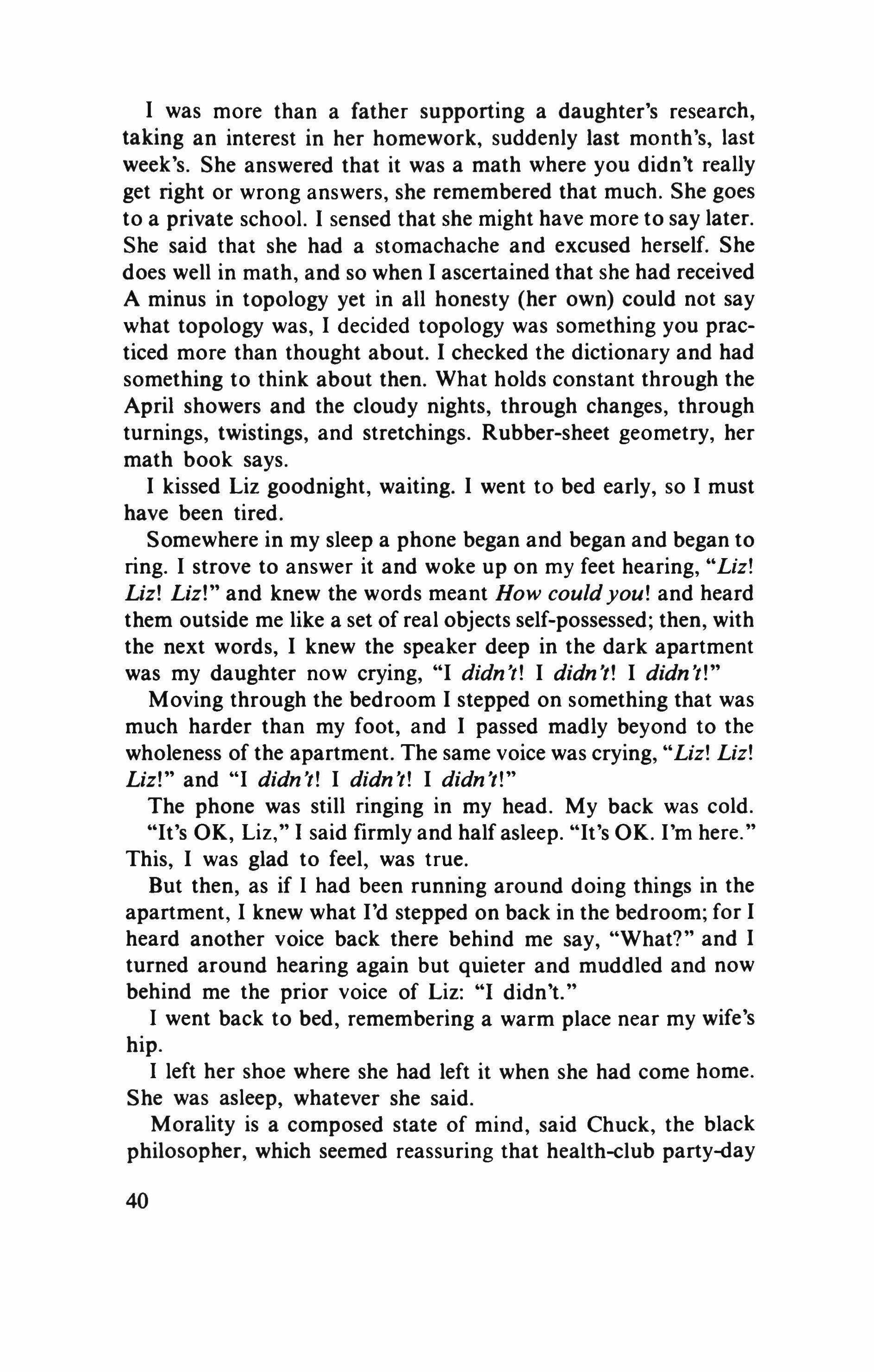
1 was more than a father supporting a daughter's research, taking an interest in her homework, suddenly last month's, last week's. She answered that it was a math where you didn't really get right or wrong answers, she remembered that much. She goes to a private school. 1 sensed that she might have more to say later. She said that she had a stomachache and excused herself. She does well in math, and so when 1 ascertained that she had received A minus in topology yet in all honesty (her own) could not say what topology was, 1 decided topology was something you practiced more than thought about. 1 checked the dictionary and had something to think about then. What holds constant through the April showers and the cloudy nights, through changes, through turnings, twistings, and stretchings. Rubber-sheet geometry, her math book says.
1 kissed Liz goodnight, waiting. 1 went to bed early, so 1 must have been tired.
Somewhere in my sleep a phone began and began and began to ring. 1 strove to answer it and woke up on my feet hearing, "Liz! Liz! Liz!" and knew the words meant How couldyou! and heard them outside me like a set of real objects self-possessed; then, with the next words, 1 knew the speaker deep in the dark apartment was my daughter now crying, "I didn't! 1 didn't! 1 didn't!"
Moving through the bedroom 1 stepped on something that was much harder than my foot, and 1 passed madly beyond to the wholeness of the apartment. The same voice was crying, "Liz! Liz! Liz!" and "I didn't! I didn't! I didn't!"
The phone was still ringing in my head. My back was cold. "It's OK, Liz," 1 said firmly and half asleep. "It's OK. I'm here." This, I was glad to feel, was true.
But then, as if 1 had been running around doing things in the apartment, I knew what I'd stepped on back in the bedroom; for I heard another voice back there behind me say, "What?" and I turned around hearing again but quieter and muddled and now behind me the prior voice of Liz: "I didn't."
I went back to bed, remembering a warm place near my wife's hip.
1 left her shoe where she had left it when she had come home. She was asleep, whatever she said.
Morality is a composed state of mind, said Chuck, the black philosopher, which seemed reassuring that health-club party-day
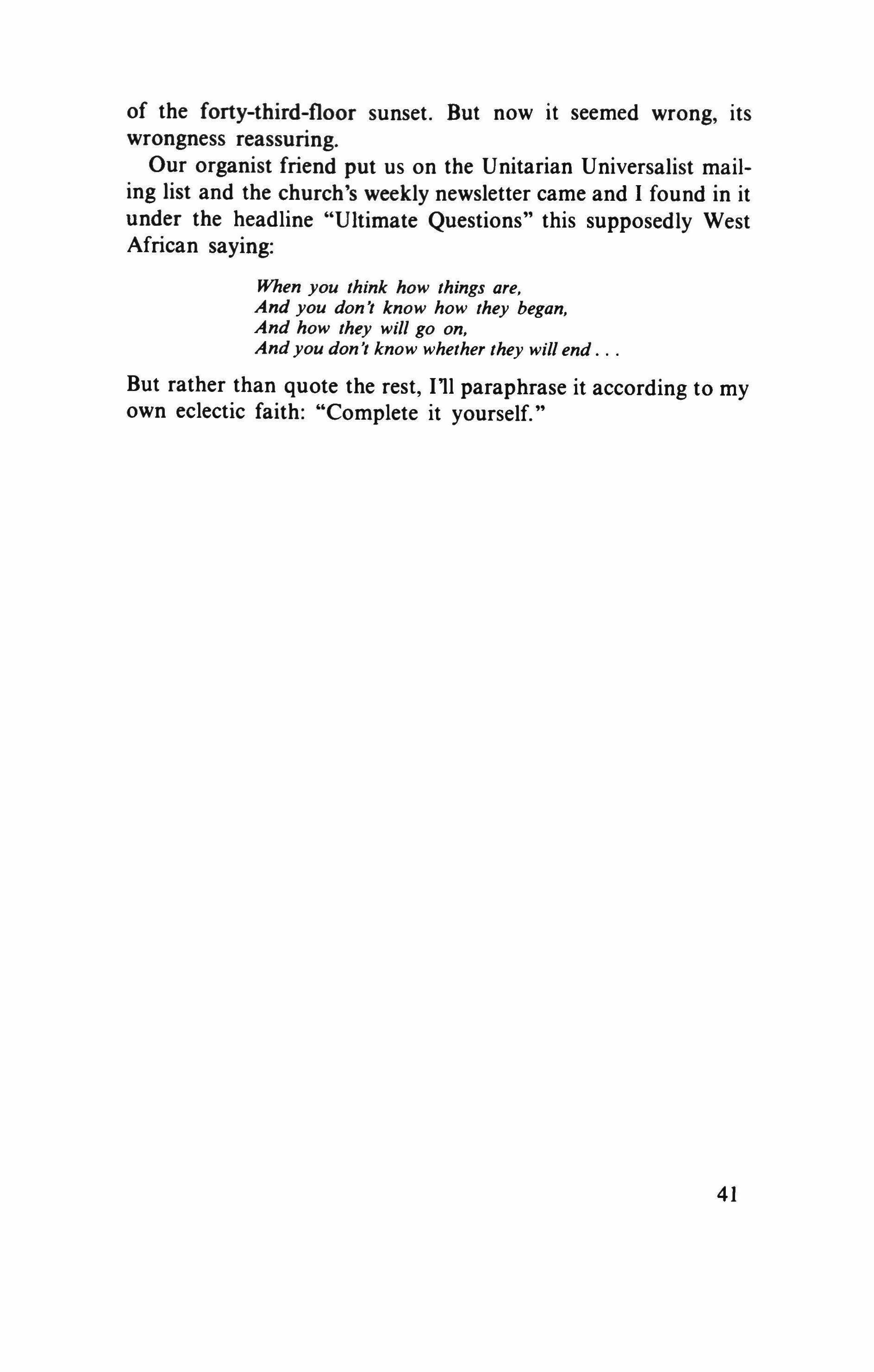
of the forty-third-floor sunset. But now it seemed wrong, its wrongness reassuring.
Our organist friend put us on the Unitarian Universalist mailing list and the church's weekly newsletter came and I found in it under the headline "Ultimate Questions" this supposedly West African saying:
When you think how things are, And you don't know how they began, And how they will go on, And you don't know whether they will end
But rather than quote the rest, 111 paraphrase it according to my own eclectic faith: "Complete it yourself."
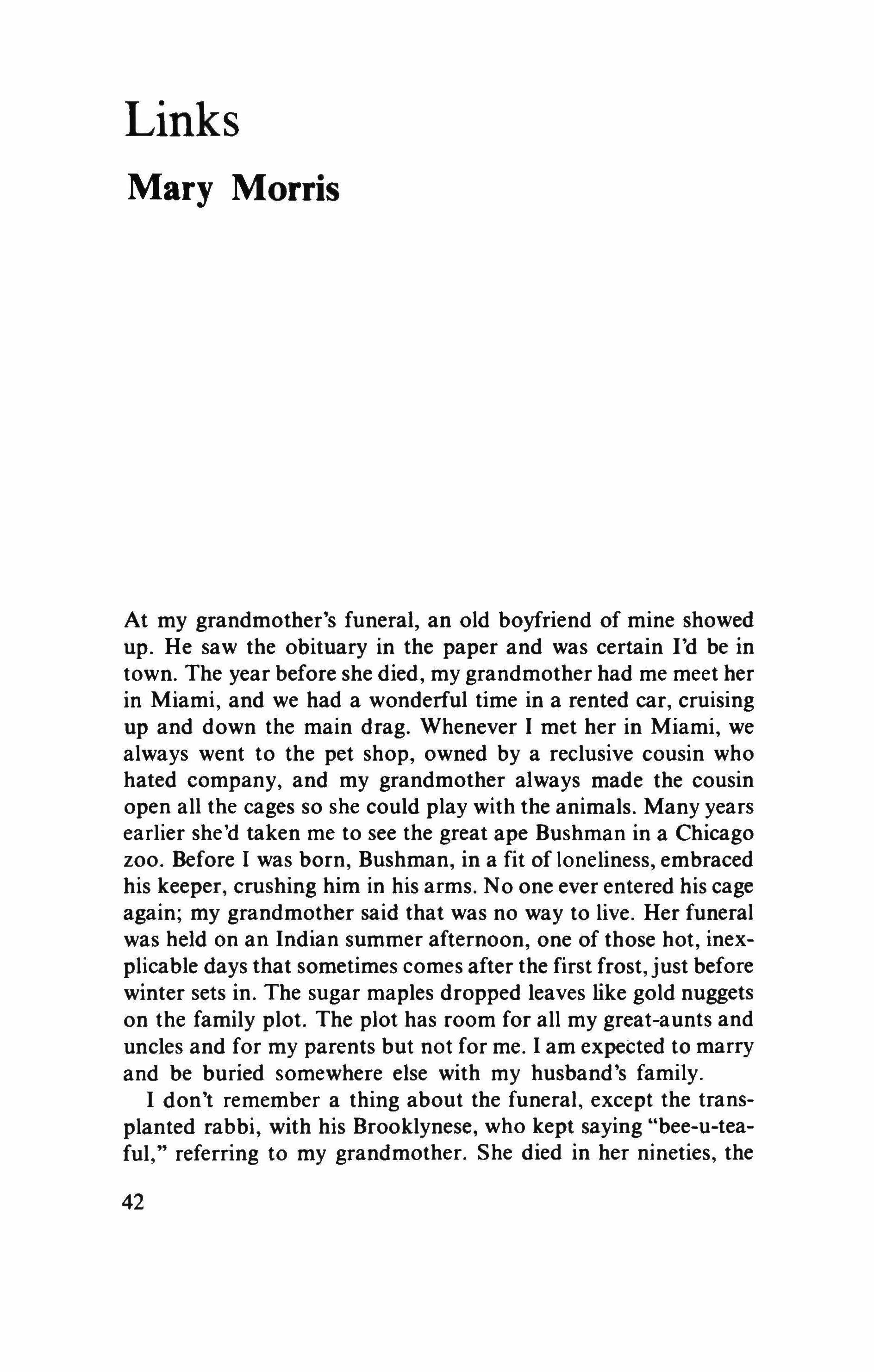
At my grandmother's funeral, an old boyfriend of mine showed up. He saw the obituary in the paper and was certain I'd be in town. The year before she died, my grandmother had me meet her in Miami, and we had a wonderful time in a rented car, cruising up and down the main drag. Whenever I met her in Miami, we always went to the pet shop, owned by a reclusive cousin who hated company, and my grandmother always made the cousin open all the cages so she could play with the animals. Many years earlier she'd taken me to see the great ape Bushman in a Chicago zoo. Before I was born, Bushman, in a fit of loneliness, embraced his keeper, crushing him in his arms. No one ever entered his cage again; my grandmother said that was no way to live. Her funeral was held on an Indian summer afternoon, one of those hot, inexplicable days that sometimes comes after the first frost,just before winter sets in. The sugar maples dropped leaves like gold nuggets on the family plot. The plot has room for all my great-aunts and uncles and for my parents but not for me. I am expected to marry and be buried somewhere else with my husband's family.
I don't remember a thing about the funeral, except the transplanted rabbi, with his Brooklynese, who kept saying "bee-u-teaful," referring to my grandmother. She died in her nineties, the
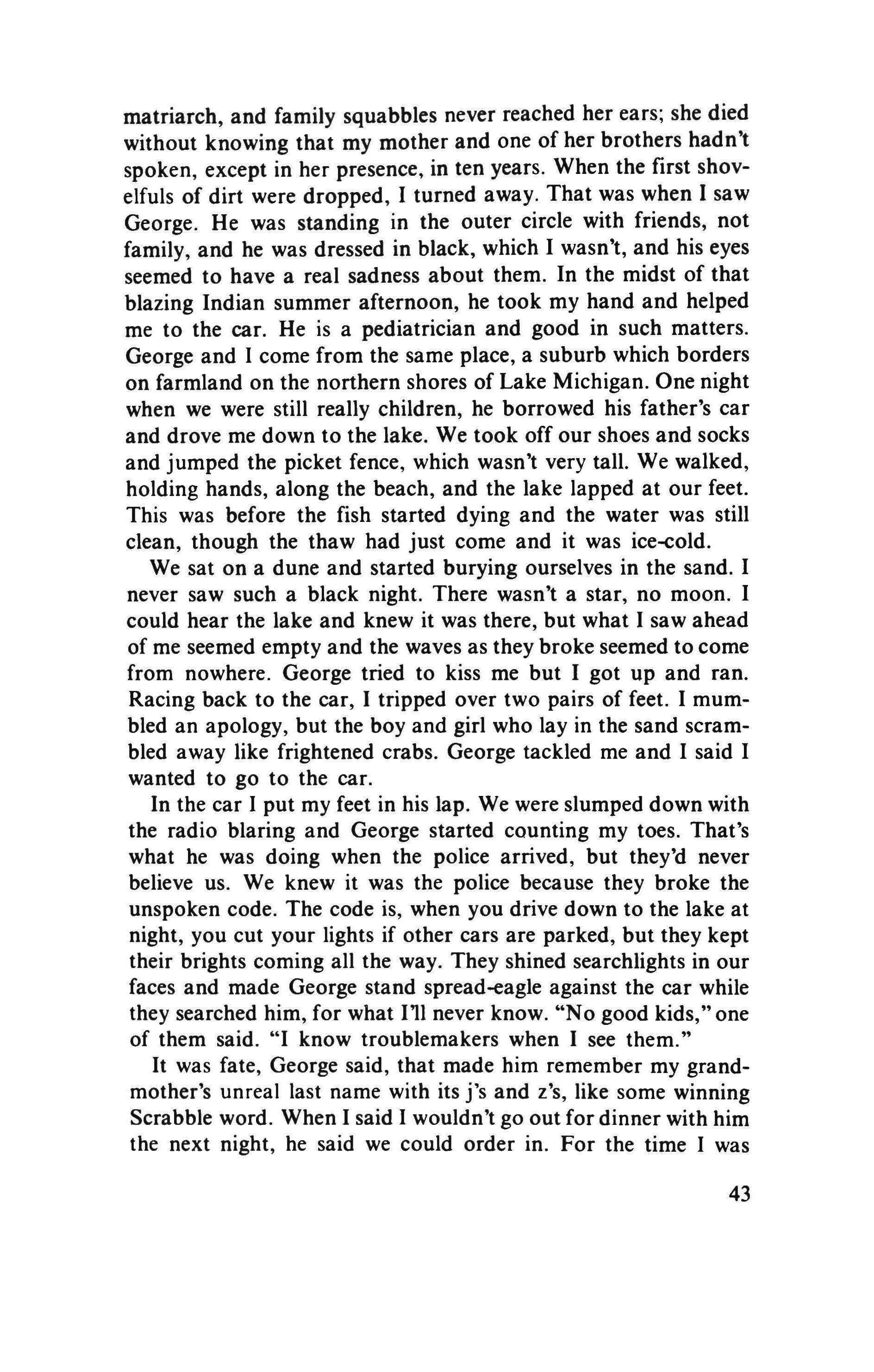
matriarch, and family squabbles never reached her ears; she died without knowing that my mother and one of her brothers hadn't spoken, except in her presence, in ten years. When the first shovelfuls of dirt were dropped, I turned away. That was when I saw George. He was standing in the outer circle with friends, not family, and he was dressed in black, which I wasn't, and his eyes seemed to have a real sadness about them. In the midst of that blazing Indian summer afternoon, he took my hand and helped me to the car. He is a pediatrician and good in such matters. George and I come from the same place, a suburb which borders on farmland on the northern shores of Lake Michigan. One night when we were still really children, he borrowed his father's car and drove me down to the lake. We took off our shoes and socks and jumped the picket fence, which wasn't very tall. We walked, holding hands, along the beach, and the lake lapped at our feet. This was before the fish started dying and the water was still clean, though the thaw had just come and it was ice-cold.
We sat on a dune and started burying ourselves in the sand. I never saw such a black night. There wasn't a star, no moon. I could hear the lake and knew it was there, but what I saw ahead of me seemed empty and the waves as they broke seemed to come from nowhere. George tried to kiss me but I got up and ran. Racing back to the car, I tripped over two pairs of feet. I mumbled an apology, but the boy and girl who lay in the sand scrambled away like frightened crabs. George tackled me and I said I wanted to go to the car.
In the car I put my feet in his lap. We were slumped down with the radio blaring and George started counting my toes. That's what he was doing when the police arrived, but they'd never believe us. We knew it was the police because they broke the unspoken code. The code is, when you drive down to the lake at night, you cut your lights if other cars are parked, but they kept their brights coming all the way. They shined searchlights in our faces and made George stand spread-eagle against the car while they searched him, for what 111 never know. "No good kids," one of them said. "I know troublemakers when I see them."
It was fate, George said, that made him remember my grandmother's unreal last name with its j's and z's, like some winning Scrabble word. When I said I wouldn't go out for dinner with him the next night, he said we could order in. For the time I was

home, I convinced my family to let me stay in my grandmother's apartment, where she'd lived alone for the forty-odd years of her widowhood. I knew I was the one to put her things in order because I traveled with her to Florida and was always with her when she visited the animals. I was also the last one to see her alive. I was bound to her, perhaps more than any other member of the clan, whose extended numbers reached into the hundreds. My grandmother was keeper of the family archive; she had the classificatory abilities of a Linnaeus and knew where everyone was and with whom. She came to America with a dozen brothers and sisters. There had been four sets of twins and some of the twins never married but lived until they died with their twin. My grandmother's twin died of pneumonia when she was three weeks old. She was the only child who died young on that side of the family, and I am named for her. I've always felt myself bound to my grandmother as twins are bound.
The next night George watched patiently as I started sorting my grandmother's things. He'd come straight from the office and arrived in a bad mood. I told him to relax and he took off his jacket, tie, and cuff links. He hung up his jacket and tie and left the cuff links on the dresser. He took off his shoes and flopped on the bed, listening to the news. I laid out the boas, an old lace-up corset, high-button shoes. I started putting on her things. The lace-up corset, which George helped me tighten over my clothes, felt like a straitjacket. A call came in for Dr. Ringer. George spoke in a muffled voice and you could tell from his eyes that he was making a terrible diagnosis. Then my parents called. "You shouldn't stay there alone," my mother said. I told her I wasn't alone. "It's not right. There are people who want to see you." She held the receiver in the air so I could hear the rumblings of relatives in the background. My father snatched the phone from her hands. "What are you doing there by yourself?" I told him I had company. "What kind of company?" he grumbled. It was my mother's mother who died, but my father was as irritable as he was when anything threatened to touch him personally. I couldn't tell him I was with George; he still held it against George that he'd gotten me booked on a vagrancy charge fifteen years ago and that because of him I held a police record. I evoked instead old girl friends, wives living now in the suburbs, who'd left husbands and children to share my grief.

After talking to him, I accidentally packed George's cuff links away with my grandmother's jewelry. We spent part of the evening searching for them because I had no recollection of putting them away. They were a gift from a woman he'd just stopped living with and he said they had sentimental value. They were solid gold cuff links with an Indian chief carved on them in full headdress, a once great warrior perhaps, the kind from old nickels or the fronts of trading posts. I could tell by how badly he wanted to find them that the woman was still somehow important to him, but I didn't ask about her. I just helped him look. After we found them in the box I'd packed them in, he relaxed. He phoned Shang'hai and ordered Cantonese food. He liked sweet and sour shrimp crisp with a special sauce, and he pressed my ear to the phone so I could hear the man say "yesa, Doca Linga." When the shrimp arrived, I decided we couldn't eat it on my grandmother's plates-kosher for seventy-five years. George said I was being sentimental about something I didn't believe in, but I told him I didn't think he was being sentimental about his cuff links. He knew he didn't have a leg to stand on so he went out for paper plates and plastic forks. While he was gone, I missed him. I hadn't missed a man for a long time and it seemed as if we'd finally been brought together so many years after two policemen, with nothing better to do, had wrenched us apart.
After dinner we turned on my grandmother's television set and stretched out on the four-poster. Little wood nymphs, cupids really, hand carved, stood guard on top of each poster. My mother said it was a pagan bed and the antithesis of my grandmother. My only girl cousin and I used to build forts out of pillows and blankets to keep the Indians away. It was a big bed, and lying on it I always felt you had to shout to be heard. George knew I didn't want to be alone and so he agreed to spend the night. He was very tired and slept in his clothes on top of the covers. I slept with my head on his arm and periodically he clasped me to him like a child with a rag doll. He ran his fingers through my hair as if he were looking for something. We'd never been lovers and I'm fairly certain it hadn't crossed our minds when we were younger. George played baseball for Ohio during college and two or three times a year during the season, he came to play in Boston and he stayed with me. One afternoon when the magnolias were blooming, we walked toward the Square, wander-
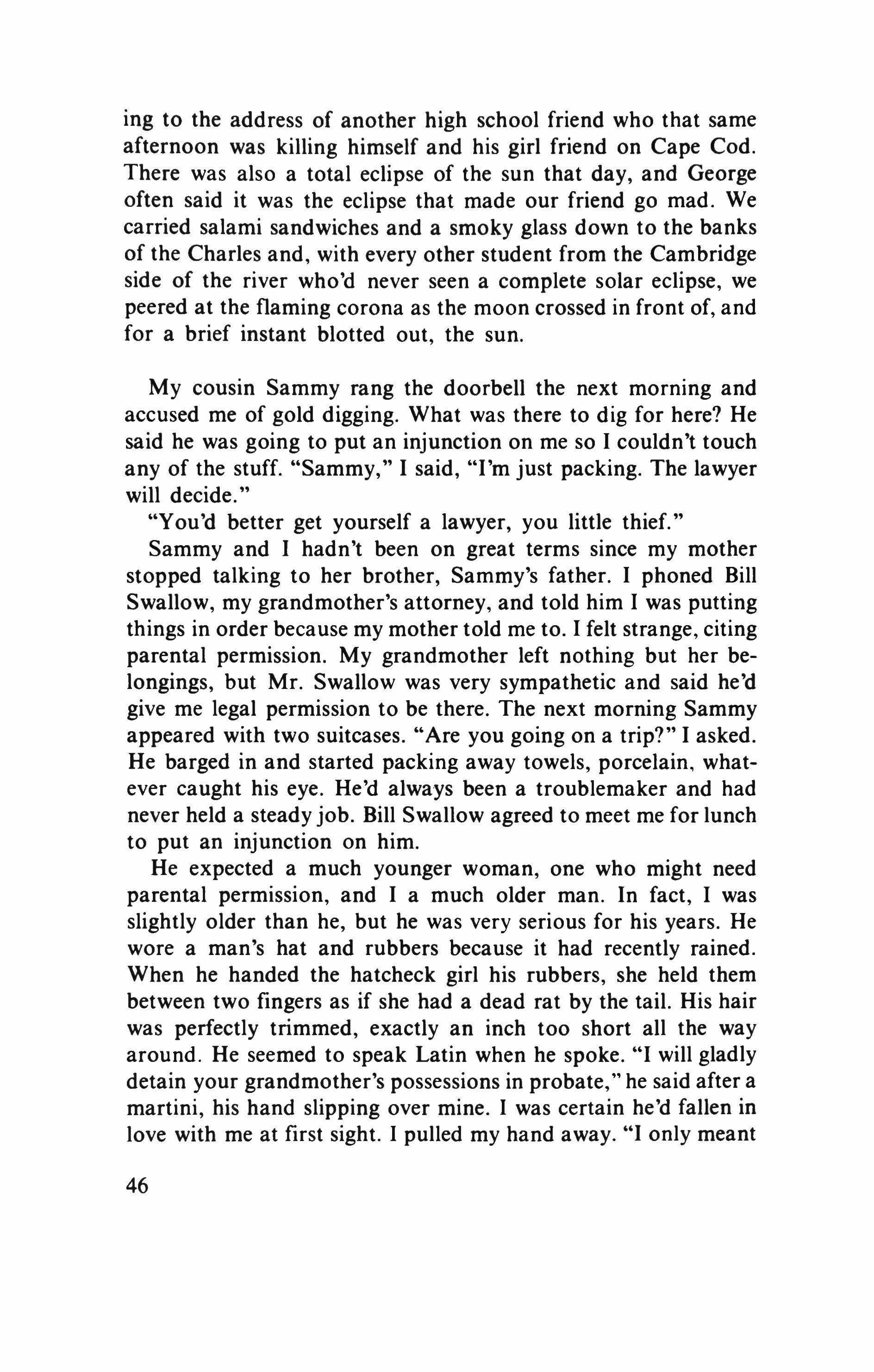
ing to the address of another high school friend who that same afternoon was killing himself and his girl friend on Cape Cod. There was also a total eclipse of the sun that day, and George often said it was the eclipse that made our friend go mad. We carried salami sandwiches and a smoky glass down to the banks of the Charles and, with every other student from the Cambridge side of the river who'd never seen a complete solar eclipse, we peered at the flaming corona as the moon crossed in front of, and for a brief instant blotted out, the sun.
My cousin Sammy rang the doorbell the next morning and accused me of gold digging. What was there to dig for here? He said he was going to put an injunction on me so I couldn't touch any of the stuff. "Sammy," I said, "I'm just packing. The lawyer will decide."
"You'd better get yourself a lawyer, you little thief."
Sammy and I hadn't been on great terms since my mother stopped talking to her brother, Sammy's father. I phoned Bill Swallow, my grandmother's attorney, and told him I was putting things in order because my mother told me to. I felt strange, citing parental permission. My grandmother left nothing but her belongings, but Mr. Swallow was very sympathetic and said he'd give me legal permission to be there. The next morning Sammy appeared with two suitcases. "Are you going on a trip?" I asked. He barged in and started packing away towels, porcelain, whatever caught his eye. He'd always been a troublemaker and had never held a steady job. Bill Swallow agreed to meet me for lunch to put an injunction on him.
He expected a much younger woman, one who might need parental permission, and I a much older man. In fact, I was slightly older than he, but he was very serious for his years. He wore a man's hat and rubbers because it had recently rained. When he handed the hatcheck girl his rubbers, she held them between two fingers as if she had a dead rat by the tail. His hair was perfectly trimmed, exactly an inch too short all the way around. He seemed to speak Latin when he spoke. "I will gladly detain your grandmother's possessions in probate," he said after a martini, his hand slipping over mine. I was certain he'd fallen in love with me at first sight. I pulled my hand away. "I only meant
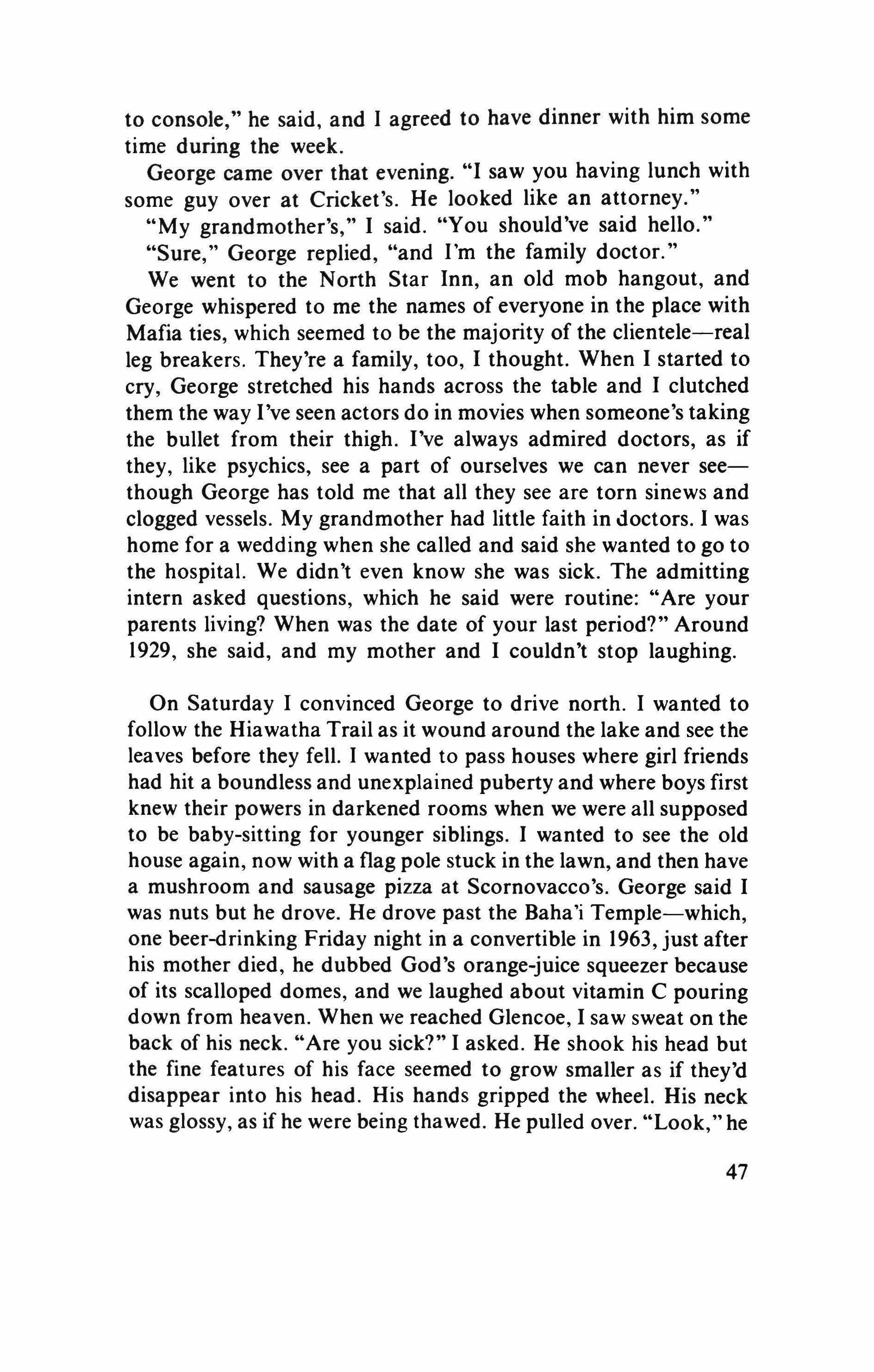
to console," he said, and I agreed to have dinner with him some time during the week.
George came over that evening. "I saw you having lunch with some guy over at Cricket's. He looked like an attorney."
"My grandmother's," 1 said. "You should've said hello." "Sure," George replied, "and I'm the family doctor."
We went to the North Star Inn, an old mob hangout, and George whispered to me the names of everyone in the place with Mafia ties, which seemed to be the majority of the clientele-real leg breakers. They're a family, too, I thought. When 1 started to cry, George stretched his hands across the table and 1 clutched them the way I've seen actors do in movies when someone's taking the bullet from their thigh. I've always admired doctors, as if they, like psychics, see a part of ourselves we can never seethough George has told me that all they see are torn sinews and clogged vessels. My grandmother had little faith in doctors. I was home for a wedding when she called and said she wanted to go to the hospital. We didn't even know she was sick. The admitting intern asked questions, which he said were routine: "Are your parents living? When was the date of your last period?" Around 1929, she said, and my mother and I couldn't stop laughing.
On Saturday I convinced George to drive north. I wanted to follow the Hiawatha Trail as it wound around the lake and see the leaves before they fell. I wanted to pass houses where girl friends had hit a boundless and unexplained puberty and where boys first knew their powers in darkened rooms when we were all supposed to be baby-sitting for younger siblings. I wanted to see the old house again, now with a flag pole stuck in the lawn, and then have a mushroom and sausage pizza at Scornovacco's. George said I was nuts but he drove. He drove past the Baha'i Temple-which, one beer-drinking Friday night in a convertible in 1963, just after his mother died, he dubbed God's orange-juice squeezer because of its scalloped domes, and we laughed about vitamin C pouring down from heaven. When we reached Glencoe, I saw sweat on the back of his neck. "Are you sick?" I asked. He shook his head but the fine features of his face seemed to grow smaller as if they'd disappear into his head. His hands gripped the wheel. His neck was glossy, as if he were being thawed. He pulled over. "Look," he
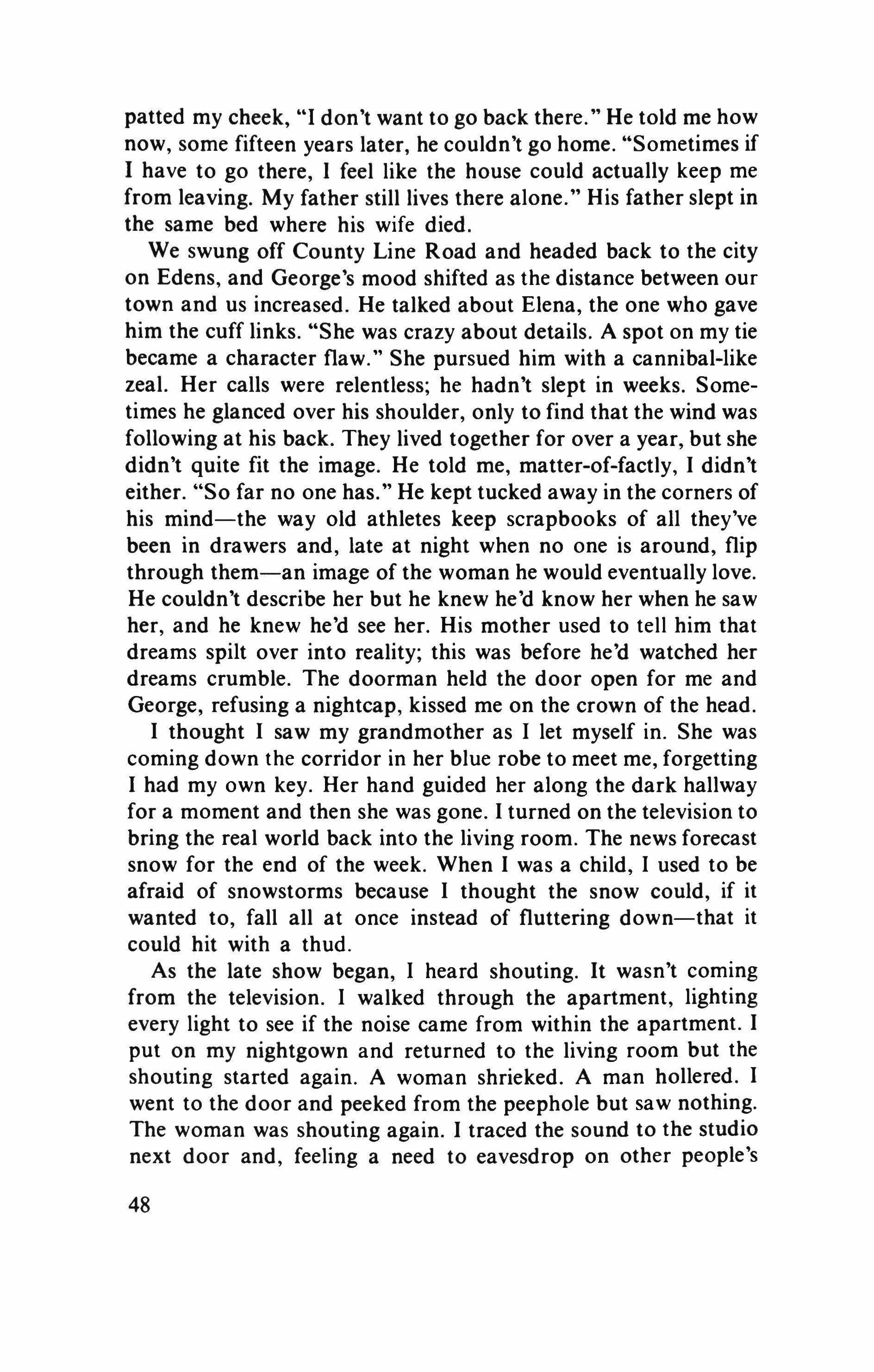
patted my cheek, "I don't want to go back there." He told me how now, some fifteen years later, he couldn't go home. "Sometimes if I have to go there, 1 feel like the house could actually keep me from leaving. My father still lives there alone." His father slept in the same bed where his wife died.
We swung off County Line Road and headed back to the city on Edens, and George's mood shifted as the distance between our town and us increased. He talked about Elena, the one who gave him the cuff links. "She was crazy about details. A spot on my tie became a character flaw." She pursued him with a cannibal-like zeal. Her calls were relentless; he hadn't slept in weeks. Sometimes he glanced over his shoulder, only to find that the wind was following at his back. They lived together for over a year, but she didn't quite fit the image. He told me, matter-of-factly, 1 didn't either. "So far no one has." He kept tucked away in the corners of his mind-the way old athletes keep scrapbooks of all they've been in drawers and, late at night when no one is around, flip through them-an image of the woman he would eventually love. He couldn't describe her but he knew he'd know her when he saw her, and he knew he'd see her. His mother used to tell him that dreams spilt over into reality; this was before he'd watched her dreams crumble. The doorman held the door open for me and George, refusing a nightcap, kissed me on the crown of the head.
1 thought 1 saw my grandmother as 1 let myself in. She was coming down the corridor in her blue robe to meet me, forgetting 1 had my own key. Her hand guided her along the dark hallway for a moment and then she was gone. 1 turned on the television to bring the real world back into the living room. The news forecast snow for the end of the week. When 1 was a child, 1 used to be afraid of snowstorms because 1 thought the snow could, if it wanted to, fall all at once instead of fluttering down-that it could hit with a thud.
As the late show began, 1 heard shouting. It wasn't coming from the television. 1 walked through the apartment, lighting every light to see if the noise came from within the apartment. 1 put on my nightgown and returned to the living room but the shouting started again. A woman shrieked. A man hollered. 1 went to the door and peeked from the peephole but saw nothing. The woman was shouting again. 1 traced the sound to the studio next door and, feeling a need to eavesdrop on other people's
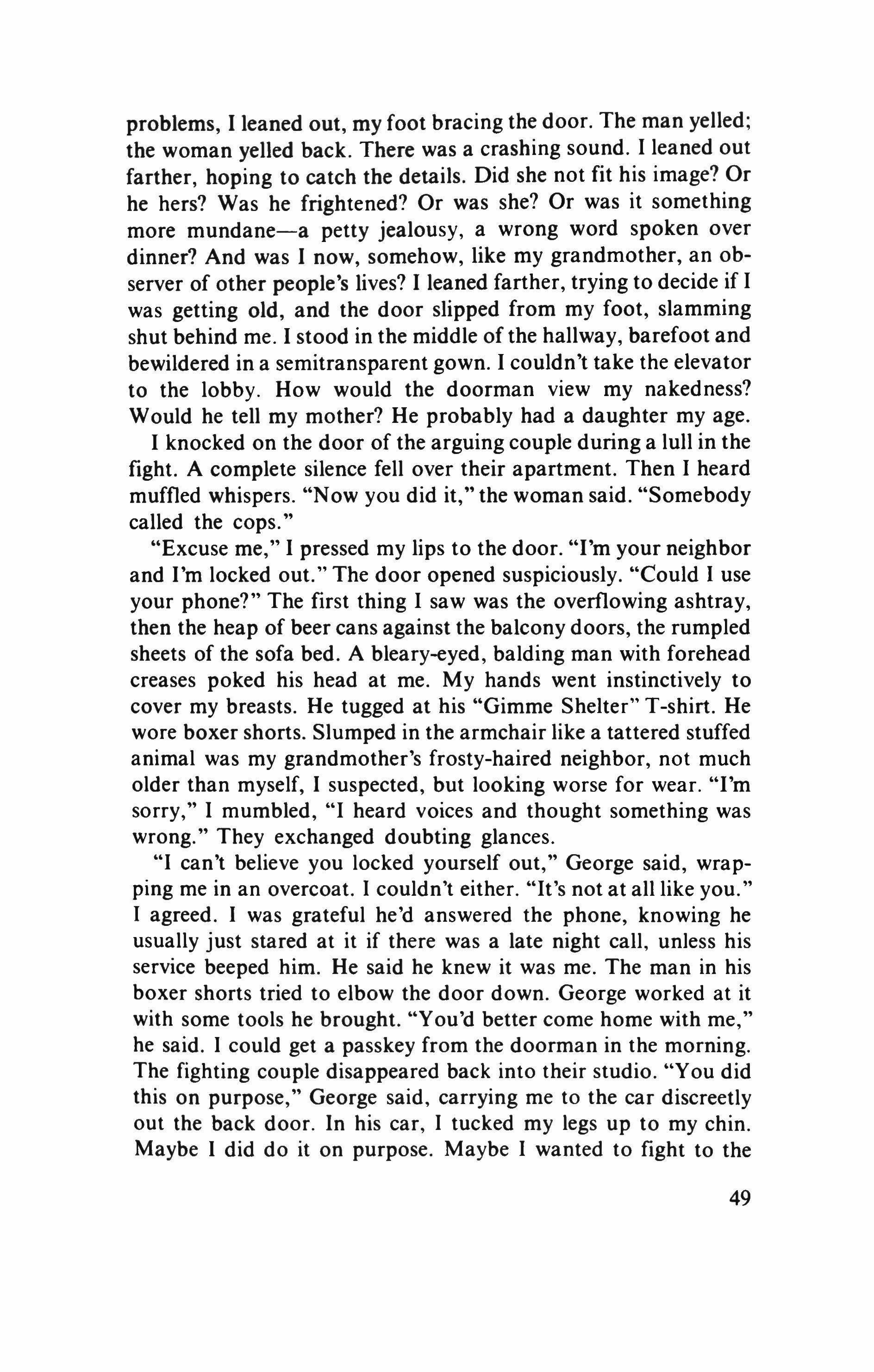
problems, I leaned out, my foot bracing the door. The man yelled; the woman yelled back. There was a crashing sound. I leaned out farther, hoping to catch the details. Did she not fit his image? Or he hers? Was he frightened? Or was she? Or was it something more mundane-a petty jealousy, a wrong word spoken over dinner? And was I now, somehow, like my grandmother, an observer of other people's lives? I leaned farther, trying to decide if I was getting old, and the door slipped from my foot, slamming shut behind me. I stood in the middle of the hallway, barefoot and bewildered in a semitransparent gown. I couldn't take the elevator to the lobby. How would the doorman view my nakedness? Would he tell my mother? He probably had a daughter my age. I knocked on the door of the arguing couple during a lull in the fight. A complete silence fell over their apartment. Then I heard muffled whispers. "Now you did it," the woman said. "Somebody called the cops."
"Excuse me," I pressed my lips to the door. "I'm your neighbor and I'm locked out." The door opened suspiciously. "Could I use your phone?" The first thing I saw was the overflowing ashtray, then the heap of beer cans against the balcony doors, the rumpled sheets of the sofa bed. A bleary-eyed, balding man with forehead creases poked his head at me. My hands went instinctively to cover my breasts. He tugged at his "Gimme Shelter" T-shirt. He wore boxer shorts. Slumped in the armchair like a tattered stuffed animal was my grandmother's frosty-haired neighbor, not much older than myself, I suspected, but looking worse for wear. "I'm sorry," I mumbled, "I heard voices and thought something was wrong." They exchanged doubting glances.
"I can't believe you locked yourself out," George said, wrapping me in an overcoat. I couldn't either. "It's not at all like you." I agreed. I was grateful he'd answered the phone, knowing he usually just stared at it if there was a late night call, unless his service beeped him. He said he knew it was me. The man in his boxer shorts tried to elbow the door down. George worked at it with some tools he brought. "You'd better come home with me," he said. I could get a passkey from the doorman in the morning. The fighting couple disappeared back into their studio. "You did this on purpose," George said, carrying me to the car discreetly out the back door. In his car, I tucked my legs up to my chin. Maybe I did do it on purpose. Maybe I wanted to fight to the
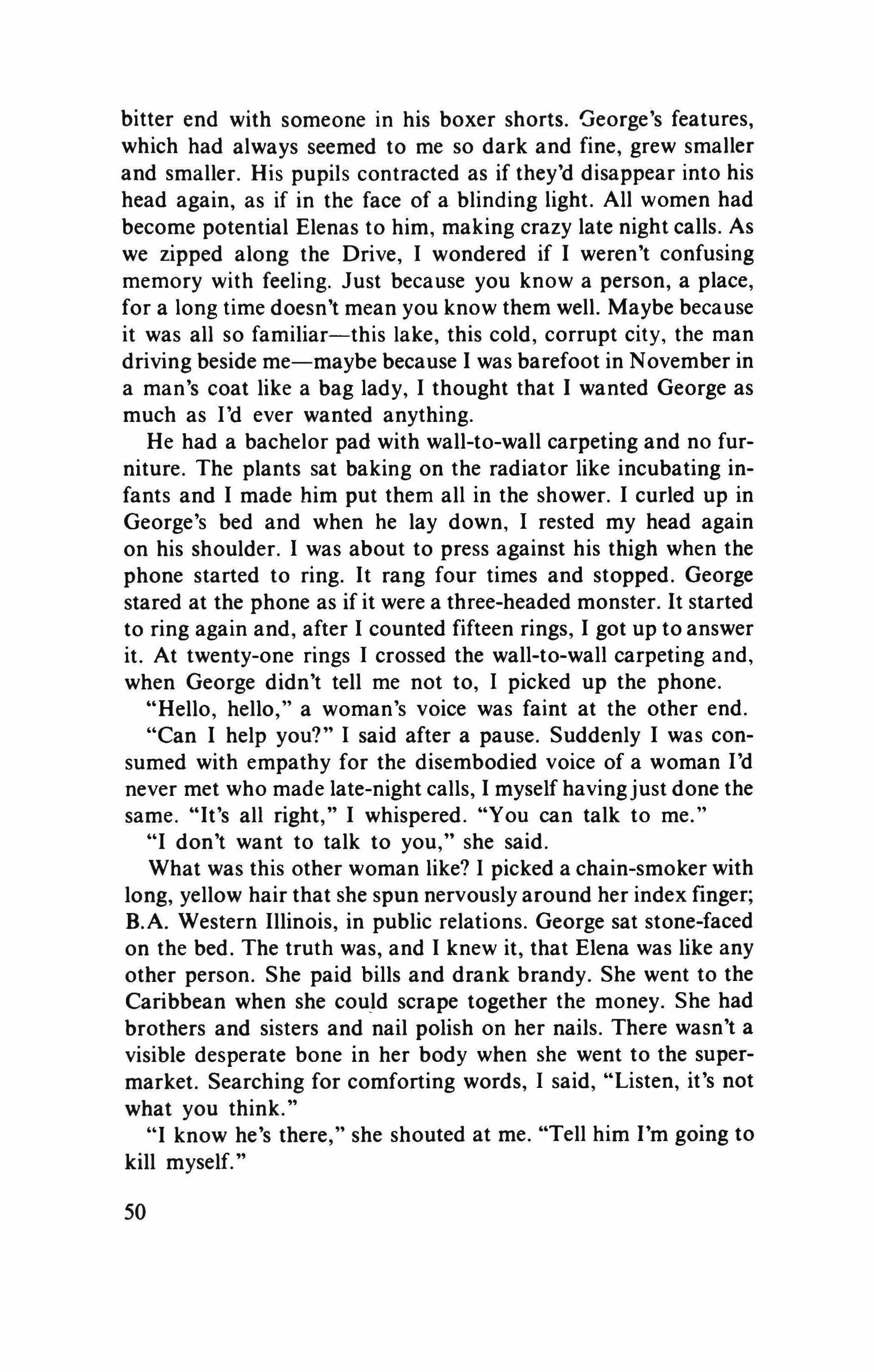
bitter end with someone in his boxer shorts. George's features, which had always seemed to me so dark and fine, grew smaller and smaller. His pupils contracted as if they'd disappear into his head again, as if in the face of a blinding light. All women had become potential Elenas to him, making crazy late night calls. As we zipped along the Drive, I wondered if I weren't confusing memory with feeling. Just because you know a person, a place, for a long time doesn't mean you know them well. Maybe because it was all so familiar-this lake, this cold, corrupt city, the man driving beside me-maybe because I was barefoot in November in a man's coat like a bag lady, I thought that I wanted George as much as I'd ever wanted anything.
He had a bachelor pad with wall-to-wall carpeting and no furniture. The plants sat baking on the radiator like incubating infants and I made him put them all in the shower. I curled up in George's bed and when he lay down, I rested my head again on his shoulder. I was about to press against his thigh when the phone started to ring. It rang four times and stopped. George stared at the phone as if it were a three-headed monster. It started to ring again and, after I counted fifteen rings, I got up to answer it. At twenty-one rings I crossed the wall-to-wall carpeting and, when George didn't tell me not to, I picked up the phone.
"Hello, hello," a woman's voice was faint at the other end.
"Can I help you?" I said after a pause. Suddenly I was consumed with empathy for the disembodied voice of a woman I'd never met who made late-night calls, I myself havingjust done the same. "It's all right," I whispered. "You can talk to me."
"I don't want to talk to you," she said.
What was this other woman like? I picked a chain-smoker with long, yellow hair that she spun nervously around her index finger; B.A. Western Illinois, in public relations. George sat stone-faced on the bed. The truth was, and I knew it, that Elena was like any other person. She paid bills and drank brandy. She went to the Caribbean when she could scrape together the money. She had brothers and sisters and nail polish on her nails. There wasn't a visible desperate bone in her body when she went to the supermarket. Searching for comforting words, I said, "Listen, it's not what you think."
"I know he's there," she shouted at me. "Tell him I'm going to kill myself."

I thrust my hand over the receiver. "She's going to kill herself. George flicked his hand at me. "So what else is new?"
Once I'd worked on a hot line. Keep them talking, I'd been told. "You don't have to worry," I said to her. "He's just afraid like everyone else. He doesn't know what he wants." She yelled something at me and hung up.
"She's into persecution," George said. At first he too was alarmed; now it'd become a ,habit. "She didn't want me when I wanted her. Now she's going crazy." The power we have over others' lives, I thought. "I'm not a bottomless pit," George said.
The next afternoon he had time to kill, so we went touring the city. We walked east on Madison, taking in the Loop's main scent, that of caramel corn, and the perpetual line of poor people waiting to bring it home. The weather was starting to turn. Chicagoans have a stoical attitude toward winter. They tighten their lips and go about their business. The city was born of snow: its beaches and marshes are ice age, late Pleistocene period. We found this out at the Field Museum where George took me to see the bones of dinosaurs that had wandered Lake Michigan when it was a mere bowl holding a glacier in its cup. We stood beneath a dinothere, a sad elephant with useless, inverted tusks that never served to protect him. Lines of schoolchildren filed by, their voices echoing through the great hall. George's hand went instinctively to his neck; he was having one of his phantom pains. He'd had them ever since I met him when we were just finishing grammar school. He suffered in many of the same places where his mother had suffered. He put an arm around me. When he was the same age as those schoolchildren, he told me, his mother used to bring him here and she'd stand crying under the bones. But the trip to the museum was only an excuse. She made him go with her whenever she went to the doctor. In this way, George admitted, she bound him to her illness-and to everyone else's.
"I'm tired of looking after other people's babies," he confessed as we walked out of the museum. He'd made a lot of money the previous year in stock options and speculations. "I'm going to buy land in Mexico," he declared as we drove along the Drive.
Thinking he meant to settle down, I said, "To build a house?"
"N0," he said, "to start drilling." It was petroleum that preoccupied him. He was ready to invest in petropesos. He wanted to dip his fingers into pure, black, combustible slime. He wanted to

wallow in it like a pig in the muck. I told him he was crazy. "Medicine isn't the noble profession it's cut out to be," he said as we pulled into the parking garage. "Every day I see terrible things." The garage attendant stuck a number on our windshield. George clasped my hand. "Lawyers and doctors, we're overestimated and overpaid. Lawyers don't save the world." On the contrary, he said, civilization's been tied up in the courts for years. "But we could perform a real service." He held my hand tighter. We'd buy a clump of uninhabitable jungle in Chiapas, where roads hadn't yet reached; he had a divining rod for a brain.
I wasn't convinced as I followed him into the old Downtown Branch of the Chicago Public Library. George dashed off toward the union catalogue to find books to show me what energy could do. I wandered into the main reading room. This particular room always had a special place in my heart that I never shared with anyone. My father would bring me down with him on the train, and I used to study under the stained glass windows in this expansive room during my Christmas breaks. I entered high school when I was eleven. A well-dressed man with tortoiseshell glasses and aging navy suits, who read thick accounting books with tiny print, used to sit beside me and expose himself. Perhaps it happened a half dozen times that year. He always came at lunchtime and sat beside me. He'd lean over and ask, "What are you reading? "Books were no use to me in solving the problem ofthis man. I knew something was wrong but I wasn't sure why. I was impressed by his terribly lonely eyes, not unlike those of the great ape Bushman. I had never seen a man aroused before and it perplexed me; I thought he was deformed by disease and perhaps unzipped his fly to relieve some hideous pressure I could only faintly grasp. In the end it was the regularity of his appearance that frightened me and when I went to the guard, the CPA-for that's what I now assume he was-snatched up his books and dashed, like a hunted thing, from the library. I knew exactly where I used to sit-the far left-hand seat in the tenth row of tables beside the social studies section. I found that seat and sat down, waiting for George.
I had been preparing a research report that Christmas on the life of a soybean, an interesting life with endless possibilities. The soybean is one of our most versatile plants. The purple flowers,
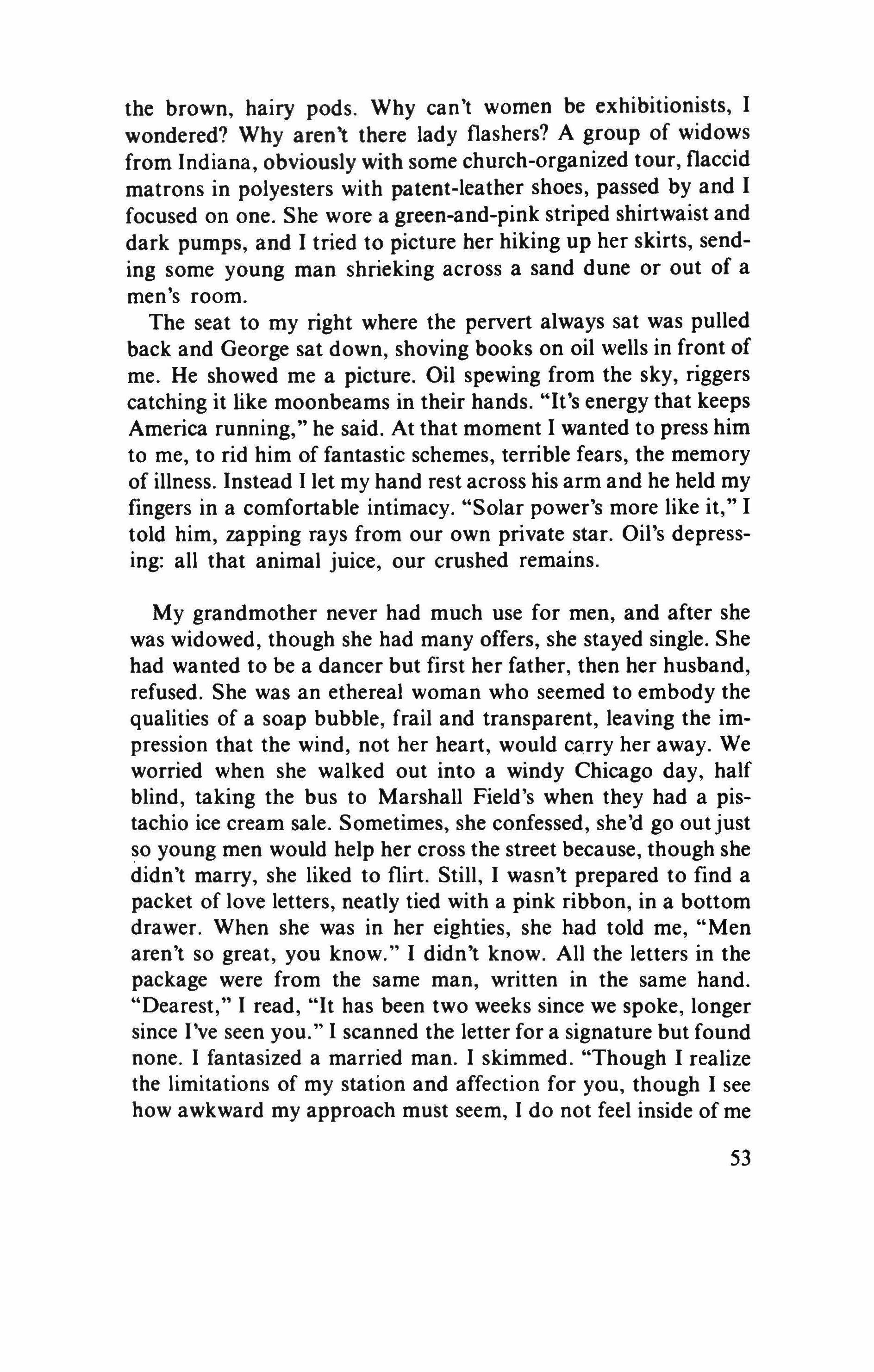
the brown, hairy pods. Why can't women be exhibitionists, I wondered? Why aren't there lady flashers? A group of widows from Indiana, obviously with some church-organized tour, flaccid matrons in polyesters with patent-leather shoes, passed by and I focused on one. She wore a green-and-pink striped shirtwaist and dark pumps, and I tried to picture her hiking up her skirts, sending some young man shrieking across a sand dune or out of a men's room.
The seat to my right where the pervert always sat was pulled back and George sat down, shoving books on oil wells in front of me. He showed me a picture. Oil spewing from the sky, riggers catching it like moonbeams in their hands. "It's energy that keeps America running," he said. At that moment I wanted to press him to me, to rid him of fantastic schemes, terrible fears, the memory of illness. Instead I let my hand rest across his arm and he held my fingers in a comfortable intimacy. "Solar power's more like it," I told him, zapping rays from our own private star. Oil's depressing: all that animal juice, our crushed remains.
My grandmother never had much use for men, and after she was widowed, though she had many offers, she stayed single. She had wanted to be a dancer but first her father, then her husband, refused. She was an ethereal woman who seemed to embody the qualities of a soap bubble, frail and transparent, leaving the impression that the wind, not her heart, would carry her away. We worried when she walked out into a windy Chicago day, half blind, taking the bus to Marshall Field's when they had a pistachio ice cream sale. Sometimes, she confessed, she'd go out just so young men would help her cross the street because, though she didn't marry, she liked to flirt. Still, I wasn't prepared to find a packet of love letters, neatly tied with a pink ribbon, in a bottom drawer. When she was in her eighties, she had told me, "Men aren't so great, you know." I didn't know. All the letters in the package were from the same man, written in the same hand. "Dearest," I read, "It has been two weeks since we spoke, longer since I've seen you." I scanned the letter for a signature but found none. I fantasized a married man. I skimmed. "Though I realize the limitations of my station and affection for you, though I see how awkward my approach must seem, I do not feel inside of me
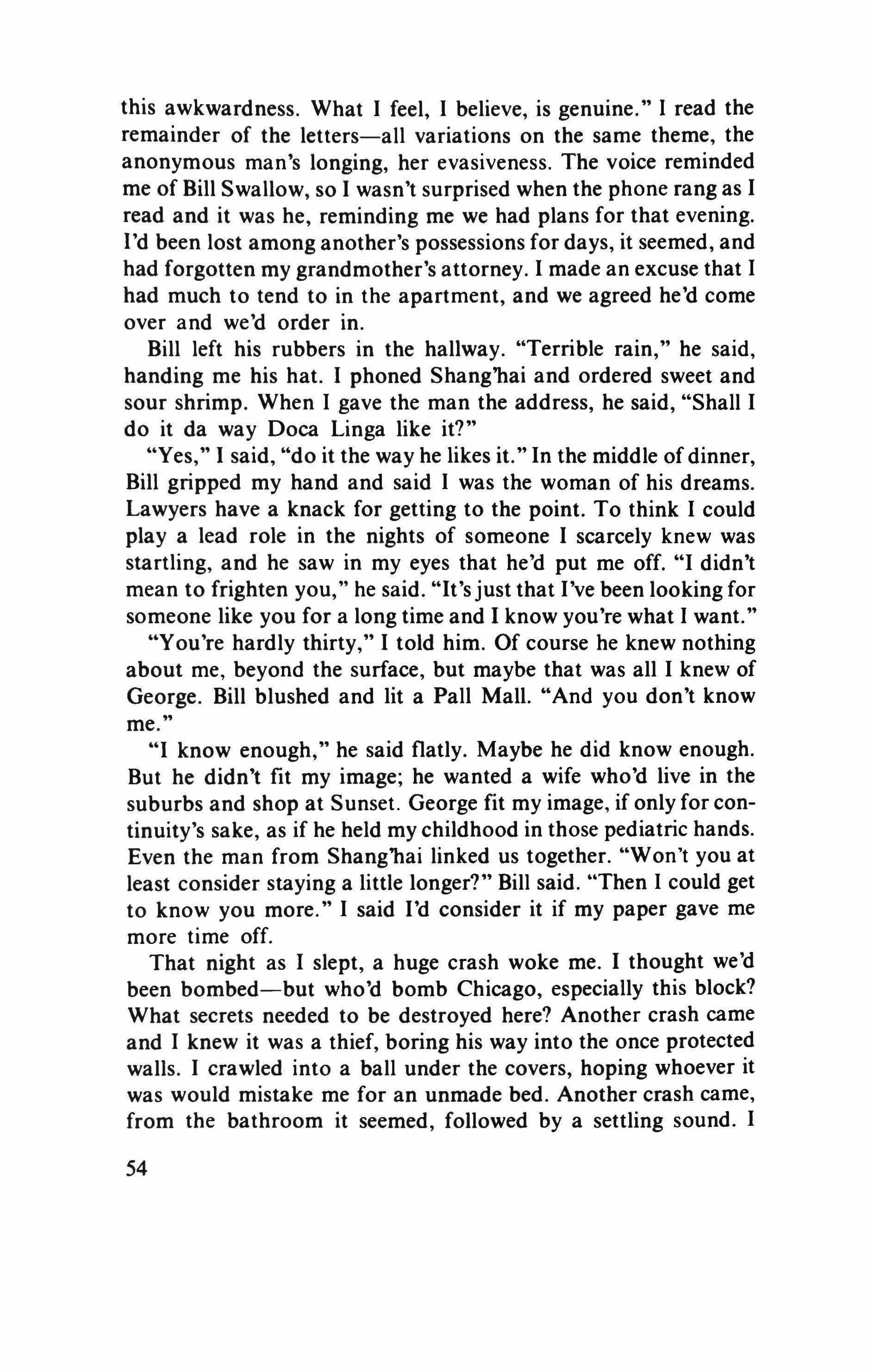
this awkwardness. What I feel, I believe, is genuine." I read the remainder of the letters-all variations on the same theme, the anonymous man's longing, her evasiveness. The voice reminded me of Bill Swallow, so I wasn't surprised when the phone rang as I read and it was he, reminding me we had plans for that evening. I'd been lost among another's possessions for days, it seemed, and had forgotten my grandmother'S attorney. I made an excuse that I had much to tend to in the apartment, and we agreed he'd come over and we'd order in.
Bill left his rubbers in the hallway. "Terrible rain," he said, handing me his hat. I phoned Shang'hai and ordered sweet and sour shrimp. When I gave the man the address, he said, "Shall I do it da way Doca Linga like it?"
"Yes," I said, "do it the way he likes it." In the middle of dinner, Bill gripped my hand and said I was the woman of his dreams. Lawyers have a knack for getting to the point. To think I could play a lead role in the nights of someone I scarcely knew was startling, and he saw in my eyes that he'd put me off. "I didn't mean to frighten you," he said. "It's just that I've been looking for someone like you for a long time and I know you're what I want."
"You're hardly thirty," I told him. Of course he knew nothing about me, beyond the surface, but maybe that was all I knew of George. Bill blushed and lit a Pall Mall. "And you don't know me."
"I know enough," he said flatly. Maybe he did know enough. But he didn't fit my image; he wanted a wife who'd live in the suburbs and shop at Sunset. George fit my image, if only for continuity'S sake, as if he held my childhood in those pediatric hands. Even the man from Shang'hai linked us together. "Won't you at least consider staying a little longer?" Bill said. "Then I could get to know you more." I said I'd consider it if my paper gave me more time off.
That night as I slept, a huge crash woke me. I thought we'd been bombed-but who'd bomb Chicago, especially this block? What secrets needed to be destroyed here? Another crash came and I knew it was a thief, boring his way into the once protected walls. I crawled into a ball under the covers, hoping whoever it was would mistake me for an unmade bed. Another crash came, from the bathroom it seemed, followed by a settling sound. I
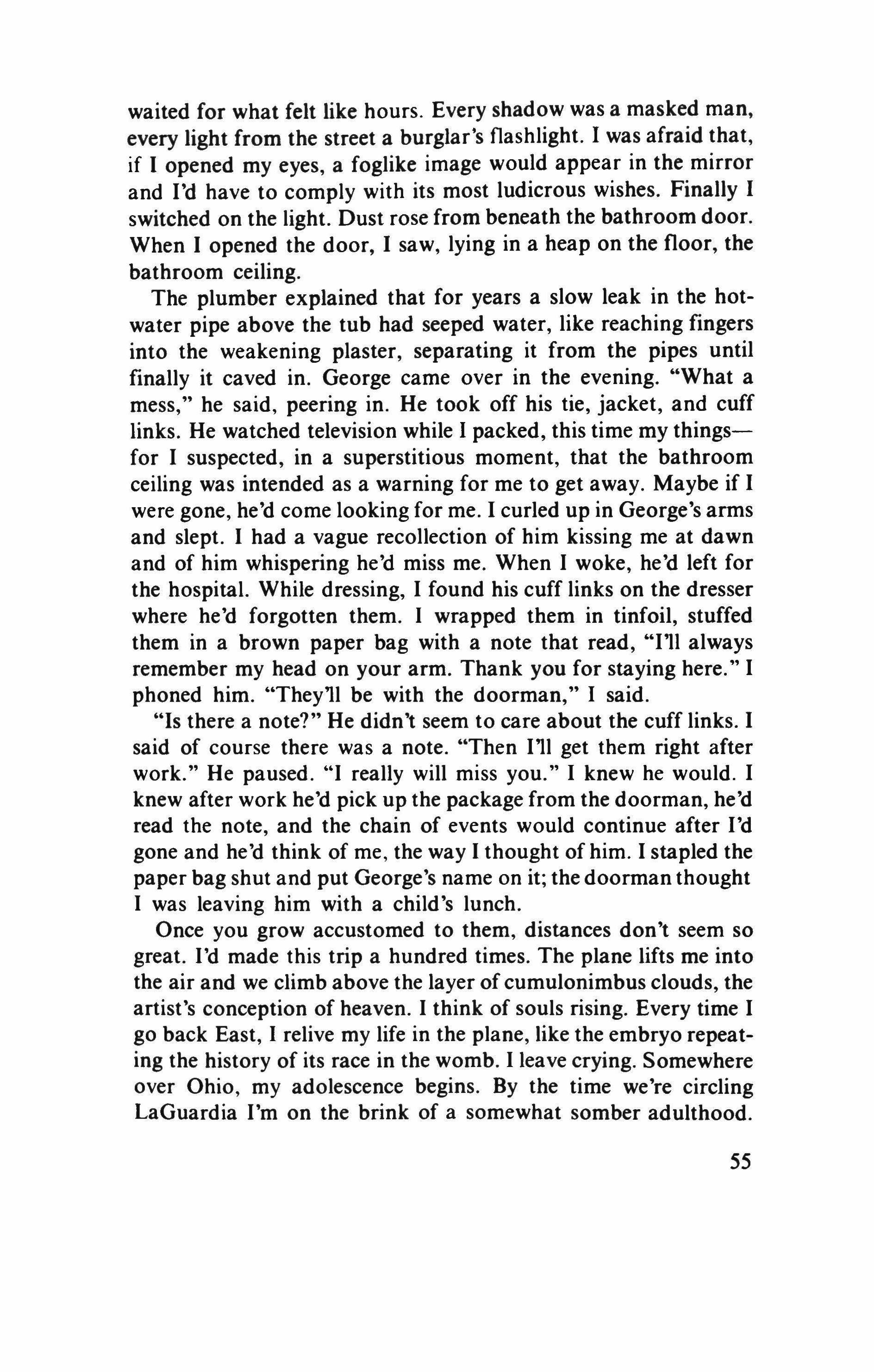
waited for what felt like hours. Every shadow was a masked man, every light from the street a burglar's flashlight. I was afraid that, if I opened my eyes, a foglike image would appear in the mirror and I'd have to comply with its most ludicrous wishes. Finally I switched on the light. Dust rose from beneath the bathroom door. When I opened the door, I saw, lying in a heap on the floor, the bathroom ceiling.
The plumber explained that for years a slow leak in the hotwater pipe above the tub had seeped water, like reaching fingers into the weakening plaster, separating it from the pipes until finally it caved in. George came over in the evening. "What a mess," he said, peering in. He took off his tie, jacket, and cuff links. He watched television while 1 packed, this time my thingsfor I suspected, in a superstitious moment, that the bathroom ceiling was intended as a warning for me to get away. Maybe if I were gone, he'd come looking for me. I curled up in George's arms and slept. I had a vague recollection of him kissing me at dawn and of him whispering he'd miss me. When I woke, he'd left for the hospital. While dressing, I found his cuff links on the dresser where he'd forgotten them. I wrapped them in tinfoil, stuffed them in a brown paper bag with a note that read, "111 always remember my head on your arm. Thank you for staying here." I phoned him. "They'll be with the doorman," 1 said.
"Is there a note?" He didn't seem to care about the cuff links. I said of course there was a note. "Then 111 get them right after work." He paused. "I really will miss you." I knew he would. I knew after work he'd pick up the package from the doorman, he'd read the note, and the chain of events would continue after I'd gone and he'd think of me, the way I thought of him. I stapled the paper bag shut and put George's name on it; the doorman thought I was leaving him with a child's lunch.
Once you grow accustomed to them, distances don't seem so great. I'd made this trip a hundred times. The plane lifts me into the air and we climb above the layer of cumulonimbus clouds, the artist's conception of heaven. I think of souls rising. Every time I go back East, I relive my life in the plane, like the embryo repeating the history of its race in the womb. I leave crying. Somewhere over Ohio, my adolescence begins. By the time we're circling LaGuardia I'm on the brink of a somewhat somber adulthood.
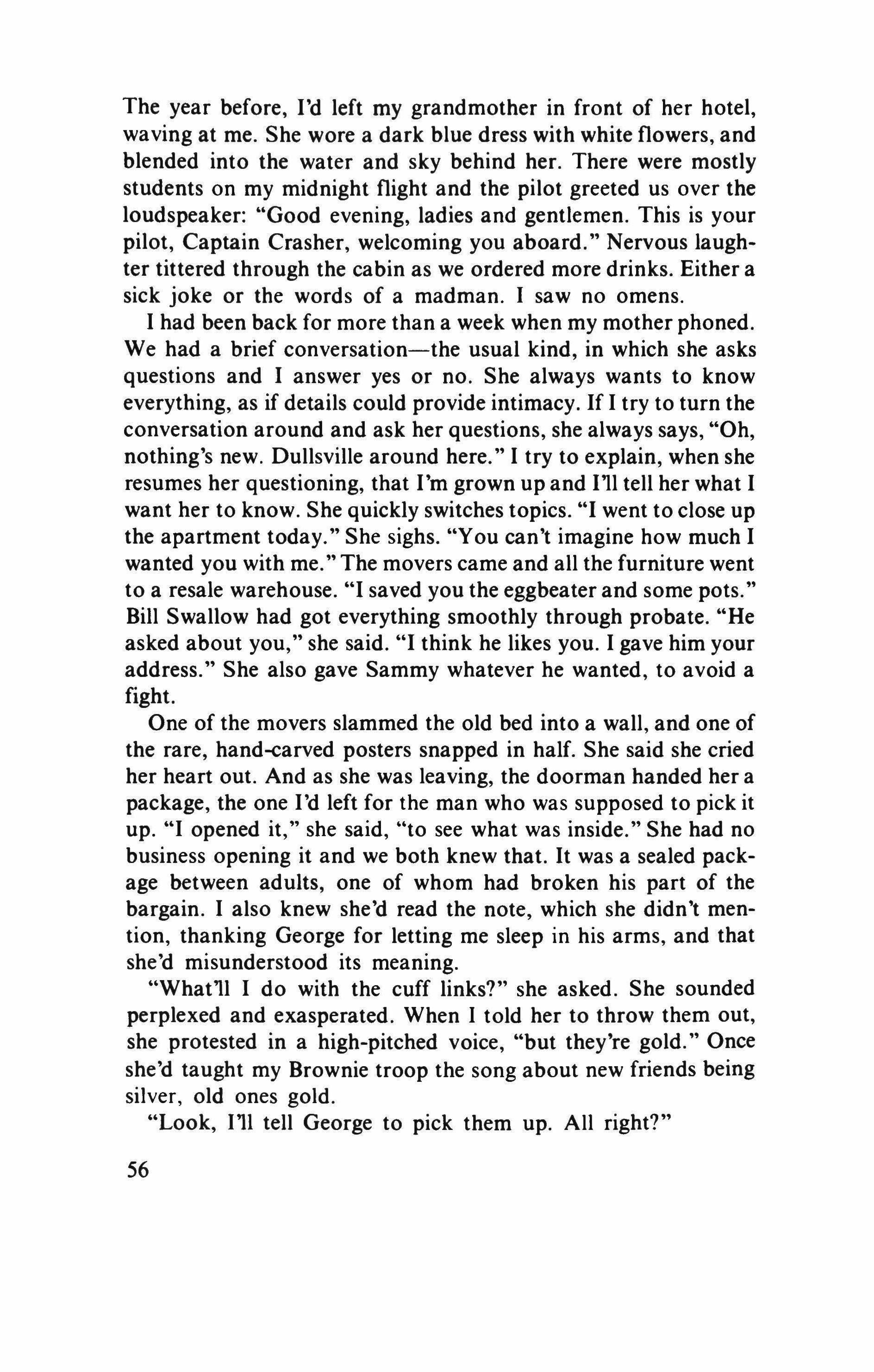
The year before, I'd left my grandmother in front of her hotel, waving at me. She wore a dark blue dress with white flowers, and blended into the water and sky behind her. There were mostly students on my midnight flight and the pilot greeted us over the loudspeaker: "Good evening, ladies and gentlemen. This is your pilot, Captain Crasher, welcoming you aboard." Nervous laughter tittered through the cabin as we ordered more drinks. Either a sick joke or the words of a madman. I saw no omens.
I had been back for more than a week when my mother phoned. We had a brief conversation-the usual kind, in which she asks questions and I answer yes or no. She always wants to know everything, as if details could provide intimacy. If I try to turn the conversation around and ask her questions, she always says, "Oh, nothing's new. Dullsville around here." I try to explain, when she resumes her questioning, that I'm grown up and 111 tell her what I want her to know. She quickly switches topics. "I went to close up the apartment today." She sighs. "You can't imagine how much I wanted you with me." The movers came and all the furniture went to a resale warehouse. "I saved you the eggbeater and some pots." Bill Swallow had got everything smoothly through probate. "He asked about you," she said. "I think he likes you. I gave him your address." She also gave Sammy whatever he wanted, to avoid a fight.
One of the movers slammed the old bed into a wall, and one of the rare, hand-carved posters snapped in half. She said she cried her heart out. And as she was leaving, the doorman handed her a package, the one I'd left for the man who was supposed to pick it up. "I opened it," she said, "to see what was inside." She had no business opening it and we both knew that. It was a sealed package between adults, one of whom had broken his part of the bargain. I also knew she'd read the note, which she didn't mention, thanking George for letting me sleep in his arms, and that she'd misunderstood its meaning.
"What'll I do with the cuff links?" she asked. She sounded perplexed and exasperated. When I told her to throw them out, she protested in a high-pitched voice, "but they're gold." Once she'd taught my Brownie troop the song about new friends being silver, old ones gold.
"Look, I'll tell George to pick them up. All right?"
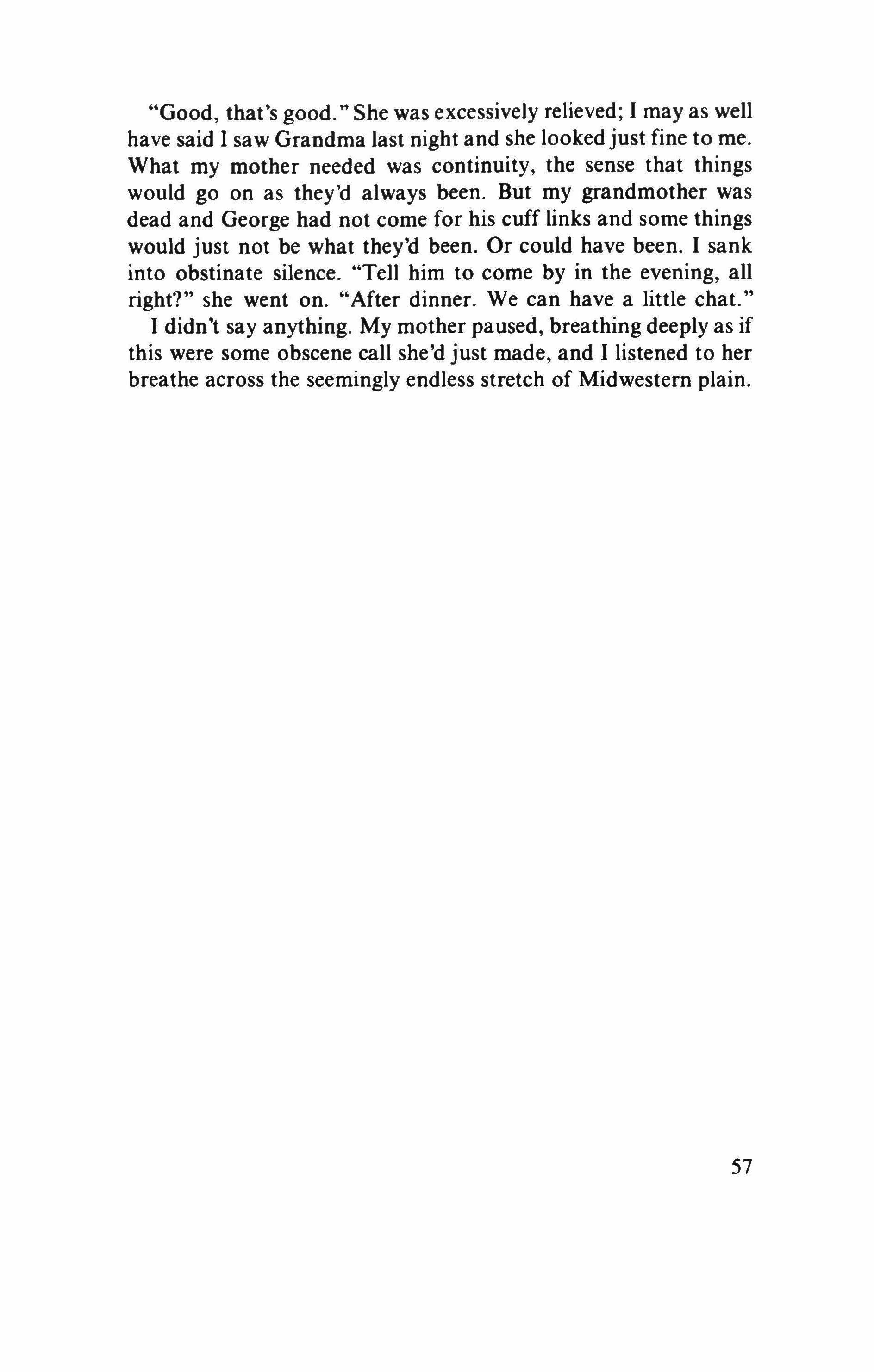
"Good, that's good." She was excessively relieved; I may as well have said I saw Grandma last night and she looked just fine to me. What my mother needed was continuity, the sense that things would go on as they'd always been. But my grandmother was dead and George had not come for his cuff links and some things would just not be what they'd been. Or could have been. I sank into obstinate silence. "Tell him to come by in the evening, all right?" she went on. "After dinner. We can have a little chat."
I didn't say anything. My mother paused, breathing deeply as if this were some obscene call she'd just made, and I listened to her breathe across the seemingly endless stretch of Midwestern plain.
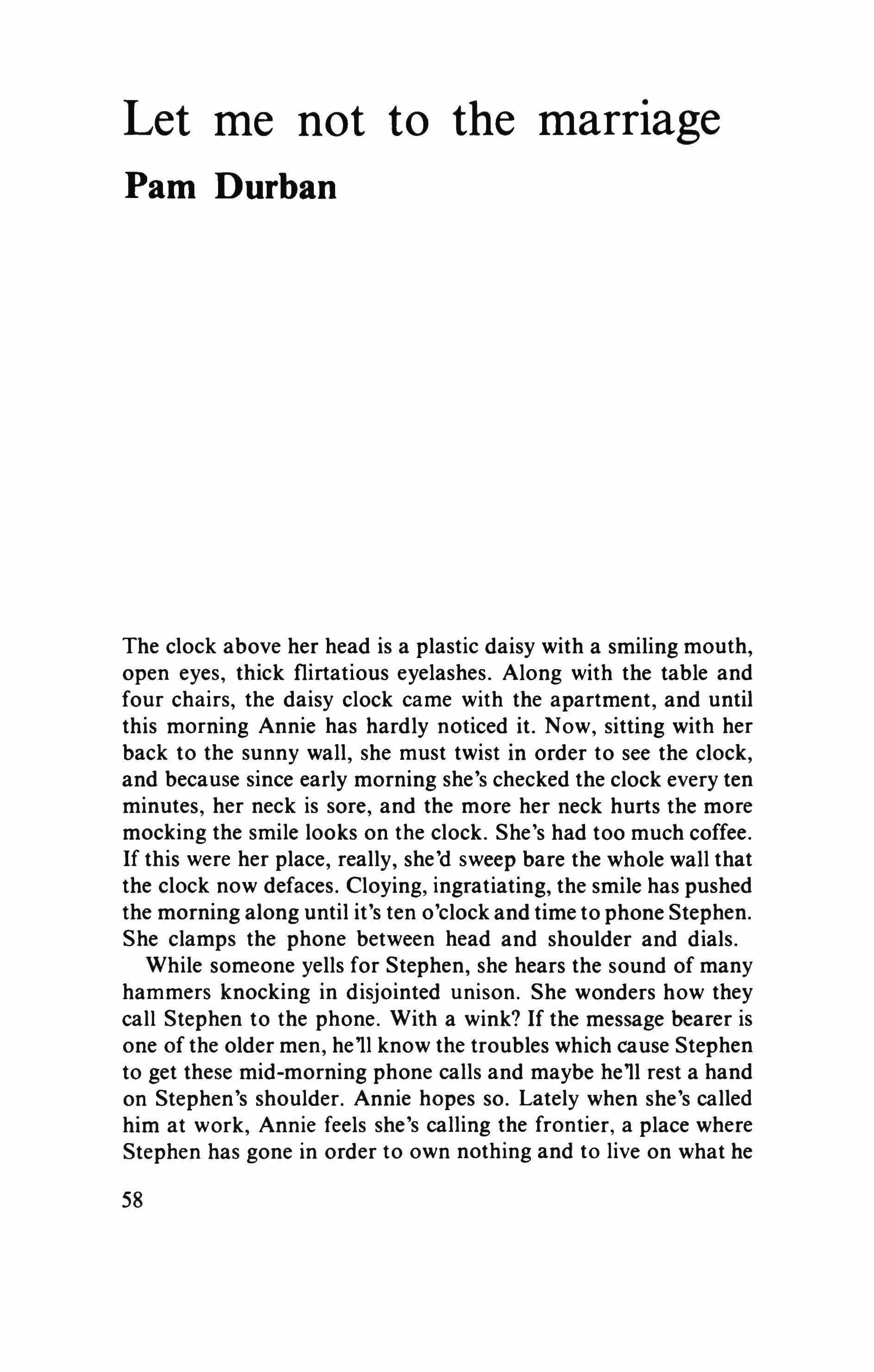
The clock above her head is a plastic daisy with a smiling mouth, open eyes, thick flirtatious eyelashes. Along with the table and four chairs, the daisy clock came with the apartment, and until this morning Annie has hardly noticed it. Now, sitting with her back to the sunny wall, she must twist in order to see the clock, and because since early morning she's checked the clock every ten minutes, her neck is sore, and the more her neck hurts the more mocking the smile looks on the clock. She's had too much coffee. If this were her place, really, she'd sweep bare the whole wall that the clock now defaces. Cloying, ingratiating, the smile has pushed the morning along until it's ten o'clock and time to phone Stephen. She clamps the phone between head and shoulder and dials.
While someone yells for Stephen, she hears the sound of many hammers knocking in disjointed unison. She wonders how they call Stephen to the phone. With a wink? If the message bearer is one ofthe older men, he'll know the troubles which cause Stephen to get these mid-morning phone calls and maybe he'll rest a hand on Stephen's shoulder. Annie hopes so. Lately when she's called him at work, Annie feels she's calling the frontier, a place where Stephen has gone in order to own nothing and to live on what he

doesn't know. His voice rushes the line. "Are you coming to see me? Can you get away?"
"From you," she jokes, "it's hard."
"Is this an obscene phone call?"
"Stephen," she holds her breath, lets it out in a rush, "I've filed the papers."
"Papers? Vot iss this papers, please?" An old joke between them. But she'll have none of it.
"Stephen, this is your responsibility too." On the other end of the line, his breath whistles out.
"Well, 1 don't like it," he says, "I don't think I want to hear that.
"You just heard it," she says, thinking of the ways they align themselves: Annie, policewoman; Stephen, martyr.
"I'm standing here covered with mud, 1 hit my thumbnail when they told me you were calling-it's turning black, by the wayand you're telling me we're getting a divorce."
"You signed them," she says. Her voice wants to shake, but she controls it. "I mailed them to you and you signed them and mailed them back, remember, so we wouldn't have to serve you with them, remember?"
"Jesus, Annie," he says in soft sympathy, "Jesus, why is your voice so hard? You don't sound like you. What's happening to you?" The question sits in the pit of her stomach, a rock. "Annie"-this said in a spirit of great exhaustion and humility"could 1 see them?"
"111 mail you a copy."
"No, could you come? Could you come, please? We talk better face to face, don't you think?"
"Yes, right, OK," she says. "You're right, 111 come."
"Jesus, Annie," he says. And she sets the phone down, closes the west-facing windows, feeds her cat, and stops on the way out the door. Why the west-facing windows? Because storms come from the west. Without being aware she was learning, she's learned. Like it or not, she thinks, this is home. She closes the door and drives fifty miles to Stephen's house. This is nothing new; only the papers in her purse are new.
She's there by two o'clock. Stephen isn't home, but his house stands open. She doesn't go inside; she waits on the porch with her purse and her overnight bag close beside her. A year ago, in 59
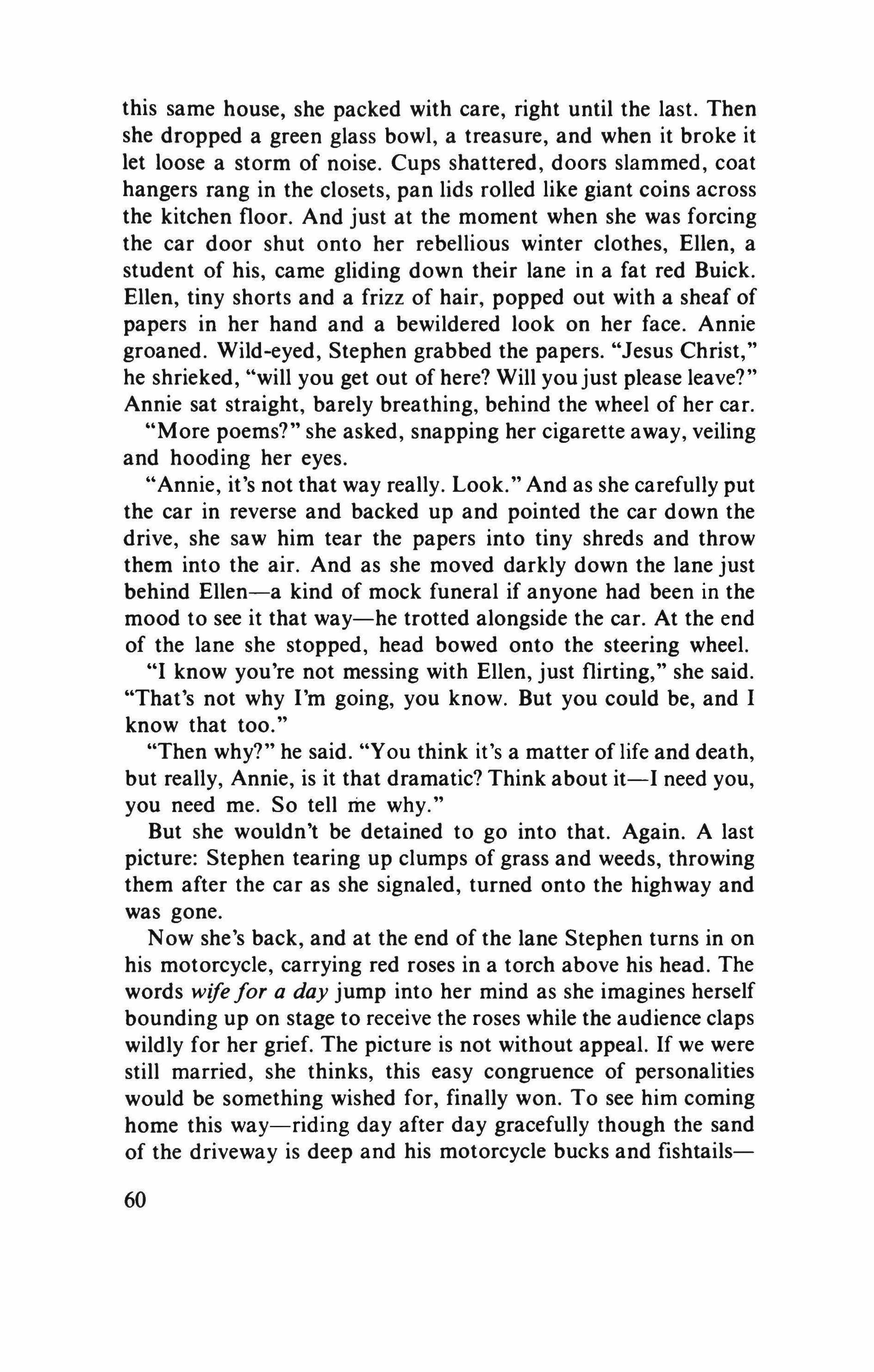
this same house, she packed with care, right until the last. Then she dropped a green glass bowl, a treasure, and when it broke it let loose a storm of noise. Cups shattered, doors slammed, coat hangers rang in the closets, pan lids rolled like giant coins across the kitchen floor. And just at the moment when she was forcing the car door shut onto her rebellious winter clothes, Ellen, a student of his, came gliding down their lane in a fat red Buick. Ellen, tiny shorts and a frizz of hair, popped out with a sheaf of papers in her hand and a bewildered look on her face. Annie groaned. Wild-eyed, Stephen grabbed the papers. "Jesus Christ," he shrieked, "will you get out of here? Will you just please leave?" Annie sat straight, barely breathing, behind the wheel of her car.
"More poems?" she asked, snapping her cigarette away, veiling and hooding her eyes.
"Annie, it's not that way really. Look." And as she carefully put the car in reverse and backed up and pointed the car down the drive, she saw him tear the papers into tiny shreds and throw them into the air. And as she moved darkly down the lane just behind Ellen-a kind of mock funeral if anyone had been in the mood to see it that way-he trotted alongside the car. At the end of the lane she stopped, head bowed onto the steering wheel.
"I know you're not messing with Ellen, just flirting," she said. "That's not why I'm going, you know. But you could be, and 1 know that too."
"Then why?" he said. "You think it's a matter of life and death, but really, Annie, is it that dramatic? Think about it-I need you, you need me. So tell rile why."
But she wouldn't be detained to go into that. Again. A last picture: Stephen tearing up clumps of grass and weeds, throwing them after the car as she signaled, turned onto the highway and was gone.
Now she's back, and at the end of the lane Stephen turns in on his motorcycle, carrying red roses in a torch above his head. The words wifefor a day jump into her mind as she imagines herself bounding up on stage to receive the roses while the audience claps wildly for her grief. The picture is not without appeal. If we were still married, she thinks, this easy congruence of personalities would be something wished for, finally won. To see him coming home this way-riding day after day gracefully though the sand of the driveway is deep and his motorcycle bucks and fishtails-
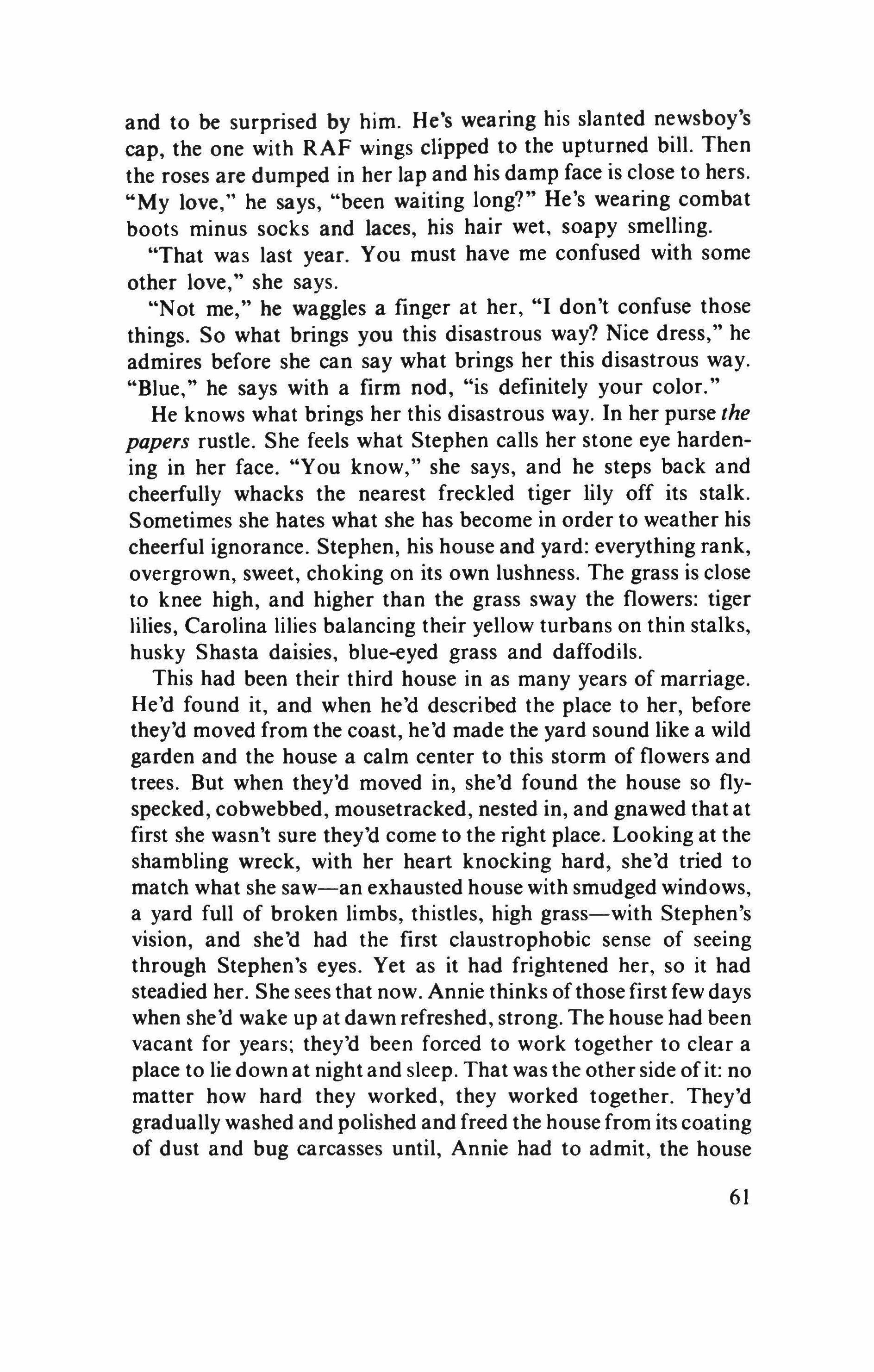
and to be surprised by him. He's wearing his slanted newsboy's cap, the one with RAF wings clipped to the upturned bill. Then the roses are dumped in her lap and his damp face is close to hers. "My love," he says, "been waiting long?" He's wearing combat boots minus socks and laces, his hair wet, soapy smelling.
"That was last year. You must have me confused with some other love," she says.
"Not me," he waggles a finger at her, "I don't confuse those things. So what brings you this disastrous way? Nice dress," he admires before she can say what brings her this disastrous way. "Blue," he says with a firm nod, "is definitely your color."
He knows what brings her this disastrous way. In her purse the papers rustle. She feels what Stephen calls her stone eye hardening in her face. "You know," she says, and he steps back and cheerfully whacks the nearest freckled tiger lily off its stalk. Sometimes she hates what she has become in order to weather his cheerful ignorance. Stephen, his house and yard: everything rank, overgrown, sweet, choking on its own lushness. The grass is close to knee high, and higher than the grass sway the flowers: tiger lilies, Carolina lilies balancing their yellow turbans on thin stalks, husky Shasta daisies, blue-eyed grass and daffodils.
This had been their third house in as many years of marriage. He'd found it, and when he'd described the place to her, before they'd moved from the coast, he'd made the yard sound like a wild garden and the house a calm center to this storm of flowers and trees. But when they'd moved in, she'd found the house so flyspecked, cobwebbed, mousetracked, nested in, and gnawed that at first she wasn't sure they'd come to the right place. Looking at the shambling wreck, with her heart knocking hard, she'd tried to match what she saw-an exhausted house with smudged windows, a yard full of broken limbs, thistles, high grass-with Stephen's vision, and she'd had the first claustrophobic sense of seeing through Stephen's eyes. Yet as it had frightened her, so it had steadied her. She sees that now. Annie thinks of those first few days when she'd wake up at dawn refreshed, strong. The house had been vacant for years; they'd been forced to work together to clear a place to lie down at night and sleep. That was the other side of it: no matter how hard they worked, they worked together. They'd gradually washed and polished and freed the house from its coating of dust and bug carcasses until, Annie had to admit, the house
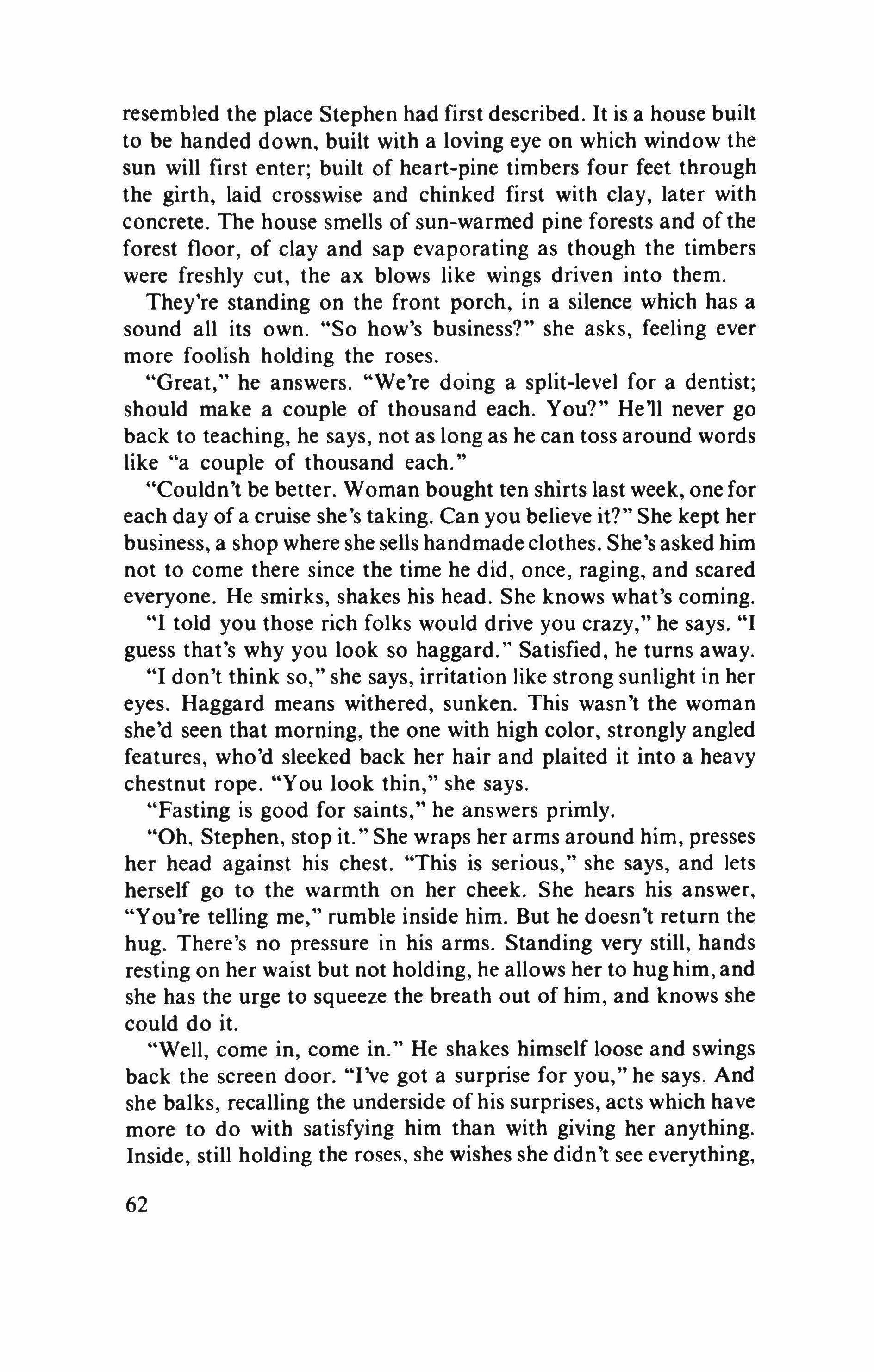
resembled the place Stephen had first described. It is a house built to be handed down, built with a loving eye on which window the sun will first enter; built of heart-pine timbers four feet through the girth, laid crosswise and chinked first with clay, later with concrete. The house smells of sun-warmed pine forests and of the forest floor, of clay and sap evaporating as though the timbers were freshly cut, the ax blows like wings driven into them.
They're standing on the front porch, in a silence which has a sound all its own. "So how's business?" she asks, feeling ever more foolish holding the roses.
"Great," he answers. "We're doing a split-level for a dentist; should make a couple of thousand each. You?" He'll never go back to teaching, he says, not as long as he can toss around words like "a couple of thousand each."
"Couldn't be better. Woman bought ten shirts last week, one for each day of a cruise she's taking. Can you believe it?" She kept her business, a shop where she sells handmade clothes. She's asked him not to come there since the time he did, once, raging, and scared everyone. He smirks, shakes his head. She knows what's coming.
"I told you those rich folks would drive you crazy," he says. "I guess that's why you look so haggard." Satisfied, he turns away.
"I don't think so," she says, irritation like strong sunlight in her eyes. Haggard means withered, sunken. This wasn't the woman she'd seen that morning, the one with high color, strongly angled features, who'd sleeked back her hair and plaited it into a heavy chestnut rope. "You look thin," she says.
"Fasting is good for saints," he answers primly.
"Oh, Stephen, stop it." She wraps her arms around him, presses her head against his chest. "This is serious," she says, and lets herself go to the warmth on her cheek. She hears his answer, "You 're telling me," rumble inside him. But he doesn't return the hug. There's no pressure in his arms. Standing very still, hands resting on her waist but not holding, he allows her to hug him, and she has the urge to squeeze the breath out of him, and knows she could do it.
"Well, come in, come in." He shakes himself loose and swings back the screen door. "I've got a surprise for you," he says. And she balks, recalling the underside of his surprises, acts which have more to do with satisfying him than with giving her anything. Inside, still holding the roses, she wishes she didn't see everything,
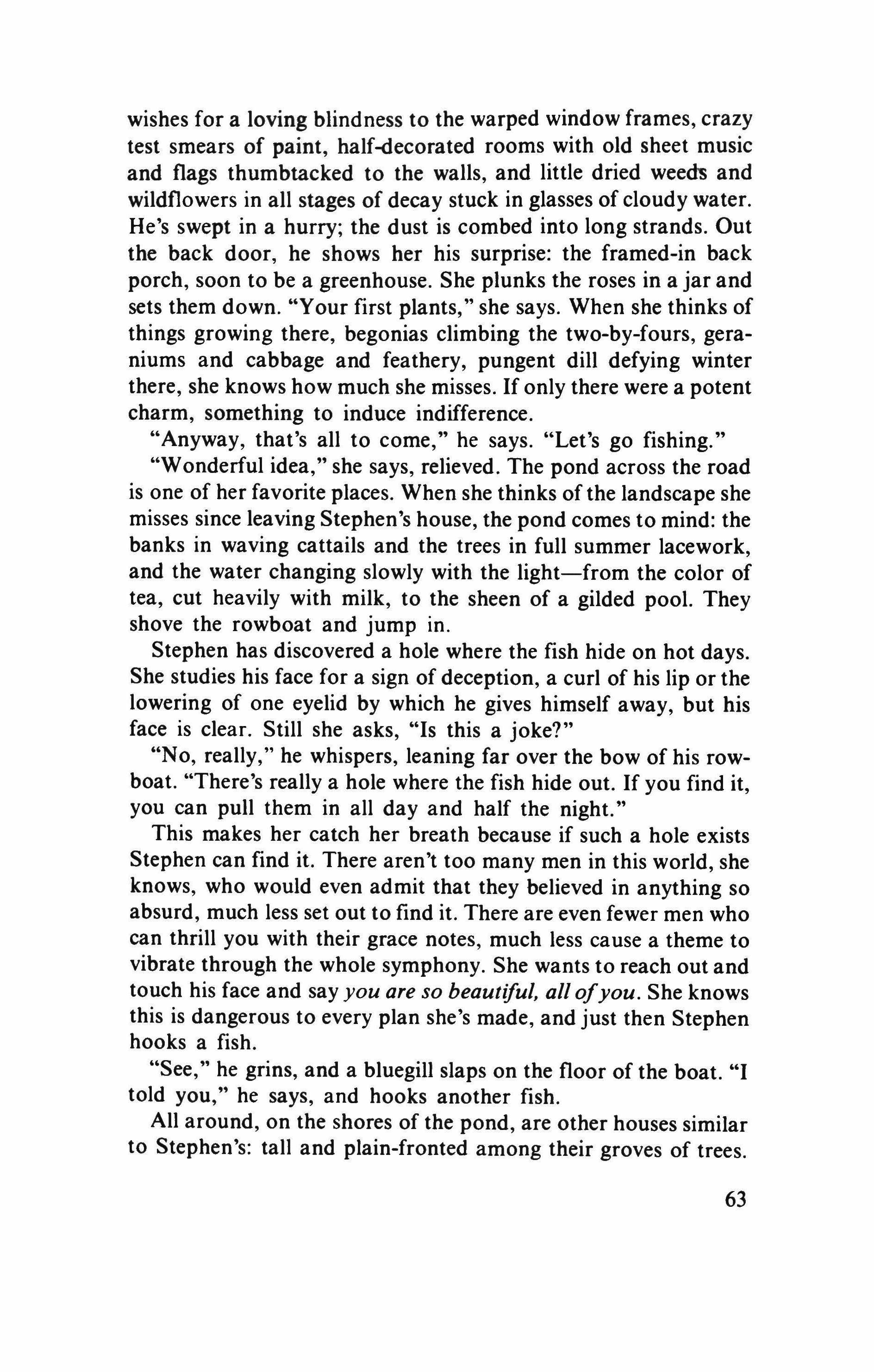
wishes for a loving blindness to the warped window frames, crazy test smears of paint, half-decorated rooms with old sheet music and flags thumbtacked to the walls, and little dried weeds and wildflowers in all stages of decay stuck in glasses of cloudy water. He's swept in a hurry; the dust is combed into long strands. Out the back door, he shows her his surprise: the framed-in back porch, soon to be a greenhouse. She plunks the roses in a jar and sets them down. "Your first plants," she says. When she thinks of things growing there, begonias climbing the two-by-fours, geraniums and cabbage and feathery, pungent dill defying winter there, she knows how much she misses. If only there were a potent charm, something to induce indifference.
"Anyway, that's all to come," he says. "Let's go fishing."
"Wonderful idea," she says, relieved. The pond across the road is one of her favorite places. When she thinks of the landscape she misses since leaving Stephen's house, the pond comes to mind: the banks in waving cattails and the trees in full summer lacework, and the water changing slowly with the light-from the color of tea, cut heavily with milk, to the sheen of a gilded pool. They shove the rowboat and jump in.
Stephen has discovered a hole where the fish hide on hot days. She studies his face for a sign of deception, a curl of his lip or the lowering of one eyelid by which he gives himself away, but his face is clear. Still she asks, "Is this a joke?"
"N0, really," he whispers, leaning far over the bow of his rowboat. "There's really a hole where the fish hide out. If you find it, you can pull them in all day and half the night."
This makes her catch her breath because if such a hole exists Stephen can find it. There aren't too many men in this world, she knows, who would even admit that they believed in anything so absurd, much less set out to find it. There are even fewer men who can thrill you with their grace notes, much less cause a theme to vibrate through the whole symphony. She wants to reach out and touch his face and say you are so beautiful, all ofyou. She knows this is dangerous to every plan she's made, and just then Stephen hooks a fish.
"See," he grins, and a bluegill slaps on the floor of the boat. "I told you," he says, and hooks another fish.
All around, on the shores of the pond, are other houses similar to Stephen's: tall and plain-fronted among their groves of trees.
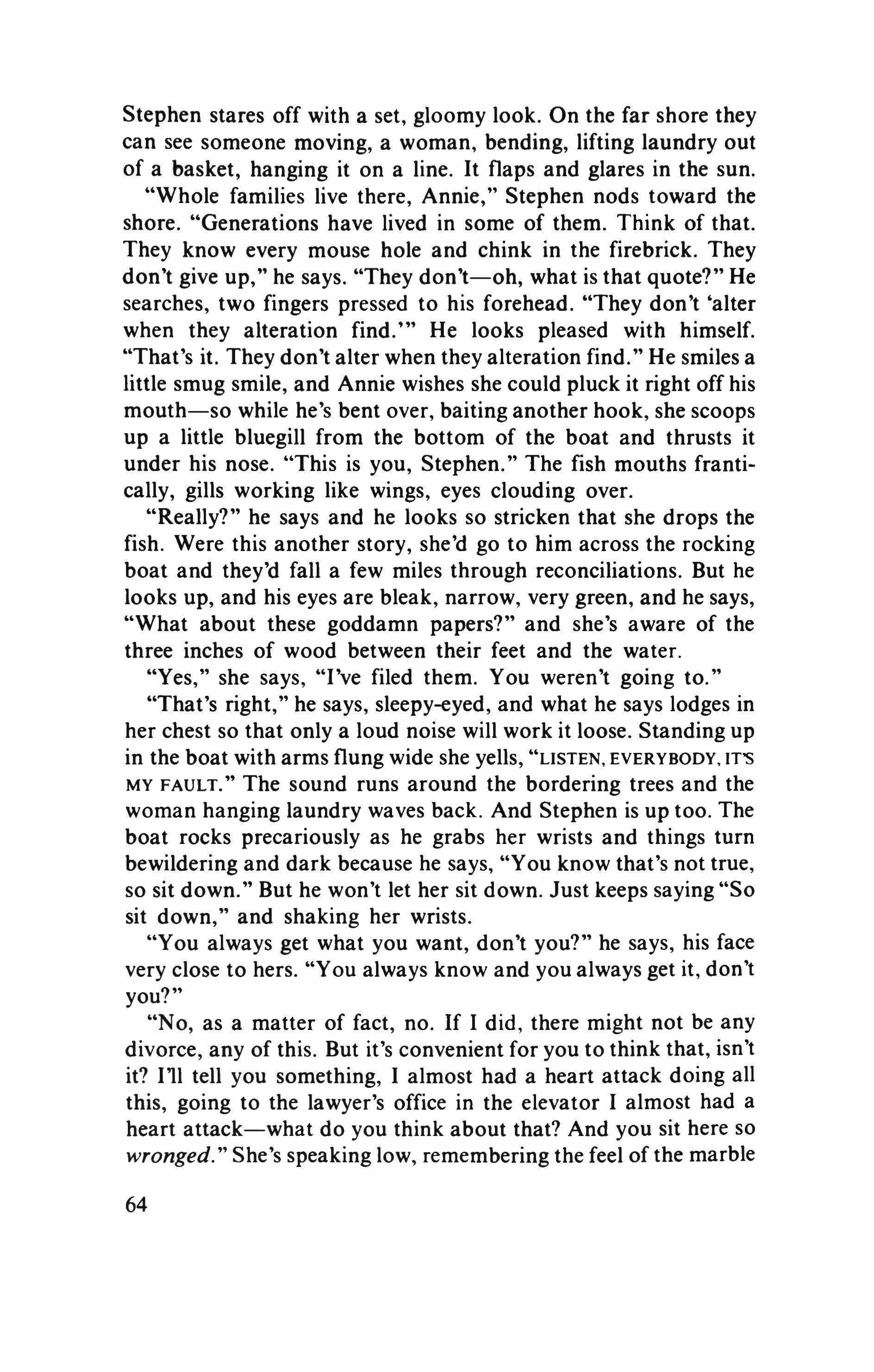
Stephen stares off with a set, gloomy look. On the far shore they can see someone moving, a woman, bending, lifting laundry out of a basket, hanging it on a line. It flaps and glares in the sun.
"Whole families live there, Annie," Stephen nods toward the shore. "Generations have lived in some of them. Think of that. They know every mouse hole and chink in the firebrick. They don't give up," he says. "They don't-oh, what is that quote?" He searches, two fingers pressed to his forehead. "They don't 'alter when they alteration find. ", He looks pleased with himself. "That's it. They don't alter when they alteration find." He smiles a little smug smile, and Annie wishes she could pluck it right off his mouth-so while he's bent over, baiting another hook, she scoops up a little bluegill from the bottom of the boat and thrusts it under his nose. "This is you, Stephen." The fish mouths frantically, gills working like wings, eyes clouding over.
"Really?" he says and he looks so stricken that she drops the fish. Were this another story, she'd go to him across the rocking boat and they'd fall a few miles through reconciliations. But he looks up, and his eyes are bleak, narrow, very green, and he says, "What about these goddamn papers?" and she's aware of the three inches of wood between their feet and the water.
"Yes," she says, "I've filed them. You weren't going to."
"That's right," he says, sleepy-eyed, and what he says lodges in her chest so that only a loud noise will work it loose. Standing up in the boat with arms flung wide she yells, "LISTEN, EVERYBODY, IT'S MY FAULT." The sound runs around the bordering trees and the woman hanging laundry waves back. And Stephen is up too. The boat rocks precariously as he grabs her wrists and things turn bewildering and dark because he says, "You know that's not true, so sit down." But he won't let her sit down. Just keeps saying "So sit down," and shaking her wrists.
"You always get what you want, don't you?" he says, his face very close to hers. "You always know and you always get it, don't you?"
"No, as a matter of fact, no. If I did, there might not be any divorce, any of this. But it's convenient for you to think that, isn't it? 111 tell you something, I almost had a heart attack doing all this, going to the lawyer's office in the elevator I almost had a heart attack-what do you think about that? And you sit here so wronged." She's speaking low, remembering the feel of the marble
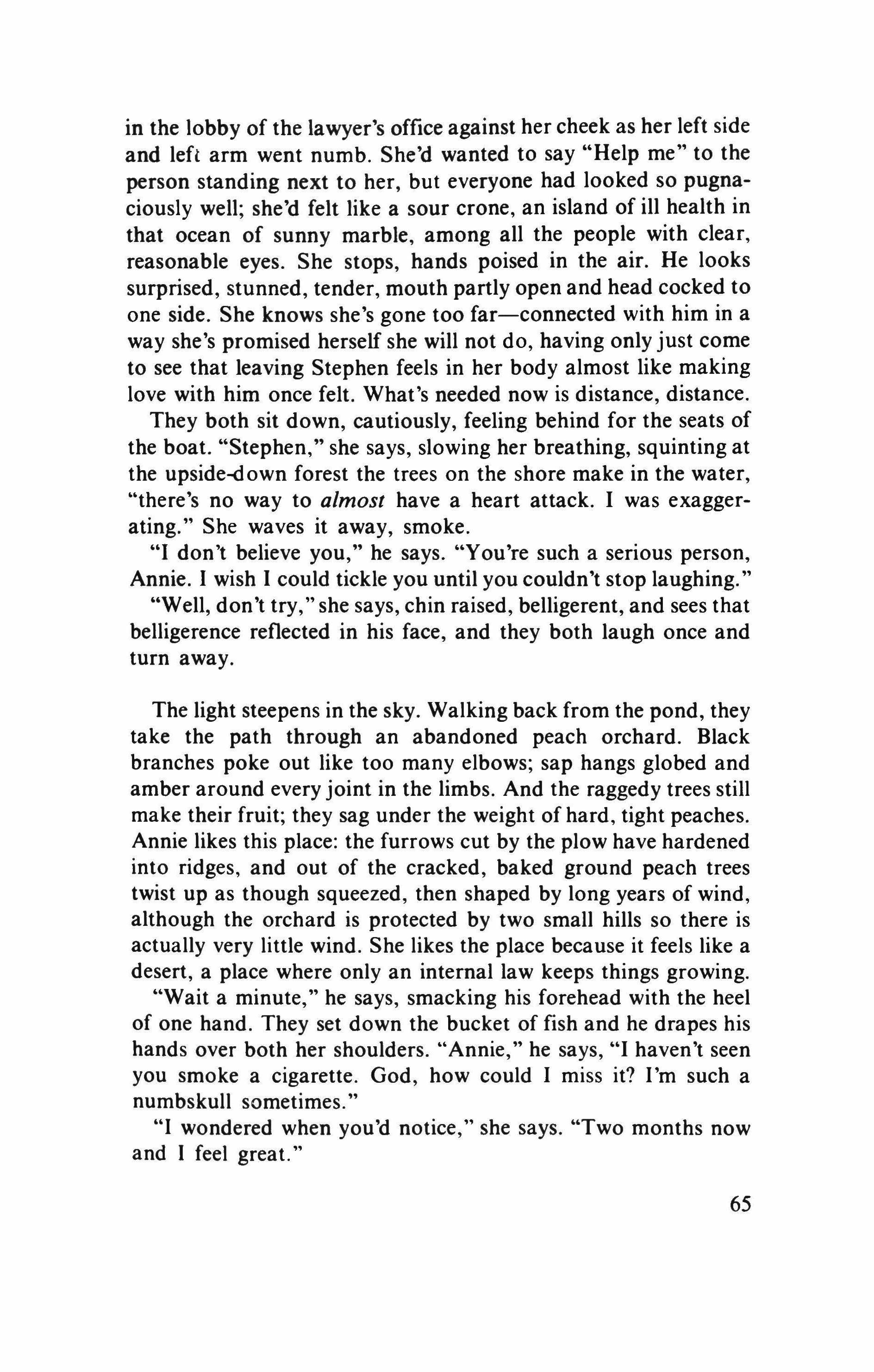
in the lobby of the lawyer's office against her cheek as her left side and len arm went numb. She'd wanted to say "Help me" to the person standing next to her, but everyone had looked so pugnaciously well; she'd felt like a sour crone, an island of ill health in that ocean of sunny marble, among all the people with clear, reasonable eyes. She stops, hands poised in the air. He looks surprised, stunned, tender, mouth partly open and head cocked to one side. She knows she's gone too far-connected with him in a way she's promised herself she will not do, having only just come to see that leaving Stephen feels in her body almost like making love with him once felt. What's needed now is distance, distance.
They both sit down, cautiously, feeling behind for the seats of the boat. "Stephen," she says, slowing her breathing, squinting at the upside-down forest the trees on the shore make in the water, "there's no way to almost have a heart attack. 1 was exaggerating." She waves it away, smoke.
"I don't believe you," he says. "You're such a serious person, Annie. I wish I could tickle you until you couldn't stop laughing."
"Well, don't try,"she says, chin raised, belligerent, and sees that belligerence reflected in his face, and they both laugh once and turn away.
The light steepens in the sky. Walking back from the pond, they take the path through an abandoned peach orchard. Black branches poke out like too many elbows; sap hangs globed and amber around every joint in the limbs. And the raggedy trees still make their fruit; they sag under the weight of hard, tight peaches. Annie likes this place: the furrows cut by the plow have hardened into ridges, and out of the cracked, baked ground peach trees twist up as though squeezed, then shaped by long years of wind, although the orchard is protected by two small hills so there is actually very little wind. She likes the place because it feels like a desert, a place where only an internal law keeps things growing.
"Wait a minute," he says, smacking his forehead with the heel of one hand. They set down the bucket of fish and he drapes his hands over both her shoulders. "Annie," he says, "I haven't seen you smoke a cigarette. God, how could I miss it? I'm such a numbskull sometimes."
"I wondered when you'd notice," she says. "Two months now and I feel great."
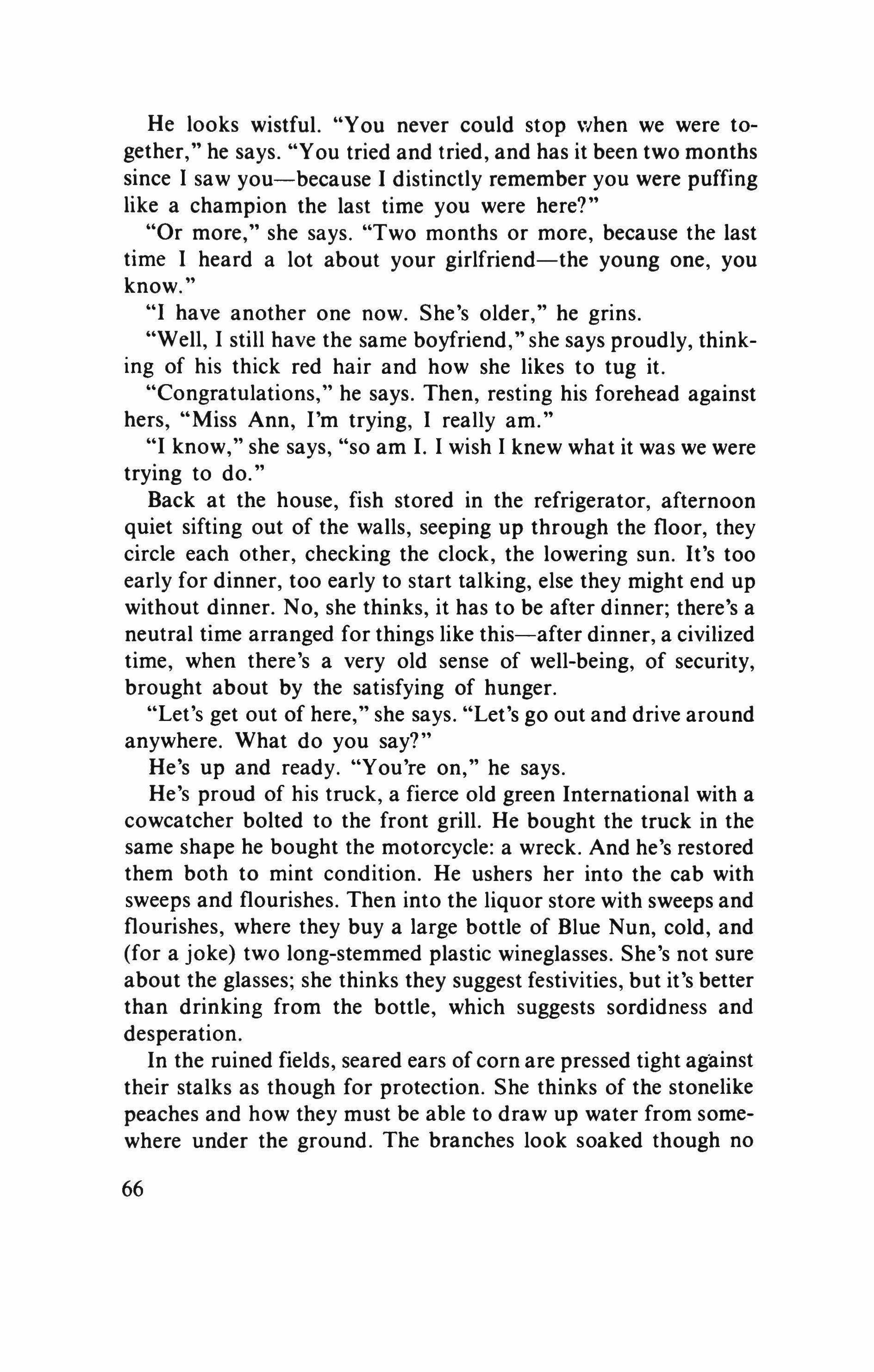
He looks wistful. "You never could stop when we were together," he says. "You tried and tried, and has it been two months since I saw you-because I distinctly remember you were puffing like a champion the last time you were here?"
"Or more," she says. "Two months or more, because the last time I heard a lot about your girlfriend-the young one, you know. "
"I have another one now. She's older," he grins.
"Well, 1 still have the same boyfriend," she says proudly, thinking of his thick red hair and how she likes to tug it.
"Congratulations," he says. Then, resting his forehead against hers, "Miss Ann, I'm trying, 1 really am."
"I know," she says, "so am I. I wish 1 knew what it was we were trying to do."
Back at the house, fish stored in the refrigerator, afternoon quiet sifting out of the walls, seeping up through the floor, they circle each other, checking the clock, the lowering sun. It's too early for dinner, too early to start talking, else they might end up without dinner. No, she thinks, it has to be after dinner; there's a neutral time arranged for things like this-after dinner, a civilized time, when there's a very old sense of well-being, of security, brought about by the satisfying of hunger.
"Let's get out of here," she says. "Let's go out and drive around anywhere. What do you say?"
He's up and ready. "You're on," he says.
He's proud of his truck, a fierce old green International with a cowcatcher bolted to the front grill. He bought the truck in the same shape he bought the motorcycle: a wreck. And he's restored them both to mint condition. He ushers her into the cab with sweeps and flourishes. Then into the liquor store with sweeps and flourishes, where they buy a large bottle of Blue Nun, cold, and (for a joke) two long-stemmed plastic wineglasses. She's not sure about the glasses; she thinks they suggest festivities, but it's better than drinking from the bottle, which suggests sordidness and desperation.
In the ruined fields, seared ears of corn are pressed tight against their stalks as though for protection. She thinks of the stonelike peaches and how they must be able to draw up water from somewhere under the ground. The branches look soaked though no
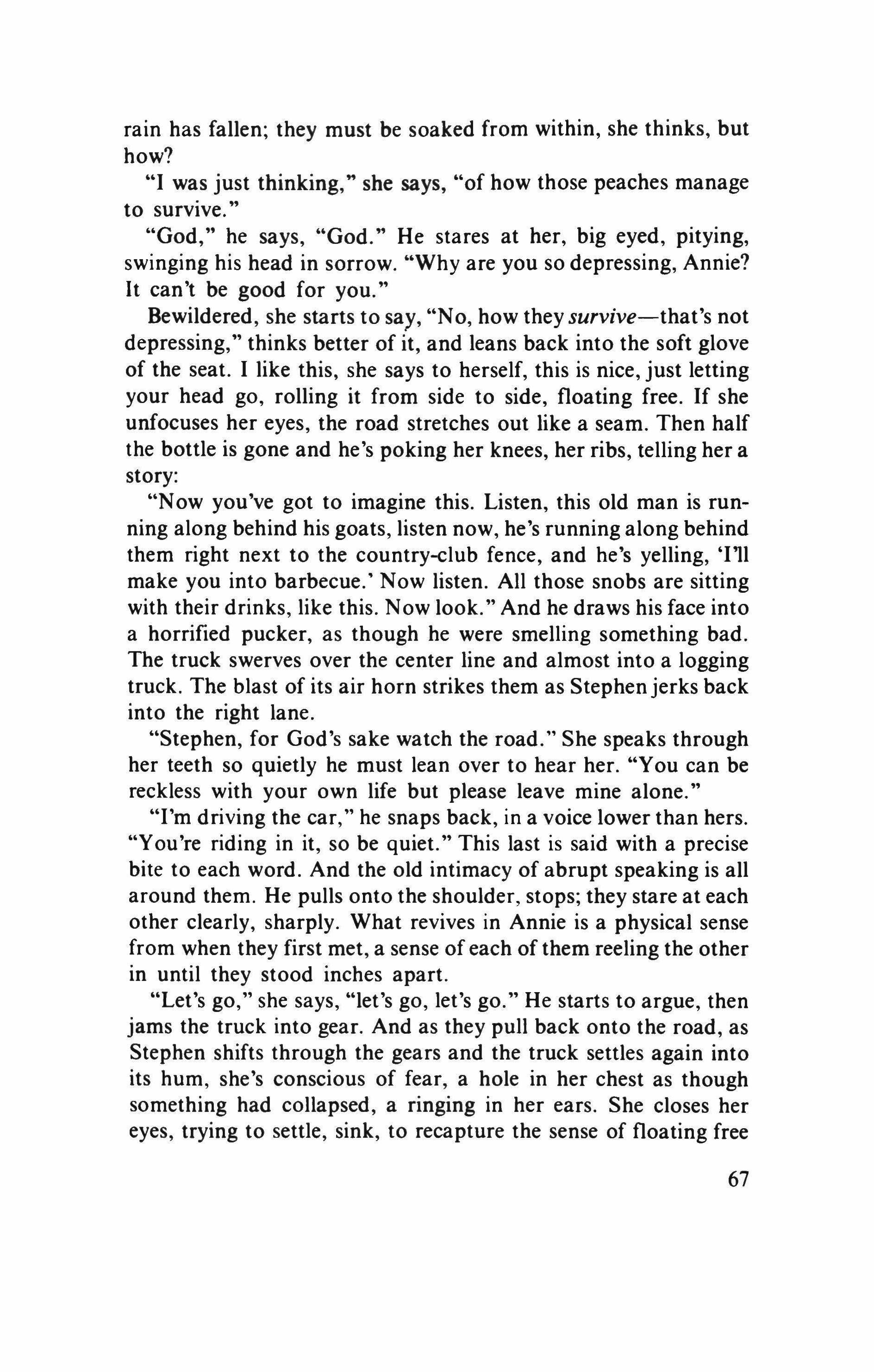
rain has fallen; they must be soaked from within, she thinks, but how?
"I was just thinking," she says, "of how those peaches manage to survive."
"God," he says, "God." He stares at her, big eyed, pitying, swinging his head in sorrow. "Why are you so depressing, Annie? It can't be good for you."
Bewildered, she starts to say, "No, how they survive-that's not depressing," thinks better of it, and leans back into the soft glove of the seat. 1 like this, she says to herself, this is nice, just letting your head go, rolling it from side to side, floating free. If she unfocuses her eyes, the road stretches out like a seam. Then half the bottle is gone and he's poking her knees, her ribs, telling her a story:
"Now you've got to imagine this. Listen, this old man is running along behind his goats, listen now, he's running along behind them right next to the country-club fence, and he's yelling, 'I'll make you into barbecue: Now listen. All those snobs are sitting with their drinks, like this. Now look." And he draws his face into a horrified pucker, as though he were smelling something bad. The truck swerves over the center line and almost into a logging truck. The blast of its air horn strikes them as Stephenjerks back into the right lane.
"Stephen, for God's sake watch the road." She speaks through her teeth so quietly he must lean over to hear her. "You can be reckless with your own life but please leave mine alone."
"I'm driving the car," he snaps back, in a voice lower than hers. "You 're riding in it, so be quiet." This last is said with a precise bite to each word. And the old intimacy of abrupt speaking is all around them. He pulls onto the shoulder, stops; they stare at each other clearly, sharply. What revives in Annie is a physical sense from when they first met, a sense of each of them reeling the other in until they stood inches apart.
"Let's go," she says, "let's go, let's go." He starts to argue, then jams the truck into gear. And as they pull back onto the road, as Stephen shifts through the gears and the truck settles again into its hum, she's conscious of fear, a hole in her chest as though something had collapsed, a ringing in her ears. She closes her eyes, trying to settle, sink, to recapture the sense of floating free
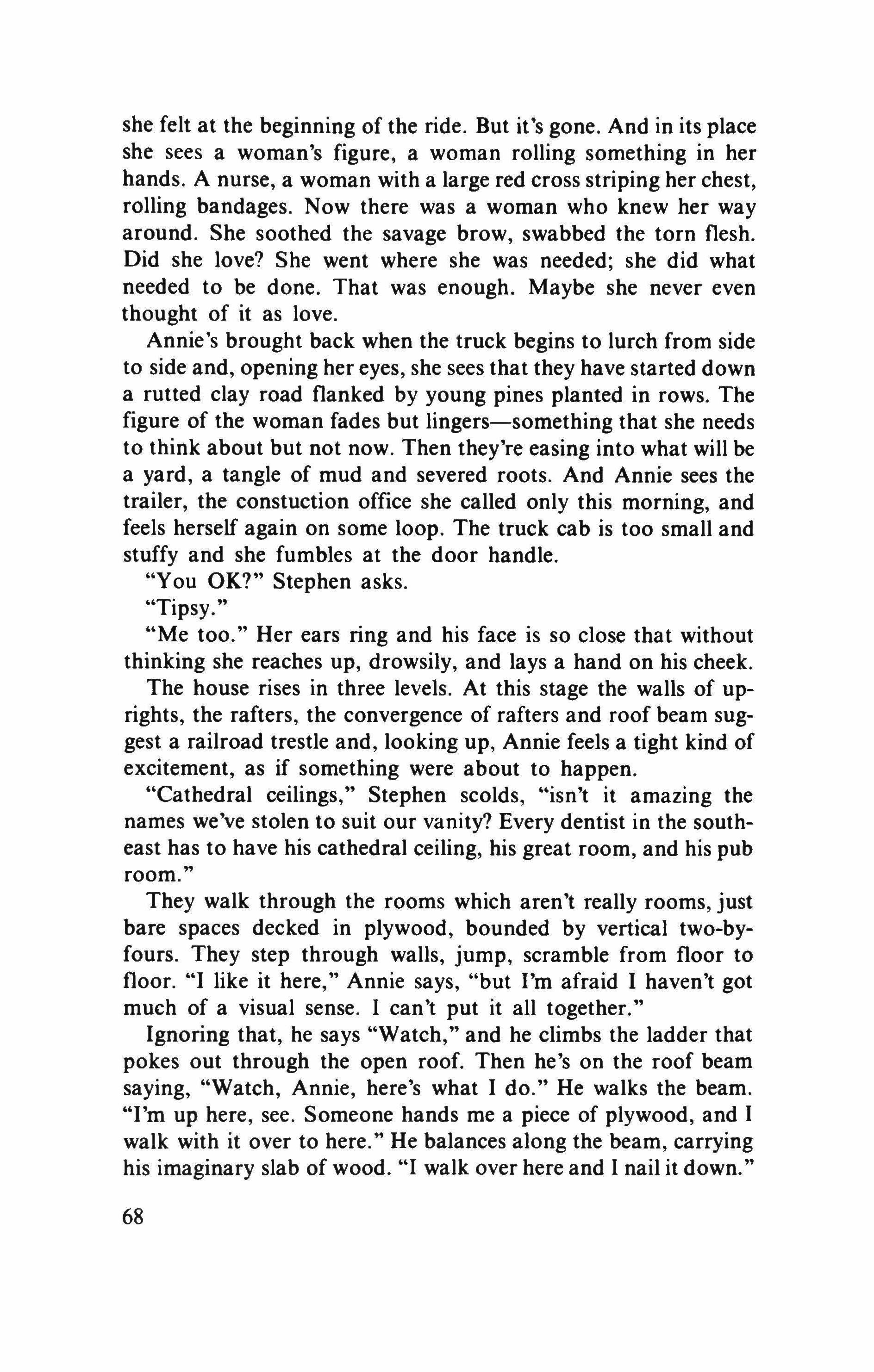
she felt at the beginning of the ride. But it's gone. And in its place she sees a woman's figure, a woman rolling something in her hands. A nurse, a woman with a large red cross striping her chest, rolling bandages. Now there was a woman who knew her way around. She soothed the savage brow, swabbed the torn flesh. Did she love? She went where she was needed; she did what needed to be done. That was enough. Maybe she never even thought of it as love.
Annie's brought back when the truck begins to lurch from side to side and, opening her eyes, she sees that they have started down a rutted clay road flanked by young pines planted in rows. The figure of the woman fades but lingers-something that she needs to think about but not now. Then they're easing into what will be a yard, a tangle of mud and severed roots. And Annie sees the trailer, the constuction office she called only this morning, and feels herself again on some loop. The truck cab is too small and stuffy and she fumbles at the door handle.
"You OK?" Stephen asks.
"Tipsy."
"Me too." Her ears ring and his face is so close that without thinking she reaches up, drowsily, and lays a hand on his cheek.
The house rises in three levels. At this stage the walls of uprights, the rafters, the convergence of rafters and roof beam suggest a railroad trestle and, looking up, Annie feels a tight kind of excitement, as if something were about to happen.
"Cathedral ceilings," Stephen scolds, "isn't it amazing the names we've stolen to suit our vanity? Every dentist in the southeast has to have his cathedral ceiling, his great room, and his pub room."
They walk through the rooms which aren't really rooms, just bare spaces decked in plywood, bounded by vertical two-byfours. They step through walls, jump, scramble from floor to floor. "I like it here," Annie says, "but I'm afraid I haven't got much of a visual sense. I can't put it all together."
Ignoring that, he says "Watch," and he climbs the ladder that pokes out through the open roof. Then he's on the roof beam saying, "Watch, Annie, here's what I do." He walks the beam. "I'm up here, see. Someone hands me a piece of plywood, and I walk with it over to here." He balances along the beam, carrying his imaginary slab of wood. "I walk over here and I nail it down."
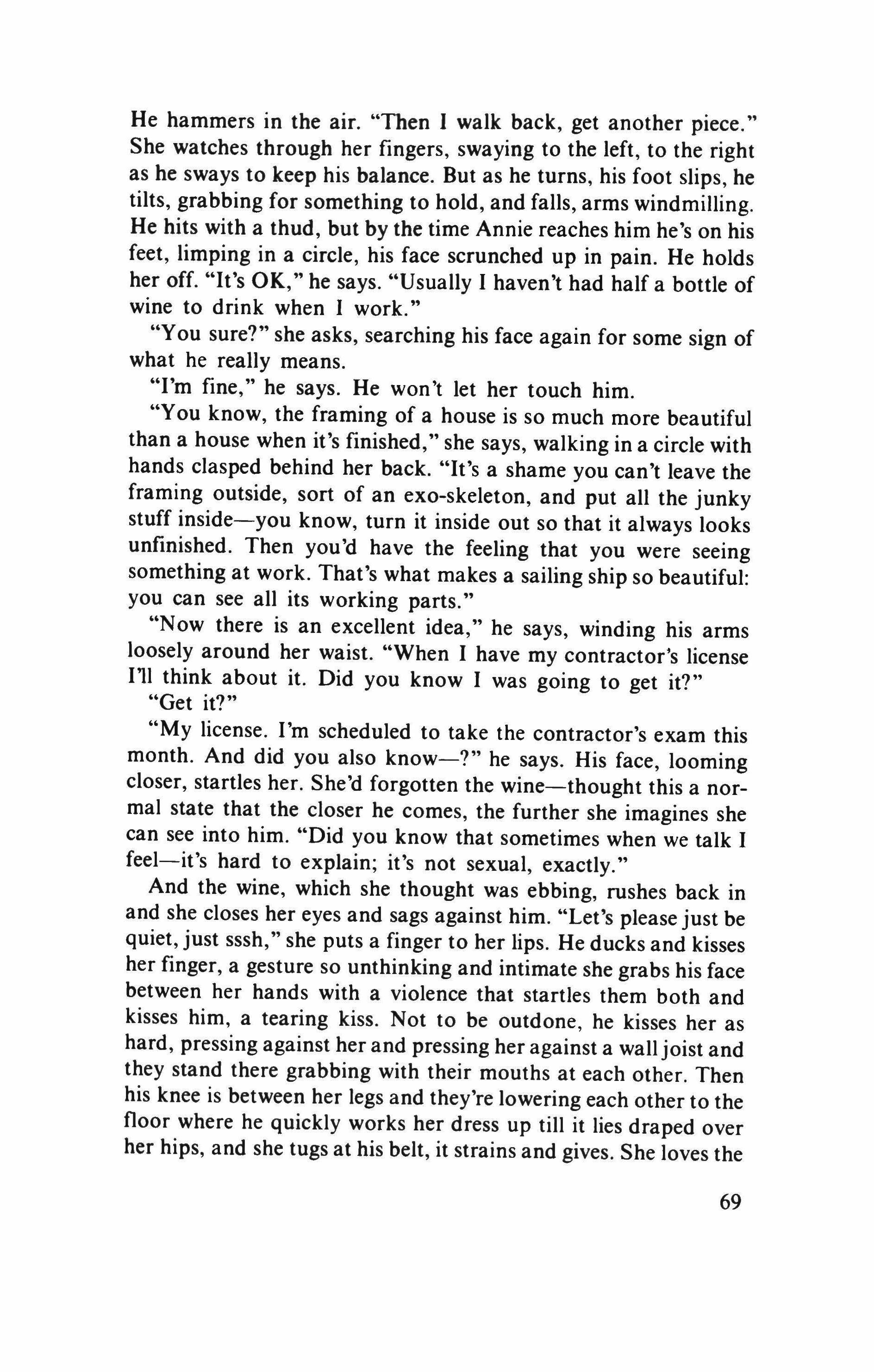
He hammers in the air. 'Then I walk back, get another piece." She watches through her fingers, swaying to the left, to the right as he sways to keep his balance. But as he turns, his foot slips, he tilts, grabbing for something to hold, and falls, arms windmilling. He hits with a thud, but by the time Annie reaches him he's on his feet, limping in a circle, his face scrunched up in pain. He holds her off. "It's OK," he says. "Usually I haven't had half a bottle of wine to drink when I work."
"You sure?" she asks, searching his face again for some sign of what he really means.
"I'm fine," he says. He won't let her touch him.
"You know, the framing of a house is so much more beautiful than a house when it's finished," she says, walking in a circle with hands clasped behind her back. "It's a shame you can't leave the framing outside, sort of an exo-skeleton, and put all the junky stuff inside-you know, turn it inside out so that it always looks unfinished. Then you'd have the feeling that you were seeing something at work. That's what makes a sailing ship so beautiful: you can see all its working parts."
"Now there is an excellent idea," he says, winding his arms loosely around her waist. "When I have my contractor's license 111 think about it. Did you know I was going to get it?"
"Get it?"
"My license. I'm scheduled to take the contractor's exam this month. And did you also know-?" he says. His face, looming closer, startles her. She'd forgotten the wine-thought this a normal state that the closer he comes, the further she imagines she can see into him. "Did you know that sometimes when we talk I feel-it's hard to explain; it's not sexual, exactly."
And the wine, which she thought was ebbing, rushes back in and she closes her eyes and sags against him. "Let's please just be quiet, just sssh," she puts a finger to her lips. He ducks and kisses her finger, a gesture so unthinking and intimate she grabs his face between her hands with a violence that startles them both and kisses him, a tearing kiss. Not to be outdone, he kisses her as hard, pressing against her and pressing her against a wall joist and they stand there grabbing with their mouths at each other. Then his knee is between her legs and they're lowering each other to the floor where he quickly works her dress up till it lies draped over her hips, and she tugs at his belt, it strains and gives. She loves the
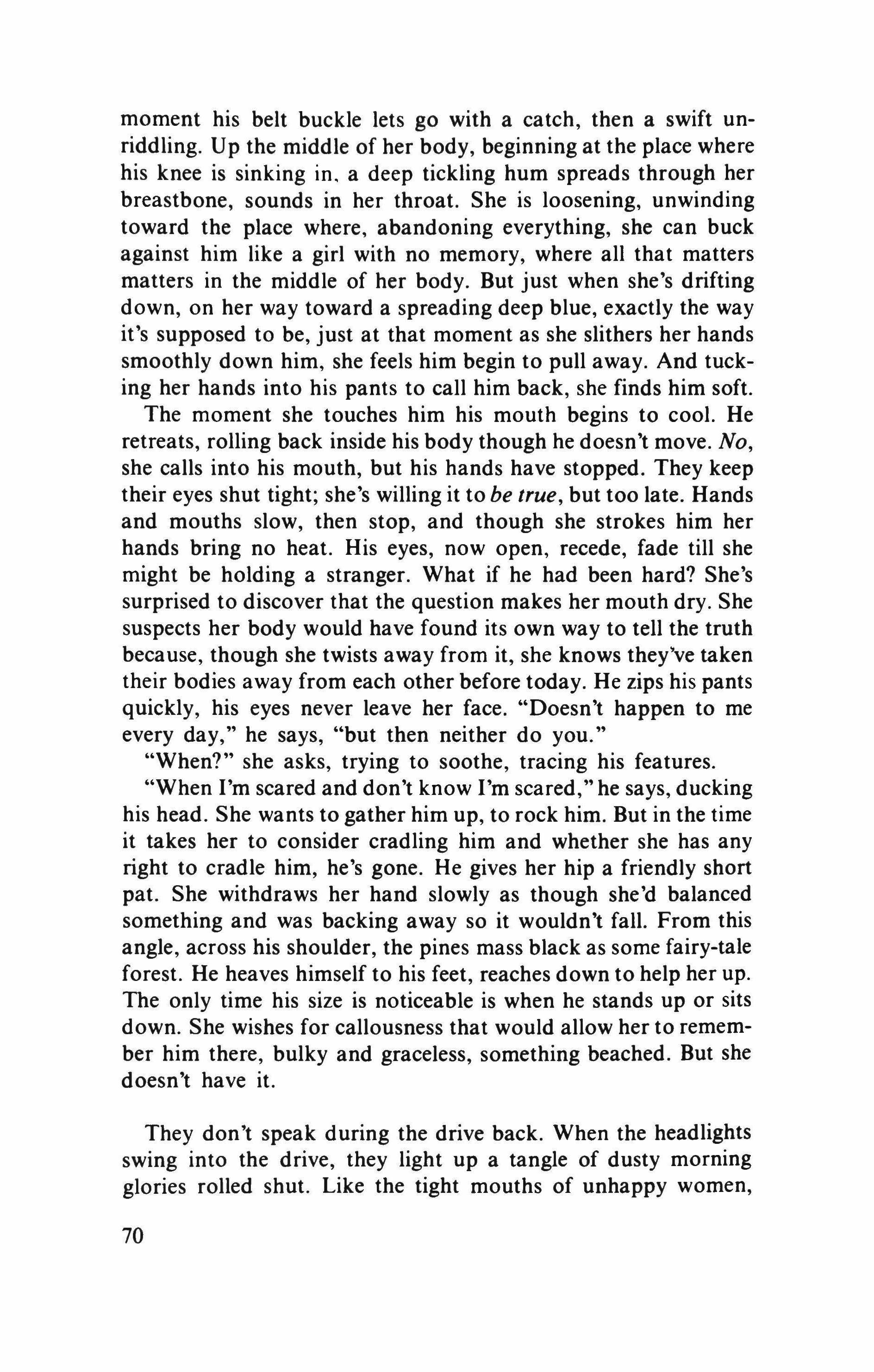
moment his belt buckle lets go with a catch, then a swift unriddling. Up the middle of her body, beginning at the place where his knee is sinking in, a deep tickling hum spreads through her breastbone, sounds in her throat. She is loosening, unwinding toward the place where, abandoning everything, she can buck against him like a girl with no memory, where all that matters matters in the middle of her body. But just when she's drifting down, on her way toward a spreading deep blue, exactly the way it's supposed to be, just at that moment as she slithers her hands smoothly down him, she feels him begin to pull away. And tucking her hands into his pants to call him back, she finds him soft.
The moment she touches him his mouth begins to cool. He retreats, rolling back inside his body though he doesn't move. No, she calls into his mouth, but his hands have stopped. They keep their eyes shut tight; she's willing it to be true, but too late. Hands and mouths slow, then stop, and though she strokes him her hands bring no heat. His eyes, now open, recede, fade till she might be holding a stranger. What if he had been hard? She's surprised to discover that the question makes her mouth dry. She suspects her body would have found its own way to tell the truth because, though she twists away from it, she knows they've taken their bodies away from each other before today. He zips his pants quickly, his eyes never leave her face. "Doesn't happen to me every day," he says, "but then neither do you."
"When?" she asks, trying to soothe, tracing his features.
"When I'm scared and don't know I'm scared," he says, ducking his head. She wants to gather him up, to rock him. But in the time it takes her to consider cradling him and whether she has any right to cradle him, he's gone. He gives her hip a friendly short pat. She withdraws her hand slowly as though she'd balanced something and was backing away so it wouldn't fall. From this angle, across his shoulder, the pines mass black as some fairy-tale forest. He heaves himself to his feet, reaches down to help her up. The only time his size is noticeable is when he stands up or sits down. She wishes for callousness that would allow her to remember him there, bulky and graceless, something beached. But she doesn't have it.
They don't speak during the drive back. When the headlights swing into the drive, they light up a tangle of dusty morning glories rolled shut. Like the tight mouths of unhappy women,

Annie thinks. The house looks hard edged, bleached under the bare light bulb hanging from the porch ceiling, black beyond the sharp rim of the light. This is the last possible hour, hurry, she speaks to herself. When the truck stops, thick summer air tumbles into the cab. The wine that had blurred the edges is gone, and they both sit blinking in the strong light that intrudes into the yard. "It's really going to happen, isn't it?" Stephen asks, scratching intently at a bare spot on the steering wheel.
"Yes it is," she says. The lawyer said divorce was like a pregnancy; it hadn't fully dawned on her until now why that was so offensive. "We file it," he'd said, "then bang, one day no more marriage." What lies.
She thinks of the time he left for a few months, to get his balance he said. They'd been married for a year. For two months he lived in his station wagon, traveling and camping in one state park, then another. Just being, that's what he said he was doing. Coming home, he told her how he'd parked one night by a river, how the car had been mired in mud up to the wheel wells, how he'd waited there for three days for the mud to dry. The longer the story went on, the more conscious she'd become of a tightening in her chest, a sense of longing, a desire to be there with him and a knowledge that she could never be. She couldn't wait. And she had seen that the very thing she loved most about him-his stubborn trust in the face of all odds-was pushing them most surely apart.
She had seen it; then the urgency had faded and she'd forgotten. Until now. The cab of the truck is too small and she fumbles outside for the handle. "Let's eat," she says. Inside, she throws on each light she passes until the house is blazing and they bustle in the brilliant kitchen. Stephen scrapes the fish, scales fly off in a mist; he whacks off the heads, splits the bellies, reaches in and pulls out the entrails with one twist. She quarters an onion, tosses it in melting butter in the skillet, mashes garlic, shakes in rosemary, finds the sherry and splashes it in the pan. And in a swarm of affection for Stephen, husband-this privately-who may sometimes live without electricity but who always keeps a bottle of sherry, she kisses him, a large loud kiss on the back of the neck that causes him to flinch. They work together. Then the phone rings and she can tell it's his parents by the way he answers two questions at once: yes and no, fine and getting better.
She can see them-one in the den, one in the kitchen. And he

says, "Guess who's here?" while she shakes her head. "Want to talk to her?" he asks and hands her the phone.
"Oh, just cooking dinner," she answers, glaring at Stephen. "Fine, how's your health?" This to Stephen's mother, whose shy question Annie at first, unbelieving, heard as hows your heart? to which she almost shouted how did you know?
"That recipe you gave me made me famous at the lodge," his father says. "It sure did and Annie you know we miss you, we really do, you're special to us and please hurry back ifthere's any way you can."
"That's right, let us know," says his mother. Stephen takes the phone again while Annie tends the fish, turning them with an engrossed frown. Behind her, Stephen says, "Mother," drawing it out patiently, then sharper, "Mother." Annie can feel his mother taking her by the hand, wanting to buy her things, sitting her down in their kitchen to explain her sorrow, her suffering for the wrongs done to her son. Invoking the family as if Annie could forget. And Annie thinks this is how the judge will look up at her once, coldly, as he signs the papers below irretrievably broken, pictures of his children, grandchildren, wife arranged in a phalanx on his desk. And in fact, it does happen this way.
Now Stephen's tone is harsher. "Mother that's enough, we'll do what we can," he says. His mother is also that woman who lives next door to Annie's red-haired man friend. He works the night desk at the newspaper, comes home at two A.M. and Annie's waiting, wide awake. She's in and out of his house all hours of the day and night. Once she climbed in the window at four A.M. because she couldn't wake him. The woman next door stands back from the screen door and watches. One Saturday morning she walked around the back of Annie's car and studied her license plate, asked "Are you married?" "Yes," Annie yelled back, "yes I am," and disappeared inside his house, knowing she hadn't lied.
"It's done. Let's eat," she says when Stephen hangs up the phone. He always looks ashen after talking with his parents. She works loose a fish, skin and all, for Stephen. Stephen makes kabobs on his fork, he twirls the skin around his fork and eats it while she looks away. He mops his plate with a roll until there's only a thin film of grease and the milk-white spine of the fish with its upcurved ribs left on his plate. He scans her plate. She knows what comes next.
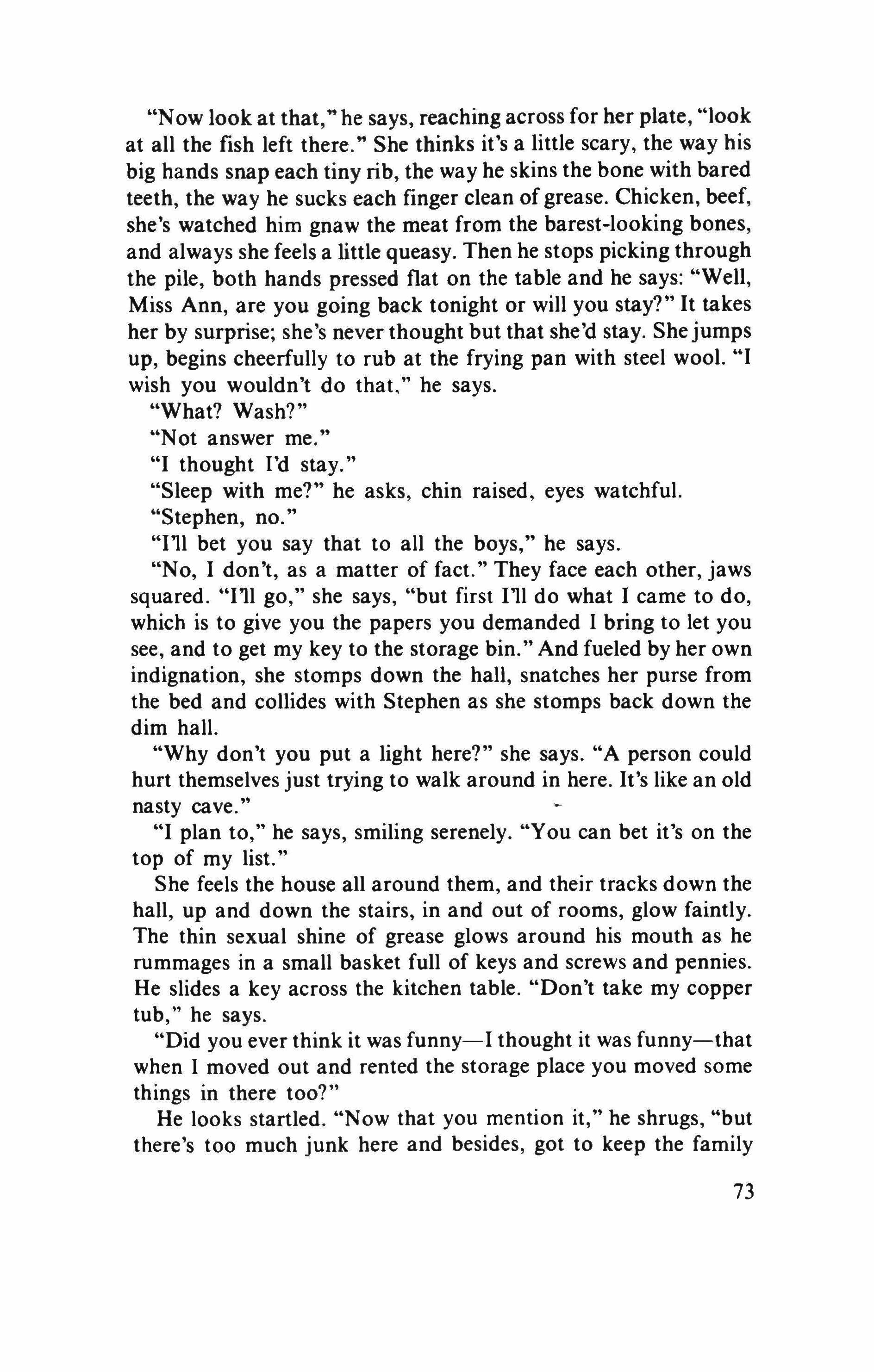
"Now look at that," he says, reaching across for her plate, "look at all the fish left there." She thinks it's a little scary, the way his big hands snap each tiny rib, the way he skins the bone with bared teeth, the way he sucks each finger clean of grease. Chicken, beef, she's watched him gnaw the meat from the barest-looking bones, and always she feels a little queasy. Then he stops picking through the pile, both hands pressed flat on the table and he says: "Well, Miss Ann, are you going back tonight or will you stay?" It takes her by surprise; she's never thought but that she'd stay. She jumps up, begins cheerfully to rub at the frying pan with steel wool. "I wish you wouldn't do that," he says.
"What? Wash?"
"Not answer me."
"I thought I'd stay."
"Sleep with me?" he asks, chin raised, eyes watchful.
"Stephen, no."
"I'll bet you say that to all the boys," he says.
"No, 1 don't, as a matter of fact." They face each other, jaws squared. "111 go," she says, "but first I'll do what 1 came to do, which is to give you the papers you demanded I bring to let you see, and to get my key to the storage bin." And fueled by her own indignation, she stomps down the hall, snatches her purse from the bed and collides with Stephen as she stomps back down the dim hall.
"Why don't you put a light here?" she says. "A person could hurt themselves just trying to walk around in here. It's like an old nasty cave."
"I plan to," he says, smiling serenely. "You can bet it's on the top of my list."
She feels the house all around them, and their tracks down the hall, up and down the stairs, in and out of rooms, glow faintly. The thin sexual shine of grease glows around his mouth as he rummages in a small basket full of keys and screws and pennies. He slides a key across the kitchen table. "Don't take my copper tub," he says.
"Did you ever think it was funny-I thought it was funny-that when I moved out and rented the storage place you moved some things in there too?"
He looks startled. "Now that you mention it," he shrugs, "but there's too much junk here and besides, got to keep the family
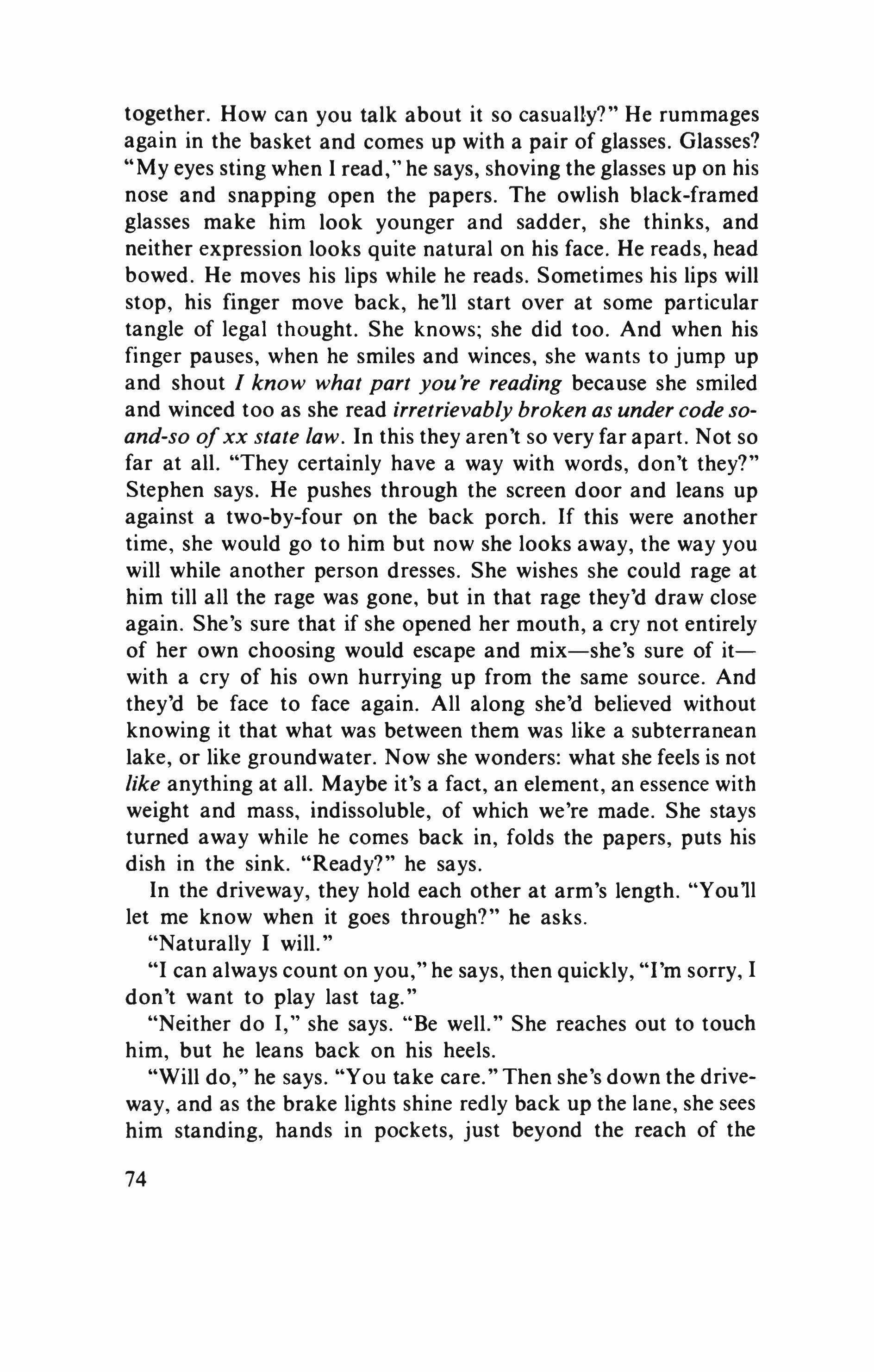
together. How can you talk about it so casually?" He rummages again in the basket and comes up with a pair of glasses. Glasses? "My eyes sting when I read," he says, shoving the glasses up on his nose and snapping open the papers. The owlish black-framed glasses make him look younger and sadder, she thinks, and neither expression looks quite natural on his face. He reads, head bowed. He moves his lips while he reads. Sometimes his lips will stop, his finger move back, he'll start over at some particular tangle of legal thought. She knows; she did too. And when his finger pauses, when he smiles and winces, she wants to jump up and shout I know what part you're reading because she smiled and winced too as she read irretrievably broken as under code soand-so of xx state law. In this they aren't so very far apart. Not so far at all. "They certainly have a way with words, don't they?"
Stephen says. He pushes through the screen door and leans up against a two-by-four on the back porch. If this were another time, she would go to him but now she looks away, the way you will while another person dresses. She wishes she could rage at him till all the rage was gone, but in that rage they'd draw close again. She's sure that if she opened her mouth, a cry not entirely of her own choosing would escape and mix-she's sure of itwith a cry of his own hurrying up from the same source. And they'd be face to face again. All along she'd believed without knowing it that what was between them was like a subterranean lake, or like groundwater. Now she wonders: what she feels is not like anything at all. Maybe it's a fact, an element, an essence with weight and mass, indissoluble, of which we're made. She stays turned away while he comes back in, folds the papers, puts his dish in the sink. "Ready?" he says.
In the driveway, they hold each other at arm's length. "You'II let me know when it goes through?" he asks.
"Naturally I will."
"I can always count on you," he says, then quickly, "I'm sorry, I don't want to play last tag."
"Neither do I," she says. "Be well." She reaches out to touch him, but he leans back on his heels.
"Will do," he says. "You take care." Then she's down the driveway, and as the brake lights shine redly back up the lane, she sees him standing, hands in pockets, just beyond the reach of the
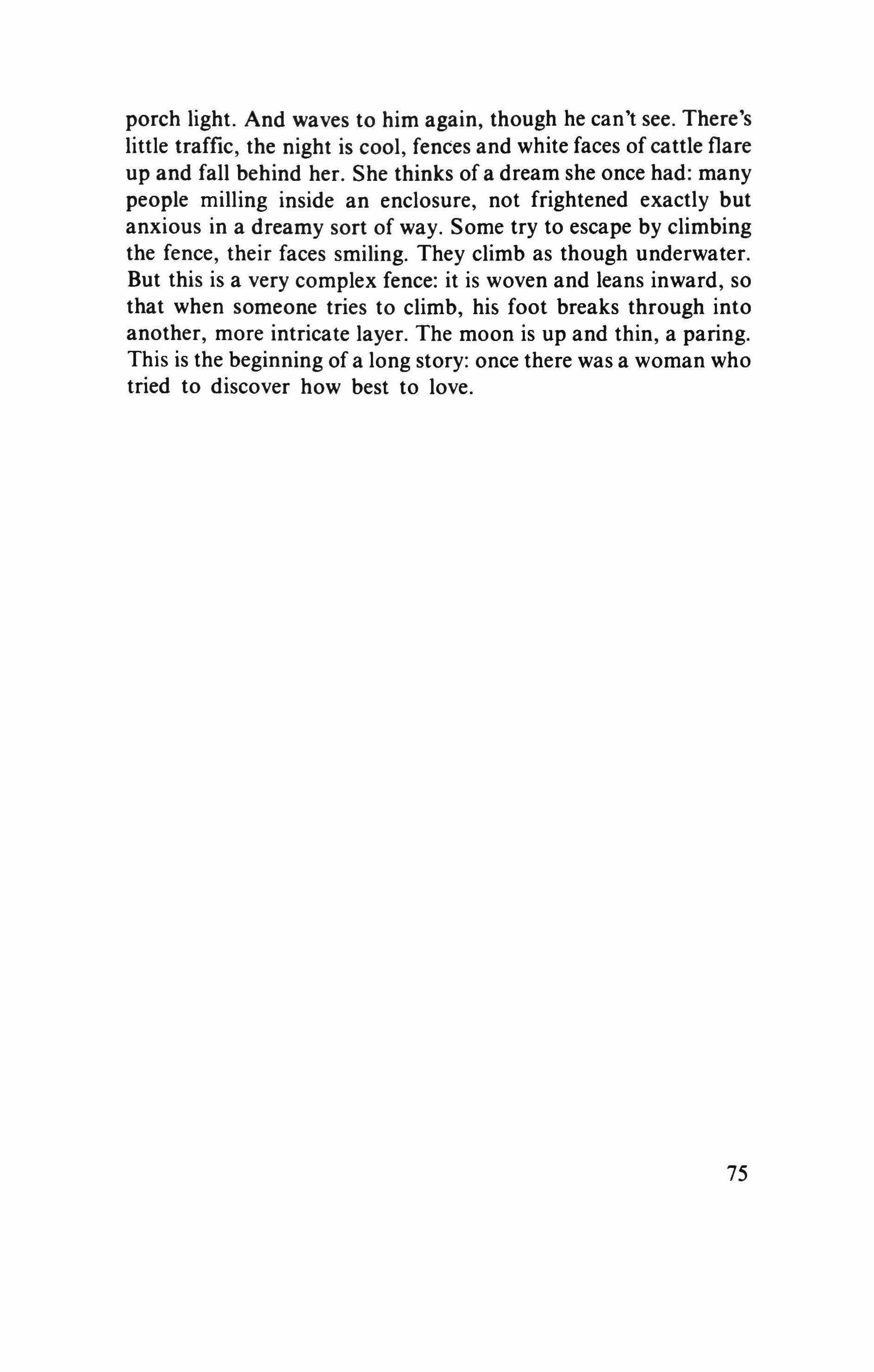
porch light. And waves to him again, though he can't see. There's little traffic, the night is cool, fences and white faces of cattle flare up and fall behind her. She thinks of a dream she once had: many people milling inside an enclosure, not frightened exactly but anxious in a dreamy sort of way. Some try to escape by climbing the fence, their faces smiling. They climb as though underwater. But this is a very complex fence: it is woven and leans inward, so that when someone tries to climb, his foot breaks through into another, more intricate layer. The moon is up and thin, a paring. This is the beginning of a long story: once there was a woman who tried to discover how best to love.
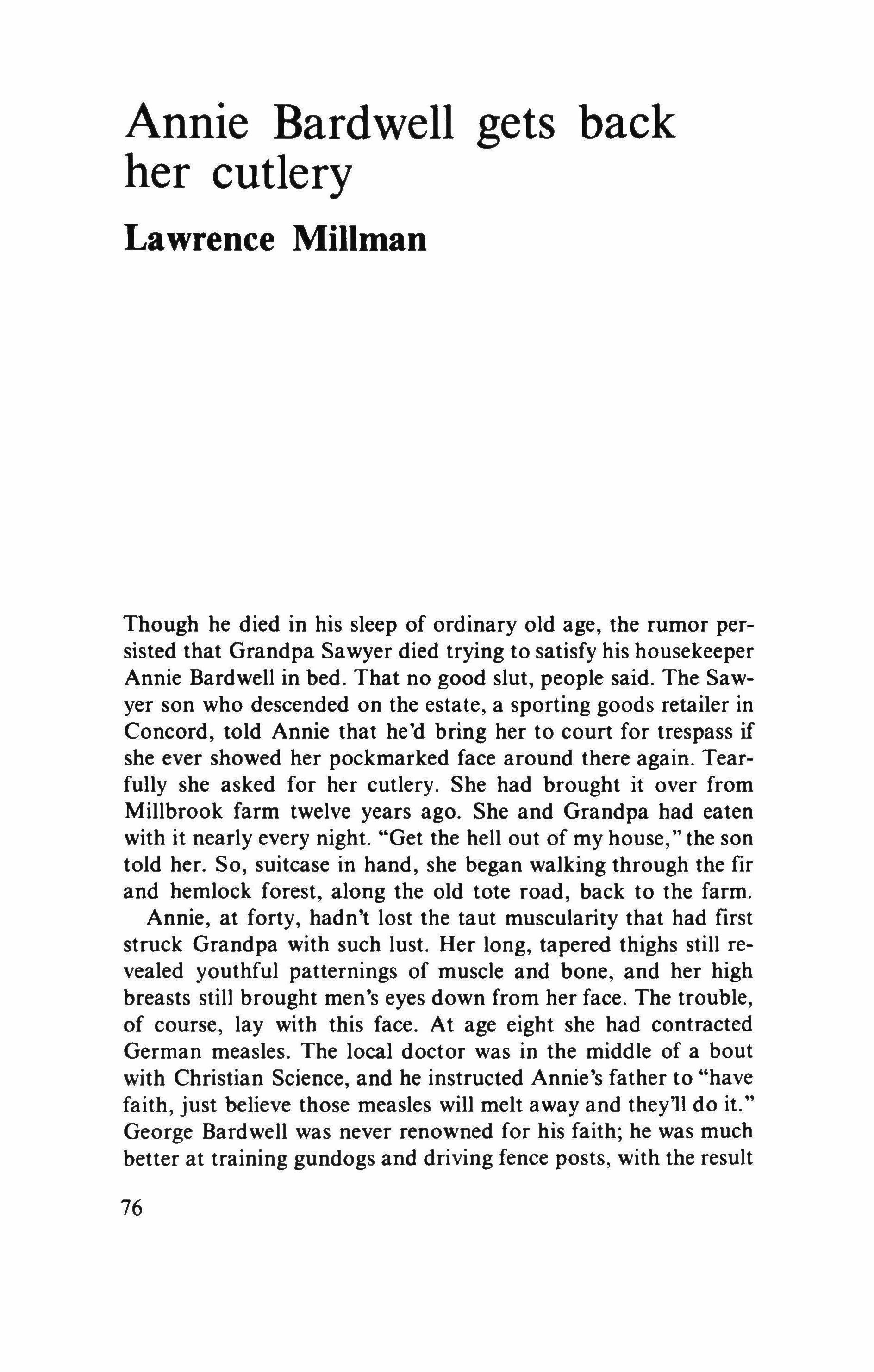
Though he died in his sleep of ordinary old age, the rumor persisted that Grandpa Sawyer died trying to satisfy his housekeeper Annie Bardwell in bed. That no good slut, people said. The Sawyer son who descended on the estate, a sporting goods retailer in Concord, told Annie that he'd bring her to court for trespass if she ever showed her pockmarked face around there again. Tearfully she asked for her cutlery. She had brought it over from Millbrook farm twelve years ago. She and Grandpa had eaten with it nearly every night. "Get the hell out of my house," the son told her. So, suitcase in hand, she began walking through the fir and hemlock forest, along the old tote road, back to the farm. Annie, at forty, hadn't lost the taut muscularity that had first struck Grandpa with such lust. Her long, tapered thighs still revealed youthful patternings of muscle and bone, and her high breasts still brought men's eyes down from her face. The trouble, of course, lay with this face. At age eight she had contracted German measles. The local doctor was in the middle of a bout with Christian Science, and he instructed Annie's father to "have faith, just believe those measles will melt away and they'll do it." George Bardwell was never renowned for his faith; he was much better at training gundogs and driving fence posts, with the result
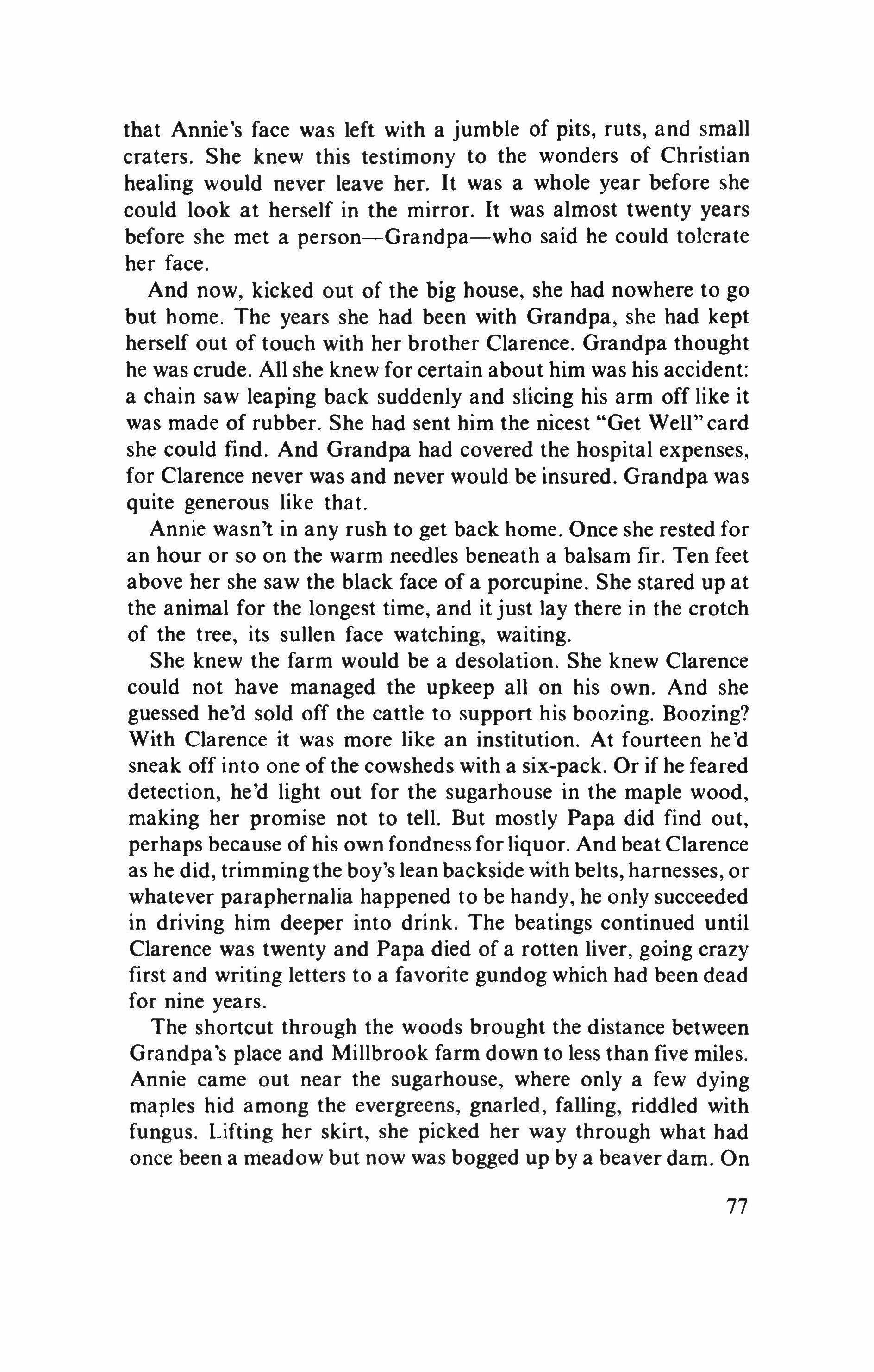
that Annie's face was left with a jumble of pits, ruts, and small craters. She knew this testimony to the wonders of Christian healing would never leave her. It was a whole year before she could look at herself in the mirror. It was almost twenty years before she met a person-Grandpa-who said he could tolerate her face.
And now, kicked out of the big house, she had nowhere to go but home. The years she had been with Grandpa, she had kept herself out of touch with her brother Clarence. Grandpa thought he was crude. All she knew for certain about him was his accident: a chain saw leaping back suddenly and slicing his arm off like it was made of rubber. She had sent him the nicest "Get Well" card she could find. And Grandpa had covered the hospital expenses, for Clarence never was and never would be insured. Grandpa was quite generous like that.
Annie wasn't in any rush to get back home. Once she rested for an hour or so on the warm needles beneath a balsam fir. Ten feet above her she saw the black face of a porcupine. She stared up at the animal for the longest time, and it just lay there in the crotch of the tree, its sullen face watching, waiting.
She knew the farm would be a desolation. She knew Clarence could not have managed the upkeep all on his own. And she guessed he'd sold off the cattle to support his boozing. Boozing? With Clarence it was more like an institution. At fourteen he'd sneak off into one of the cowsheds with a six-pack. Or if he feared detection, he'd light out for the sugarhouse in the maple wood, making her promise not to tell. But mostly Papa did find out, perhaps because of his own fondness for liquor. And beat Clarence as he did, trimming the boy's lean backside with belts, harnesses, or whatever paraphernalia happened to be handy, he only succeeded in driving him deeper into drink. The beatings continued until Clarence was twenty and Papa died of a rotten liver, going crazy first and writing letters to a favorite gundog which had been dead for nine years.
The shortcut through the woods brought the distance between Grandpa's place and Millbrook farm down to less than five miles. Annie came out near the sugarhouse, where only a few dying maples hid among the evergreens, gnarled, falling, riddled with fungus. Lifting her skirt, she picked her way through what had once been a meadow but now was bogged up by a beaver dam. On
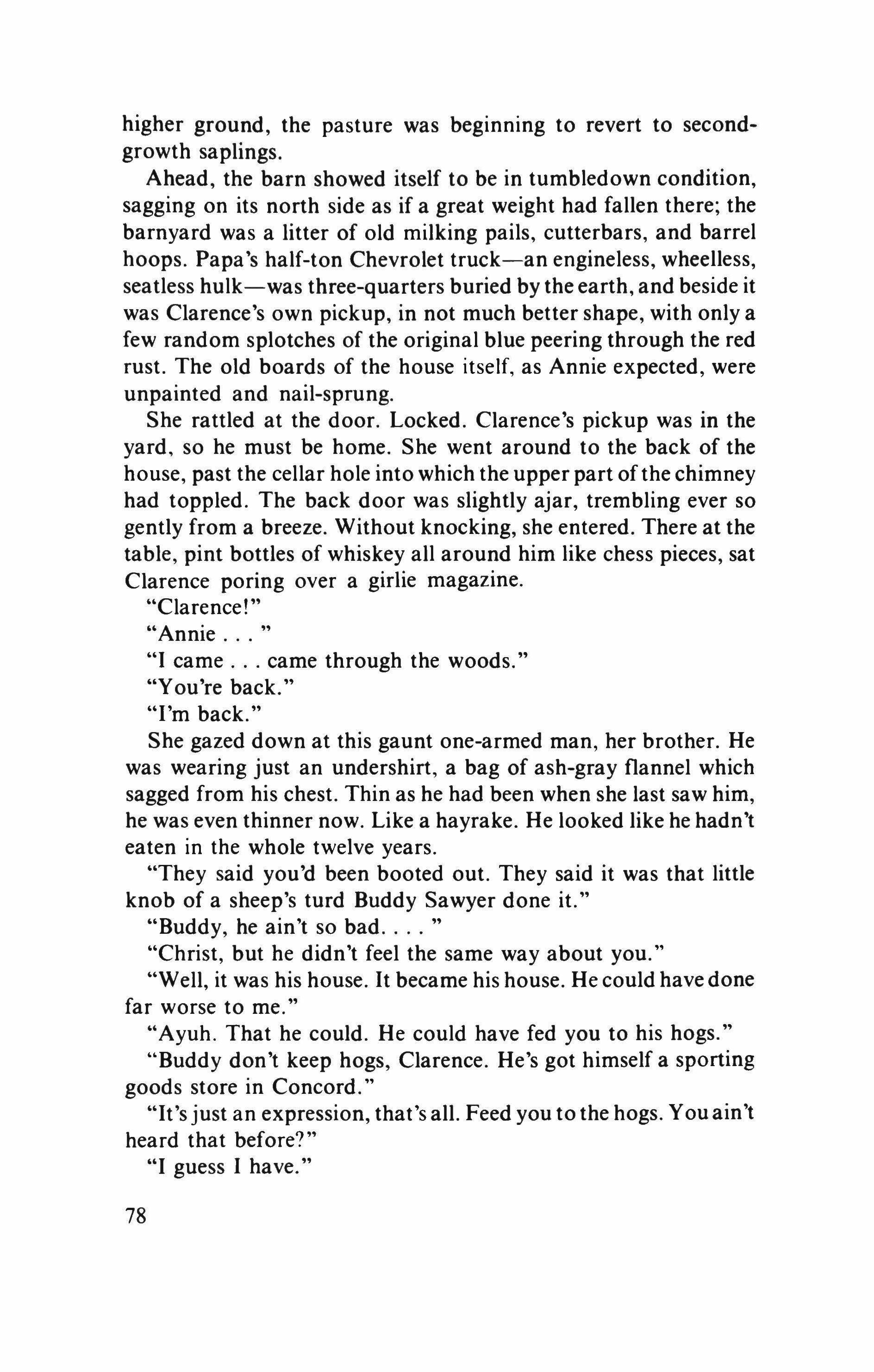
higher ground, the pasture was beginning to revert to secondgrowth saplings.
Ahead, the barn showed itself to be in tumbledown condition, sagging on its north side as if a great weight had fallen there; the barnyard was a litter of old milking pails, cutterbars, and barrel hoops. Papa's half-ton Chevrolet truck-an engineless, wheelless, seatless hulk-was three-quarters buried by the earth, and beside it was Clarence's own pickup, in not much better shape, with only a few random splotches of the original blue peering through the red rust. The old boards of the house itself, as Annie expected, were unpainted and nail-sprung.
She rattled at the door. Locked. Clarence's pickup was in the yard, so he must be home. She went around to the back of the house, past the cellar hole into which the upper part of the chimney had toppled. The back door was slightly ajar, trembling ever so gently from a breeze. Without knocking, she entered. There at the table, pint bottles of whiskey all around him like chess pieces, sat Clarence poring over a girlie magazine.
"Clarence!
"Annie came came through the woods."
"You're back."
"I'm back."
She gazed down at this gaunt one-armed man, her brother. He was wearing just an undershirt, a bag of ash-gray flannel which sagged from his chest. Thin as he had been when she last saw him, he was even thinner now. Like a hayrake. He looked like he hadn't eaten in the whole twelve years.
"They said you'd been booted out. They said it was that little knob of a sheep's turd Buddy Sawyer done it."
"Buddy, he ain't so bad
"Christ, but he didn't feel the same way about you."
"Well, it was his house. It became his house. He could have done far worse to me."
"Ayuh. That he could. He could have fed you to his hogs."
"Buddy don't keep hogs, Clarence. He's got himself a sporting goods store in Concord."
"It's just an expression, that's all. Feed you to the hogs. You ain't heard that before?" guess' have."

She fell to a shy silence, as if they had been introduced only five minutes ago. Then Clarence said, "Well, set down your suitcase. You look silly just standing there, like a salesman."
Annie put down her suitcase.
"Kinda warming up a little," Clarence observed. He swigged from a pint.
"A little."
"Black flies'll be out soon. Like to collect all those little buggers in a bag and dump them in the Connecticut River."
"Mosquitoes as well."
"Ayuh."
Silence. All of a sudden Annie grabbed his wrist, a wrist almost more slender than her own, and shaking it, she said, "That Buddy has kept all our cutlery. All our silver, Mama's dowry that she brought up from Lancaster. Kept it like it was his own. You think that's right?"
"That old man leave you any money? Any money at all?"
"I don't know, Clarence. But that cutlery, it's been in the family forever and ever.
"Forever and ever," he mimicked, shaking his wrist free from her grasp. "But forever don't matter. Nothing matters. Tableware. Cattle. Hay crop. Mowing. Raking. Baling. Hauling. Believe this matters, though." He held up a bottle of whiskey and cracked a grin full of tooth-black. Eyes tightly shut, his head jerked fowlwise, and down in his face came dark unshorn hair all hung in clots like a sheep's scut. Drunk, she thought. It's just like old times. And she poured a small glass of her own.
"That's right, girl," he said. "You have to help yourself around here.
"They shuh got a lot of liquor at the Sawyer place," she said, slowly draining her glass.
"I bet they do."
"Wine. That's what we had with just about each and every dinner. Can you imagine?"
"You can't get much hum off of wine. Quiet stuff." and whiskey like you never seen. Johnny Walker Red Label. Row upon row of it."
They sat silently in each other's company. Annie tried to accustom herself to the absence of an arm where an arm should have been. She watched Clarence's face-a face deep and pensive, as if
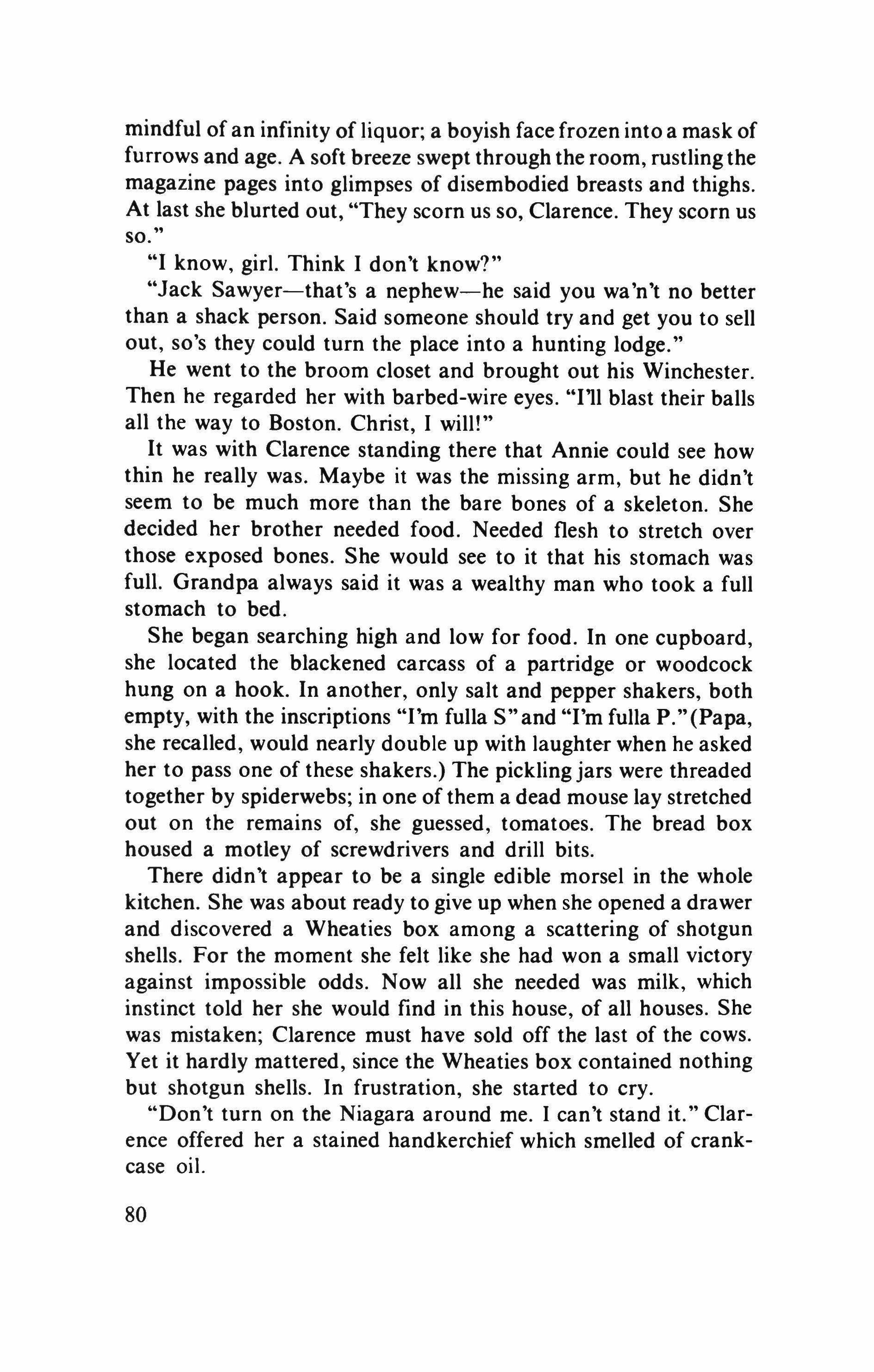
mindful of an infinity of liquor; a boyish face frozen into a mask of furrows and age. A soft breeze swept through the room, rustling the magazine pages into glimpses of disembodied breasts and thighs. At last she blurted out, "They scorn us so, Clarence. They scorn us so.
"I know, girl. Think I don't know?"
"Jack Sawyer-that's a nephew-he said you wa'n't no better than a shack person. Said someone should try and get you to sell out, so's they could turn the place into a hunting lodge."
He went to the broom closet and brought out his Winchester. Then he regarded her with barbed-wire eyes. "I'll blast their balls all the way to Boston. Christ, I will!"
It was with Clarence standing there that Annie could see how thin he really was. Maybe it was the missing arm, but he didn't seem to be much more than the bare bones of a skeleton. She decided her brother needed food. Needed flesh to stretch over those exposed bones. She would see to it that his stomach was full. Grandpa always said it was a wealthy man who took a full stomach to bed.
She began searching high and low for food. In one cupboard, she located the blackened carcass of a partridge or woodcock hung on a hook. In another, only salt and pepper shakers, both empty, with the inscriptions "I'm fulla S"and "I'm fulla P."(Papa, she recalled, would nearly double up with laughter when he asked her to pass one of these shakers.) The picklingjars were threaded together by spiderwebs; in one of them a dead mouse lay stretched out on the remains of, she guessed, tomatoes. The bread box housed a motley of screwdrivers and drill bits.
There didn't appear to be a single edible morsel in the whole kitchen. She was about ready to give up when she opened a drawer and discovered a Wheaties box among a scattering of shotgun shells. For the moment she felt like she had won a small victory against impossible odds. Now all she needed was milk, which instinct told her she would find in this house, of all houses. She was mistaken; Clarence must have sold off the last of the cows. Yet it hardly mattered, since the Wheaties box contained nothing but shotgun shells. In frustration, she started to cry.
"Don't turn on the Niagara around me. I can't stand it." Clarence offered her a stained handkerchief which smelled of crankcase oil.

"But Clarence, you can't be eating. There's not a thing in the house and you're just so thin. You bothered about eating at all? Say you're eating something
"Miss Busybody
"Oh, Clarence, please
Disgust fairly leaped from his face. He stood up again and went out the back, pausing as he left to say: "You know why that front door is locked? Know why? Social workers. They're thicker than fiddlers in hell. Come here to tell me I can't live like this or I can't live like that. Say I should learn me a trade, go to night school. Shit in a bucket, they're just as bad as those Sawyers! Next time one of them jolter heads comes for a visit, 111 blow his balls to Boston too! If there's one thing I can't stomach, it's a busybody."
Annie smiled through her tears. Her brother's tongue was as sharp as ever. He could still vent his spleen with the best of them. She recalled the time twenty years ago when the New York lawyer had driven up in his big Plymouth sedan. Papa, dying, wanted to sell the farm for a song, but Clarence so insulted the man, calling him names like "wicked Jew" and "sidewinding sonafabitch," that he just turned around and drove back to New York in a huff. "He takes us for country jakes," her brother said. That was the last time Papa whipped him.
Clarence returned with a greasy duck-sack and dumped it on the kitchen table. Out came a torrent of dead animals: a skunk, a raccoon in a rind of blood, a fox, squirrels, and a monster jackrabbit, one big eye wrinkled and black, punctured by a buckshot. Annie watched while a loop of putty-colored intestine slowly eased from the underside of the skunk.
Her brother's eyes sparkled; they seemed piercing enough to freeze the flies that now hovered over the table.
"Ever see this much around that rich man's across the way?"
"Clarence, that man loved me
"All decent grub except maybe the fox, which is got mange. Coon's been run over. It's dinner. The others I shot yesterday. Can shoot just as good with one arm as with two. And this sack don't tell half the story. I get deer, poach them whenever I like. Used to jack them, but no Fish and Game man's been around for years. Porcupines. Woodchucks. Rabbits. I don't go out nowadays without double-ought buckshot in my belt. Not been to a supermarket in two years. No need to."

"I'm not so very smart about most things, but don't you think these creatures, they're not fit not fit to ?"
But she knew better than to tell him about the meals at Grandpa's. Steak, always the best cut of steak, twice a week; fresh fish from the Blue Fin in Littleton; and greens like broccoli and Brussels sprouts, lovely greens, huge heaping plates of them.
"A man gets older," Clarence said. "He finds there're lots of foods he can do just as well without. All them canned foods, for instance. They turn your insides to mush and you wake up one morning feeling soft as cowshit. That won't afflict me, girl."
There was an odd intensity in his face as his lank and corded hand shoved all the animals but the bloodstained raccoon back in the sack. Annie thought, he enjoys these animals, actually enjoys them. And as she gazed at him, what she took to be his delight spread naturally to her, his sister. All at once she felt quite close to this man. She felt like touching him, pressing her cheek to his cheek, to show him that all those years at Grandpa's hadn't made her cold to him. She wanted to tell him, yes, we must eat what the Lord provides. If He chooses to bless us with raccoon or even with porcupine, then we must be grateful. Many folks don't even have that. But she was so weary from her tramp through the woods, so weary these last few days after Grandpa's death, all she could manage was a weak smile. She closed her eyes and fell asleep right there at the table, and in a dream she was scraping flattened raccoon bodies off the road with a spatula.
She awakened alone in a kitchen half-tinted with darkness. From the window she could see the sun slip down, yellow and dying, over the hills of Vermont. Clarence was nowhere to be seen. He had to get away from me, she thought to herself. Couldn't tolerate me being a busybody.
The raccoon was still on the table. Even in death its bandit face still flinched. The caved shape gave off a slight reek, which mingled with the stronger reek of Clarence's sweat. Annie guessed she was meant to skin and dress the creature, a task she was in no hurry to accomplish. So she decided to find out what disasters had befallen the house since Clarence had become its sole occupant. She headed first for the parlor, her mother's place of refuge when Papa was drunk. George Bardwell had tended to treat his wife like she was a breechy cow, not really clouting her but slap-

ping her around a bit. Yet he would never follow her into the parlor for fear of breaking one of her plates or glasses. Jennie Bardwell always swore that if her husband so much as chipped a sliver off her crystal, she would nail him with his own shotgun.
Now as she stood by the door, Annie could see that the parlor had been turned into a workroom. There was a cellary damp odor in the air. The davenport was stacked with old and presumably dead batteries. A V-8 engine sat in its own oil on the rug (a rug, she noticed, worn down to its essential warp and woof). The engine appeared to be partially dismantled and then forgotten. How typical of Clarence. She stepped into an endless ocean of wrenches, crowbars, mauls, adzes, chisels, shaves, burnishers, calipers, hammers, and a Hudson Bay ax; she stepped lightly and made her way to the cabinet, inside which she could see the flowered plates and crystal untouched since she left-a strange, enduring presence in the midst of all these tools. On the shelf below, however, only dust lay upon what for ages had been the home of her mother's cutlery.
She couldn't remember a time when her mother had ever used the cutlery. Waxing and polishing, holding it at arm's length to admire the finish, Jennie always told her daughter that she was saving it for a special occasion. But special occasions were as rare at Millbrook farm as three-headed calves. Through Annie's childhood the silver sat on display in the parlor cabinet, polished to a mirrorlike brilliance yet as idle as Grandpa's antique oven peel. A few weeks before she died-of what no one precisely knew, perhaps leukemia-her mother called Annie to her bed and said, "You're not very smart and God only knows you're ugly as sin, but maybe, if you're lucky, some man will take pity on you and marry you. And then you can bring the cutlery to his house as 1 brought it to your father's."
With her mother dead, Papa began to-what was the right word for it?-"bother" her. He'd finger the curve of her breast where it nestled inside her fuzzy sweater, telling her what a big girl she was now, what a pretty girl. "I ain't nowhere near pretty, Papa," she informed him (though she was grateful for any compliment). "Oh, 1 don't mean your face," he said. "I don't mean your face at all." She remembered that warm evening when he pulled her aside in one of the cow cribs. He'd been baling since noon and the summery scent of hay lay heavy all over him. "You're my
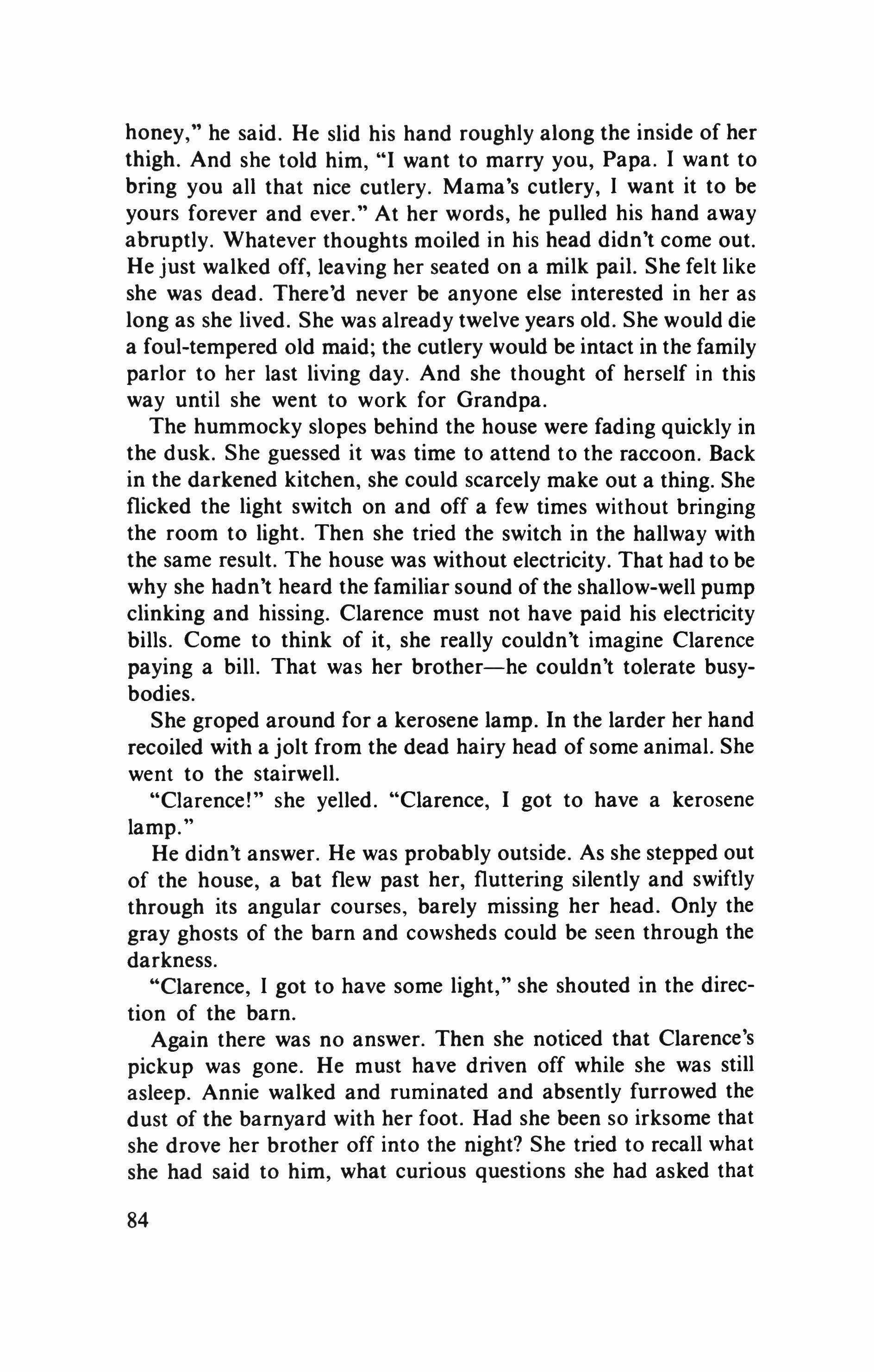
honey," he said. He slid his hand roughly along the inside of her thigh. And she told him, "I want to marry you, Papa. I want to bring you all that nice cutlery. Mama's cutlery, I want it to be yours forever and ever." At her words, he pulled his hand away abruptly. Whatever thoughts moiled in his head didn't come out. He just walked off, leaving her seated on a milk pail. She felt like she was dead. There'd never be anyone else interested in her as long as she lived. She was already twelve years old. She would die a foul-tempered old maid; the cutlery would be intact in the family parlor to her last living day. And she thought of herself in this way until she went to work for Grandpa.
The hummocky slopes behind the house were fading quickly in the dusk. She guessed it was time to attend to the raccoon. Back in the darkened kitchen, she could scarcely make out a thing. She flicked the light switch on and off a few times without bringing the room to light. Then she tried the switch in the hallway with the same result. The house was without electricity. That had to be why she hadn't heard the familiar sound of the shallow-well pump clinking and hissing. Clarence must not have paid his electricity bills. Come to think of it, she really couldn't imagine Clarence paying a bill. That was her brother-he couldn't tolerate busybodies.
She groped around for a kerosene lamp. In the larder her hand recoiled with a jolt from the dead hairy head of some animal. She went to the stairwell.
"Clarence!" she yelled. "Clarence, I got to have a kerosene lamp.
He didn't answer. He was probably outside. As she stepped out of the house, a bat flew past her, fluttering silently and swiftly through its angular courses, barely missing her head. Only the gray ghosts of the barn and cowsheds could be seen through the darkness.
"Clarence, I got to have some light," she shouted in the direction of the barn.
Again there was no answer. Then she noticed that Clarence's pickup was gone. He must have driven off while she was still asleep. Annie walked and ruminated and absently furrowed the dust of the barnyard with her foot. Had she been so irksome that she drove her brother off into the night? She tried to recall what she had said to him, what curious questions she had asked that
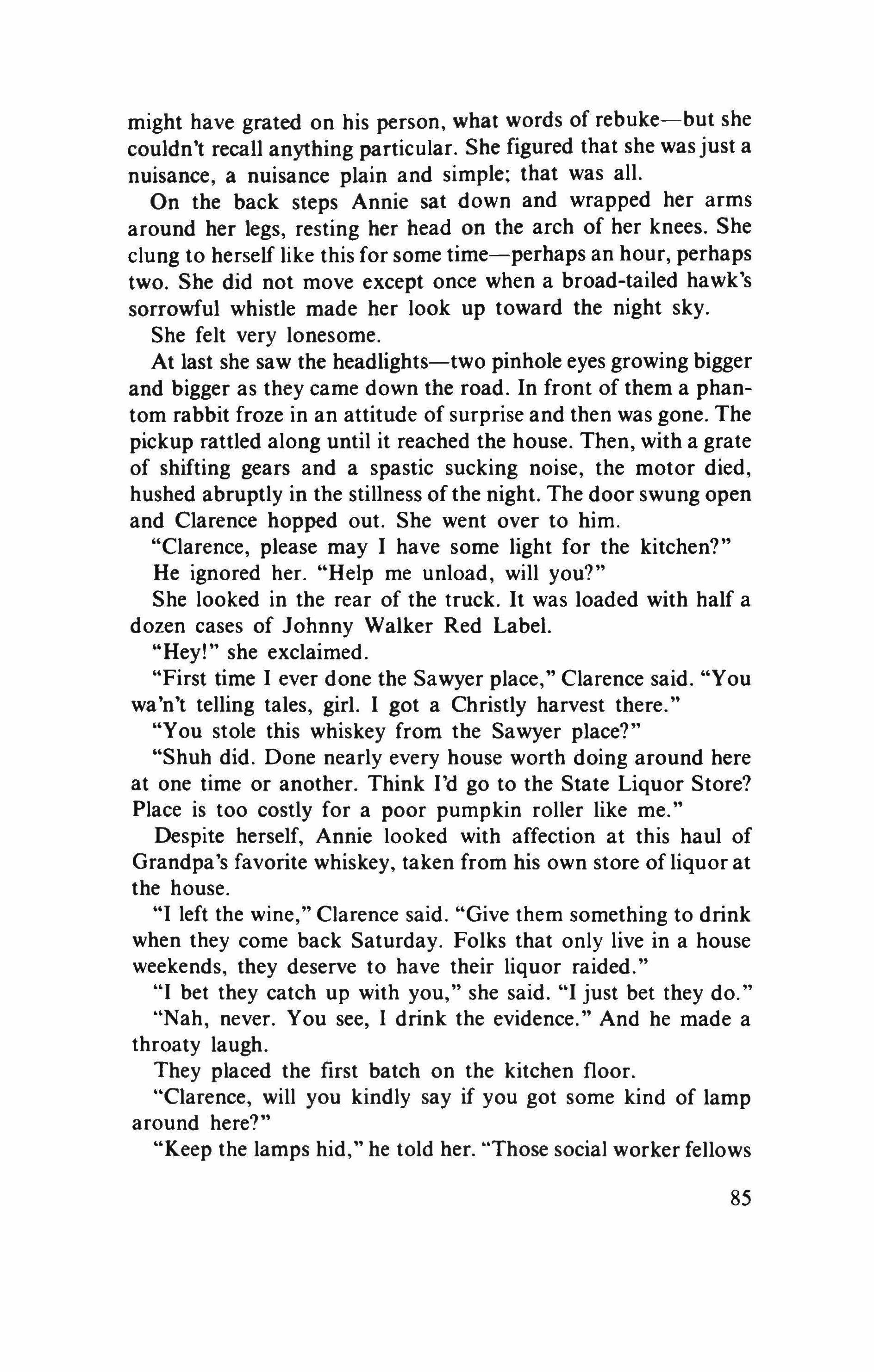
might have grated on his person, what words of rebuke-but she couldn't recall anything particular. She figured that she was just a nuisance, a nuisance plain and simple; that was all.
On the back steps Annie sat down and wrapped her arms around her legs, resting her head on the arch of her knees. She clung to herself like this for some time-perhaps an hour, perhaps two. She did not move except once when a broad-tailed hawk's sorrowful whistle made her look up toward the night sky.
She felt very lonesome.
At last she saw the headlights-two pinhole eyes growing bigger and bigger as they came down the road. In front of them a phantom rabbit froze in an attitude of surprise and then was gone. The pickup rattled along until it reached the house. Then, with a grate of shifting gears and a spastic sucking noise, the motor died, hushed abruptly in the stillness of the night. The door swung open and Clarence hopped out. She went over to him.
"Clarence, please may 1 have some light for the kitchen?"
He ignored her. "Help me unload, will you?"
She looked in the rear of the truck. It was loaded with half a dozen cases of Johnny Walker Red Label.
"Hey!" she exclaimed.
"First time 1 ever done the Sawyer place," Clarence said. "You wa'n't telling tales, girl. 1 got a Christly harvest there."
"You stole this whiskey from the Sawyer place?"
"Shuh did. Done nearly every house worth doing around here at one time or another. Think I'd go to the State Liquor Store? Place is too costly for a poor pumpkin roller like me."
Despite herself, Annie looked with affection at this haul of Grandpa's favorite whiskey, taken from his own store of liquor at the house.
"I left the wine," Clarence said. "Give them something to drink when they come back Saturday. Folks that only live in a house weekends, they deserve to have their liquor raided."
"I bet they catch up with you," she said. "I just bet they do."
"Nah, never. You see, 1 drink the evidence." And he made a throaty laugh.
They placed the first batch on the kitchen floor.
"Clarence, will you kindly say if you got some kind of lamp around here?"
"Keep the lamps hid," he told her. "Those social worker fellows
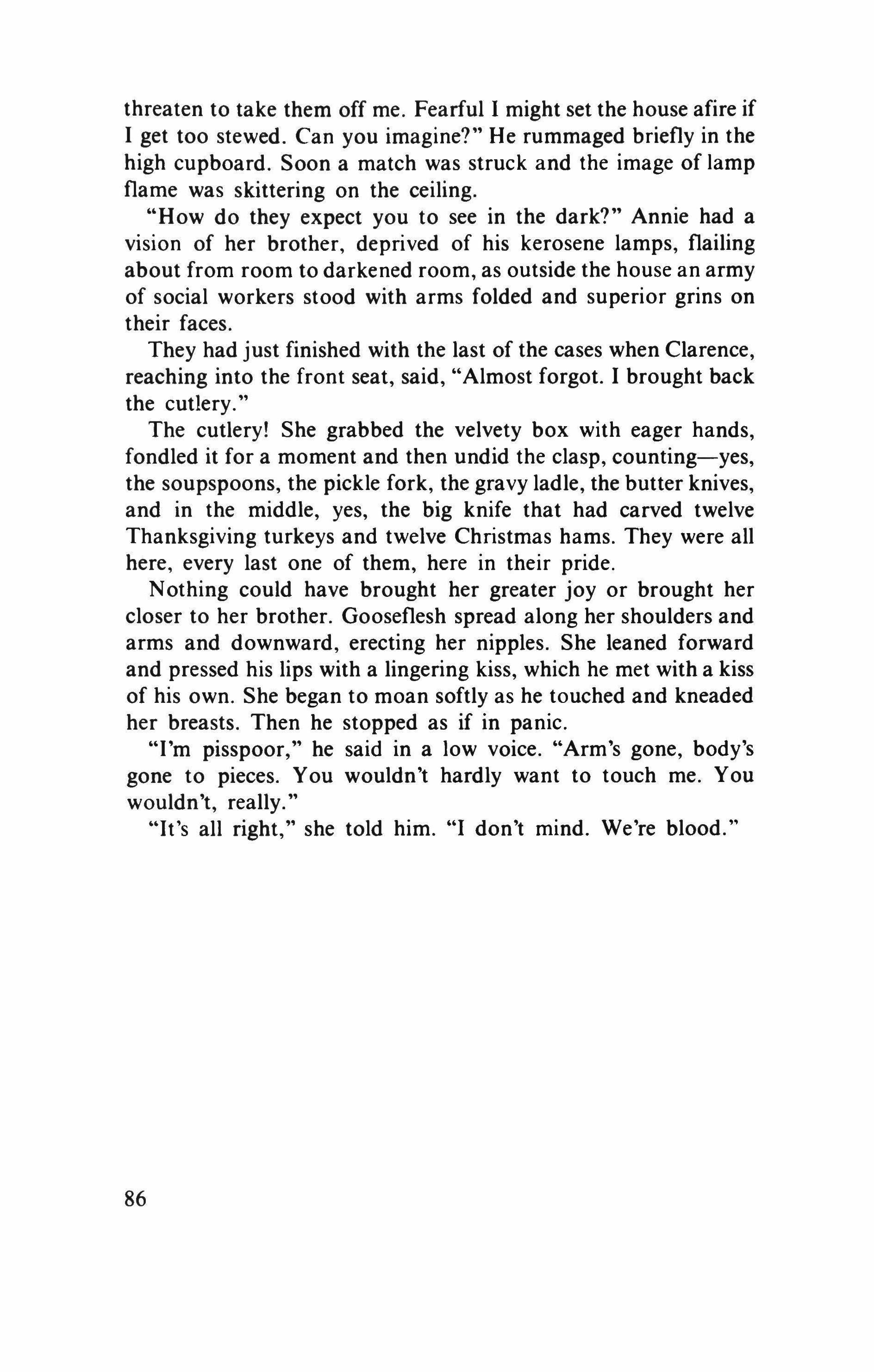
threaten to take them off me. Fearful 1 might set the house afire if 1 get too stewed. Can you imagine?" He rummaged briefly in the high cupboard. Soon a match was struck and the image of lamp flame was skittering on the ceiling.
"How do they expect you to see in the dark?" Annie had a vision of her brother, deprived of his kerosene lamps, flailing about from room to darkened room, as outside the house an army of social workers stood with arms folded and superior grins on their faces.
They had just finished with the last of the cases when Clarence, reaching into the front seat, said, "Almost forgot. 1 brought back the cutlery."
The cutlery! She grabbed the velvety box with eager hands, fondled it for a moment and then undid the clasp, counting-yes, the soupspoons, the pickle fork, the gravy ladle, the butter knives, and in the middle, yes, the big knife that had carved twelve Thanksgiving turkeys and twelve Christmas hams. They were all here, every last one of them, here in their pride.
Nothing could have brought her greater joy or brought her closer to her brother. Gooseflesh spread along her shoulders and arms and downward, erecting her nipples. She leaned forward and pressed his lips with a lingering kiss, which he met with a kiss of his own. She began to moan softly as he touched and kneaded her breasts. Then he stopped as if in panic.
"I'm pisspoor," he said in a low voice. "Arm's gone, body's gone to pieces. You wouldn't hardly want to touch me. You wouldn't, really."
"It's all right," she told him. "I don't mind. We're blood."
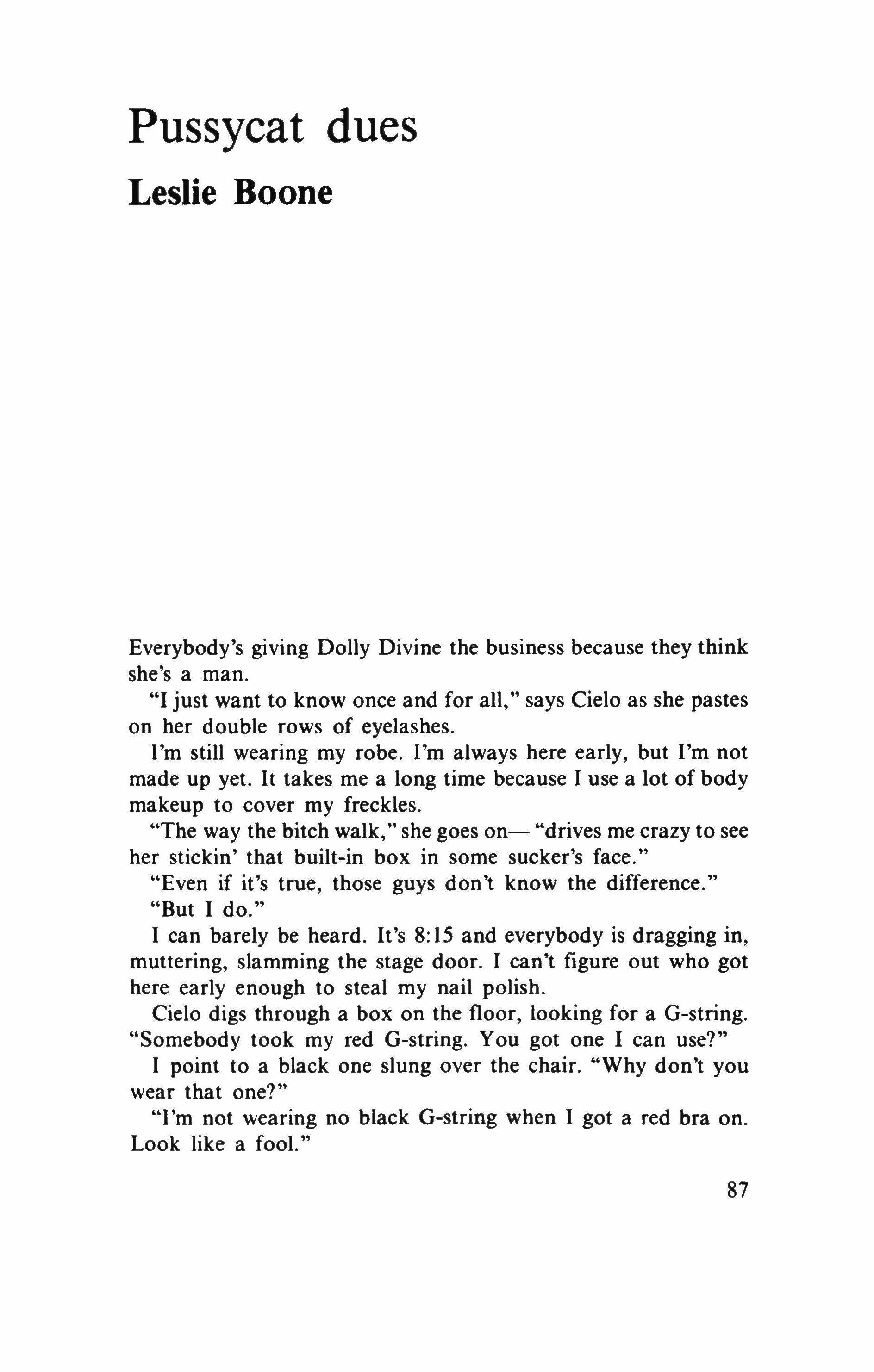
Everybody's giving Dolly Divine the business because they think she's a man.
"I just want to know once and for all," says Cielo as she pastes on her double rows of eyelashes.
I'm still wearing my robe. I'm always here early, but I'm not made up yet. It takes me a long time because I use a lot of body makeup to cover my freckles.
"The way the bitch walk," she goes on- "drives me crazy to see her stickin' that built-in box in some sucker's face."
"Even if it's true, those guys don't know the difference."
"But I do."
I can barely be heard. It's 8: 15 and everybody is dragging in, muttering, slamming the stage door. I can't figure out who got here early enough to steal my nail polish.
Cielo digs through a box on the floor, looking for a G-string. "Somebody took my red G-string. You got one 1 can use?"
I point to a black one slung over the chair. "Why don't you wear that one?"
"I'm not wearing no black G-string when I got a red bra on. Look like a fool."
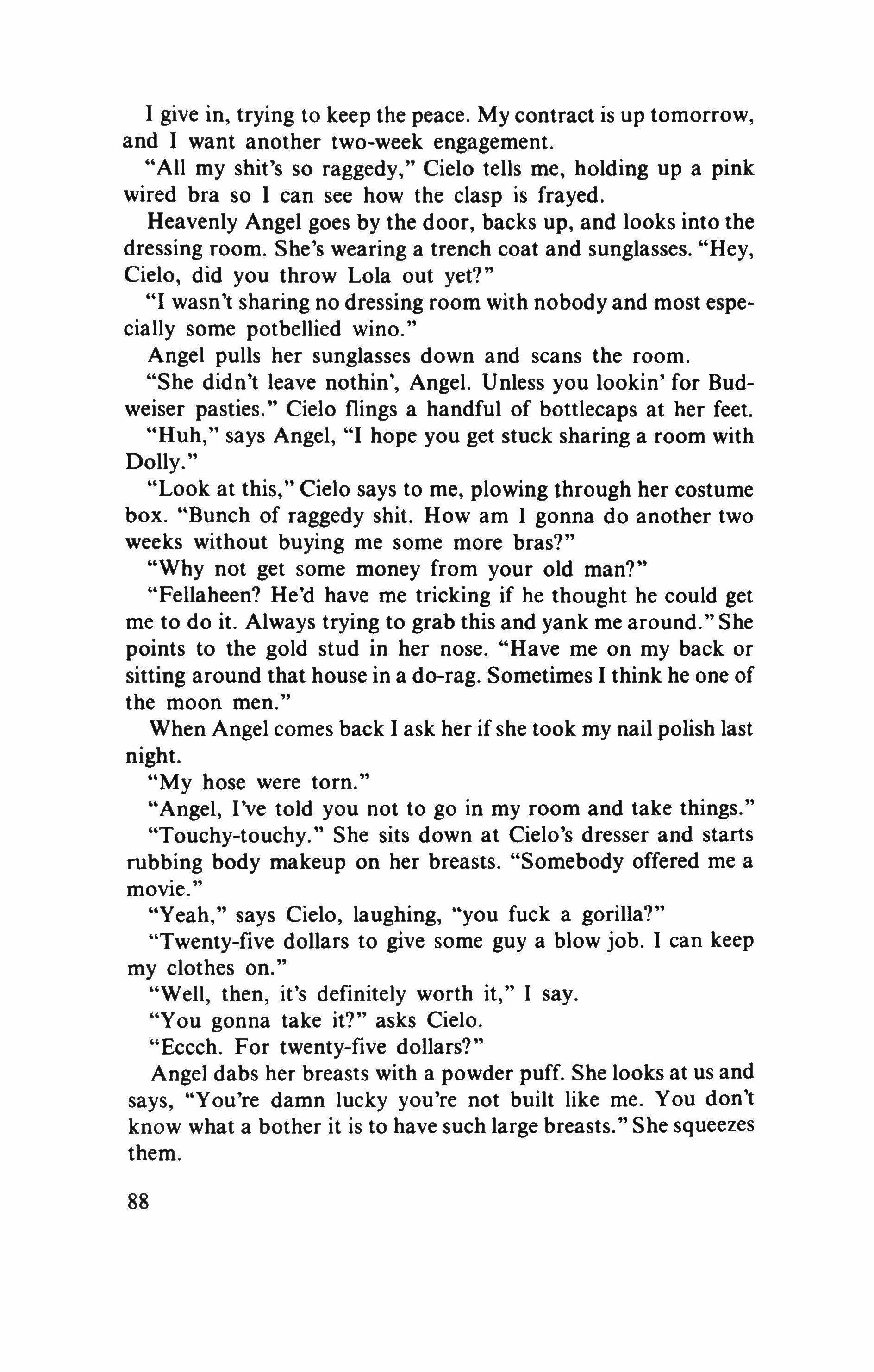
1 give in, trying to keep the peace. My contract is up tomorrow, and 1 want another two-week engagement.
"All my shit's so raggedy," Cielo tells me, holding up a pink wired bra so 1 can see how the clasp is frayed.
Heavenly Angel goes by the door, backs up, and looks into the dressing room. She's wearing a trench coat and sunglasses. "Hey, Cielo, did you throw Lola out yet?"
"I wasn't sharing no dressing room with nobody and most especially some potbellied wino."
Angel pulls her sunglasses down and scans the room.
"She didn't leave nothin', Angel. Unless you lookin' for Budweiser pasties." Cielo flings a handful of bottlecaps at her feet.
"Huh," says Angel, "I hope you get stuck sharing a room with Dolly.
"Look at this," Cielo says to me, plowing through her costume box. "Bunch of raggedy shit. How am I gonna do another two weeks without buying me some more bras?"
"Why not get some money from your old man?"
"Fellaheen? He'd have me tricking if he thought he could get me to do it. Always trying to grab this and yank me around." She points to the gold stud in her nose. "Have me on my back or sitting around that house in a do-rag. Sometimes I think he one of the moon men."
When Angel comes back I ask her if she took my nail polish last night.
"My hose were torn."
"Angel, I've told you not to go in my room and take things."
"Touchy-touchy." She sits down at Cielo's dresser and starts rubbing body makeup on her breasts. "Somebody offered me a movie."
"Yeah," says Cielo, laughing, "you fuck a gorilla?"
"Twenty-five dollars to give some guy a blow job. I can keep my clothes on."
"Well, then, it's definitely worth it," I say.
"You gonna take it?" asks Cielo.
"Eccch, For twenty-five dollars?"
Angel dabs her breasts with a powder puff. She looks at us and says, "You're damn lucky you're not built like me. You don't know what a bother it is to have such large breasts." She squeezes them.

Nikki wanders in carrying a can of black cherry soda. "Has Three Tears shown up yet?"
"Beats me," 1 say.
"You too?" says Nikki.
"What do you need him for?" 1 ask.
"She trying to remember what ugly is," says Cielo.
Angel holds a hand mirror to her breasts, examining the effects of Cielo's makeup. "This is great. Nikki, you really should try this makeup. You11 love it."
Nikki turns up her nose and says, "I don't put stuff on my tits."
"Honey, 1 meant you could put it on your face."
Nikki has bad acne scars. She sticks her tongue out at Angel.
"You shouldn't use my makeup, Angel," Cielo stands and says. "1t11 kink your nipples."
"Angel," 1 say in my most forceful voice, "I want you to go get my nail polish."
"Yes ma'am," she says, walking out with Cielo's hand mirror.
"Be glad you're not Spanish," says Nikki. "Angel rips them off like there's no tomorrow."
Dolly Divine stops in Cielo's doorway and looks in at Cielo, Nikki, and me. "Good morning, girls," she says with great noise, energy, and enthusiasm. "Am 1 on first?"
"What's on second?" says Cielo.
"Who's on first?" says Nikki, starting to laugh. Cielo and Nikki turn to look at me but 1 stare at the wall.
Angel pokes her head in. "I don't know. Is it short?"
I'm sitting in my dressing room sharing a carton of milk with Nikki. Angel comes in eating a bagel and accuses Nikki of taking her coffee.
"What," says Nikki, "are you accusing me of stealing?"
"Please," says Angel, "you're so paranoid. And jealous! Blaze, have you noticed that Nikki is so jealous of me?"
Nikki is reading the Enquirer. "Listen to this," she says, pinching my arm. "It's terrible."
"Not again," says Angel. "Last week you were so upset about the three-headed calf."
Nikki reads. "Couple sell their son for $500. 'We simply couldn't give him what he needed,' says the father. 'I figure he would be better off with the other family. I swear that I will never
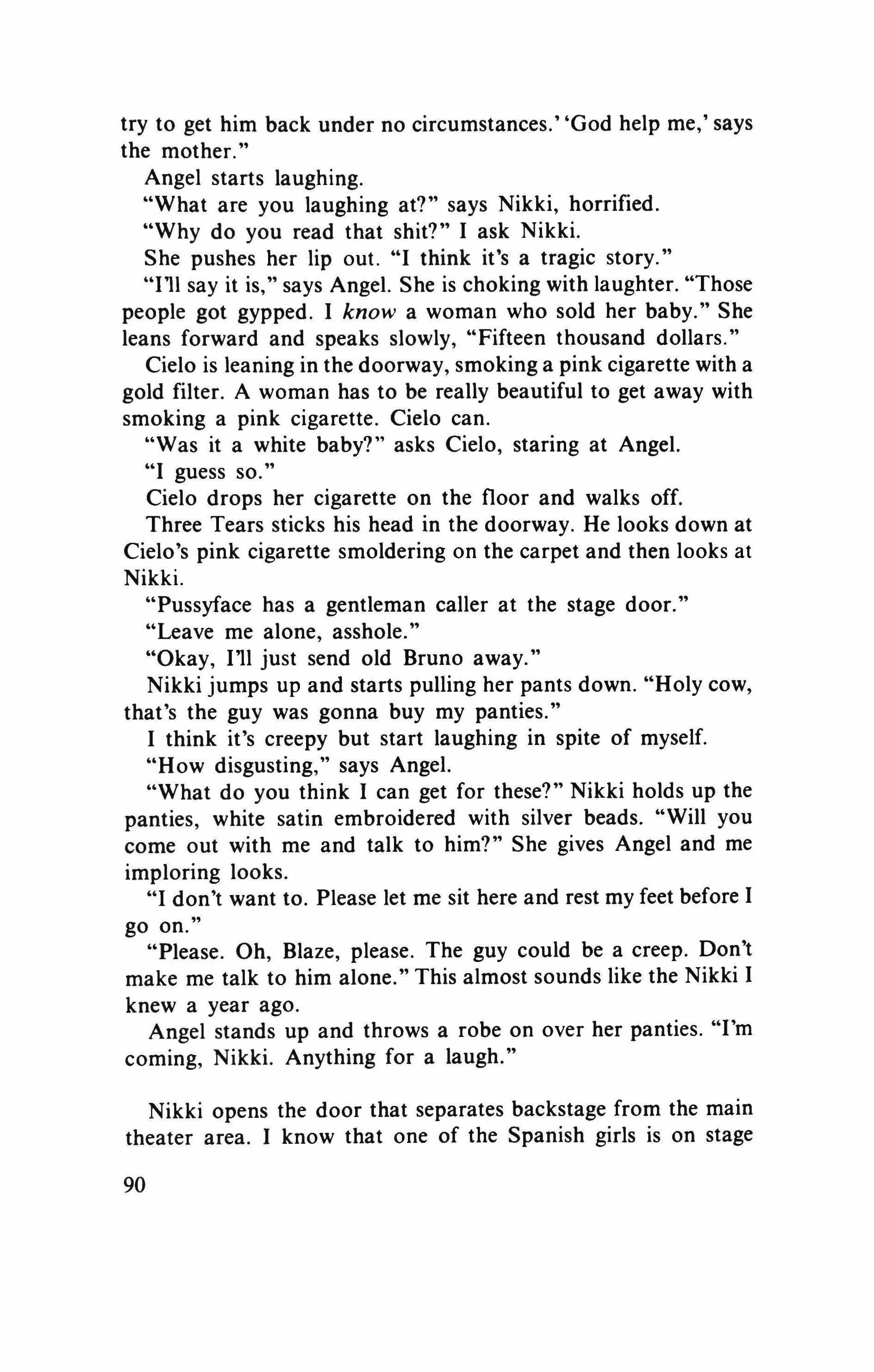
try to get him back under no circumstances.' 'God help me,' says the mother."
Angel starts laughing.
"What are you laughing at?" says Nikki, horrified.
"Why do you read that shit?" 1 ask Nikki.
She pushes her lip out. "I think it's a tragic story."
"111 say it is," says Angel. She is choking with laughter. "Those people got gypped. 1 know a woman who sold her baby." She leans forward and speaks slowly, "Fifteen thousand dollars."
Cielo is leaning in the doorway, smoking a pink cigarette with a gold filter. A woman has to be really beautiful to get away with smoking a pink cigarette. Cielo can.
"Was it a white baby?" asks Cielo, staring at Angel.
"I guess so."
Cielo drops her cigarette on the floor and walks off.
Three Tears sticks his head in the doorway. He looks down at Cielo's pink cigarette smoldering on the carpet and then looks at Nikki.
"Pussyface has a gentleman caller at the stage door."
"Leave me alone, asshole."
"Okay, I'll just send old Bruno away."
Nikki jumps up and starts pulling her pants down. "Holy cow, that's the guy was gonna buy my panties."
1 think it's creepy but start laughing in spite of myself.
"How disgusting," says Angel.
"What do you think 1 can get for these?" Nikki holds up the panties, white satin embroidered with silver beads. "Will you come out with me and talk to him?" She gives Angel and me imploring looks.
"I don't want to. Please let me sit here and rest my feet before 1 go on."
"Please. Oh, Blaze, please. The guy could be a creep. Don't make me talk to him alone." This almost sounds like the Nikki 1 knew a year ago.
Angel stands up and throws a robe on over her panties. "I'm coming, Nikki. Anything for a laugh."
Nikki opens the door that separates backstage from the main theater area. 1 know that one of the Spanish girls is on stage 90
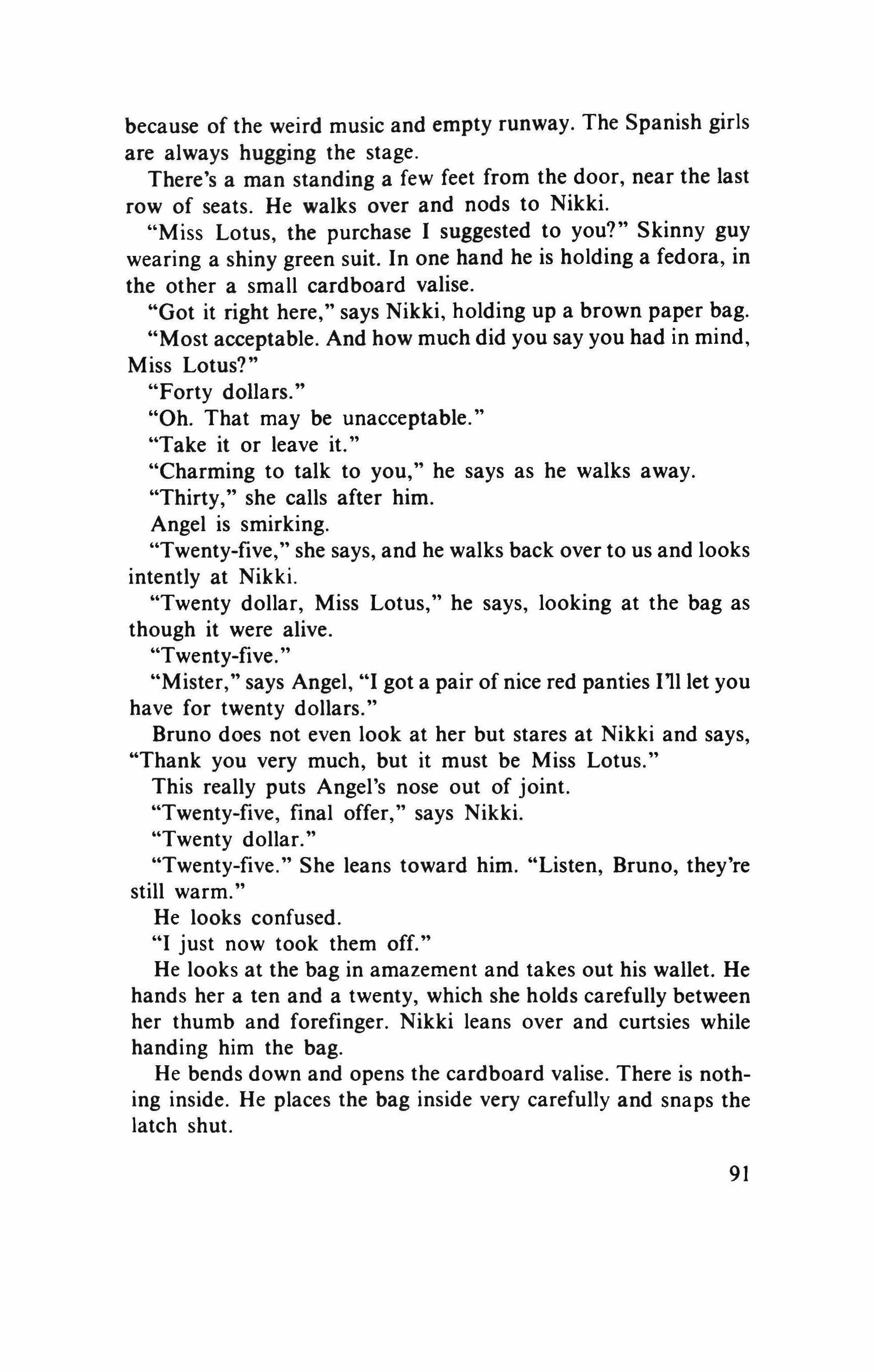
because of the weird music and empty runway. The Spanish girls are always hugging the stage.
There's a man standing a few feet from the door, near the last row of seats. He walks over and nods to Nikki.
"Miss Lotus, the purchase I suggested to you?" Skinny guy wearing a shiny green suit. In one hand he is holding a fedora, in the other a small cardboard valise.
"Got it right here," says Nikki, holding up a brown paper bag.
"Most acceptable. And how much did you say you had in mind, Miss Lotus?"
"Forty dollars."
"Oh. That may be unacceptable."
"Take it or leave it."
"Charming to talk to you," he says as he walks away.
"Thirty," she calls after him.
Angel is smirking.
"Twenty-five," she says, and he walks back over to us and looks intently at Nikki.
"Twenty dollar, Miss Lotus," he says, looking at the bag as though it were alive.
"Twenty-five."
"Mister," says Angel, "I got a pair of nice red panties I'll let you have for twenty dollars."
Bruno does not even look at her but stares at Nikki and says, "Thank you very much, but it must be Miss Lotus."
This really puts Angel's nose out of joint.
"Twenty-five, final offer," says Nikki.
"Twenty dollar."
"Twenty-five." She leans toward him. "Listen, Bruno, they're still warm."
He looks confused.
"I just now took them off."
He looks at the bag in amazement and takes out his wallet. He hands her a ten and a twenty, which she holds carefully between her thumb and forefinger. Nikki leans over and curtsies while handing him the bag.
He bends down and opens the cardboard valise. There is nothing inside. He places the bag inside very carefully and snaps the latch shut.
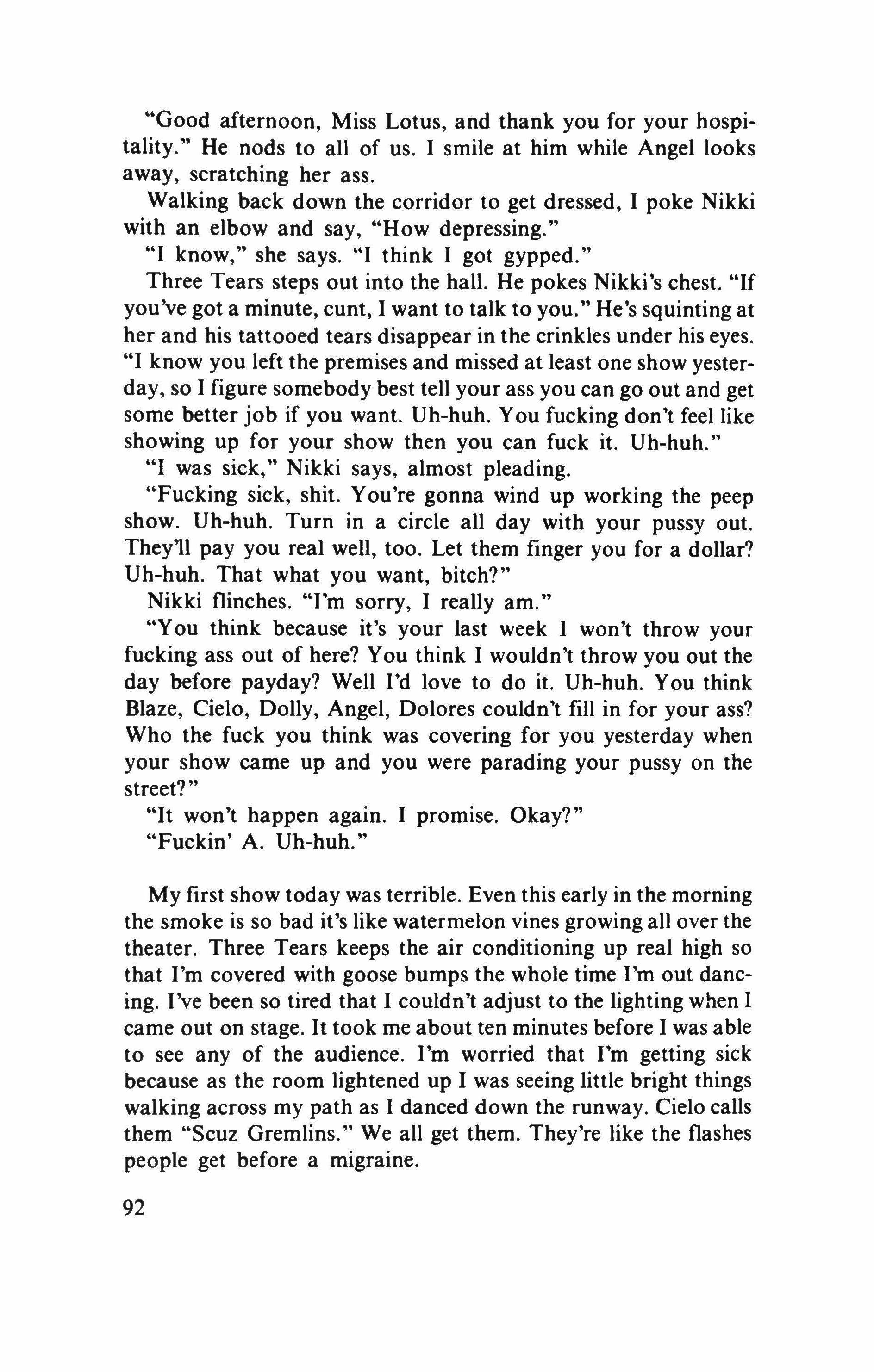
"Good afternoon, Miss Lotus, and thank you for your hospitality." He nods to all of us. 1 smile at him while Angel looks away, scratching her ass.
Walking back down the corridor to get dressed, 1 poke Nikki with an elbow and say, "How depressing."
"I know," she says. "I think 1 got gypped."
Three Tears steps out into the hall. He pokes Nikki's chest. "If you've got a minute, cunt, 1 want to talk to you." He's squinting at her and his tattooed tears disappear in the crinkles under his eyes. "I know you left the premises and missed at least one show yesterday, so 1 figure somebody best tell your ass you can go out and get some better job if you want. Uh-huh. You fucking don't feel like showing up for your show then you can fuck it. Uh-huh."
"I was sick," Nikki says, almost pleading.
"Fucking sick, shit. You're gonna wind up working the peep show. Uh-huh, Turn in a circle all day with your pussy out. They'll pay you real well, too. Let them finger you for a dollar? Uh-huh. That what you want, bitch?"
Nikki flinches. "I'm sorry, 1 really am."
"You think because it's your last week I won't throw your fucking ass out of here? You think I wouldn't throw you out the day before payday? Well I'd love to do it. Uh-huh. You think Blaze, Cielo, Dolly, Angel, Dolores couldn't fill in for your ass? Who the fuck you think was covering for you yesterday when your show came up and you were parading your pussy on the street?"
"It won't happen again. I promise. Okay?"
"Fuckin' A. Uh-huh."
My first show today was terrible. Even this early in the morning the smoke is so bad it's like watermelon vines growing all over the theater. Three Tears keeps the air conditioning up real high so that I'm covered with goose bumps the whole time I'm out dancing. I've been so tired that I couldn't adjust to the lighting when 1 came out on stage. It took me about ten minutes before I was able to see any of the audience. I'm worried that I'm getting sick because as the room lightened up I was seeing little bright things walking across my path as I danced down the runway. Cielo calls them "Scuz Gremlins." We all get them. They're like the flashes people get before a migraine.
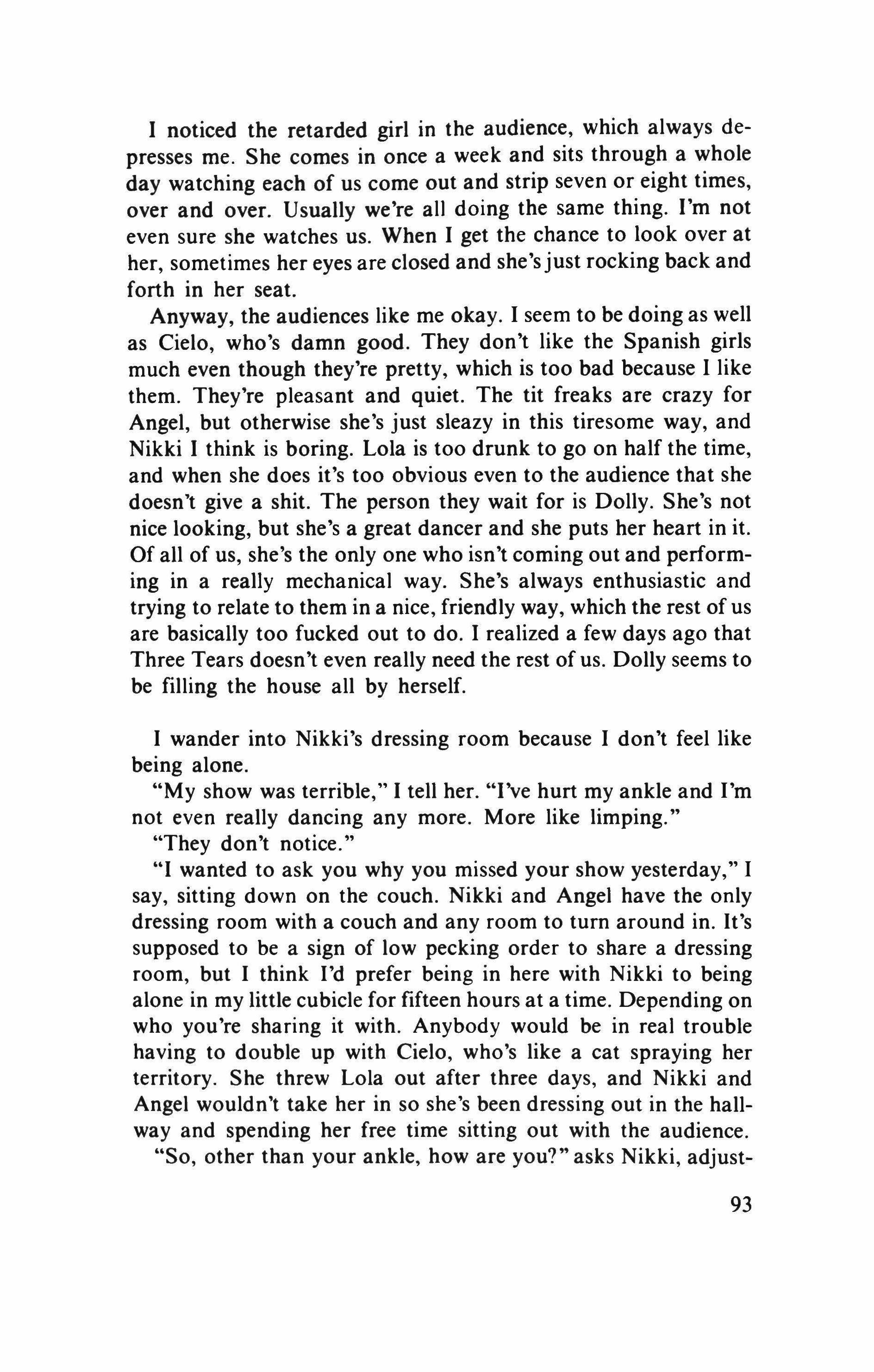
I noticed the retarded girl in the audience, which always depresses me. She comes in once a week and sits through a whole day watching each of us come out and strip seven or eight times, over and over. Usually we're all doing the same thing. I'm not even sure she watches us. When I get the chance to look over at her, sometimes her eyes are closed and she's just rocking back and forth in her seat.
Anyway, the audiences like me okay. I seem to be doing as well as Cielo, who's damn good. They don't like the Spanish girls much even though they're pretty, which is too bad because I like them. They're pleasant and quiet. The tit freaks are crazy for Angel, but otherwise she's just sleazy in this tiresome way, and Nikki I think is boring. Lola is too drunk to go on half the time, and when she does it's too obvious even to the audience that she doesn't give a shit. The person they wait for is Dolly. She's not nice looking, but she's a great dancer and she puts her heart in it. Of all of us, she's the only one who isn't coming out and performing in a really mechanical way. She's always enthusiastic and trying to relate to them in a nice, friendly way, which the rest of us are basically too fucked out to do. I realized a few days ago that Three Tears doesn't even really need the rest of us. Dolly seems to be filling the house all by herself.
I wander into Nikki's dressing room because I don't feel like being alone.
"My show was terrible," I tell her. "I've hurt my ankle and I'm not even really dancing any more. More like limping."
"They don't notice."
"I wanted to ask you why you missed your show yesterday," I say, sitting down on the couch. Nikki and Angel have the only dressing room with a couch and any room to turn around in. It's supposed to be a sign of low pecking order to share a dressing room, but I think I'd prefer being in here with Nikki to being alone in my little cubicle for fifteen hours at a time. Depending on who you're sharing it with. Anybody would be in real trouble having to double up with Cielo, who's like a cat spraying her territory. She threw Lola out after three days, and Nikki and Angel wouldn't take her in so she's been dressing out in the hallway and spending her free time sitting out with the audience.
"So, other than your ankle, how are you?" asks Nikki, adjust-
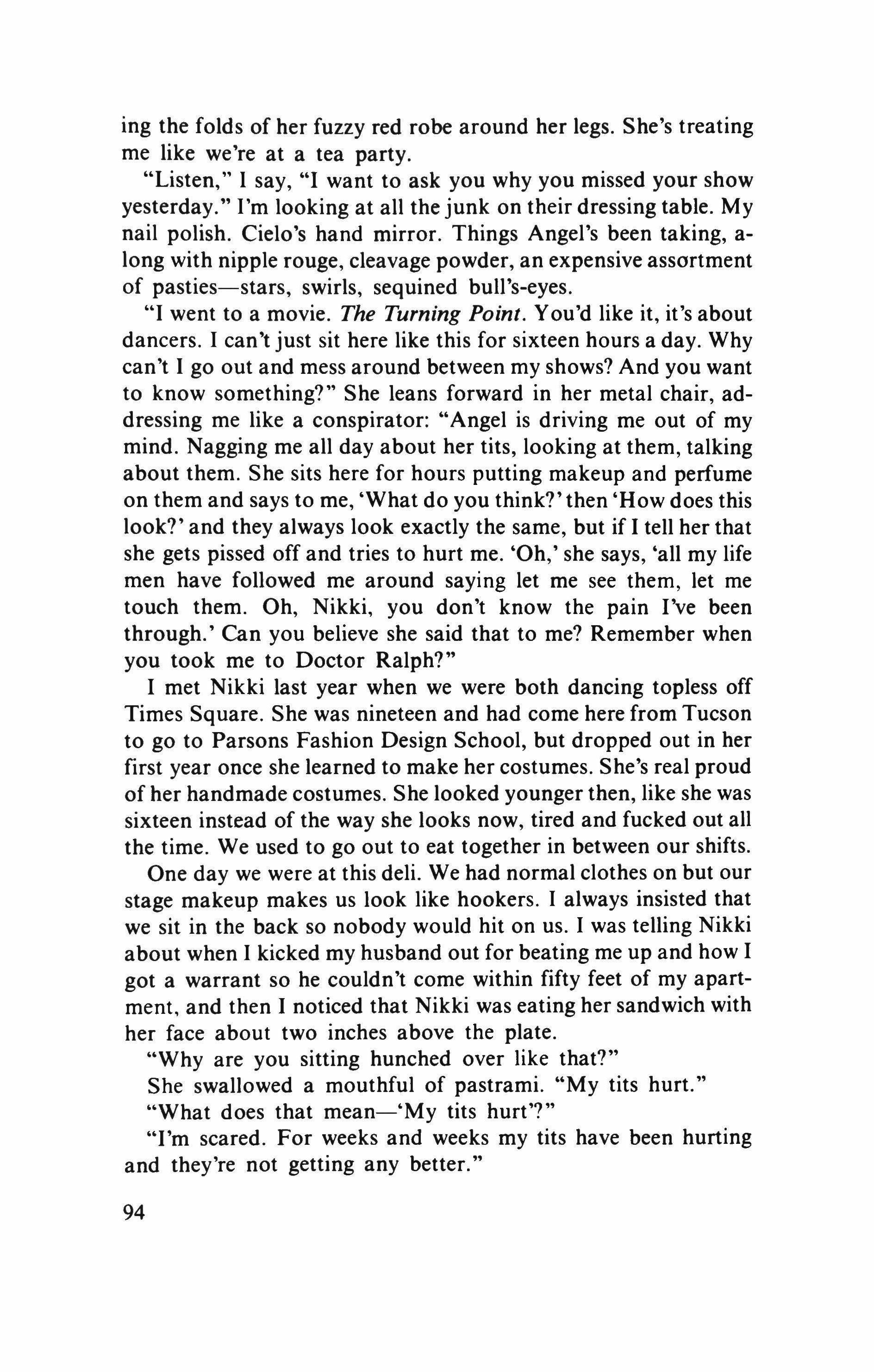
ing the folds of her fuzzy red robe around her legs. She's treating me like we're at a tea party.
"Listen," I say, "I want to ask you why you missed your show yesterday." I'm looking at all the junk on their dressing table. My nail polish. Cielo's hand mirror. Things Angel's been taking, along with nipple rouge, cleavage powder, an expensive assortment of pasties-stars, swirls, sequined bull's-eyes.
"I went to a movie. The Turning Point. You'd like it, it's about dancers. I can't just sit here like this for sixteen hours a day. Why can't I go out and mess around between my shows? And you want to know something?" She leans forward in her metal chair, addressing me like a conspirator: "Angel is driving me out of my mind. Nagging me all day about her tits, looking at them, talking about them. She sits here for hours putting makeup and perfume on them and says to me, 'What do you think?' then 'How does this look?' and they always look exactly the same, but if I tell her that she gets pissed off and tries to hurt me. 'Oh,' she says, 'all my life men have followed me around saying let me see them, let me touch them. Oh, Nikki, you don't know the pain I've been through.' Can you believe she said that to me? Remember when you took me to Doctor Ralph?"
1 met Nikki last year when we were both dancing topless off Times Square. She was nineteen and had come here from Tucson to go to Parsons Fashion Design School, but dropped out in her first year once she learned to make her costumes. She's real proud of her handmade costumes. She looked younger then, like she was sixteen instead of the way she looks now, tired and fucked out all the time. We used to go out to eat together in between our shifts.
One day we were at this deli. We had normal clothes on but our stage makeup makes us look like hookers. I always insisted that we sit in the back so nobody would hit on us. I was telling Nikki about when I kicked my husband out for beating me up and how 1 got a warrant so he couldn't come within fifty feet of my apartment, and then I noticed that Nikki was eating her sandwich with her face about two inches above the plate.
"Why are you sitting hunched over like that?"
She swallowed a mouthful of pastrami. "My tits hurt."
"What does that mean-'My tits hurt'?"
"I'm scared. For weeks and weeks my tits have been hurting and they're not getting any better."
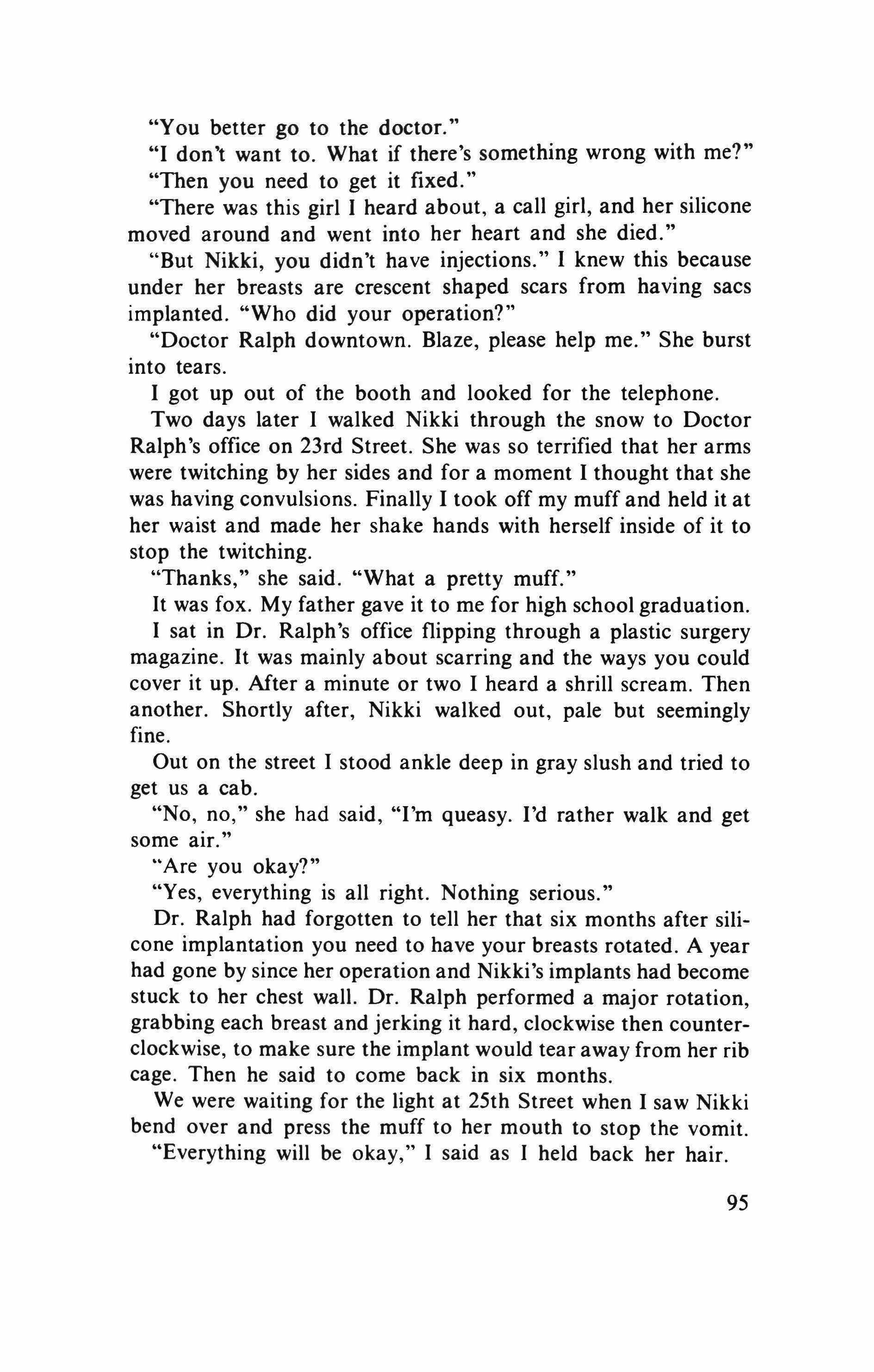
"You better go to the doctor."
"I don't want to. What if there's something wrong with me?"
"Then you need to get it fixed."
"There was this girl I heard about, a call girl, and her silicone moved around and went into her heart and she died."
"But Nikki, you didn't have injections." I knew this because under her breasts are crescent shaped scars from having sacs implanted. "Who did your operation?"
"Doctor Ralph downtown. Blaze, please help me." She burst into tears.
I got up out of the booth and looked for the telephone.
Two days later I walked Nikki through the snow to Doctor Ralph's office on 23rd Street. She was so terrified that her arms were twitching by her sides and for a moment I thought that she was having convulsions. Finally I took off my muff and held it at her waist and made her shake hands with herself inside of it to stop the twitching.
"Thanks," she said. "What a pretty muff."
It was fox. My father gave it to me for high school graduation.
I sat in Dr. Ralph's office flipping through a plastic surgery magazine. It was mainly about scarring and the ways you could cover it up. After a minute or two 1 heard a shrill scream. Then another. Shortly after, Nikki walked out, pale but seemingly fine.
Out on the street 1 stood ankle deep in gray slush and tried to get us a cab.
"No, no," she had said, "I'm queasy. I'd rather walk and get some air."
"Are you okay?"
"Yes, everything is all right. Nothing serious."
Dr. Ralph had forgotten to tell her that six months after silicone implantation you need to have your breasts rotated. A year had gone by since her operation and Nikki's implants had become stuck to her chest wall. Dr. Ralph performed a major rotation, grabbing each breast and jerking it hard, clockwise then counterclockwise, to make sure the implant would tear away from her rib cage. Then he said to come back in six months.
We were waiting for the light at 25th Street when I saw Nikki bend over and press the muff to her mouth to stop the vomit.
"Everything will be okay," I said as I held back her hair.
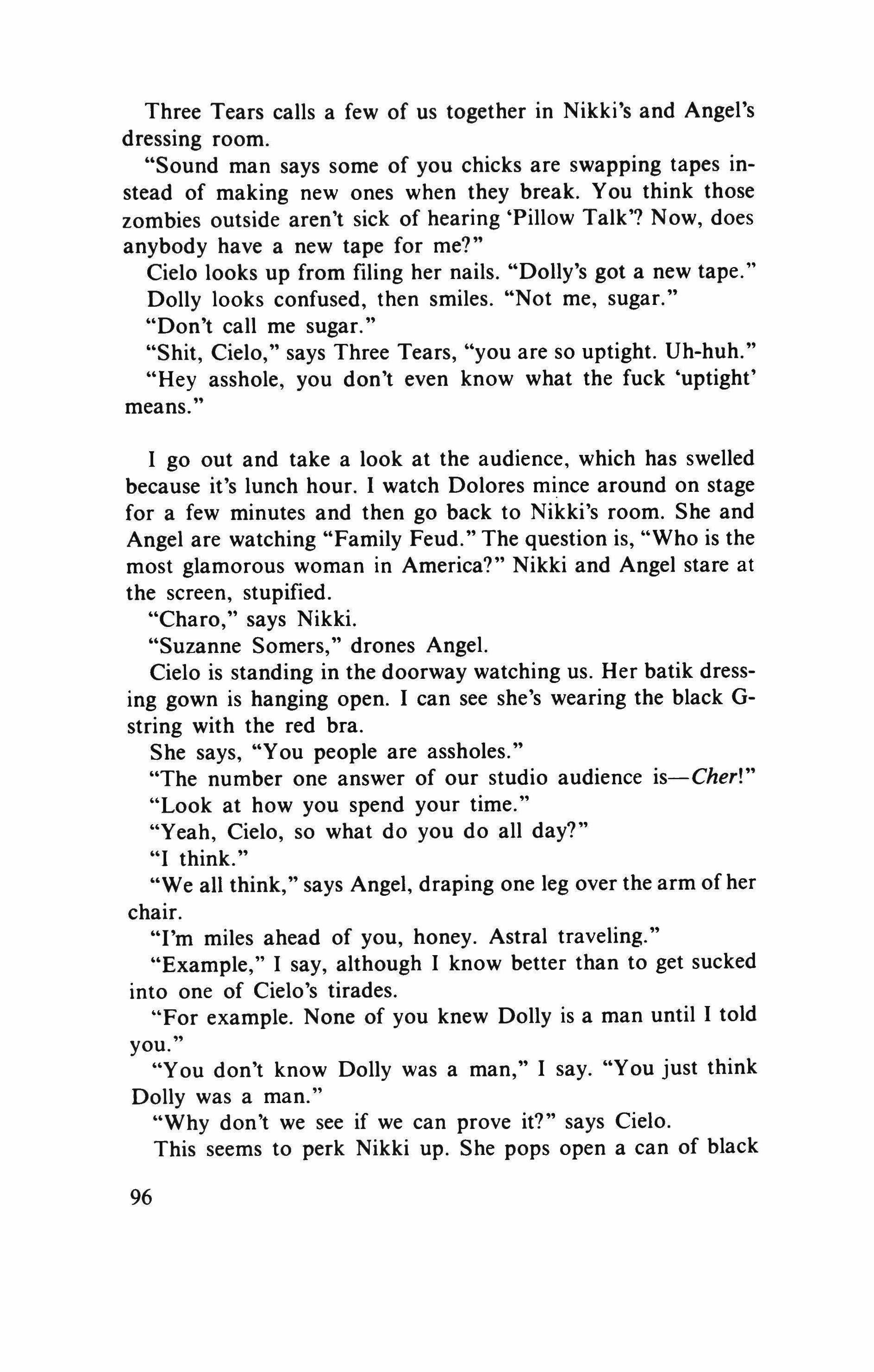
Three Tears calls a few of us together in Nikki's and Angel's dressing room.
"Sound man says some of you chicks are swapping tapes instead of making new ones when they break. You think those zombies outside aren't sick of hearing 'Pillow Talk'? Now, does anybody have a new tape for me?"
Cielo looks up from filing her nails. "Dolly's got a new tape."
Dolly looks confused, then smiles. "Not me, sugar."
"Don't call me sugar."
"Shit, Cielo," says Three Tears, "you are so uptight. Uh-huh."
"Hey asshole, you don't even know what the fuck 'uptight' means."
I go out and take a look at the audience, which has swelled because it's lunch hour. I watch Dolores mince around on stage for a few minutes and then go back to Nikki's room. She and Angel are watching "Family Feud." The question is, "Who is the most glamorous woman in America?" Nikki and Angel stare at the screen, stupified.
"Charo," says Nikki.
"Suzanne Somers," drones Angel.
Cielo is standing in the doorway watching us. Her batik dressing gown is hanging open. 1 can see she's wearing the black Gstring with the red bra.
She says, "You people are assholes."
"The number one answer of our studio audience is-Cher!"
"Look at how you spend your time."
"Yeah, Cielo, so what do you do all day?"
"I think."
"We all think," says Angel, draping one leg over the arm of her chair.
"I'm miles ahead of you, honey. Astral traveling."
"Example," I say, although I know better than to get sucked into one of Cielo's tirades.
"For example. None of you knew Dolly is a man until I told you."
"You don't know Dolly was a man," 1 say. "You just think Dolly was a man."
"Why don't we see if we can prove it?" says Cielo. This seems to perk Nikki up. She pops open a can of black
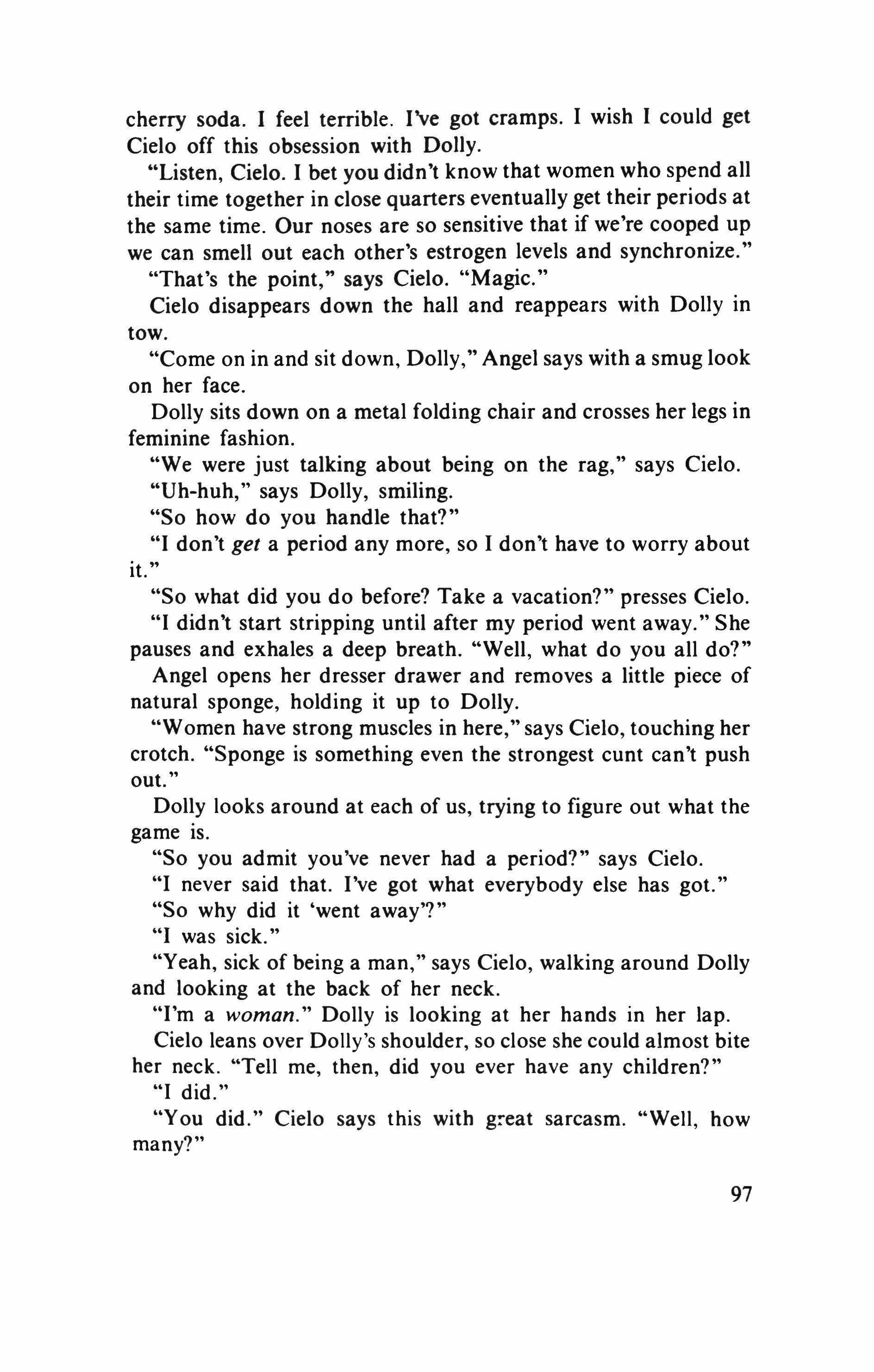
cherry soda. I feel terrible. I've got cramps. I wish I could get Cielo off this obsession with Dolly.
"Listen, Cielo. I bet you didn't know that women who spend all their time together in close quarters eventually get their periods at the same time. Our noses are so sensitive that if we're cooped up we can smell out each other's estrogen levels and synchronize."
"That's the point," says Cielo. "Magic."
Cielo disappears down the hall and reappears with Dolly in tow.
"Come on in and sit down, Dolly," Angel says with a smug look on her face.
Dolly sits down on a metal folding chair and crosses her legs in feminine fashion.
"We were just talking about being on the rag," says Cielo.
"Uh-huh," says Dolly, smiling.
"So how do you handle that?"
"I don't get a period any more, so I don't have to worry about it.
"So what did you do before? Take a vacation?" presses Cielo.
"I didn't start stripping until after my period went away." She pauses and exhales a deep breath. "Well, what do you all do?"
Angel opens her dresser drawer and removes a little piece of natural sponge, holding it up to Dolly.
"Women have strong muscles in here," says Cielo, touching her crotch. "Sponge is something even the strongest cunt can't push out.
Dolly looks around at each of us, trying to figure out what the game is.
"So you admit you've never had a period?" says Cielo.
"I never said that. I've got what everybody else has got."
"So why did it 'went away'?"
"I was sick."
"Yeah, sick of being a man," says Cielo, walking around Dolly and looking at the back of her neck.
"I'm a woman." Dolly is looking at her hands in her lap.
Cielo leans over Dolly's shoulder, so close she could almost bite her neck. "Tell me, then, did you ever have any children?"
"I did."
"You did." Cielo says this with great sarcasm. "Well, how many?"
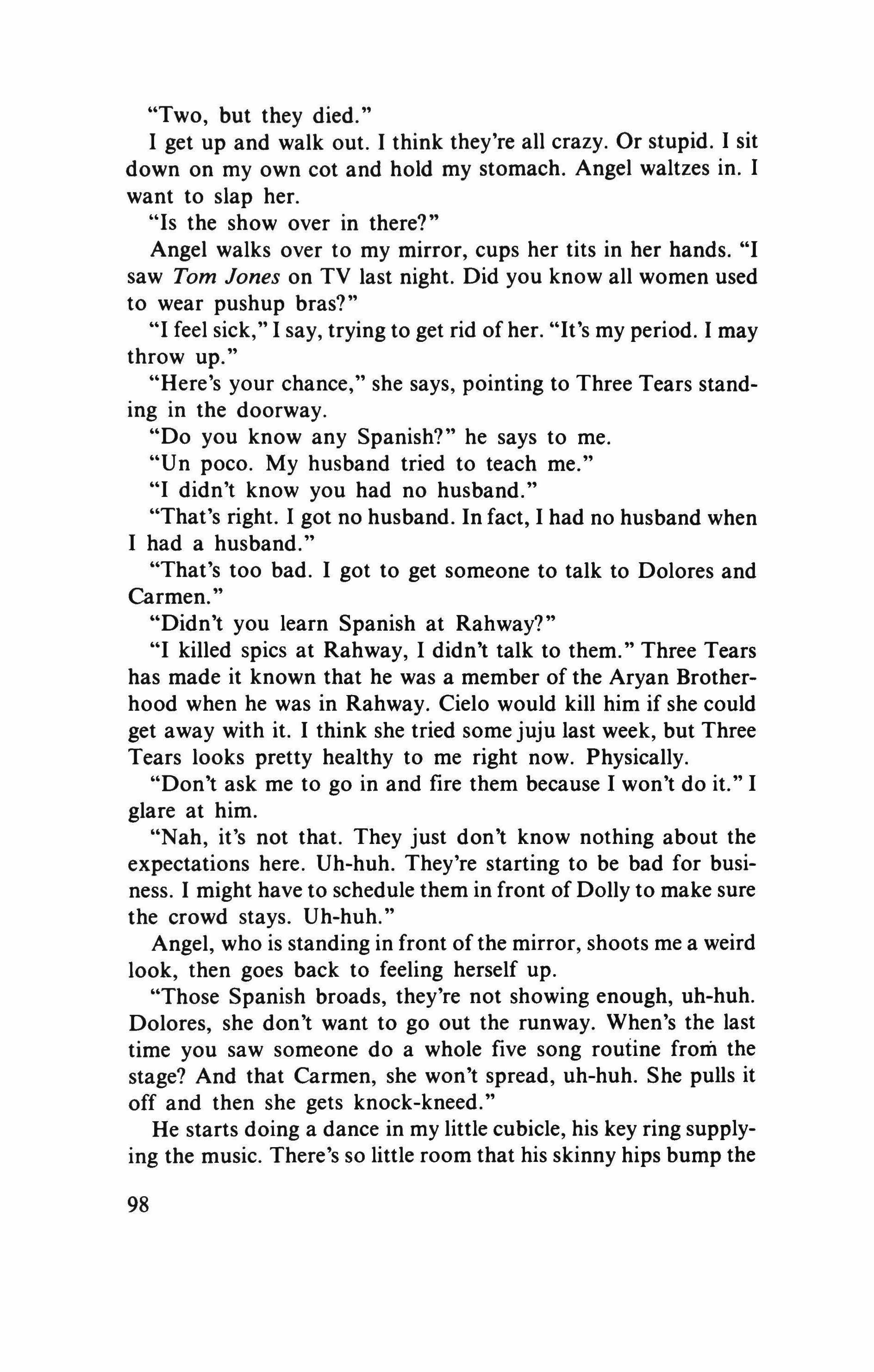
"Two, but they died."
I get up and walk out. I think they're all crazy. Or stupid. I sit down on my own cot and hold my stomach. Angel waltzes in. I want to slap her.
"Is the show over in there?"
Angel walks over to my mirror, cups her tits in her hands. "I saw Tom Jones on TV last night. Did you know all women used to wear pushup bras?"
"I feel sick," I say, trying to get rid of her. "It's my period. I may throw up."
"Here's your chance," she says, pointing to Three Tears standing in the doorway.
"Do you know any Spanish?" he says to me.
"Un poco. My husband tried to teach me."
"I didn't know you had no husband."
"That's right. I got no husband. In fact, I had no husband when I had a husband."
"That's too bad. I got to get someone to talk to Dolores and Carmen."
"Didn't you learn Spanish at Rahway?"
"I killed spies at Rahway, I didn't talk to them." Three Tears has made it known that he was a member of the Aryan Brotherhood when he was in Rahway. Cielo would kill him if she could get away with it. I think she tried some juju last week, but Three Tears looks pretty healthy to me right now. Physically.
"Don't ask me to go in and fire them because I won't do it." I glare at him.
"Nah, it's not that. They just don't know nothing about the expectations here. Uh-huh, They're starting to be bad for business. I might have to schedule them in front of Dolly to make sure the crowd stays. Uh-huh."
Angel, who is standing in front of the mirror, shoots me a weird look, then goes back to feeling herself up.
"Those Spanish broads, they're not showing enough, uh-huh. Dolores, she don't want to go out the runway. When's the last time you saw someone do a whole five song routine from the stage? And that Carmen, she won't spread, uh-huh. She pulls it off and then she gets knock-kneed."
He starts doing a dance in my little cubicle, his key ring supplying the music. There's so little room that his skinny hips bump the
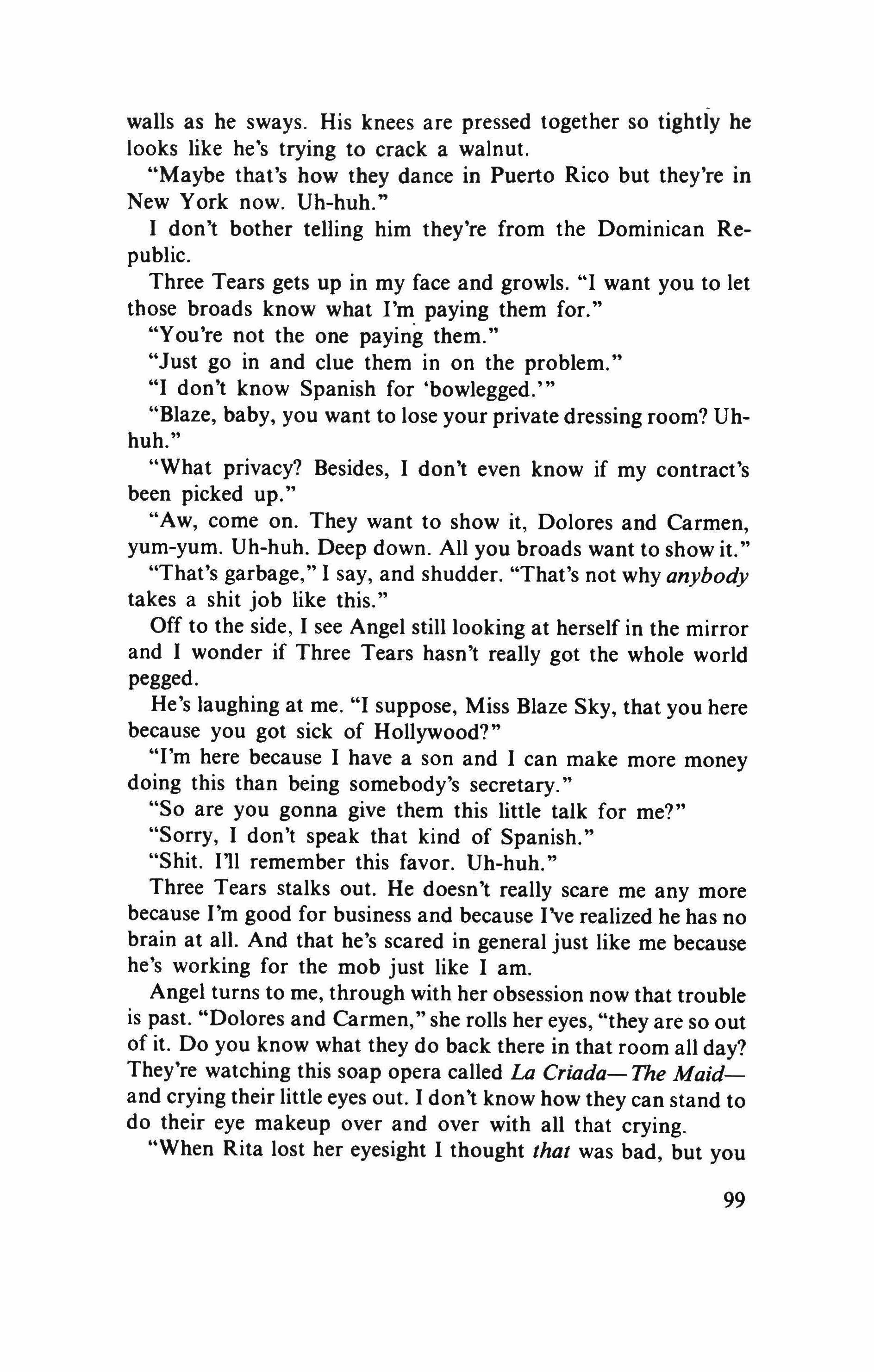
walls as he sways. His knees are pressed together so tightly he looks like he's trying to crack a walnut.
"Maybe that's how they dance in Puerto Rico but they're in New York now. Vh-huh."
I don't bother telling him they're from the Dominican Republic,
Three Tears gets up in my face and growls. "I want you to let those broads know what I'm paying them for."
"You're not the one paying them."
"Just go in and clue them in on the problem."
"I don't know Spanish for 'bowlegged."
"Blaze, baby, you want to lose your private dressing room? Uhhuh."
"What privacy? Besides, I don't even know if my contract's been picked up."
"Aw, come on. They want to show it, Dolores and Carmen, yum-yum. Uh-huh. Deep down. All you broads want to show it."
"That's garbage," I say, and shudder. "That's not why anybody takes a shit job like this."
Off to the side, I see Angel still looking at herself in the mirror and I wonder if Three Tears hasn't really got the whole world pegged.
He's laughing at me. "I suppose, Miss Blaze Sky, that you here because you got sick of Hollywood?"
"I'm here because I have a son and I can make more money doing this than being somebody's secretary."
"So are you gonna give them this little talk for me?"
"Sorry, I don't speak that kind of Spanish."
"Shit. I'll remember this favor. Vh-huh."
Three Tears stalks out. He doesn't really scare me any more because I'm good for business and because I've realized he has no brain at all. And that he's scared in general just like me because he's working for the mob just like I am.
Angel turns to me, through with her obsession now that trouble is past. "Dolores and Carmen," she rolls her eyes, "they are so out of it. Do you know what they do back there in that room all day? They're watching this soap opera called La Criada- The Maidand crying their little eyes out. I don't know how they can stand to do their eye makeup over and over with all that crying.
"When Rita lost her eyesight I thought that was bad, but you

should have seen them when she married the lawyer, Senor ValleInclan, and got her sight back because of the power of true love."
"Y ou must speak pretty good Spanish, Angel."
"My mother is Spanish."
So I'm worrying a lot about whether my contract is going to be picked up for another two weeks. I keep reminding myself to be enthusiastic and dance hard because I need the money. Dolly and I are standing backstage watching Cielo finish her routine. Cielo has these elements in her set that I'm not sure about. It's hard to say what the audience thinks of her, although I know that in general there's no demand for black women in burlesque so you have to be really gorgeous and work really hard to make it. Cielo is a fabulous beauty.
She's strutting around at the end of the runway, naked except for her stilletto heels. She used to do this routine that I thought was great where she imitated a cat. She'd take off her shoes and get down on all fours with her back to the audience and tread the floor with her feet, meowing. Now she's into this strange number where she brings out a miniature tool kit, a child's toy, and reaches out to the men who are sitting in the front row and hits them on the head with the little hammer and tweaks their noses with the rubber pliers.
"She's good, she's got a sense of humor," says Dolly. We're watching Cielo sawing on people's ears with her little rubber saw.
"Yeah, she's always done real well." I'm leaning against the partition separating us from the stage. My cramps are so bad I can hardly stand up.
"Nice crowd," says Dolly, pointing out into the darkness.
I don't think anyone has referred to a Broadway Burlesque crowd as "nice" since before the flood. As we watch Cielo, I'm sneaking a look at Dolly and me in the mirror at the end of the corridor. Dolly is tall and very wide through the shoulders, small hips, the opposite of me. I disregard this, deciding that there are as many women's bodies as there are women.
"What I want," says Dolly, "is a day or two off to work on my costumes. I've got ideas for some classy new bras made out of plush velvet if I could just get some time to visit my seamstress."
Glancing up at Dolly, I notice how tired she looks. The muscles in her neck are tensed, her shoulders are drooping. 100
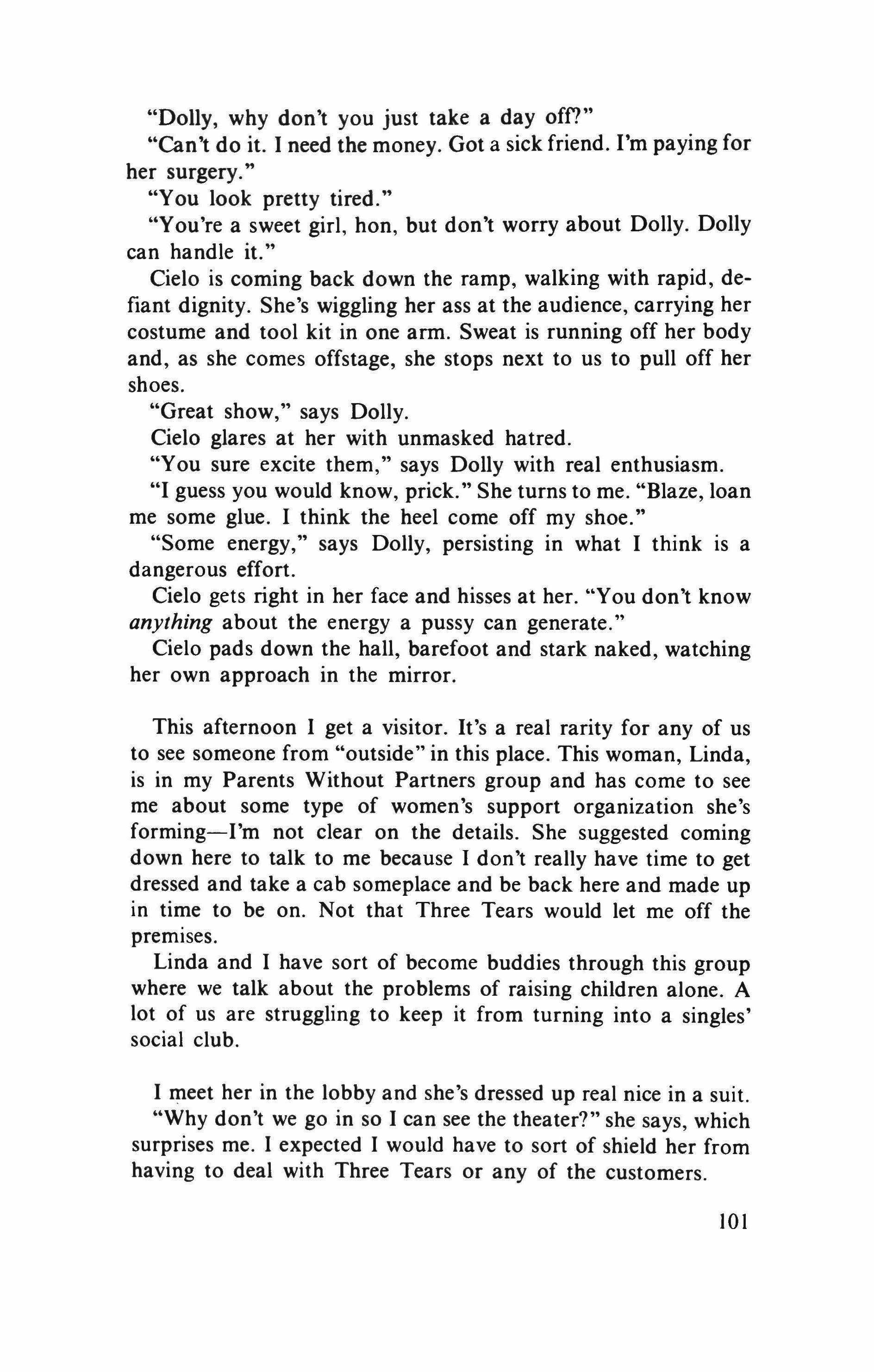
"Dolly, why don't you just take a day off?"
"Can't do it. I need the money. Got a sick friend. I'm paying for her surgery."
"You look pretty tired."
"You're a sweet girl, hon, but don't worry about Dolly. Dolly can handle it."
Cielo is coming back down the ramp, walking with rapid, defiant dignity. She's wiggling her ass at the audience, carrying her costume and tool kit in one arm. Sweat is running off her body and, as she comes offstage, she stops next to us to pull off her shoes.
"Great show," says Dolly.
Cielo glares at her with unmasked hatred.
"You sure excite them," says Dolly with real enthusiasm.
"I guess you would know, prick." She turns to me. "Blaze, loan me some glue. I think the heel come off my shoe."
"Some energy," says Dolly, persisting in what I think is a dangerous effort.
Cielo gets right in her face and hisses at her. "You don't know anything about the energy a pussy can generate."
Cielo pads down the hall, barefoot and stark naked, watching her own approach in the mirror.
This afternoon I get a visitor. It's a real rarity for any of us to see someone from "outside" in this place. This woman, Linda, is in my Parents Without Partners group and has come to see me about some type of women's support organization she's forming-I'm not clear on the details. She suggested coming down here to talk to me because I don't really have time to get dressed and take a cab someplace and be back here and made up in time to be on. Not that Three Tears would let me off the premises.
Linda and I have sort of become buddies through this group where we talk about the problems of raising children alone. A lot of us are struggling to keep it from turning into a singles' social club.
I meet her in the lobby and she's dressed up real nice in a suit.
"Why don't we go in so I can see the theater?" she says, which surprises me. I expected I would have to sort of shield her from having to deal with Three Tears or any of the customers.
lOl
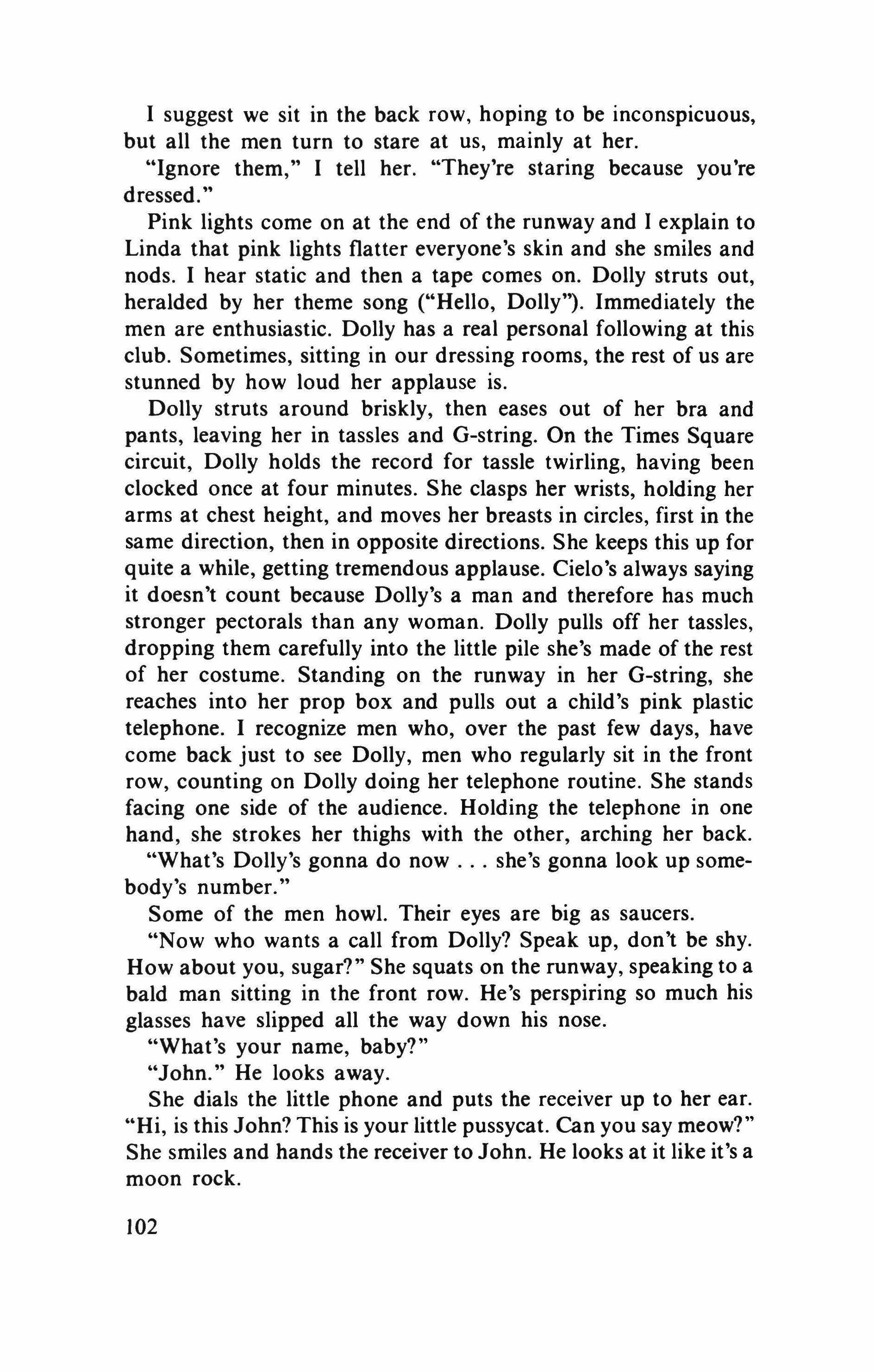
I suggest we sit in the back row, hoping to be inconspicuous, but all the men turn to stare at us, mainly at her.
"Ignore them," I tell her. "They're staring because you're dressed.
Pink lights come on at the end of the runway and I explain to Linda that pink lights flatter everyone's skin and she smiles and nods. I hear static and then a tape comes on. Dolly struts out, heralded by her theme song ("Hello, Dolly''). Immediately the men are enthusiastic. Dolly has a real personal following at this club. Sometimes, sitting in our dressing rooms, the rest of us are stunned by how loud her applause is.
Dolly struts around briskly, then eases out of her bra and pants, leaving her in tassles and G-string. On the Times Square circuit, Dolly holds the record for tassle twirling, having been clocked once at four minutes. She clasps her wrists, holding her arms at chest height, and moves her breasts in circles, first in the same direction, then in opposite directions. She keeps this up for quite a while, getting tremendous applause. Cielo's always saying it doesn't count because Dolly's a man and therefore has much stronger pectorals than any woman. Dolly pulls off her tassles, dropping them carefully into the little pile she's made of the rest of her costume. Standing on the runway in her G-string, she reaches into her prop box and pulls out a child's pink plastic telephone. I recognize men who, over the past few days, have come back just to see Dolly, men who regularly sit in the front row, counting on Dolly doing her telephone routine. She stands facing one side of the audience. Holding the telephone in one hand, she strokes her thighs with the other, arching her back.
"What's Dolly's gonna do now she's gonna look up somebody's number."
Some of the men howl. Their eyes are big as saucers.
"Now who wants a call from Dolly? Speak up, don't be shy. How about you, sugar?" She squats on the runway, speaking to a bald man sitting in the front row. He's perspiring so much his glasses have slipped all the way down his nose.
"What's your name, baby?"
"John." He looks away.
She dials the little phone and puts the receiver up to her ear. "Hi, is this John? This is your little pussycat. Can you say meow?" She smiles and hands the receiver to John. He looks at it like it's a moon rock.
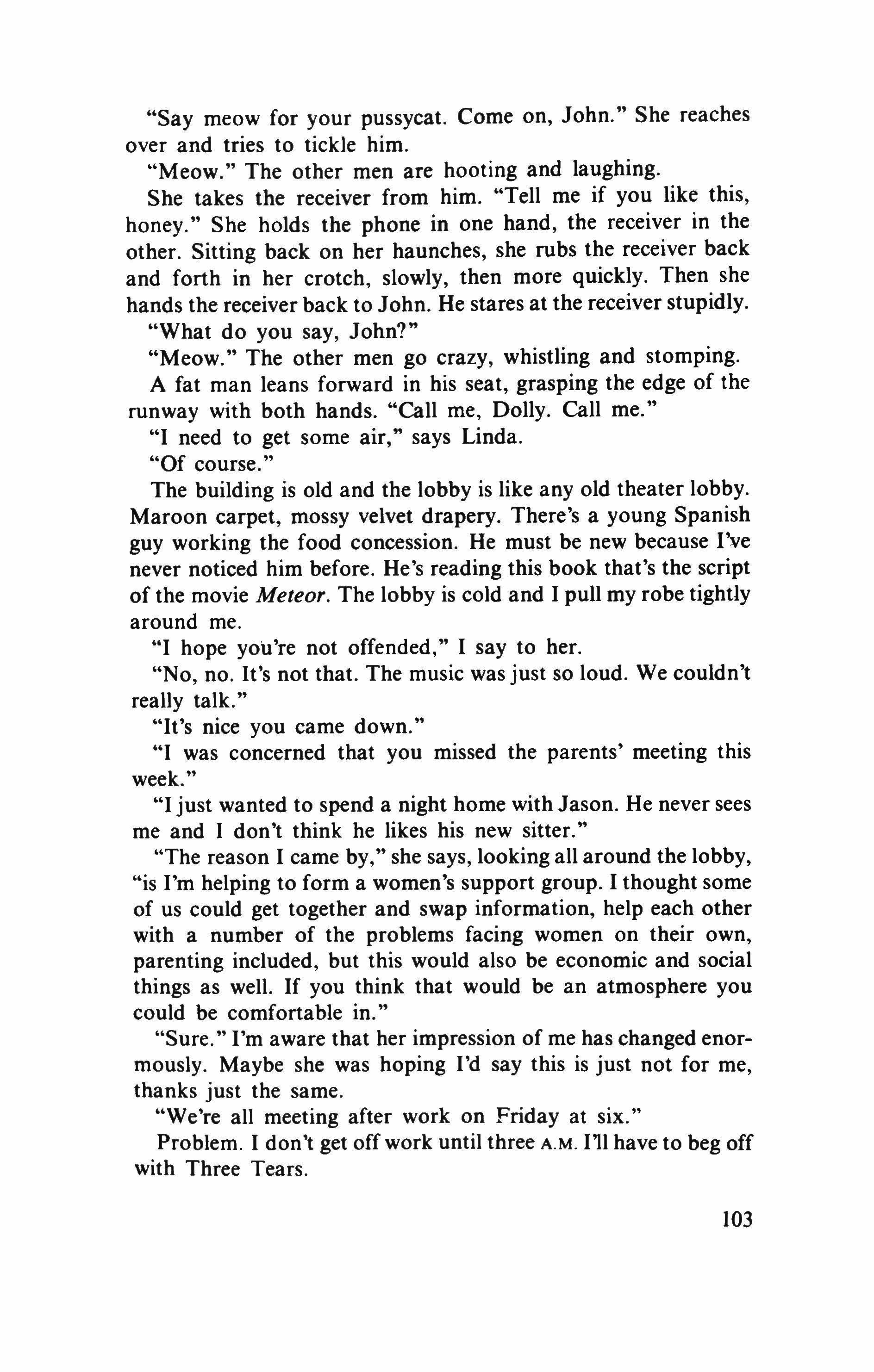
"Say meow for your pussycat. Come on, John." She reaches over and tries to tickle him.
"Meow." The other men are hooting and laughing. She takes the receiver from him. "Tell me if you like this, honey." She holds the phone in one hand, the receiver in the other. Sitting back on her haunches, she rubs the receiver back and forth in her crotch, slowly, then more quickly. Then she hands the receiver back to John. He stares at the receiver stupidly.
"What do you say, John?"
"Meow." The other men go crazy, whistling and stomping.
A fat man leans forward in his seat, grasping the edge of the runway with both hands. "Call me, Dolly. Call me."
"I need to get some air," says Linda.
"Of course."
The building is old and the lobby is like any old theater lobby. Maroon carpet, mossy velvet drapery. There's a young Spanish guy working the food concession. He must be new because I've never noticed him before. He's reading this book that's the script of the movie Meteor. The lobby is cold and I pull my robe tightly around me.
"I hope you're not offended," I say to her.
"No, no. It's not that. The music was just so loud. We couldn't really talk."
"It's nice you came down."
"I was concerned that you missed the parents' meeting this week."
"I just wanted to spend a night home with Jason. He never sees me and I don't think he likes his new sitter."
"The reason I came by," she says, looking all around the lobby, "is I'm helping to form a women's support group. I thought some of us could get together and swap information, help each other with a number of the problems facing women on their own, parenting included, but this would also be economic and social things as well. If you think that would be an atmosphere you could be comfortable in."
"Sure." I'm aware that her impression of me has changed enormously. Maybe she was hoping I'd say this is just not for me, thanks just the same.
"We're all meeting after work on Friday at six."
Problem. I don't get off work until three A.M. 111 have to beg off with Three Tears.
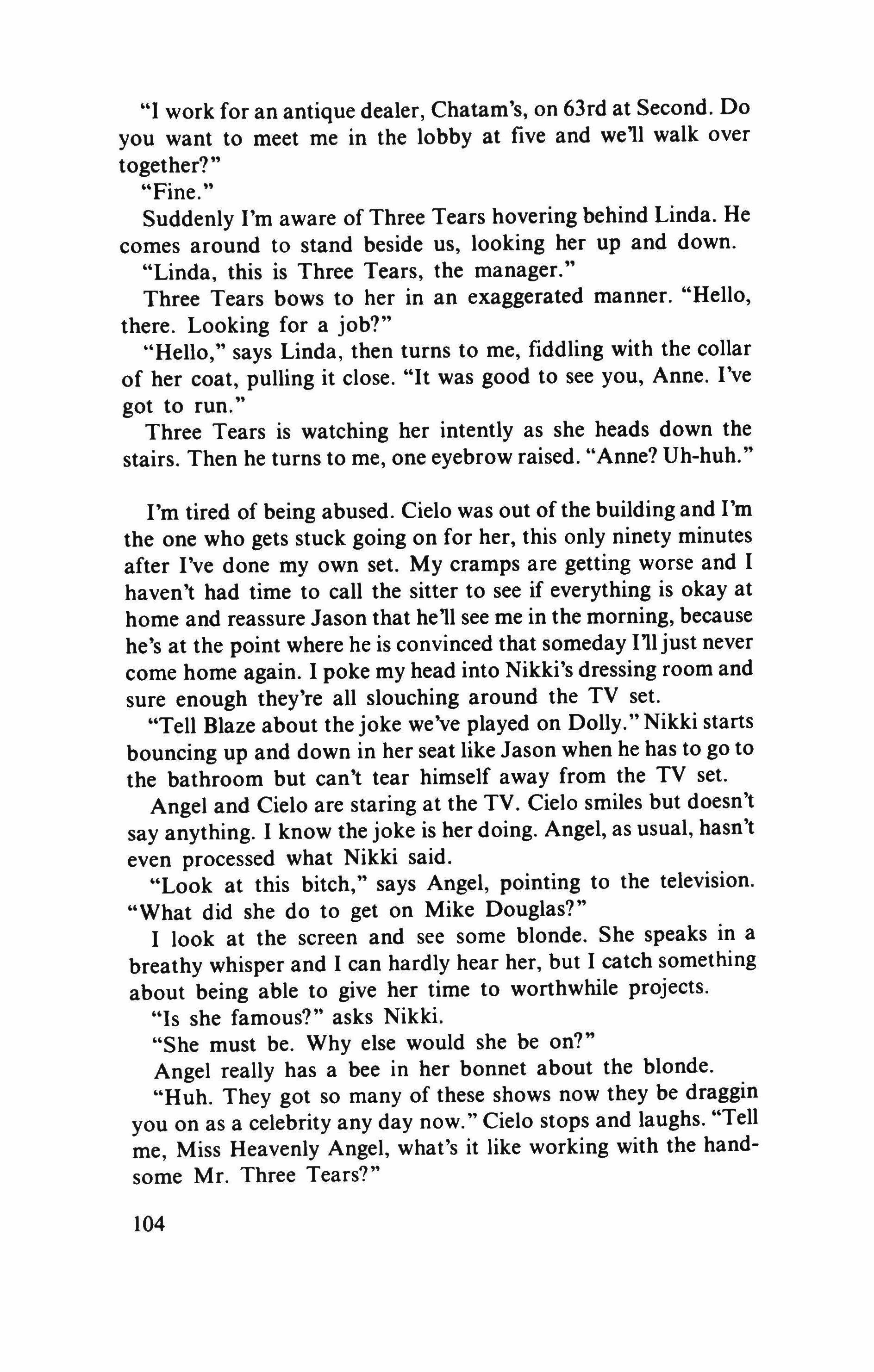
"I work for an antique dealer, Chatam's, on 63rd at Second. Do you want to meet me in the lobby at five and we'll walk over together?"
"Fine."
Suddenly I'm aware of Three Tears hovering behind Linda. He comes around to stand beside us, looking her up and down.
"Linda, this is Three Tears, the manager."
Three Tears bows to her in an exaggerated manner. "Hello, there. Looking for a job?"
"Hello," says Linda, then turns to me, fiddling with the collar of her coat, pulling it close. "It was good to see you, Anne. I've got to run."
Three Tears is watching her intently as she heads down the stairs. Then he turns to me, one eyebrow raised. "Anne? Uh-huh."
I'm tired of being abused. Cielo was out of the building and I'm the one who gets stuck going on for her, this only ninety minutes after I've done my own set. My cramps are getting worse and I haven't had time to call the sitter to see if everything is okay at home and reassure Jason that he'll see me in the morning, because he's at the point where he is convinced that someday I'll just never come home again. I poke my head into Nikki's dressing room and sure enough they're all slouching around the TV set.
"Tell Blaze about the joke we've played on Dolly." Nikki starts bouncing up and down in her seat like Jason when he has to go to the bathroom but can't tear himself away from the TV set.
Angel and Cielo are staring at the TV. Cielo smiles but doesn't say anything. I know the joke is her doing. Angel, as usual, hasn't even processed what Nikki said.
"Look at this bitch," says Angel, pointing to the television. "What did she do to get on Mike Douglas?"
I look at the screen and see some blonde. She speaks in a breathy whisper and I can hardly hear her, but I catch something about being able to give her time to worthwhile projects.
"Is she famous?" asks Nikki.
"She must be. Why else would she be on?"
Angel really has a bee in her bonnet about the blonde.
"Huh. They got so many of these shows now they be draggin you on as a celebrity any day now." Cielo stops and laughs. "Tell me, Miss Heavenly Angel, what's it like working with the handsome Mr. Three Tears?"

"I have bigger tits than her," says Angel, looking down into her cleavage once again.
"I don't know about her tits, but 1 don't think she's very pretty," says Nikki.
"Shit. I'm prettier than that. Turn it up so we can hear what she says.
Angel's order is carried out by Nikki. Nikki is susceptible to doing whatever anyone tells her to do, a fact that scares me enormously. She turns the sound up so loud the speaker crackles. The blonde is describing her worthwhile cause.
"I'm leading a nationwide consumer boycott against eggs."
Mike Douglas starts bouncing up and down in his seat interrupting the blonde to say, "Boy, is Mr. Cholesterol going to be mad at you!"
"Who's Mr. Cholesterol?" asks Nikki.
"No, I'm serious, Mike. I'm asking everyone watching this program to boycott eggs for this entire month."
"She's got a guilty conscience thinking about all the eggs she sucked to get on this show."
Everyone laughs at Cielo's remark, even me, but I'm mad at her again even before 1 stop laughing.
"Cielo," 1 say, "for a bitch you've got a great sense of humor."
Angel and Nikki get more absorbed in the program. After being on the circuit for a couple of years, they've learned to just tune out tension when it appears. I usually do the same. Cielo takes a long drag on her cigarette and I know she is deciding whether to acknowledge my statement as a threat or pretend it's good-natured ribbing.
She blows out the smoke and says, "People tell me it's my second best feature" in a tone so menacing that I go back and watch the tube.
"Did you know that all the hens that lay the eggs, the layers, are put into teeny cages, hundreds of these hens packed into just a few of these cages. And the cages are in a henhouse that's kept dark all the time so they have no sense of time and they just lay eggs and lay eggs except for when they peck each other to death because the conditions are so bad that they just can't stand it anymore. And I want all you women, when you grocery-shop this month, to boycott eggs in protest against the conditions of the hens."
"Really," spits Angel, "how did she ever get to be a star with a lousy build like that?"
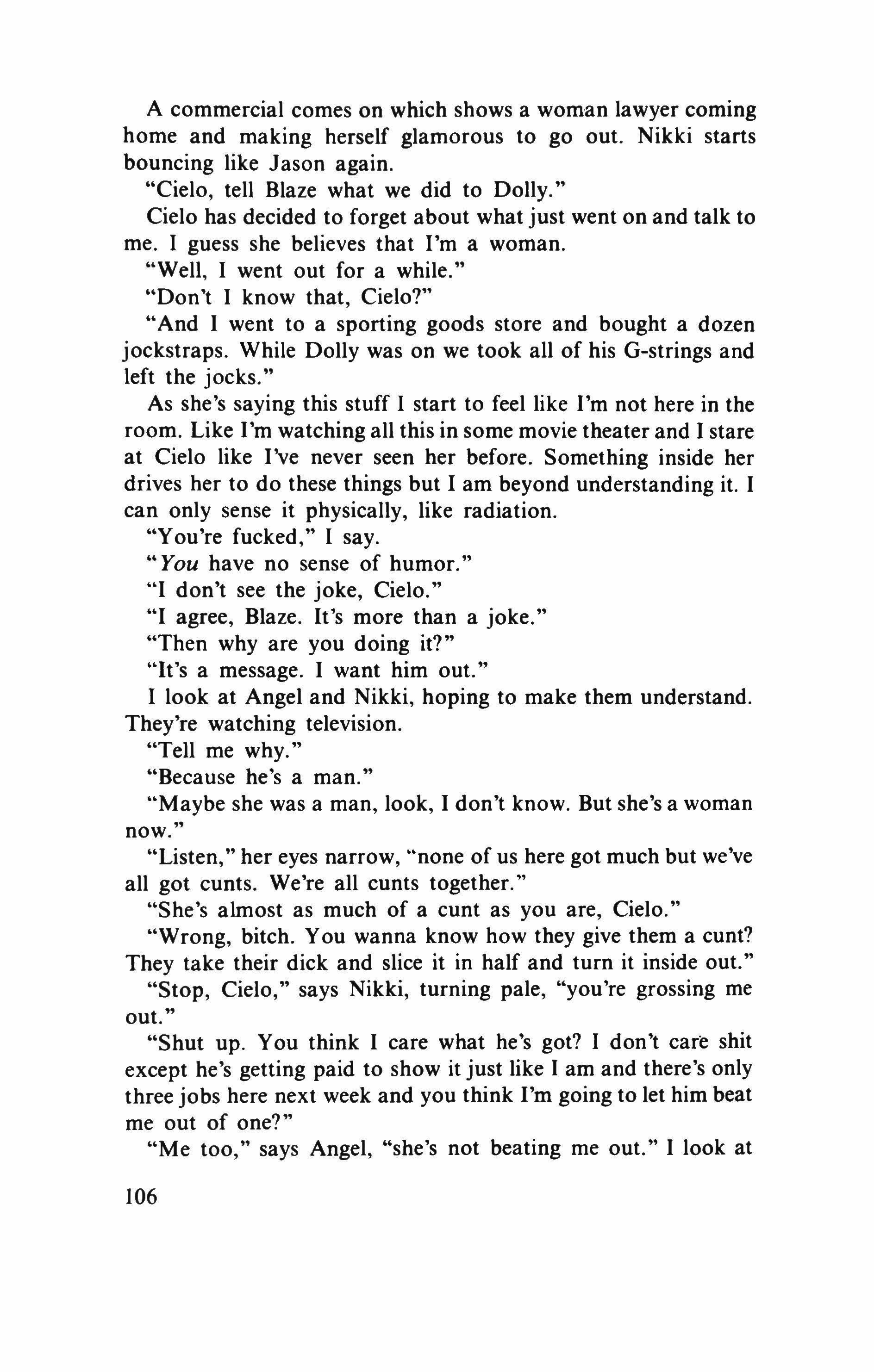
A commercial comes on which shows a woman lawyer coming home and making herself glamorous to go out. Nikki starts bouncing like Jason again.
"Cielo, tell Blaze what we did to Dolly."
Cielo has decided to forget about what just went on and talk to me. I guess she believes that I'm a woman.
"Well, I went out for awhile."
"Don't I know that, Cielo?"
"And I went to a sporting goods store and bought a dozen jockstraps. While Dolly was on we took all of his G-strings and left the jocks."
As she's saying this stuff I start to feel like I'm not here in the room. Like I'm watching all this in some movie theater and I stare at Cielo like I've never seen her before. Something inside her drives her to do these things but I am beyond understanding it. I can only sense it physically, like radiation.
"You're fucked," I say.
"You have no sense of humor."
"I don't see the joke, Cielo."
"I agree, Blaze. It's more than a joke."
"Then why are you doing it?"
"It's a message. I want him out."
I look at Angel and Nikki, hoping to make them understand. They're watching television.
"Tell me why."
"Because he's a man."
"Maybe she was a man, look, I don't know. But she's a woman now."
"Listen," her eyes narrow, "none of us here got much but we've all got cunts. We're all cunts together."
"She's almost as much of a cunt as you are, Cielo."
"Wrong, bitch. You wanna know how they give them a cunt? They take their dick and slice it in half and turn it inside out."
"Stop, Cielo," says Nikki, turning pale, "you're grossing me out.
"Shut up. You think I care what he's got? I don't care shit except he's getting paid to show it just like I am and there's only three jobs here next week and you think I'm going to let him beat me out of one?"
"Me too," says Angel, "she's not beating me out." I look at
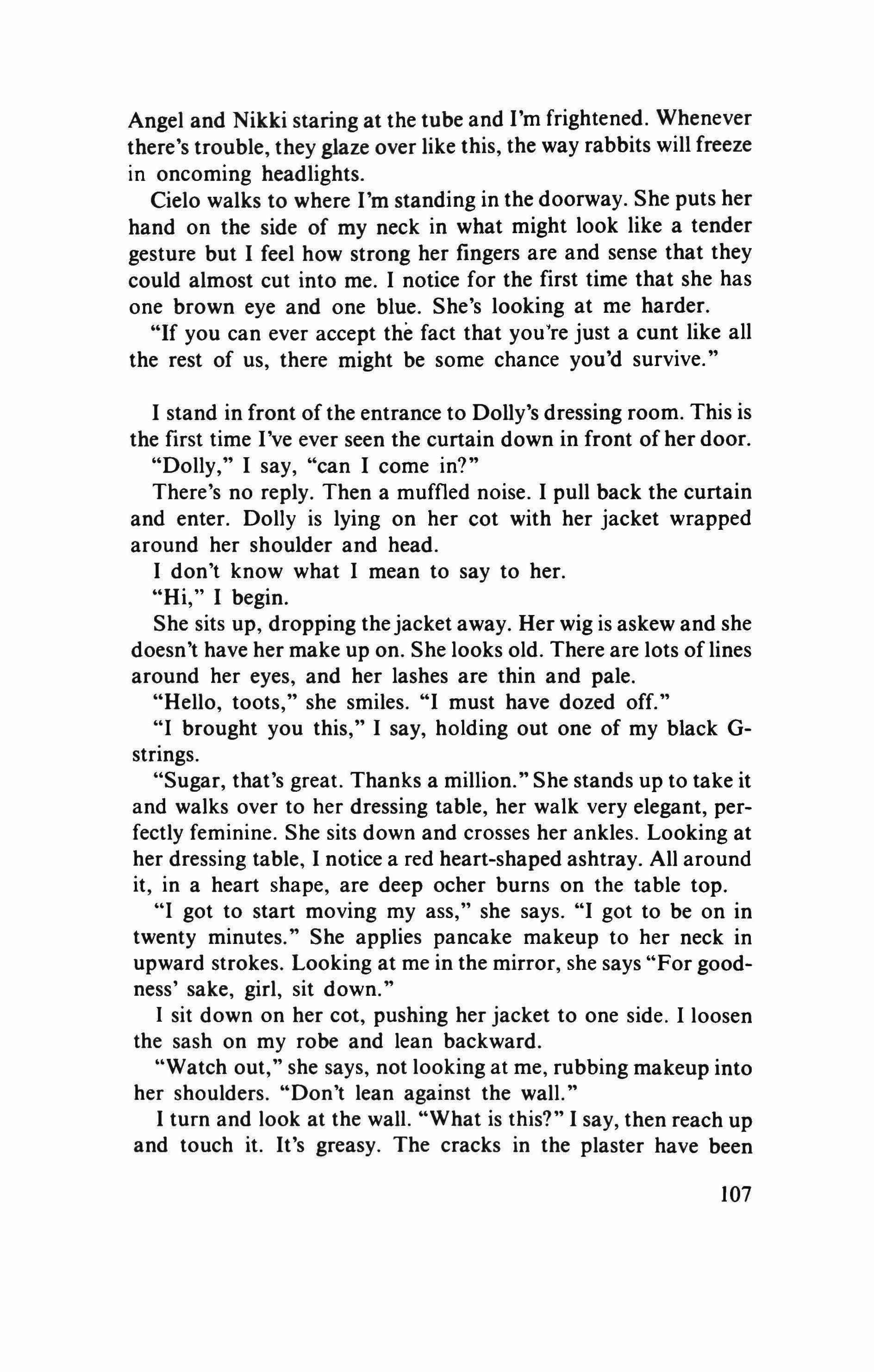
Angel and Nikki staring at the tube and I'm frightened. Whenever there's trouble, they glaze over like this, the way rabbits will freeze in oncoming headlights.
Cielo walks to where I'm standing in the doorway. She puts her hand on the side of my neck in what might look like a tender gesture but 1 feel how strong her fingers are and sense that they could almost cut into me. 1 notice for the first time that she has one brown eye and one blue. She's looking at me harder.
"If you can ever accept the fact that you're just a cunt like all the rest of us, there might be some chance you'd survive."
1 stand in front of the entrance to Dolly's dressing room. This is the first time I've ever seen the curtain down in front of her door.
"Dolly," 1 say, "can 1 come in?"
There's no reply. Then a muffled noise. 1 pull back the curtain and enter. Dolly is lying on her cot with her jacket wrapped around her shoulder and head.
I don't know what 1 mean to say to her.
"Hi," 1 begin.
She sits up, dropping the jacket away. Her wig is askew and she doesn't have her make up on. She looks old. There are lots of lines around her eyes, and her lashes are thin and pale.
"Hello, toots," she smiles. "I must have dozed off."
"I brought you this," 1 say, holding out one of my black Gstrings.
"Sugar, that's great. Thanks a million." She stands up to take it and walks over to her dressing table, her walk very elegant, perfectly feminine. She sits down and crosses her ankles. Looking at her dressing table, 1 notice a red heart-shaped ashtray. All around it, in a heart shape, are deep ocher burns on the table top.
"I got to start moving my ass," she says. "I got to be on in twenty minutes." She applies pancake makeup to her neck in upward strokes. Looking at me in the mirror, she says "For goodness' sake, girl, sit down."
I sit down on her cot, pushing her jacket to one side. 1 loosen the sash on my robe and lean backward.
"Watch out," she says, not looking at me, rubbing makeup into her shoulders. "Don't lean against the wall."
1 turn and look at the wall. "What is this?" 1 say, then reach up and touch it. It's greasy. The cracks in the plaster have been
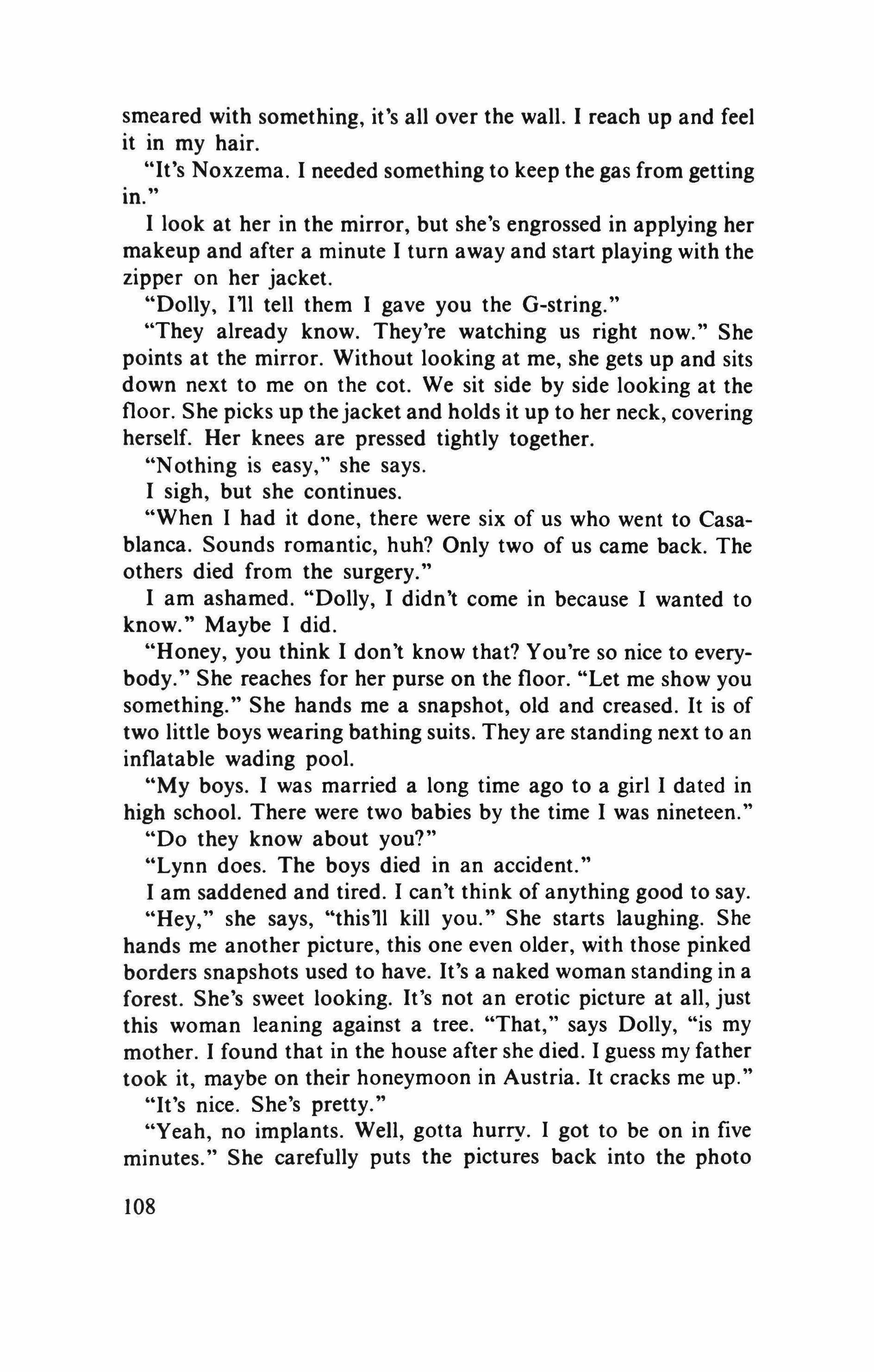
smeared with something, it's all over the wall. I reach up and feel it in my hair.
"It's Noxzema. I needed something to keep the gas from getting in."
I look at her in the mirror, but she's engrossed in applying her makeup and after a minute I turn away and start playing with the zipper on her jacket.
"Dolly, 111 tell them I gave you the G-string."
"They already know. They're watching us right now." She points at the mirror. Without looking at me, she gets up and sits down next to me on the cot. We sit side by side looking at the floor. She picks up thejacket and holds it up to her neck, covering herself. Her knees are pressed tightly together.
"Nothing is easy," she says.
I sigh, but she continues.
"When I had it done, there were six of us who went to Casablanca. Sounds romantic, huh? Only two of us came back. The others died from the surgery."
I am ashamed. "Dolly, I didn't come in because I wanted to know." Maybe I did.
"Honey, you think I don't know that? You're so nice to everybody." She reaches for her purse on the floor. "Let me show you something." She hands me a snapshot, old and creased. It is of two little boys wearing bathing suits. They are standing next to an inflatable wading pool.
"My boys. I was married a long time ago to a girl I dated in high school. There were two babies by the time I was nineteen."
"Do they know about you?"
"Lynn does. The boys died in an accident."
I am saddened and tired. I can't think of anything good to say.
"Hey," she says, "this11 kill you." She starts laughing. She hands me another picture, this one even older, with those pinked borders snapshots used to have. It's a naked woman standing in a forest. She's sweet looking. It's not an erotic picture at all, just this woman leaning against a tree. "That," says Dolly, "is my mother. I found that in the house after she died. I guess my father took it, maybe on their honeymoon in Austria. It cracks me up."
"It's nice. She's pretty."
"Yeah, no implants. Well, gotta hurry. I got to be on in five minutes." She carefully puts the pictures back into the photo
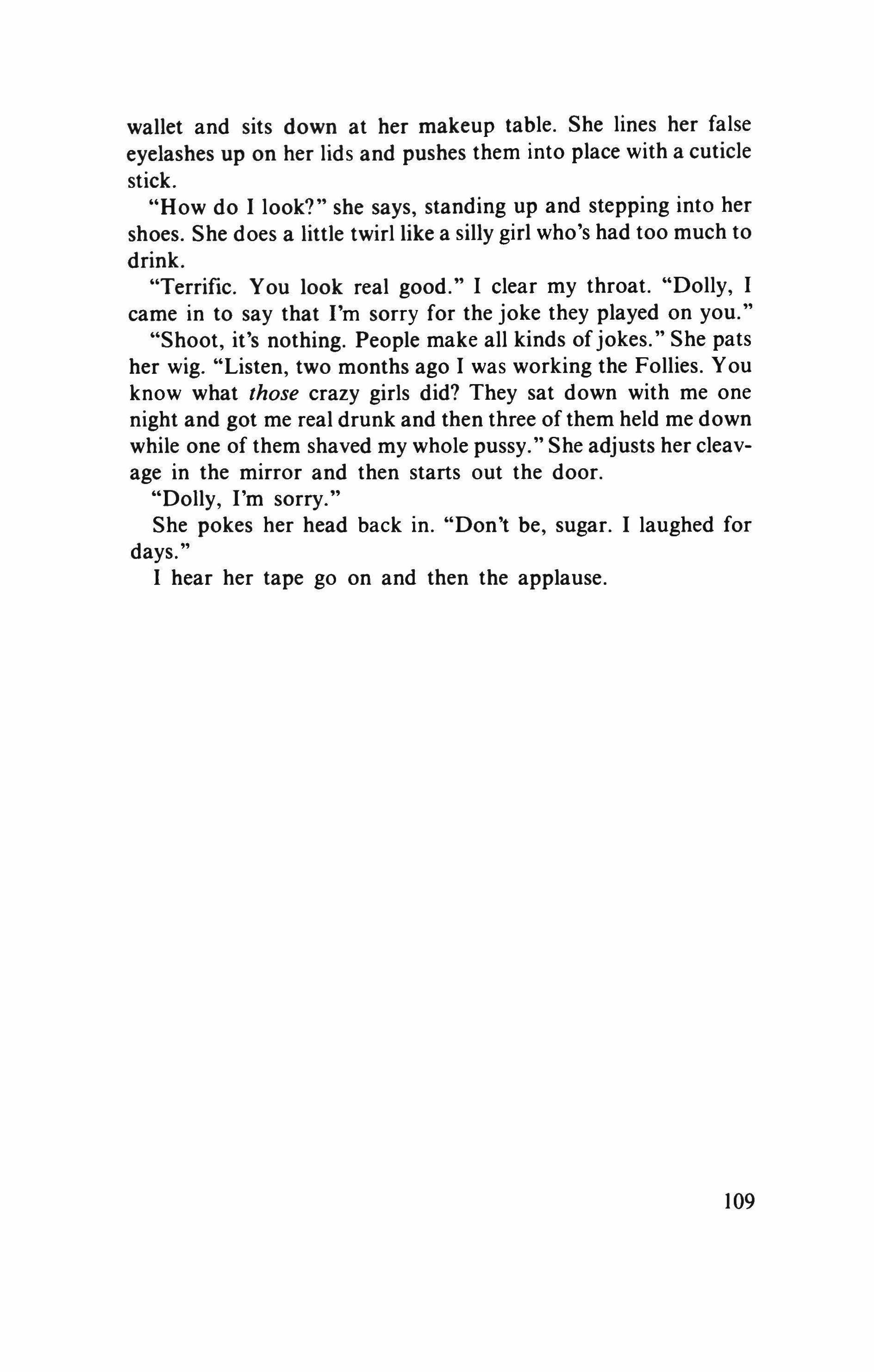
wallet and sits down at her makeup table. She lines her false eyelashes up on her lids and pushes them into place with a cuticle stick.
"How do I look?" she says, standing up and stepping into her shoes. She does a little twirl like a silly girl who's had too much to drink.
"Terrific. You look real good." I clear my throat. "Dolly, I came in to say that I'm sorry for the joke they played on you."
"Shoot, it's nothing. People make all kinds of jokes." She pats her wig. "Listen, two months ago I was working the Follies. You know what those crazy girls did? They sat down with me one night and got me real drunk and then three of them held me down while one of them shaved my whole pussy." She adjusts her cleavage in the mirror and then starts out the door.
"Dolly, I'm sorry."
She pokes her head back in. "Don't be, sugar. I laughed for days.
I hear her tape go on and then the applause.
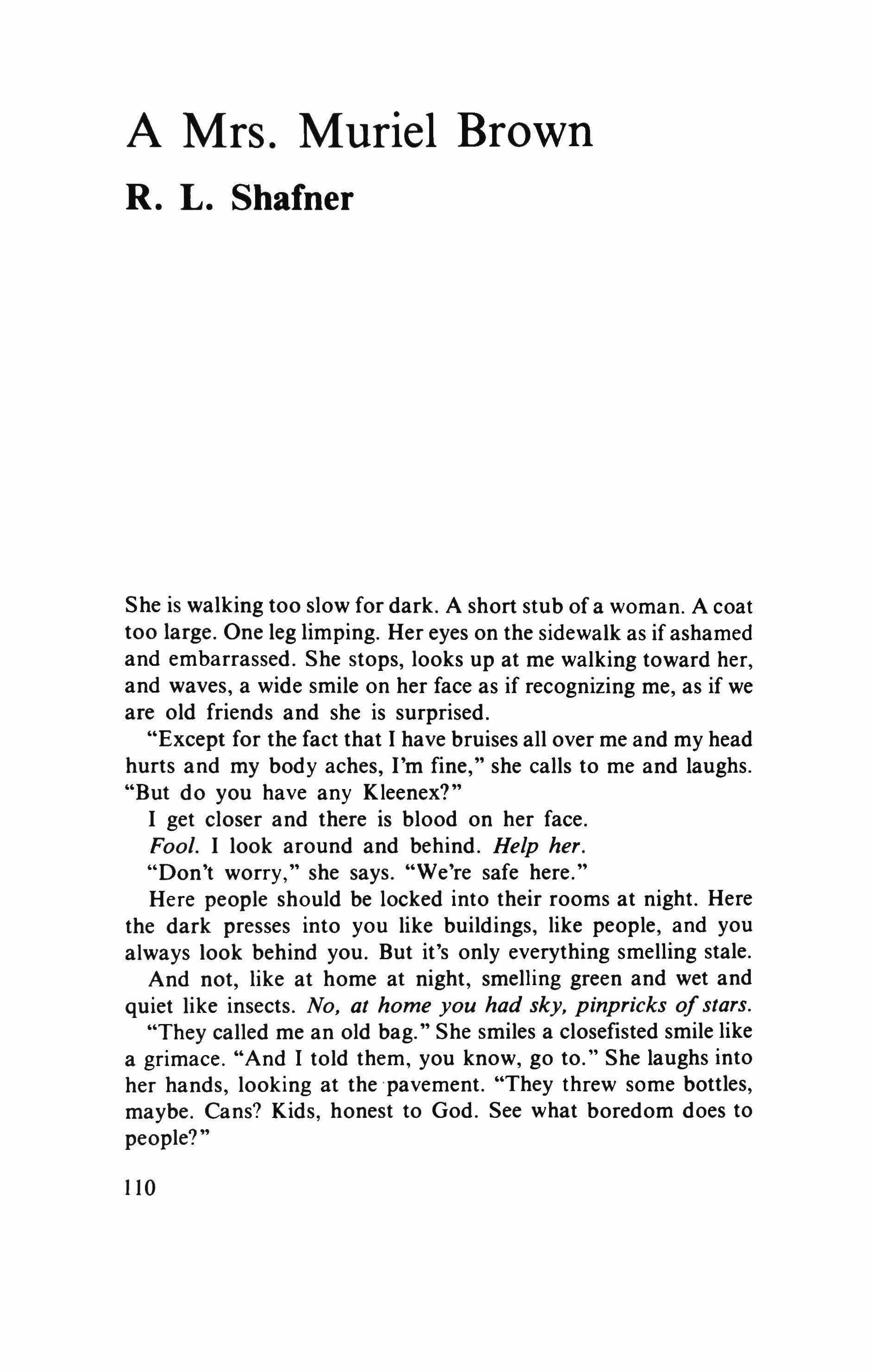
She is walking too slow for dark. A short stub of a woman. A coat too large. One leg limping. Her eyes on the sidewalk as if ashamed and embarrassed. She stops, looks up at me walking toward her, and waves, a wide smile on her face as if recognizing me, as if we are old friends and she is surprised.
"Except for the fact that I have bruises all over me and my head hurts and my body aches, I'm fine," she calls to me and laughs. "But do you have any Kleenex?"
I get closer and there is blood on her face. Fool. I look around and behind. Help her.
"Don't worry," she says. "We're safe here."
Here people should be locked into their rooms at night. Here the dark presses into you like buildings, like people, and you always look behind you. But it's only everything smelling stale. And not, like at home at night, smelling green and wet and quiet like insects. No, at home you had sky, pinpricks of stars.
"They called me an old bag." She smiles a closefisted smile like a grimace. "And I told them, you know, go to." She laughs into her hands, looking at the pavement. "They threw some bottles, maybe. Cans? Kids, honest to God. See what boredom does to people?" 110
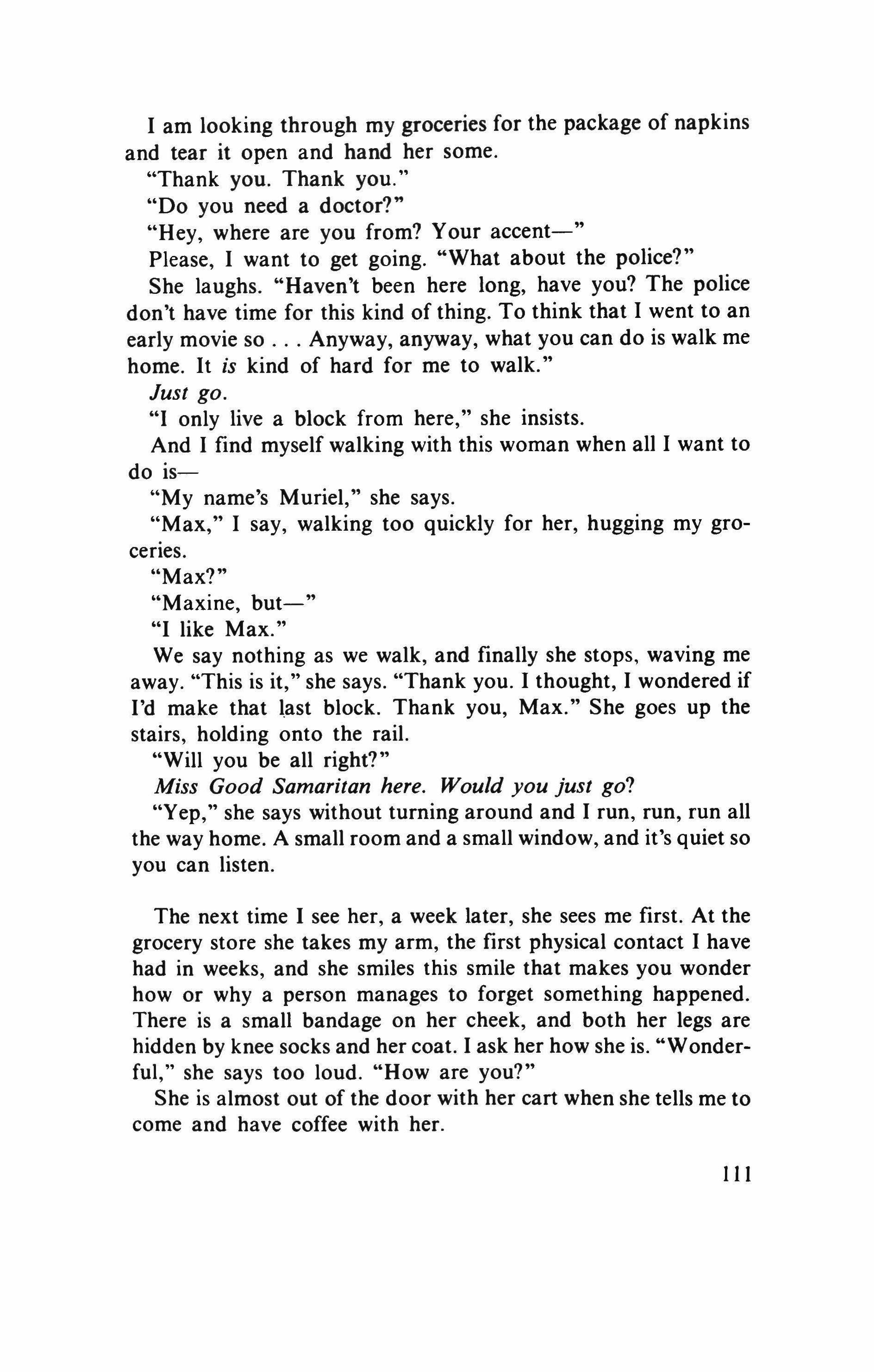
I am looking through my groceries for the package of napkins and tear it open and hand her some.
"Thank you. Thank you."
"Do you need a doctor?"
"Hey, where are you from? Your accent-" Please, I want to get going. "What about the police?"
She laughs. "Haven't been here long, have you? The police don't have time for this kind of thing. To think that I went to an early movie so Anyway, anyway, what you can do is walk me home. It is kind of hard for me to walk."
Just go.
"I only live a block from here," she insists. And I find myself walking with this woman when all I want to do is-
"My name's Muriel," she says. "Max," I say, walking too quickly for her, hugging my groceries.
"Max?"
"Maxine, but-" "I like Max."
We say nothing as we walk, and finally she stops, waving me away. "This is it," she says. "Thank you. I thought, I wondered if I'd make that last block. Thank you, Max." She goes up the stairs, holding onto the rail.
"Will you be all right?"
Miss Good Samaritan here. Would you just go?
"Yep," she says without turning around and I run, run, run all the way home. A small room and a small window, and it's quiet so you can listen.
The next time I see her, a week later, she sees me first. At the grocery store she takes my arm, the first physical contact I have had in weeks, and she smiles this smile that makes you wonder how or why a person manages to forget something happened. There is a small bandage on her cheek, and both her legs are hidden by knee socks and her coat. I ask her how she is. "Wonderful," she says too loud. "How are you?"
She is almost out of the door with her cart when she tells me to come and have coffee with her.
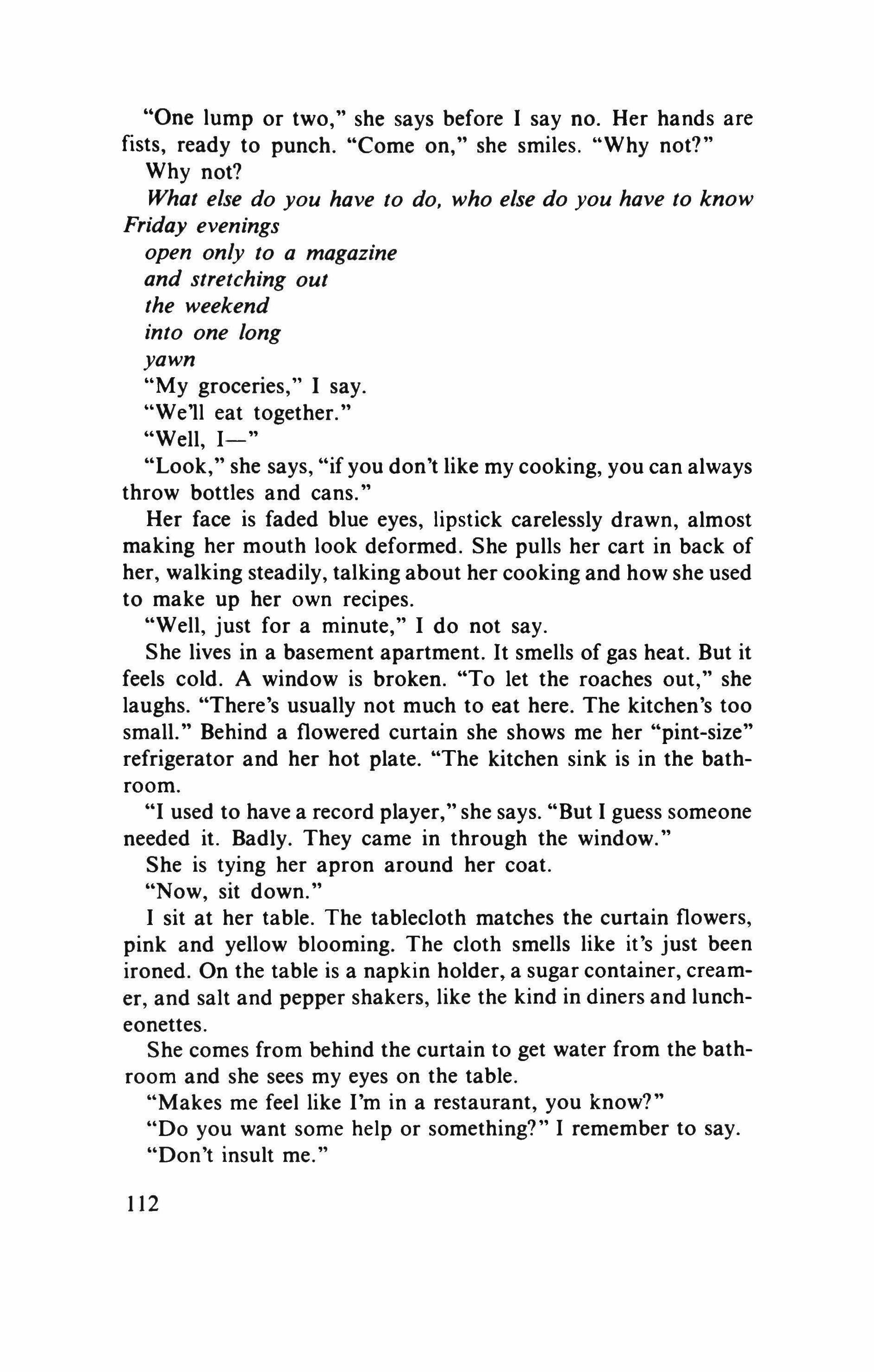
"One lump or two," she says before I say no. Her hands are fists, ready to punch. "Come on," she smiles. "Why not?"
Why not?
What else do you have to do, who else do you have to know Friday evenings open only to a magazine and stretching out the weekend into one long yawn
"My groceries," I say.
"We'll eat together."
"Well, 1-"
"Look," she says, "if you don't like my cooking, you can always throw bottles and cans."
Her face is faded blue eyes, lipstick carelessly drawn, almost making her mouth look deformed. She pulls her cart in back of her, walking steadily, talking about her cooking and how she used to make up her own recipes.
"Well, just for a minute," I do not say.
She lives in a basement apartment. It smells of gas heat. But it feels cold. A window is broken. "To let the roaches out," she laughs. "There's usually not much to eat here. The kitchen's too small." Behind a flowered curtain she shows me her "pint-size" refrigerator and her hot plate. "The kitchen sink is in the bathroom.
"I used to have a record player," she says. "But I guess someone needed it. Badly. They came in through the window."
She is tying her apron around her coat.
"Now, sit down."
I sit at her table. The tablecloth matches the curtain flowers, pink and yellow blooming. The cloth smells like it's just been ironed. On the table is a napkin holder, a sugar container, creamer, and salt and pepper shakers, like the kind in diners and luncheonettes.
She comes from behind the curtain to get water from the bathroom and she sees my eyes on the table.
"Makes me feel like I'm in a restaurant, you know?"
"Do you want some help or something?" 1 remember to say.
"Don't insult me."
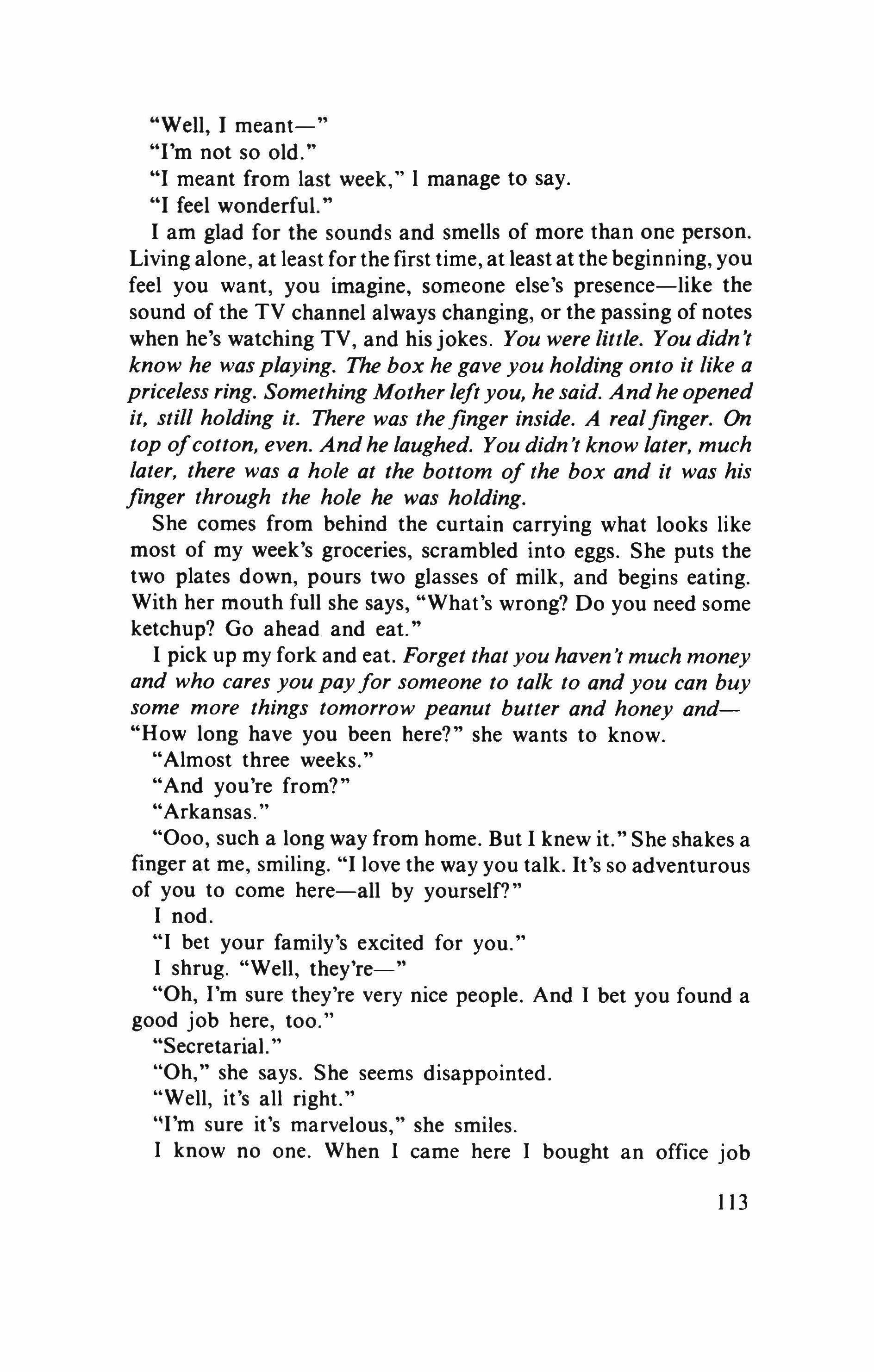
"Well, 1 meant-"
"I'm not so old."
"I meant from last week," I manage to say.
"I feel wonderful."
1 am glad for the sounds and smells of more than one person. Living alone, at least for the first time, at least at the beginning, you feel you want, you imagine, someone else's presence-like the sound of the TV channel always changing, or the passing of notes when he's watching TV, and his jokes. You were little. You didn't know he was playing. The box he gave you holding onto it like a priceless ring. Something Mother left you, he said. And he opened it, still holding it. There was thefinger inside. A realfinger. On top ofcotton, even. And he laughed. You didn't know later, much later, there was a hole at the bottom of the box and it was his finger through the hole he was holding.
She comes from behind the curtain carrying what looks like most of my week's groceries, scrambled into eggs. She puts the two plates down, pours two glasses of milk, and begins eating. With her mouth full she says, "What's wrong? Do you need some ketchup? Go ahead and eat."
1 pick up my fork and eat. Forget that you haven't much money and who cares you pay for someone to talk to and you can buy some more things tomorrow peanut butter and honey and"How long have you been here?" she wants to know.
"Almost three weeks."
"And you're from?"
"Arkansas.
"000, such a long way from home. But 1 knew it." She shakes a finger at me, smiling. "I love the way you talk. It's so adventurous of you to come here-all by yourself?"
1 nod.
"I bet your family's excited for you."
1 shrug. "Well, they're-"
"Oh, I'm sure they're very nice people. And 1 bet you found a good job here, too."
"Secretarial.
"Oh," she says. She seems disappointed.
"Well, it's all right."
"I'm sure it's marvelous," she smiles.
1 know no one. When 1 came here 1 bought an office job
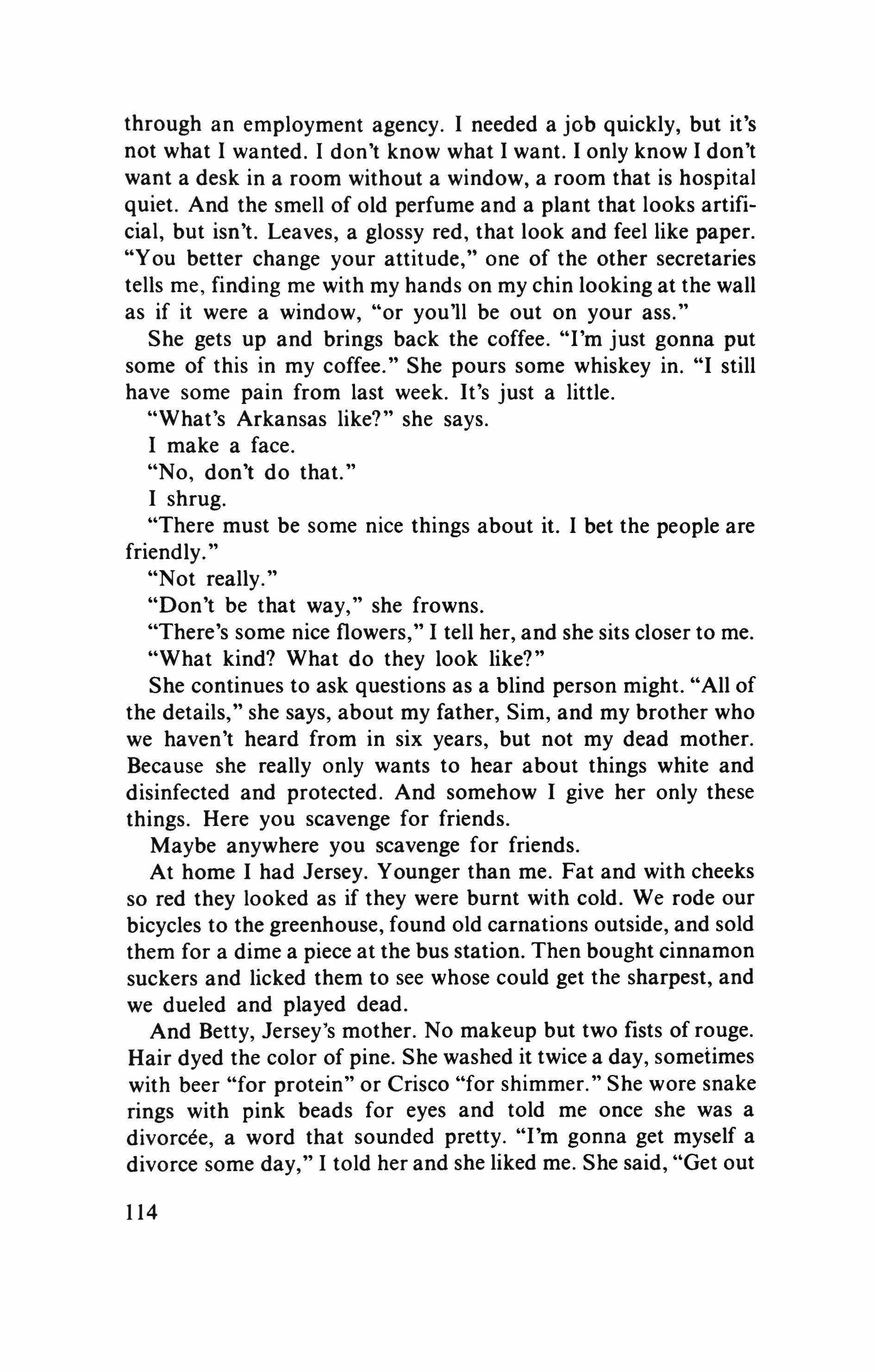
through an employment agency. 1 needed a job quickly, but it's not what 1 wanted. 1 don't know what 1 want. 1 only know 1 don't want a desk in a room without a window, a room that is hospital quiet. And the smell of old perfume and a plant that looks artificial, but isn't. Leaves, a glossy red, that look and feel like paper. "Y ou better change your attitude," one of the other secretaries tells me, finding me with my hands on my chin looking at the wall as if it were a window, "or you'll be out on your ass."
She gets up and brings back the coffee. "I'm just gonna put some of this in my coffee." She pours some whiskey in. "I still have some pain from last week. It's just a little.
"What's Arkansas like?" she says.
1 make a face.
"No, don't do that."
1 shrug.
"There must be some nice things about it. 1 bet the people are friendly. "
"Not really."
"Don't be that way," she frowns.
"There's some nice flowers," 1 tell her, and she sits closer to me.
"What kind? What do they look like?"
She continues to ask questions as a blind person might. "All of the details," she says, about my father, Sim, and my brother who we haven't heard from in six years, but not my dead mother. Because she really only wants to hear about things white and disinfected and protected. And somehow 1 give her only these things. Here you scavenge for friends.
Maybe anywhere you scavenge for friends.
At home 1 had Jersey. Younger than me. Fat and with cheeks so red they looked as if they were burnt with cold. We rode our bicycles to the greenhouse, found old carnations outside, and sold them for a dime a piece at the bus station. Then bought cinnamon suckers and licked them to see whose could get the sharpest, and we dueled and played dead.
And Betty, Jersey's mother. No makeup but two fists of rouge. Hair dyed the color of pine. She washed it twice a day, sometimes with beer "for protein" or Crisco "for shimmer." She wore snake rings with pink beads for eyes and told me once she was a divorcee, a word that sounded pretty. "I'm gonna get myself a divorce some day," 1 told her and she liked me. She said, "Get out
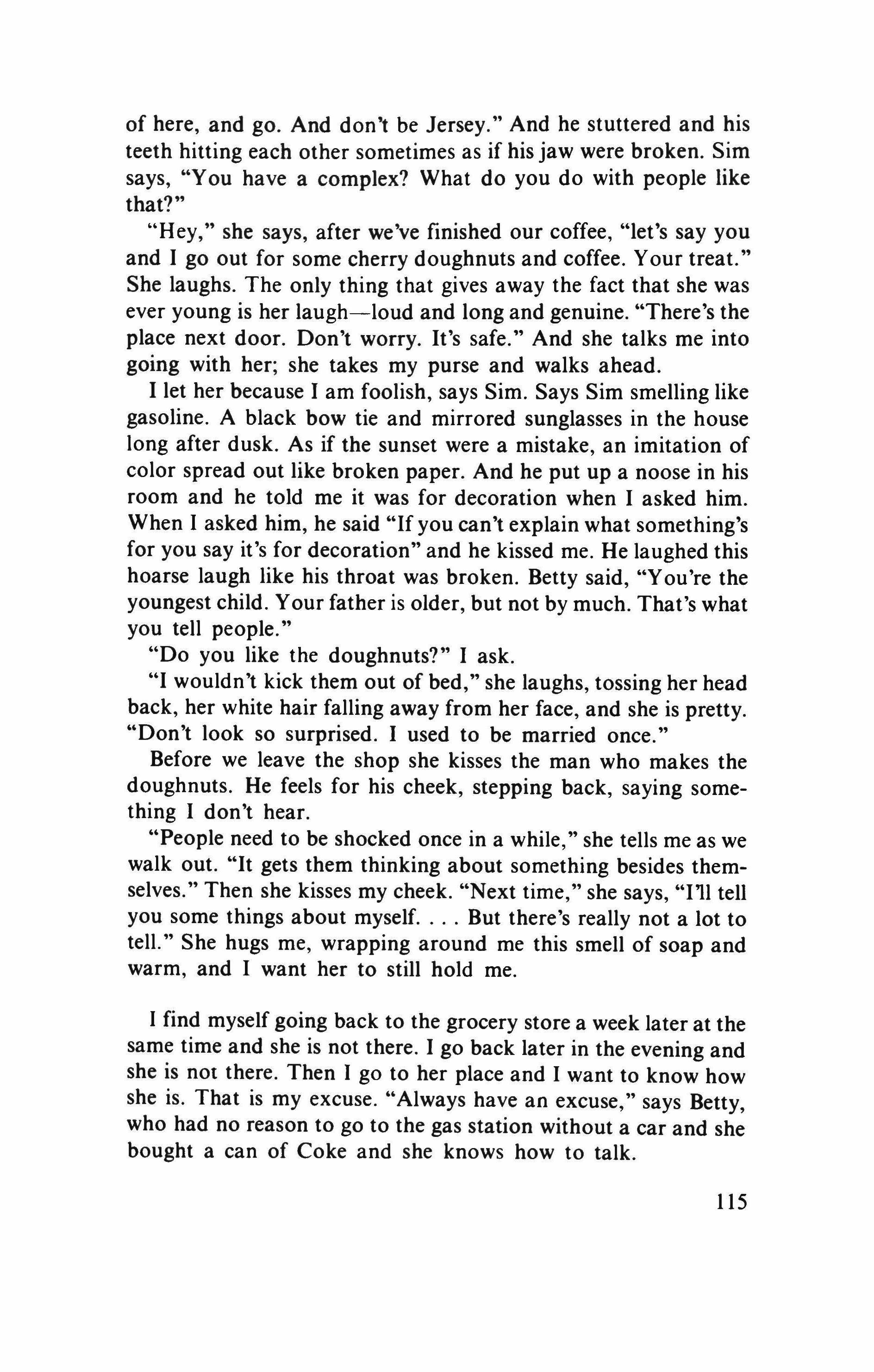
of here, and go. And don't be Jersey." And he stuttered and his teeth hitting each other sometimes as if his jaw were broken. Sim says, "You have a complex? What do you do with people like that?"
"Hey," she says, after we've finished our coffee, "let's say you and 1 go out for some cherry doughnuts and coffee. Your treat." She laughs. The only thing that gives away the fact that she was ever young is her laugh-loud and long and genuine. "There's the place next door. Don't worry. It's safe." And she talks me into going with her; she takes my purse and walks ahead.
1 let her because 1 am foolish, says Sim. Says Sim smelling like gasoline. A black bow tie and mirrored sunglasses in the house long after dusk. As if the sunset were a mistake, an imitation of color spread out like broken paper. And he put up a noose in his room and he told me it was for decoration when 1 asked him. When 1 asked him, he said "If you can't explain what something's for you say it's for decoration" and he kissed me. He laughed this hoarse laugh like his throat was broken. Betty said, "Y ou're the youngest child. Your father is older, but not by much. That's what you tell people."
"Do you like the doughnuts?" 1 ask.
"I wouldn't kick them out of bed," she laughs, tossing her head back, her white hair falling away from her face, and she is pretty. "Don't look so surprised. 1 used to be married once."
Before we leave the shop she kisses the man who makes the doughnuts. He feels for his cheek, stepping back, saying something 1 don't hear.
"People need to be shocked once in a while," she tells me as we walk out. "It gets them thinking about something besides themselves." Then she kisses my cheek. "Next time," she says, "111 tell you some things about myself But there's really not a lot to tell." She hugs me, wrapping around me this smell of soap and warm, and 1 want her to still hold me.
I find myself going back to the grocery store a week later at the same time and she is not there. 1 go back later in the evening and she is not there. Then 1 go to her place and 1 want to know how she is. That is my excuse. "Always have an excuse," says Betty, who had no reason to go to the gas station without a car and she bought a can of Coke and she knows how to talk.
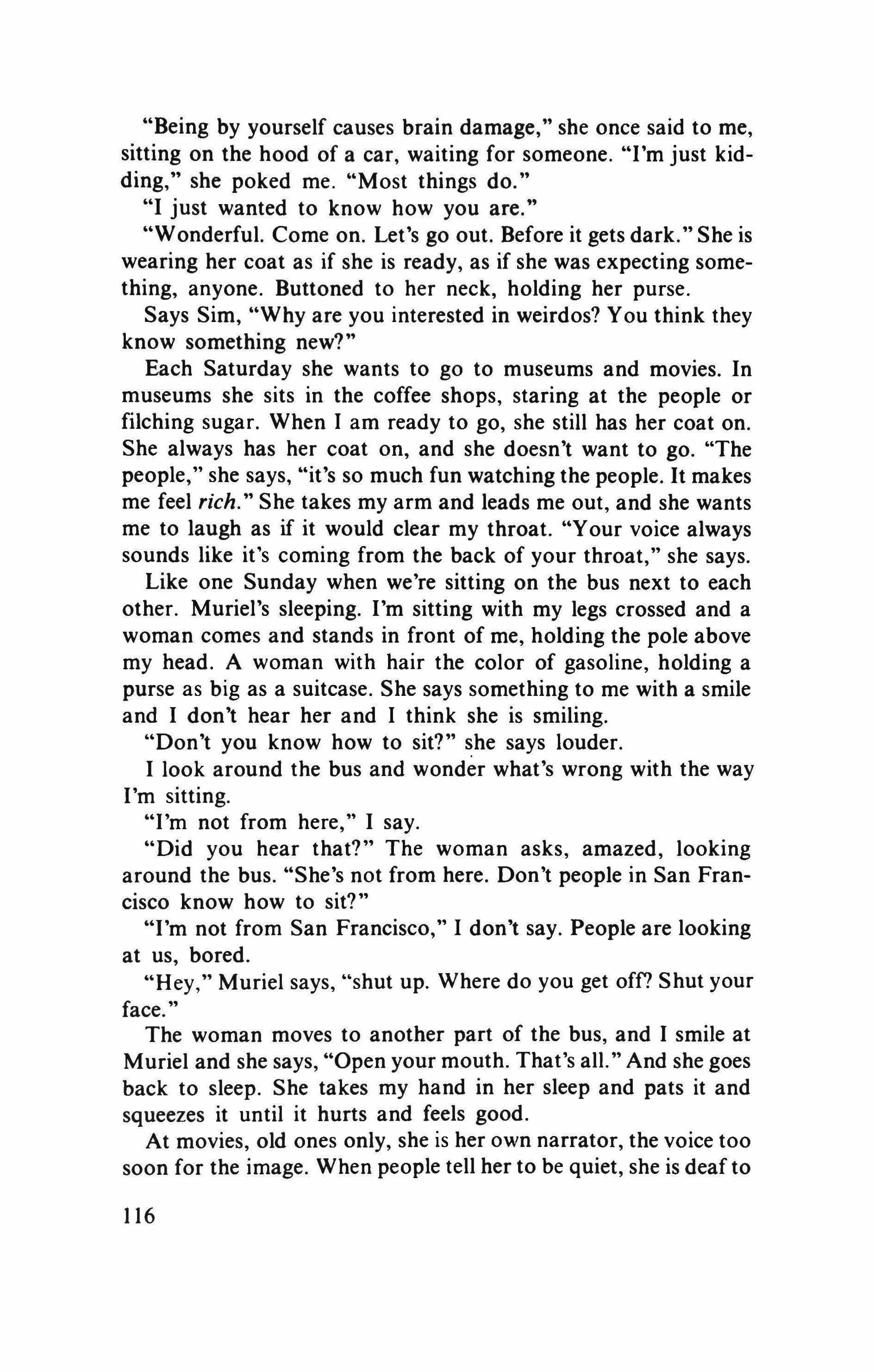
"Being by yourself causes brain damage," she once said to me, sitting on the hood of a car, waiting for someone. "I'm just kidding," she poked me. "Most things do."
"I just wanted to know how you are."
"Wonderful. Come on. Let's go out. Before it gets dark." She is wearing her coat as if she is ready, as if she was expecting something, anyone. Buttoned to her neck, holding her purse.
Says Sim, "Why are you interested in weirdos? You think they know something new?"
Each Saturday she wants to go to museums and movies. In museums she sits in the coffee shops, staring at the people or filching sugar. When I am ready to go, she still has her coat on. She always has her coat on, and she doesn't want to go. "The people," she says, "it's so much fun watching the people. It makes me feel rich." She takes my arm and leads me out, and she wants me to laugh as if it would clear my throat. "Your voice always sounds like it's coming from the back of your throat," she says.
Like one Sunday when we're sitting on the bus next to each other. Muriel's sleeping. I'm sitting with my legs crossed and a woman comes and stands in front of me, holding the pole above my head. A woman with hair the color of gasoline, holding a purse as big as a suitcase. She says something to me with a smile and I don't hear her and I think she is smiling.
"Don't you know how to sit?" she says louder.
I look around the bus and wonder what's wrong with the way I'm sitting.
"I'm not from here," I say.
"Did you hear that?" The woman asks, amazed, looking around the bus. "She's not from here. Don't people in San Francisco know how to sit?"
"I'm not from San Francisco," I don't say. People are looking at us, bored.
"Hey," Muriel says, "shut up. Where do you get off? Shut your face.
The woman moves to another part of the bus, and I smile at Muriel and she says, "Open your mouth. That's all." And she goes back to sleep. She takes my hand in her sleep and pats it and squeezes it until it hurts and feels good.
At movies, old ones only, she is her own narrator, the voice too soon for the image. When people tell her to be quiet, she is deaf to
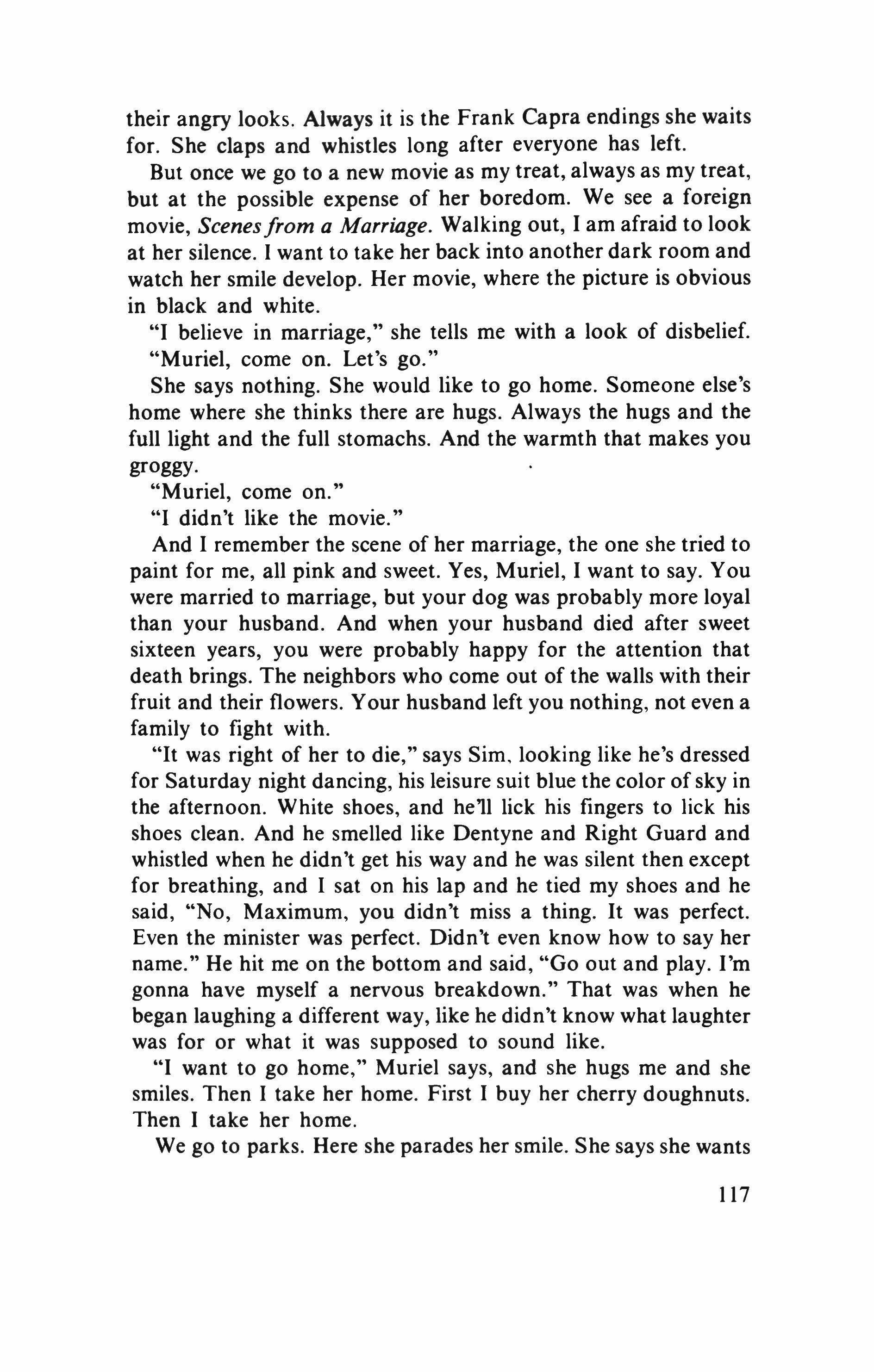
their angry looks. Always it is the Frank Capra endings she waits for. She claps and whistles long after everyone has left.
But once we go to a new movie as my treat, always as my treat, but at the possible expense of her boredom. We see a foreign movie, Scenes/rom a Marriage. Walking out, I am afraid to look at her silence. I want to take her back into another dark room and watch her smile develop. Her movie, where the picture is obvious in black and white.
"I believe in marriage," she tells me with a look of disbelief.
"Muriel, come on. Let's go."
She says nothing. She would like to go home. Someone else's home where she thinks there are hugs. Always the hugs and the full light and the full stomachs. And the warmth that makes you groggy.
"Muriel, come on."
"I didn't like the movie."
And I remember the scene of her marriage, the one she tried to paint for me, all pink and sweet. Yes, Muriel, I want to say. You were married to marriage, but your dog was probably more loyal than your husband. And when your husband died after sweet sixteen years, you were probably happy for the attention that death brings. The neighbors who come out of the walls with their fruit and their flowers. Your husband left you nothing, not even a family to fight with.
"It was right of her to die," says Sim. looking like he's dressed for Saturday night dancing, his leisure suit blue the color of sky in the afternoon. White shoes, and he'll lick his fingers to lick his shoes clean. And he smelled like Dentyne and Right Guard and whistled when he didn't get his way and he was silent then except for breathing, and I sat on his lap and he tied my shoes and he said, "No, Maximum, you didn't miss a thing. It was perfect. Even the minister was perfect. Didn't even know how to say her name." He hit me on the bottom and said, "Go out and play. I'm gonna have myself a nervous breakdown." That was when he began laughing a different way, like he didn't know what laughter was for or what it was supposed to sound like.
"I want to go home," Muriel says, and she hugs me and she smiles. Then I take her home. First I buy her cherry doughnuts. Then I take her home.
We go to parks. Here she parades her smile. She says she wants
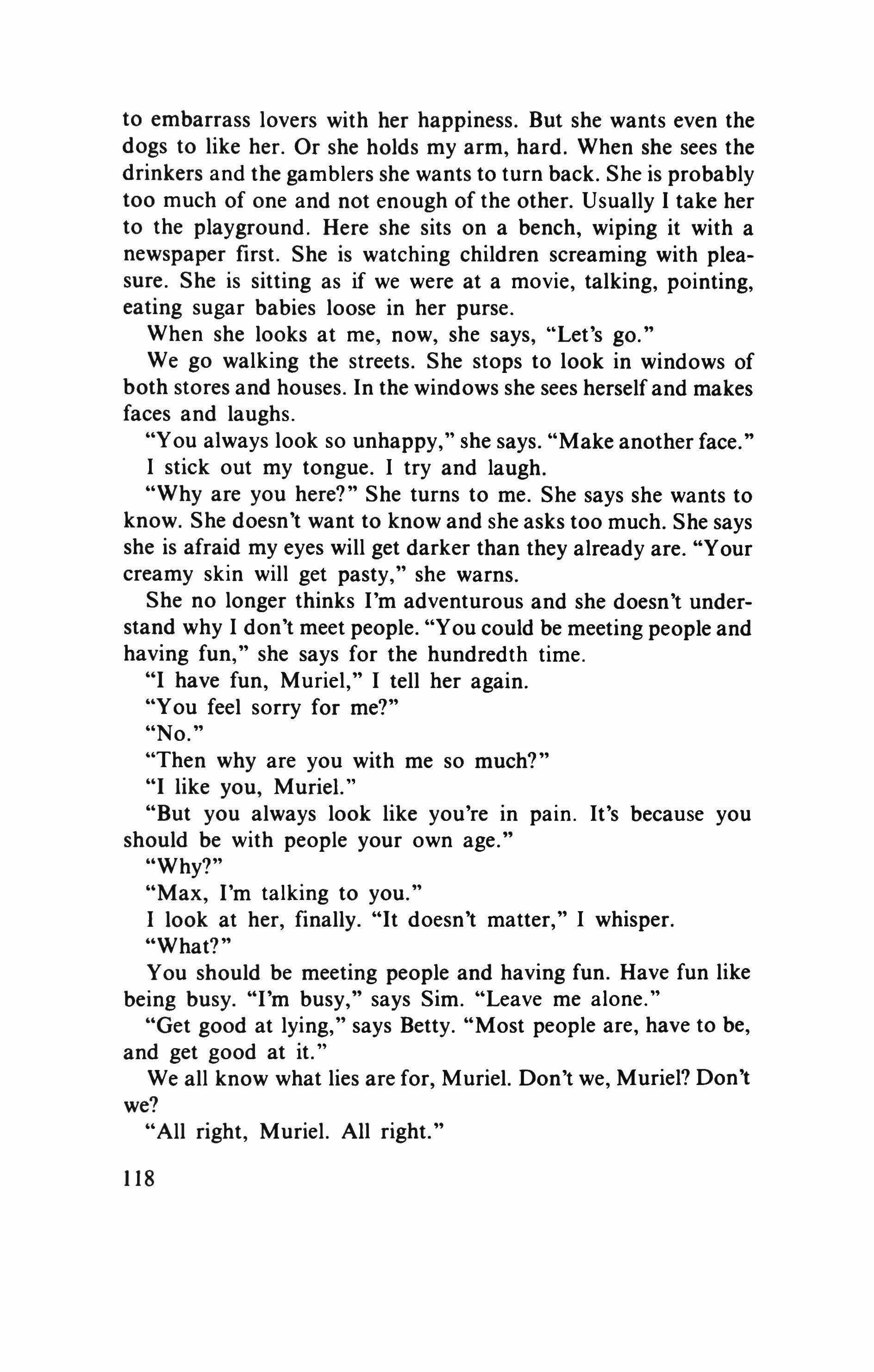
to embarrass lovers with her happiness. But she wants even the dogs to like her. Or she holds my arm, hard. When she sees the drinkers and the gamblers she wants to turn back. She is probably too much of one and not enough of the other. Usually I take her to the playground. Here she sits on a bench, wiping it with a newspaper first. She is watching children screaming with pleasure. She is sitting as if we were at a movie, talking, pointing, eating sugar babies loose in her purse.
When she looks at me, now, she says, "Let's go."
We go walking the streets. She stops to look in windows of both stores and houses. In the windows she sees herself and makes faces and laughs.
"Y ou always look so unhappy," she says. "Make another face."
I stick out my tongue. I try and laugh.
"Why are you here?" She turns to me. She says she wants to know. She doesn't want to know and she asks too much. She says she is afraid my eyes will get darker than they already are. "Your creamy skin will get pasty," she warns.
She no longer thinks I'm adventurous and she doesn't understand why I don't meet people. "You could be meeting people and having fun," she says for the hundredth time.
"I have fun, Muriel," I tell her again.
"You feel sorry for me?"
"No.
"Then why are you with me so much?"
"I like you, Muriel."
"But you always look like you're in pain. It's because you should be with people your own age."
"Max, I'm talking to you."
I look at her, finally. "It doesn't matter," I whisper.
"What?"
You should be meeting people and having fun. Have fun like being busy. "I'm busy," says Sim. "Leave me alone."
"Get good at lying," says Betty. "Most people are, have to be, and get good at it."
We all know what lies are for, Muriel. Don't we, Muriel? Don't we?
"All right, Muriel. All right."
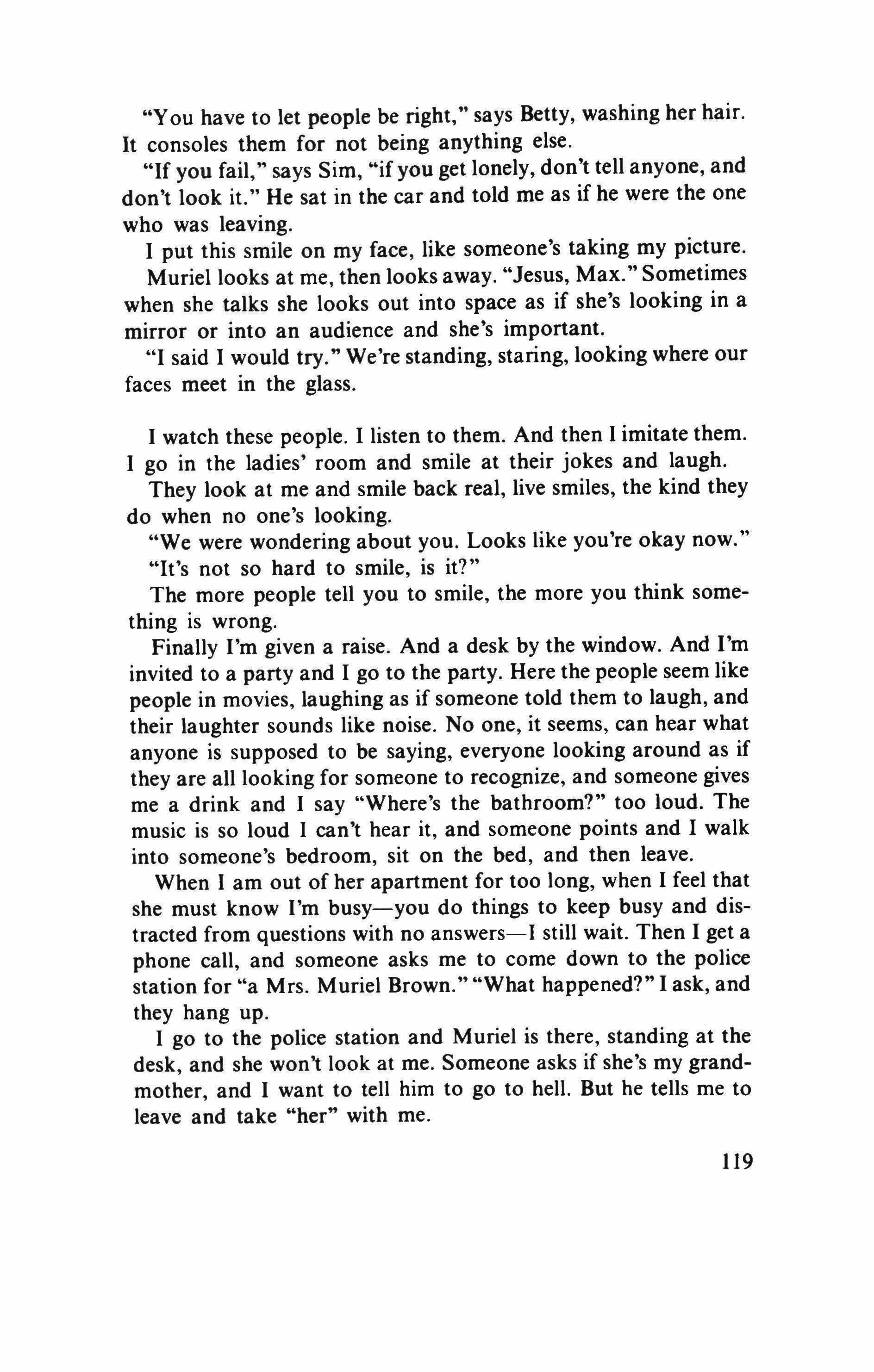
"Y ou have to let people be right," says Betty, washing her hair. It consoles them for not being anything else.
"If you fail," says Sim, "if you get lonely, don't tell anyone, and don't look it." He sat in the car and told me as if he were the one who was leaving.
I put this smile on my face, like someone's taking my picture. Muriel looks at me, then looks away. "Jesus, Max." Sometimes when she talks she looks out into space as if she's looking in a mirror or into an audience and she's important.
"I said I would try." We're standing, staring, looking where our faces meet in the glass.
I watch these people. I listen to them. And then I imitate them. I go in the ladies' room and smile at their jokes and laugh. They look at me and smile back real, live smiles, the kind they do when no one's looking.
"We were wondering about you. Looks like you're okay now."
"It's not so hard to smile, is it?"
The more people tell you to smile, the more you think something is wrong.
Finally I'm given a raise. And a desk by the window. And I'm invited to a party and I go to the party. Here the people seem like people in movies, laughing as if someone told them to laugh, and their laughter sounds like noise. No one, it seems, can hear what anyone is supposed to be saying, everyone looking around as if they are all looking for someone to recognize, and someone gives me a drink and I say "Where's the bathroom?" too loud. The music is so loud I can't hear it, and someone points and I walk into someone's bedroom, sit on the bed, and then leave.
When I am out of her apartment for too long, when I feel that she must know I'm busy-you do things to keep busy and distracted from questions with no answers- I still wait. Then I get a phone call, and someone asks me to come down to the police station for "a Mrs. Muriel Brown." "What happened?" I ask, and they hang up.
I go to the police station and Muriel is there, standing at the desk, and she won't look at me. Someone asks if she's my grandmother, and I want to tell him to go to hell. But he tells me to leave and take "her" with me.
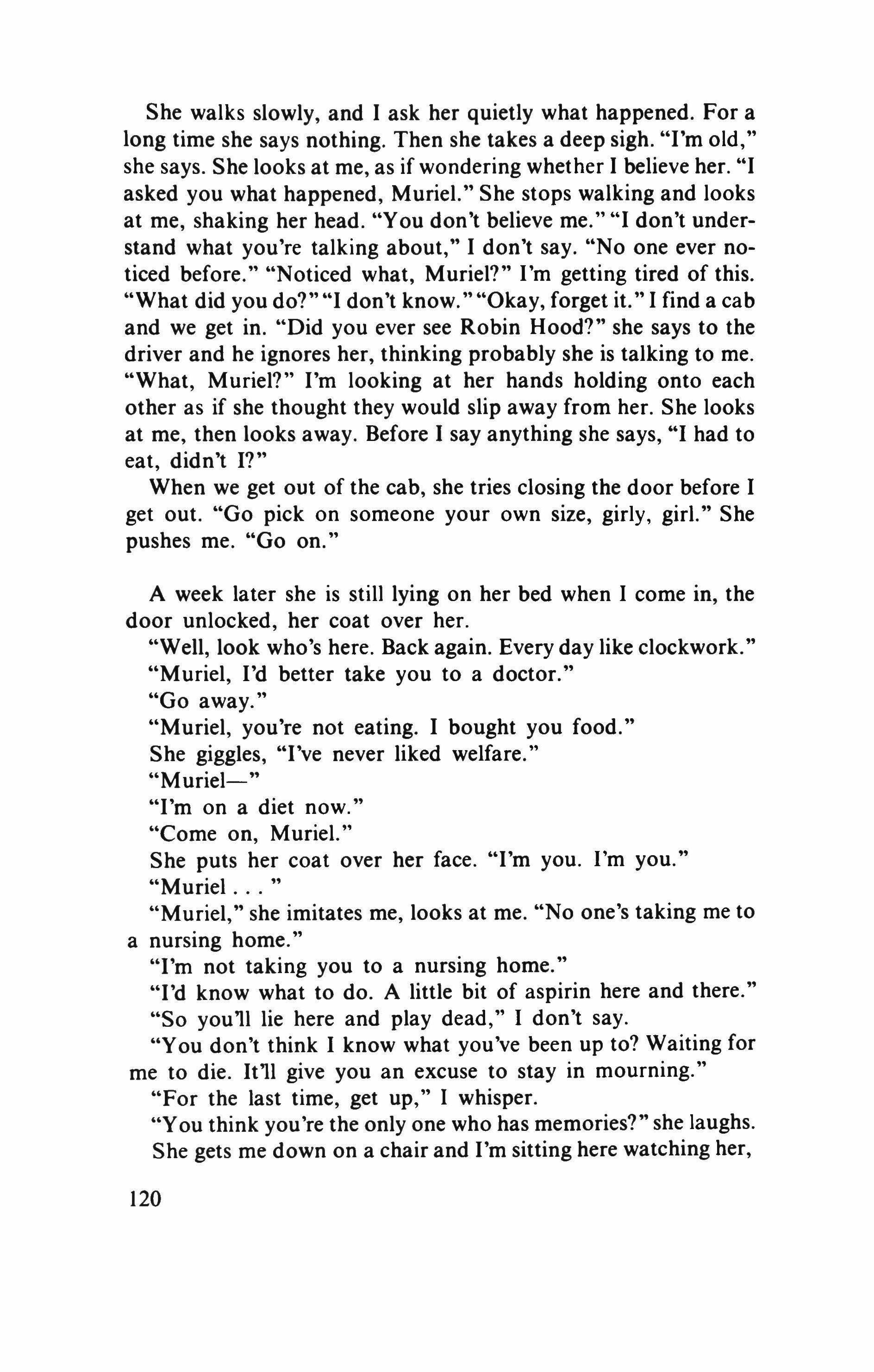
She walks slowly, and I ask her quietly what happened. For a long time she says nothing. Then she takes a deep sigh. "I'm old," she says. She looks at me, as if wondering whether I believe her. "I asked you what happened, Muriel." She stops walking and looks at me, shaking her head. "You don't believe me." "I don't understand what you're talking about," I don't say. "No one ever noticed before." "Noticed what, Muriel?" I'm getting tired of this. "What did you do?" "I don't know." "Okay, forget it." I find a cab and we get in. "Did you ever see Robin Hood?" she says to the driver and he ignores her, thinking probably she is talking to me. "What, Muriel?" I'm looking at her hands holding onto each other as if she thought they would slip away from her. She looks at me, then looks away. Before I say anything she says, "I had to eat, didn't I?"
When we get out of the cab, she tries closing the door before I get out. "Go pick on someone your own size, girly, girl." She pushes me. "Go on."
A week later she is still lying on her bed when I come in, the door unlocked, her coat over her.
"Well, look who's here. Back again. Every day like clockwork."
"Muriel, I'd better take you to a doctor."
"Go away."
"Muriel, you're not eating. I bought you food."
She giggles, "I've never liked welfare."
"Muriel-"
"I'm on a diet now."
"Come on, Muriel."
She puts her coat over her face. "I'm you. I'm you."
"Muriel
"Muriel," she imitates me, looks at me. "No one's taking me to a nursing home."
"I'm not taking you to a nursing home."
"I'd know what to do. A little bit of aspirin here and there."
"So you'll lie here and play dead," I don't say.
"You don't think I know what you've been up to? Waiting for me to die. It'll give you an excuse to stay in mourning."
"For the last time, get up," I whisper.
"You think you're the only one who has memories?" she laughs. She gets me down on a chair and I'm sitting here watching her, 120
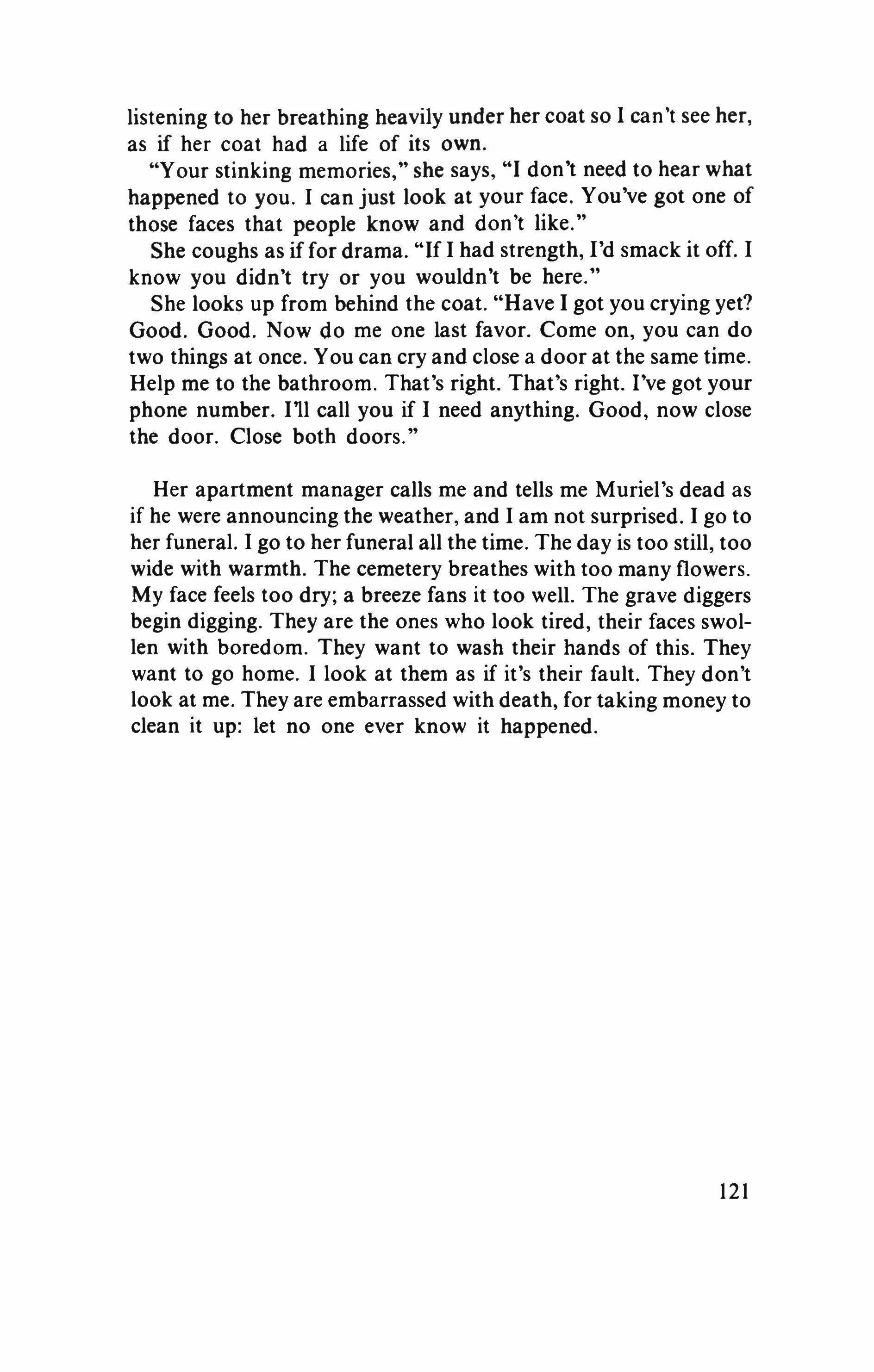
listening to her breathing heavily under her coat so I can't see her, as if her coat had a life of its own.
"Your stinking memories," she says, "I don't need to hear what happened to you. I can just look at your face. You've got one of those faces that people know and don't like."
She coughs as if for drama. "If 1 had strength, I'd smack it off. 1 know you didn't try or you wouldn't be here."
She looks up from behind the coat. "Have 1 got you crying yet? Good. Good. Now do me one last favor. Come on, you can do two things at once. You can cry and close a door at the same time. Help me to the bathroom. That's right. That's right. I've got your phone number. I'll call you if I need anything. Good, now close the door. Close both doors."
Her apartment manager calls me and tells me Muriel's dead as if he were announcing the weather, and 1 am not surprised. 1 go to her funeral. 1 go to her funeral all the time. The day is too still, too wide with warmth. The cemetery breathes with too many flowers. My face feels too dry; a breeze fans it too well. The grave diggers begin digging. They are the ones who look tired, their faces swollen with boredom. They want to wash their hands of this. They want to go home. I look at them as if it's their fault. They don't look at me. They are embarrassed with death, for taking money to clean it up: let no one ever know it happened.
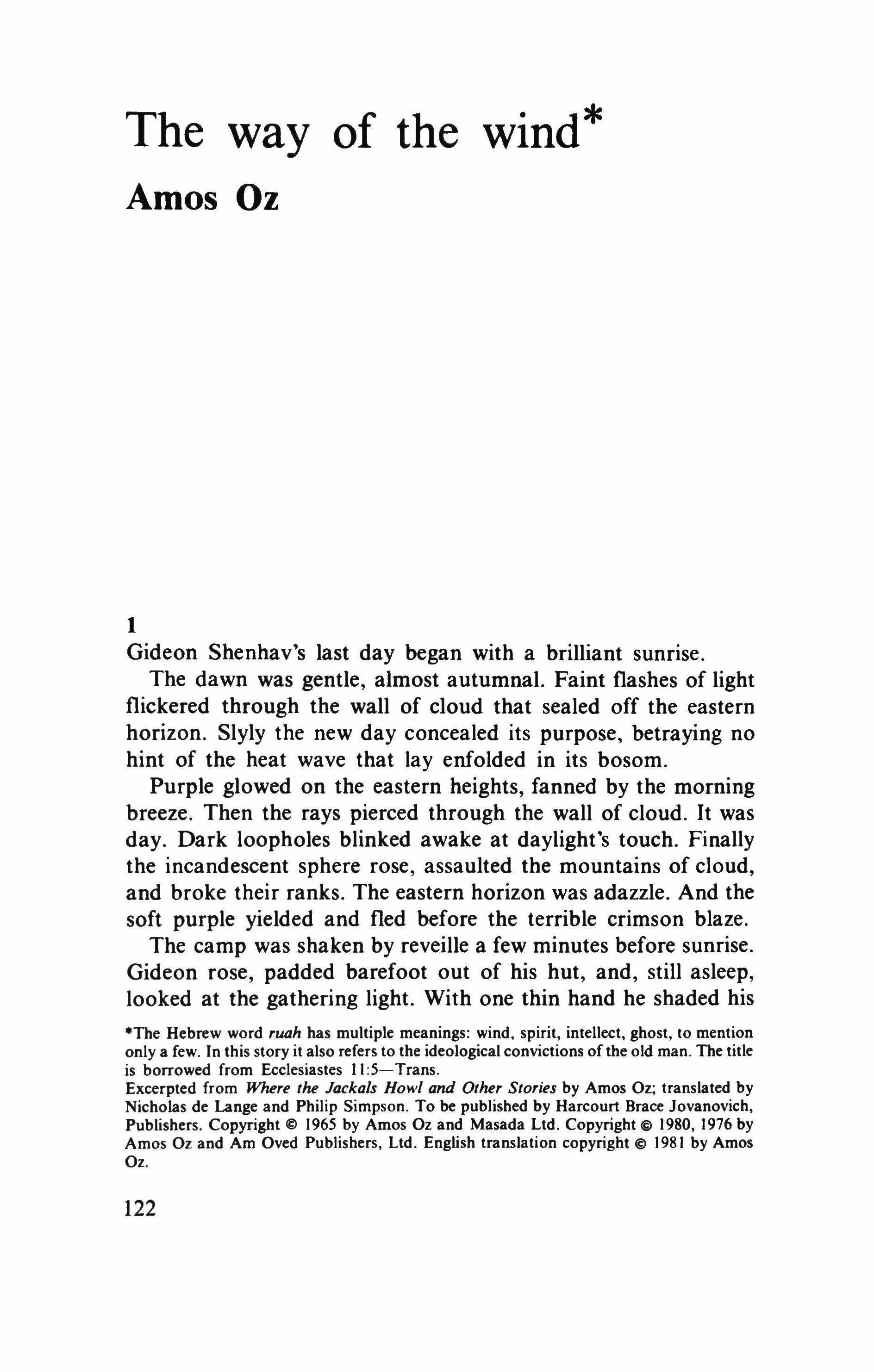
1
Gideon Shenhav's last day began with a brilliant sunrise.
The dawn was gentle, almost autumnal. Faint flashes of light flickered through the wall of cloud that sealed off the eastern horizon. Slyly the new day concealed its purpose, betraying no hint of the heat wave that lay enfolded in its bosom.
Purple glowed on the eastern heights, fanned by the morning breeze. Then the rays pierced through the wall of cloud. It was day. Dark loopholes blinked awake at daylight's touch. Finally the incandescent sphere rose, assaulted the mountains of cloud, and broke their ranks. The eastern horizon was adazzle. And the soft purple yielded and fled before the terrible crimson blaze.
The camp was shaken by reveille a few minutes before sunrise. Gideon rose, padded barefoot out of his hut, and, still asleep, looked at the gathering light. With one thin hand he shaded his
-The Hebrew word ruah has multiple meanings: wind, spirit, intel1ect, ghost, to mention only a few. In this story it also refers to the ideological convictions of the old man. The title is borrowed from Ecclesiastes 11:5-Trans.
Excerpted from Where the Jackals Howl and Other Stories by Amos Oz; translated by Nicholas de Lange and Philip Simpson. To be published by Harcourt Brace Jovanovich, Publishers. Copyright © 1965 by Amos Oz and Masada Ltd. Copyright@ 1980, 1976 by Amos Oz and Am Oved Publishers, Ltd. English translation copyright @ 1981 by Amos Oz.
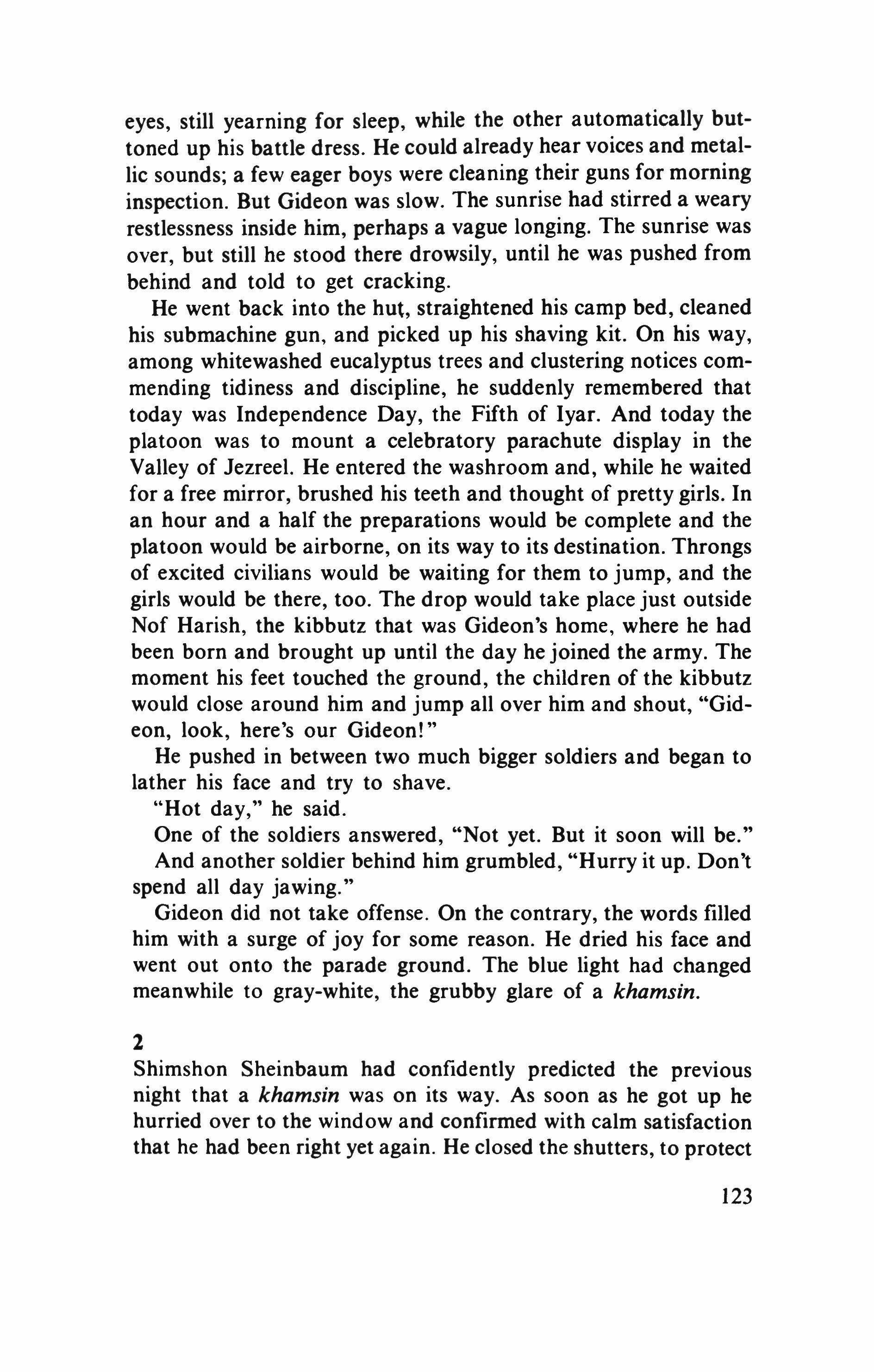
eyes, still yearning for sleep, while the other automatically buttoned up his battle dress. He could already hear voices and metallic sounds; a few eager boys were cleaning their guns for morning inspection. But Gideon was slow. The sunrise had stirred a weary restlessness inside him, perhaps a vague longing. The sunrise was over, but still he stood there drowsily, until he was pushed from behind and told to get cracking.
He went back into the hut, straightened his camp bed, cleaned his submachine gun, and picked up his shaving kit. On his way, among whitewashed eucalyptus trees and clustering notices commending tidiness and discipline, he suddenly remembered that today was Independence Day, the Fifth of Iyar. And today the platoon was to mount a celebratory parachute display in the Valley of Jezreel, He entered the washroom and, while he waited for a free mirror, brushed his teeth and thought of pretty girls. In an hour and a half the preparations would be complete and the platoon would be airborne, on its way to its destination. Throngs of excited civilians would be waiting for them to jump, and the girls would be there, too. The drop would take place just outside Nof Harish, the kibbutz that was Gideon's home, where he had been born and brought up until the day he joined the army. The moment his feet touched the ground, the children of the kibbutz would close around him and jump all over him and shout, "Gideon, look, here's our Gideon!"
He pushed in between two much bigger soldiers and began to lather his face and try to shave.
"Hot day," he said.
One of the soldiers answered, "Not yet. But it soon will be."
And another soldier behind him grumbled, "Hurry it up. Don't spend all day jawing."
Gideon did not take offense. On the contrary, the words filled him with a surge of joy for some reason. He dried his face and went out onto the parade ground. The blue light had changed meanwhile to gray-white, the grubby glare of a khamsin.
1
Shimshon Sheinbaum had confidently predicted the previous night that a khamsin was on its way. As soon as he got up he hurried over to the window and confirmed with calm satisfaction that he had been right yet again. He closed the shutters, to protect
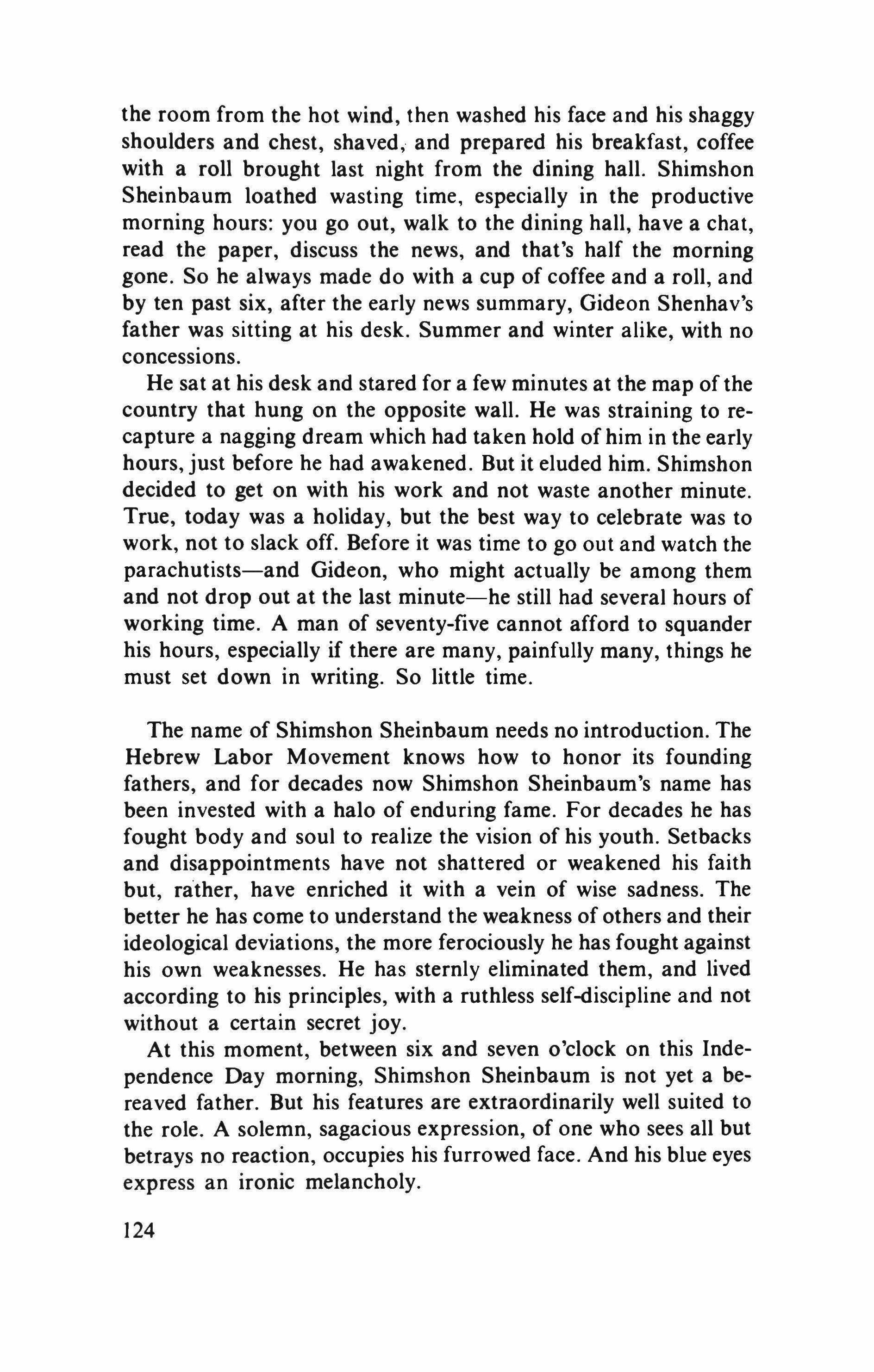
the room from the hot wind, then washed his face and his shaggy shoulders and chest, shaved, and prepared his breakfast, coffee with a roll brought last night from the dining hall. Shimshon Sheinbaum loathed wasting time, especially in the productive morning hours: you go out, walk to the dining hall, have a chat, read the paper, discuss the news, and that's half the morning gone. So he always made do with a cup of coffee and a roll, and by ten past six, after the early news summary, Gideon Shenhav's father was sitting at his desk. Summer and winter alike, with no concessions.
He sat at his desk and stared for a few minutes at the map of the country that hung on the opposite wall. He was straining to recapture a nagging dream which had taken hold of him in the early hours, just before he had awakened. But it eluded him. Shimshon decided to get on with his work and not waste another minute. True, today was a holiday, but the best way to celebrate was to work, not to slack off. Before it was time to go out and watch the parachutists-and Gideon, who might actually be among them and not drop out at the last minute-he still had several hours of working time. A man of seventy-five cannot afford to squander his hours, especially if there are many, painfully many, things he must set down in writing. So little time.
The name of Shimshon Sheinbaum needs no introduction. The Hebrew Labor Movement knows how to honor its founding fathers, and for decades now Shimshon Sheinbaum's name has been invested with a halo of enduring fame. For decades he has fought body and soul to realize the vision of his youth. Setbacks and disappointments have not shattered or weakened his faith but, rather, have enriched it with a vein of wise sadness. The better he has come to understand the weakness of others and their ideological deviations, the more ferociously he has fought against his own weaknesses. He has sternly eliminated them, and lived according to his principles, with a ruthless self-discipline and not without a certain secret joy.
At this moment, between six and seven o'clock on this Independence Day morning, Shimshon Sheinbaum is not yet a bereaved father. But his features are extraordinarily well suited to the role. A solemn, sagacious expression, of one who sees all but betrays no reaction, occupies his furrowed face. And his blue eyes express an ironic melancholy.
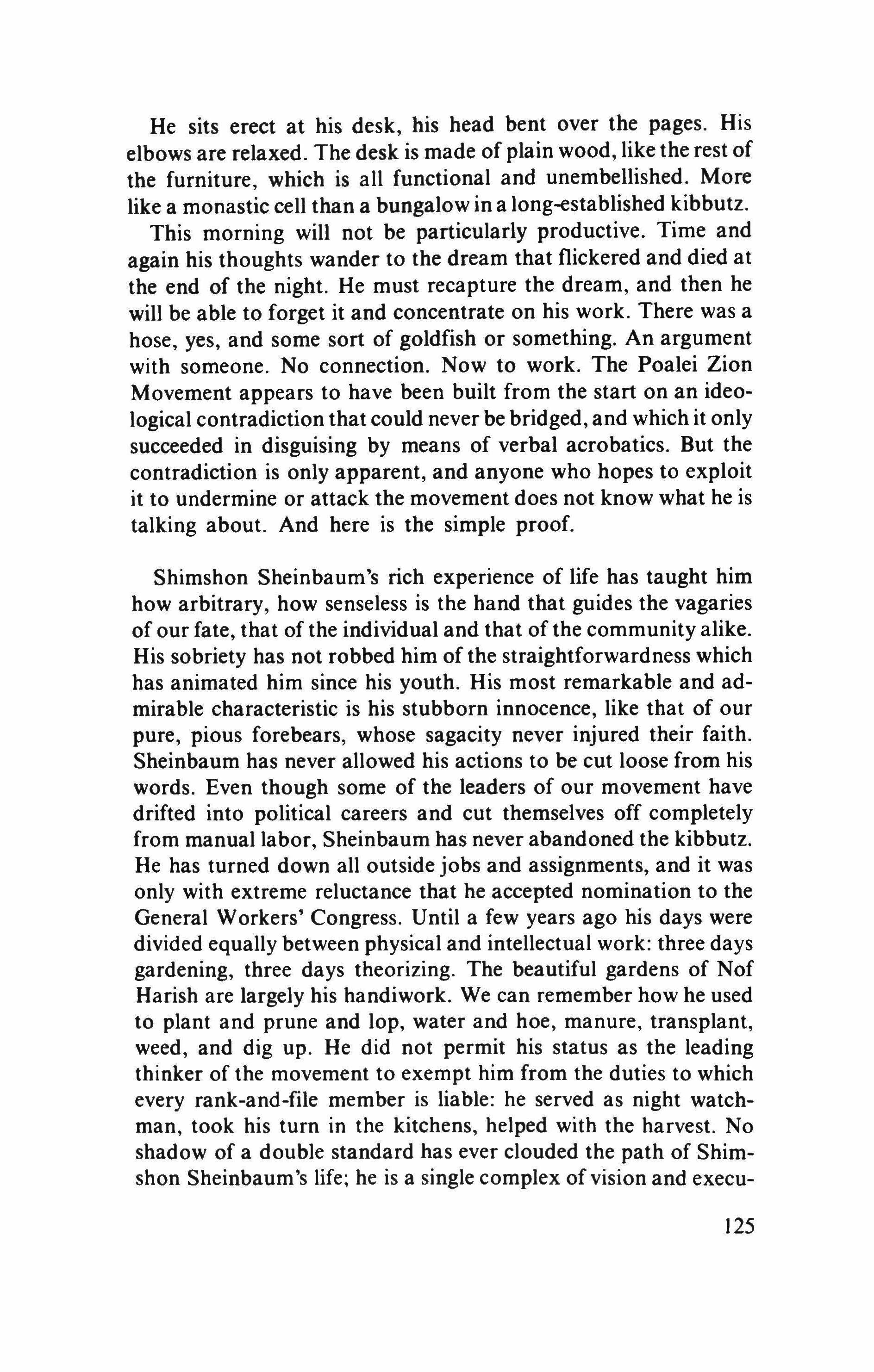
He sits erect at his desk, his head bent over the pages. His elbows are relaxed. The desk is made of plain wood, like the rest of the furniture, which is all functional and unembellished. More like a monastic cell than a bungalow in a long-established kibbutz. This morning will not be particularly productive. Time and again his thoughts wander to the dream that flickered and died at the end of the night. He must recapture the dream, and then he will be able to forget it and concentrate on his work. There was a hose, yes, and some sort of goldfish or something. An argument with someone. No connection. Now to work. The Poalei Zion Movement appears to have been built from the start on an ideological contradiction that could never be bridged, and which it only succeeded in disguising by means of verbal acrobatics. But the contradiction is only apparent, and anyone who hopes to exploit it to undermine or attack the movement does not know what he is talking about. And here is the simple proof.
Shimshon Sheinbaum's rich experience of life has taught him how arbitrary, how senseless is the hand that guides the vagaries of our fate, that of the individual and that of the community alike. His sobriety has not robbed him of the straightforwardness which has animated him since his youth. His most remarkable and admirable characteristic is his stubborn innocence, like that of our pure, pious forebears, whose sagacity never injured their faith. Sheinbaum has never allowed his actions to be cut loose from his words. Even though some of the leaders of our movement have drifted into political careers and cut themselves off completely from manual labor, Sheinbaum has never abandoned the kibbutz. He has turned down all outside jobs and assignments, and it was only with extreme reluctance that he accepted nomination to the General Workers' Congress. Until a few years ago his days were divided equally between physical and intellectual work: three days gardening, three days theorizing. The beautiful gardens of Nof Harish are largely his handiwork. We can remember how he used to plant and prune and lop, water and hoe, manure, transplant, weed, and dig up. He did not permit his status as the leading thinker of the movement to exempt him from the duties to which every rank-and-file member is liable: he served as night watchman, took his turn in the kitchens, helped with the harvest. No shadow of a double standard has ever clouded the path of Shimshon Sheinbaum's life; he is a single complex of vision and execu-

tion, he has known no slackness or weakness of will-so the secretary of the movement wrote about him in a magazine a few years ago, on the occasion of his seventieth birthday.
True, there have been moments of stabbing despair. There have been moments of deep disgust. But Shimshon Sheinbaum knows how to transform such moments into secret sources of furious energy. Like the words of the marching song he loves, which always inspires him to a frenzy of action: Up into the mountains we are climbing, Climbing up toward the dawning day: We have left all our yesterdays behind us, But tomorrow is a long long way away. If only that stupid dream would emerge from the shadows and show itself clearly, he could kick it out of his mind and concentrate at last on his work. Time is slipping by. A rubber hose, a chess gambit, some goldfish, a great argument, but what is the connection?
For many years Shimshon Sheinbaum has lived alone. He has channeled all his vigor into his ideological productions. To this life's work he has sacrificed the warmth of a family home. He has managed, in exchange, to retain into old age a youthful clarity and cordiality. Only when he was fifty-six did he suddenly marry Raya Greenspan and father Gideon, and after that he left her and returned to his ideological work. It would be sanctimonious to pretend, however, that before his marriage Shimshon Sheinbaum maintained a monastic existence. His personality attracted women just as it attracted disciples. He was still young when his thick mop of hair turned white, and his sunbeaten face was etched with an appealing pattern of lines and wrinkles. His square back, his strong shoulders, the timbre of his voice-always warm, skeptical, and rather ruminative-and also his solitude, all attracted women to him like fluttering birds. Gossip attributes to his loins at least one of the urchins of the kibbutz, and elsewhere, too, stories are current. But we shall not dwell on this.
At the age of fifty-six Shimshon Sheinbaum decided that it befitted him to beget a son and heir to bear his stamp and his name into the coming generation. And so he conquered Raya Greenspan, a diminutive girl with a stammer who was thirty-three years his junior. Three months after the wedding, which was solemnized before a restricted company, Gideon was born. And before the kibbutz had recovered from its amazement, Shimshon
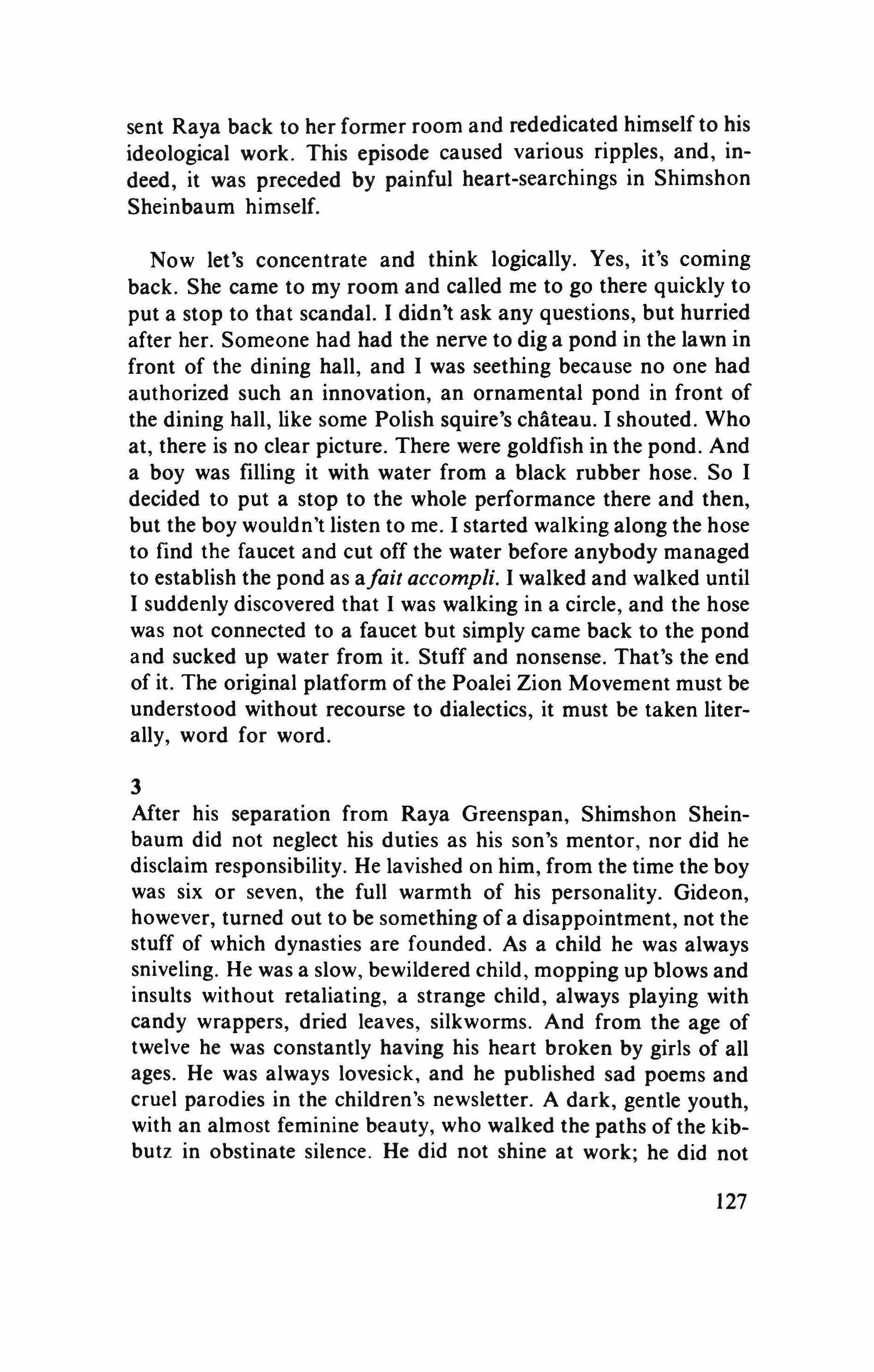
sent Raya back to her former room and rededicated himself to his ideological work. This episode caused various ripples, and, indeed, it was preceded by painful heart-searchings in Shimshon Sheinbaum himself.
Now let's concentrate and think logically. Yes, it's coming back. She came to my room and called me to go there quickly to put a stop to that scandal. I didn't ask any questions, but hurried after her. Someone had had the nerve to dig a pond in the lawn in front of the dining hall, and I was seething because no one had authorized such an innovation, an ornamental pond in front of the dining hall, like some Polish squire's chateau. I shouted. Who at, there is no clear picture. There were goldfish in the pond. And a boy was filling it with water from a black rubber hose. So I decided to put a stop to the whole performance there and then, but the boy wouldn't listen to me. I started walking along the hose to find the faucet and cut off the water before anybody managed to establish the pond as a/ail accompli. I walked and walked until I suddenly discovered that I was walking in a circle, and the hose was not connected to a faucet but simply came back to the pond and sucked up water from it. Stuff and nonsense. That's the end of it. The original platform of the Poalei Zion Movement must be understood without recourse to dialectics, it must be taken literally, word for word.
3
After his separation from Raya Greenspan, Shimshon Sheinbaum did not neglect his duties as his son's mentor, nor did he disclaim responsibility. He lavished on him, from the time the boy was six or seven, the full warmth of his personality. Gideon, however, turned out to be something of a disappointment, not the stuff of which dynasties are founded. As a child he was always sniveling. He was a slow, bewildered child, mopping up blows and insults without retaliating, a strange child, always playing with candy wrappers, dried leaves, silkworms. And from the age of twelve he was constantly having his heart broken by girls of all ages. He was always lovesick, and he published sad poems and cruel parodies in the children's newsletter. A dark, gentle youth, with an almost feminine beauty, who walked the paths of the kibbutz in obstinate silence. He did not shine at work; he did not
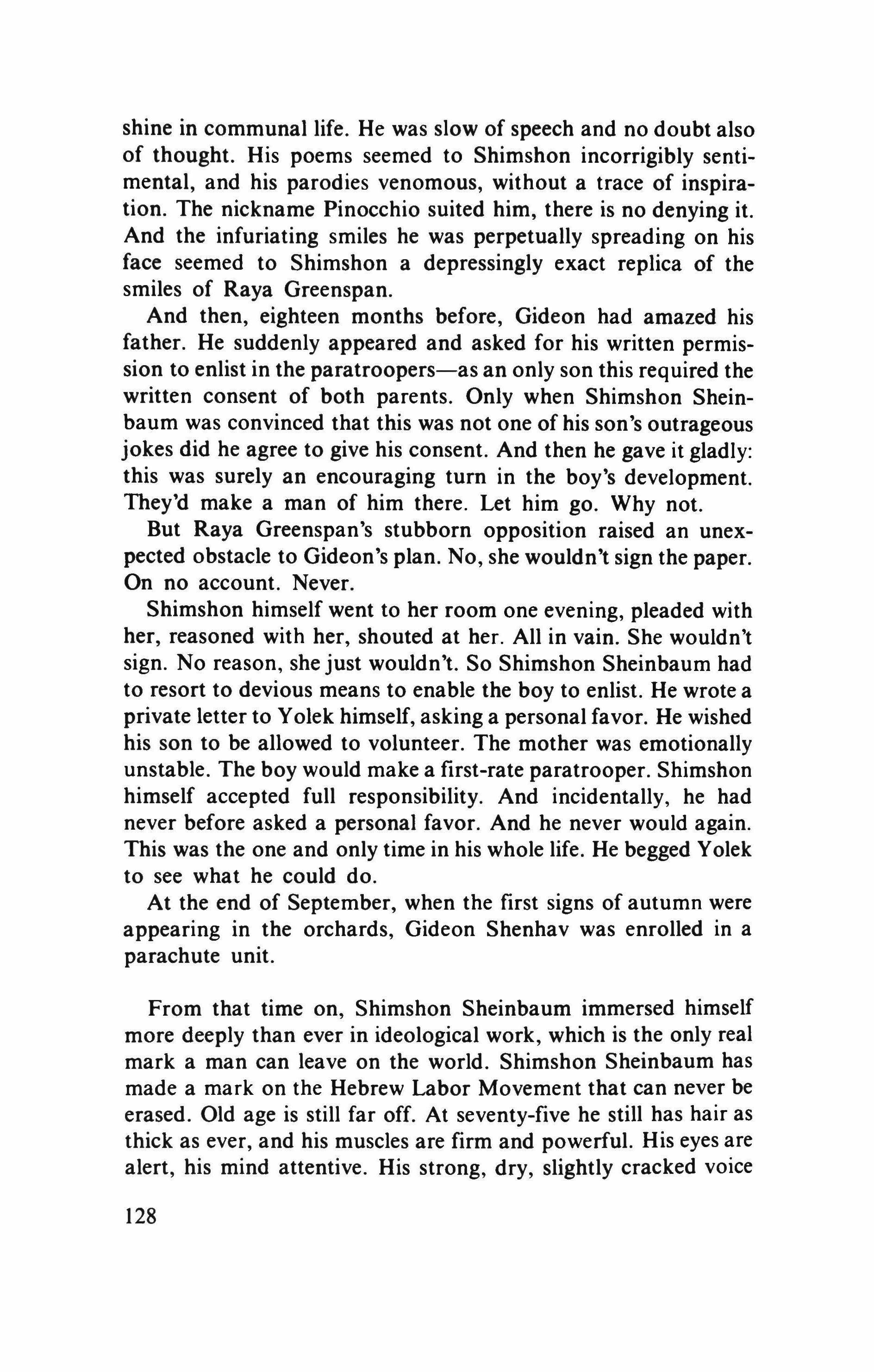
shine in communal life. He was slow of speech and no doubt also of thought. His poems seemed to Shimshon incorrigibly sentimental, and his parodies venomous, without a trace of inspiration. The nickname Pinocchio suited him, there is no denying it. And the infuriating smiles he was perpetually spreading on his face seemed to Shimshon a depressingly exact replica of the smiles of Raya Greenspan.
And then, eighteen months before, Gideon had amazed his father. He suddenly appeared and asked for his written permission to enlist in the paratroopers-as an only son this required the written consent of both parents. Only when Shimshon Sheinbaum was convinced that this was not one of his son's outrageous jokes did he agree to give his consent. And then he gave it gladly: this was surely an encouraging tum in the boy's development. They'd make a man of him there. Let him go. Why not.
But Raya Greenspan's stubborn opposition raised an unexpected obstacle to Gideon's plan. No, she wouldn't sign the paper. On no account. Never.
Shimshon himself went to her room one evening, pleaded with her, reasoned with her, shouted at her. All in vain. She wouldn't sign. No reason, she just wouldn't. So Shimshon Sheinbaum had to resort to devious means to enable the boy to enlist. He wrote a private letter to Yolek himself, asking a personal favor. He wished his son to be allowed to volunteer. The mother was emotionally unstable. The boy would make a first-rate paratrooper. Shimshon himself accepted full responsibility. And incidentally, he had never before asked a personal favor. And he never would again. This was the one and only time in his whole life. He begged Yolek to see what he could do.
At the end of September, when the first signs of autumn were appearing in the orchards, Gideon Shenhav was enrolled in a parachute unit.
From that time on, Shimshon Sheinbaum immersed himself more deeply than ever in ideological work, which is the only real mark a man can leave on the world. Shimshon Sheinbaum has made a mark on the Hebrew Labor Movement that can never be erased. Old age is still far off. At seventy-five he still has hair as thick as ever, and his muscles are firm and powerful. His eyes are alert, his mind attentive. His strong, dry, slightly cracked voice
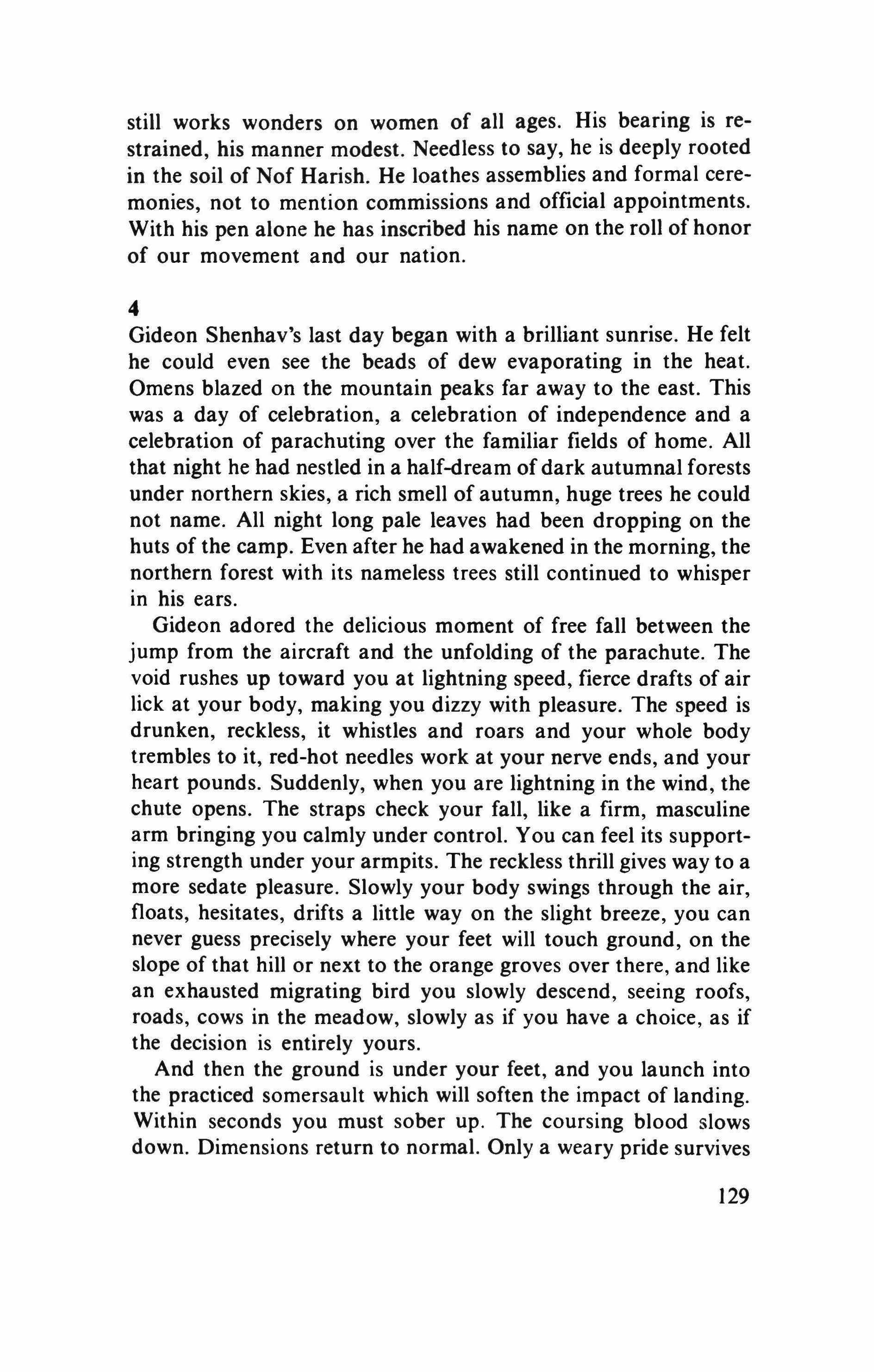
still works wonders on women of all ages. His bearing is restrained, his manner modest. Needless to say, he is deeply rooted in the soil of Nof Harish. He loathes assemblies and formal ceremonies, not to mention commissions and official appointments. With his pen alone he has inscribed his name on the roll of honor of our movement and our nation.
4
Gideon Shenhav's last day began with a brilliant sunrise. He felt he could even see the beads of dew evaporating in the heat. Omens blazed on the mountain peaks far away to the east. This was a day of celebration, a celebration of independence and a celebration of parachuting over the familiar fields of home. All that night he had nestled in a half-dream of dark autumnal forests under northern skies, a rich smell of autumn, huge trees he could not name. All night long pale leaves had been dropping on the huts of the camp. Even after he had awakened in the morning, the northern forest with its nameless trees still continued to whisper in his ears.
Gideon adored the delicious moment of free fall between the jump from the aircraft and the unfolding of the parachute. The void rushes up toward you at lightning speed, fierce drafts of air lick at your body, making you dizzy with pleasure. The speed is drunken, reckless, it whistles and roars and your whole body trembles to it, red-hot needles work at your nerve ends, and your heart pounds. Suddenly, when you are lightning in the wind, the chute opens. The straps check your fall, like a firm, masculine arm bringing you calmly under control. You can feel its supporting strength under your armpits. The reckless thrill gives way to a more sedate pleasure. Slowly your body swings through the air, floats, hesitates, drifts a little way on the slight breeze, you can never guess precisely where your feet will touch ground, on the slope of that hill or next to the orange groves over there, and like an exhausted migrating bird you slowly descend, seeing roofs, roads, cows in the meadow, slowly as if you have a choice, as if the decision is entirely yours.
And then the ground is under your feet, and you launch into the practiced somersault which will soften the impact of landing. Within seconds you must sober up. The coursing blood slows down. Dimensions return to normal. Only a weary pride survives
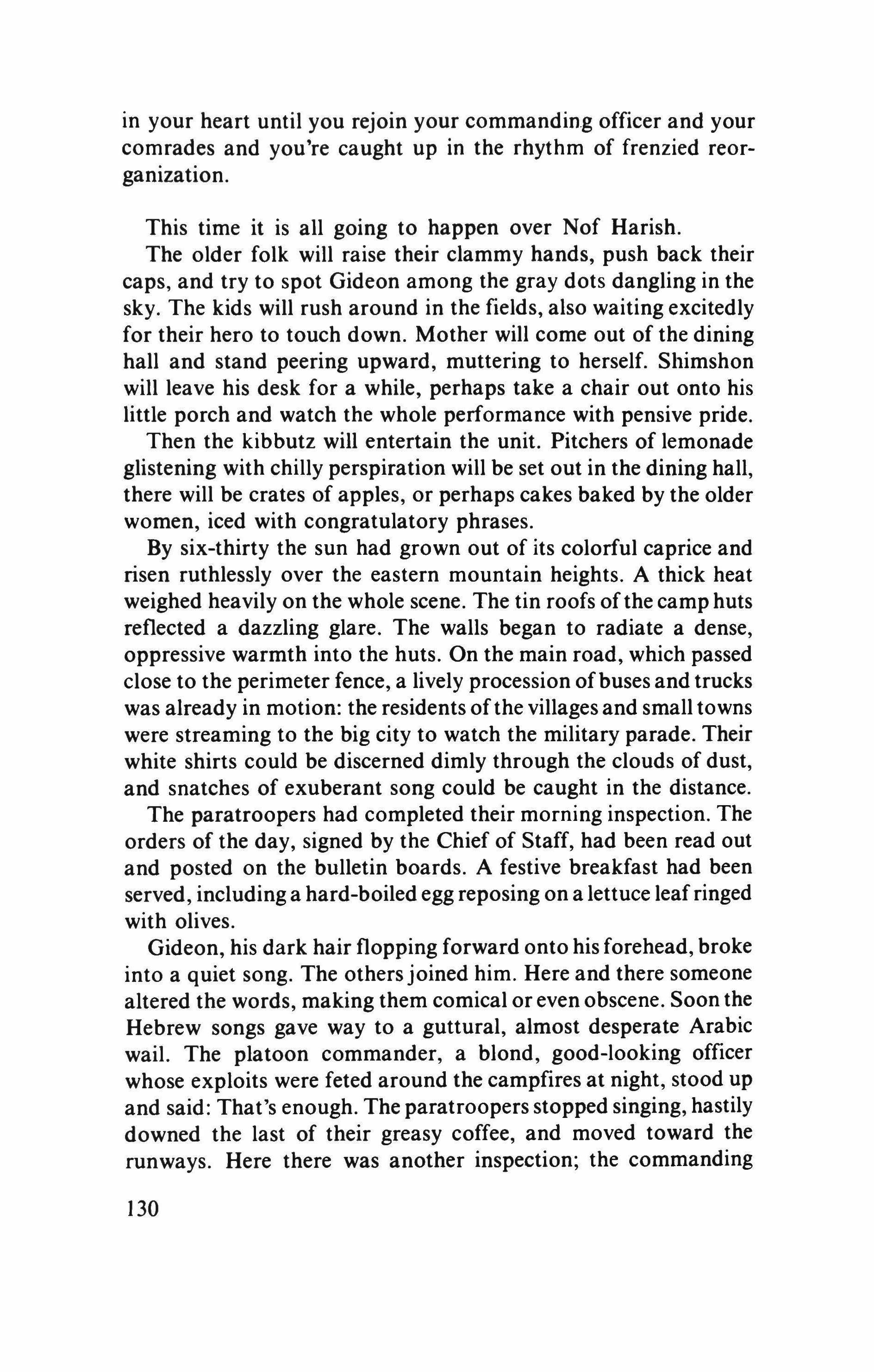
in your heart until you rejoin your commanding officer and your comrades and you're caught up in the rhythm of frenzied reorganization.
This time it is all going to happen over Nof Harish.
The older folk will raise their clammy hands, push back their caps, and try to spot Gideon among the gray dots dangling in the sky. The kids will rush around in the fields, also waiting excitedly for their hero to touch down. Mother will come out of the dining hall and stand peering upward, muttering to herself. Shimshon will leave his desk for a while, perhaps take a chair out onto his little porch and watch the whole performance with pensive pride.
Then the kibbutz will entertain the unit. Pitchers of lemonade glistening with chilly perspiration will be set out in the dining hall, there will be crates of apples, or perhaps cakes baked by the older women, iced with congratulatory phrases.
By six-thirty the sun had grown out of its colorful caprice and risen ruthlessly over the eastern mountain heights. A thick heat weighed heavily on the whole scene. The tin roofs ofthe camp huts reflected a dazzling glare. The walls began to radiate a dense, oppressive warmth into the huts. On the main road, which passed close to the perimeter fence, a lively procession ofbuses and trucks was already in motion: the residents ofthe villages and small towns were streaming to the big city to watch the military parade. Their white shirts could be discerned dimly through the clouds of dust, and snatches of exuberant song could be caught in the distance.
The paratroopers had completed their morning inspection. The orders of the day, signed by the Chief of Staff, had been read out and posted on the bulletin boards. A festive breakfast had been served, including a hard-boiled egg reposing on a lettuce leafringed with olives.
Gideon, his dark hair flopping forward onto his forehead, broke into a quiet song. The others joined him. Here and there someone altered the words, making them comical or even obscene. Soon the Hebrew songs gave way to a guttural, almost desperate Arabic wail. The platoon commander, a blond, good-looking officer whose exploits were feted around the campfires at night, stood up and said: That's enough. The paratroopers stopped singing, hastily downed the last of their greasy coffee, and moved toward the runways. Here there was another inspection; the commanding
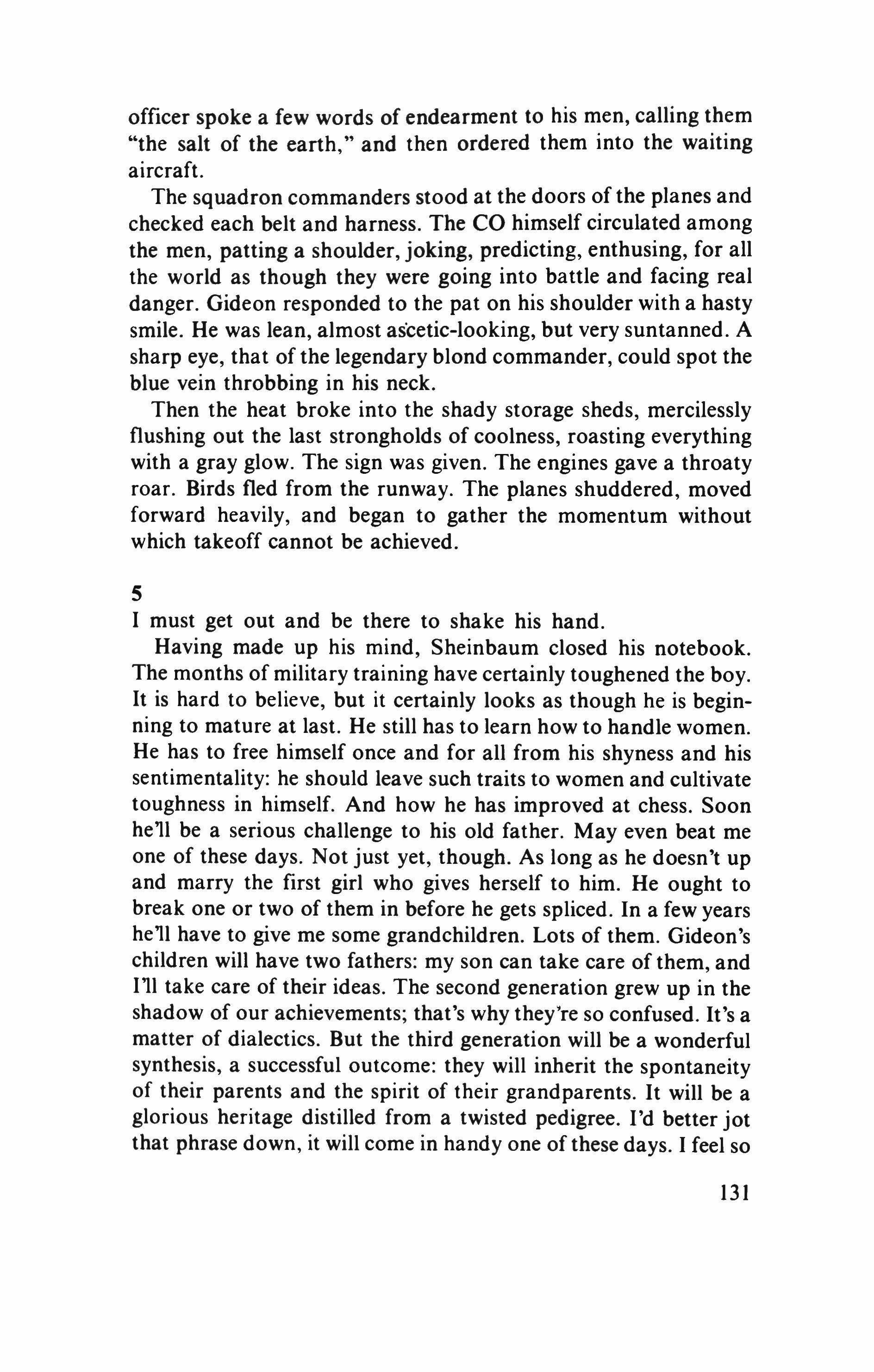
officer spoke a few words of endearment to his men, calling them "the salt of the earth," and then ordered them into the waiting aircraft.
The squadron commanders stood at the doors of the planes and checked each belt and harness. The CO himself circulated among the men, patting a shoulder, joking, predicting, enthusing, for all the world as though they were going into battle and facing real danger. Gideon responded to the pat on his shoulder with a hasty smile. He was lean, almost ascetic-looking, but very suntanned. A sharp eye, that of the legendary blond commander, could spot the blue vein throbbing in his neck.
Then the heat broke into the shady storage sheds, mercilessly flushing out the last strongholds of coolness, roasting everything with a gray glow. The sign was given. The engines gave a throaty roar. Birds fled from the runway. The planes shuddered, moved forward heavily, and began to gather the momentum without which takeoff cannot be achieved.
5
I must get out and be there to shake his hand.
Having made up his mind, Sheinbaum closed his notebook. The months of military training have certainly toughened the boy. It is hard to believe, but it certainly looks as though he is beginning to mature at last. He still has to learn how to handle women. He has to free himself once and for all from his shyness and his sentimentality: he should leave such traits to women and cultivate toughness in himself. And how he has improved at chess. Soon he'll be a serious challenge to his old father. May even beat me one of these days. Not just yet, though. As long as he doesn't up and marry the first girl who gives herself to him. He ought to break one or two of them in before he gets spliced. In a few years he'll have to give me some grandchildren. Lots of them. Gideon's children will have two fathers: my son can take care of them, and 111 take care of their ideas. The second generation grew up in the shadow of our achievements; that's why they're so confused. It's a matter of dialectics. But the third generation will be a wonderful synthesis, a successful outcome: they will inherit the spontaneity of their parents and the spirit of their grandparents. It will be a glorious heritage distilled from a twisted pedigree. I'd better jot that phrase down, it will come in handy one of these days. I feel so
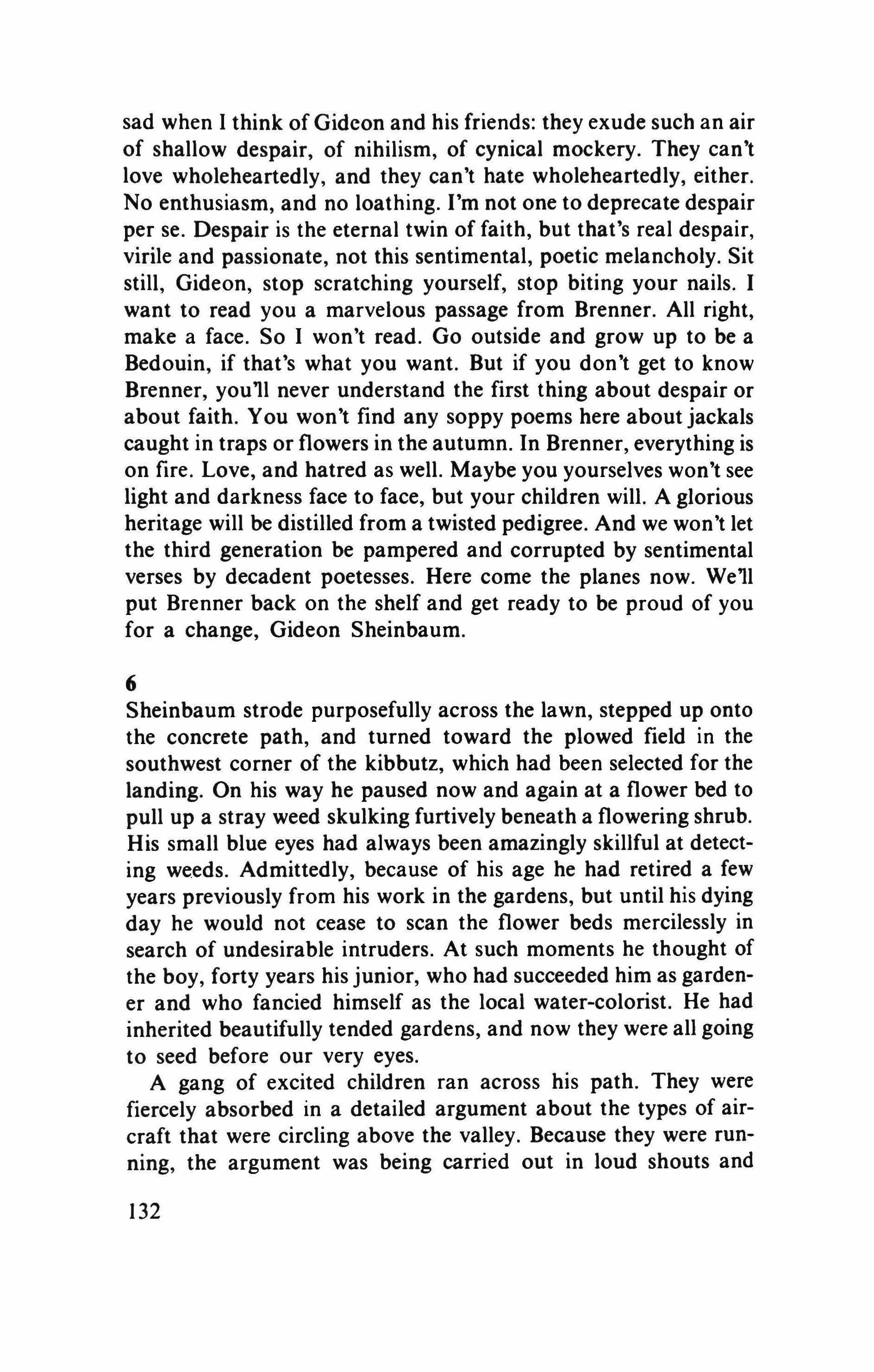
sad when I think of Gideon and his friends: they exude such an air of shallow despair, of nihilism, of cynical mockery. They can't love wholeheartedly, and they can't hate wholeheartedly, either. No enthusiasm, and no loathing. I'm not one to deprecate despair per se. Despair is the eternal twin of faith, but that's real despair, virile and passionate, not this sentimental, poetic melancholy. Sit still, Gideon, stop scratching yourself, stop biting your nails. I want to read you a marvelous passage from Brenner. All right, make a face. So I won't read. Go outside and grow up to be a Bedouin, if that's what you want. But if you don't get to know Brenner, you'll never understand the first thing about despair or about faith. You won't find any soppy poems here about jackals caught in traps or flowers in the autumn. In Brenner, everything is on fire. Love, and hatred as well. Maybe you yourselves won't see light and darkness face to face, but your children will. A glorious heritage will be distilled from a twisted pedigree. And we won't let the third generation be pampered and corrupted by sentimental verses by decadent poetesses. Here come the planes now. We'll put Brenner back on the shelf and get ready to be proud of you for a change, Gideon Sheinbaum.
6
Sheinbaum strode purposefully across the lawn, stepped up onto the concrete path, and turned toward the plowed field in the southwest corner of the kibbutz, which had been selected for the landing. On his way he paused now and again at a flower bed to pull up a stray weed skulking furtively beneath a flowering shrub. His small blue eyes had always been amazingly skillful at detecting weeds. Admittedly, because of his age he had retired a few years previously from his work in the gardens, but until his dying day he would not cease to scan the flower beds mercilessly in search of undesirable intruders. At such moments he thought of the boy, forty years his junior, who had succeeded him as gardener and who fancied himself as the local water-colorist. He had inherited beautifully tended gardens, and now they were all going to seed before our very eyes.
A gang of excited children ran across his path. They were fiercely absorbed in a detailed argument about the types of aircraft that were circling above the valley. Because they were running, the argument was being carried out in loud shouts and
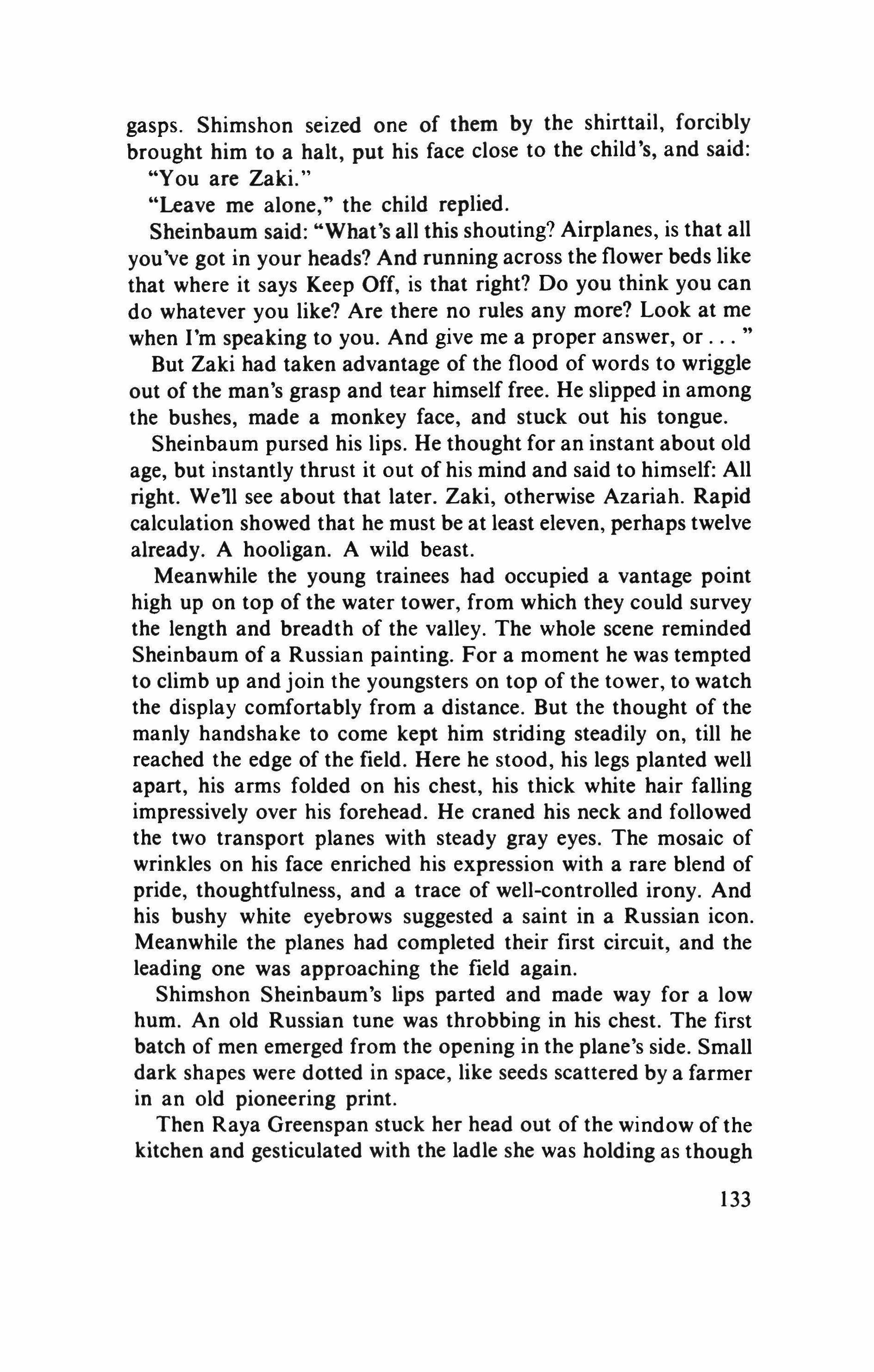
gasps. Shimshon seized one of them by the shirttail, forcibly brought him to a halt, put his face close to the child's, and said: "You are Zaki."
"Leave me alone," the child replied.
Sheinbaum said: "What's all this shouting? Airplanes, is that all you've got in your heads? And running across the flower beds like that where it says Keep Off, is that right? Do you think you can do whatever you like? Are there no rules any more? Look at me when I'm speaking to you. And give me a proper answer, or
But Zaki had taken advantage of the flood of words to wriggle out of the man's grasp and tear himself free. He slipped in among the bushes, made a monkey face, and stuck out his tongue.
Sheinbaum pursed his lips. He thought for an instant about old age, but instantly thrust it out of his mind and said to himself: All right. We'll see about that later. Zaki, otherwise Azariah. Rapid calculation showed that he must be at least eleven, perhaps twelve already. A hooligan. A wild beast.
Meanwhile the young trainees had occupied a vantage point high up on top of the water tower, from which they could survey the length and breadth of the valley. The whole scene reminded Sheinbaum of a Russian painting. For a moment he was tempted to climb up and join the youngsters on top of the tower, to watch the display comfortably from a distance. But the thought of the manly handshake to come kept him striding steadily on, till he reached the edge of the field. Here he stood, his legs planted well apart, his arms folded on his chest, his thick white hair falling impressively over his forehead. He craned his neck and followed the two transport planes with steady gray eyes. The mosaic of wrinkles on his face enriched his expression with a rare blend of pride, thoughtfulness, and a trace of well-controlled irony. And his bushy white eyebrows suggested a saint in a Russian icon. Meanwhile the planes had completed their first circuit, and the leading one was approaching the field again.
Shimshon Sheinbaum's lips parted and made way for a low hum. An old Russian tune was throbbing in his chest. The first batch of men emerged from the opening in the plane's side. Small dark shapes were dotted in space, like seeds scattered by a farmer in an old pioneering print.
Then Raya Greenspan stuck her head out of the window of the kitchen and gesticulated with the ladle she was holding as though
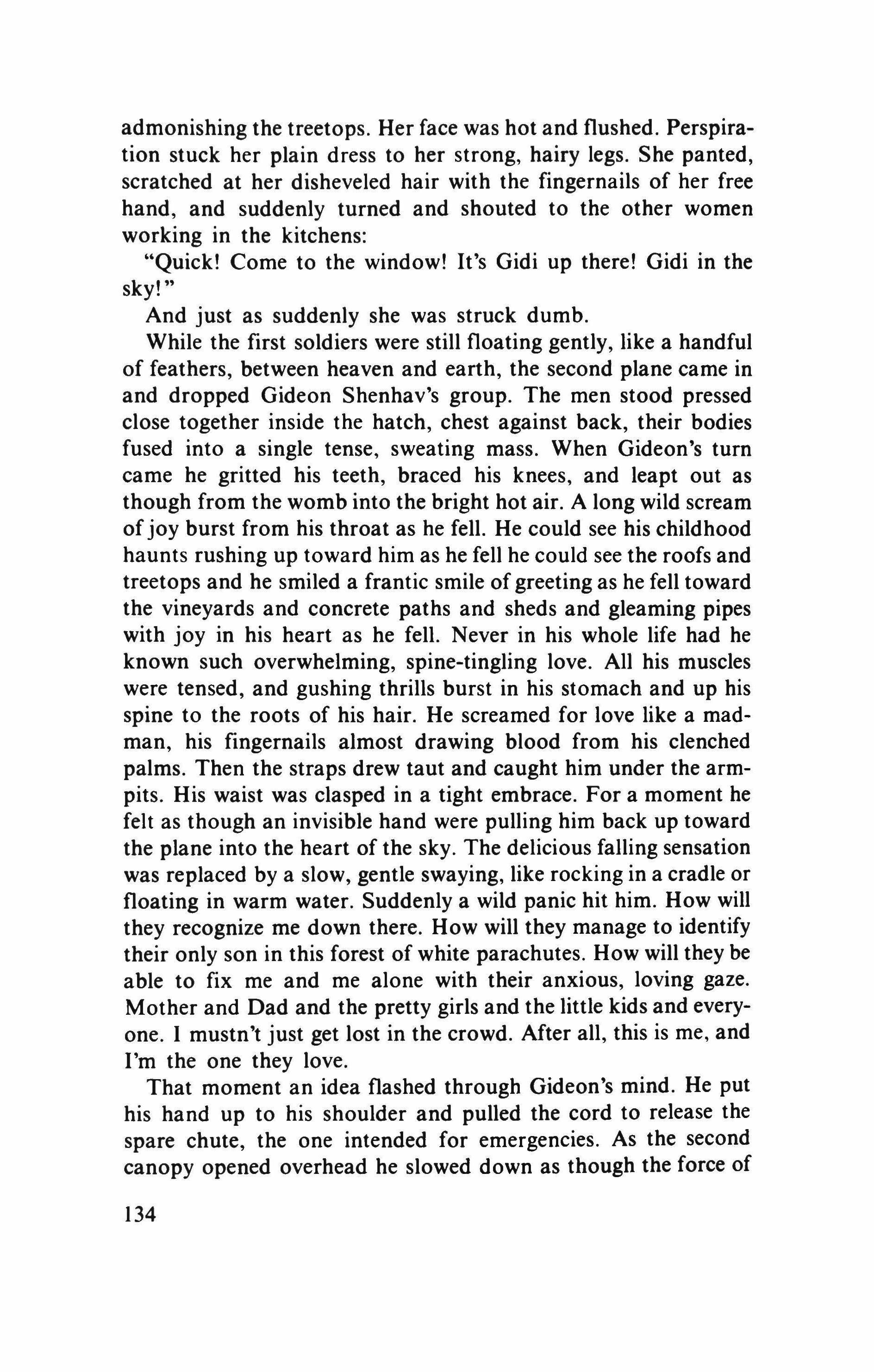
admonishing the treetops. Her face was hot and flushed. Perspiration stuck her plain dress to her strong, hairy legs. She panted, scratched at her disheveled hair with the fingernails of her free hand, and suddenly turned and shouted to the other women working in the kitchens:
"Quick! Come to the window! It's Gidi up there! Gidi in the sky! "
And just as suddenly she was struck dumb. While the first soldiers were still floating gently, like a handful of feathers, between heaven and earth, the second plane came in and dropped Gideon Shenhav's group. The men stood pressed close together inside the hatch, chest against back, their bodies fused into a single tense, sweating mass. When Gideon's turn came he gritted his teeth, braced his knees, and leapt out as though from the womb into the bright hot air. A long wild scream ofjoy burst from his throat as he fell. He could see his childhood haunts rushing up toward him as he fell he could see the roofs and treetops and he smiled a frantic smile of greeting as he fell toward the vineyards and concrete paths and sheds and gleaming pipes with joy in his heart as he fell. Never in his whole life had he known such overwhelming, spine-tingling love. All his muscles were tensed, and gushing thrills burst in his stomach and up his spine to the roots of his hair. He screamed for love like a madman, his fingernails almost drawing blood from his clenched palms. Then the straps drew taut and caught him under the armpits. His waist was clasped in a tight embrace. For a moment he felt as though an invisible hand were pulling him back up toward the plane into the heart of the sky. The delicious falling sensation was replaced by a slow, gentle swaying, like rocking in a cradle or floating in warm water. Suddenly a wild panic hit him. How will they recognize me down there. How will they manage to identify their only son in this forest of white parachutes. How will they be able to fix me and me alone with their anxious, loving gaze. Mother and Dad and the pretty girls and the little kids and everyone. I mustn't just get lost in the crowd. After all, this is me, and I'm the one they love.
That moment an idea flashed through Gideon's mind. He put his hand up to his shoulder and pulled the cord to release the spare chute, the one intended for emergencies. As the second canopy opened overhead he slowed down as though the force of
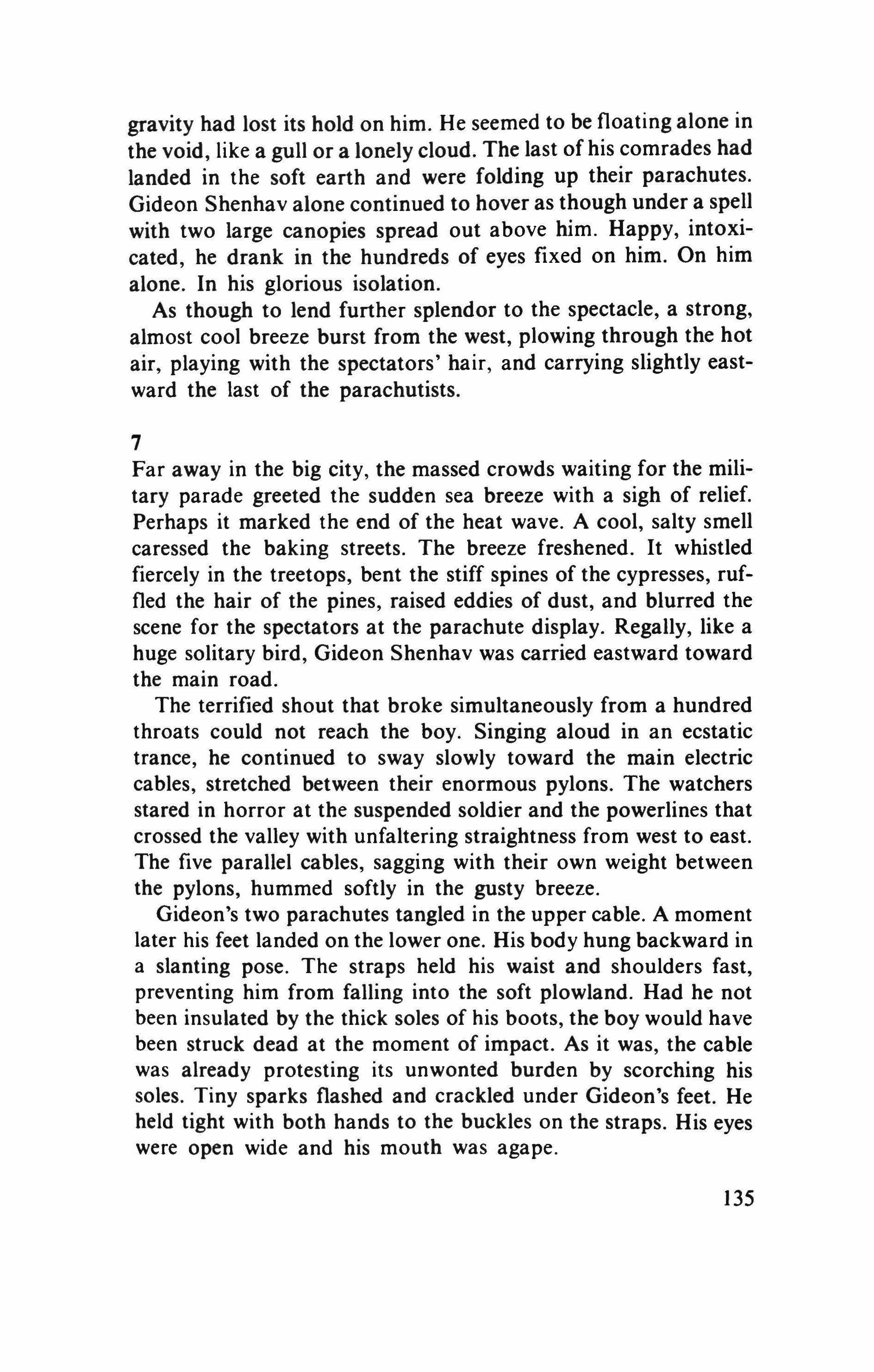
gravity had lost its hold on him. He seemed to be floating alone in the void, like a gull or a lonely cloud. The last of his comrades had landed in the soft earth and were folding up their parachutes.
Gideon Shenhav alone continued to hover as though under a spell with two large canopies spread out above him. Happy, intoxicated, he drank in the hundreds of eyes fixed on him. On him alone. In his glorious isolation.
As though to lend further splendor to the spectacle, a strong, almost cool breeze burst from the west, plowing through the hot air, playing with the spectators' hair, and carrying slightly eastward the last of the parachutists.
7
Far away in the big city, the massed crowds waiting for the military parade greeted the sudden sea breeze with a sigh of relief. Perhaps it marked the end of the heat wave. A cool, salty smell caressed the baking streets. The breeze freshened. It whistled fiercely in the treetops, bent the stiff spines of the cypresses, ruffled the hair of the pines, raised eddies of dust, and blurred the scene for the spectators at the parachute display. Regally, like a huge solitary bird, Gideon Shenhav was carried eastward toward the main road.
The terrified shout that broke simultaneously from a hundred throats could not reach the boy. Singing aloud in an ecstatic trance, he continued to sway slowly toward the main electric cables, stretched between their enormous pylons. The watchers stared in horror at the suspended soldier and the powerlines that crossed the valley with unfaltering straightness from west to east. The five parallel cables, sagging with their own weight between the pylons, hummed softly in the gusty breeze.
Gideon's two parachutes tangled in the upper cable. A moment later his feet landed on the lower one. His body hung backward in a slanting pose. The straps held his waist and shoulders fast, preventing him from falling into the soft plowland. Had he not been insulated by the thick soles of his boots, the boy would have been struck dead at the moment of impact. As it was, the cable was already protesting its unwonted burden by scorching his soles. Tiny sparks flashed and crackled under Gideon's feet. He held tight with both hands to the buckles on the straps. His eyes were open wide and his mouth was agape.
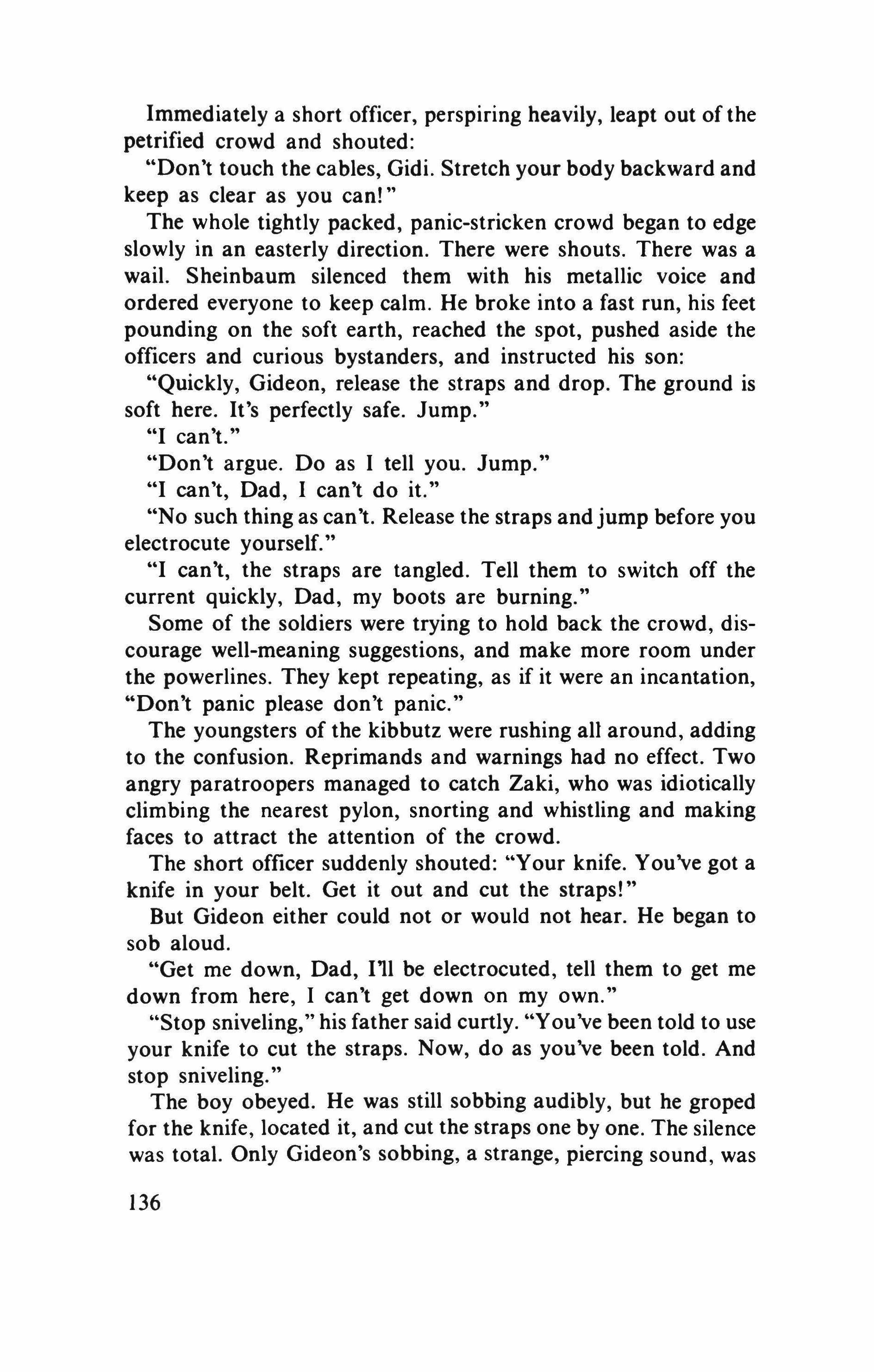
Immediately a short officer, perspiring heavily, leapt out ofthe petrified crowd and shouted:
"Don't touch the cables, Gidi. Stretch your body backward and keep as clear as you can!"
The whole tightly packed, panic-stricken crowd began to edge slowly in an easterly direction. There were shouts. There was a wail. Sheinbaum silenced them with his metallic voice and ordered everyone to keep calm. He broke into a fast run, his feet pounding on the soft earth, reached the spot, pushed aside the officers and curious bystanders, and instructed his son:
"Quickly, Gideon, release the straps and drop. The ground is soft here. It's perfectly safe. Jump."
"I can't."
"Don't argue. Do as I tell you. Jump."
"I can't, Dad, I can't do it."
"No such thing as can't. Release the straps and jump before you electrocute yourself."
"I can't, the straps are tangled. Tell them to switch off the current quickly, Dad, my boots are burning."
Some of the soldiers were trying to hold back the crowd, discourage well-meaning suggestions, and make more room under the powerlines. They kept repeating, as if it were an incantation, "Don't panic please don't panic."
The youngsters of the kibbutz were rushing all around, adding to the confusion. Reprimands and warnings had no effect. Two angry paratroopers managed to catch Zaki, who was idiotically climbing the nearest pylon, snorting and whistling and making faces to attract the attention of the crowd.
The short officer suddenly shouted: "Your knife. You've got a knife in your belt. Get it out and cut the straps!"
But Gideon either could not or would not hear. He began to sob aloud.
"Get me down, Dad, 111 be electrocuted, tell them to get me down from here, I can't get down on my own."
"Stop sniveling," his father said curtly. "You've been told to use your knife to cut the straps. Now, do as you've been told. And stop sniveling."
The boy obeyed. He was still sobbing audibly, but he groped for the knife, located it, and cut the straps one by one. The silence was total. Only Gideon's sobbing, a strange, piercing sound, was
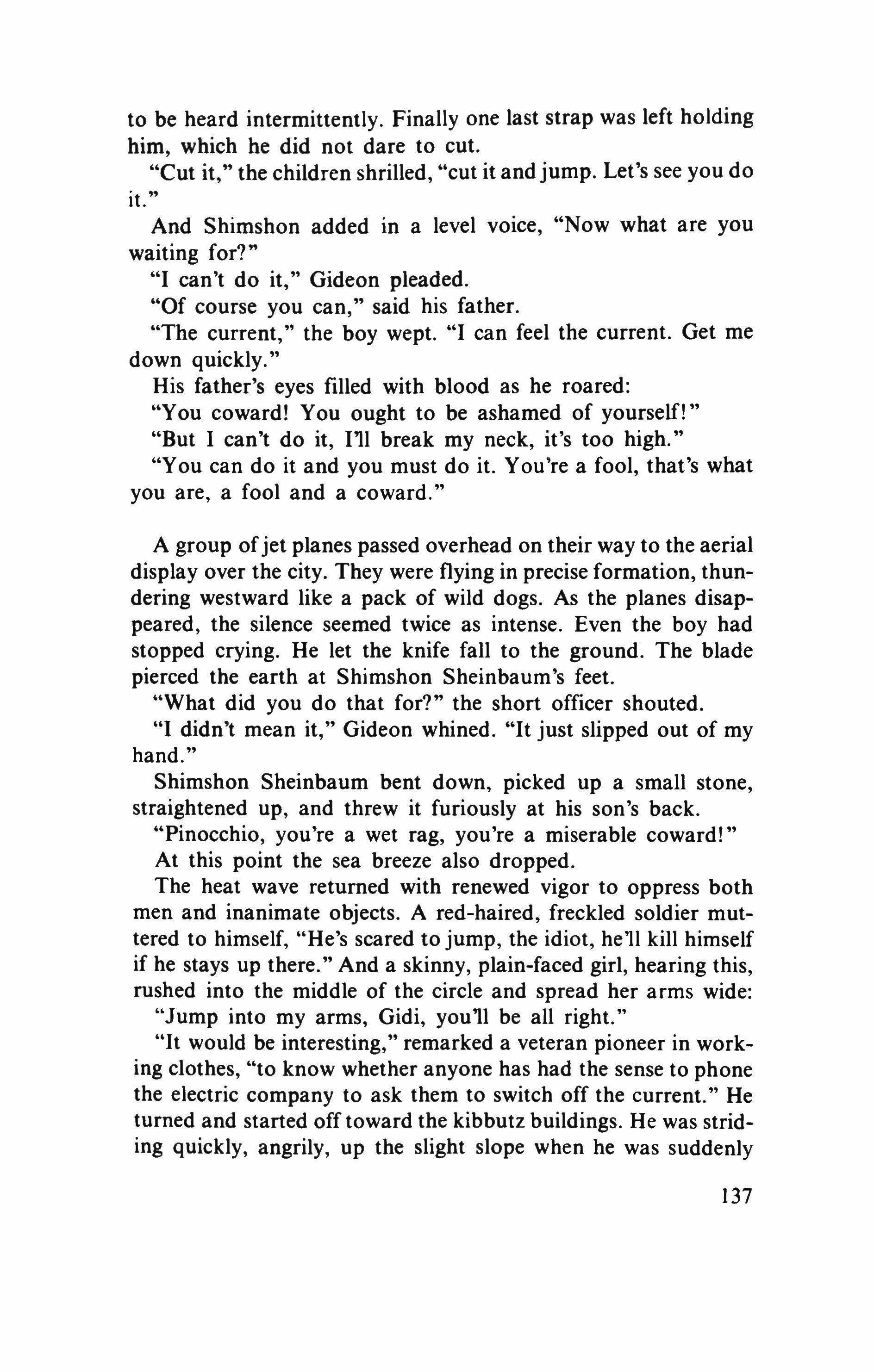
to be heard intermittently. Finally one last strap was left holding him, which he did not dare to cut.
"Cut it," the children shrilled, "cut it and jump. Let's see you do it. "
And Shimshon added in a level voice, "Now what are you waiting for?"
"I can't do it," Gideon pleaded.
"Of course you can," said his father.
"The current," the boy wept. "I can feel the current. Get me down quickly."
His father's eyes filled with blood as he roared:
"You coward! You ought to be ashamed of yourself!"
"But I can't do it, I'll break my neck, it's too high."
"You can do it and you must do it. You're a fool, that's what you are, a fool and a coward."
A group ofjet planes passed overhead on their way to the aerial display over the city. They were flying in precise formation, thundering westward like a pack of wild dogs. As the planes disappeared, the silence seemed twice as intense. Even the boy had stopped crying. He let the knife fall to the ground. The blade pierced the earth at Shimshon Sheinbaum's feet.
"What did you do that for?" the short officer shouted.
"I didn't mean it," Gideon whined. "It just slipped out of my hand."
Shimshon Sheinbaum bent down, picked up a small stone, straightened up, and threw it furiously at his son's back.
"Pinocchio, you're a wet rag, you're a miserable coward!"
At this point the sea breeze also dropped.
The heat wave returned with renewed vigor to oppress both men and inanimate objects. A red-haired, freckled soldier muttered to himself, "He's scared to jump, the idiot, hell kill himself if he stays up there." And a skinny, plain-faced girl, hearing this, rushed into the middle of the circle and spread her arms wide:
"Jump into my arms, Gidi, you'll be all right."
"It would be interesting," remarked a veteran pioneer in working clothes, "to know whether anyone has had the sense to phone the electric company to ask them to switch off the current." He turned and started off toward the kibbutz buildings. He was striding quickly, angrily, up the slight slope when he was suddenly
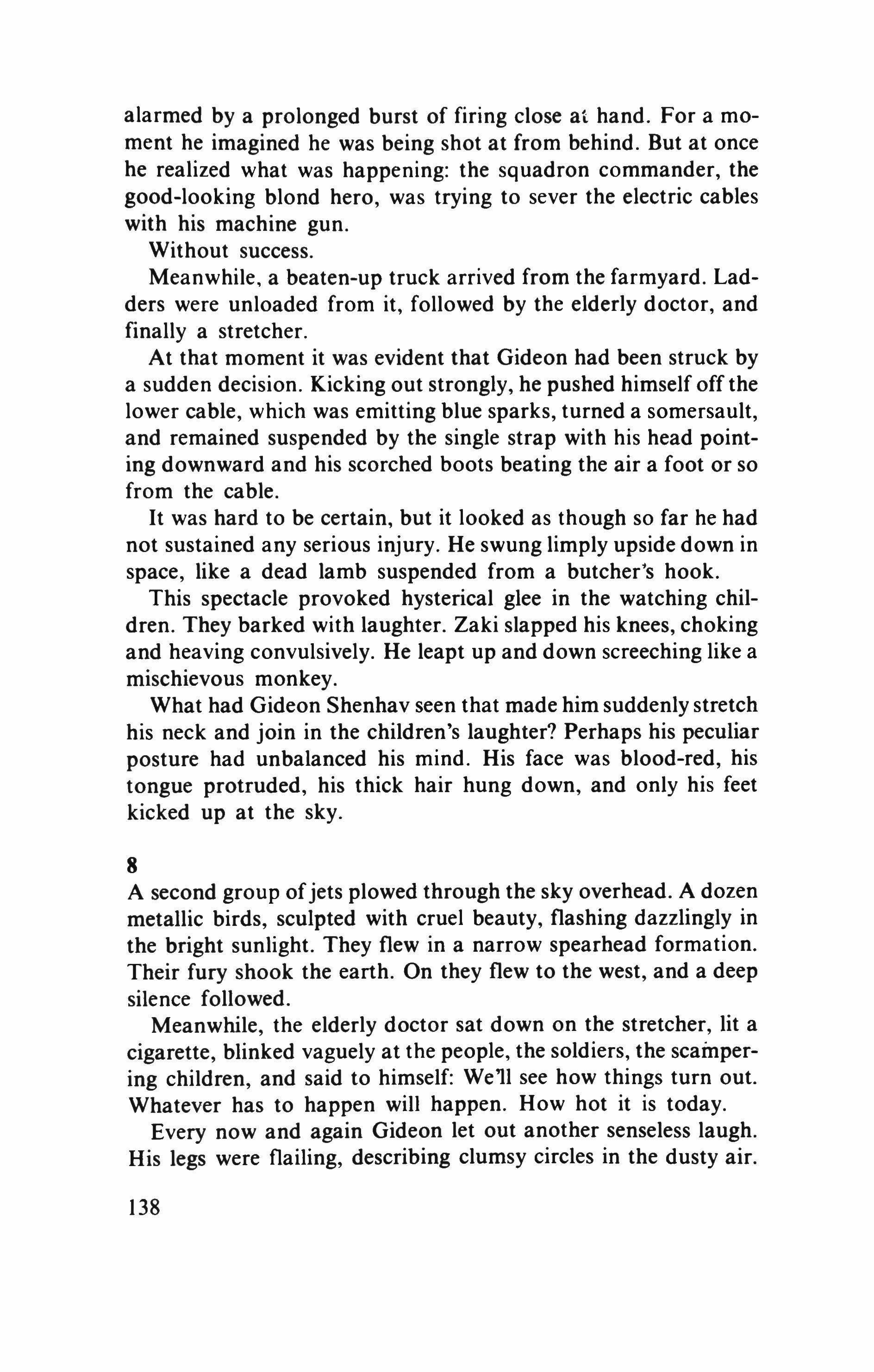
alarmed by a prolonged burst of firing close at hand. For a moment he imagined he was being shot at from behind. But at once he realized what was happening: the squadron commander, the good-looking blond hero, was trying to sever the electric cables with his machine gun.
Without success.
Meanwhile, a beaten-up truck arrived from the farmyard. Ladders were unloaded from it, followed by the elderly doctor, and finally a stretcher.
At that moment it was evident that Gideon had been struck by a sudden decision. Kicking out strongly, he pushed himself offthe lower cable, which was emitting blue sparks, turned a somersault, and remained suspended by the single strap with his head pointing downward and his scorched boots beating the air a foot or so from the cable.
It was hard to be certain, but it looked as though so far he had not sustained any serious injury. He swung limply upside down in space, like a dead lamb suspended from a butcher's hook.
This spectacle provoked hysterical glee in the watching children. They barked with laughter. Zaki slapped his knees, choking and heaving convulsively. He leapt up and down screeching like a mischievous monkey.
What had Gideon Shenhav seen that made him suddenly stretch his neck and join in the children's laughter? Perhaps his peculiar posture had unbalanced his mind. His face was blood-red, his tongue protruded, his thick hair hung down, and only his feet kicked up at the sky.
8
A second group ofjets plowed through the sky overhead. A dozen metallic birds, sculpted with cruel beauty, flashing dazzlingly in the bright sunlight. They flew in a narrow spearhead formation. Their fury shook the earth. On they flew to the west, and a deep silence followed.
Meanwhile, the elderly doctor sat down on the stretcher, lit a cigarette, blinked vaguely at the people, the soldiers, the scampering children, and said to himself: We'll see how things turn out. Whatever has to happen will happen. How hot it is today. Every now and again Gideon let out another senseless laugh. His legs were flailing, describing clumsy circles in the dusty air.
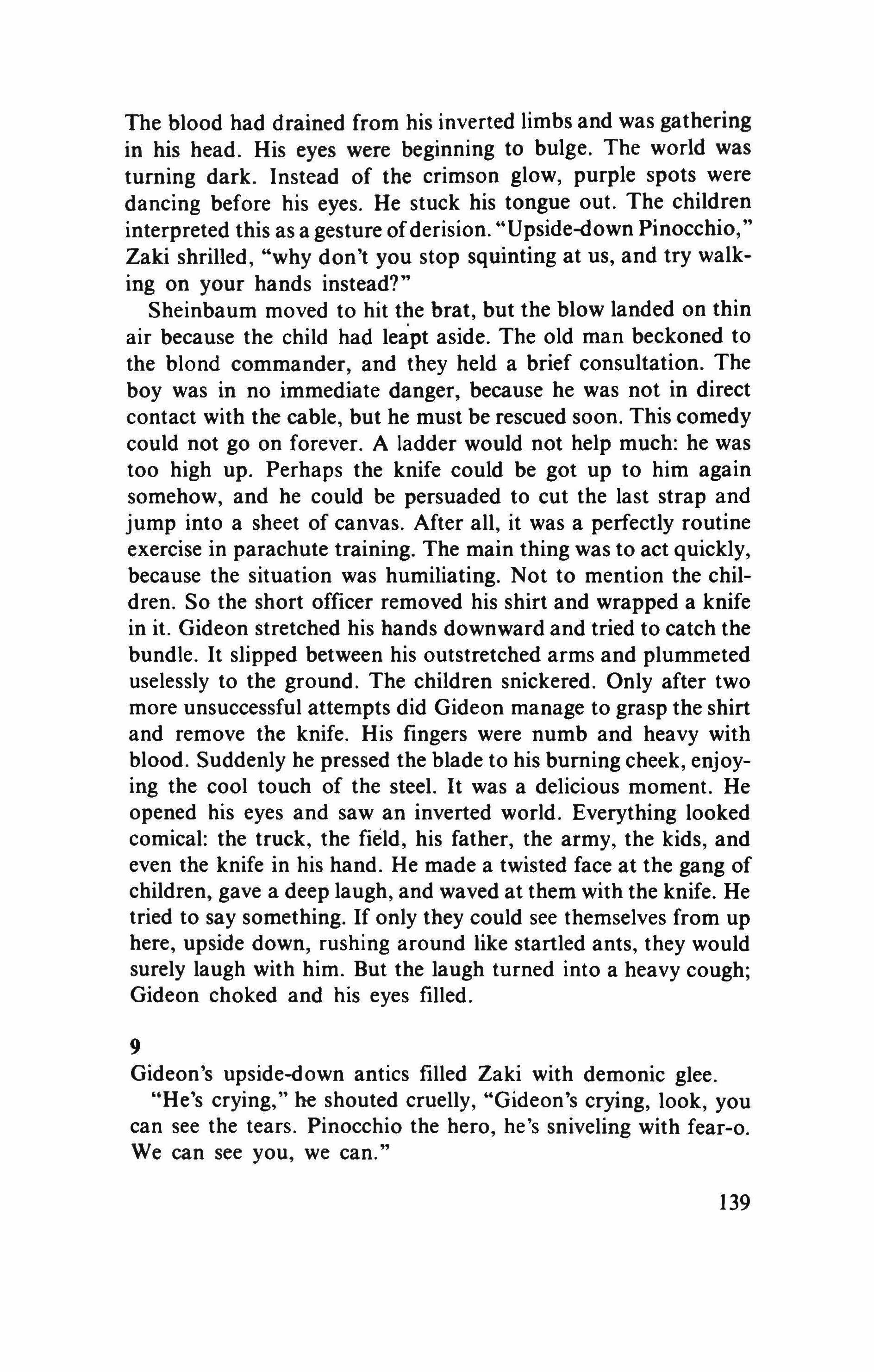
The blood had drained from his inverted limbs and was gathering in his head. His eyes were beginning to bulge. The world was turning dark. Instead of the crimson glow, purple spots were dancing before his eyes. He stuck his tongue out. The children interpreted this as a gesture ofderision. "Upside-down Pinocchio," Zaki shrilled, "why don't you stop squinting at us, and try walking on your hands instead?"
Sheinbaum moved to hit the brat, but the blow landed on thin air because the child had leapt aside. The old man beckoned to the blond commander, and they held a brief consultation. The boy was in no immediate danger, because he was not in direct contact with the cable, but he must be rescued soon. This comedy could not go on forever. A ladder would not help much: he was too high up. Perhaps the knife could be got up to him again somehow, and he could be persuaded to cut the last strap and jump into a sheet of canvas. After all, it was a perfectly routine exercise in parachute training. The main thing was to act quickly, because the situation was humiliating. Not to mention the children. So the short officer removed his shirt and wrapped a knife in it. Gideon stretched his hands downward and tried to catch the bundle. It slipped between his outstretched arms and plummeted uselessly to the ground. The children snickered. Only after two more unsuccessful attempts did Gideon manage to grasp the shirt and remove the knife. His fingers were numb and heavy with blood. Suddenly he pressed the blade to his burning cheek, enjoying the cool touch of the steel. It was a delicious moment. He opened his eyes and saw an inverted world. Everything looked comical: the truck, the field, his father, the army, the kids, and even the knife in his hand. He made a twisted face at the gang of children, gave a deep laugh, and waved at them with the knife. He tried to say something. If only they could see themselves from up here, upside down, rushing around like startled ants, they would surely laugh with him. But the laugh turned into a heavy cough; Gideon choked and his eyes filled.
9
Gideon's upside-down antics filled Zaki with demonic glee. "He's crying," he shouted cruelly, "Gideon's crying, look, you can see the tears. Pinocchio the hero, he's sniveling with fear-o, We can see you, we can."
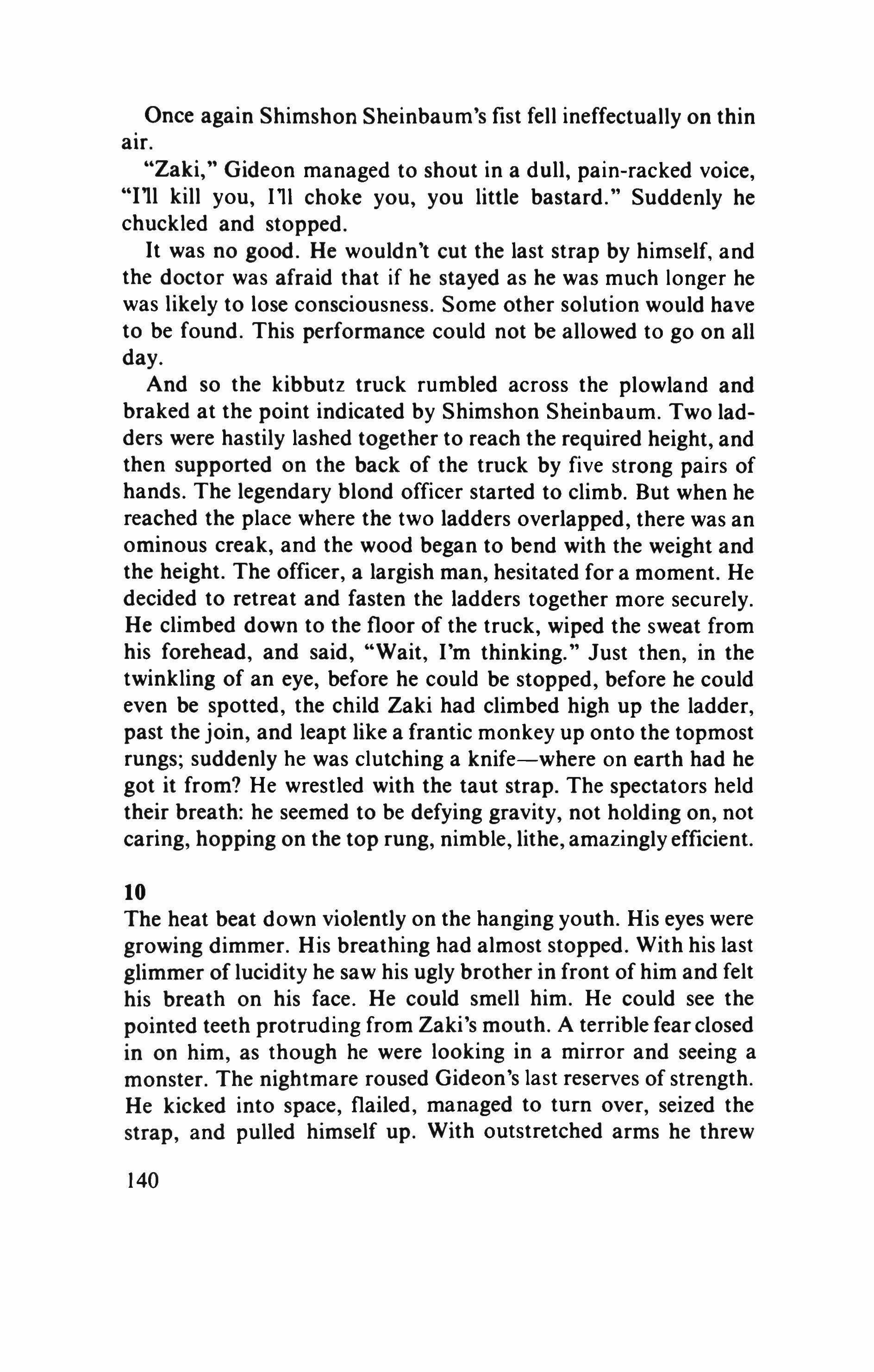
Once again Shimshon Sheinbaum's fist fell ineffectually on thin air.
"Zaki," Gideon managed to shout in a dull, pain-racked voice, "111 kill you, 111 choke you, you little bastard." Suddenly he chuckled and stopped.
It was no good. He wouldn't cut the last strap by himself, and the doctor was afraid that if he stayed as he was much longer he was likely to lose consciousness. Some other solution would have to be found. This performance could not be allowed to go on all day.
And so the kibbutz truck rumbled across the plowland and braked at the point indicated by Shimshon Sheinbaum. Two ladders were hastily lashed together to reach the required height, and then supported on the back of the truck by five strong pairs of hands. The legendary blond officer started to climb. But when he reached the place where the two ladders overlapped, there was an ominous creak, and the wood began to bend with the weight and the height. The officer, a largish man, hesitated for a moment. He decided to retreat and fasten the ladders together more securely. He climbed down to the floor of the truck, wiped the sweat from his forehead, and said, "Wait, I'm thinking." Just then, in the twinkling of an eye, before he could be stopped, before he could even be spotted, the child Zaki had climbed high up the ladder, past the join, and leapt like a frantic monkey up onto the topmost rungs; suddenly he was clutching a knife-where on earth had he got it from? He wrestled with the taut strap. The spectators held their breath: he seemed to be defying gravity, not holding on, not caring, hopping on the top rung, nimble, lithe, amazingly efficient.
10
The heat beat down violently on the hanging youth. His eyes were growing dimmer. His breathing had almost stopped. With his last glimmer of lucidity he saw his ugly brother in front of him and felt his breath on his face. He could smell him. He could see the pointed teeth protruding from Zaki's mouth. A terrible fear closed in on him, as though he were looking in a mirror and seeing a monster. The nightmare roused Gideon's last reserves of strength. He kicked into space, flailed, managed to turn over, seized the strap, and pulled himself up. With outstretched arms he threw
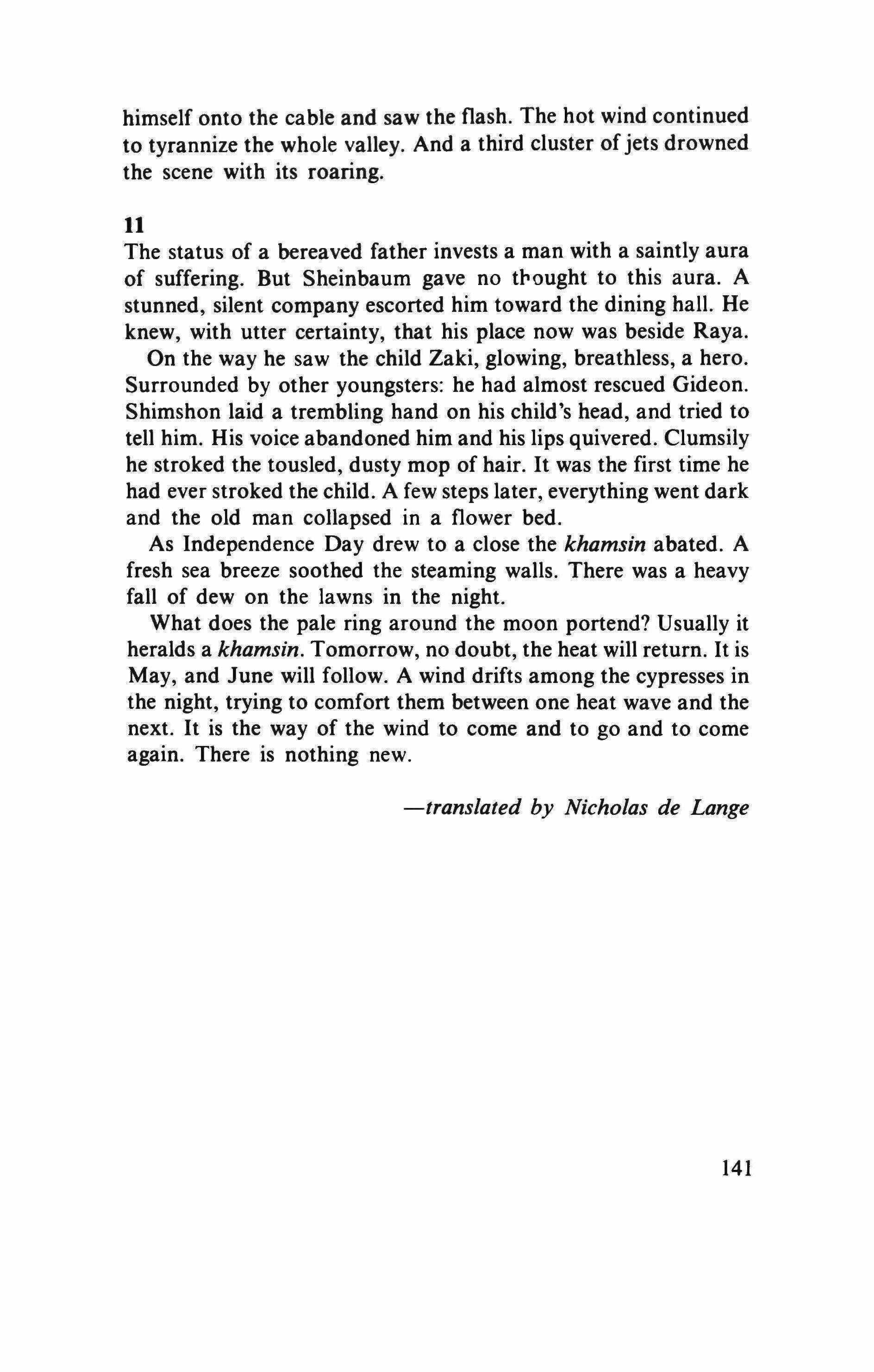
himself onto the cable and saw the flash. The hot wind continued to tyrannize the whole valley. And a third cluster ofjets drowned the scene with its roaring.
11
The status of a bereaved father invests a man with a saintly aura of suffering. But Sheinbaum gave no thought to this aura. A stunned, silent company escorted him toward the dining hall. He knew, with utter certainty, that his place now was beside Raya.
On the way he saw the child Zaki, glowing, breathless, a hero. Surrounded by other youngsters: he had almost rescued Gideon. Shimshon laid a trembling hand on his child's head, and tried to tell him. His voice abandoned him and his lips quivered. Clumsily he stroked the tousled, dusty mop of hair. It was the first time he had ever stroked the child. A few steps later, everything went dark and the old man collapsed in a flower bed.
As Independence Day drew to a close the khamsin abated. A fresh sea breeze soothed the steaming walls. There was a heavy fall of dew on the lawns in the night.
What does the pale ring around the moon portend? Usually it heralds a khamsin. Tomorrow, no doubt, the heat will return. It is May, and June will follow. A wind drifts among the cypresses in the night, trying to comfort them between one heat wave and the next. It is the way of the wind to come and to go and to come again. There is nothing new.
=translated by Nicholas de Lange
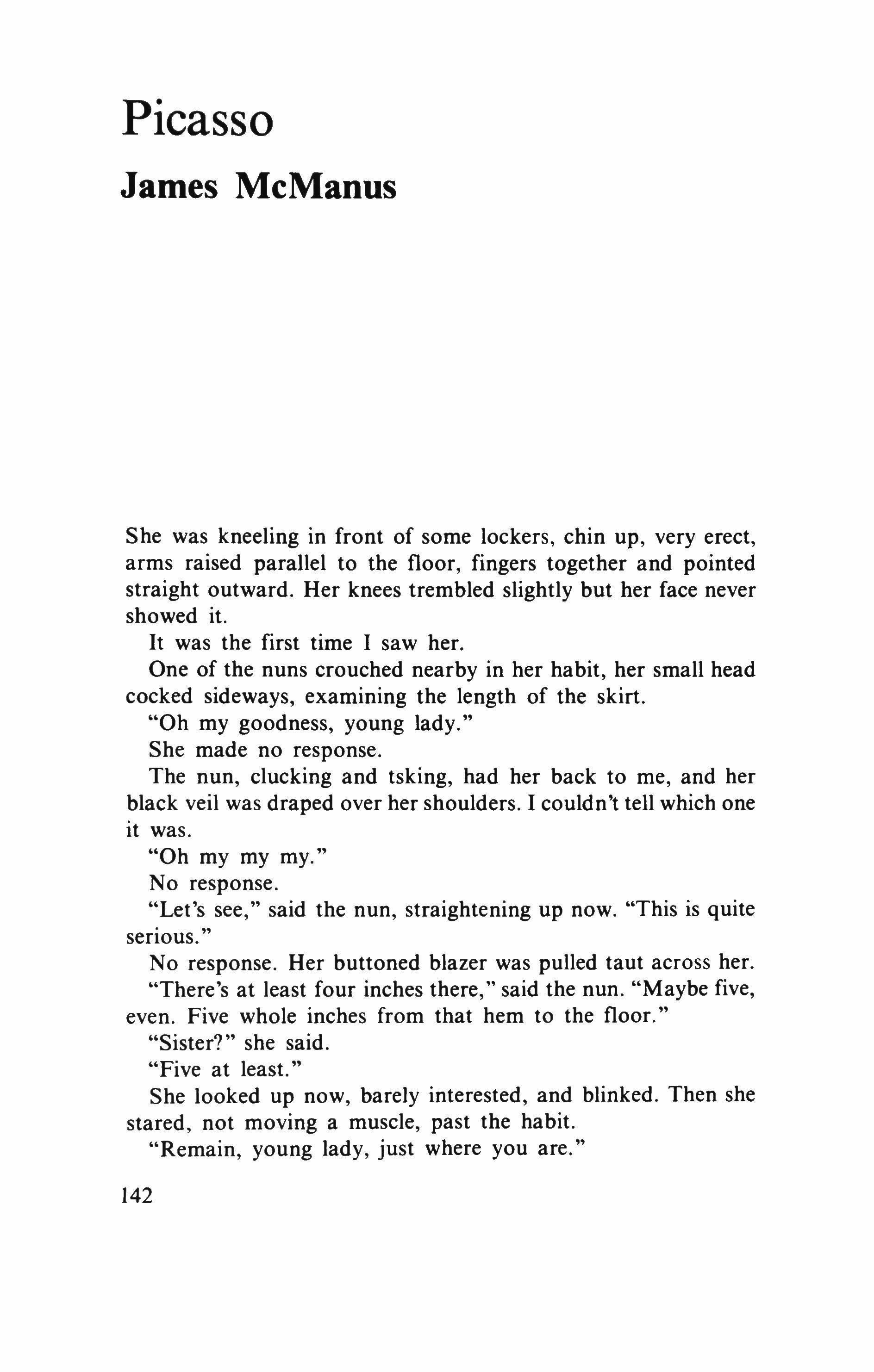
She was kneeling in front of some lockers, chin up, very erect, arms raised parallel to the floor, fingers together and pointed straight outward. Her knees trembled slightly but her face never showed it.
It was the first time I saw her.
One of the nuns crouched nearby in her habit, her small head cocked sideways, examining the length of the skirt.
"Oh my goodness, young lady."
She made no response.
The nun, clucking and tsking, had her back to me, and her black veil was draped over her shoulders. I couldn't tell which one it was.
"Oh my my my."
No response.
"Let's see," said the nun, straightening up now. "This is quite serious.
No response. Her buttoned blazer was pulled taut across her.
"There's at least four inches there," said the nun. "Maybe five, even. Five whole inches from that hem to the floor."
"Sister?" she said.
"Five at least."
She looked up now, barely interested, and blinked. Then she stared, not moving a muscle, past the habit.
"Remain, young lady, just where you are." 142
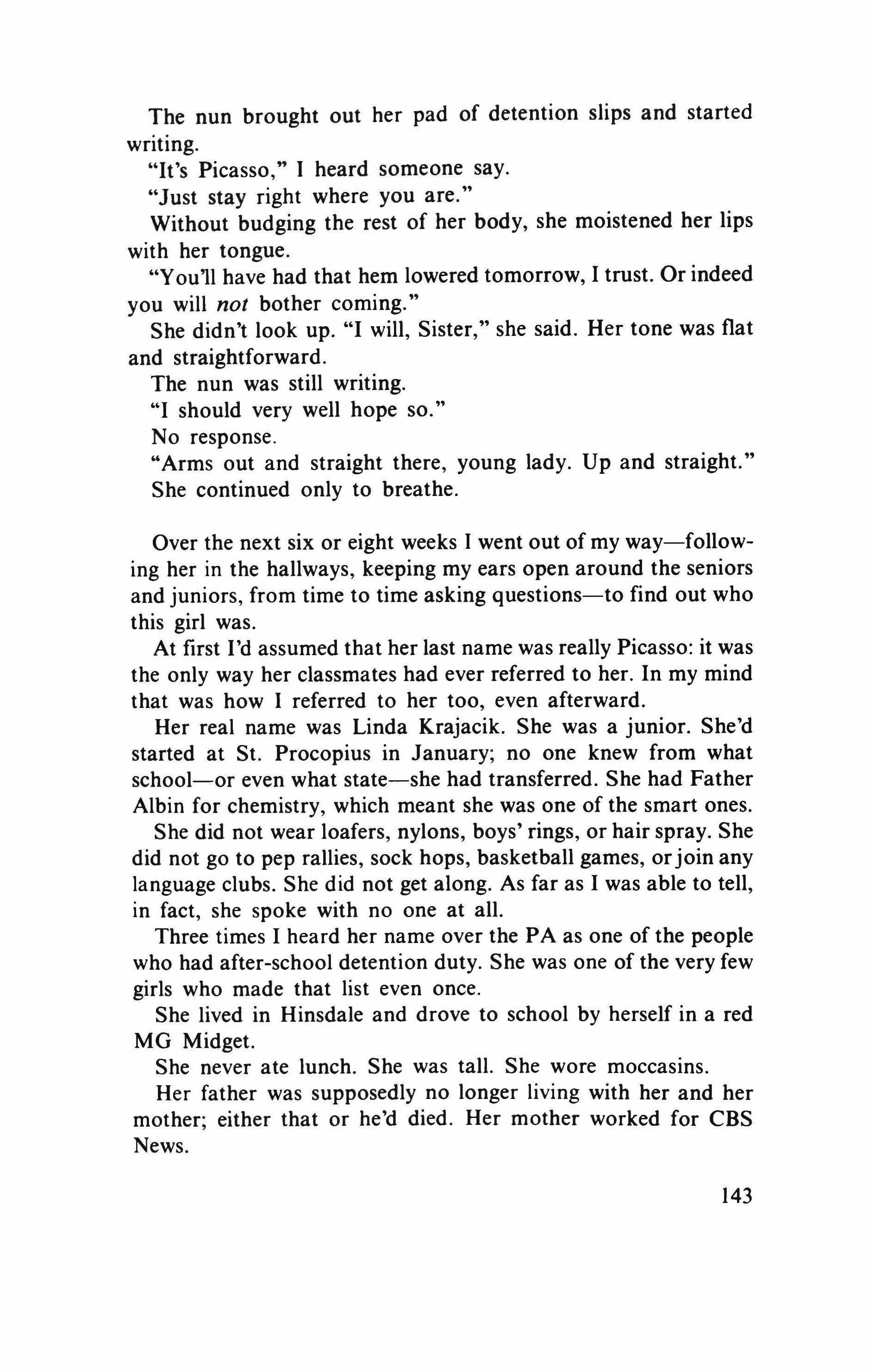
The nun brought out her pad of detention slips and started writing.
"It's Picasso," I heard someone say.
"Just stay right where you are."
Without budging the rest of her body, she moistened her lips with her tongue.
"You'll have had that hem lowered tomorrow, I trust. Or indeed you will not bother coming."
She didn't look up. "I will, Sister," she said. Her tone was flat and straightforward.
The nun was still writing.
"I should very well hope so."
No response.
"Arms out and straight there, young lady. Up and straight."
She continued only to breathe.
Over the next six or eight weeks I went out of my way-following her in the hallways, keeping my ears open around the seniors and juniors, from time to time asking questions-to find out who this girl was.
At first I'd assumed that her last name was really Picasso: it was the only way her classmates had ever referred to her. In my mind that was how I referred to her too, even afterward.
Her real name was Linda Krajacik. She was a junior. She'd started at St. Procopius in January; no one knew from what school-or even what state-she had transferred. She had Father Albin for chemistry, which meant she was one of the smart ones.
She did not wear loafers, nylons, boys' rings, or hair spray. She did not go to pep rallies, sock hops, basketball games, or join any language clubs. She did not get along. As far as I was able to tell, in fact, she spoke with no one at all.
Three times I heard her name over the PA as one of the people who had after-school detention duty. She was one of the very few girls who made that list even once.
She lived in Hinsdale and drove to school by herself in a red MG Midget.
She never ate lunch. She was tall. She wore moccasins.
Her father was supposedly no longer living with her and her mother; either that or he'd died. Her mother worked for CBS News.
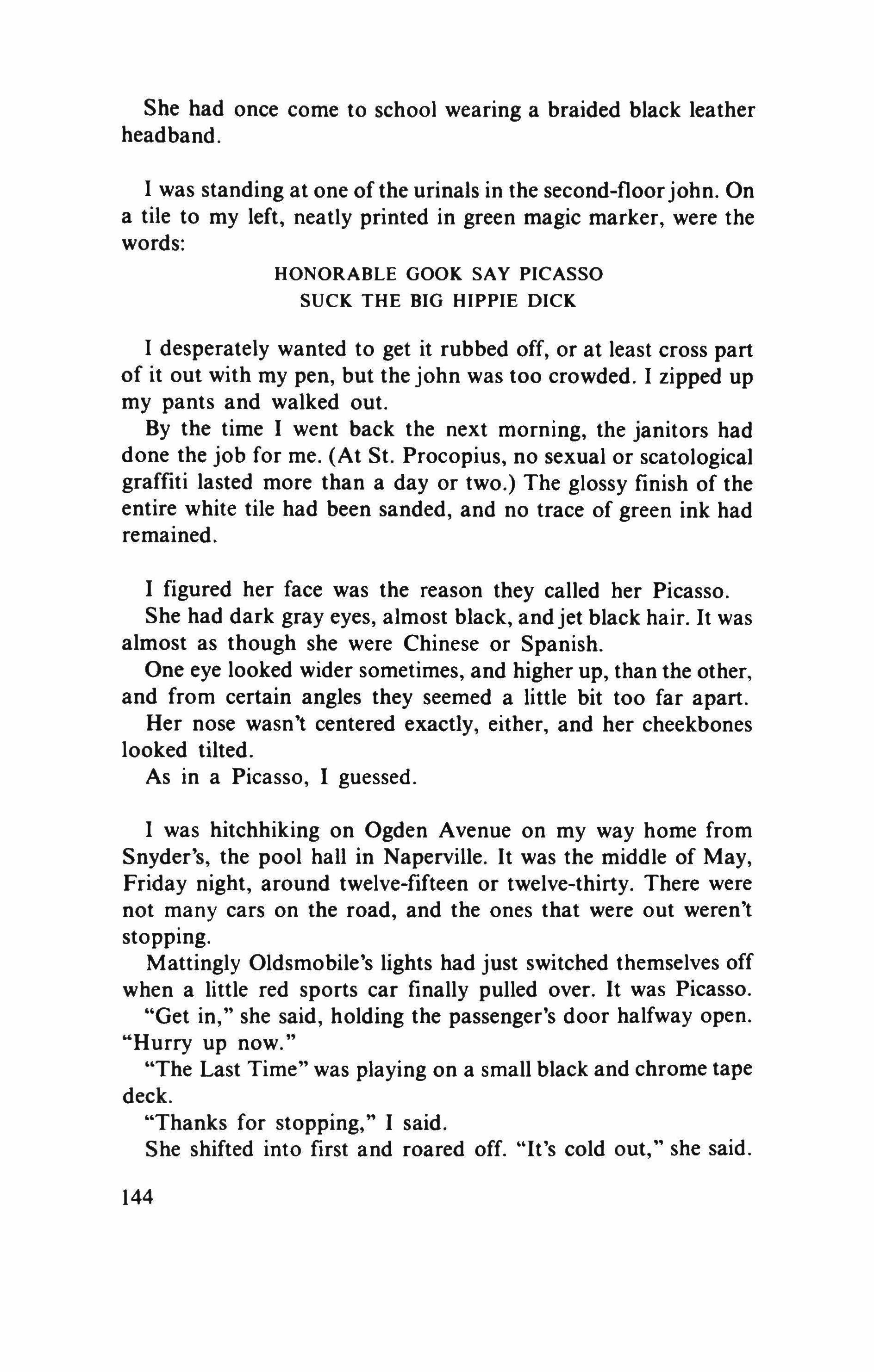
She had once come to school wearing a braided black leather headband.
I was standing at one of the urinals in the second-floorjohn. On a tile to my left, neatly printed in green magic marker, were the words:
I desperately wanted to get it rubbed off, or at least cross part of it out with my pen, but the john was too crowded. I zipped up my pants and walked out.
By the time I went back the next morning, the janitors had done the job for me. (At St. Procopius, no sexual or scatological graffiti lasted more than a day or two.) The glossy finish of the entire white tile had been sanded, and no trace of green ink had remained.
I figured her face was the reason they called her Picasso.
She had dark gray eyes, almost black, and jet black hair. It was almost as though she were Chinese or Spanish.
One eye looked wider sometimes, and higher up, than the other, and from certain angles they seemed a little bit too far apart.
Her nose wasn't centered exactly, either, and her cheekbones looked tilted.
As in a Picasso, I guessed.
I was hitchhiking on Ogden Avenue on my way home from Snyder's, the pool hall in Naperville. It was the middle of May, Friday night, around twelve-fifteen or twelve-thirty. There were not many cars on the road, and the ones that were out weren't stopping.
Mattingly Oldsmobile's lights had just switched themselves off when a little red sports car finally pulled over. It was Picasso.
"Get in," she said, holding the passenger's door halfway open. "Hurry up now."
"The Last Time" was playing on a small black and chrome tape deck.
"Thanks for stopping," I said.
She shifted into first and roared off. "It's cold out," she said.
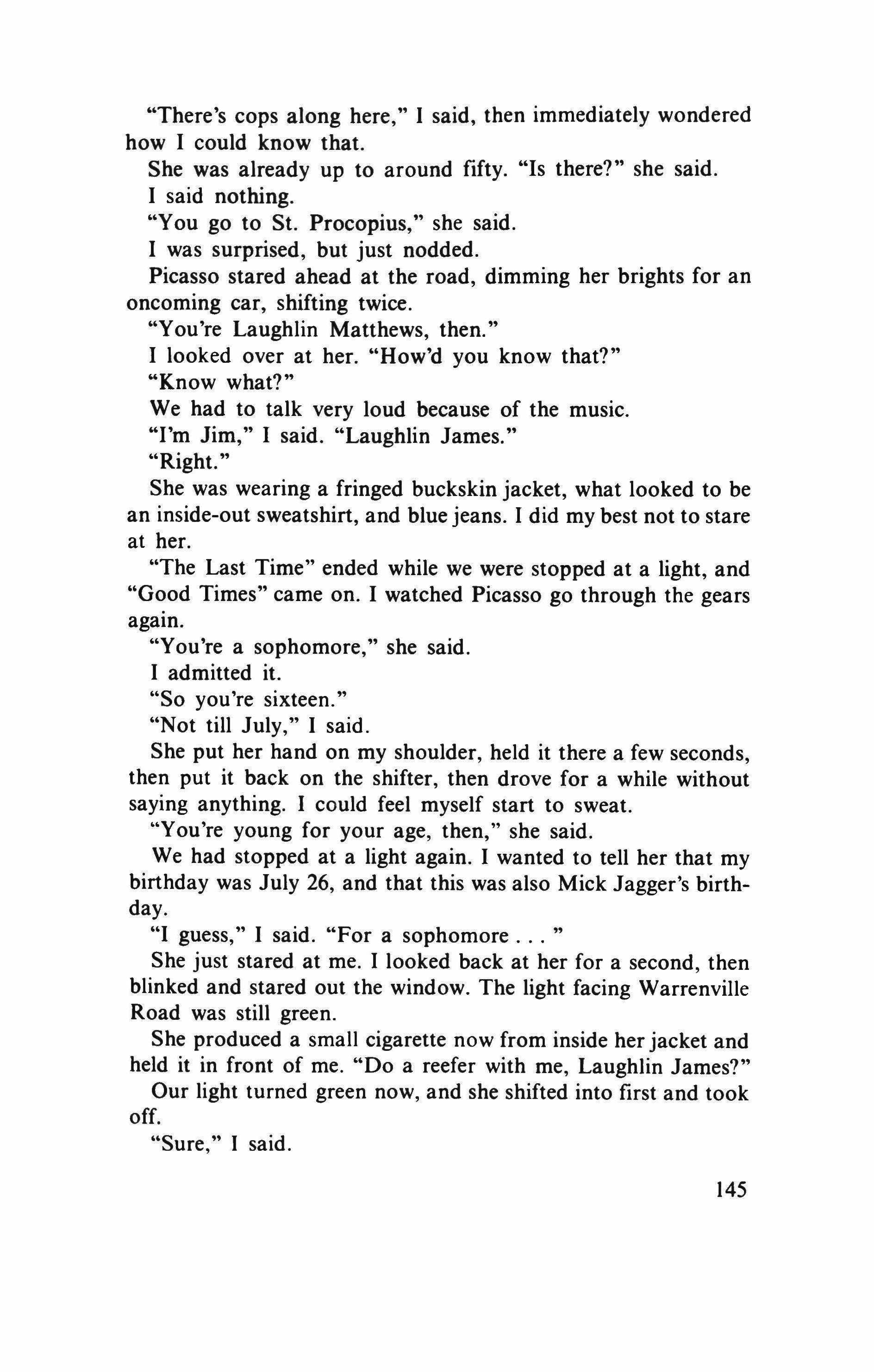
"There's cops along here," I said, then immediately wondered how I could know that.
She was already up to around fifty. "Is there?" she said.
I said nothing.
"You go to St. Procopius," she said.
I was surprised, but just nodded.
Picasso stared ahead at the road, dimming her brights for an oncoming car, shifting twice.
"You're Laughlin Matthews, then."
I looked over at her. "How'd you know that?"
"Know what?"
We had to talk very loud because of the music.
"I'm Jim," I said. "Laughlin James."
"Right."
She was wearing a fringed buckskin jacket, what looked to be an inside-out sweatshirt, and blue jeans. I did my best not to stare at her.
"The Last Time" ended while we were stopped at a light, and "Good Times" came on. I watched Picasso go through the gears again.
"You're a sophomore," she said.
I admitted it.
"So you're sixteen."
"Not till July," I said.
She put her hand on my shoulder, held it there a few seconds, then put it back on the shifter, then drove for a while without saying anything. 1 could feel myself start to sweat.
"You're young for your age, then," she said.
We had stopped at a light again. I wanted to tell her that my birthday was July 26, and that this was also Mick Jagger's birthday.
"I guess," 1 said. "For a sophomore
She just stared at me. 1 looked back at her for a second, then blinked and stared out the window. The light facing Warrenville Road was still green.
She produced a small cigarette now from inside her jacket and held it in front of me. "Do a reefer with me, Laughlin James?"
Our light turned green now, and she shifted into first and took off.
"Sure," I said. 145
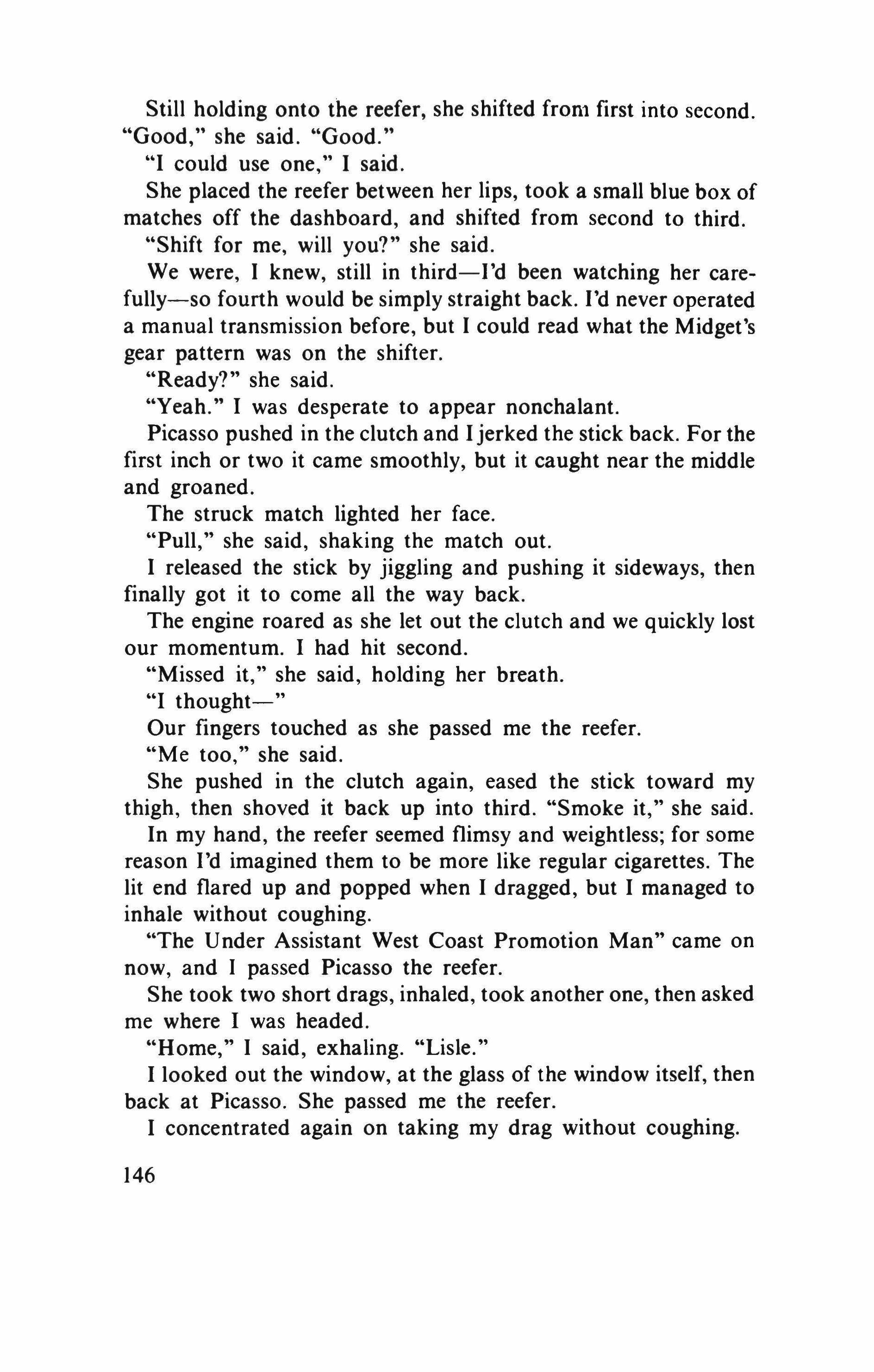
Still holding onto the reefer, she shifted from first into second. "Good," she said. "Good."
"I could use one," I said.
She placed the reefer between her lips, took a small blue box of matches off the dashboard, and shifted from second to third.
"Shift for me, will you?" she said.
We were, I knew, still in third-I'd been watching her carefully-so fourth would be simply straight back. I'd never operated a manual transmission before, but I could read what the Midget's gear pattern was on the shifter.
"Ready?" she said.
"Yeah." I was desperate to appear nonchalant. Picasso pushed in the clutch and I jerked the stick back. For the first inch or two it came smoothly, but it caught near the middle and groaned.
The struck match lighted her face.
"Pull," she said, shaking the match out.
I released the stick by jiggling and pushing it sideways, then finally got it to come all the way back.
The engine roared as she let out the clutch and we quickly lost our momentum. I had hit second.
"Missed it," she said, holding her breath.
"I thought-"
Our fingers touched as she passed me the reefer.
"Me too," she said.
She pushed in the clutch again, eased the stick toward my thigh, then shoved it back up into third. "Smoke it," she said.
In my hand, the reefer seemed flimsy and weightless; for some reason I'd imagined them to be more like regular cigarettes. The lit end flared up and popped when I dragged, but I managed to inhale without coughing.
"The Under Assistant West Coast Promotion Man" came on now, and I passed Picasso the reefer.
She took two short drags, inhaled, took another one, then asked me where I was headed.
"Home," I said, exhaling. "Lisle."
I looked out the window, at the glass of the window itself, then back at Picasso. She passed me the reefer.
I concentrated again on taking my drag without coughing.
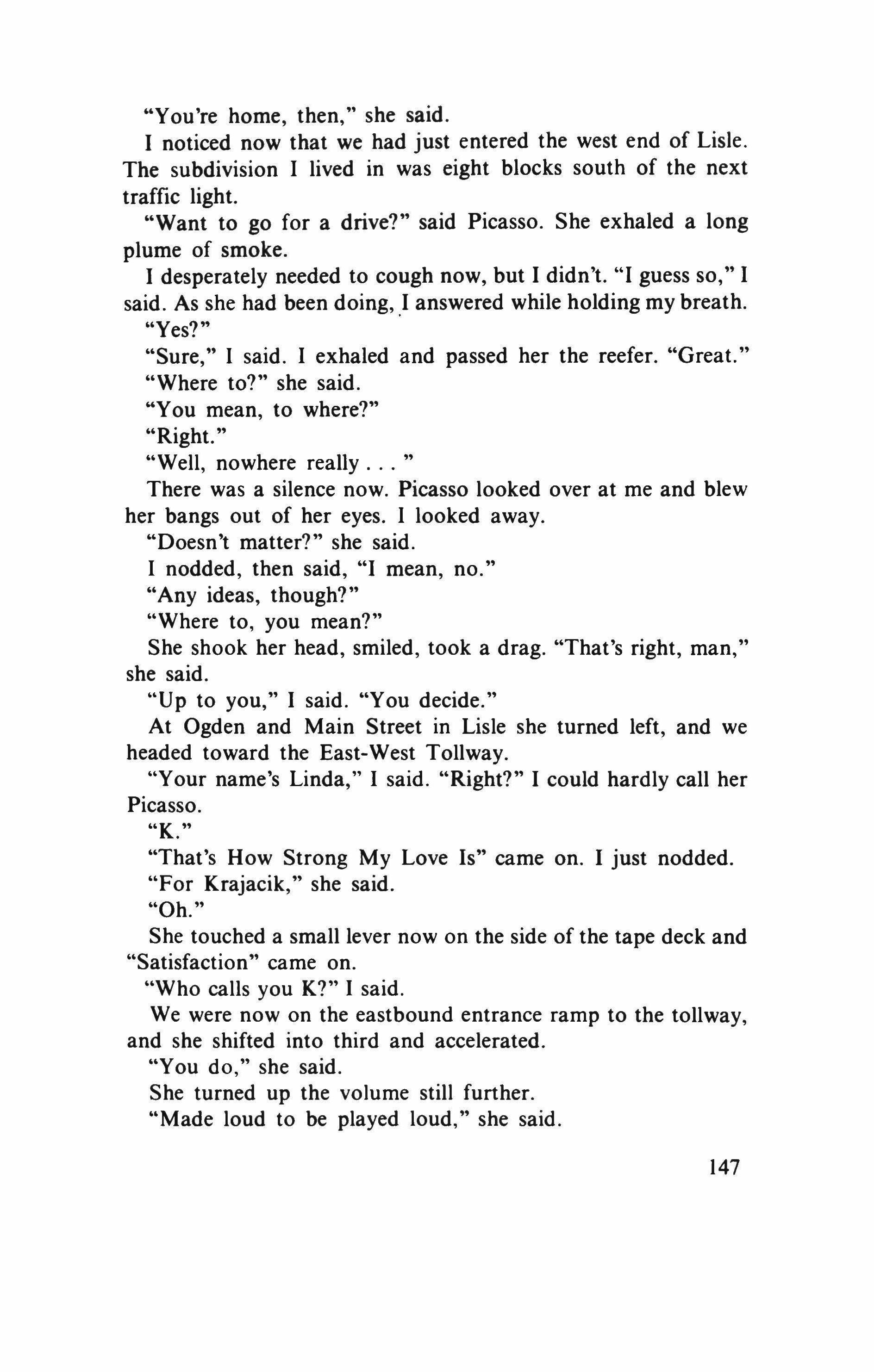
"You're home, then," she said.
1 noticed now that we had just entered the west end of Lisle. The subdivision 1 lived in was eight blocks south of the next traffic light.
"Want to go for a drive?" said Picasso. She exhaled a long plume of smoke.
1 desperately needed to cough now, but 1 didn't. "I guess so," 1 said. As she had been doing.I answered while holding my breath. "Yes?"
"Sure," I said. 1 exhaled and passed her the reefer. "Great." "Where to?" she said.
"You mean, to where?"
"Right."
"Well, nowhere really
There was a silence now. Picasso looked over at me and blew her bangs out of her eyes. I looked away.
"Doesn't matter?" she said.
I nodded, then said, "I mean, no."
"Any ideas, though?"
"Where to, you mean?"
She shook her head, smiled, took a drag. "That's right, man," she said.
"Up to you," I said. "You decide."
At Ogden and Main Street in Lisle she turned left, and we headed toward the East-West Tollway.
"Your name's Linda," I said. "Right?" I could hardly call her Picasso.
"K.
"That's How Strong My Love Is" came on. I just nodded. "For Krajacik," she said.
"Oh."
She touched a small lever now on the side of the tape deck and "Satisfaction" came on.
"Who calls you K?" I said.
We were now on the eastbound entrance ramp to the tollway, and she shifted into third and accelerated.
"You do," she said.
She turned up the volume still further.
"Made loud to be played loud," she said.
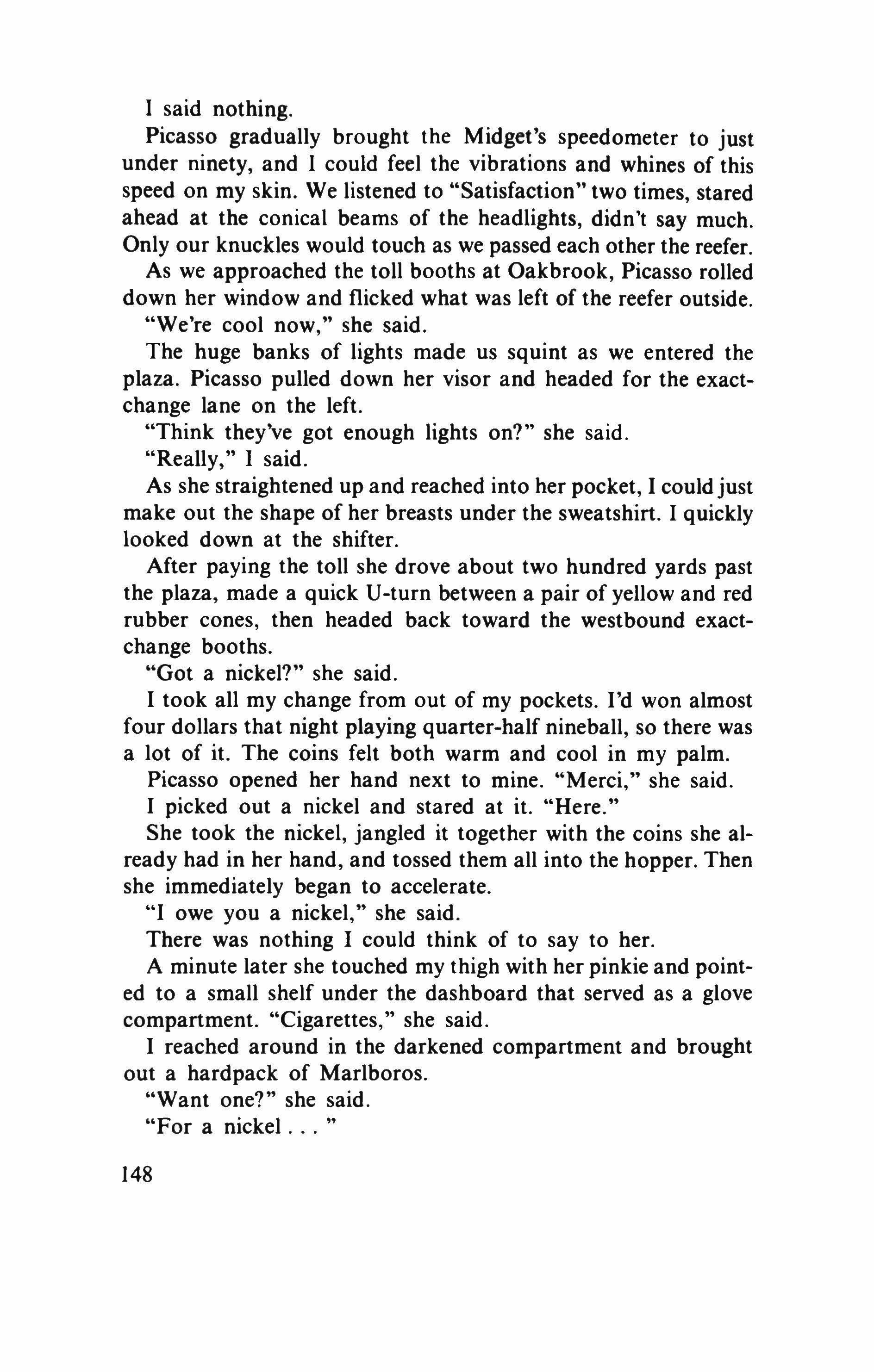
1 said nothing.
Picasso gradually brought the Midget's speedometer to just under ninety, and 1 could feel the vibrations and whines of this speed on my skin. We listened to "Satisfaction" two times, stared ahead at the conical beams of the headlights, didn't say much. Only our knuckles would touch as we passed each other the reefer.
As we approached the toll booths at Oakbrook, Picasso rolled down her window and flicked what was left of the reefer outside.
"We're cool now," she said.
The huge banks of lights made us squint as we entered the plaza. Picasso pulled down her visor and headed for the exactchange lane on the left.
"Think they've got enough lights on?" she said.
"Really," 1 said.
As she straightened up and reached into her pocket, I could just make out the shape of her breasts under the sweatshirt. I quickly looked down at the shifter.
After paying the toll she drove about two hundred yards past the plaza, made a quick U-turn between a pair of yellow and red rubber cones, then headed back toward the westbound exactchange booths.
"Got a nickel?" she said.
I took all my change from out of my pockets. I'd won almost four dollars that night playing quarter-half nineball, so there was a lot of it. The coins felt both warm and cool in my palm.
Picasso opened her hand next to mine. "Merci," she said.
I picked out a nickel and stared at it. "Here."
She took the nickel, jangled it together with the coins she already had in her hand, and tossed them all into the hopper. Then she immediately began to accelerate.
"lowe you a nickel," she said.
There was nothing I could think of to say to her.
A minute later she touched my thigh with her pinkie and pointed to a small shelf under the dashboard that served as a glove compartment. "Cigarettes," she said.
I reached around in the darkened compartment and brought out a hardpack of Marlboros.
"Want one?" she said.
"For a nickel
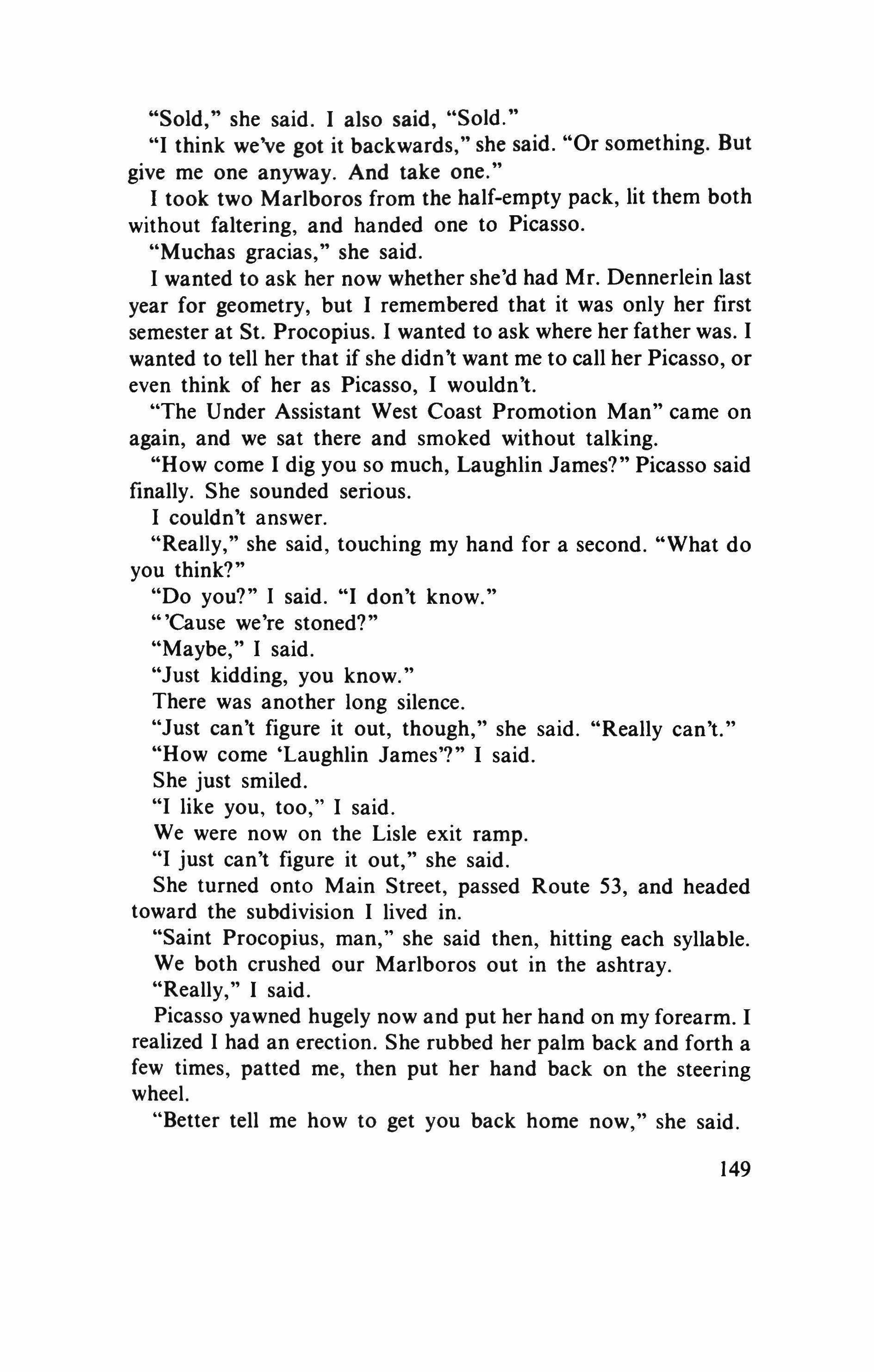
"Sold," she said. 1 also said, "Sold."
"I think we've got it backwards," she said. "Or something. But give me one anyway. And take one."
1 took two Marlboros from the half-empty pack, lit them both without faltering, and handed one to Picasso.
"Muchas gracias," she said.
1 wanted to ask her now whether she'd had Mr. Dennerlein last year for geometry, but 1 remembered that it was only her first semester at St. Procopius. 1 wanted to ask where her father was. 1 wanted to tell her that if she didn't want me to call her Picasso, or even think of her as Picasso, 1 wouldn't.
"The Under Assistant West Coast Promotion Man" came on again, and we sat there and smoked without talking.
"How come 1 dig you so much, Laughlin James?" Picasso said finally. She sounded serious.
1 couldn't answer.
"Really," she said, touching my hand for a second. "What do you think?"
"Do you?" 1 said. "I don't know."
"'Cause we're stoned?"
"Maybe," 1 said.
"Just kidding, you know."
There was another long silence.
"Just can't figure it out, though," she said. "Really can't."
"How come 'Laughlin James'?" 1 said.
She just smiled.
"I like you, too," 1 said.
We were now on the Lisle exit ramp.
"I just can't figure it out," she said.
She turned onto Main Street, passed Route 53, and headed toward the subdivision 1 lived in.
"Saint Procopius, man," she said then, hitting each syllable.
We both crushed our Marlboros out in the ashtray.
"Really," I said.
Picasso yawned hugely now and put her hand on my forearm. 1 realized I had an erection. She rubbed her palm back and forth a few times, patted me, then put her hand back on the steering wheel.
"Better tell me how to get you back home now," she said. 149
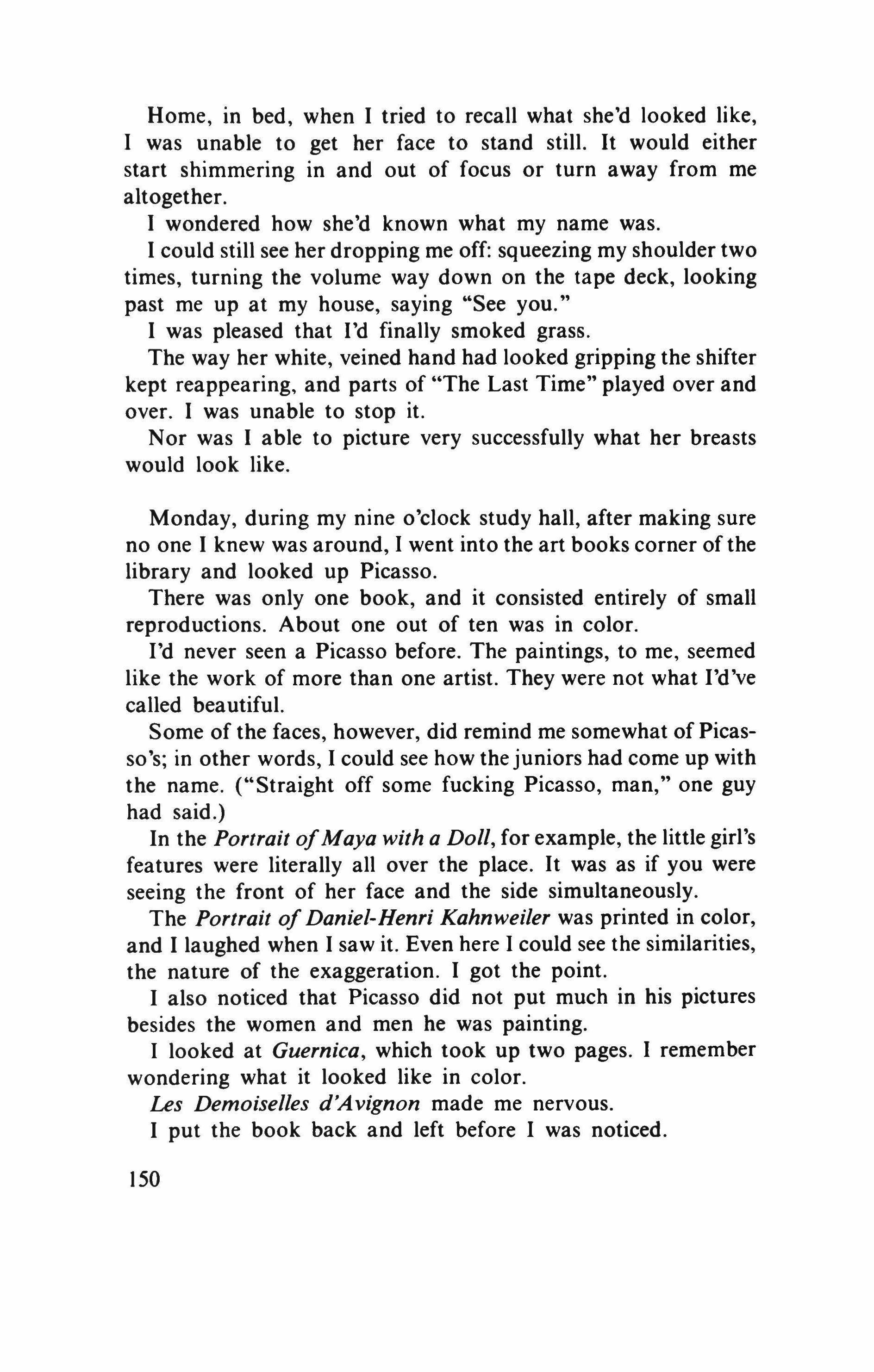
Home, in bed, when I tried to recall what she'd looked like, was unable to get her face to stand still. It would either start shimmering in and out of focus or turn away from me altogether.
I wondered how she'd known what my name was.
I could still see her dropping me off: squeezing my shoulder two times, turning the volume way down on the tape deck, looking past me up at my house, saying "See you."
I was pleased that I'd finally smoked grass.
The way her white, veined hand had looked gripping the shifter kept reappearing, and parts of "The Last Time" played over and over. I was unable to stop it.
Nor was I able to picture very successfully what her breasts would look like.
Monday, during my nine o'clock study hall, after making sure no one I knew was around, I went into the art books corner of the library and looked up Picasso.
There was only one book, and it consisted entirely of small reproductions. About one out of ten was in color.
I'd never seen a Picasso before. The paintings, to me, seemed like the work of more than one artist. They were not what I'd've called beautiful.
Some of the faces, however, did remind me somewhat of Picasso's; in other words, I could see how the juniors had come up with the name. ("Straight off some fucking Picasso, man," one guy had said.)
In the Portrait ofMaya with a Doll, for example, the little girl's features were literally all over the place. It was as if you were seeing the front of her face and the side simultaneously.
The Portrait of Daniel-Henri Kahnweiler was printed in color, and I laughed when I saw it. Even here I could see the similarities, the nature of the exaggeration. I got the point.
I also noticed that Picasso did not put much in his pictures besides the women and men he was painting.
I looked at Guernica, which took up two pages. I remember wondering what it looked like in color.
Les Demoiselles d'Avignon made me nervous.
I put the book back and left before I was noticed.
150
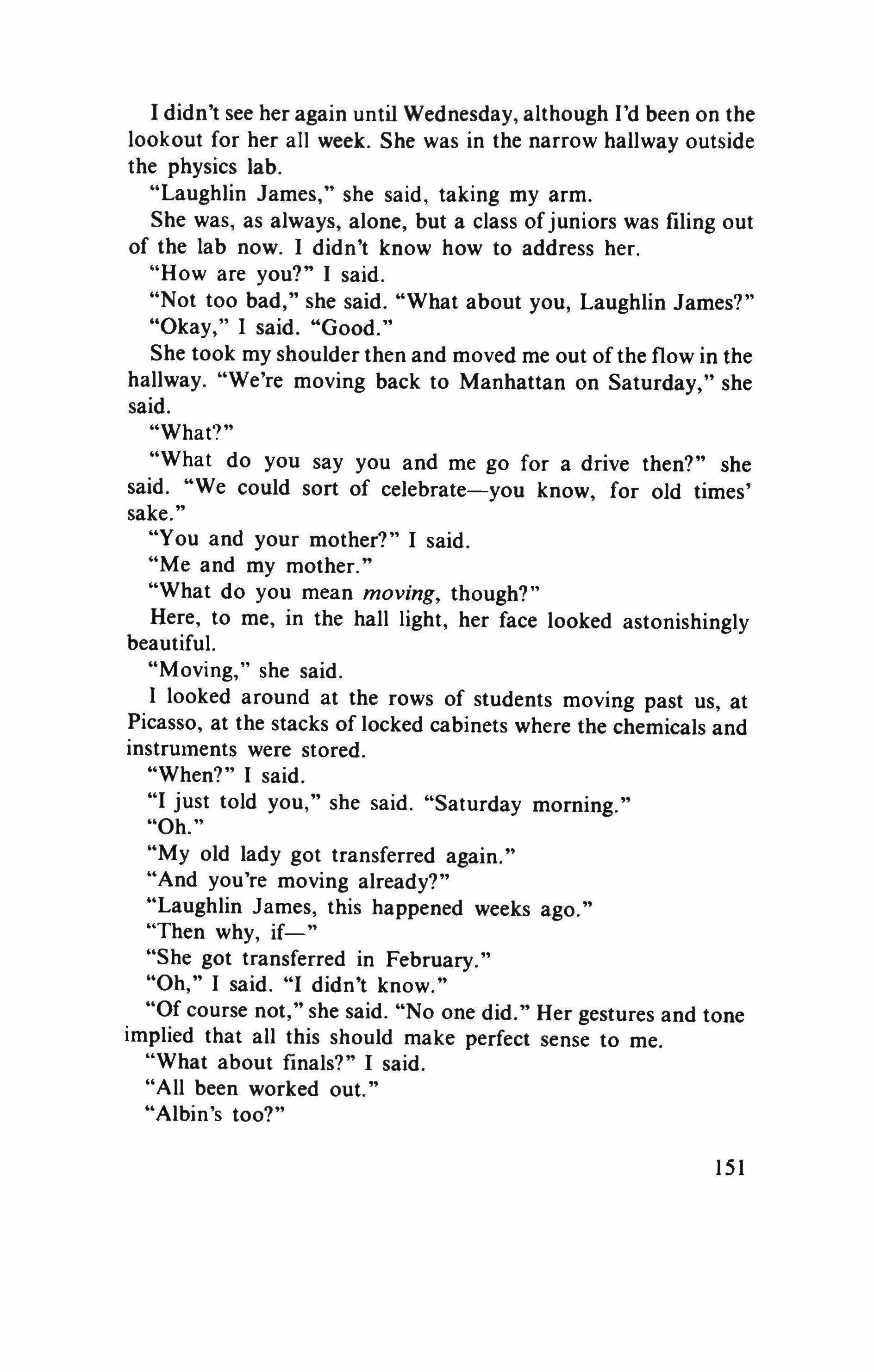
I didn't see her again until Wednesday, although I'd been on the lookout for her all week. She was in the narrow hallway outside the physics lab.
"Laughlin James," she said, taking my arm.
She was, as always, alone, but a class of juniors was filing out of the lab now. I didn't know how to address her.
"How are you?" I said.
"Not too bad," she said. "What about you, Laughlin James?" "Okay," I said. "Good."
She took my shoulder then and moved me out of the flow in the hallway. "We're moving back to Manhattan on Saturday," she said.
"What?"
"What do you say you and me go for a drive then?" she said. "We could sort of celebrate-you know, for old times' sake.
"You and your mother?" I said.
"Me and my mother."
"What do you mean moving, though?"
Here, to me, in the hall light, her face looked astonishingly beautiful.
"Moving," she said.
I looked around at the rows of students moving past us, at Picasso, at the stacks of locked cabinets where the chemicals and instruments were stored.
"When?" 1 said.
"I just told you," she said. "Saturday morning." "Oh."
"Myoid lady got transferred again."
"And you're moving already?"
"Laughlin James, this happened weeks ago."
"Then why, if-"
"She got transferred in February."
"Oh," 1 said. "I didn't know."
"Of course not," she said. "No one did." Her gestures and tone implied that all this should make perfect sense to me.
"What about finals?" I said.
"All been worked out."
"Albin's too?"

"All of them."
1 said nothing. It was the first time we'd stood side by side, and 1 could tell that, even in moccasins, she was only about half an inch shorter than me.
"Anyway," she said. "Want to go for that drive?"
"Sure," 1 said. "Now?"
"Of course not now," she said, squinting. "Thursday night. Tomorrow's my last day of school."
1 stood up straight but said nothing.
"Or maybe today should be," she said, sort of half to herself. "Now that 1 think of it."
"Fine," 1 said. My eyes were lined up with her eyebrows.
"That mean yes?"
"I guess so," 1 said. "Thursday night?"
"Jeez, Laughlin James. Yes or no."
"What time, 1 mean."
"You ask me what time now"-she put her hands on my shoulders-"by saying what night?"
"What?" 1 said. 1 looked down.
She took her hands off my shoulders.
"Seven, then?"
"Good," 1 said. "Yeah. Seven's good."
"Good," she said. "I'll see you at seven."
"Very good."
"And I'm glad you said yes."
"Do you remember how to get to my house?"
"Yes 1 do, sir."
"Seven, then?"
"Seven. Are you glad?"
"That 1 said yes?" 1 said.
She moved her face even closer now, and 1 could see that her skin was translucent.
"I'll see you," she said.
I shaved Thursday night after dinner with my new Techmatic cartridge. I can remember thinking about the White Sox's chances that season; they had just lost that afternoon. I was nervous.
I washed my hair in the shower, soaped my whole body down, shaved my face again. 152
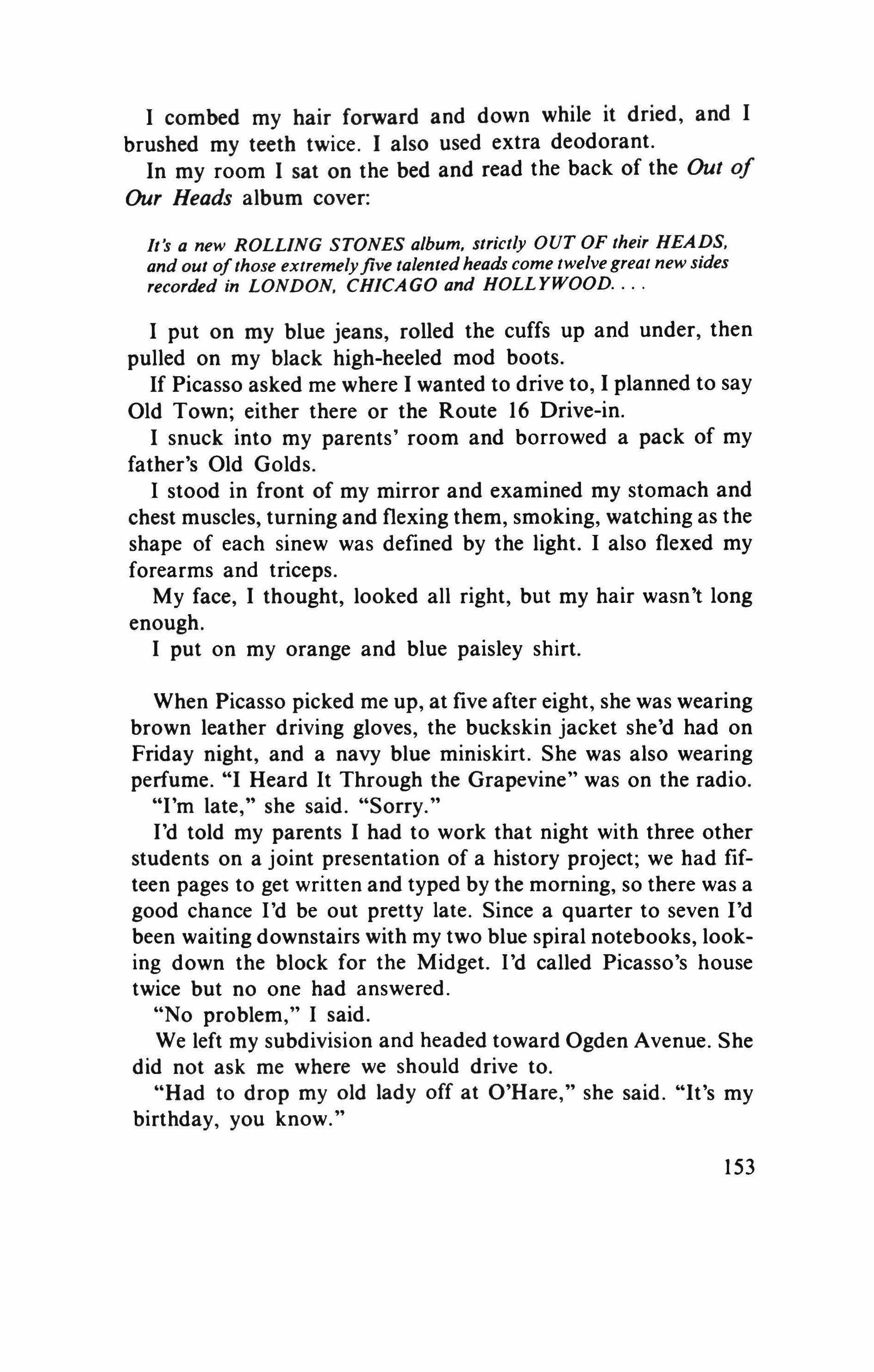
I combed my hair forward and down while it dried, and I brushed my teeth twice. I also used extra deodorant.
In my room 1 sat on the bed and read the back of the Out of Our Heads album cover:
It's a new ROLLING STONES album. strictly OUT OF their HEADS. and out ofthose extremelyfive talented heads come twelvegreat new sides recorded in LONDON. CHICAGO and HOLLyWOOD
I put on my blue jeans, rolled the cuffs up and under, then pulled on my black high-heeled mod boots.
If Picasso asked me where I wanted to drive to, I planned to say Old Town; either there or the Route 16 Drive-in.
1 snuck into my parents' room and borrowed a pack of my father's Old Golds.
I stood in front of my mirror and examined my stomach and chest muscles, turning and flexing them, smoking, watching as the shape of each sinew was defined by the light. 1 also flexed my forearms and triceps.
My face, I thought, looked all right, but my hair wasn't long enough.
1 put on my orange and blue paisley shirt.
When Picasso picked me up, at five after eight, she was wearing brown leather driving gloves, the buckskin jacket she'd had on Friday night, and a navy blue miniskirt. She was also wearing perfume. "I Heard It Through the Grapevine" was on the radio.
"I'm late," she said. "Sorry."
I'd told my parents 1 had to work that night with three other students on a joint presentation of a history project; we had fifteen pages to get written and typed by the morning, so there was a good chance I'd be out pretty late. Since a quarter to seven I'd been waiting downstairs with my two blue spiral notebooks, looking down the block for the Midget. I'd called Picasso's house twice but no one had answered.
"No problem," 1 said.
We left my subdivision and headed toward Ogden Avenue. She did not ask me where we should drive to.
"Had to drop myoid lady off at O'Hare," she said. "It's my birthday, you know."
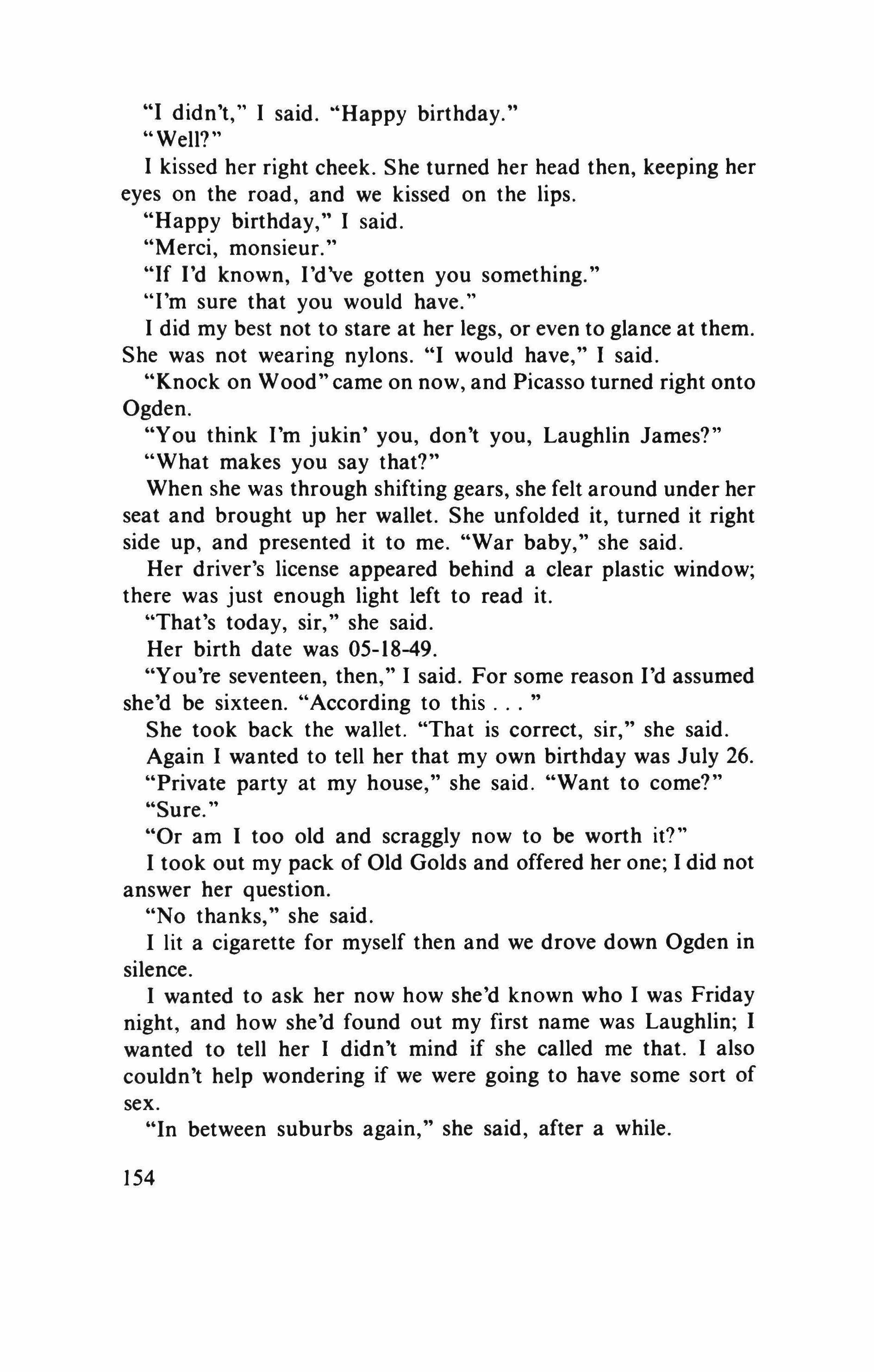
"I didn't," I said. "Happy birthday." "Well?"
I kissed her right cheek. She turned her head then, keeping her eyes on the road, and we kissed on the lips.
"Happy birthday," I said.
"Merci, monsieur."
"If I'd known, I'd've gotten you something."
"I'm sure that you would have."
I did my best not to stare at her legs, or even to glance at them. She was not wearing nylons. "I would have," I said.
"Knock on Wood" came on now, and Picasso turned right onto Ogden.
"You think I'm jukin' you, don't you, Laughlin James?"
"What makes you say that?"
When she was through shifting gears, she felt around under her seat and brought up her wallet. She unfolded it, turned it right side up, and presented it to me. "War baby," she said.
Her driver's license appeared behind a clear plastic window; there was just enough light left to read it.
"That's today, sir," she said.
Her birth date was 05-18-49.
"You're seventeen, then," I said. For some reason I'd assumed she'd be sixteen. "According to this She took back the wallet. "That is correct, sir," she said.
Again I wanted to tell her that my own birthday was July 26.
"Private party at my house," she said. "Want to come?"
"Sure.
"Or am I too old and scraggly now to be worth it?"
I took out my pack of Old Golds and offered her one; I did not answer her question.
"No thanks," she said.
I lit a cigarette for myself then and we drove down Ogden in silence.
I wanted to ask her now how she'd known who I was Friday night, and how she'd found out my first name was Laughlin; I wanted to tell her I didn't mind if she called me that. I also couldn't help wondering if we were going to have some sort of sex.
"In between suburbs again," she said, after a while.
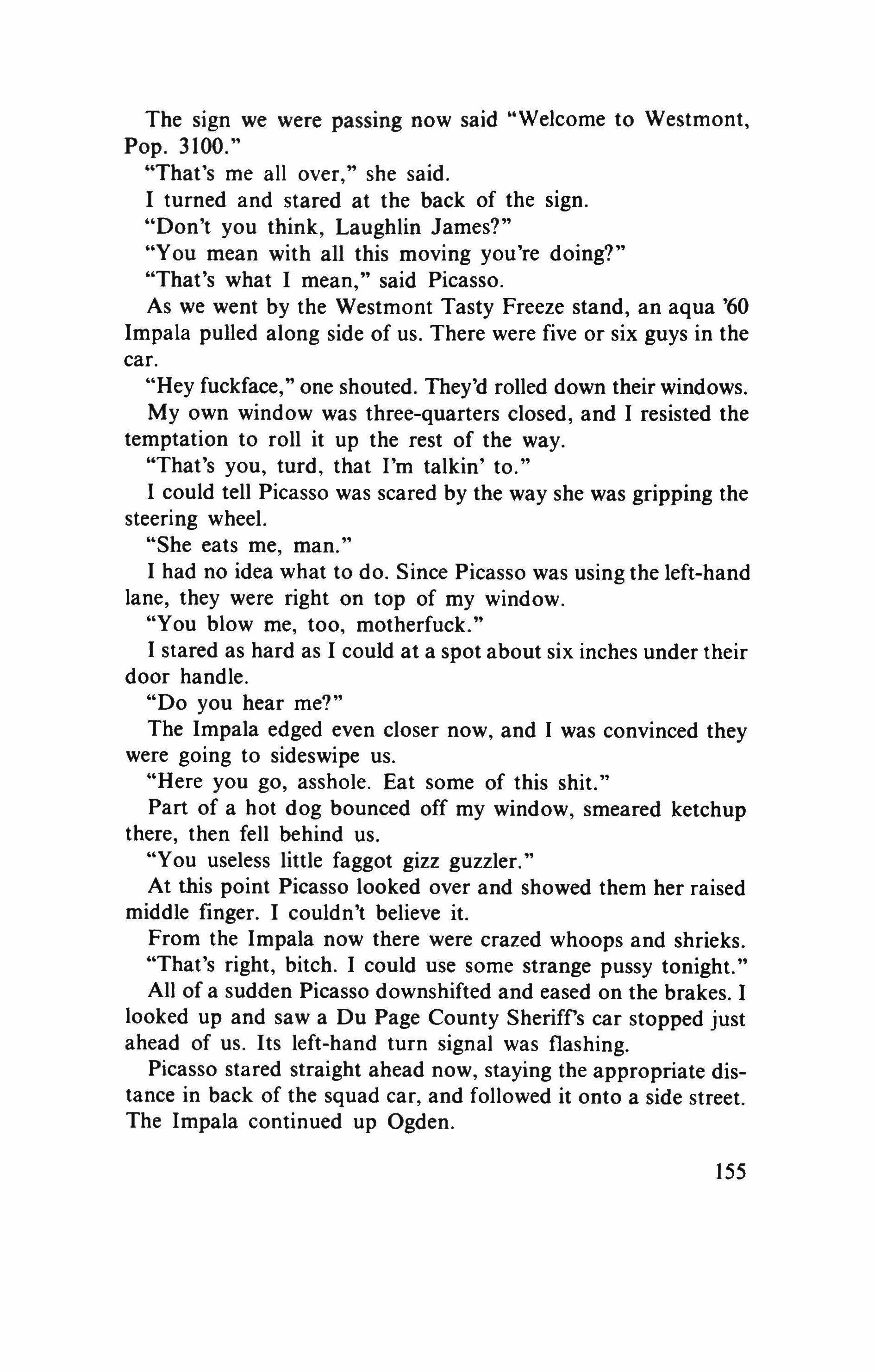
The sign we were passing now said "Welcome to Westmont, Pop. 3100."
"That's me all over," she said.
I turned and stared at the back of the sign.
"Don't you think, Laughlin James?"
"You mean with all this moving you're doing?"
"That's what I mean," said Picasso.
As we went by the Westmont Tasty Freeze stand, an aqua '60 Impala pulled along side of us. There were five or six guys in the car.
"Hey fuckface," one shouted. They'd rolled down their windows. My own window was three-quarters closed, and I resisted the temptation to roll it up the rest of the way.
"That's you, turd, that I'm talkin' to."
I could tell Picasso was scared by the way she was gripping the steering wheel.
"She eats me, man."
I had no idea what to do. Since Picasso was using the left-hand lane, they were right on top of my window.
"You blow me, too, motherfuck."
I stared as hard as I could at a spot about six inches under their door handle.
"Do you hear me?"
The Impala edged even closer now, and I was convinced they were going to sideswipe us.
"Here you go, asshole. Eat some of this shit."
Part of a hot dog bounced off my window, smeared ketchup there, then fell behind us.
"You useless little faggot gizz guzzler."
At this point Picasso looked over and showed them her raised middle finger. I couldn't believe it.
From the Impala now there were crazed whoops and shrieks.
"That's right, bitch. I could use some strange pussy tonight."
All of a sudden Picasso downshifted and eased on the brakes. I looked up and saw a Du Page County Sheriff's car stopped just ahead of us. Its left-hand turn signal was flashing.
Picasso stared straight ahead now, staying the appropriate distance in back of the squad car, and followed it onto a side street. The Impala continued up Ogden.
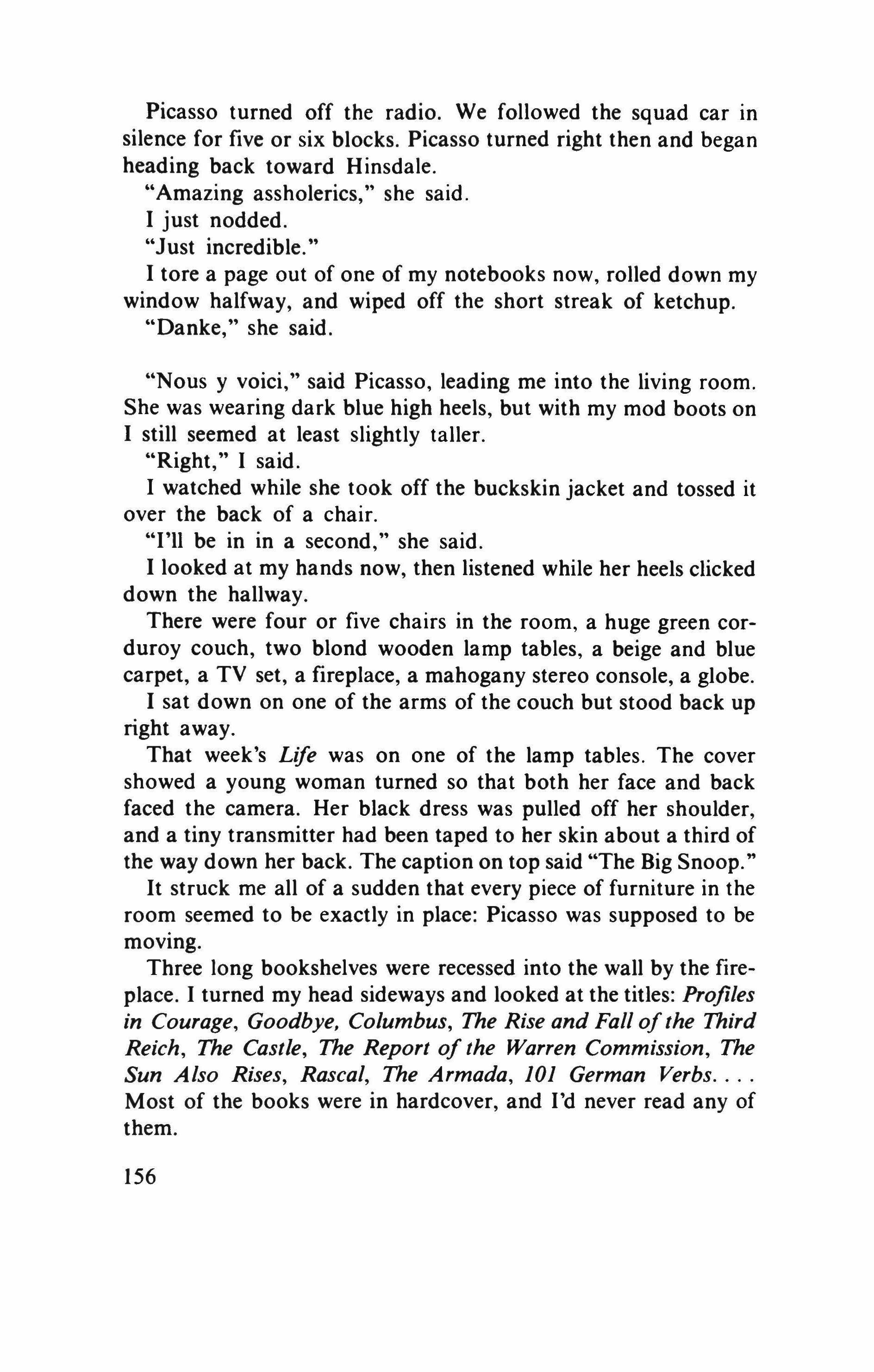
Picasso turned off the radio. We followed the squad car in silence for five or six blocks. Picasso turned right then and began heading back toward Hinsdale.
"Amazing assholerics," she said.
I just nodded.
"Just incredible."
I tore a page out of one of my notebooks now, rolled down my window halfway, and wiped off the short streak of ketchup. "Danke," she said.
"Nous y voici," said Picasso, leading me into the living room. She was wearing dark blue high heels, but with my mod boots on I still seemed at least slightly taller.
"Right," I said.
I watched while she took off the buckskin jacket and tossed it over the back of a chair.
"I'll be in in a second," she said.
I looked at my hands now, then listened while her heels clicked down the hallway.
There were four or five chairs in the room, a huge green corduroy couch, two blond wooden lamp tables, a beige and blue carpet, a TV set, a fireplace, a mahogany stereo console, a globe. I sat down on one of the arms of the couch but stood back up right away.
That week's Life was on one of the lamp tables. The cover showed a young woman turned so that both her face and back faced the camera. Her black dress was pulled off her shoulder, and a tiny transmitter had been taped to her skin about a third of the way down her back. The caption on top said "The Big Snoop. It struck me all of a sudden that every piece of furniture in the room seemed to be exactly in place: Picasso was supposed to be moving.
Three long bookshelves were recessed into the wall by the fireplace. I turned my head sideways and looked at the titles: Profiles in Courage, Goodbye, Columbus, The Rise and Fall of the Third Reich, The Castle, The Report of the Warren Commission, The Sun Also Rises, Rascal, The Armada, 101 German Verbs Most of the books were in hardcover, and I'd never read any of them.
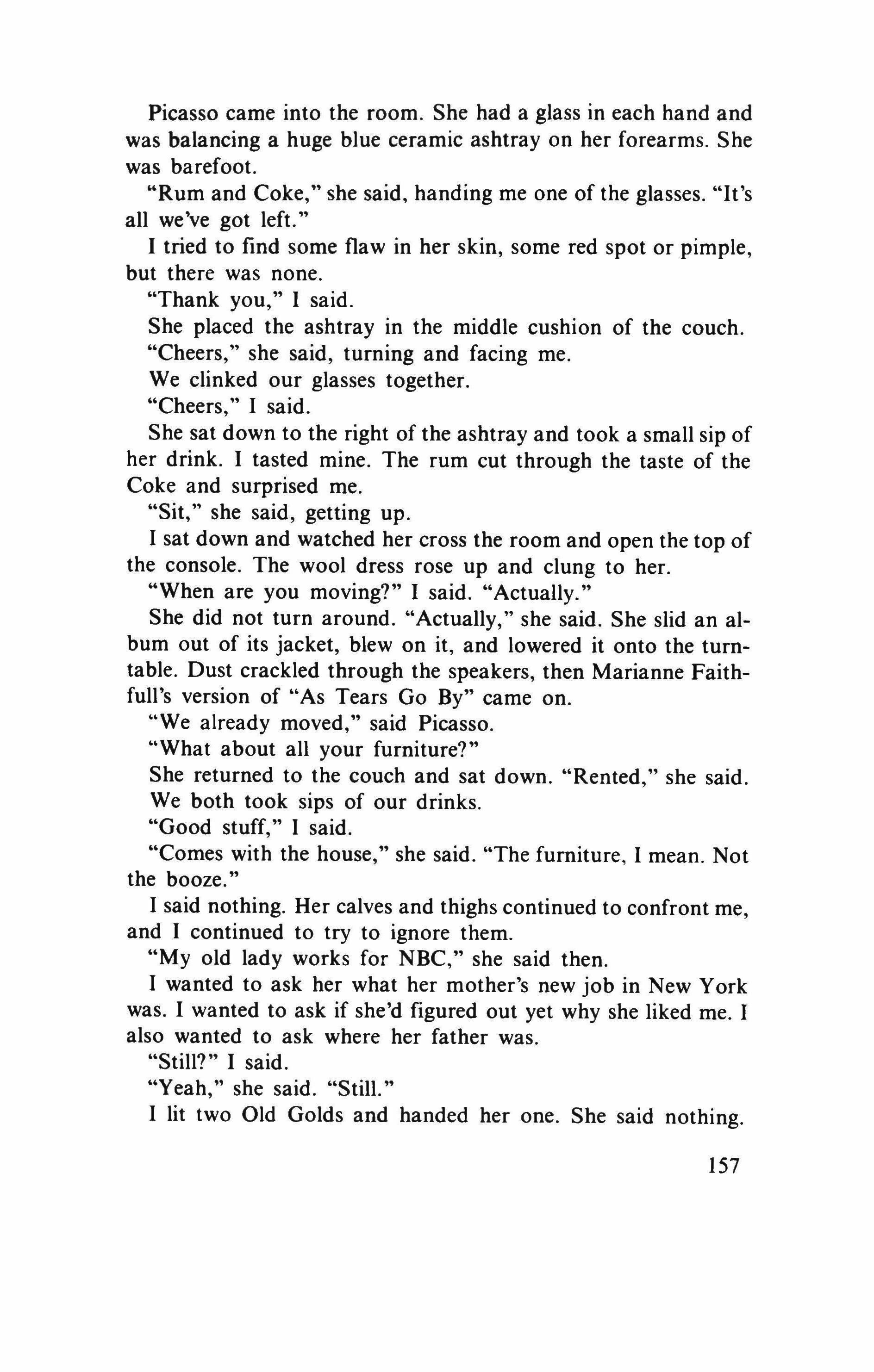
Picasso came into the room. She had a glass in each hand and was balancing a huge blue ceramic ashtray on her forearms. She was barefoot.
"Rum and Coke," she said, handing me one of the glasses. "It's all we've got left."
I tried to find some flaw in her skin, some red spot or pimple, but there was none.
"Thank you," I said.
She placed the ashtray in the middle cushion of the couch.
"Cheers," she said, turning and facing me.
We clinked our glasses together.
"Cheers," I said.
She sat down to the right of the ashtray and took a small sip of her drink. I tasted mine. The rum cut through the taste of the Coke and surprised me.
"Sit," she said, getting up.
I sat down and watched her cross the room and open the top of the console. The wool dress rose up and clung to her.
"When are you moving?" I said. "Actually."
She did not turn around. "Actually," she said. She slid an album out of its jacket, blew on it, and lowered it onto the turntable. Dust crackled through the speakers, then Marianne Faithfull's version of "As Tears Go By" came on.
"We already moved," said Picasso.
"What about all your furniture?"
She returned to the couch and sat down. "Rented," she said. We both took sips of our drinks.
"Good stuff," I said.
"Comes with the house," she said. "The furniture, I mean. Not the booze."
I said nothing. Her calves and thighs continued to confront me, and I continued to try to ignore them.
"Myoid lady works for NBC," she said then.
I wanted to ask her what her mother's new job in New York was. I wanted to ask if she'd figured out yet why she liked me. I also wanted to ask where her father was.
"Still?" I said.
"Yeah," she said. "Still."
I lit two Old Golds and handed her one. She said nothing.
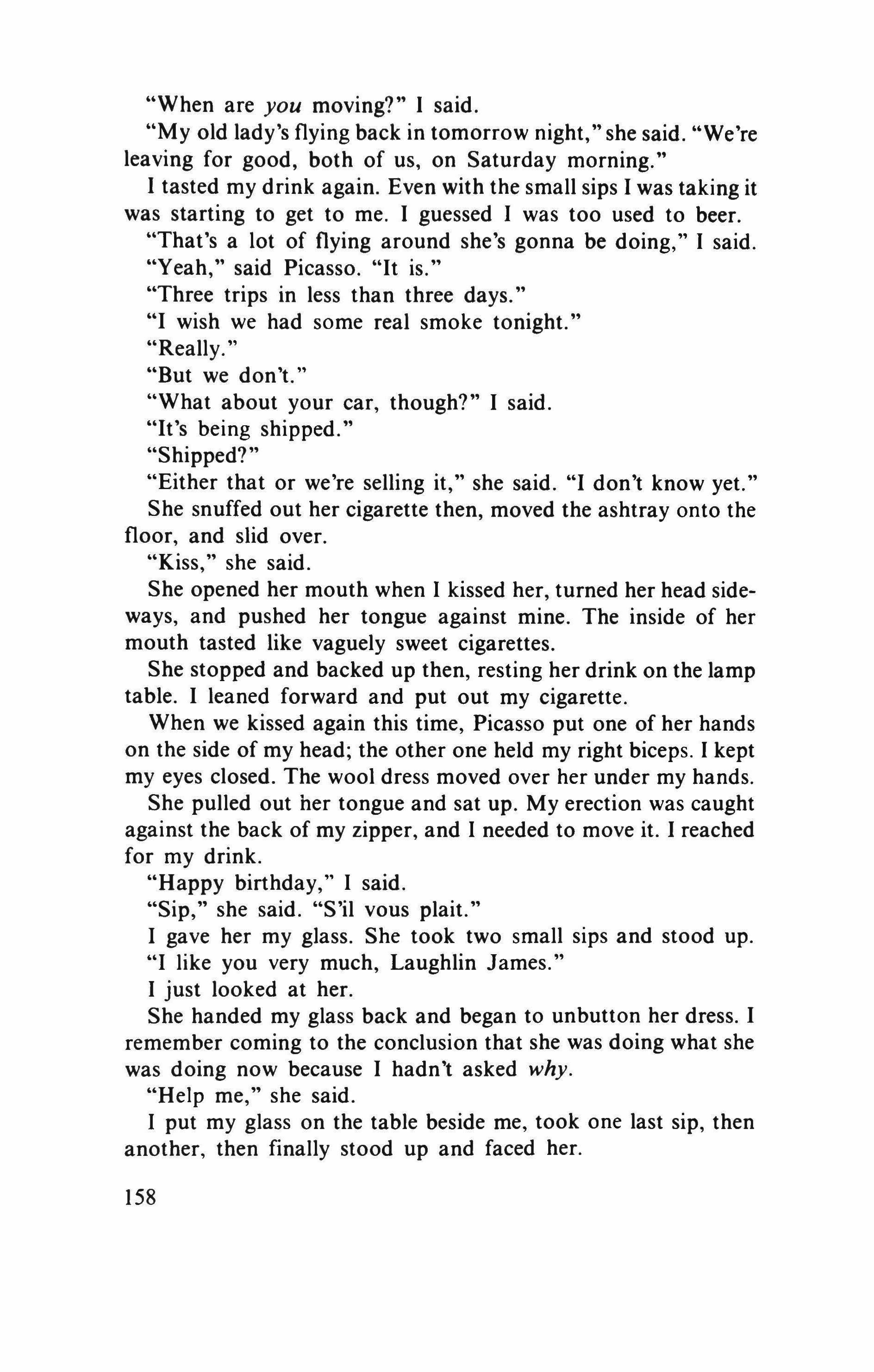
"When are you moving?" I said.
"Myoid lady's flying back in tomorrow night," she said. "We're leaving for good, both of us, on Saturday morning."
I tasted my drink again. Even with the small sips 1 was taking it was starting to get to me. 1 guessed 1 was too used to beer.
"That's a lot of flying around she's gonna be doing," 1 said.
"Yeah," said Picasso. "It is."
"Three trips in less than three days."
"I wish we had some real smoke tonight."
"Really.
"But we don't."
"What about your car, though?" 1 said.
"It's being shipped."
"Shipped?"
"Either that or we're selling it," she said. "I don't know yet."
She snuffed out her cigarette then, moved the ashtray onto the floor, and slid over.
"Kiss," she said.
She opened her mouth when I kissed her, turned her head sideways, and pushed her tongue against mine. The inside of her mouth tasted like vaguely sweet cigarettes.
She stopped and backed up then, resting her drink on the lamp table. 1 leaned forward and put out my cigarette.
When we kissed again this time, Picasso put one of her hands on the side of my head; the other one held my right biceps. I kept my eyes closed. The wool dress moved over her under my hands.
She pulled out her tongue and sat up. My erection was caught against the back of my zipper, and I needed to move it. 1 reached for my drink.
"Happy birthday," I said.
"Sip," she said. "S'il vous plait."
I gave her my glass. She took two small sips and stood up.
"I like you very much, Laughlin James."
1 just looked at her.
She handed my glass back and began to unbutton her dress. I remember coming to the conclusion that she was doing what she was doing now because I hadn't asked why.
"Help me," she said.
1 put my glass on the table beside me, took one last sip, then another, then finally stood up and faced her.
158
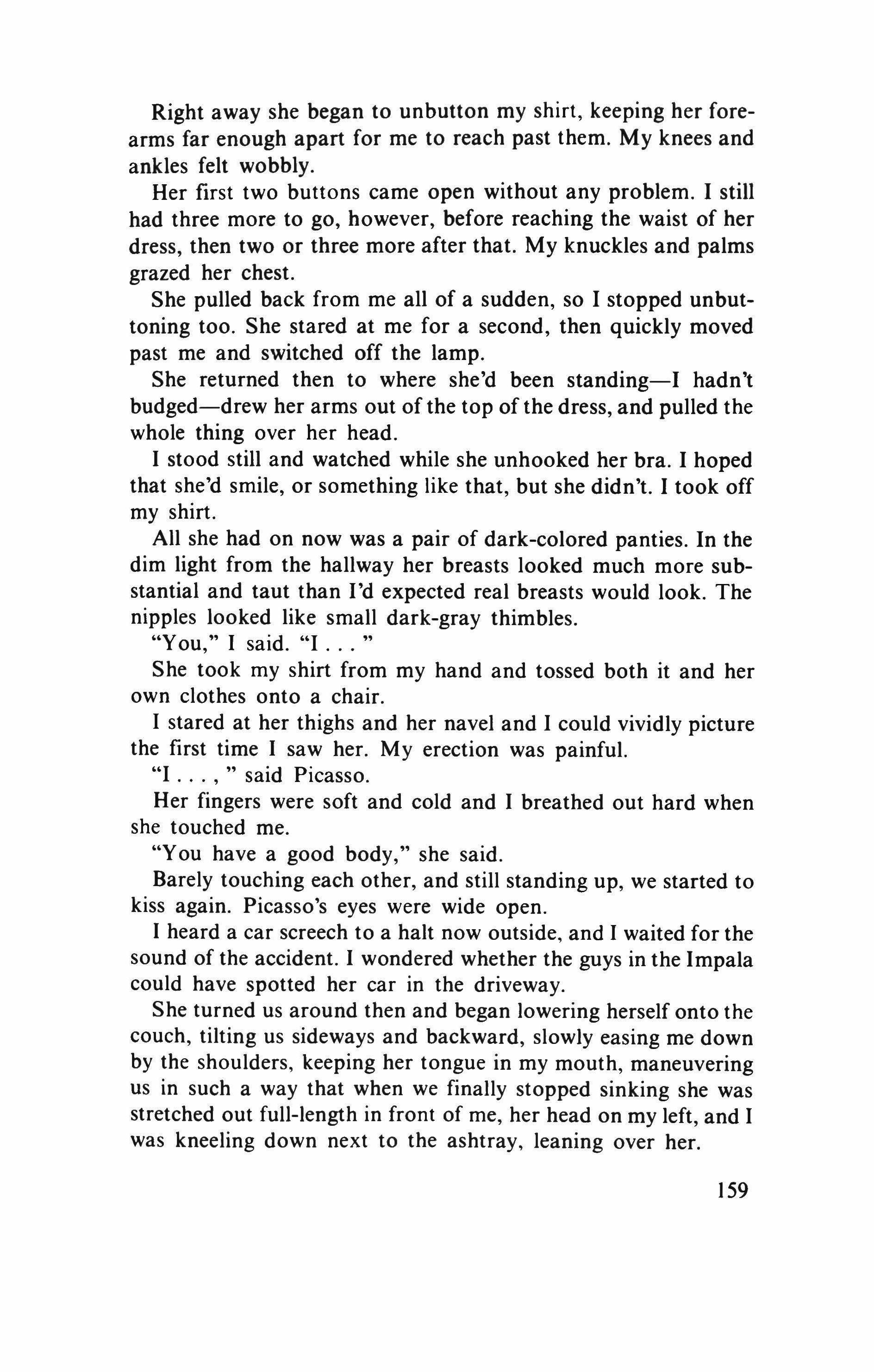
Right away she began to unbutton my shirt, keeping her forearms far enough apart for me to reach past them. My knees and ankles felt wobbly.
Her first two buttons came open without any problem. I still had three more to go, however, before reaching the waist of her dress, then two or three more after that. My knuckles and palms grazed her chest.
She pulled back from me all of a sudden, so I stopped unbuttoning too. She stared at me for a second, then quickly moved past me and switched off the lamp.
She returned then to where she'd been standing-I hadn't budged-drew her arms out of the top of the dress, and pulled the whole thing over her head.
I stood still and watched while she unhooked her bra. I hoped that she'd smile, or something like that, but she didn't. 1 took off my shirt.
All she had on now was a pair of dark-colored panties. In the dim light from the hallway her breasts looked much more substantial and taut than I'd expected real breasts would look. The nipples looked like small dark-gray thimbles.
"You," I said. "I
She took my shirt from my hand and tossed both it and her own clothes onto a chair.
I stared at her thighs and her navel and I could vividly picture the first time I saw her. My erection was painful.
"I said Picasso.
Her fingers were soft and cold and I breathed out hard when she touched me.
"Y ou have a good body," she said.
Barely touching each other, and still standing up, we started to kiss again. Picasso's eyes were wide open.
I heard a car screech to a halt now outside, and I waited for the sound of the accident. I wondered whether the guys in the Impala could have spotted her car in the driveway.
She turned us around then and began lowering herself onto the couch, tilting us sideways and backward, slowly easing me down by the shoulders, keeping her tongue in my mouth, maneuvering us in such a way that when we finally stopped sinking she was stretched out full-length in front of me, her head on my left, and I was kneeling down next to the ashtray, leaning over her.
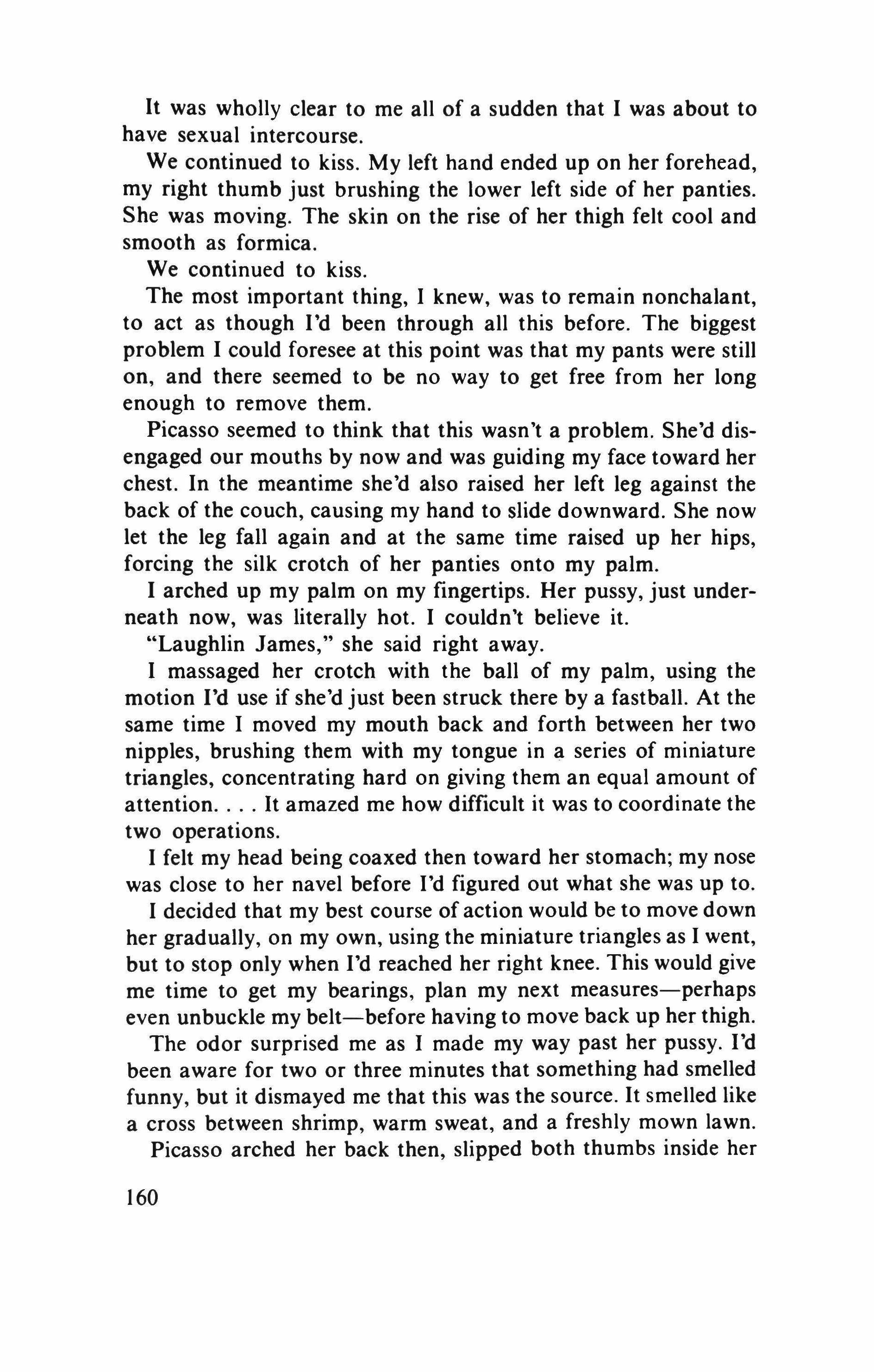
It was wholly clear to me all of a sudden that I was about to have sexual intercourse.
We continued to kiss. My left hand ended up on her forehead, my right thumb just brushing the lower left side of her panties. She was moving. The skin on the rise of her thigh felt cool and smooth as formica.
We continued to kiss.
The most important thing, I knew, was to remain nonchalant, to act as though I'd been through all this before. The biggest problem I could foresee at this point was that my pants were still on, and there seemed to be no way to get free from her long enough to remove them.
Picasso seemed to think that this wasn't a problem. She'd disengaged our mouths by now and was guiding my face toward her chest. In the meantime she'd also raised her left leg against the back of the couch, causing my hand to slide downward. She now let the leg fall again and at the same time raised up her hips, forcing the silk crotch of her panties onto my palm.
I arched up my palm on my fingertips. Her pussy, just underneath now, was literally hot. I couldn't believe it.
"Laughlin James," she said right away.
I massaged her crotch with the ball of my palm, using the motion I'd use if she'd just been struck there by a fastball. At the same time I moved my mouth back and forth between her two nipples, brushing them with my tongue in a series of miniature triangles, concentrating hard on giving them an equal amount of attention It amazed me how difficult it was to coordinate the two operations.
I felt my head being coaxed then toward her stomach; my nose was close to her navel before I'd figured out what she was up to.
I decided that my best course of action would be to move down her gradually, on my own, using the miniature triangles as I went, but to stop only when I'd reached her right knee. This would give me time to get my bearings, plan my next measures-perhaps even unbuckle my belt-before having to move back up her thigh.
The odor surprised me as I made my way past her pussy. I'd been aware for two or three minutes that something had smelled funny, but it dismayed me that this was the source. It smelled like a cross between shrimp, warm sweat, and a freshly mown lawn.
Picasso arched her back then, slipped both thumbs inside her 160

panties, and slowly pushed them down off her hips. The odor actually got stronger now, and I couldn't help wondering whether all this was normal.
Without hesitating, though-any more hesitation, I knew, would give away what I was thinking-I pulled the panties off her legs and tossed them onto the carpet.
I had to admit that her pussy looked interesting, especially the way her navel was centered so neatly above it. Beyond this her breasts rose and spread out across her, blocking my view of her shoulders. Her chin, pointing upward, was at the midpoint between them.
Her right foot dropped to the floor now, and I could feel her small toe pressed against the side of my knee. I concluded I was now to begin.
I'd been able to gather by then-from magazines, paperbacks, offhand observations in Snyder's, the backs of some poker decksthat a woman's most sensitive spot was her clitoris. They were "just like small cocks," someone had said. From dictionaries I'd also gotten a general idea of the whereabouts and function of ovaries, vulvas, aureolas, cervixes, vaginas, montes, and labia.
Picasso moaned and breathed in as soon as my tongue touched her labia. She was sopping. The smell was there, too, but from this range it seemed a lot sweeter. She tasted like sugary liver.
"Mr. Matthews," she said.
Keeping my hands on her thighs, I started to search for her clitoris.
Her own hands were again on my head, and she was using them now to control how hard I pressed down, where my mouth would go next, and how long I stayed at each spot.
After two or three minutes of thoroughly searching her, though, I started to wonder if Picasso did in fact have a clitoris. So far, even with her hands as my guide, I'd found nothing. The way she was groaning and writhing around, however, and from the tone of her voice when she called to me, she was acting as though I'd already found it. This confused me.
All of a sudden I felt my jawbone and neck being squeezed between her hard thighs. The only thing I could move was my tongue.
"Laughlin James," she said, almost calmly. She was trembling.
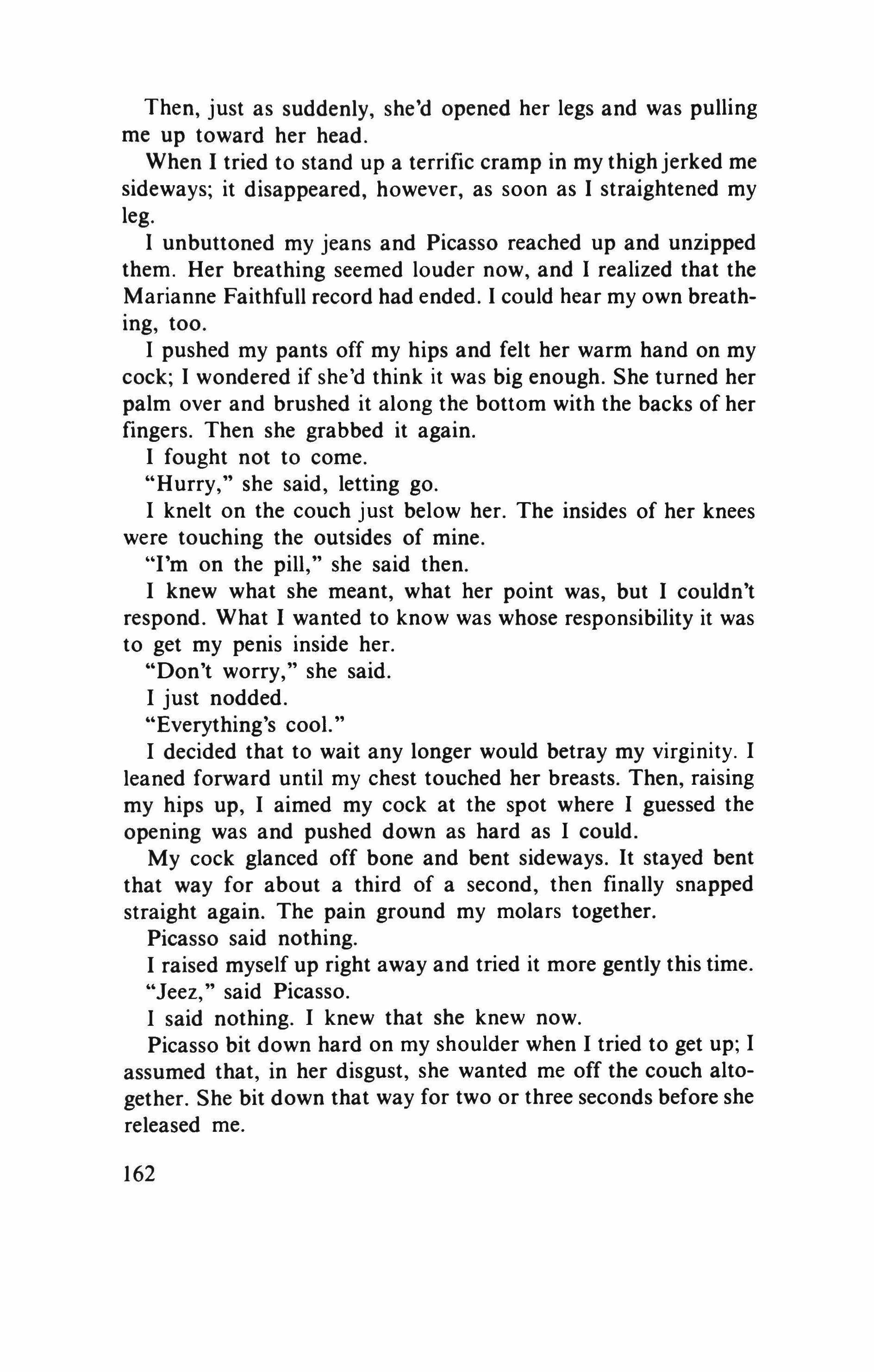
Then, just as suddenly, she'd opened her legs and was pulling me up toward her head.
When I tried to stand up a terrific cramp in my thighjerked me sideways; it disappeared, however, as soon as I straightened my leg.
I unbuttoned my jeans and Picasso reached up and unzipped them. Her breathing seemed louder now, and I realized that the Marianne Faithfull record had ended. I could hear my own breathing, too.
I pushed my pants off my hips and felt her warm hand on my cock; I wondered if she'd think it was big enough. She turned her palm over and brushed it along the bottom with the backs of her fingers. Then she grabbed it again.
I fought not to come.
"Hurry," she said, letting go.
I knelt on the couch just below her. The insides of her knees were touching the outsides of mine.
"I'm on the pill," she said then.
I knew what she meant, what her point was, but I couldn't respond. What I wanted to know was whose responsibility it was to get my penis inside her.
"Don't worry," she said.
I just nodded.
"Everything's cool."
I decided that to wait any longer would betray my virginity. I leaned forward until my chest touched her breasts. Then, raising my hips up, I aimed my cock at the spot where I guessed the opening was and pushed down as hard as I could.
My cock glanced off bone and bent sideways. It stayed bent that way for about a third of a second, then finally snapped straight again. The pain ground my molars together.
Picasso said nothing.
I raised myself up right away and tried it more gently this time.
"Jeez," said Picasso.
I said nothing. I knew that she knew now.
Picasso bit down hard on my shoulder when I tried to get up; I assumed that, in her disgust, she wanted me off the couch altogether. She bit down that way for two or three seconds before she released me.
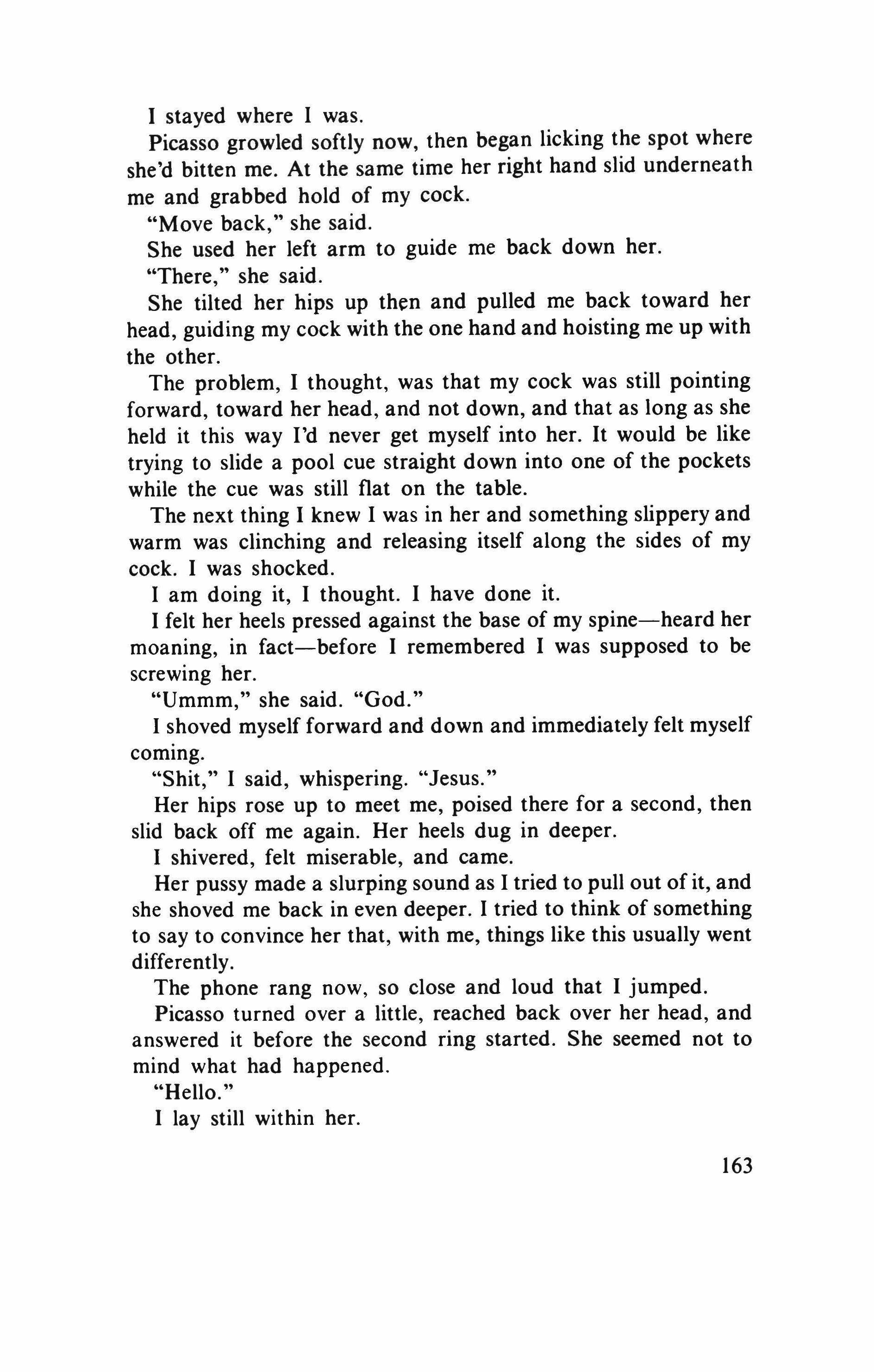
I stayed where I was.
Picasso growled softly now, then began licking the spot where she'd bitten me. At the same time her right hand slid underneath me and grabbed hold of my cock.
"Move back," she said.
She used her left arm to guide me back down her.
"There," she said.
She tilted her hips up then and pulled me back toward her head, guiding my cock with the one hand and hoisting me up with the other.
The problem, I thought, was that my cock was still pointing forward, toward her head, and not down, and that as long as she held it this way I'd never get myself into her. It would be like trying to slide a pool cue straight down into one of the pockets while the cue was still flat on the table.
The next thing I knew I was in her and something slippery and warm was clinching and releasing itself along the sides of my cock. I was shocked.
I am doing it, I thought. I have done it.
I felt her heels pressed against the base of my spine-heard her moaning, in fact-before I remembered I was supposed to be screwing her.
"Ummm," she said. "God."
I shoved myself forward and down and immediately felt myself coming.
"Shit," I said, whispering. "Jesus."
Her hips rose up to meet me, poised there for a second, then slid back off me again. Her heels dug in deeper.
I shivered, felt miserable, and came.
Her pussy made a slurping sound as I tried to pull out of it, and she shoved me back in even deeper. I tried to think of something to say to convince her that, with me, things like this usually went differently.
The phone rang now, so close and loud that I jumped.
Picasso turned over a little, reached back over her head, and answered it before the second ring started. She seemed not to mind what had happened.
"Hello.
I lay still within her.
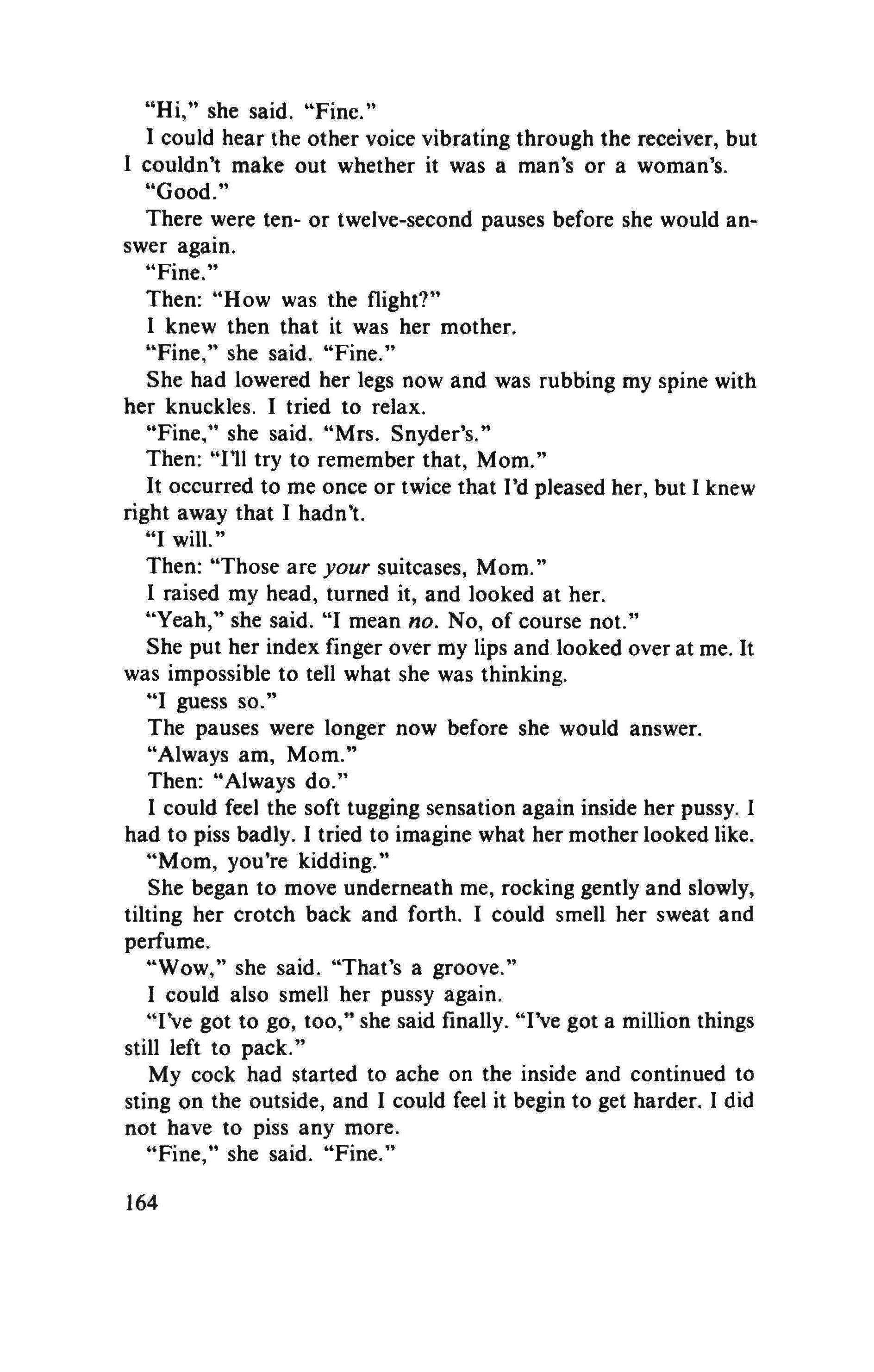
"Hi," she said. "Fine."
I could hear the other voice vibrating through the receiver, but I couldn't make out whether it was a man's or a woman's. "Good."
There were ten- or twelve-second pauses before she would answer again. "Fine."
Then: "How was the flight?"
I knew then that it was her mother. "Fine," she said. "Fine."
She had lowered her legs now and was rubbing my spine with her knuckles. I tried to relax.
"Fine," she said. "Mrs. Snyder's."
Then: "I'll try to remember that, Mom."
It occurred to me once or twice that I'd pleased her, but I knew right away that I hadn't. "I will."
Then: "Those are your suitcases, Mom."
I raised my head, turned it, and looked at her.
"Yeah," she said. "I mean no. No, of course not."
She put her index finger over my lips and looked over at me. It was impossible to tell what she was thinking. "I guess so."
The pauses were longer now before she would answer. "Always am, Mom."
Then: "Always do."
I could feel the soft tugging sensation again inside her pussy. I had to piss badly. I tried to imagine what her mother looked like.
"Mom, you're kidding."
She began to move underneath me, rocking gently and slowly, tilting her crotch back and forth. I could smell her sweat and perfume.
"Wow," she said. "That's a groove."
I could also smell her pussy again.
"I've got to go, too," she said finally. "I've got a million things still left to pack."
My cock had started to ache on the inside and continued to sting on the outside, and I could feel it begin to get harder. I did not have to piss any more.
"Fine," she said. "Fine."

I put her left nipple into my mouth and she pressed my face firmly against her.
"I won't, Mom. Don't worry."
Then: "Don't worry, Mom. It's all written down on that pad."
Her mother went on now for over a minute.
"I know that," Picasso said then. "And I will."
She kissed the receiver. "You too," she said. "Bye."
1 could hear her heart beating.
"See you tomorrow," she said, then reached back and hung up the phone.
"Exactly where were we?" she said.
1 eased myself further into her. "Was that your mother?"
"Oh yeah," she said, pushing back. "Sure. 1 remember."
I began to shove myself into her as fast and as hard as I could, saying nothing, doing my best not to throw myself off my rhythm. 1 could sense that this time my cock would stay hard a lot longer.
"Laughlin James Matthews," she said.
The harder 1 pushed now, however, the farther her hips inched away from me, and the tangle of pants at my knees made it impossible to move up the couch with her while at the same time keeping my rhythm.
"Move back," she said, kissing my shoulder.
We shimmied ourselves down the couch until my heels touched the arm.
"All set?" she said.
"I think," I said. "Yes."
She raised her hands over her head now, braced herself against that arm, and we both began pushing off.
More than anything now I wanted my buddies at Snyder's and school to know what was happening. Not tonight, of course, but eventually; not for me to have to announce it, or for Picasso to tell anyone, but for the guys to somehow find it all out on their own; and then for me to still never mention it.
"That's it," she said, taking short fast breaths through her mouth. "Laughlin James."
I said nothing. My face was wedged between her neck and her collarbone. I was thinking.
She brought her arms down and began kneading the sides of my hips, then said my name one more time. I said nothing. Later I raised myself up on my hands and looked down at her.
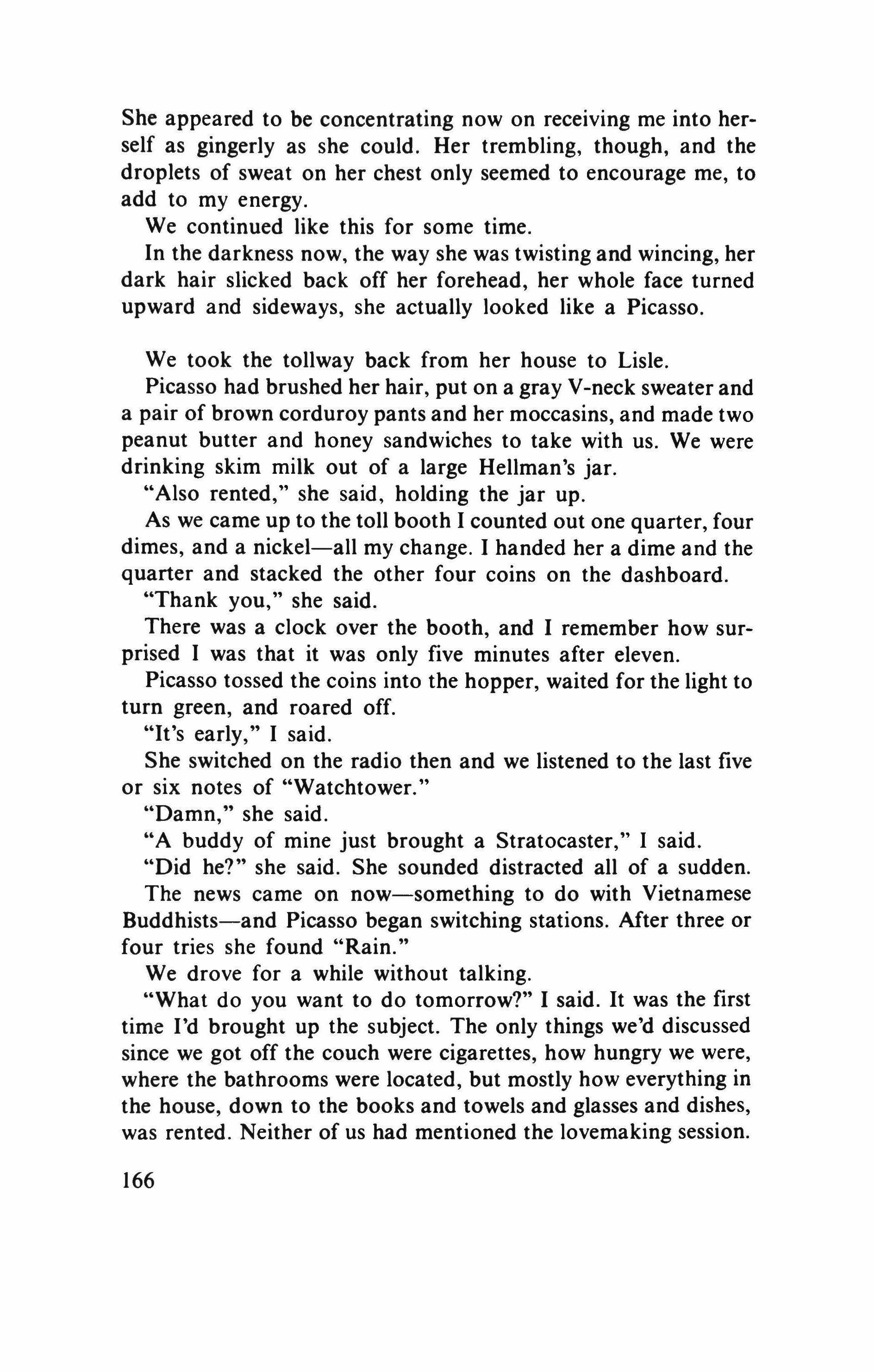
She appeared to be concentrating now on receiving me into herself as gingerly as she could. Her trembling, though, and the droplets of sweat on her chest only seemed to encourage me, to add to my energy.
We continued like this for some time.
In the darkness now, the way she was twisting and wincing, her dark hair slicked back off her forehead, her whole face turned upward and sideways, she actually looked like a Picasso.
We took the tollway back from her house to Lisle.
Picasso had brushed her hair, put on a gray V-neck sweater and a pair of brown corduroy pants and her moccasins, and made two peanut butter and honey sandwiches to take with us. We were drinking skim milk out of a large Hellman's jar.
"Also rented," she said, holding the jar up.
As we came up to the toll booth I counted out one quarter, four dimes, and a nickel-all my change. I handed her a dime and the quarter and stacked the other four coins on the dashboard.
"Thank you," she said.
There was a clock over the booth, and I remember how surprised I was that it was only five minutes after eleven.
Picasso tossed the coins into the hopper, waited for the light to turn green, and roared off.
"It's early," I said.
She switched on the radio then and we listened to the last five or six notes of "Watchtower."
"Damn," she said.
"A buddy of mine just brought a Stratocaster," I said.
"Did he?" she said. She sounded distracted all of a sudden.
The news came on now-something to do with Vietnamese Buddhists-and Picasso began switching stations. After three or four tries she found "Rain."
We drove for a while without talking.
"What do you want to do tomorrow?" I said. It was the first time I'd brought up the subject. The only things we'd discussed since we got off the couch were cigarettes, how hungry we were, where the bathrooms were located, but mostly how everything in the house, down to the books and towels and glasses and dishes, was rented. Neither of us had mentioned the lovemaking session.
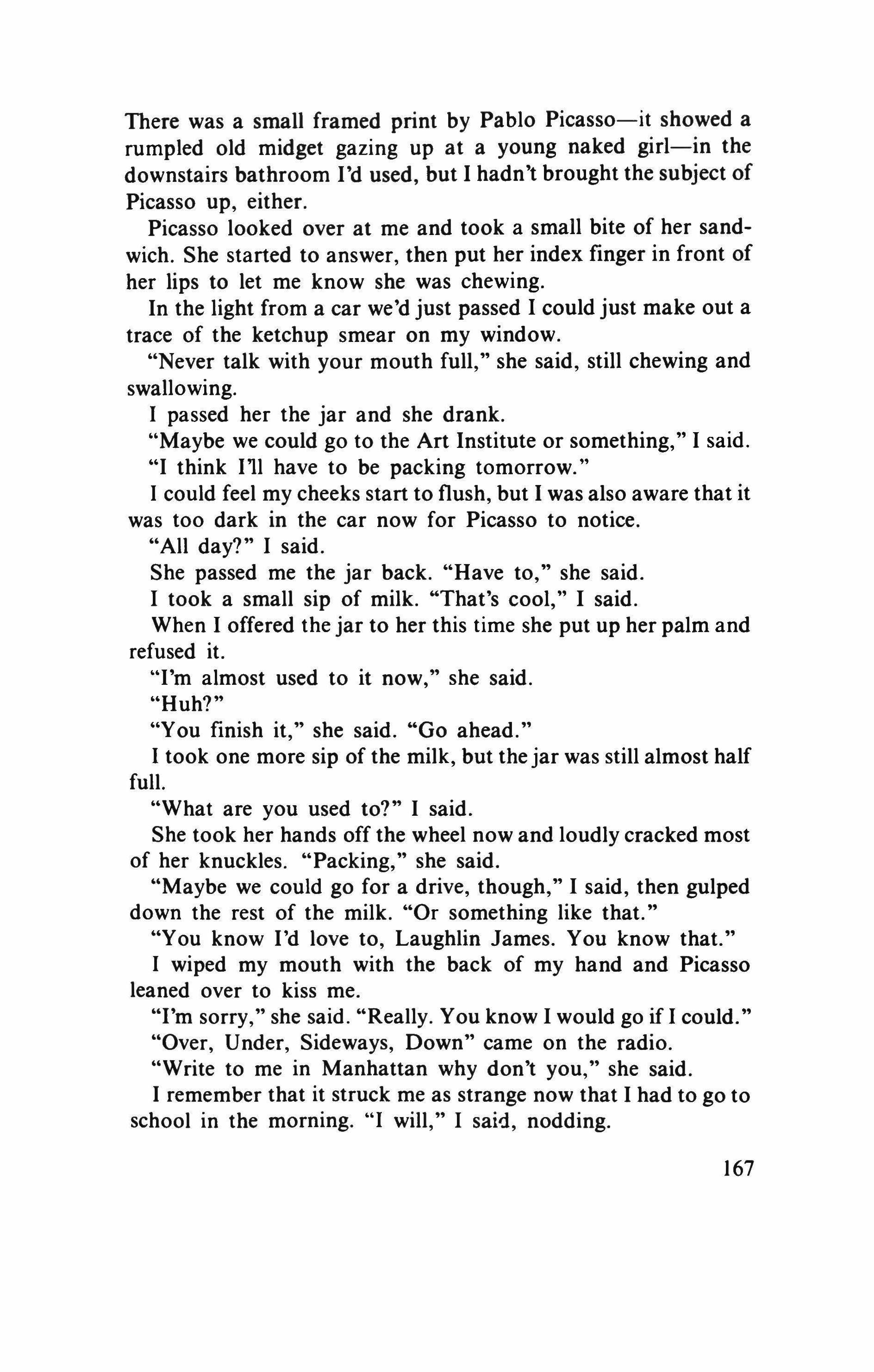
There was a small framed print by Pablo Picasso-it showed a rumpled old midget gazing up at a young naked girl-in the downstairs bathroom I'd used, but I hadn't brought the subject of Picasso up, either.
Picasso looked over at me and took a small bite of her sandwich. She started to answer, then put her index finger in front of her lips to let me know she was chewing.
In the light from a car we'd just passed I could just make out a trace of the ketchup smear on my window.
"Never talk with your mouth full," she said, still chewing and swallowing.
I passed her the jar and she drank.
"Maybe we could go to the Art Institute or something," I said.
"I think 111 have to be packing tomorrow."
I could feel my cheeks start to flush, but I was also aware that it was too dark in the car now for Picasso to notice.
"All day?" I said.
She passed me the jar back. "Have to," she said.
I took a small sip of milk. "That's cool," I said.
When I offered the jar to her this time she put up her palm and refused it.
"I'm almost used to it now," she said.
"Huh?"
"You finish it," she said. "Go ahead."
I took one more sip of the milk, but the jar was still almost half full.
"What are you used to?" I said.
She took her hands off the wheel now and loudly cracked most of her knuckles. "Packing," she said.
"Maybe we could go for a drive, though," I said, then gulped down the rest of the milk. "Or something like that."
"You know I'd love to, Laughlin James. You know that."
I wiped my mouth with the back of my hand and Picasso leaned over to kiss me.
"I'm sorry," she said. "Really. You know I would go if I could."
"Over, Under, Sideways, Down" came on the radio.
"Write to me in Manhattan why don't you," she said.
I remember that it struck me as strange now that I had to go to school in the morning. "I will," I said, nodding. 167
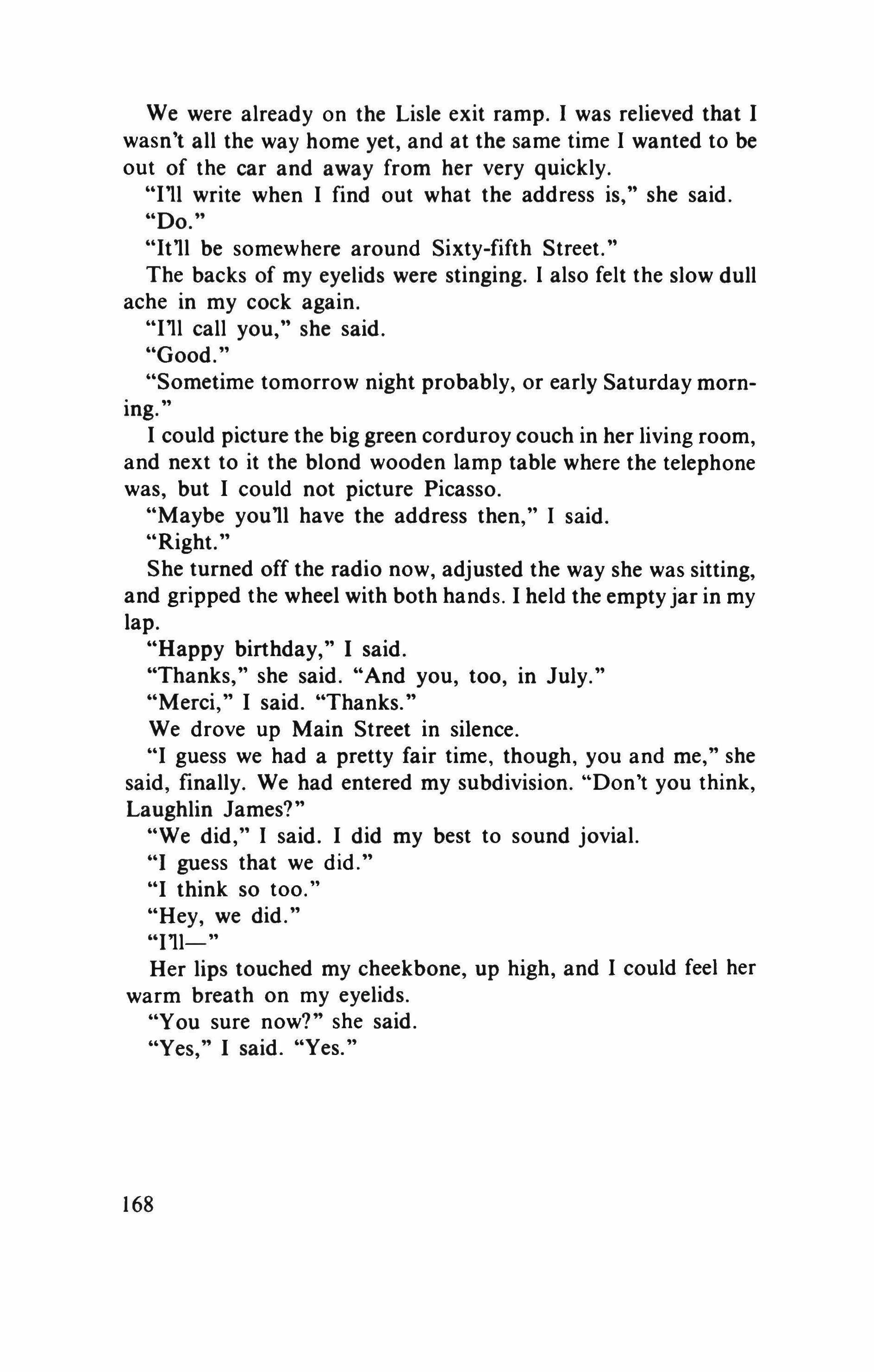
We were already on the Lisle exit ramp. 1 was relieved that 1 wasn't all the way home yet, and at the same time 1 wanted to be out of the car and away from her very quickly.
"111 write when 1 find out what the address is," she said. "Do."
"It'll be somewhere around Sixty-fifth Street."
The backs of my eyelids were stinging. I also felt the slow dull ache in my cock again.
"111 call you," she said. "Good."
"Sometime tomorrow night probably, or early Saturday morning."
1 could picture the big green corduroy couch in her living room, and next to it the blond wooden lamp table where the telephone was, but 1 could not picture Picasso.
"Maybe you'll have the address then," 1 said. "Right."
She turned off the radio now, adjusted the way she was sitting, and gripped the wheel with both hands. 1 held the emptyjar in my lap.
"Happy birthday," 1 said. "Thanks," she said. "And you, too, in July."
"Merci," 1 said. "Thanks."
We drove up Main Street in silence.
"I guess we had a pretty fair time, though, you and me," she said, finally. We had entered my subdivision. "Don't you think, Laughlin James?"
"We did," 1 said. 1 did my best to sound jovial.
"I guess that we did."
"I think so too."
"Hey, we did."
"111-"
Her lips touched my cheekbone, up high, and 1 could feel her warm breath on my eyelids.
"You sure now?" she said. "Yes," 1 said. "Yes."

He looked in the side door of the Cowboy Bar and Grill, smoke thick, the juke loud, the air full of hamburger grease. A couple of the hands from the Lazy D called out to him, "Hey, Matt!" But he just waved at them. Most of the guys were half crocked already and it was only nine P.M. Better to be alone, he decided. He bought a pint of apricot brandy at the Liquor Drive-in, snugged it into his pocket. "Where you heading?" Verna asked him through the Drive-in window, her little sausage curls bouncing. But he just winked. What the hell, so he was doing his laundry-no need to tell her that. No need to advertise.
He pulled his muddy pickup right up to the door of the Laundromat, the headlights beaming into the bright, empty room. The Laundromat smelled of soap and mold, the windows still steamed up from a busy afternoon. After the crisp October air outside, Matt found it hard to get his breath. He stuffed his Levis into one washer, his shirts, towels, long johns into another, poured in the little boxes of detergent he bought from the dispenser. Then he unsnapped the checked shirt he was wearing and dropped that in, too. He shoved his quarters into the coin tray and watched until the suds boiled up against the glass. He pulled a paper cup from the dispenser in the bathroom, poured in some brandy, dragged a 169
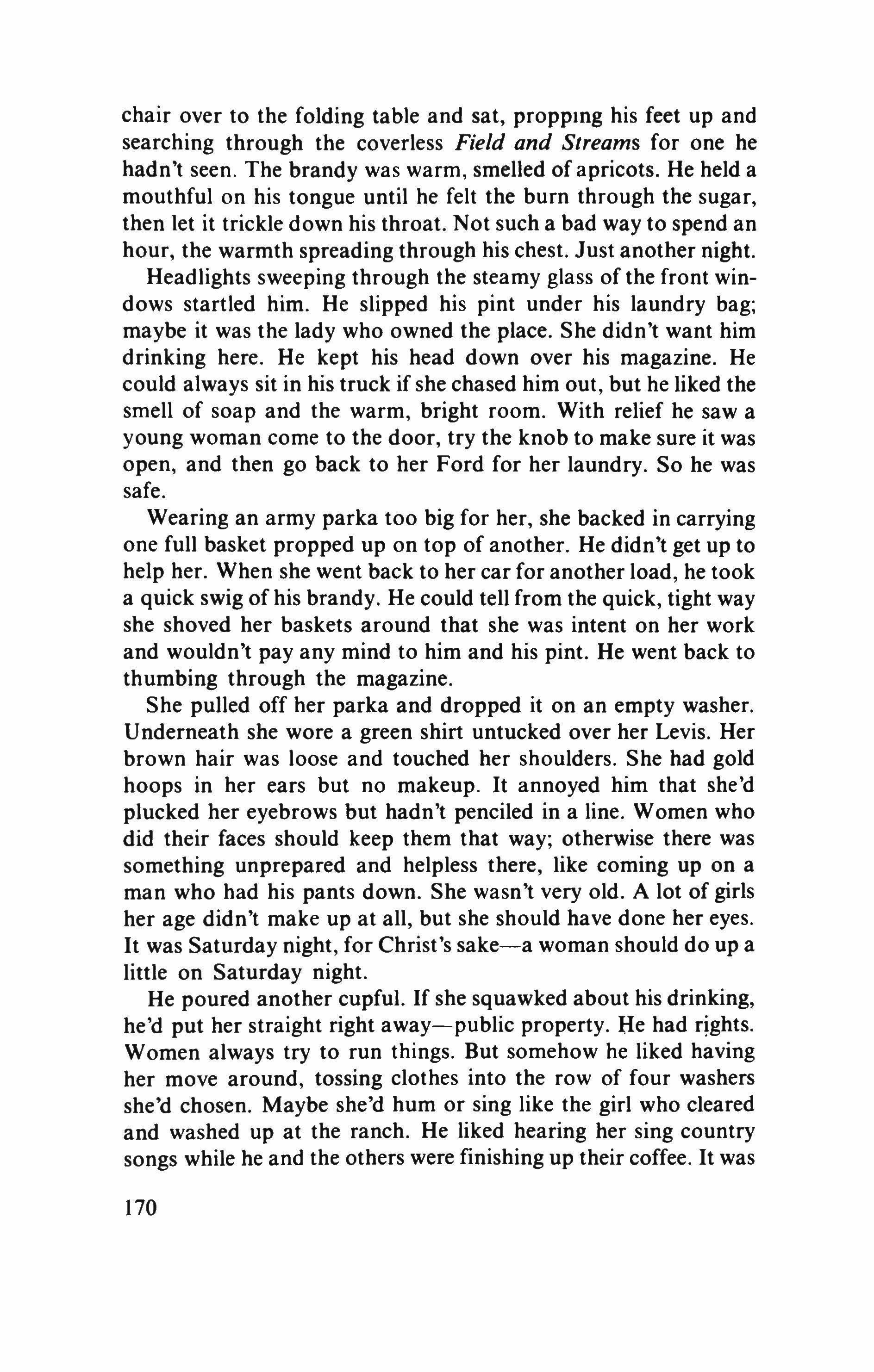
chair over to the folding table and sat, propping his feet up and searching through the coverless Field and Streams for one he hadn't seen. The brandy was warm, smelled of apricots. He held a mouthful on his tongue until he felt the burn through the sugar, then let it trickle down his throat. Not such a bad way to spend an hour, the warmth spreading through his chest. Just another night.
Headlights sweeping through the steamy glass of the front windows startled him. He slipped his pint under his laundry bag; maybe it was the lady who owned the place. She didn't want him drinking here. He kept his head down over his magazine. He could always sit in his truck if she chased him out, but he liked the smell of soap and the warm, bright room. With relief he saw a young woman come to the door, try the knob to make sure it was open, and then go back to her Ford for her laundry. So he was safe.
Wearing an army parka too big for her, she backed in carrying one full basket propped up on top of another. He didn't get up to help her. When she went back to her car for another load, he took a quick swig of his brandy. He could tell from the quick, tight way she shoved her baskets around that she was intent on her work and wouldn't pay any mind to him and his pint. He went back to thumbing through the magazine.
She pulled off her parka and dropped it on an empty washer. Underneath she wore a green shirt untucked over her Levis. Her brown hair was loose and touched her shoulders. She had gold hoops in her ears but no makeup. It annoyed him that she'd plucked her eyebrows but hadn't penciled in a line. Women who did their faces should keep them that way; otherwise there was something unprepared and helpless there, like coming up on a man who had his pants down. She wasn't very old. A lot of girls her age didn't make up at all, but she should have done her eyes. It was Saturday night, for Christ's sake-a woman should do up a little on Saturday night.
He poured another cupful. If she squawked about his drinking, he'd put her straight right away-public property. lie had rights, Women always try to run things. But somehow he liked having her move around, tossing clothes into the row of four washers she'd chosen. Maybe she'd hum or sing like the girl who cleared and washed up at the ranch. He liked hearing her sing country songs while he and the others were finishing up their coffee. It was
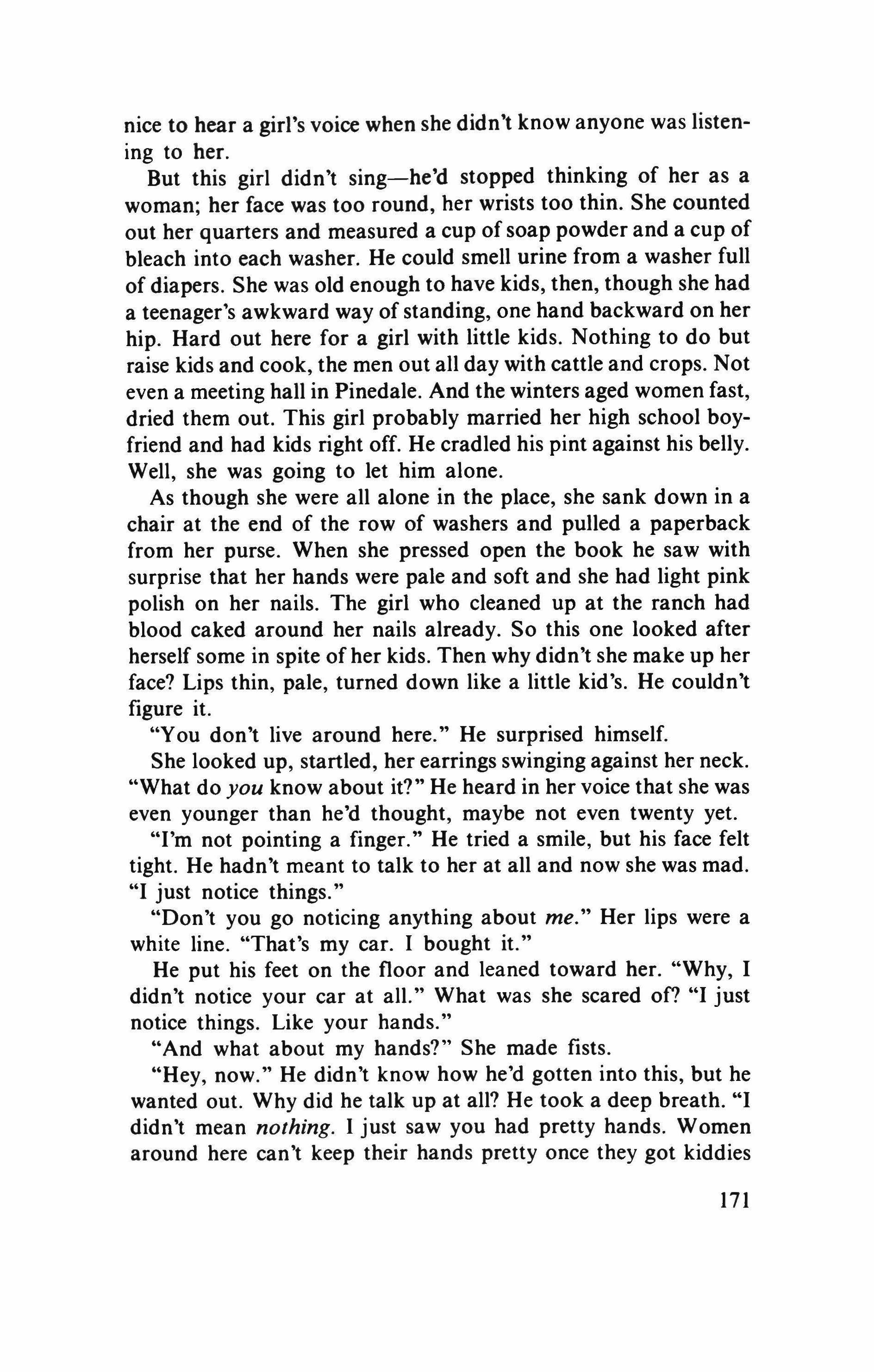
nice to hear a girl's voice when she didn't know anyone was listening to her.
But this girl didn't sing-he'd stopped thinking of her as a woman; her face was too round, her wrists too thin. She counted out her quarters and measured a cup of soap powder and a cup of bleach into each washer. He could smell urine from a washer full of diapers. She was old enough to have kids, then, though she had a teenager's awkward way of standing, one hand backward on her hip. Hard out here for a girl with little kids. Nothing to do but raise kids and cook, the men out all day with cattle and crops. Not even a meeting hall in Pinedale. And the winters aged women fast, dried them out. This girl probably married her high school boyfriend and had kids right off. He cradled his pint against his belly. Well, she was going to let him alone.
As though she were all alone in the place, she sank down in a chair at the end of the row of washers and pulled a paperback from her purse. When she pressed open the book he saw with surprise that her hands were pale and soft and she had light pink polish on her nails. The girl who cleaned up at the ranch had blood caked around her nails already. So this one looked after herself some in spite of her kids. Then why didn't she make up her face? Lips thin, pale, turned down like a little kid's. He couldn't figure it.
"You don't live around here." He surprised himself.
She looked up, startled, her earrings swinging against her neck. "What do you know about it?" He heard in her voice that she was even younger than he'd thought, maybe not even twenty yet.
"I'm not pointing a finger." He tried a smile, but his face felt tight. He hadn't meant to talk to her at all and now she was mad.
"I just notice things."
"Don't you go noticing anything about me." Her lips were a white line. "That's my car. 1 bought it."
He put his feet on the floor and leaned toward her. "Why, I didn't notice your car at all." What was she scared of? "I just notice things. Like your hands."
"And what about my hands?" She made fists.
"Hey, now." He didn't know how he'd gotten into this, but he wanted out. Why did he talk up at all? He took a deep breath. "I didn't mean nothing. I just saw you had pretty hands. Women around here can't keep their hands pretty once they got kiddies

and such." This time his smile came off better. "Just an old cowpoke paying attention. Nothing to trouble you about that."
Her eyes were wide and greener than her shirt. A quick wash of tears came up.
"Come on, now," he said. "Don't take it serious. I just saw you're a young momma with pretty hands. That don't need to hurt none. I'm sorry I spoke up."
She didn't blink back the tears. Her eyes stayed fixed on his, and he knew she was seeing him through a haze. She didn't have manners. He felt unshaven, dirty, even though he showered and shaved that afternoon. She was looking at him too hard. He'd have to go sit in his truck after all. "Sorry. That's all I got to say."
She didn't look away. What to do? He held out the bottle. "Got some brandy here. Make you feel better."
She shook her head, looked down into her book. Hell with her, let her brood. He felt like throwing his chair at the wall. He'd been at peace, even content. Now he didn't know whether to stay or go. If he walked out she'd think he was mad at her; if he stayed he'd spend the next hour tippy-toeing around. She took up the whole room, and her silence was louder than the washers swishing.
"I'll take that brandy." She didn't get up; he crossed to her and poured her some. Her hand was shaking, her palm soft and pink. No wedding ring. "I'm just tired, I guess," she said.
He sat down again, easier. Maybe she'd run off with a fella; maybe he'd left her with kids. Well, he didn't want to know any more. He opened his magazine and pretended to read. In a minute it would be time to move his laundry to a dryer, and then it would be natural to put on his coat and leave for a while. He could run the motor in his truck and play the radio.
But she picked up her purse and her stack of dimes and came over to sit down by him. She crossed her legs. New, expensive boots, the kind dudes wore. "I'm sorry," she said. "You seem real nice. I'm just plain jumpy, and that don't have nothing to do with you.
"Just a mistake." He looked down at his magazine, at his hands, knuckles knobby with arthritis, scars on his palms from roping. 172
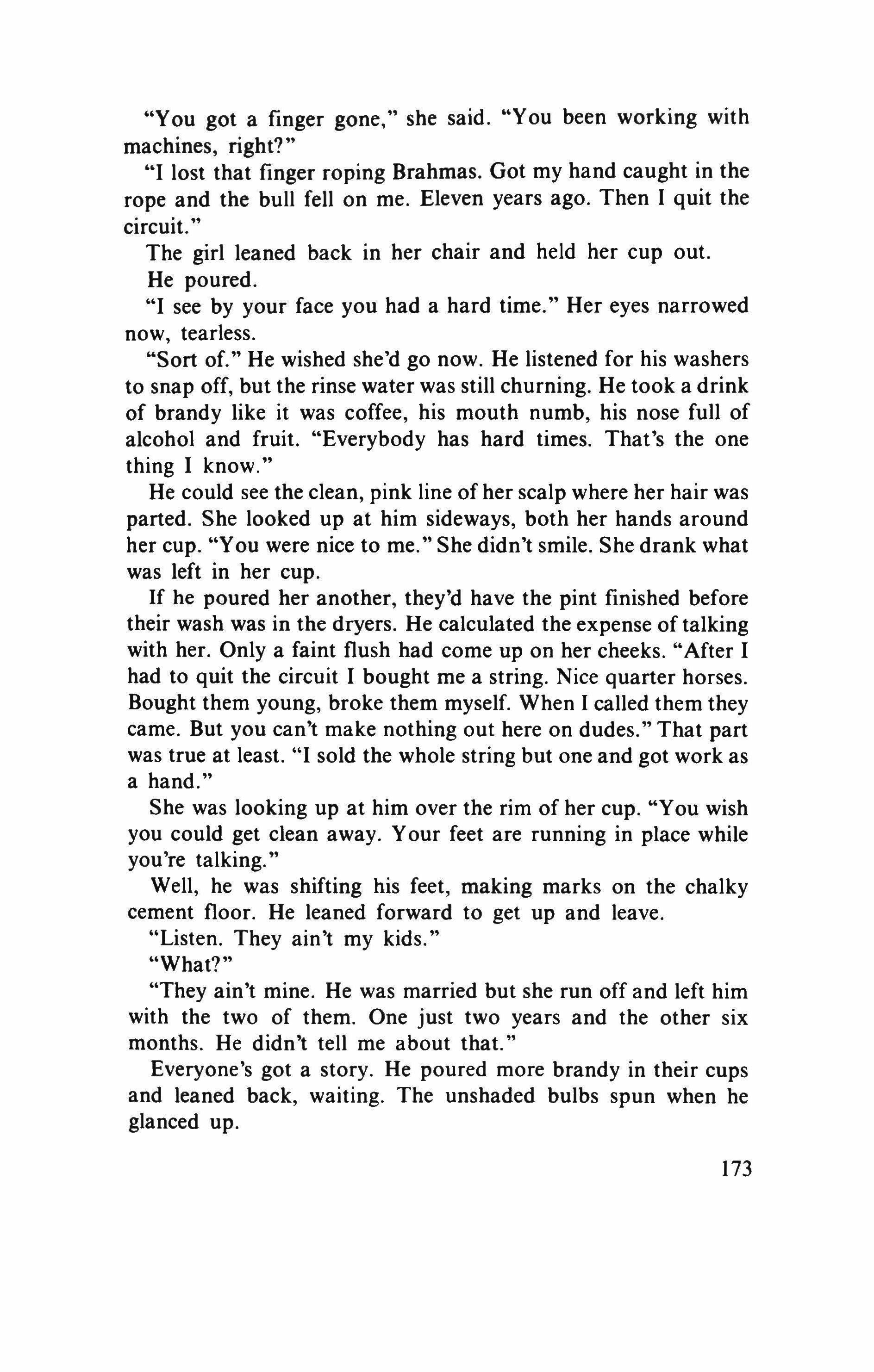
"You got a finger gone," she said. "You been working with machines, right?"
"I lost that finger roping Brahmas. Got my hand caught in the rope and the bull fell on me. Eleven years ago. Then I quit the circuit.
The girl leaned back in her chair and held her cup out. He poured.
"I see by your face you had a hard time." Her eyes narrowed now, tearless.
"Sort of." He wished she'd go now. He listened for his washers to snap off, but the rinse water was still churning. He took a drink of brandy like it was coffee, his mouth numb, his nose full of alcohol and fruit. "Everybody has hard times. That's the one thing 1 know."
He could see the clean, pink line of her scalp where her hair was parted. She looked up at him sideways, both her hands around her cup. "You were nice to me." She didn't smile. She drank what was left in her cup.
If he poured her another, they'd have the pint finished before their wash was in the dryers. He calculated the expense of talking with her. Only a faint flush had come up on her cheeks. "After 1 had to quit the circuit 1 bought me a string. Nice quarter horses. Bought them young, broke them myself. When I called them they came. But you can't make nothing out here on dudes." That part was true at least. "I sold the whole string but one and got work as a hand."
She was looking up at him over the rim of her cup. "You wish you could get clean away. Your feet are running in place while you're talking."
Well, he was shifting his feet, making marks on the chalky cement floor. He leaned forward to get up and leave.
"Listen. They ain't my kids."
"What?"
"They ain't mine. He was married but she run off and left him with the two of them. One just two years and the other six months. He didn't tell me about that."
Everyone's got a story. He poured more brandy in their cups and leaned back, waiting. The unshaded bulbs spun when he glanced up.
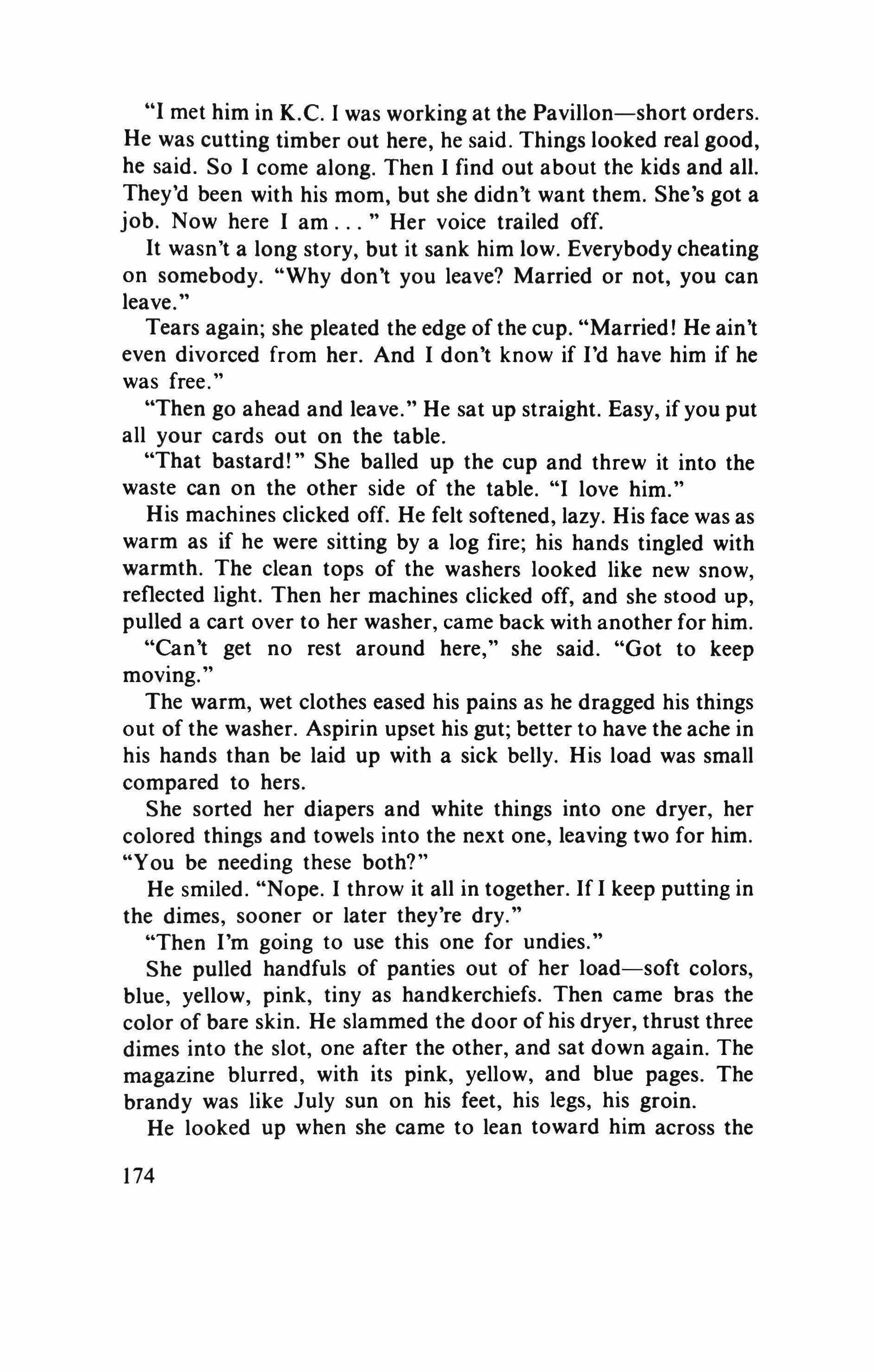
"I met him in K.C. I was working at the Pavillon-short orders. He was cutting timber out here, he said. Things looked real good, he said. So I come along. Then I find out about the kids and all. They'd been with his mom, but she didn't want them. She's got a job. Now here I am Her voice trailed off. It wasn't a long story, but it sank him low. Everybody cheating on somebody. "Why don't you leave? Married or not, you can leave."
Tears again; she pleated the edge of the cup. "Married! He ain't even divorced from her. And 1 don't know if I'd have him if he was free."
"Then go ahead and leave." He sat up straight. Easy, if you put all your cards out on the table.
"That bastard!" She balled up the cup and threw it into the waste can on the other side of the table. "I love him."
His machines clicked off. He felt softened, lazy. His face was as warm as if he were sitting by a log fire; his hands tingled with warmth. The clean tops of the washers looked like new snow, reflected light. Then her machines clicked off, and she stood up, pulled a cart over to her washer, came back with another for him.
"Can't get no rest around here," she said. "Got to keep moving."
The warm, wet clothes eased his pains as he dragged his things out of the washer. Aspirin upset his gut; better to have the ache in his hands than be laid up with a sick belly. His load was small compared to hers.
She sorted her diapers and white things into one dryer, her colored things and towels into the next one, leaving two for him. "You be needing these both?"
He smiled. "Nope. I throw it all in together. If 1 keep putting in the dimes, sooner or later they're dry."
"Then I'm going to use this one for undies."
She pulled handfuls of panties out of her load-soft colors, blue, yellow, pink, tiny as handkerchiefs. Then came bras the color of bare skin. He slammed the door of his dryer, thrust three dimes into the slot, one after the other, and sat down again. The magazine blurred, with its pink, yellow, and blue pages. The brandy was like July sun on his feet, his legs, his groin.
He looked up when she came to lean toward him across the
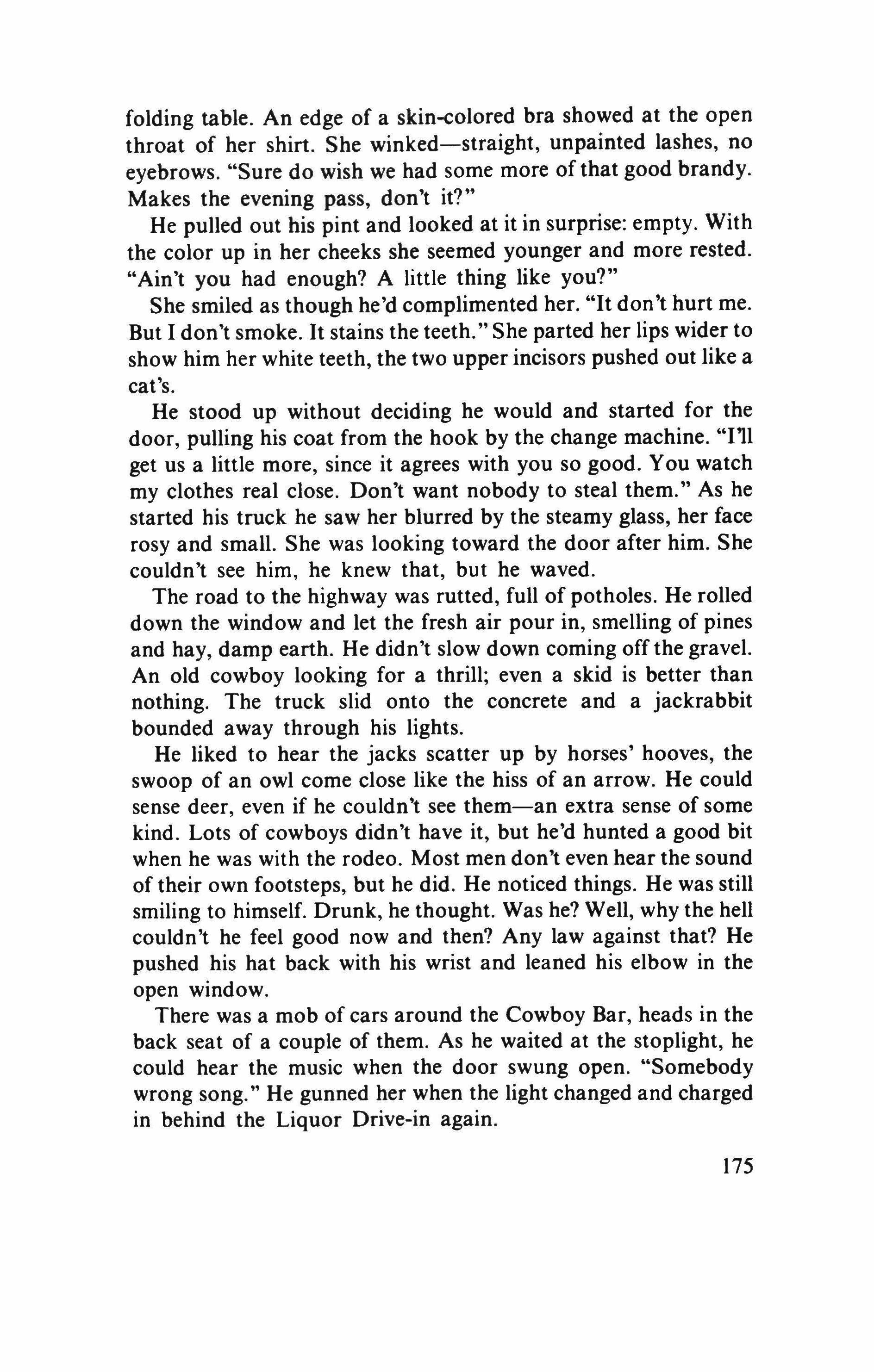
folding table. An edge of a skin-colored bra showed at the open throat of her shirt. She winked-straight, unpainted lashes, no eyebrows. "Sure do wish we had some more of that good brandy. Makes the evening pass, don't it?"
He pulled out his pint and looked at it in surprise: empty. With the color up in her cheeks she seemed younger and more rested. "Ain't you had enough? A little thing like you?"
She smiled as though he'd complimented her. "It don't hurt me. But I don't smoke. It stains the teeth." She parted her lips wider to show him her white teeth, the two upper incisors pushed out like a cat's.
He stood up without deciding he would and started for the door, pulling his coat from the hook by the change machine. "I'll get us a little more, since it agrees with you so good. You watch my clothes real close. Don't want nobody to steal them." As he started his truck he saw her blurred by the steamy glass, her face rosy and small. She was looking toward the door after him. She couldn't see him, he knew that, but he waved.
The road to the highway was rutted, full of potholes. He rolled down the window and let the fresh air pour in, smelling of pines and hay, damp earth. He didn't slow down coming offthe gravel. An old cowboy looking for a thrill; even a skid is better than nothing. The truck slid onto the concrete and a jackrabbit bounded away through his lights.
He liked to hear the jacks scatter up by horses' hooves, the swoop of an owl come close like the hiss of an arrow. He could sense deer, even if he couldn't see them-an extra sense of some kind. Lots of cowboys didn't have it, but he'd hunted a good bit when he was with the rodeo. Most men don't even hear the sound of their own footsteps, but he did. He noticed things. He was still smiling to himself. Drunk, he thought. Was he? Well, why the hell couldn't he feel good now and then? Any law against that? He pushed his hat back with his wrist and leaned his elbow in the open window.
There was a mob of cars around the Cowboy Bar, heads in the back seat of a couple of them. As he waited at the stoplight, he could hear the music when the door swung open. "Somebody wrong song." He gunned her when the light changed and charged in behind the Liquor Drive-in again.
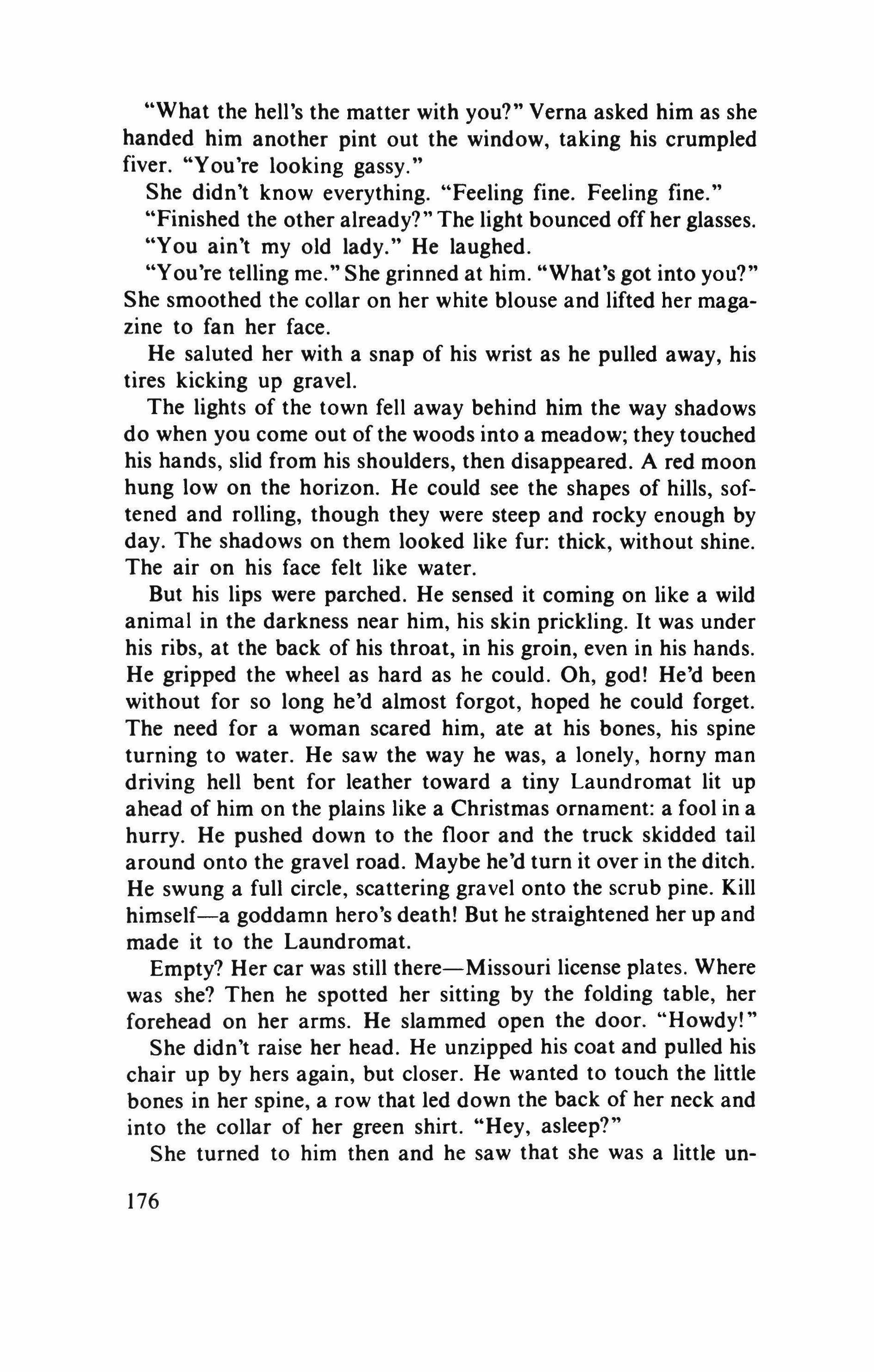
"What the hell's the matter with you?" Verna asked him as she handed him another pint out the window, taking his crumpled fiver. "You're looking gassy."
She didn't know everything. "Feeling fine. Feeling fine."
"Finished the other already?" The light bounced off her glasses.
"You ain't myoId lady." He laughed.
"You're telling me." She grinned at him. "What's got into you?" She smoothed the collar on her white blouse and lifted her magazine to fan her face.
He saluted her with a snap of his wrist as he pulled away, his tires kicking up gravel.
The lights of the town fell away behind him the way shadows do when you come out of the woods into a meadow; they touched his hands, slid from his shoulders, then disappeared. A red moon hung low on the horizon. He could see the shapes of hills, softened and rolling, though they were steep and rocky enough by day. The shadows on them looked like fur: thick, without shine. The air on his face felt like water.
But his lips were parched. He sensed it coming on like a wild animal in the darkness near him, his skin prickling. It was under his ribs, at the back of his throat, in his groin, even in his hands. He gripped the wheel as hard as he could. Oh, god! He'd been without for so long he'd almost forgot, hoped he could forget. The need for a woman scared him, ate at his bones, his spine turning to water. He saw the way he was, a lonely, horny man driving hell bent for leather toward a tiny Laundromat lit up ahead of him on the plains like a Christmas ornament: a fool in a hurry. He pushed down to the floor and the truck skidded tail around onto the gravel road. Maybe he'd turn it over in the ditch. He swung a full circle, scattering gravel onto the scrub pine. Kill himself-a goddamn hero's death! But he straightened her up and made it to the Laundromat.
Empty? Her car was still there-Missouri license plates. Where was she? Then he spotted her sitting by the folding table, her forehead on her arms. He slammed open the door. "Howdy!"
She didn't raise her head. He unzipped his coat and pulled his chair up by hers again, but closer. He wanted to touch the little bones in her spine, a row that led down the back of her neck and into the collar of her green shirt. "Hey, asleep?"
She turned to him then and he saw that she was a little un-
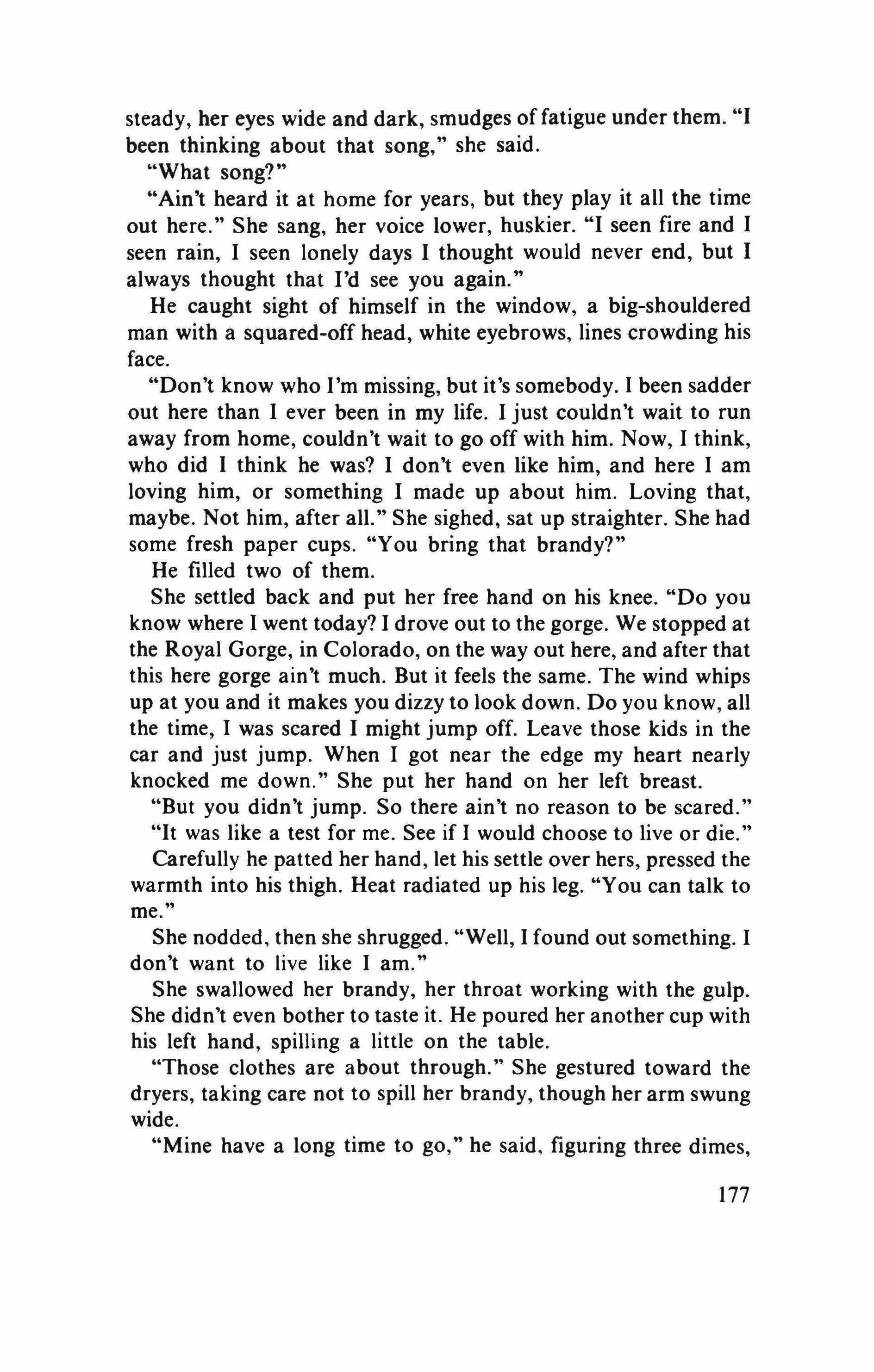
steady, her eyes wide and dark, smudges of fatigue under them. "I been thinking about that song," she said.
"What song?"
"Ain't heard it at home for years, but they play it all the time out here." She sang, her voice lower, huskier. "I seen fire and 1 seen rain, 1 seen lonely days 1 thought would never end, but 1 always thought that I'd see you again."
He caught sight of himself in the window, a big-shouldered man with a squared-off head, white eyebrows, lines crowding his face.
"Don't know who I'm missing, but it's somebody. I been sadder out here than 1 ever been in my life. 1 just couldn't wait to run away from home, couldn't wait to go off with him. Now, I think, who did 1 think he was? 1 don't even like him, and here 1 am loving him, or something 1 made up about him. Loving that, maybe. Not him, after all." She sighed, sat up straighter. She had some fresh paper cups. "You bring that brandy?"
He filled two of them.
She settled back and put her free hand on his knee. "Do you know where 1 went today? I drove out to the gorge. We stopped at the Royal Gorge, in Colorado, on the way out here, and after that this here gorge ain't much. But it feels the same. The wind whips up at you and it makes you dizzy to look down. Do you know, all the time, I was scared I might jump off. Leave those kids in the car and just jump. When I got near the edge my heart nearly knocked me down." She put her hand on her left breast.
"But you didn't jump. So there ain't no reason to be scared."
"It was like a test for me. See if I would choose to live or die."
Carefully he patted her hand, let his settle over hers, pressed the warmth into his thigh. Heat radiated up his leg. "You can talk to me."
She nodded, then she shrugged. "Well, I found out something. I don't want to live like lam."
She swallowed her brandy, her throat working with the gulp. She didn't even bother to taste it. He poured her another cup with his left hand, spilling a little on the table.
"Those clothes are about through." She gestured toward the dryers, taking care not to spill her brandy, though her arm swung wide.
"Mine have a long time to go," he said, figuring three dimes, 177

about thirty minutes and he'd been gone about fifteen, back maybe ten. They'd be shutting off soon. He scratched at his throat. She drew her hand back a quarter of an inch, just enough for him to notice. It was like hunting: he'd have to listen and watch. He'd have to keep a cool head. "The lady who runs this place, she don't like drinking. Let's us go out to my truck until the dryers stop, so she don't happen by and get all huffy."
She closed her eyes, shook her head slowly, leaning against his shoulder. "Can't even have a drink where you want out here. I always drank at the Laundromat at home. Gallo Chablis. Kept the bottle in my clothes basket. Noone said nothing." She stood up before he did and held out her arms so he could help her on with her parka.
Then she whispered, "Course he might come looking for me. I left him a note I went home to K.C., but I had to tell his rna where I was to get her to keep the kids."
"Looking for you?"
"He's terrible jealous. He was of her, too, but it didn't stop her from running off."
"Why'd you tell him you was going home?"
"Well, that's what I felt like. I wanted to let him know. Make him sit up and pay attention."
Her parka smelled of smoke and talcum. He swung his coat over his arm and maneuvered her out the door, holding the cups on his fingers and the bottle snug in his pocket. He settled her in beside him and backed the truck across the parking lot, pulling into the shadows under the pines. The moon was down and the sky was streaked with turquoise light along the horizon. It was too dark to see her face, but his hand found her cheek. "Here we are." It was wet. He'd never kissed a crying woman. Her teeth caught his lips and his chin, but she put her fingers on the back of his neck and pulled him close, choking on her tears. He felt her breasts against his arm. "It's okay, honey," he said against her mouth.
"It's not."
He slid his hand into her armpit under her coat, the side of his palm against her breast. Her tongue was at his lips even though she was crying and he got her bra up and found her flat, wide nipple. Dizzy, like the time he and his horse went down in the river, water rolling them over and over against the logs, the
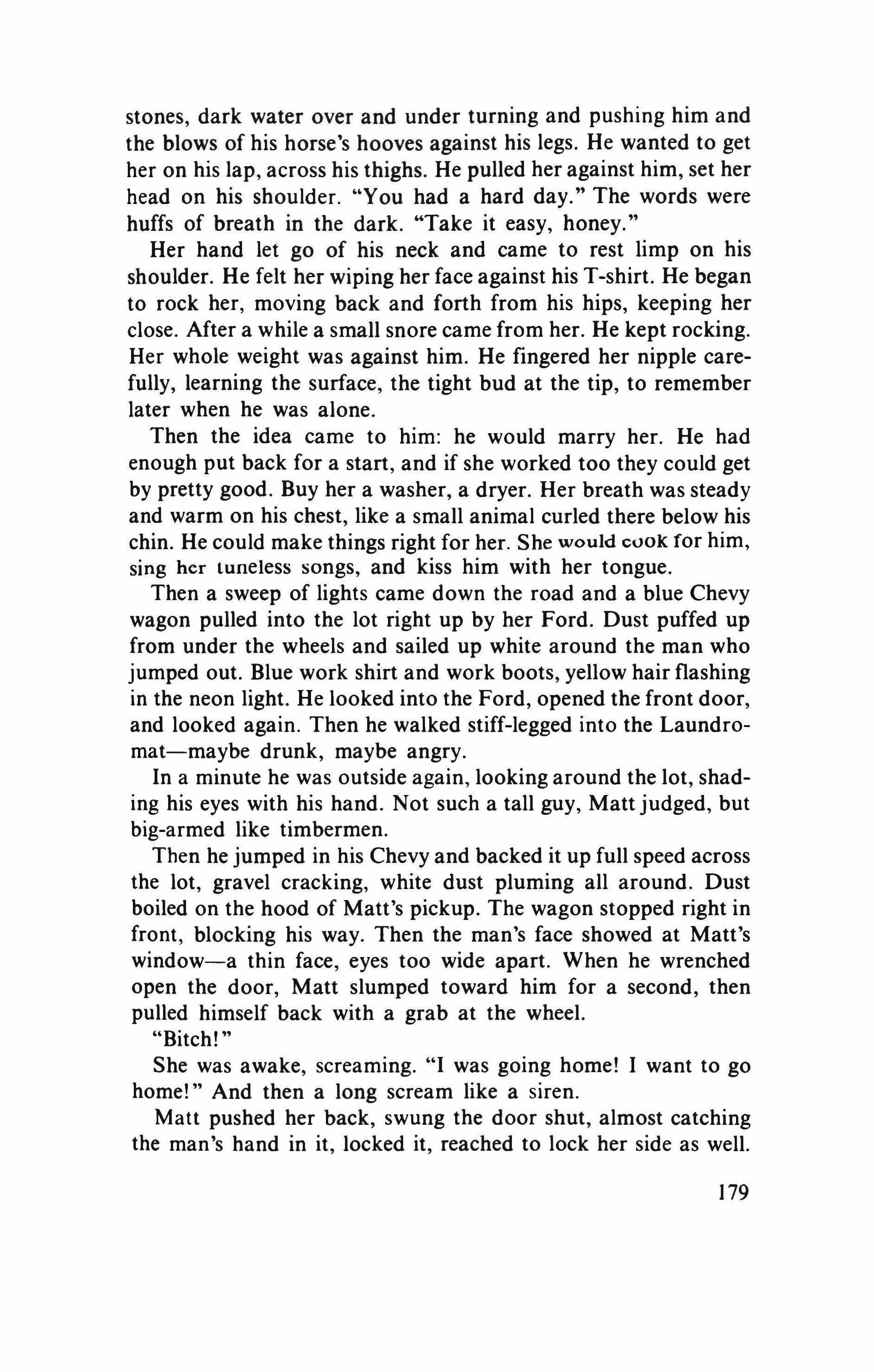
stones, dark water over and under turning and pushing him and the blows of his horse's hooves against his legs. He wanted to get her on his lap, across his thighs. He pulled her against him, set her head on his shoulder. "You had a hard day." The words were huffs of breath in the dark. "Take it easy, honey."
Her hand let go of his neck and came to rest limp on his shoulder. He felt her wiping her face against his T-shirt. He began to rock her, moving back and forth from his hips, keeping her close. After a while a small snore came from her. He kept rocking. Her whole weight was against him. He fingered her nipple carefully, learning the surface, the tight bud at the tip, to remember later when he was alone.
Then the idea came to him: he would marry her. He had enough put back for a start, and if she worked too they could get by pretty good. Buy her a washer, a dryer. Her breath was steady and warm on his chest, like a small animal curled there below his chin. He could make things right for her. She would cook for him, sing her tuneless songs, and kiss him with her tongue.
Then a sweep of lights came down the road and a blue Chevy wagon pulled into the lot right up by her Ford. Dust puffed up from under the wheels and sailed up white around the man who jumped out. Blue work shirt and work boots, yellow hair flashing in the neon light. He looked into the Ford, opened the front door, and looked again. Then he walked stiff-legged into the Laundromat-maybe drunk, maybe angry.
In a minute he was outside again, looking around the lot, shading his eyes with his hand. Not such a tall guy, Matt judged, but big-armed like timbermen.
Then he jumped in his Chevy and backed it up full speed across the lot, gravel cracking, white dust pluming all around. Dust boiled on the hood of Matt's pickup. The wagon stopped right in front, blocking his way. Then the man's face showed at Matt's window-a thin face, eyes too wide apart. When he wrenched open the door, Matt slumped toward him for a second, then pulled himself back with a grab at the wheel.
"Bitch!
She was awake, screaming. "I was going home! I want to go home!" And then a long scream like a siren.
Matt pushed her back, swung the door shut, almost catching the man's hand in it, locked it, reached to lock her side as well.
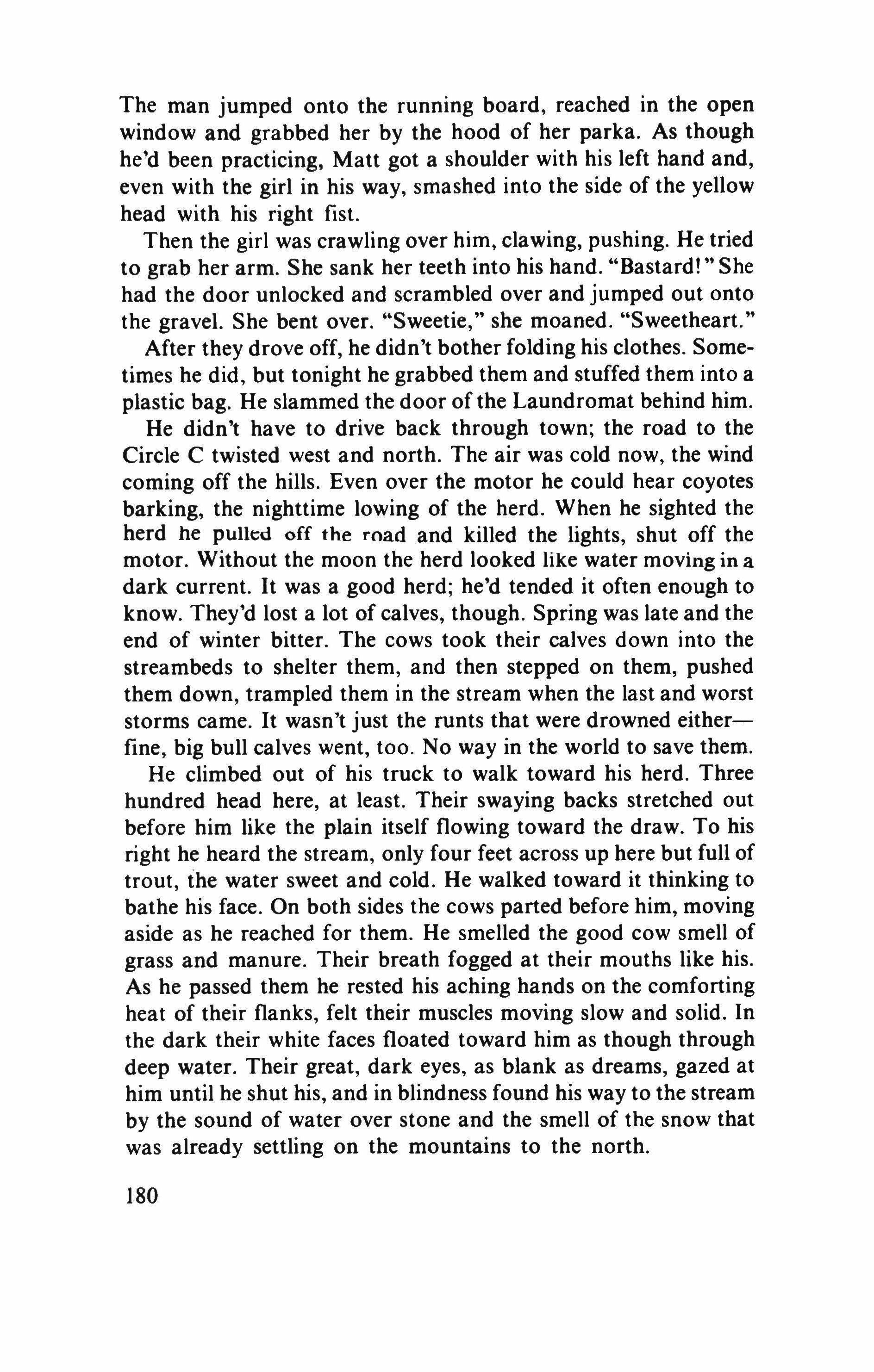
The man jumped onto the running board, reached in the open window and grabbed her by the hood of her parka. As though he'd been practicing, Matt got a shoulder with his left hand and, even with the girl in his way, smashed into the side of the yellow head with his right fist.
Then the girl was crawling over him, clawing, pushing. He tried to grab her arm. She sank her teeth into his hand. "Bastard!" She had the door unlocked and scrambled over and jumped out onto the gravel. She bent over. "Sweetie," she moaned. "Sweetheart."
After they drove off, he didn't bother folding his clothes. Sometimes he did, but tonight he grabbed them and stuffed them into a plastic bag. He slammed the door of the Laundromat behind him.
He didn't have to drive back through town; the road to the Circle C twisted west and north. The air was cold now, the wind coming off the hills. Even over the motor he could hear coyotes barking, the nighttime lowing of the herd. When he sighted the herd he pulled off the road and killed the lights, shut off the motor. Without the moon the herd looked like water moving in a dark current. It was a good herd; he'd tended it often enough to know. They'd lost a lot of calves, though. Spring was late and the end of winter bitter. The cows took their calves down into the streambeds to shelter them, and then stepped on them, pushed them down, trampled them in the stream when the last and worst storms came. It wasn't just the runts that were drowned eitherfine, big bull calves went, too. No way in the world to save them. He climbed out of his truck to walk toward his herd. Three hundred head here, at least. Their swaying backs stretched out before him like the plain itself flowing toward the draw. To his right he heard the stream, only four feet across up here but full of trout, the water sweet and cold. He walked toward it thinking to bathe his face. On both sides the cows parted before him, moving aside as he reached for them. He smelled the good cow smell of grass and manure. Their breath fogged at their mouths like his. As he passed them he rested his aching hands on the comforting heat of their flanks, felt their muscles moving slow and solid. In the dark their white faces floated toward him as though through deep water. Their great, dark eyes, as blank as dreams, gazed at him until he shut his, and in blindness found his way to the stream by the sound of water over stone and the smell of the snow that was already settling on the mountains to the north. 180
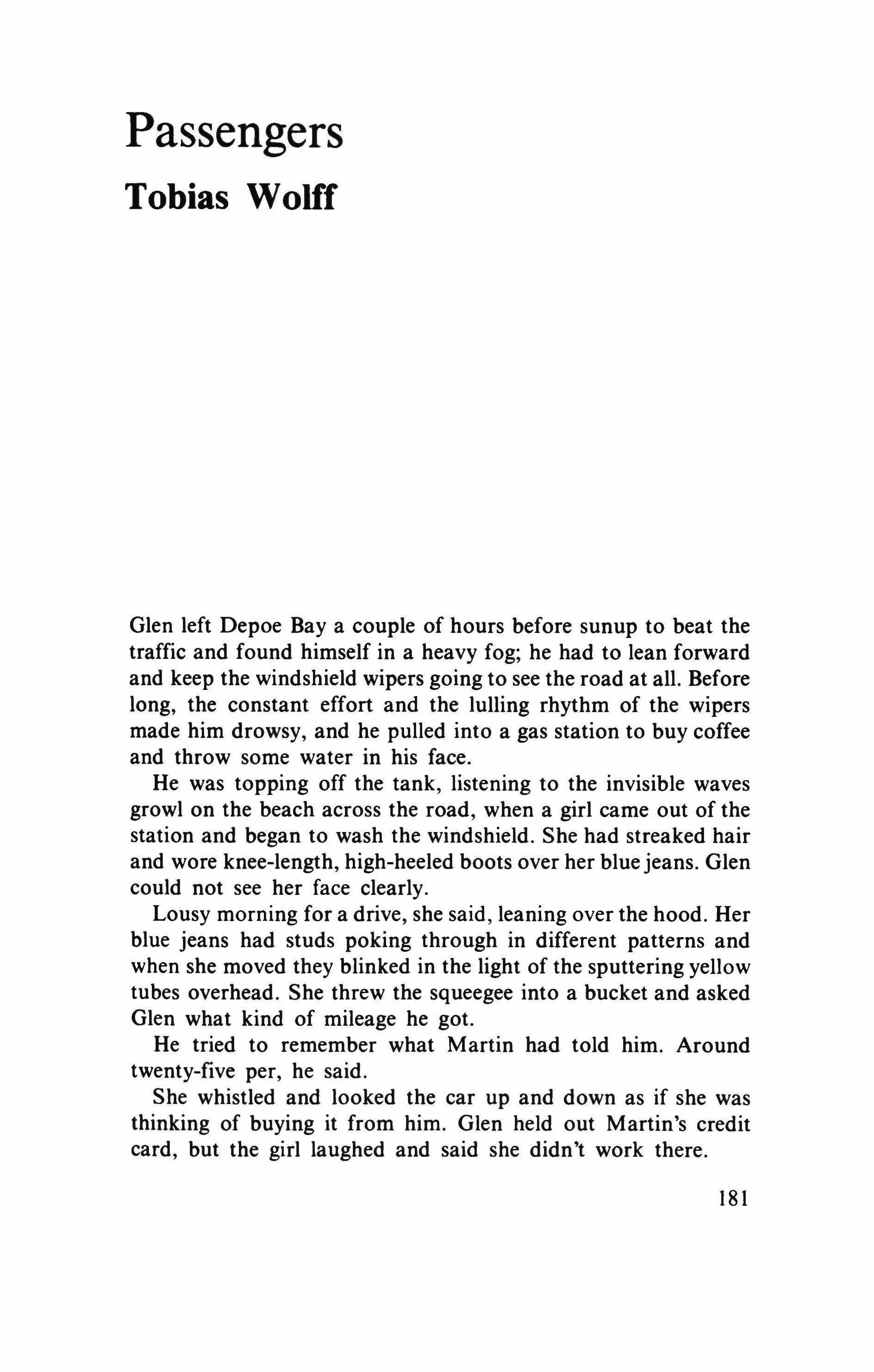
Glen left Depoe Bay a couple of hours before sunup to beat the traffic and found himself in a heavy fog; he had to lean forward and keep the windshield wipers going to see the road at all. Before long, the constant effort and the lulling rhythm of the wipers made him drowsy, and he pulled into a gas station to buy coffee and throw some water in his face.
He was topping off the tank, listening to the invisible waves growl on the beach across the road, when a girl came out of the station and began to wash the windshield. She had streaked hair and wore knee-length, high-heeled boots over her blue jeans. Glen could not see her face clearly.
Lousy morning for a drive, she said, leaning over the hood. Her blue jeans had studs poking through in different patterns and when she moved they blinked in the light of the sputtering yellow tubes overhead. She threw the squeegee into a bucket and asked Glen what kind of mileage he got.
He tried to remember what Martin had told him. Around twenty-five per, he said.
She whistled and looked the car up and down as if she was thinking of buying it from him. Glen held out Martin's credit card, but the girl laughed and said she didn't work there.
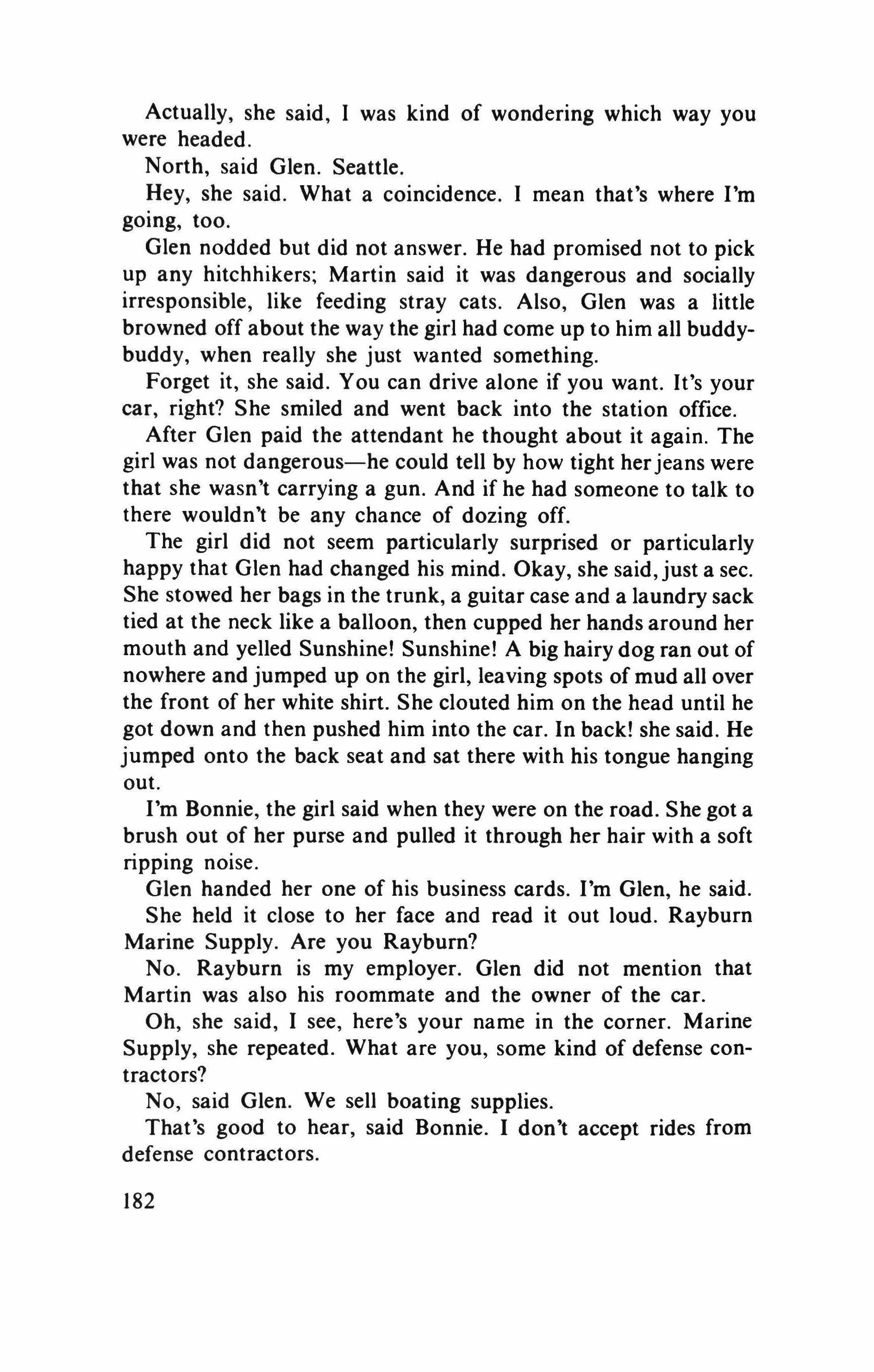
Actually, she said, I was kind of wondering which way you were headed.
North, said Glen. Seattle.
Hey, she said. What a coincidence. I mean that's where I'm going, too.
Glen nodded but did not answer. He had promised not to pick up any hitchhikers; Martin said it was dangerous and socially irresponsible, like feeding stray cats. Also, Glen was a little browned off about the way the girl had come up to him all buddybuddy, when really she just wanted something.
Forget it, she said. You can drive alone if you want. It's your car, right? She smiled and went back into the station office.
After Glen paid the attendant he thought about it again. The girl was not dangerous-he could tell by how tight herjeans were that she wasn't carrying a gun. And if he had someone to talk to there wouldn't be any chance of dozing off.
The girl did not seem particularly surprised or particularly happy that Glen had changed his mind. Okay, she said, just a sec. She stowed her bags in the trunk, a guitar case and a laundry sack tied at the neck like a balloon, then cupped her hands around her mouth and yelled Sunshine! Sunshine! A big hairy dog ran out of nowhere and jumped up on the girl, leaving spots of mud all over the front of her white shirt. She clouted him on the head until he got down and then pushed him into the car. In back! she said. He jumped onto the back seat and sat there with his tongue hanging out.
I'm Bonnie, the girl said when they were on the road. She got a brush out of her purse and pulled it through her hair with a soft ripping noise.
Glen handed her one of his business cards. I'm Glen, he said. She held it close to her face and read it out loud. Rayburn Marine Supply. Are you Rayburn?
No. Rayburn is my employer. Glen did not mention that Martin was also his roommate and the owner of the car.
Oh, she said, I see, here's your name in the corner. Marine Supply, she repeated. What are you, some kind of defense contractors?
No, said Glen. We sell boating supplies. That's good to hear, said Bonnie. I don't accept rides from defense contractors.
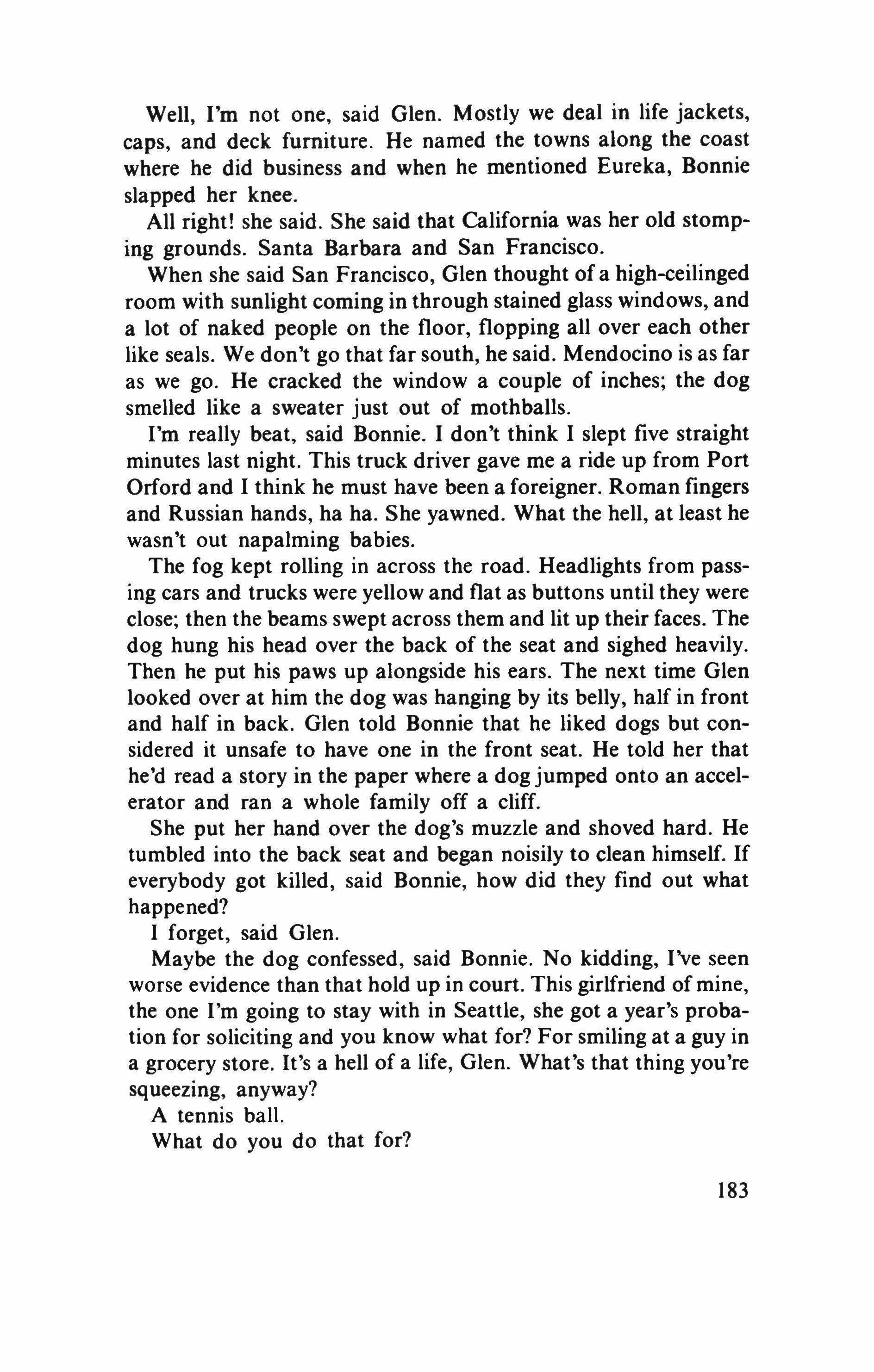
Well, I'm not one, said Glen. Mostly we deal in life jackets, caps, and deck furniture. He named the towns along the coast where he did business and when he mentioned Eureka, Bonnie slapped her knee.
All right! she said. She said that California was her old stomping grounds. Santa Barbara and San Francisco.
When she said San Francisco, Glen thought of a high-ceilinged room with sunlight coming in through stained glass windows, and a lot of naked people on the floor, flopping all over each other like seals. We don't go that far south, he said. Mendocino is as far as we go. He cracked the window a couple of inches; the dog smelled like a sweater just out of mothballs.
I'm really beat, said Bonnie. I don't think I slept five straight minutes last night. This truck driver gave me a ride up from Port Orford and I think he must have been a foreigner. Roman fingers and Russian hands, ha ha. She yawned. What the hell, at least he wasn't out napalming babies.
The fog kept rolling in across the road. Headlights from passing cars and trucks were yellow and flat as buttons until they were close; then the beams swept across them and lit up their faces. The dog hung his head over the back of the seat and sighed heavily. Then he put his paws up alongside his ears. The next time Glen looked over at him the dog was hanging by its belly, half in front and half in back. Glen told Bonnie that he liked dogs but considered it unsafe to have one in the front seat. He told her that he'd read a story in the paper where a dog jumped onto an accelerator and ran a whole family off a cliff.
She put her hand over the dog's muzzle and shoved hard. He tumbled into the back seat and began noisily to clean himself. If everybody got killed, said Bonnie, how did they find out what happened?
I forget, said Glen.
Maybe the dog confessed, said Bonnie. No kidding, I've seen worse evidence than that hold up in court. This girlfriend of mine, the one I'm going to stay with in Seattle, she got a year's probation for soliciting and you know what for? For smiling at a guy in a grocery store. It's a hell of a life, Glen. What's that thing you're squeezing, anyway?
A tennis ball.
What do you do that for?
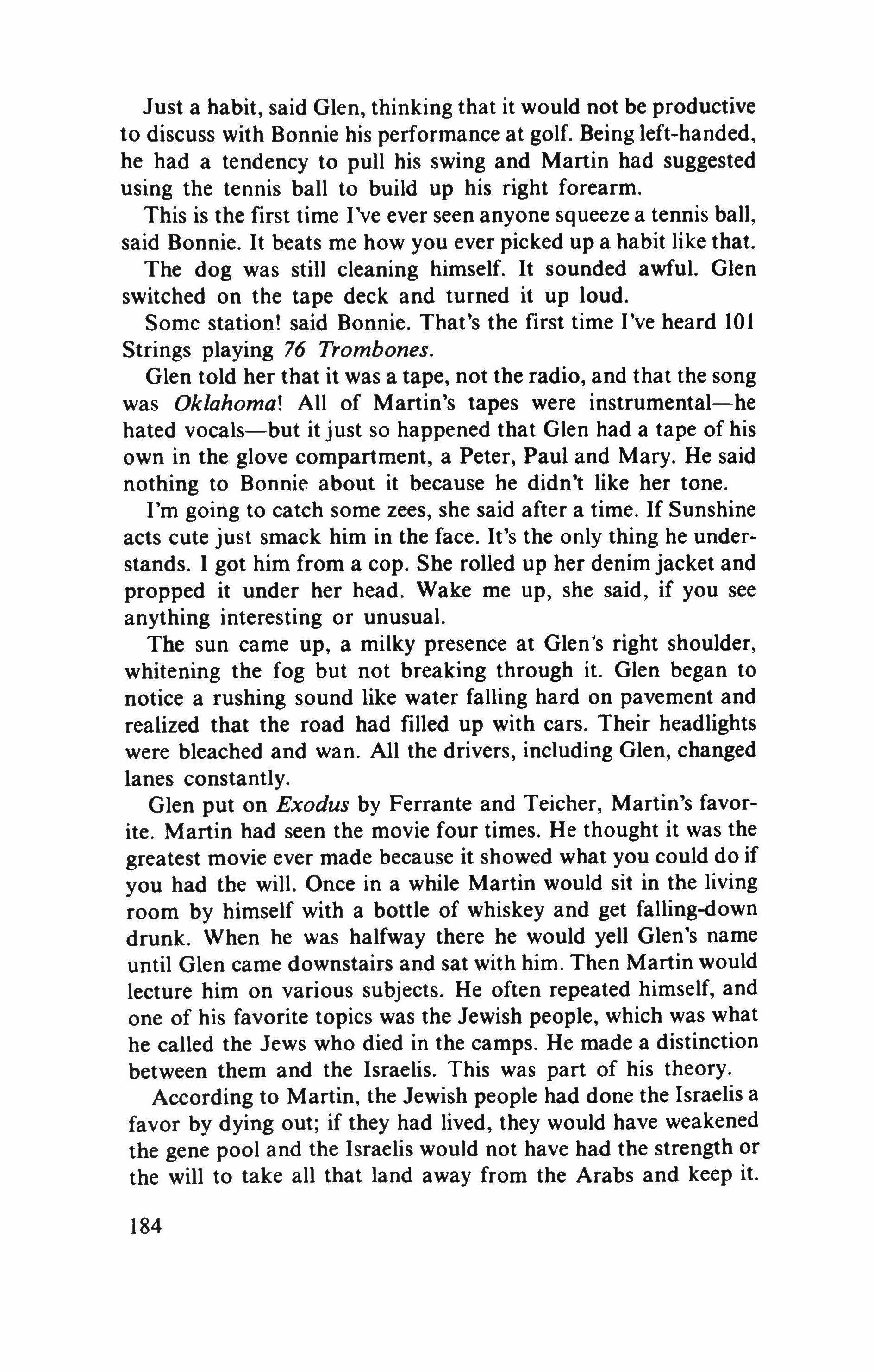
Just a habit, said Glen, thinking that it would not be productive to discuss with Bonnie his performance at golf. Being left-handed, he had a tendency to pull his swing and Martin had suggested using the tennis ball to build up his right forearm.
This is the first time I've ever seen anyone squeeze a tennis ball, said Bonnie. It beats me how you ever picked up a habit like that.
The dog was still cleaning himself. It sounded awful. Glen switched on the tape deck and turned it up loud.
Some station! said Bonnie. That's the first time I've heard 101 Strings playing 76 Trombones.
Glen told her that it was a tape, not the radio, and that the song was Oklahoma! All of Martin's tapes were instrumental-he hated vocals-but it just so happened that Glen had a tape of his own in the glove compartment, a Peter, Paul and Mary. He said nothing to Bonnie about it because he didn't like her tone.
I'm going to catch some zees, she said after a time. If Sunshine acts cute just smack him in the face. It's the only thing he understands. I got him from a cop. She rolled up her denim jacket and propped it under her head. Wake me up, she said, if you see anything interesting or unusual.
The sun came up, a milky presence at Glen's right shoulder, whitening the fog but not breaking through it. Glen began to notice a rushing sound like water falling hard on pavement and realized that the road had filled up with cars. Their headlights were bleached and wan. All the drivers, including Glen, changed lanes constantly.
Glen put on Exodus by Ferrante and Teicher, Martin's favorite. Martin had seen the movie four times. He thought it was the greatest movie ever made because it showed what you could do if you had the will. Once in a while Martin would sit in the living room by himself with a bottle of whiskey and get falling-down drunk. When he was halfway there he would yell Glen's name until Glen came downstairs and sat with him. Then Martin would lecture him on various subjects. He often repeated himself, and one of his favorite topics was the Jewish people, which was what he called the Jews who died in the camps. He made a distinction between them and the Israelis. This was part of his theory.
According to Martin, the Jewish people had done the Israelis a favor by dying out; if they had lived, they would have weakened the gene pool and the Israelis would not have had the strength or the will to take all that land away from the Arabs and keep it.
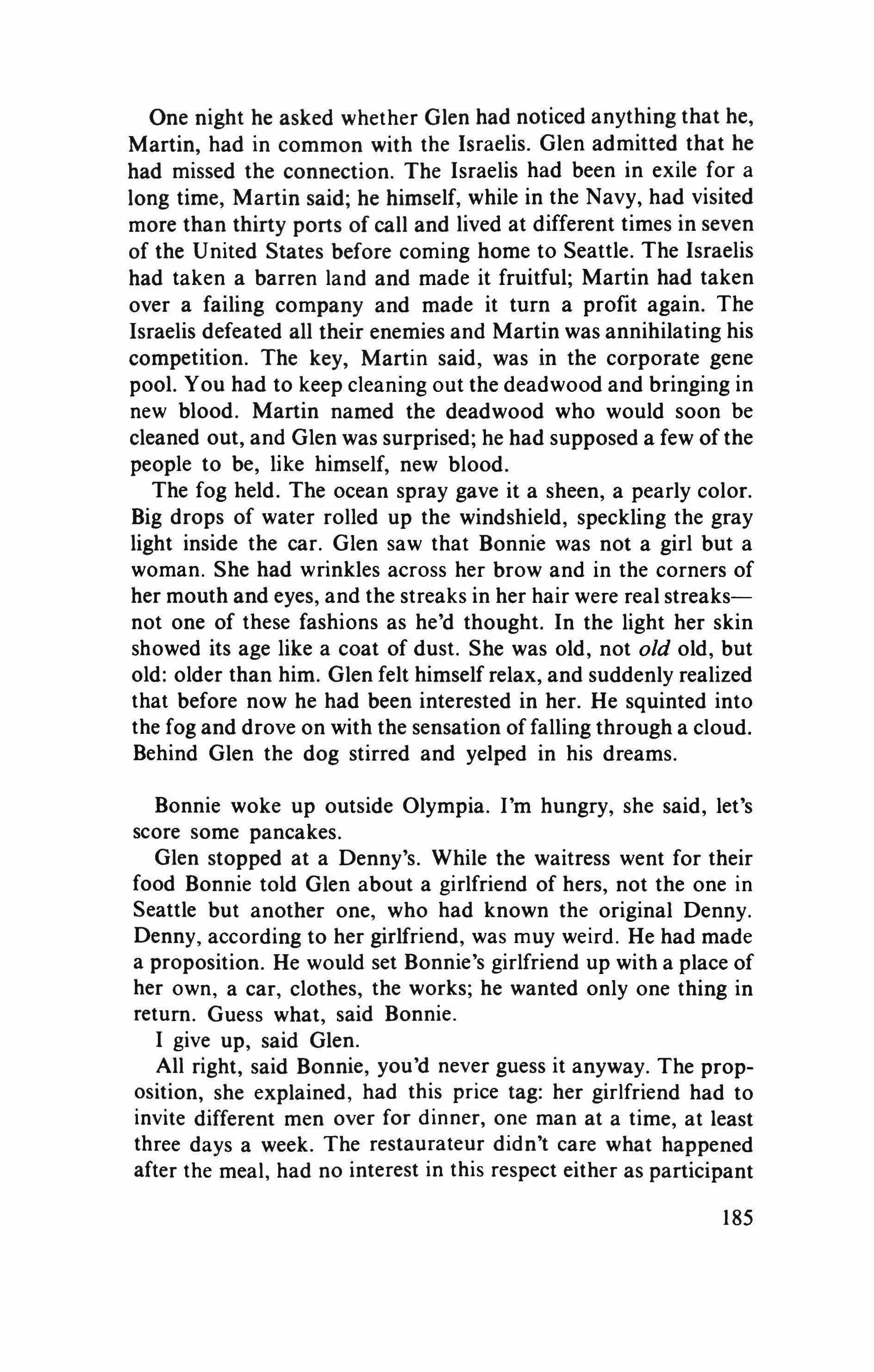
One night he asked whether Glen had noticed anything that he, Martin, had in common with the Israelis. Glen admitted that he had missed the connection. The Israelis had been in exile for a long time, Martin said; he himself, while in the Navy, had visited more than thirty ports of call and lived at different times in seven of the United States before coming home to Seattle. The Israelis had taken a barren land and made it fruitful; Martin had taken over a failing company and made it turn a profit again. The Israelis defeated all their enemies and Martin was annihilating his competition. The key, Martin said, was in the corporate gene pool. You had to keep cleaning out the deadwood and bringing in new blood. Martin named the deadwood who would soon be cleaned out, and Glen was surprised; he had supposed a few of the people to be, like himself, new blood.
The fog held. The ocean spray gave it a sheen, a pearly color. Big drops of water rolled up the windshield, speckling the gray light inside the car. Glen saw that Bonnie was not a girl but a woman. She had wrinkles across her brow and in the corners of her mouth and eyes, and the streaks in her hair were real streaksnot one of these fashions as he'd thought. In the light her skin showed its age like a coat of dust. She was old, not old old, but old: older than him. Glen felt himself relax, and suddenly realized that before now he had been interested in her. He squinted into the fog and drove on with the sensation of falling through a cloud. Behind Glen the dog stirred and yelped in his dreams.
Bonnie woke up outside Olympia. I'm hungry, she said, let's score some pancakes.
Glen stopped at a Denny's. While the waitress went for their food Bonnie told Glen about a girlfriend of hers, not the one in Seattle but another one, who had known the original Denny. Denny, according to her girlfriend, was muy weird. He had made a proposition. He would set Bonnie's girlfriend up with a place of her own, a car, clothes, the works; he wanted only one thing in return. Guess what, said Bonnie.
I give up, said Glen.
All right, said Bonnie, you'd never guess it anyway. The proposition, she explained, had this price tag: her girlfriend had to invite different men over for dinner, one man at a time, at least three days a week. The restaurateur didn't care what happened after the meal, had no interest in this respect either as participant
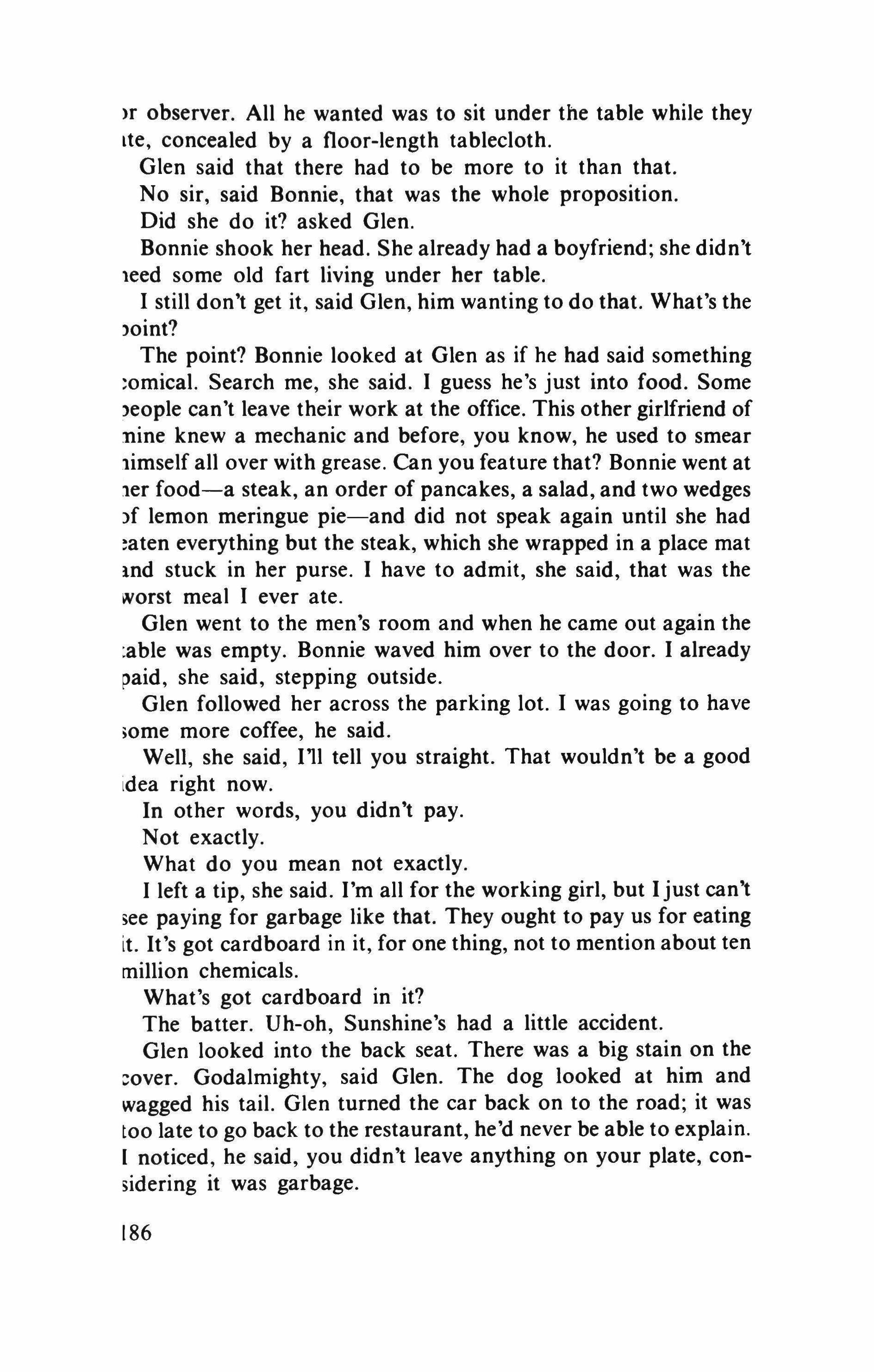
)r observer. All he wanted was to sit under the table while they ue, concealed by a floor-length tablecloth.
Glen said that there had to be more to it than that.
No sir, said Bonnie, that was the whole proposition. Did she do it? asked Glen.
Bonnie shook her head. She already had a boyfriend; she didn't teed some old fart living under her table.
I still don't get it, said Glen, him wanting to do that. What's the roint?
The point? Bonnie looked at Glen as if he had said something iomical. Search me, she said. I guess he's just into food. Some seople can't leave their work at the office. This other girlfriend of nine knew a mechanic and before, you know, he used to smear rimself all over with grease. Can you feature that? Bonnie went at rer food-a steak, an order of pancakes, a salad, and two wedges of lemon meringue pie-and did not speak again until she had eaten everything but the steak, which she wrapped in a place mat and stuck in her purse. I have to admit, she said, that was the worst meal I ever ate.
Glen went to the men's room and when he came out again the .able was empty. Bonnie waved him over to the door. I already paid, she said, stepping outside.
Glen followed her across the parking lot. I was going to have some more coffee, he said.
Well, she said, I'll tell you straight. That wouldn't be a good Idea right now.
In other words, you didn't pay.
Not exactly.
What do you mean not exactly.
I left a tip, she said. I'm all for the working girl, but Ijust can't see paying for garbage like that. They ought to pay us for eating It. It's got cardboard in it, for one thing, not to mention about ten million chemicals.
What's got cardboard in it?
The batter. Uh-oh, Sunshine's had a little accident.
Glen looked into the back seat. There was a big stain on the cover. Godalmighty, said Glen. The dog looked at him and wagged his tail. Glen turned the car back on to the road; it was too late to go back to the restaurant, he'd never be able to explain. [ noticed, he said, you didn't leave anything on your plate, considering it was garbage.
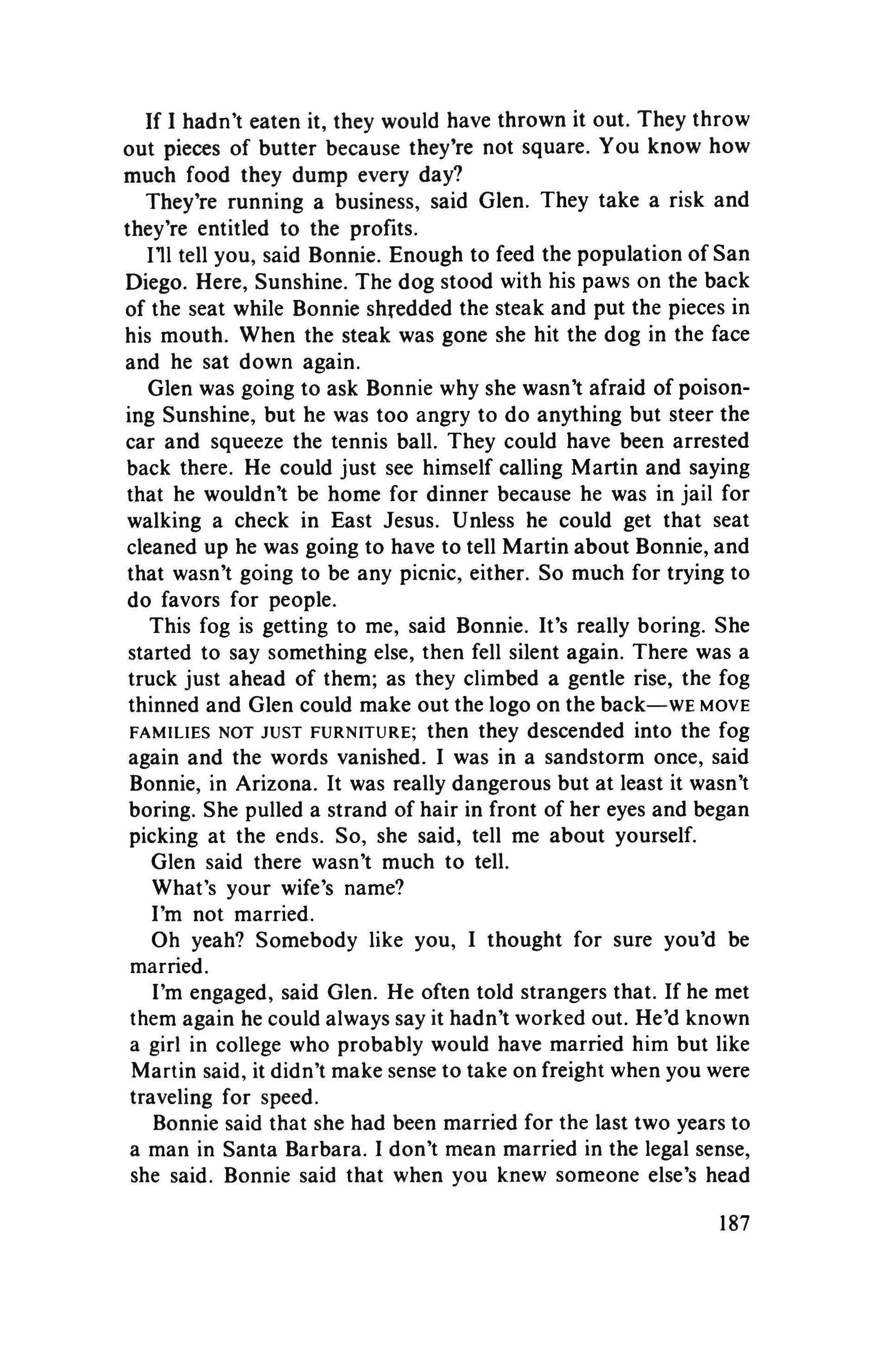
If I hadn't eaten it, they would have thrown it out. They throw out pieces of butter because they're not square. You know how much food they dump every day?
They're running a business, said Glen. They take a risk and they're entitled to the profits.
111 tell you, said Bonnie. Enough to feed the population of San Diego. Here, Sunshine. The dog stood with his paws on the back of the seat while Bonnie shredded the steak and put the pieces in his mouth. When the steak was gone she hit the dog in the face and he sat down again.
Glen was going to ask Bonnie why she wasn't afraid of poisoning Sunshine, but he was too angry to do anything but steer the car and squeeze the tennis ball. They could have been arrested back there. He could just see himself calling Martin and saying that he wouldn't be home for dinner because he was in jail for walking a check in East Jesus. Unless he could get that seat cleaned up he was going to have to tell Martin about Bonnie, and that wasn't going to be any picnic, either. So much for trying to do favors for people.
This fog is getting to me, said Bonnie. It's really boring. She started to say something else, then fell silent again. There was a truck just ahead of them; as they climbed a gentle rise, the fog thinned and Glen could make out the logo on the back-WE MOVE FAMILIES NOT JUST FURNITURE; then they descended into the fog again and the words vanished. I was in a sandstorm once, said Bonnie, in Arizona. It was really dangerous but at least it wasn't boring. She pulled a strand of hair in front of her eyes and began picking at the ends. So, she said, tell me about yourself.
Glen said there wasn't much to tell.
What's your wife's name?
I'm not married.
Oh yeah? Somebody like you, I thought for sure you'd be married.
I'm engaged, said Glen. He often told strangers that. If he met them again he could always say it hadn't worked out. He'd known a girl in college who probably would have married him but like Martin said, it didn't make sense to take on freight when you were traveling for speed.
Bonnie said that she had been married for the last two years to a man in Santa Barbara. I don't mean married in the legal sense, she said. Bonnie said that when you knew someone else's head
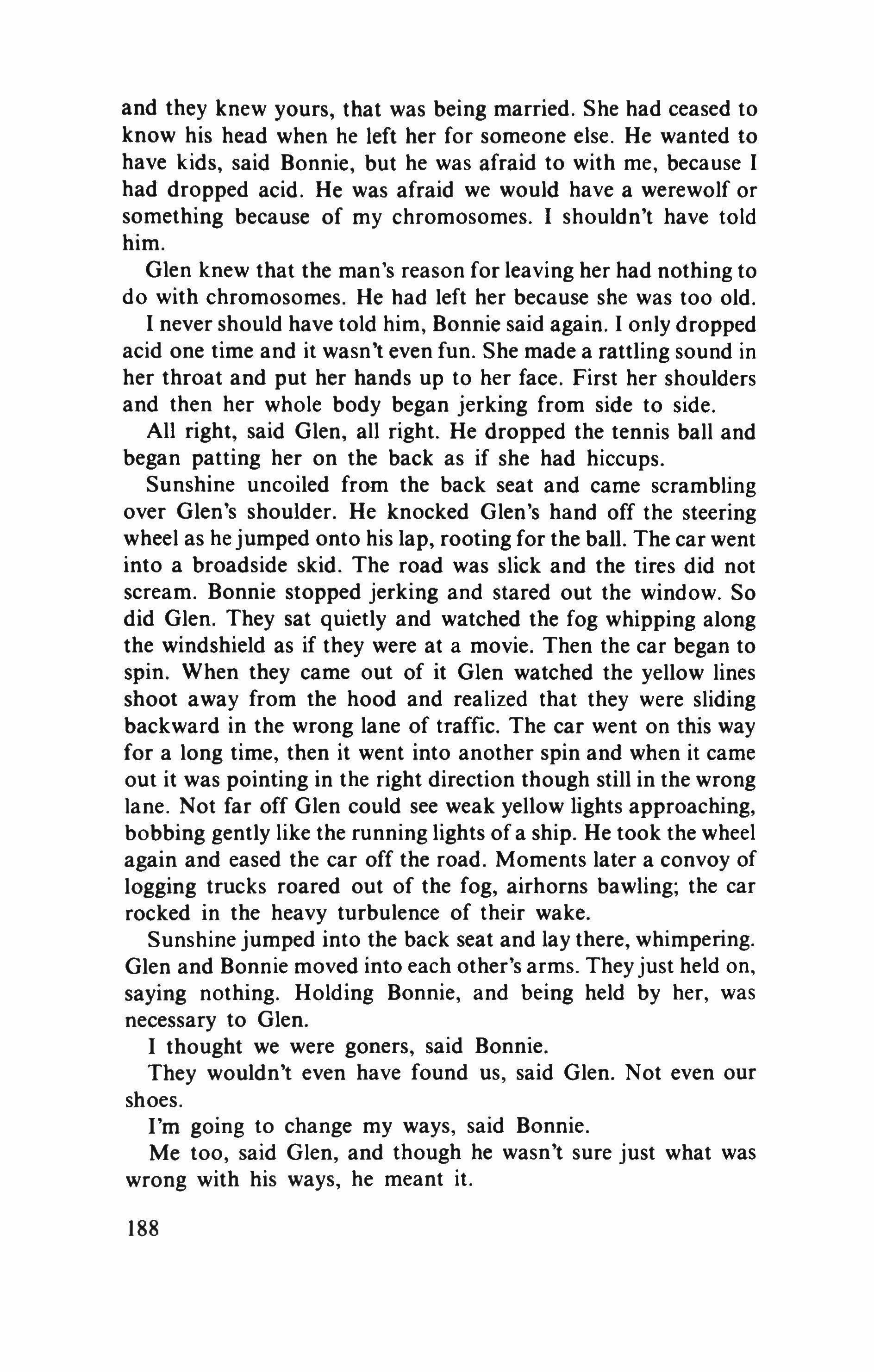
and they knew yours, that was being married. She had ceased to know his head when he left her for someone else. He wanted to have kids, said Bonnie, but he was afraid to with me, because I had dropped acid. He was afraid we would have a werewolf or something because of my chromosomes. I shouldn't have told him.
Glen knew that the man's reason for leaving her had nothing to do with chromosomes. He had left her because she was too old. I never should have told him, Bonnie said again. I only dropped acid one time and it wasn't even fun. She made a rattling sound in her throat and put her hands up to her face. First her shoulders and then her whole body began jerking from side to side.
All right, said Glen, all right. He dropped the tennis ball and began patting her on the back as if she had hiccups.
Sunshine uncoiled from the back seat and came scrambling over Glen's shoulder. He knocked Glen's hand off the steering wheel as he jumped onto his lap, rooting for the ball. The car went into a broadside skid. The road was slick and the tires did not scream. Bonnie stopped jerking and stared out the window. So did Glen. They sat quietly and watched the fog Whipping along the windshield as if they were at a movie. Then the car began to spin. When they came out of it Glen watched the yellow lines shoot away from the hood and realized that they were sliding backward in the wrong lane of traffic. The car went on this way for a long time, then it went into another spin and when it came out it was pointing in the right direction though still in the wrong lane. Not far off Glen could see weak yellow lights approaching, bobbing gently like the running lights of a ship. He took the wheel again and eased the car off the road. Moments later a convoy of logging trucks roared out of the fog, airhorns bawling; the car rocked in the heavy turbulence of their wake.
Sunshine jumped into the back seat and lay there, Whimpering. Glen and Bonnie moved into each other's arms. Theyjust held on, saying nothing. Holding Bonnie, and being held by her, was necessary to Glen.
I thought we were goners, said Bonnie. They wouldn't even have found us, said Glen. Not even our shoes.
I'm going to change my ways, said Bonnie. Me too, said Glen, and though he wasn't sure just what was wrong with his ways, he meant it.
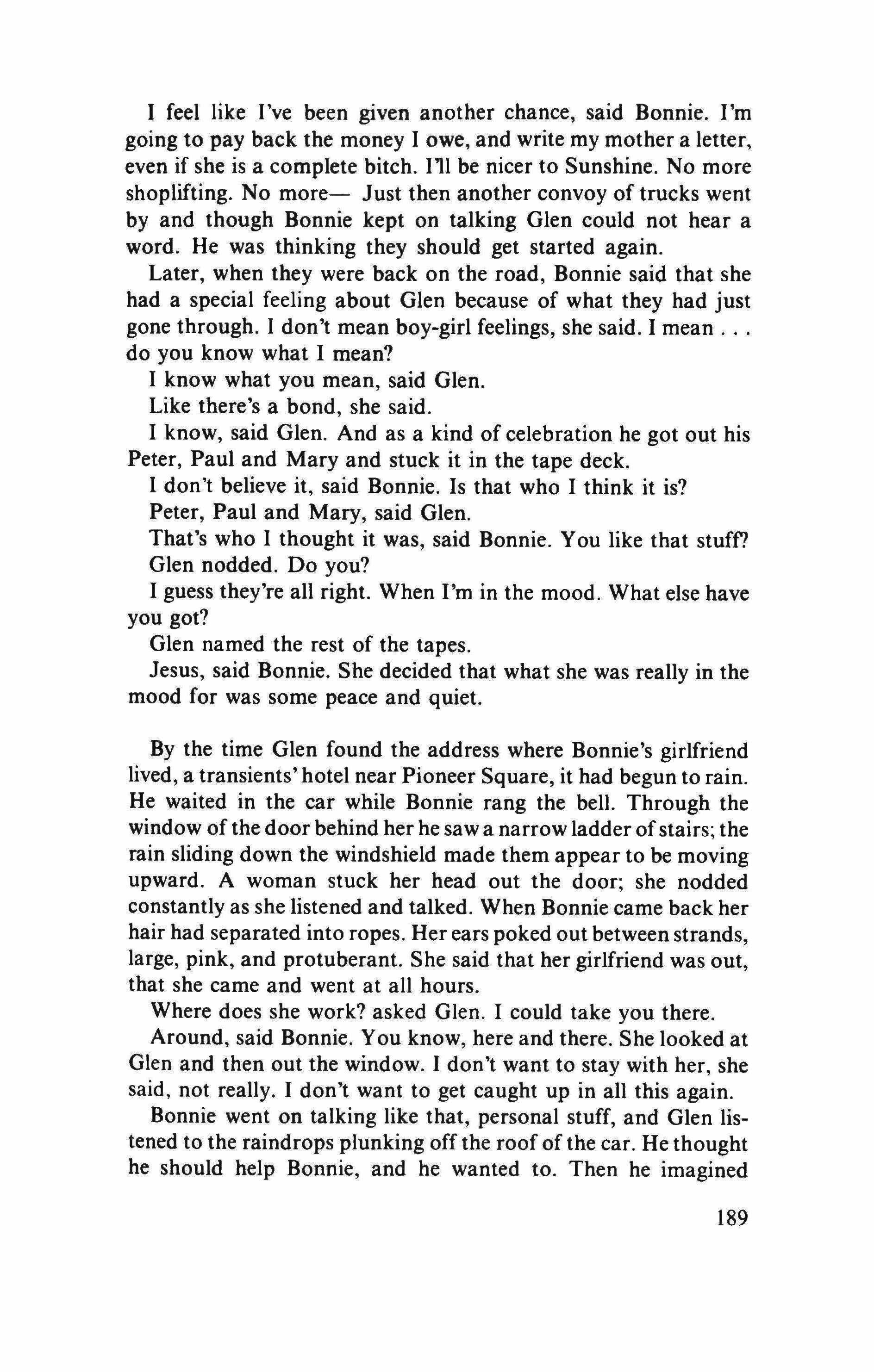
I feel like I've been given another chance, said Bonnie. I'm going to pay back the money lowe, and write my mother a letter, even if she is a complete bitch. 111 be nicer to Sunshine. No more shoplifting. No more- Just then another convoy of trucks went by and though Bonnie kept on talking Glen could not hear a word. He was thinking they should get started again.
Later, when they were back on the road, Bonnie said that she had a special feeling about Glen because of what they had just gone through. I don't mean boy-girl feelings, she said. I mean do you know what I mean?
I know what you mean, said Glen.
Like there's a bond, she said.
I know, said Glen. And as a kind of celebration he got out his Peter, Paul and Mary and stuck it in the tape deck.
I don't believe it, said Bonnie. Is that who I think it is?
Peter, Paul and Mary, said Glen.
That's who I thought it was, said Bonnie. You like that stuff?
Glen nodded. Do you?
I guess they're all right. When I'm in the mood. What else have you got?
Glen named the rest of the tapes.
Jesus, said Bonnie. She decided that what she was really in the mood for was some peace and quiet.
By the time Glen found the address where Bonnie's girlfriend lived, a transients' hotel near Pioneer Square, it had begun to rain. He waited in the car while Bonnie rang the bell. Through the window of the door behind her he saw a narrow ladder of stairs; the rain sliding down the windshield made them appear to be moving upward. A woman stuck her head out the door; she nodded constantly as she listened and talked. When Bonnie came back her hair had separated into ropes. Her ears poked out between strands, large, pink, and protuberant. She said that her girlfriend was out, that she came and went at all hours.
Where does she work? asked Glen. I could take you there.
Around, said Bonnie. You know, here and there. She looked at Glen and then out the window. I don't want to stay with her, she said, not really. I don't want to get caught up in all this again.
Bonnie went on talking like that, personal stuff, and Glen listened to the raindrops plunking off the roof of the car. He thought he should help Bonnie, and he wanted to. Then he imagined
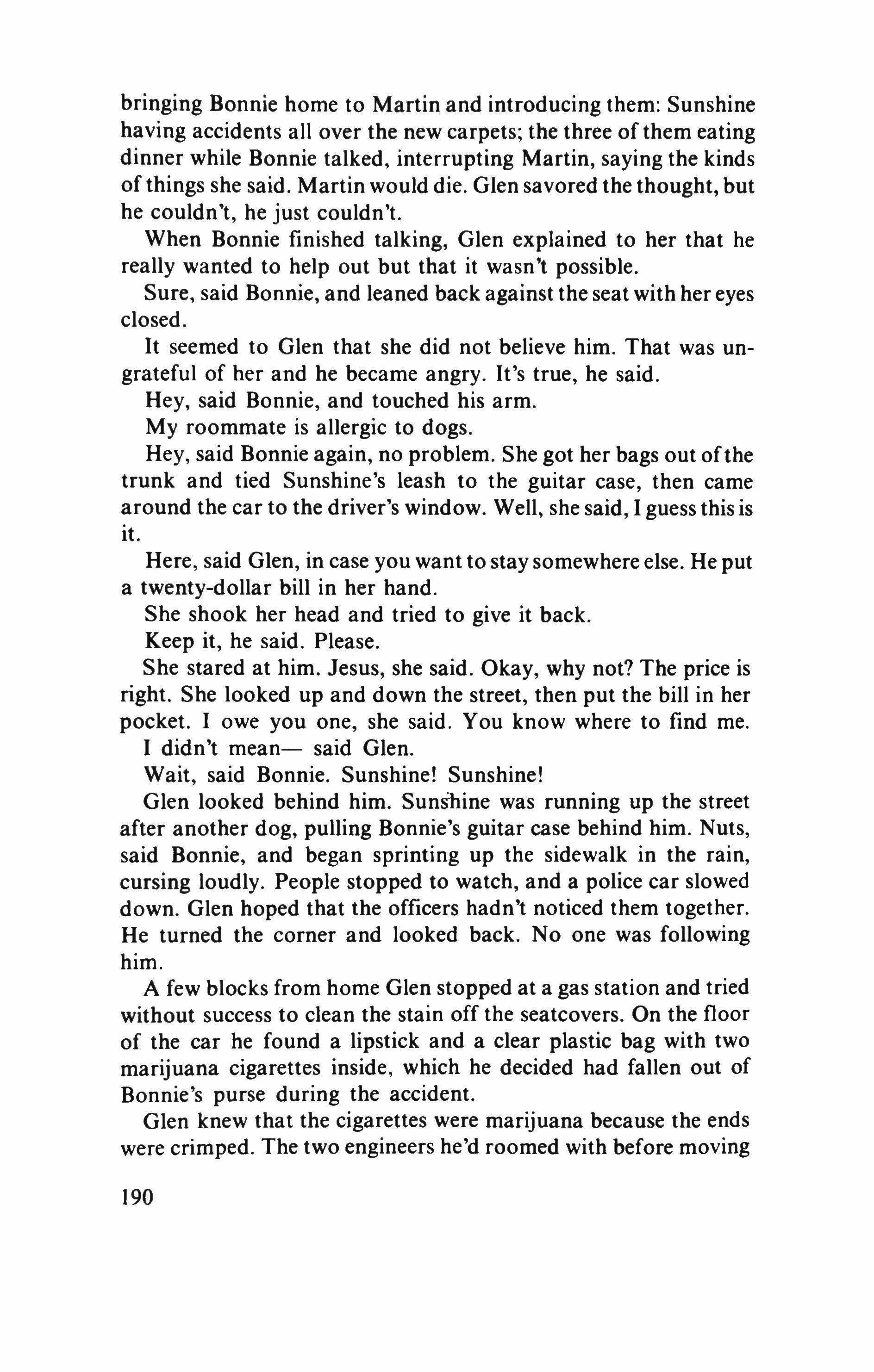
bringing Bonnie home to Martin and introducing them: Sunshine having accidents all over the new carpets; the three of them eating dinner while Bonnie talked, interrupting Martin, saying the kinds of things she said. Martin would die. Glen savored the thought, but he couldn't, he just couldn't.
When Bonnie finished talking, Glen explained to her that he really wanted to help out but that it wasn't possible.
Sure, said Bonnie, and leaned back against the seat with her eyes closed.
It seemed to Glen that she did not believe him. That was ungrateful of her and he became angry. It's true, he said.
Hey, said Bonnie, and touched his arm.
My roommate is allergic to dogs.
Hey, said Bonnie again, no problem. She got her bags out ofthe trunk and tied Sunshine's leash to the guitar case, then came around the car to the driver's window. Well, she said, I guess this is it.
Here, said Glen, in case you want to stay somewhere else. He put a twenty-dollar bill in her hand.
She shook her head and tried to give it back.
Keep it, he said. Please.
She stared at him. Jesus, she said. Okay, why not? The price is right. She looked up and down the street, then put the bill in her pocket. lowe you one, she said. You know where to find me.
I didn't mean- said Glen.
Wait, said Bonnie. Sunshine! Sunshine!
Glen looked behind him. Sunshine was running up the street after another dog, pulling Bonnie's guitar case behind him. Nuts, said Bonnie, and began sprinting up the sidewalk in the rain, cursing loudly. People stopped to watch, and a police car slowed down. Glen hoped that the officers hadn't noticed them together. He turned the corner and looked back. No one was following him.
A few blocks from home Glen stopped at a gas station and tried without success to clean the stain off the seatcovers. On the floor of the car he found a lipstick and a clear plastic bag with two marijuana cigarettes inside, which he decided had fallen out of Bonnie's purse during the accident.
Glen knew that the cigarettes were marijuana because the ends were crimped. The two engineers he'd roomed with before moving

in with Martin had smoked it every Friday night. They would pass cigarettes back and forth and comment on the quality, then tum the stereo on full blast and listen with their eyes closed, nodding in time to the music and now and then smiling and saying Get down! and Go for it! Later on they would strip the refrigerator, giggling as if the food belonged to someone else, then watch TV with the sound off and make up stupid dialogue. Glen suspected they were putting it on; he had tried their marijuana a couple of times and it didn't do anything for him. He almost threw.the cigarettes away but finally decided to hang on to them. He thought they might be valuable.
Glen could barely eat his dinner that night; he was nervous about the confession he had planned, and almost overcome by the smell of Martin's after-shave. Glen had sniffed the bottle once and the lotion was fine by itself, but for some reason it smelled like rotten eggs when Martin put it on. He didn't just use a drop or two, either; he drenched himself, slapping it all over his face and neck with the sound of applause. Finally Glen got his courage up and confessed to Martin over coffee. He had hoped that the offense of giving Bonnie a ride would be canceled out by his honesty in telling about it, but when he was finished Martin hit the roof.
For several minutes Martin spoke very abusively to Glen. It had happened before and Glen knew how to listen without hearing. When Martin ran out of abuse he began to lecture.
Why didn't she have her own car? he asked. Because she's used to going places free. Some day she's going to find out that nothing's free. You could have done anything to her. Anything. And it would have been her fault, because she put herself in your power. When you put yourself in someone else's power, you're nothing, nobody. You just have to accept what happens.
After he did the dishes, Glen unpacked and sat at the window in his room. Horns were blowing across the Sound. The fog was all around the house, thickening the air; the breath in his lungs made Glen feel slow and heavy.
He wondered what it really felt like, being high. Once Glen had gone hunting with his stepfather outside Wenatchee, and while they were watching the sun come up, a flight of geese skimmed the orchard behind them and passed overhead in a rush. As the geese wheeled south and crossed in front of the sunrise they called back
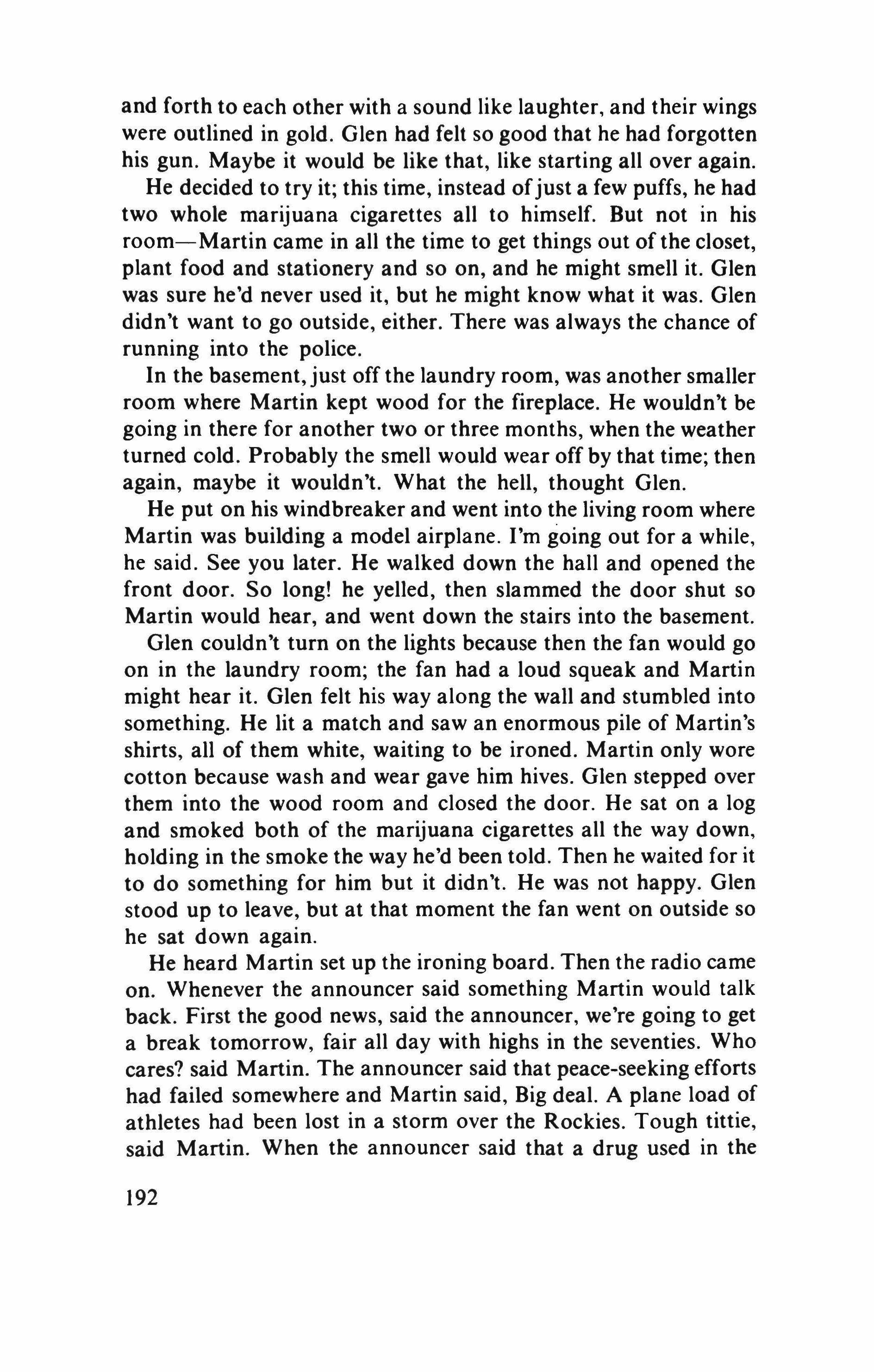
and forth to each other with a sound like laughter, and their wings were outlined in gold. Glen had felt so good that he had forgotten his gun. Maybe it would be like that, like starting all over again.
He decided to try it; this time, instead ofjust a few puffs, he had two whole marijuana cigarettes all to himself. But not in his room- Martin came in all the time to get things out of the closet, plant food and stationery and so on, and he might smell it. Glen was sure he'd never used it, but he might know what it was. Glen didn't want to go outside, either. There was always the chance of running into the police.
In the basement,just off the laundry room, was another smaller room where Martin kept wood for the fireplace. He wouldn't be going in there for another two or three months, when the weather turned cold. Probably the smell would wear off by that time; then again, maybe it wouldn't. What the hell, thought Glen.
He put on his windbreaker and went into the living room where Martin was building a model airplane. I'm going out for a while, he said. See you later. He walked down the hall and opened the front door. So long! he yelled, then slammed the door shut so Martin would hear, and went down the stairs into the basement.
Glen couldn't turn on the lights because then the fan would go on in the laundry room; the fan had a loud squeak and Martin might hear it. Glen felt his way along the wall and stumbled into something. He lit a match and saw an enormous pile of Martin's shirts, all of them white, waiting to be ironed. Martin only wore cotton because wash and wear gave him hives. Glen stepped over them into the wood room and closed the door. He sat on a log and smoked both of the marijuana cigarettes all the way down, holding in the smoke the way he'd been told. Then he waited for it to do something for him but it didn't. He was not happy. Glen stood up to leave, but at that moment the fan went on outside so he sat down again.
He heard Martin set up the ironing board. Then the radio came on. Whenever the announcer said something Martin would talk back. First the good news, said the announcer, we're going to get a break tomorrow, fair all day with highs in the seventies. Who cares? said Martin. The announcer said that peace-seeking efforts had failed somewhere and Martin said, Big deal. A plane load of athletes had been lost in a storm over the Rockies. Tough tittie, said Martin. When the announcer said that a drug used in the 192
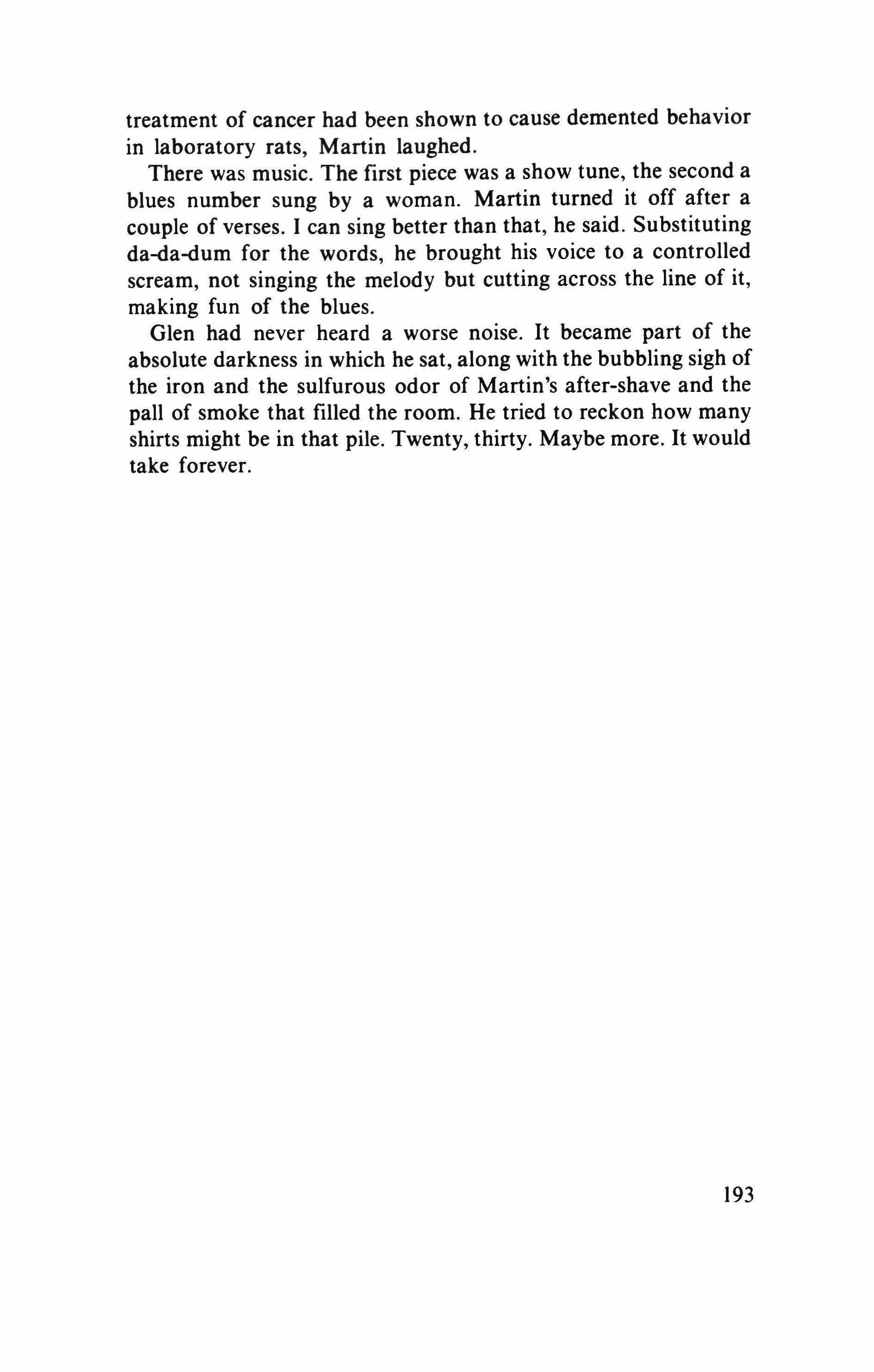
treatment of cancer had been shown to cause demented behavior in laboratory rats, Martin laughed.
There was music. The first piece was a show tune, the second a blues number sung by a woman. Martin turned it off after a couple of verses. I can sing better than that, he said. Substituting da-da-dum for the words, he brought his voice to a controlled scream, not singing the melody but cutting across the line of it, making fun of the blues.
Glen had never heard a worse noise. It became part of the absolute darkness in which he sat, along with the bubbling sigh of the iron and the sulfurous odor of Martin's after-shave and the pall of smoke that filled the room. He tried to reckon how many shirts might be in that pile. Twenty, thirty. Maybe more. It would take forever.
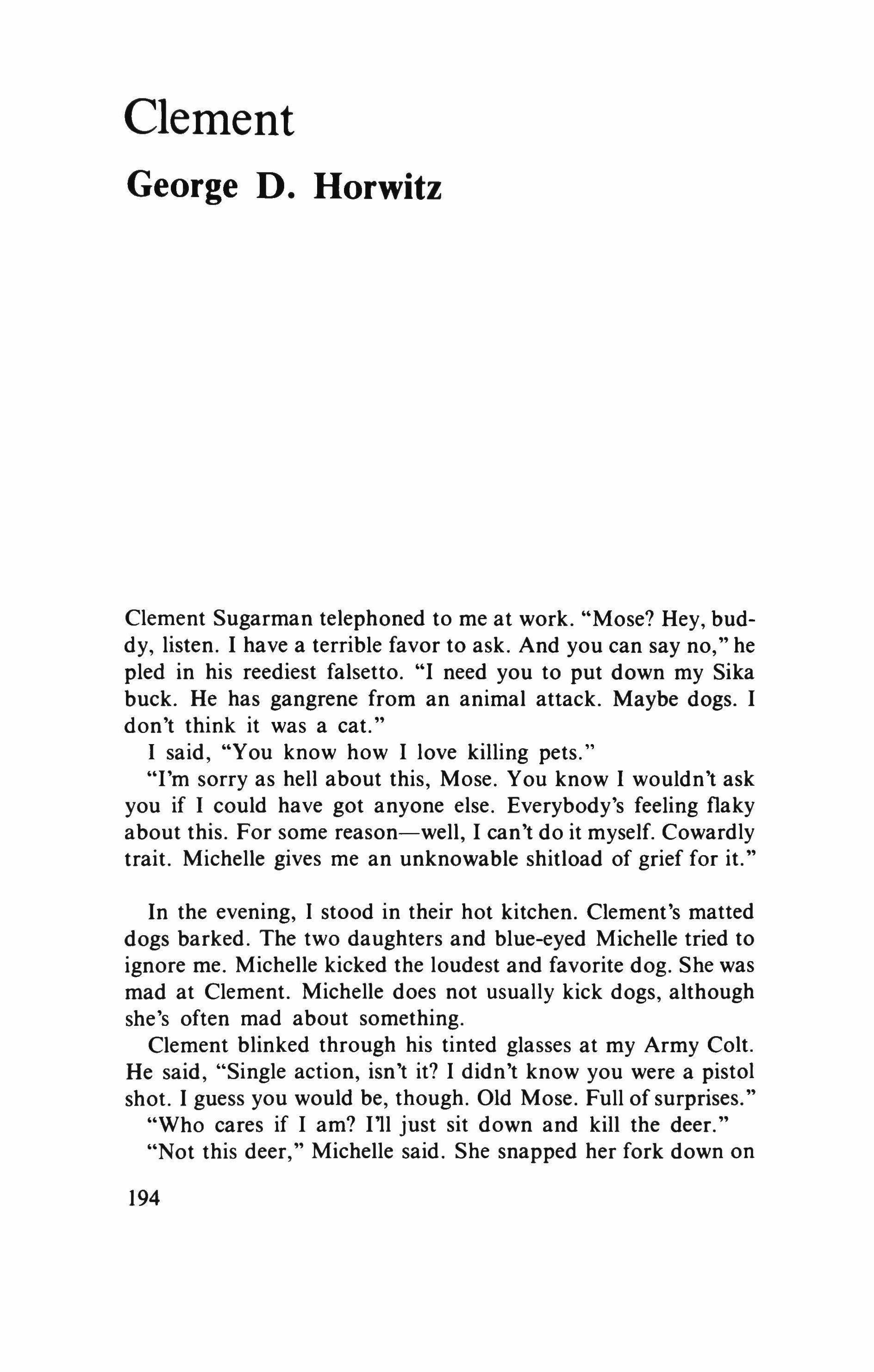
Clement Sugarman telephoned to me at work. "Mose? Hey, buddy, listen. I have a terrible favor to ask. And you can say no," he pled in his reediest falsetto. "I need you to put down my Sika buck. He has gangrene from an animal attack. Maybe dogs. I don't think it was a cat."
I said, "You know how I love killing pets."
"I'm sorry as hell about this, Mose. You know I wouldn't ask you if I could have got anyone else. Everybody's feeling flaky about this. For some reason-well, I can't do it myself. Cowardly trait. Michelle gives me an unknowable shitload of grief for it."
In the evening, I stood in their hot kitchen. Clement's matted dogs barked. The two daughters and blue-eyed Michelle tried to ignore me. Michelle kicked the loudest and favorite dog. She was mad at Clement. Michelle does not usually kick dogs, although she's often mad about something.
Clement blinked through his tinted glasses at my Army Colt. He said, "Single action, isn't it? I didn't know you were a pistol shot. I guess you would be, though. Old Mose. Full of surprises."
"Who cares if I am? 111 just sit down and kill the deer."
"Not this deer," Michelle said. She snapped her fork down on
194
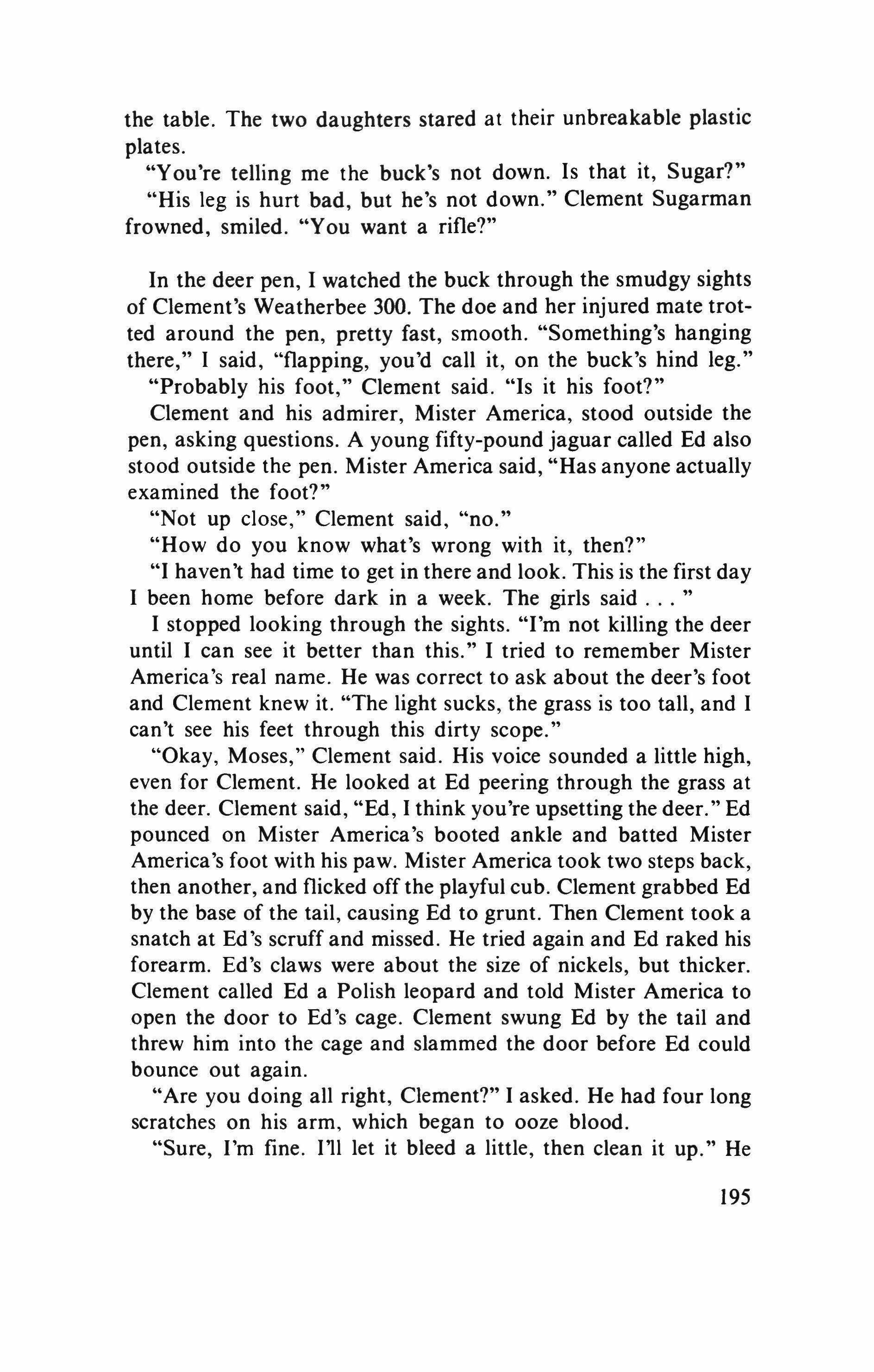
the table. The two daughters stared at their unbreakable plastic plates.
"You're telling me the buck's not down. Is that it, Sugar?"
"His leg is hurt bad, but he's not down." Clement Sugarman frowned, smiled. "You want a rifle?"
In the deer pen, I watched the buck through the smudgy sights of Clement's Weatherbee 300. The doe and her injured mate trotted around the pen, pretty fast, smooth. "Something's hanging there," I said, "flapping, you'd call it, on the buck's hind leg."
"Probably his foot," Clement said. "Is it his foot?"
Clement and his admirer, Mister America, stood outside the pen, asking questions. A young fifty-pound jaguar called Ed also stood outside the pen. Mister America said, "Has anyone actually examined the foot?"
"Not up close," Clement said, "no."
"How do you know what's wrong with it, then?"
"I haven't had time to get in there and look. This is the first day I been home before dark in a week. The girls said I stopped looking through the sights. "I'm not killing the deer until I can see it better than this." I tried to remember Mister America's real name. He was correct to ask about the deer's foot and Clement knew it. "The light sucks, the grass is too tall, and I can't see his feet through this dirty scope."
"Okay, Moses," Clement said. His voice sounded a little high, even for Clement. He looked at Ed peering through the grass at the deer. Clement said, "Ed, I think you're upsetting the deer." Ed pounced on Mister America's booted ankle and batted Mister America's foot with his paw. Mister America took two steps back, then another, and flicked off the playful cub. Clement grabbed Ed by the base of the tail, causing Ed to grunt. Then Clement took a snatch at Ed's scruff and missed. He tried again and Ed raked his forearm. Ed's claws were about the size of nickels, but thicker. Clement called Ed a Polish leopard and told Mister America to open the door to Ed's cage. Clement swung Ed by the tail and threw him into the cage and slammed the door before Ed could bounce out again.
"Are you doing all right, Clement?" I asked. He had four long scratches on his arm, which began to ooze blood.
"Sure, I'm fine. 111 let it bleed a little, then clean it up." He
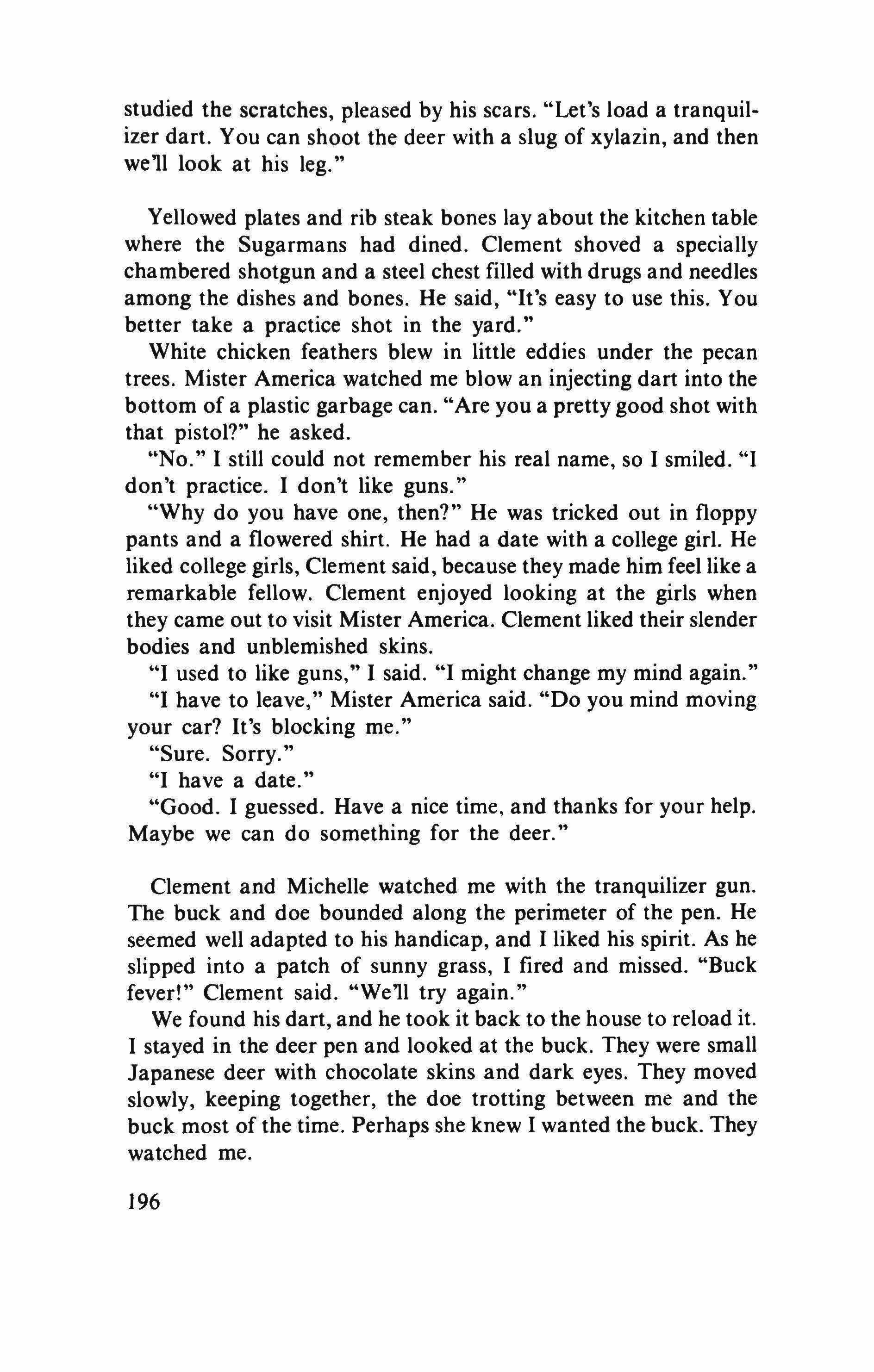
studied the scratches, pleased by his scars. "Let's load a tranquilizer dart. You can shoot the deer with a slug of xylazin, and then we'll look at his leg."
Yellowed plates and rib steak bones lay about the kitchen table where the Sugarmans had dined. Clement shoved a specially chambered shotgun and a steel chest filled with drugs and needles among the dishes and bones. He said, "It's easy to use this. You better take a practice shot in the yard."
White chicken feathers blew in little eddies under the pecan trees. Mister America watched me blow an injecting dart into the bottom of a plastic garbage can. "Are you a pretty good shot with that pistol?" he asked.
"No." I still could not remember his real name, so I smiled. "I don't practice. I don't like guns."
"Why do you have one, then?" He was tricked out in floppy pants and a flowered shirt. He had a date with a college girl. He liked college girls, Clement said, because they made him feel like a remarkable fellow. Clement enjoyed looking at the girls when they came out to visit Mister America. Clement liked their slender bodies and unblemished skins.
"I used to like guns," I said. "I might change my mind again."
"I have to leave," Mister America said. "Do you mind moving your car? It's blocking me."
"Sure. Sorry."
"I have a date."
"Good. I guessed. Have a nice time, and thanks for your help. Maybe we can do something for the deer."
Clement and Michelle watched me with the tranquilizer gun. The buck and doe bounded along the perimeter of the pen. He seemed well adapted to his handicap, and I liked his spirit. As he slipped into a patch of sunny grass, 1 fired and missed. "Buck fever!" Clement said. "We'll try again."
We found his dart, and he took it back to the house to reload it. I stayed in the deer pen and looked at the buck. They were small Japanese deer with chocolate skins and dark eyes. They moved slowly, keeping together, the doe trotting between me and the buck most of the time. Perhaps she knew I wanted the buck. They watched me.
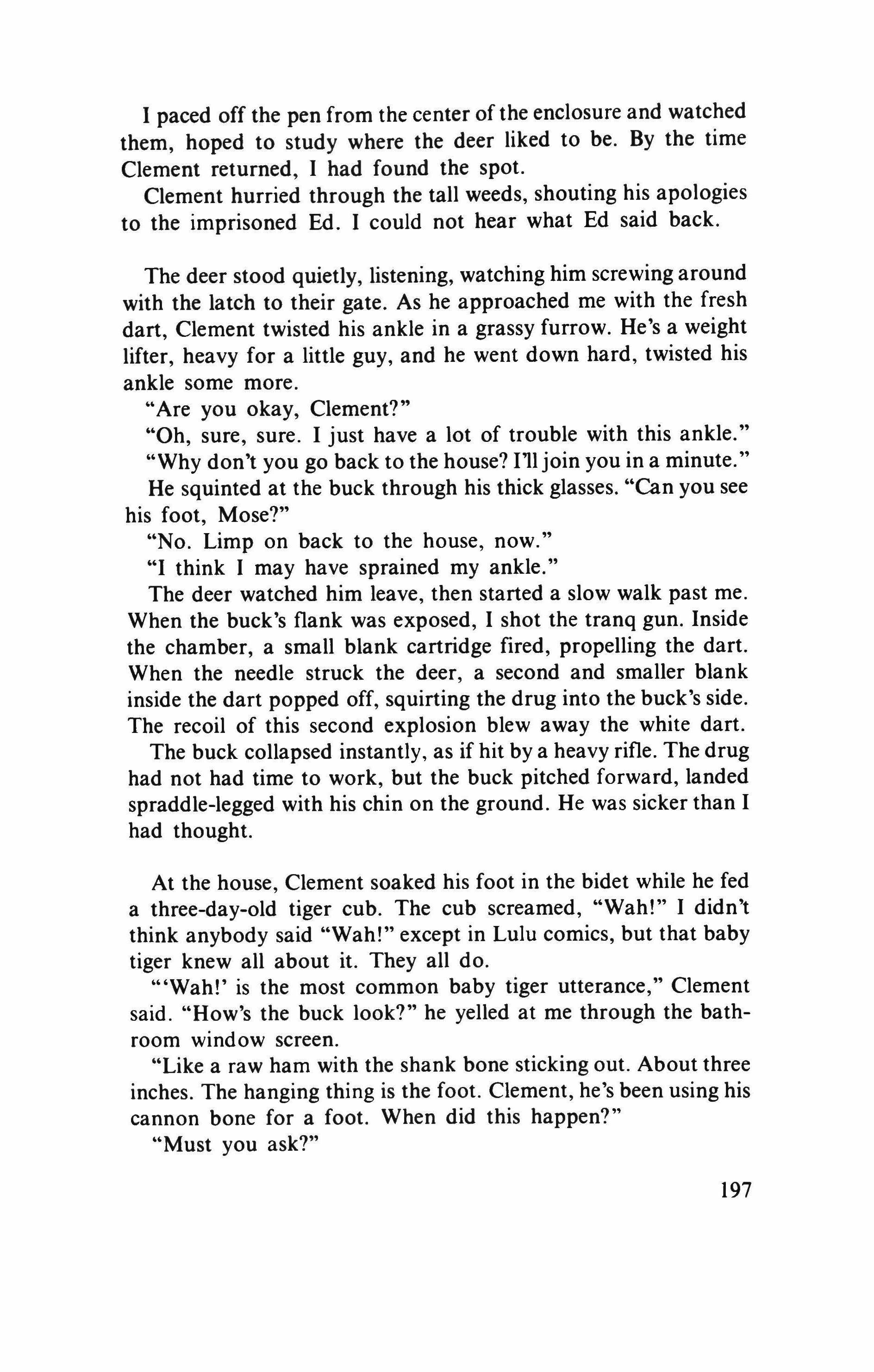
I paced off the pen from the center of the enclosure and watched them, hoped to study where the deer liked to be. By the time Clement returned, I had found the spot.
Clement hurried through the tall weeds, shouting his apologies to the imprisoned Ed. I could not hear what Ed said back.
The deer stood quietly, listening, watching him screwing around with the latch to their gate. As he approached me with the fresh dart, Clement twisted his ankle in a grassy furrow. He's a weight lifter, heavy for a little guy, and he went down hard, twisted his ankle some more.
"Are you okay, Clement?"
"Oh, sure, sure. I just have a lot of trouble with this ankle."
"Why don't you go back to the house? 111 join you in a minute."
He squinted at the buck through his thick glasses. "Can you see his foot, Mose?"
"No. Limp on back to the house, now."
"I think I may have sprained my ankle."
The deer watched him leave, then started a slow walk past me. When the buck's flank was exposed, I shot the tranq gun. Inside the chamber, a small blank cartridge fired, propelling the dart. When the needle struck the deer, a second and smaller blank inside the dart popped off, squirting the drug into the buck's side. The recoil of this second explosion blew away the white dart.
The buck collapsed instantly, as if hit by a heavy rifle. The drug had not had time to work, but the buck pitched forward, landed spraddle-legged with his chin on the ground. He was sicker than I had thought.
At the house, Clement soaked his foot in the bidet while he fed a three-day-old tiger cub. The cub screamed, "Wah!" I didn't think anybody said "Wah!" except in Lulu comics, but that baby tiger knew all about it. They all do.
'''Wah!' is the most common baby tiger utterance," Clement said. "How's the buck look?" he yelled at me through the bathroom window screen.
"Like a raw ham with the shank bone sticking out. About three inches. The hanging thing is the foot. Clement, he's been using his cannon bone for a foot. When did this happen?"
"Must you ask?" 197

"No, of course not. But you must tell me."
"I don't know."
"Guess."
"Three weeks ago," Clement said. "Maybe four."
"Maybe six." Michelle strode out on the kitchen porch, her little hands on her hips. "At least six weeks, Clem."
"Sugarman! Six damn weeks?"
"Maybe four, maybe six. Who knows? Either way, it's bad. With this new job, I have to go to work every day of the week. I don't have enough time for the animals."
"Do you want to fix the deer's leg?"
"Do you think we can, Mose? I guess we could." ··Wah!"
'·1 think the flies have kept it pretty clean. Raw, but not smelly. But I don't know anything about animal surgery."
"It's a classy little operation. You cut out the cannon bone back to the joint, dress it inside, and stitch a little sack out of the skin. Presto! A three-legged deer! We could do it tomorrow. Do you want to do it tomorrow?"
"No, I don't want to do it any time. It sounds like a Greyhound restroom jerk-off. But if it works, I got no objection to a threelegged deer. Why'd you wait so long?"
"Mea culpa! Michelle, why don't you and Moses take a look at the stag? Do you mind?"
Michelle minded, and on the way back to the pen she told me so. "He always does this. He spreads himself real thin, talking to this person, fucking that person, hurting himself, complaining, making trips to get these animals, trying to sell the babies. (He'11 never unload Ed. Nobody wants jaguars. I don't blame them, either. Do you?)" In some other setup, without Clement and his cats, Michelle would have seemed powerful and interesting, and she knew it. And hated it and complained about it. "I don't even want to look at this poor deer."
"I'm sorry to be dragging it out, Michelle. I should have just shot the bugger."
"Ah, Mose. You know what I mean. He should be taking care of business. Instead, he's in there playing dolls with a baby tiger. And you're out here with his dirty linen." She fixed me with those blue eyes. "It puts you in a shitty position, and he feels like a jerk. Which is fair." 198
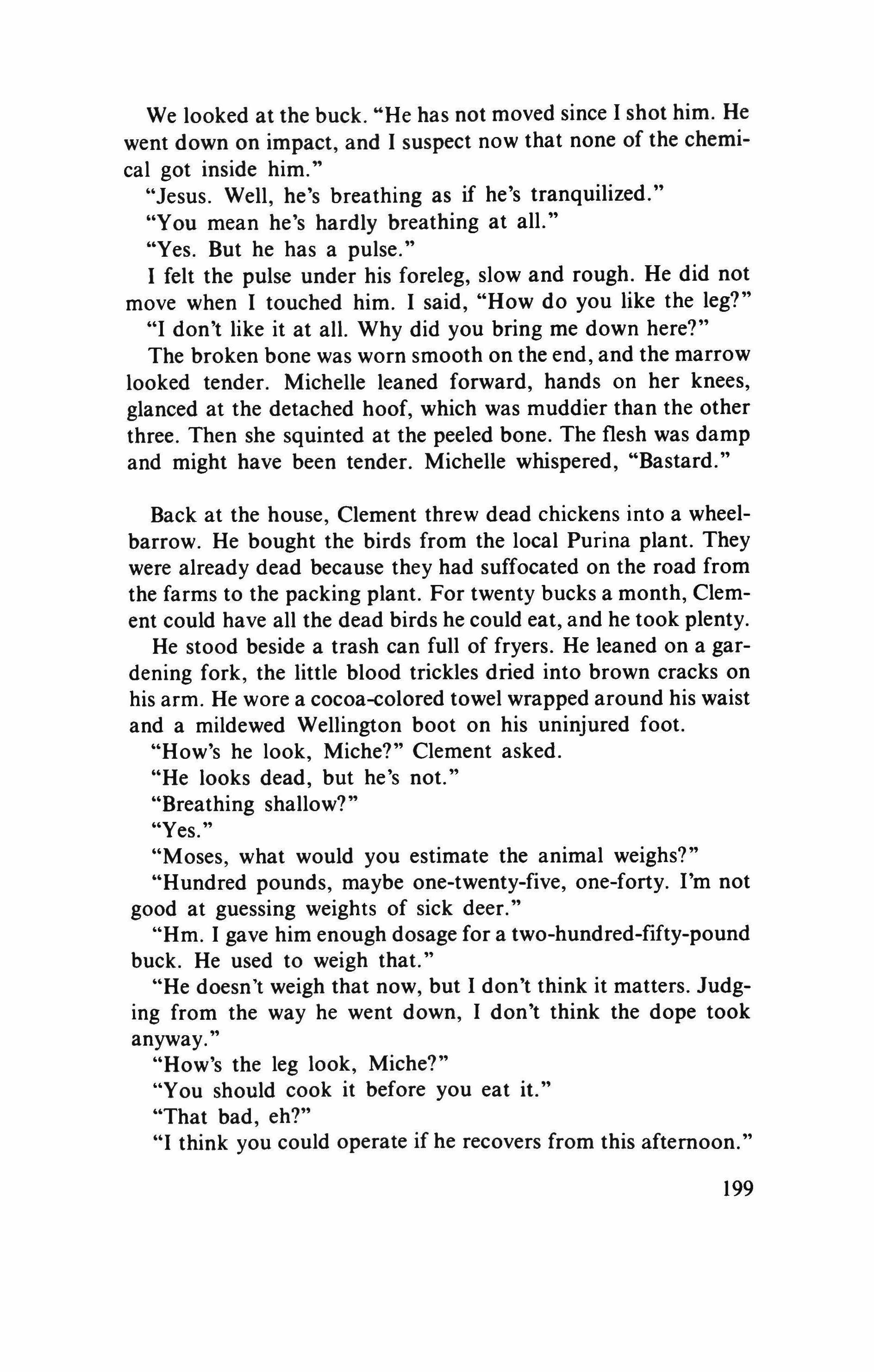
We looked at the buck. "He has not moved since I shot him. He went down on impact, and I suspect now that none of the chemical got inside him."
"Jesus. Well, he's breathing as if he's tranquilized."
"You mean he's hardly breathing at all."
"Yes. But he has a pulse."
1 felt the pulse under his foreleg, slow and rough. He did not move when 1 touched him. 1 said, "How do you like the leg?"
"I don't like it at all. Why did you bring me down here?"
The broken bone was worn smooth on the end, and the marrow looked tender. Michelle leaned forward, hands on her knees, glanced at the detached hoof, which was muddier than the other three. Then she squinted at the peeled bone. The flesh was damp and might have been tender. Michelle whispered, "Bastard."
Back at the house, Clement threw dead chickens into a wheelbarrow. He bought the birds from the local Purina plant. They were already dead because they had suffocated on the road from the farms to the packing plant. For twenty bucks a month, Clement could have all the dead birds he could eat, and he took plenty. He stood beside a trash can full of fryers. He leaned on a gardening fork, the little blood trickles dried into brown cracks on his arm. He wore a cocoa-colored towel wrapped around his waist and a mildewed Wellington boot on his uninjured foot.
"How's he look, Miche?" Clement asked.
"He looks dead, but he's not."
"Breathing shallow?"
"Yes.
"Moses, what would you estimate the animal weighs?"
"Hundred pounds, maybe one-twenty-five, one-forty. I'm not good at guessing weights of sick deer."
"Hm. 1 gave him enough dosage for a two-hundred-fifty-pound buck. He used to weigh that."
"He doesn't weigh that now, but 1 don't think it matters. Judging from the way he went down, I don't think the dope took anyway."
"How's the leg look, Miche?"
"You should cook it before you eat it."
"That bad, eh?"
"I think you could operate if he recovers from this afternoon."
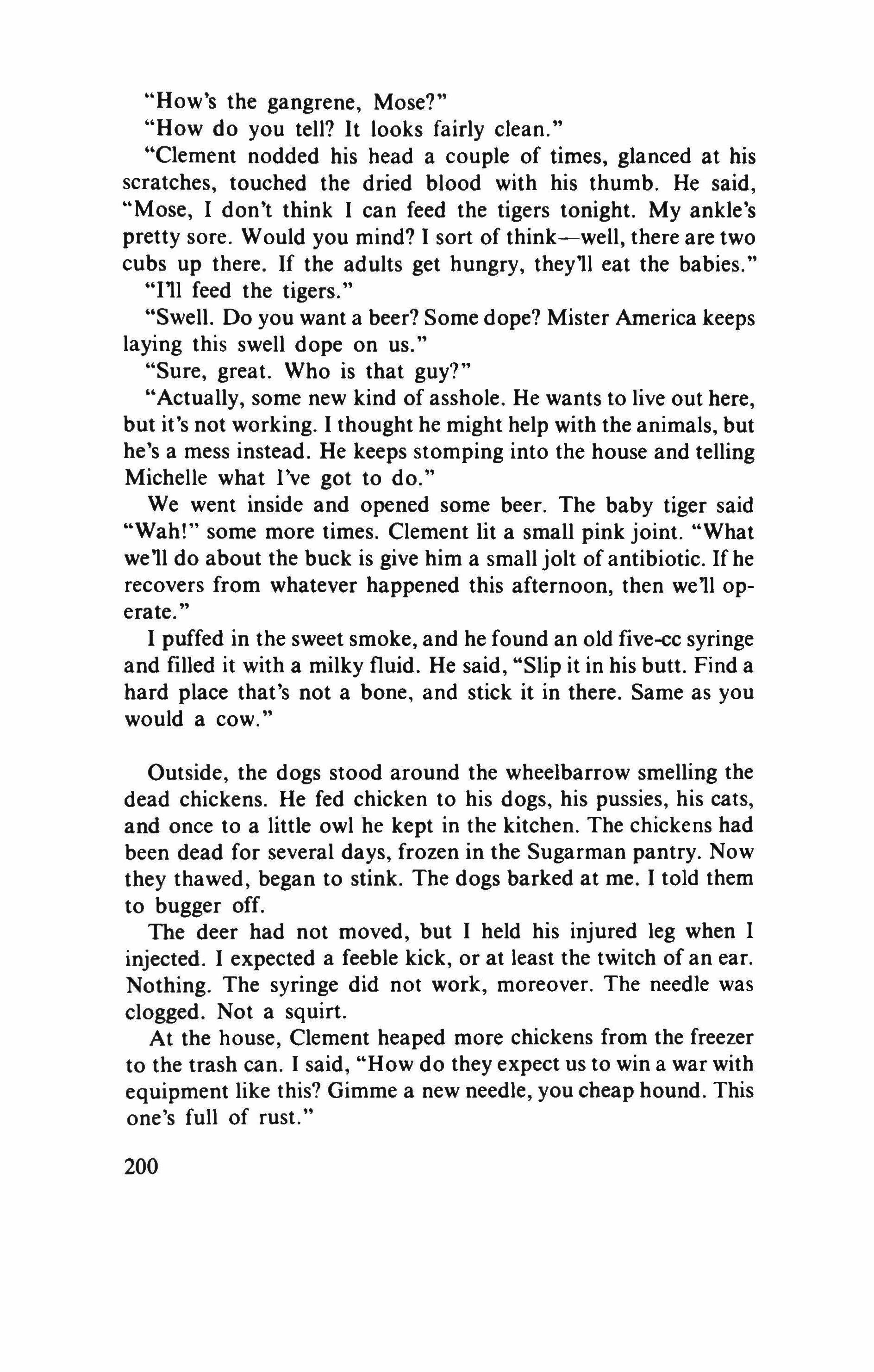
"How's the gangrene, Mose?"
"How do you tell? It looks fairly clean."
"Clement nodded his head a couple of times, glanced at his scratches, touched the dried blood with his thumb. He said, "Mose, I don't think I can feed the tigers tonight. My ankle's pretty sore. Would you mind? I sort of think-well, there are two cubs up there. If the adults get hungry, they'll eat the babies."
"111 feed the tigers."
"Swell. Do you want a beer? Some dope? Mister America keeps laying this swell dope on us."
"Sure, great. Who is that guy?"
"Actually, some new kind of asshole. He wants to live out here, but it's not working. I thought he might help with the animals, but he's a mess instead. He keeps stomping into the house and telling Michelle what I've got to do."
We went inside and opened some beer. The baby tiger said "Wah!" some more times. Clement lit a small pink joint. "What we'll do about the buck is give him a small jolt of antibiotic. If he recovers from whatever happened this afternoon, then we'll operate."
I puffed in the sweet smoke, and he found an old five-cc syringe and filled it with a milky fluid. He said, "Slip it in his butt. Find a hard place that's not a bone, and stick it in there. Same as you would a cow."
Outside, the dogs stood around the wheelbarrow smelling the dead chickens. He fed chicken to his dogs, his pussies, his cats, and once to a little owl he kept in the kitchen. The chickens had been dead for several days, frozen in the Sugarman pantry. Now they thawed, began to stink. The dogs barked at me. I told them to bugger off.
The deer had not moved, but I held his injured leg when I injected. I expected a feeble kick, or at least the twitch of an ear. Nothing. The syringe did not work, moreover. The needle was clogged. Not a squirt.
At the house, Clement heaped more chickens from the freezer to the trash can. I said, "How do they expect us to win a war with equipment like this? Gimme a new needle, you cheap hound. This one's full of rust."
200
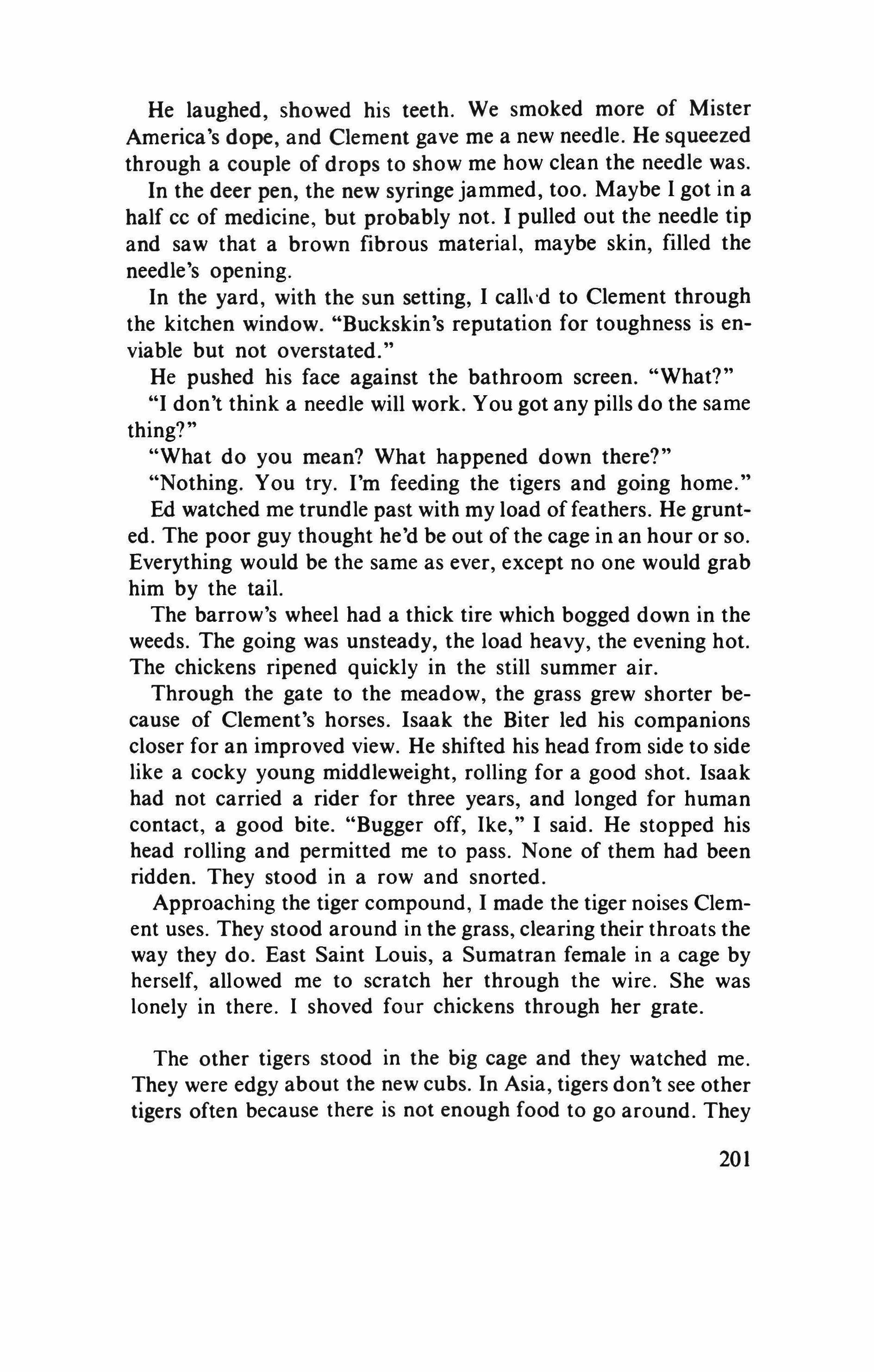
He laughed, showed his teeth. We smoked more of Mister America's dope, and Clement gave me a new needle. He squeezed through a couple of drops to show me how clean the needle was.
In the deer pen, the new syringe jammed, too. Maybe I got in a half cc of medicine, but probably not. I pulled out the needle tip and saw that a brown fibrous material, maybe skin, filled the needle's opening.
In the yard, with the sun setting, I called to Clement through the kitchen window. "Buckskin's reputation for toughness is enviable but not overstated."
He pushed his face against the bathroom screen. "What?"
"I don't think a needle will work. You got any pills do the same thing?"
"What do you mean? What happened down there?"
"Nothing. You try. I'm feeding the tigers and going home."
Ed watched me trundle past with my load of feathers. He grunted. The poor guy thought he'd be out of the cage in an hour or so. Everything would be the same as ever, except no one would grab him by the tail.
The barrow's wheel had a thick tire which bogged down in the weeds. The going was unsteady, the load heavy, the evening hot. The chickens ripened quickly in the still summer air.
Through the gate to the meadow, the grass grew shorter because of Clement's horses. Isaak the Biter led his companions closer for an improved view. He shifted his head from side to side like a cocky young middleweight, rolling for a good shot. Isaak had not carried a rider for three years, and longed for human contact, a good bite. "Bugger off, Ike," I said. He stopped his head rolling and permitted me to pass. None of them had been ridden. They stood in a row and snorted.
Approaching the tiger compound, I made the tiger noises Clement uses. They stood around in the grass, clearing their throats the way they do. East Saint Louis, a Sumatran female in a cage by herself, allowed me to scratch her through the wire. She was lonely in there. I shoved four chickens through her grate.
The other tigers stood in the big cage and they watched me. They were edgy about the new cubs. In Asia, tigers don't see other tigers often because there is not enough food to go around. They
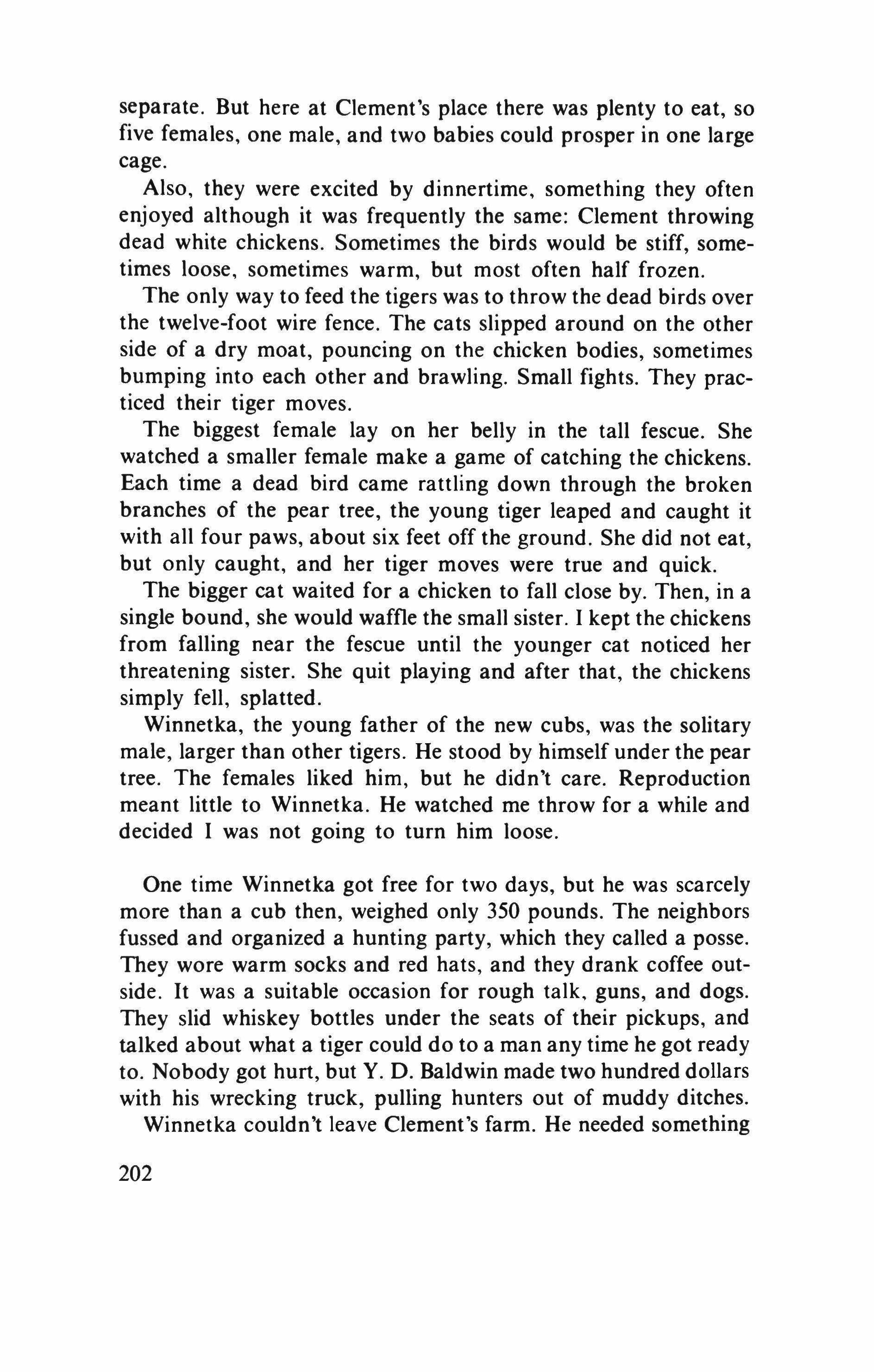
separate. But here at Clement's place there was plenty to eat, so five females, one male, and two babies could prosper in one large cage.
Also, they were excited by dinnertime, something they often enjoyed although it was frequently the same: Clement throwing dead white chickens. Sometimes the birds would be stiff, sometimes loose, sometimes warm, but most often half frozen.
The only way to feed the tigers was to throw the dead birds over the twelve-foot wire fence. The cats slipped around on the other side of a dry moat, pouncing on the chicken bodies, sometimes bumping into each other and brawling. Small fights. They practiced their tiger moves.
The biggest female lay on her belly in the tall fescue. She watched a smaller female make a game of catching the chickens. Each time a dead bird came rattling down through the broken branches of the pear tree, the young tiger leaped and caught it with all four paws, about six feet off the ground. She did not eat, but only caught, and her tiger moves were true and quick.
The bigger cat waited for a chicken to fall close by. Then, in a single bound, she would waffle the small sister. I kept the chickens from falling near the fescue until the younger cat noticed her threatening sister. She quit playing and after that, the chickens simply fell, splatted.
Winnetka, the young father of the new cubs, was the solitary male, larger than other tigers. He stood by himself under the pear tree. The females liked him, but he didn't care. Reproduction meant little to Winnetka. He watched me throw for a while and decided I was not going to turn him loose.
One time Winnetka got free for two days, but he was scarcely more than a cub then, weighed only 350 pounds. The neighbors fussed and organized a hunting party, which they called a posse. They wore warm socks and red hats, and they drank coffee outside. It was a suitable occasion for rough talk, guns, and dogs. They slid whiskey bottles under the seats of their pickups, and talked about what a tiger could do to a man any time he got ready to. Nobody got hurt, but Y. D. Baldwin made two hundred dollars with his wrecking truck, pulling hunters out of muddy ditches.
Winnetka couldn't leave Clement's farm. He needed something
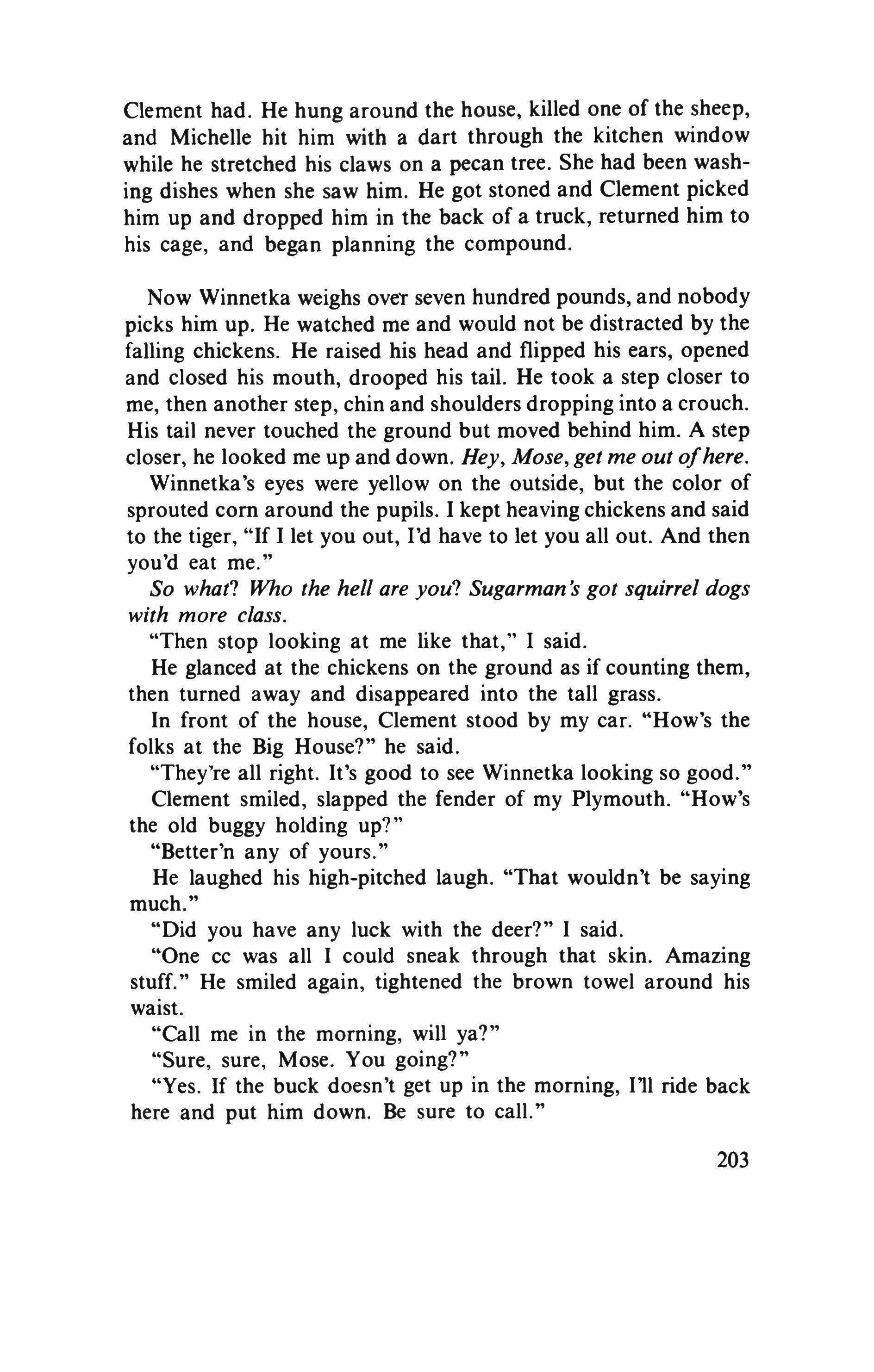
Clement had. He hung around the house, killed one of the sheep, and Michelle hit him with a dart through the kitchen window while he stretched his claws on a pecan tree. She had been washing dishes when she saw him. He got stoned and Clement picked him up and dropped him in the back of a truck, returned him to his cage, and began planning the compound.
Now Winnetka weighs over seven hundred pounds, and nobody picks him up. He watched me and would not be distracted by the falling chickens. He raised his head and flipped his ears, opened and closed his mouth, drooped his tail. He took a step closer to me, then another step, chin and shoulders dropping into a crouch. His tail never touched the ground but moved behind him. A step closer, he looked me up and down. Hey, Mose, get me out ofhere.
Winnetka's eyes were yellow on the outside, but the color of sprouted com around the pupils. I kept heaving chickens and said to the tiger, "If I let you out, I'd have to let you all out. And then you'd eat me."
So what? Who the hell are you? Sugarman s got squirrel dogs with more class.
"Then stop looking at me like that," I said.
He glanced at the chickens on the ground as if counting them, then turned away and disappeared into the tall grass.
In front of the house, Clement stood by my car. "How's the folks at the Big House?" he said.
"They're all right. It's good to see Winnetka looking so good."
Clement smiled, slapped the fender of my Plymouth. "How's the old buggy holding up?"
"Better'n any of yours."
He laughed his high-pitched laugh. "That wouldn't be saying much."
"Did you have any luck with the deer?" I said.
"One cc was all I could sneak through that skin. Amazing stuff." He smiled again, tightened the brown towel around his waist.
"Call me in the morning, will ya?"
"Sure, sure, Mose. You going?"
"Yes. If the buck doesn't get up in the morning, 111 ride back here and put him down. Be sure to call."
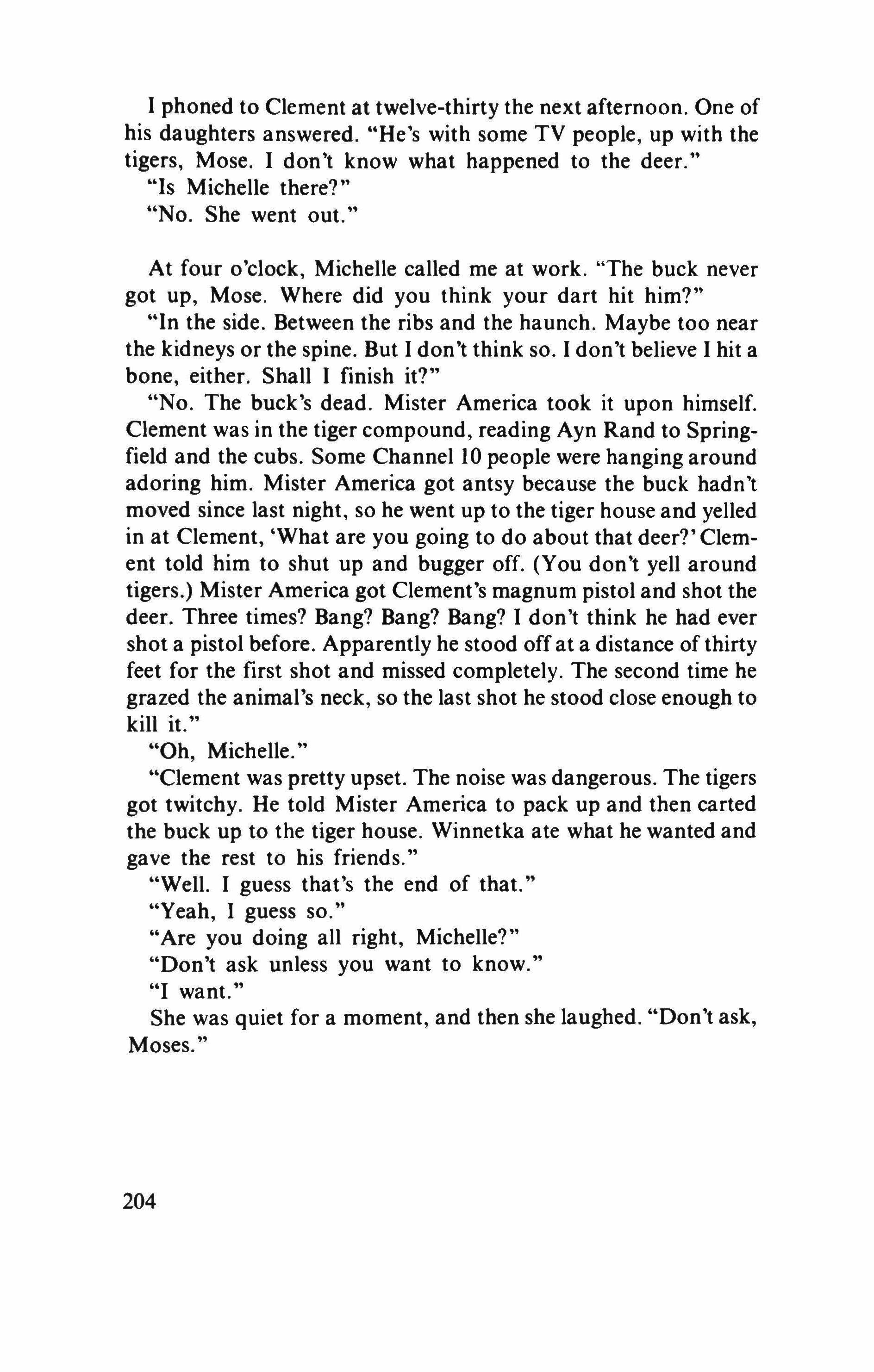
I phoned to Clement at twelve-thirty the next afternoon. One of his daughters answered. "He's with some TV people, up with the tigers, Mose. I don't know what happened to the deer."
"Is Michelle there?"
"No. She went out."
At four o'clock, Michelle called me at work. "The buck never got up, Mose. Where did you think your dart hit him?"
"In the side. Between the ribs and the haunch. Maybe too near the kidneys or the spine. But I don't think so. I don't believe I hit a bone, either. Shall I finish it?"
"No. The buck's dead. Mister America took it upon himself. Clement was in the tiger compound, reading Ayn Rand to Springfield and the cubs. Some Channel 10 people were hanging around adoring him. Mister America got antsy because the buck hadn't moved since last night, so he went up to the tiger house and yelled in at Clement, 'What are you going to do about that deer?' Clement told him to shut up and bugger off. (You don't yell around tigers.) Mister America got Clement's magnum pistol and shot the deer. Three times? Bang? Bang? Bang? I don't think he had ever shot a pistol before. Apparently he stood off at a distance of thirty feet for the first shot and missed completely. The second time he grazed the animal's neck, so the last shot he stood close enough to kill it."
"Oh, Michelle."
"Clement was pretty upset. The noise was dangerous. The tigers got twitchy. He told Mister America to pack up and then carted the buck up to the tiger house. Winnetka ate what he wanted and gave the rest to his friends."
"Well. I guess that's the end of that."
"Yeah, I guess so."
"Are you doing all right, Michelle?"
"Don't ask unless you want to know."
"I want."
She was quiet for a moment, and then she laughed. "Don't ask, Moses."
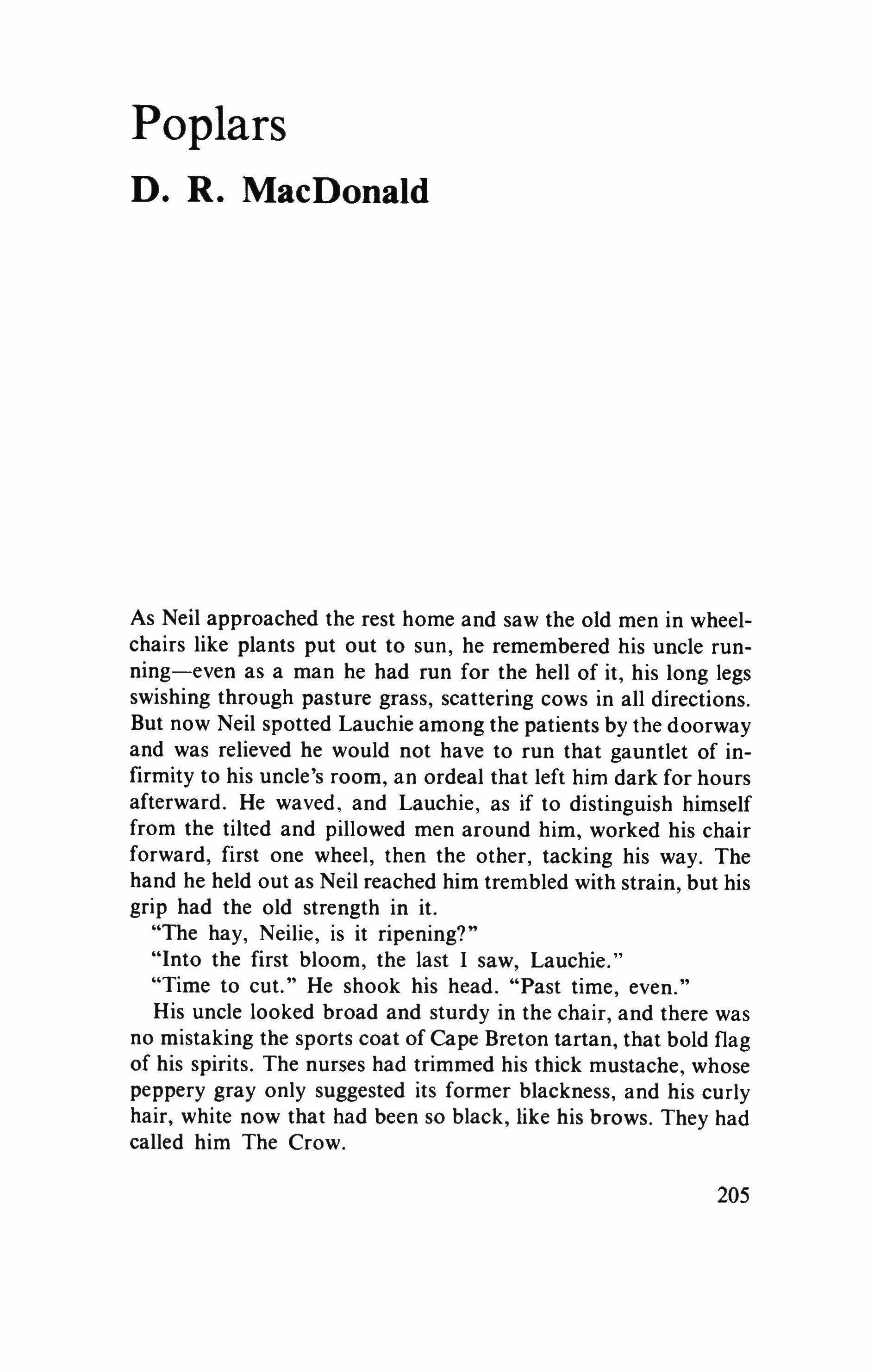
As Neil approached the rest home and saw the old men in wheelchairs like plants put out to sun, he remembered his uncle running-even as a man he had run for the hell of it, his long legs swishing through pasture grass, scattering cows in all directions. But now Neil spotted Lauchie among the patients by the doorway and was relieved he would not have to run that gauntlet of infirmity to his uncle's room, an ordeal that left him dark for hours afterward. He waved, and Lauchie, as if to distinguish himself from the tilted and pillowed men around him, worked his chair forward, first one wheel, then the other, tacking his way. The hand he held out as Neil reached him trembled with strain, but his grip had the old strength in it.
"The hay, Neilie, is it ripening?"
"Into the first bloom, the last I saw, Lauchie."
"Time to cut." He shook his head. "Past time, even."
His uncle looked broad and sturdy in the chair, and there was no mistaking the sports coat of Cape Breton tartan, that bold flag of his spirits. The nurses had trimmed his thick mustache, whose peppery gray only suggested its former blackness, and his curly hair, white now that had been so black, like his brows. They had called him The Crow.
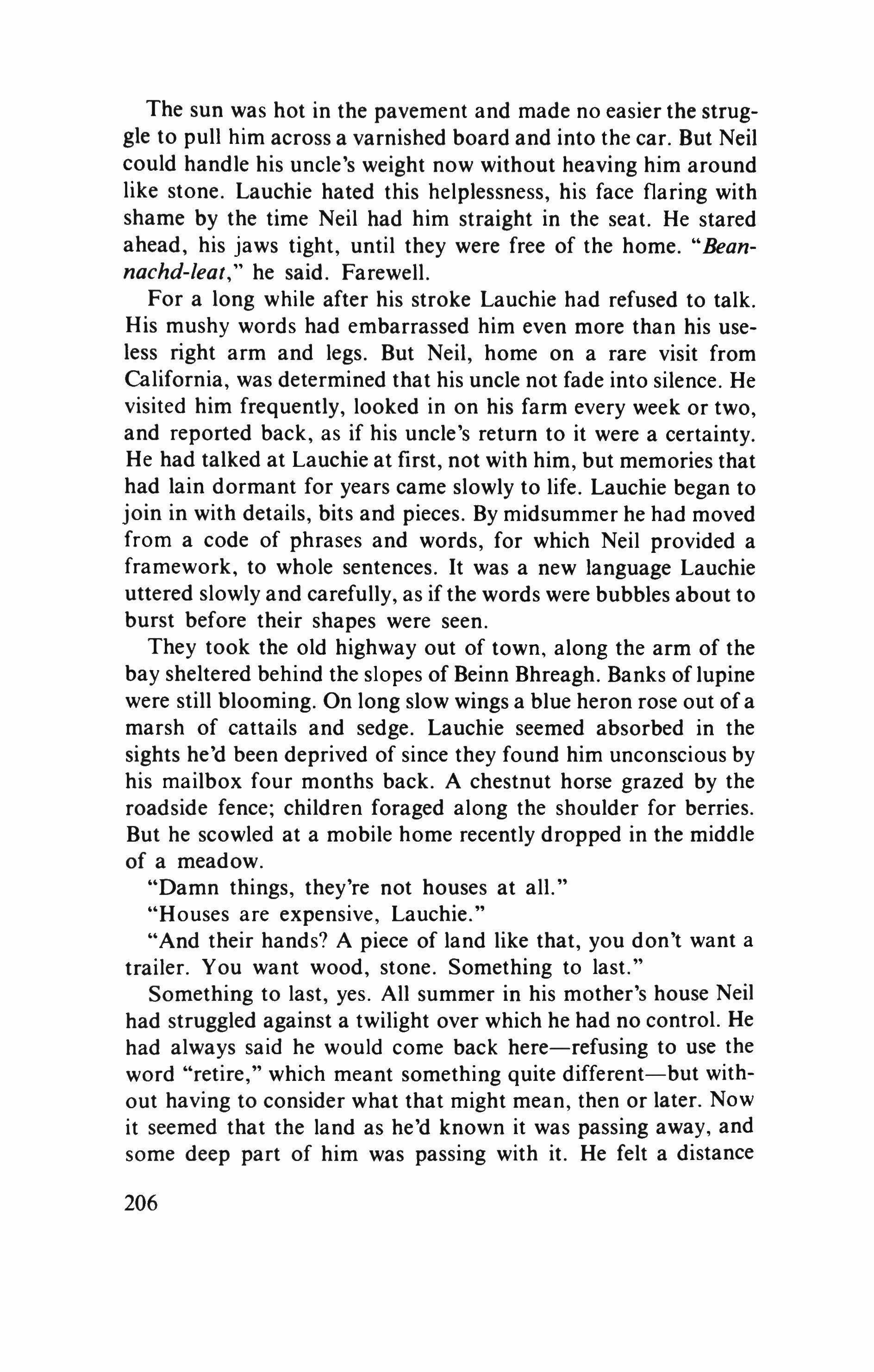
The sun was hot in the pavement and made no easier the struggle to pull him across a varnished board and into the car. But Neil could handle his uncle's weight now without heaving him around like stone. Lauchie hated this helplessness, his face flaring with shame by the time Neil had him straight in the seat. He stared ahead, his jaws tight, until they were free of the home. "Beannachd-leat;" he said. Farewell.
For a long while after his stroke Lauchie had refused to talk. His mushy words had embarrassed him even more than his useless right arm and legs. But Neil, home on a rare visit from California, was determined that his uncle not fade into silence. He visited him frequently, looked in on his farm every week or two, and reported back, as if his uncle's return to it were a certainty. He had talked at Lauchie at first, not with him, but memories that had lain dormant for years came slowly to life. Lauchie began to join in with details, bits and pieces. By midsummer he had moved from a code of phrases and words, for which Neil provided a framework, to whole sentences. It was a new language Lauchie uttered slowly and carefully, as ifthe words were bubbles about to burst before their shapes were seen.
They took the old highway out of town, along the arm of the bay sheltered behind the slopes of Beinn Bhreagh. Banks of lupine were still blooming. On long slow wings a blue heron rose out of a marsh of cattails and sedge. Lauchie seemed absorbed in the sights he'd been deprived of since they found him unconscious by his mailbox four months back. A chestnut horse grazed by the roadside fence; children foraged along the shoulder for berries. But he scowled at a mobile home recently dropped in the middle of a meadow.
"Damn things, they're not houses at all."
"Houses are expensive, Lauchie."
"And their hands? A piece of land like that, you don't want a trailer. You want wood, stone. Something to last."
Something to last, yes. All summer in his mother's house Neil had struggled against a twilight over which he had no control. He had always said he would come back here-refusing to use the word "retire," which meant something quite different-but without having to consider what that might mean, then or later. Now it seemed that the land as he'd known it was passing away, and some deep part of him was passing with it. He felt a distance
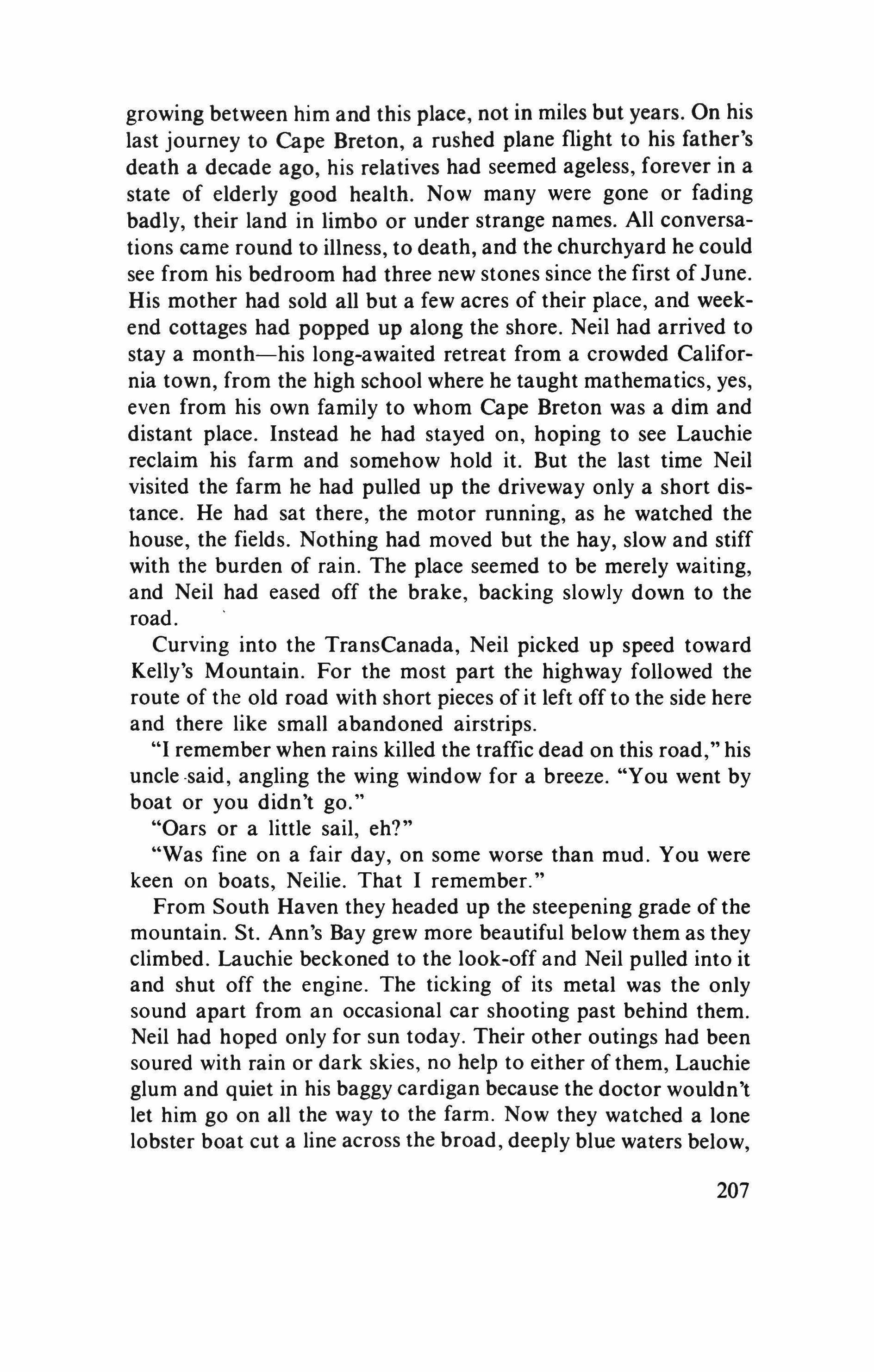
growing between him and this place, not in miles but years. On his last journey to Cape Breton, a rushed plane flight to his father's death a decade ago, his relatives had seemed ageless, forever in a state of elderly good health. Now many were gone or fading badly, their land in limbo or under strange names. All conversations came round to illness, to death, and the churchyard he could see from his bedroom had three new stones since the first of June. His mother had sold all but a few acres of their place, and weekend cottages had popped up along the shore. Neil had arrived to stay a month-his long-awaited retreat from a crowded California town, from the high school where he taught mathematics, yes, even from his own family to whom Cape Breton was a dim and distant place. Instead he had stayed on, hoping to see Lauchie reclaim his farm and somehow hold it. But the last time Neil visited the farm he had pulled up the driveway only a short distance. He had sat there, the motor running, as he watched the house, the fields. Nothing had moved but the hay, slow and stiff with the burden of rain. The place seemed to be merely waiting, and Neil had eased off the brake, backing slowly down to the road.
Curving into the TransCanada, Neil picked up speed toward Kelly's Mountain. For the most part the highway followed the route of the old road with short pieces of it left off to the side here and there like small abandoned airstrips.
"I remember when rains killed the traffic dead on this road," his uncle -said, angling the wing window for a breeze. "You went by boat or you didn't go."
"Oars or a little sail, eh?"
"Was fine on a fair day, on some worse than mud. You were keen on boats, Neilie. That I remember."
From South Haven they headed up the steepening grade of the mountain. St. Ann's Bay grew more beautiful below them as they climbed. Lauchie beckoned to the look-off and Neil pulled into it and shut off the engine. The ticking of its metal was the only sound apart from an occasional car shooting past behind them. Neil had hoped only for sun today. Their other outings had been soured with rain or dark skies, no help to either of them, Lauchie glum and quiet in his baggy cardigan because the doctor wouldn't let him go on all the way to the farm. Now they watched a lone lobster boat cut a line across the broad, deeply blue waters below, 207
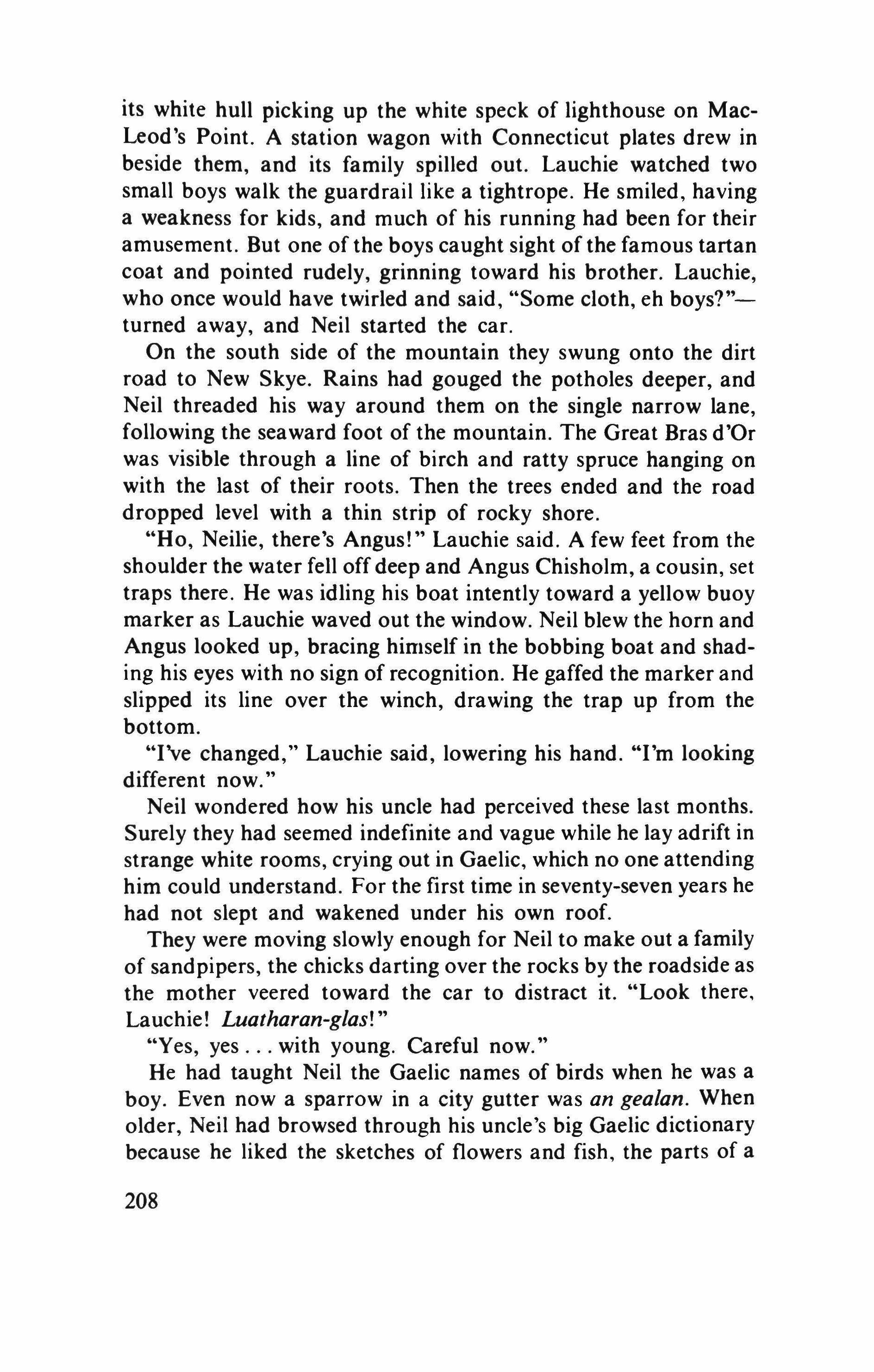
its white hull picking up the white speck of lighthouse on MacLeod's Point. A station wagon with Connecticut plates drew in beside them, and its family spilled out. Lauchie watched two small boys walk the guardrail like a tightrope. He smiled, having a weakness for kids, and much of his running had been for their amusement. But one of the boys caught sight of the famous tartan coat and pointed rudely, grinning toward his brother. Lauchie, who once would have twirled and said, "Some cloth, eh boys?"turned away, and Neil started the car.
On the south side of the mountain they swung onto the dirt road to New Skye. Rains had gouged the potholes deeper, and Neil threaded his way around them on the single narrow lane, following the seaward foot of the mountain. The Great Bras d'Or was visible through a line of birch and ratty spruce hanging on with the last of their roots. Then the trees ended and the road dropped level with a thin strip of rocky shore.
"Ho, Neilie, there's Angus!" Lauchie said. A few feet from the shoulder the water fell off deep and Angus Chisholm, a cousin, set traps there. He was idling his boat intently toward a yellow buoy marker as Lauchie waved out the window. Neil blew the horn and Angus looked up, bracing himself in the bobbing boat and shading his eyes with no sign of recognition. He gaffed the marker and slipped its line over the winch, drawing the trap up from the bottom.
"I've changed," Lauchie said, lowering his hand. "I'm looking different now."
Neil wondered how his uncle had perceived these last months. Surely they had seemed indefinite and vague while he lay adrift in strange white rooms, crying out in Gaelic, which no one attending him could understand. For the first time in seventy-seven years he had not slept and wakened under his own roof.
They were moving slowly enough for Neil to make out a family of sandpipers, the chicks darting over the rocks by the roadside as the mother veered toward the car to distract it. "Look there, Lauchie! Luatharan-glasi"
"Yes, yes with young. Careful now."
He had taught Neil the Gaelic names of birds when he was a boy. Even now a sparrow in a city gutter was an gealan. When older, Neil had browsed through his uncle's big Gaelic dictionary because he liked the sketches of flowers and fish, the parts of a
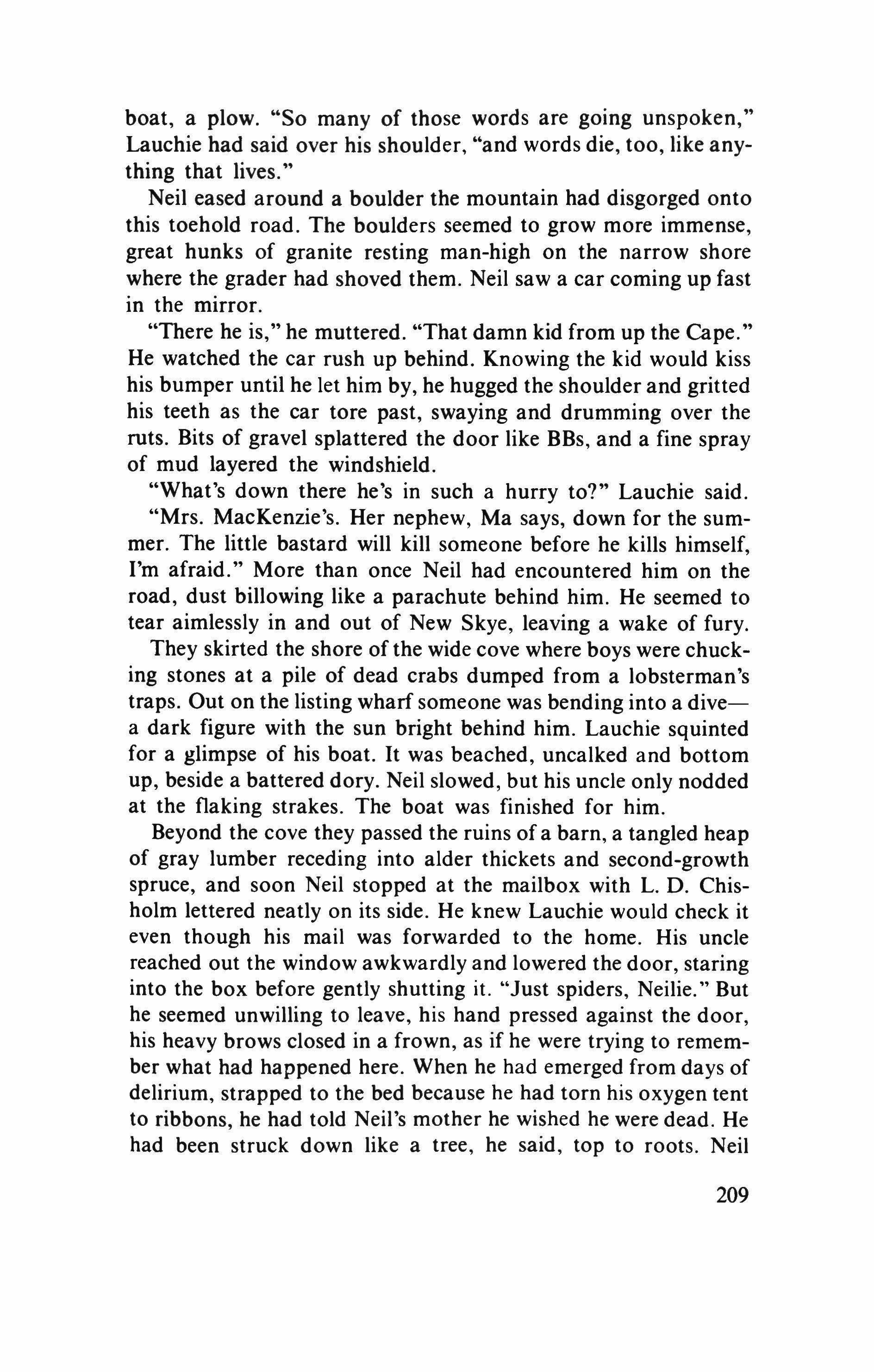
boat, a plow. "So many of those words are going unspoken," Lauchie had said over his shoulder, "and words die, too, like anything that lives."
Neil eased around a boulder the mountain had disgorged onto this toehold road. The boulders seemed to grow more immense, great hunks of granite resting man-high on the narrow shore where the grader had shoved them. Neil saw a car coming up fast in the mirror.
"There he is," he muttered. "That damn kid from up the Cape." He watched the car rush up behind. Knowing the kid would kiss his bumper until he let him by, he hugged the shoulder and gritted his teeth as the car tore past, swaying and drumming over the ruts. Bits of gravel splattered the door like BBs, and a fine spray of mud layered the windshield.
"What's down there he's in such a hurry to?" Lauchie said.
"Mrs. MacKenzie's. Her nephew, Ma says, down for the summer. The little bastard will kill someone before he kills himself, I'm afraid." More than once Neil had encountered him on the road, dust billowing like a parachute behind him. He seemed to tear aimlessly in and out of New Skye, leaving a wake of fury.
They skirted the shore of the wide cove where boys were chucking stones at a pile of dead crabs dumped from a lobsterman's traps. Out on the listing wharf someone was bending into a divea dark figure with the sun bright behind him. Lauchie squinted for a glimpse of his boat. It was beached, uncalked and bottom up, beside a battered dory. Neil slowed, but his uncle only nodded at the flaking strakes. The boat was finished for him.
Beyond the cove they passed the ruins of a barn, a tangled heap of gray lumber receding into alder thickets and second-growth spruce, and soon Neil stopped at themailboxwithL.D.Chisholm lettered neatly on its side. He knew Lauchie would check it even though his mail was forwarded to the home. His uncle reached out the window awkwardly and lowered the door, staring into the box before gently shutting it. "Just spiders, Neilie." But he seemed unwilling to leave, his hand pressed against the door, his heavy brows closed in a frown, as if he were trying to remember what had happened here. When he had emerged from days of delirium, strapped to the bed because he had torn his oxygen tent to ribbons, he had told Neil's mother he wished he were dead. He had been struck down like a tree, he said, top to roots. Neil
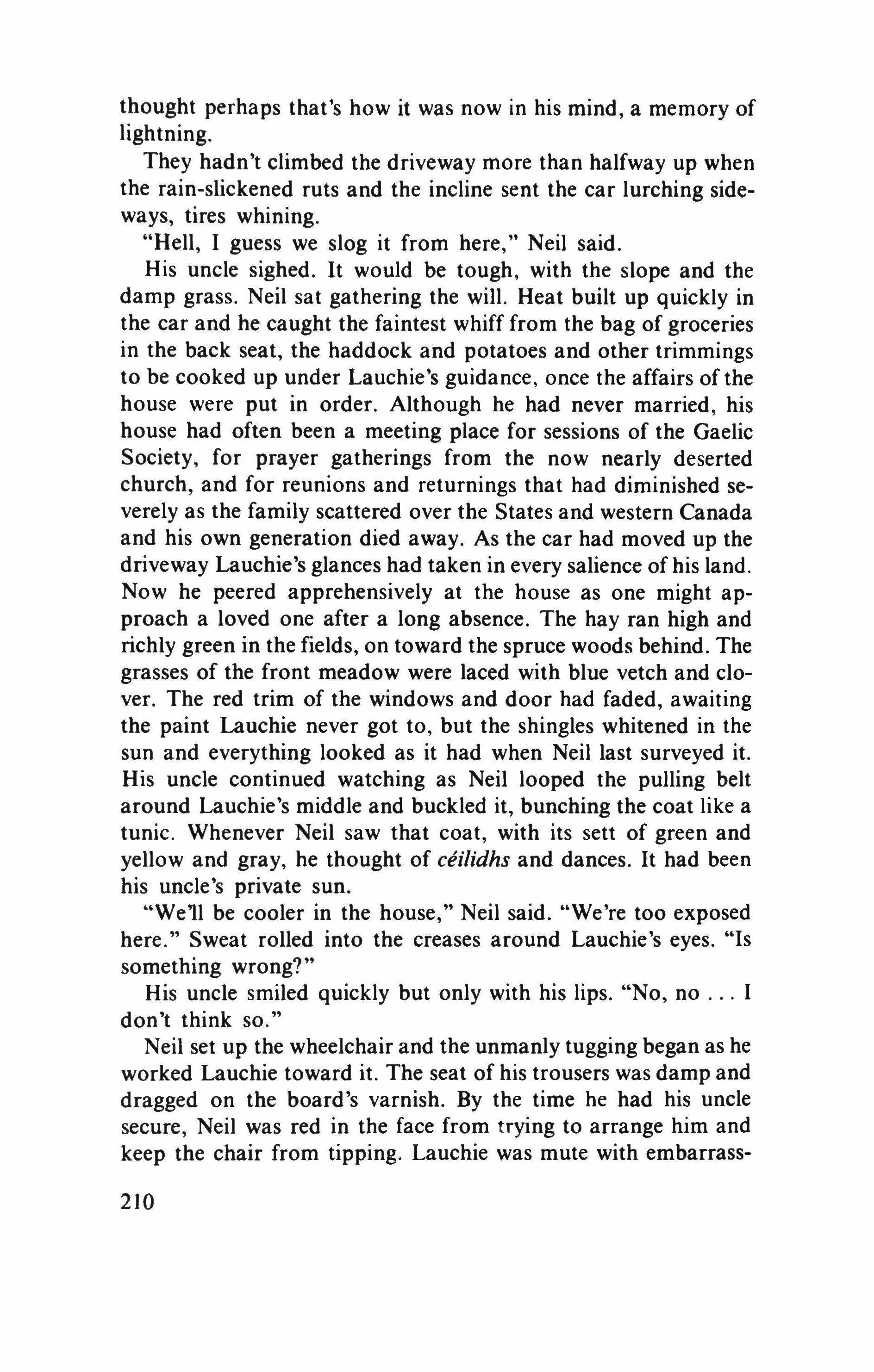
thought perhaps that's how it was now in his mind, a memory of lightning.
They hadn't climbed the driveway more than halfway up when the rain-slickened ruts and the incline sent the car lurching sideways, tires Whining.
"Hell, I guess we slog it from here," Neil said. His uncle sighed. It would be tough, with the slope and the damp grass. Neil sat gathering the will. Heat built up quickly in the car and he caught the faintest whiff from the bag of groceries in the back seat, the haddock and potatoes and other trimmings to be cooked up under Lauchie's guidance, once the affairs of the house were put in order. Although he had never married, his house had often been a meeting place for sessions of the Gaelic Society, for prayer gatherings from the now nearly deserted church, and for reunions and returnings that had diminished severely as the family scattered over the States and western Canada and his own generation died away. As the car had moved up the driveway Lauchie's glances had taken in every salience of his land. Now he peered apprehensively at the house as one might approach a loved one after a long absence. The hay ran high and richly green in the fields, on toward the spruce woods behind. The grasses of the front meadow were laced with blue vetch and clover. The red trim of the windows and door had faded, awaiting the paint Lauchie never got to, but the shingles whitened in the sun and everything looked as it had when Neil last surveyed it. His uncle continued watching as Neil looped the pulling belt around Lauchie's middle and buckled it, bunching the coat like a tunic. Whenever Neil saw that coat, with its sett of green and yellow and gray, he thought of ceilidhs and dances. It had been his uncle's private sun.
"We'll be cooler in the house," Neil said. "We're too exposed here." Sweat rolled into the creases around Lauchie's eyes. "Is something wrong?"
His uncle smiled quickly but only with his lips. "No, no I don't think so."
Neil set up the wheelchair and the unmanly tugging began as he worked Lauchie toward it. The seat of his trousers was damp and dragged on the board's varnish. By the time he had his uncle secure, Neil was red in the face from trying to arrange him and keep the chair from tipping. Lauchie was mute with embarrass-
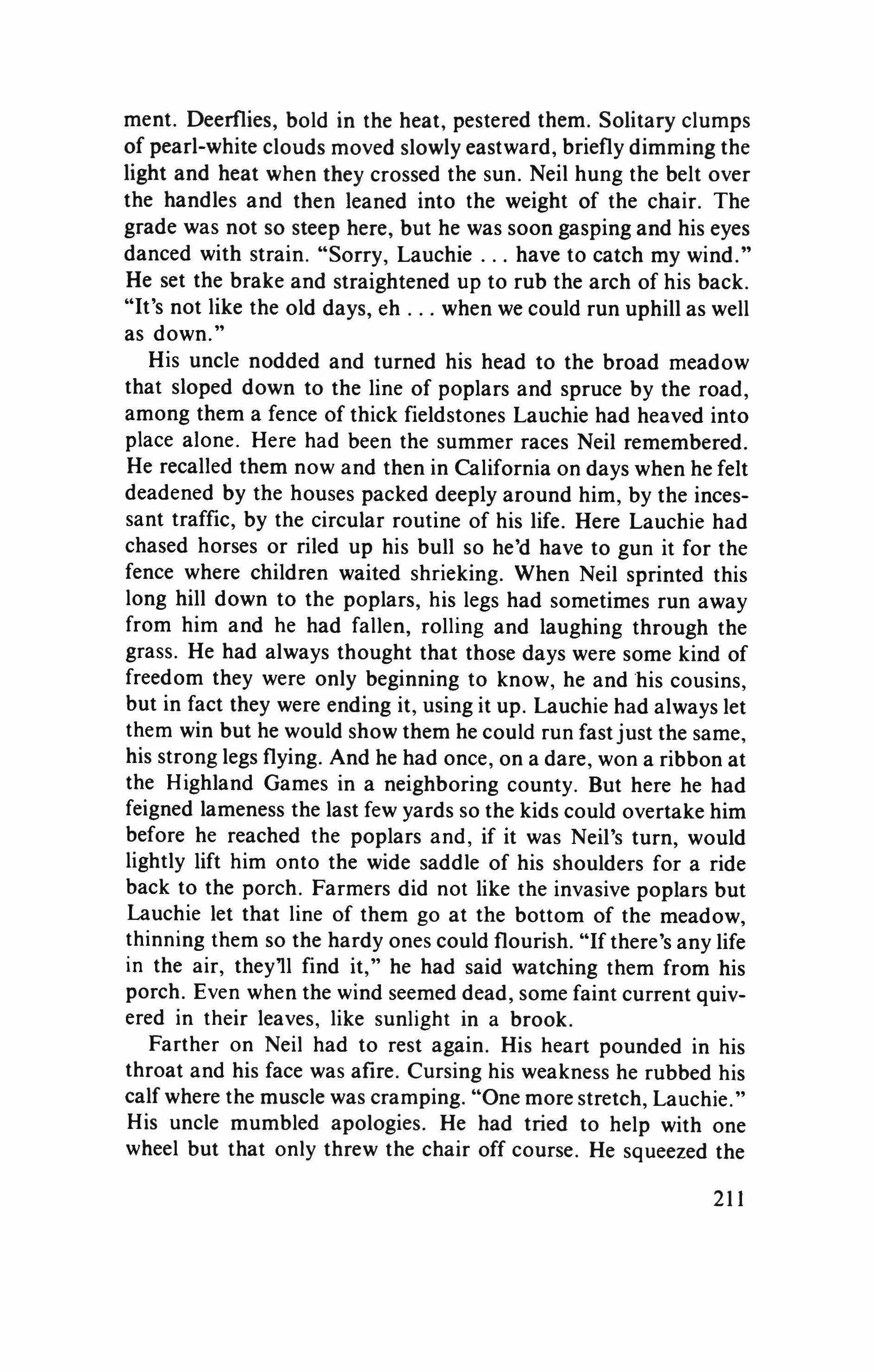
ment. Deerflies, bold in the heat, pestered them. Solitary clumps of pearl-white clouds moved slowly eastward, briefly dimming the light and heat when they crossed the sun. Neil hung the belt over the handles and then leaned into the weight of the chair. The grade was not so steep here, but he was soon gasping and his eyes danced with strain. "Sorry, Lauchie have to catch my wind." He set the brake and straightened up to rub the arch of his back. "It's not like the old days, eh when we could run uphill as well as down."
His uncle nodded and turned his head to the broad meadow that sloped down to the line of poplars and spruce by the road, among them a fence of thick fieldstones Lauchie had heaved into place alone. Here had been the summer races Neil remembered. He recalled them now and then in California on days when he felt deadened by the houses packed deeply around him, by the incessant traffic, by the circular routine of his life. Here Lauchie had chased horses or riled up his bull so he'd have to gun it for the fence where children waited shrieking. When Neil sprinted this long hill down to the poplars, his legs had sometimes run away from him and he had fallen, rolling and laughing through the grass. He had always thought that those days were some kind of freedom they were only beginning to know, he and his cousins, but in fact they were ending it, using it up. Lauchie had always let them win but he would show them he could run fastjust the same, his strong legs flying. And he had once, on a dare, won a ribbon at the Highland Games in a neighboring county. But here he had feigned lameness the last few yards so the kids could overtake him before he reached the poplars and, if it was Neil's turn, would lightly lift him onto the wide saddle of his shoulders for a ride back to the porch. Farmers did not like the invasive poplars but Lauchie let that line of them go at the bottom of the meadow, thinning them so the hardy ones could flourish. "Ifthere's any life in the air, they'll find it," he had said watching them from his porch. Even when the wind seemed dead, some faint current quivered in their leaves, like sunlight in a brook.
Farther on Neil had to rest again. His heart pounded in his throat and his face was afire. Cursing his weakness he rubbed his calf where the muscle was cramping. "One more stretch, Lauchie." His uncle mumbled apologies. He had tried to help with one wheel but that only threw the chair off course. He squeezed the 211
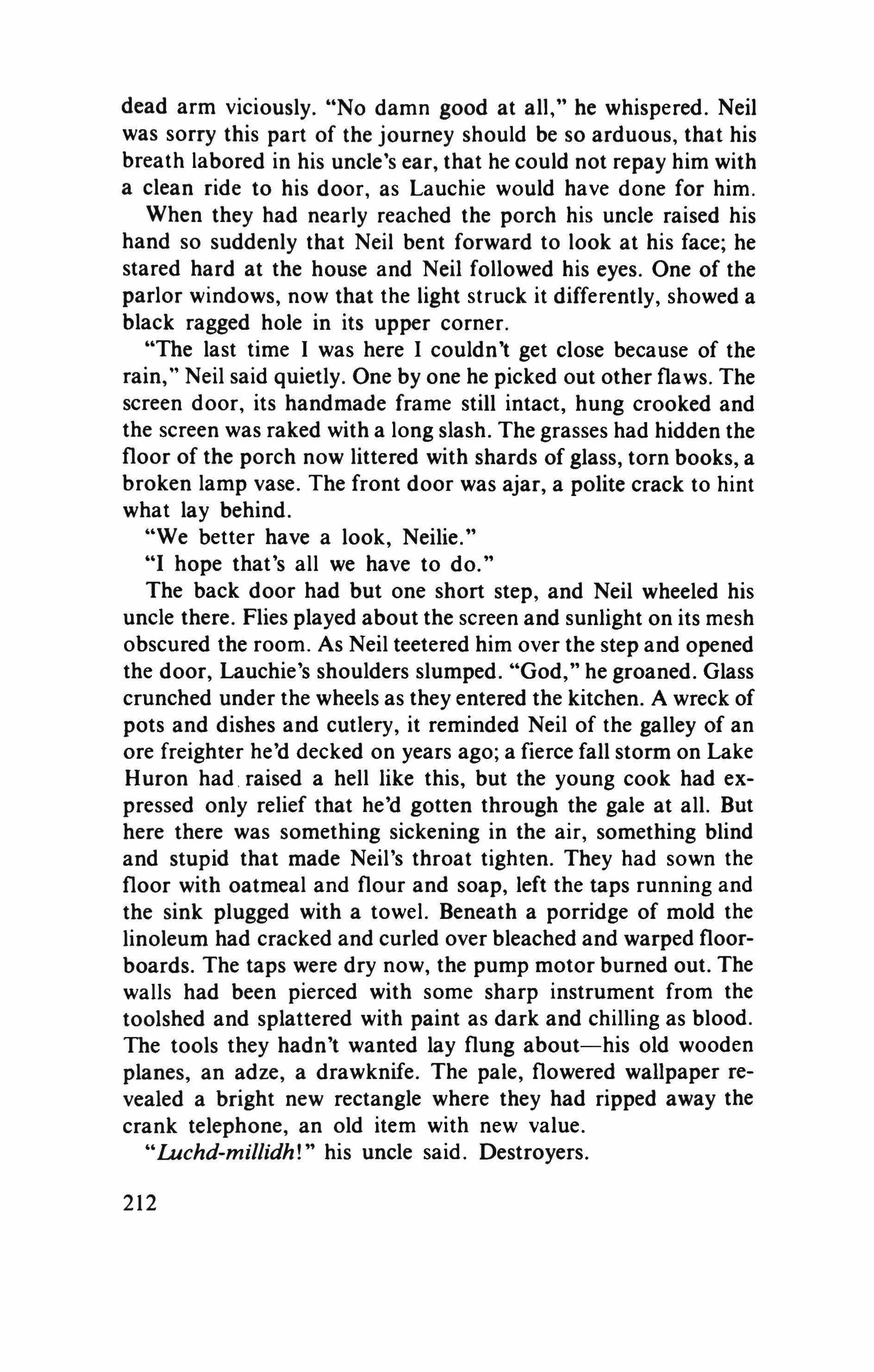
dead arm viciously. "No damn good at all," he whispered. Neil was sorry this part of the journey should be so arduous, that his breath labored in his uncle's ear, that he could not repay him with a clean ride to his door, as Lauchie would have done for him.
When they had nearly reached the porch his uncle raised his hand so suddenly that Neil bent forward to look at his face; he stared hard at the house and Neil followed his eyes. One of the parlor windows, now that the light struck it differently, showed a black ragged hole in its upper corner.
"The last time I was here I couldn't get close because of the rain," Neil said quietly. One by one he picked out other flaws. The screen door, its handmade frame still intact, hung crooked and the screen was raked with a long slash. The grasses had hidden the floor of the porch now littered with shards of glass, torn books, a broken lamp vase. The front door was ajar, a polite crack to hint what lay behind.
"We better have a look, Neilie."
"I hope that's all we have to do."
The back door had but one short step, and Neil wheeled his uncle there. Flies played about the screen and sunlight on its mesh obscured the room. As Neil teetered him over the step and opened the door, Lauchie's shoulders slumped. "God," he groaned. Glass crunched under the wheels as they entered the kitchen. A wreck of pots and dishes and cutlery, it reminded Neil of the galley of an ore freighter he'd decked on years ago; a fierce fall storm on Lake Huron had. raised a hell like this, but the young cook had expressed only relief that he'd gotten through the gale at all. But here there was something sickening in the air, something blind and stupid that made Neil's throat tighten. They had sown the floor with oatmeal and flour and soap, left the taps running and the sink plugged with a towel. Beneath a porridge of mold the linoleum had cracked and curled over bleached and warped floorboards. The taps were dry now, the pump motor burned out. The walls had been pierced with some sharp instrument from the toolshed and splattered with paint as dark and chilling as blood. The tools they hadn't wanted lay flung about-his old wooden planes, an adze, a drawknife. The pale, flowered wallpaper revealed a bright new rectangle where they had ripped away the crank telephone, an old item with new value.
"Luchd-millidhi" his uncle said. Destroyers.

He suffered Neil to wheel him through the vandalized rooms as he whispered over and over, "Tho na h-uile briste." Everything is broken. Not much of the furniture, built by Lauchie or his dad, had been spared. In the parlor they had used the weight of the huge family Bible to smash a small table to the floor. Framed photographs, those children he'd raced and run for-were disfigured with such malice that it was frightening to imagine what kind of energy had accompanied it, what cries and looks. Neil could hear his uncle's breathing drawn out in the quiet hallway. Should he have come here and stayed until Lauchie could return? His mother had told him that break-ins and vandalism were common in the region now, that no untended house was safe, yet somehow Lauchie's place had seemed beyond that threat.
"Too many in the city know the country now," his uncle murmured.
"111 clean this up, all of it, everything. Ma will help, and John R. down the road. When you're ready to His uncle reached back, took Neil's hand and held it tightly. Neil leaned his face against the man's shoulder. The old tartan smelled of napthalene, and he wanted to think it was that which brought tears to his eyes. Upstairs a curtain flapped softly. Lauchie withdrew his hand and swept it over his face. "Well! He made motions of bracing up in the chair. "We'd best look outside, eh, Neilie? Nothing for us here. Can't cook haddock on a cold stove."
Neil pushed the wheelchair through the grass with a kind of ferocity while his uncle talked away as if nothing had happened. "The hay will have to dry before we cut." He pointed to areas flattened down as if a horse had rolled in them. "See there? She's lodged." They stopped at the barn and peered in the dusty windows at the tractor and baler, the remains of last year's hay in the lofts. Lauchie kept no livestock, hadn't for years, but he grew fine hay and people drove a long way to buy it. They went on to the wagon shed. Locked, nothing amiss. He'd heard that a man from Ontario had bought the old MacRae place to breed trotters. Lauchie yanked a few wisps of orchard grass from the ground and stroked their powdery tops. "No hay like this at MacRae's."
Neil ducked behind the shed to piss. He gazed around at the tall black spruce that bounded his uncle's fields. If you looked carefully, you could see their branches tinged with red. The budworms
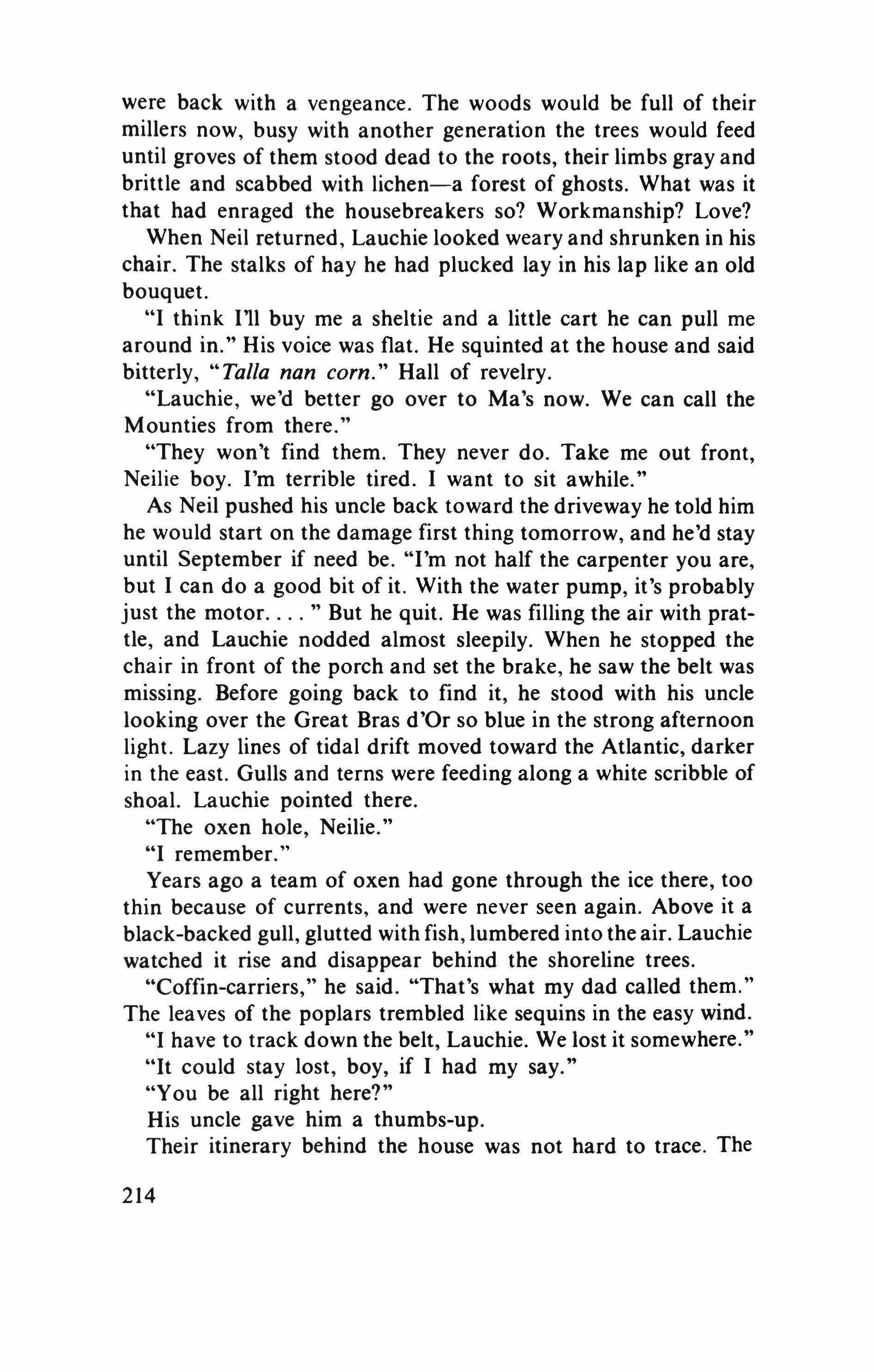
were back with a vengeance. The woods would be full of their millers now, busy with another generation the trees would feed until groves of them stood dead to the roots, their limbs gray and brittle and scabbed with lichen-a forest of ghosts. What was it that had enraged the housebreakers so? Workmanship? Love?
When Neil returned, Lauchie looked weary and shrunken in his chair. The stalks of hay he had plucked lay in his lap like an old bouquet.
"I think I'll buy me a sheltie and a little cart he can pull me around in." His voice was flat. He squinted at the house and said bitterly, "Talla nan corn." Hall of revelry.
"Lauchie, we'd better go over to Ma's now. We can call the Mounties from there."
"They won't find them. They never do. Take me out front, Neilie boy. I'm terrible tired. 1 want to sit awhile."
As Neil pushed his uncle back toward the driveway he told him he would start on the damage first thing tomorrow, and he'd stay until September if need be. "I'm not half the carpenter you are, but 1 can do a good bit of it. With the water pump, it's probably just the motor. But he quit. He was filling the air with prattle, and Lauchie nodded almost sleepily. When he stopped the chair in front of the porch and set the brake, he saw the belt was missing. Before going back to find it, he stood with his uncle looking over the Great Bras d'Or so blue in the strong afternoon light. Lazy lines of tidal drift moved toward the Atlantic, darker in the east. Gulls and terns were feeding along a white scribble of shoal. Lauchie pointed there.
"The oxen hole, Neilie."
"I remember."
Years ago a team of oxen had gone through the ice there, too thin because of currents, and were never seen again. Above it a black-backed gull, glutted with fish, lumbered into the air. Lauchie watched it rise and disappear behind the shoreline trees.
"Coffin-carriers," he said. "That's what my dad called them." The leaves of the poplars trembled like sequins in the easy wind.
"I have to track down the belt, Lauchie. We lost it somewhere."
"It could stay lost, boy, if 1 had my say."
"You be all right here?"
His uncle gave him a thumbs-up. Their itinerary behind the house was not hard to trace. The
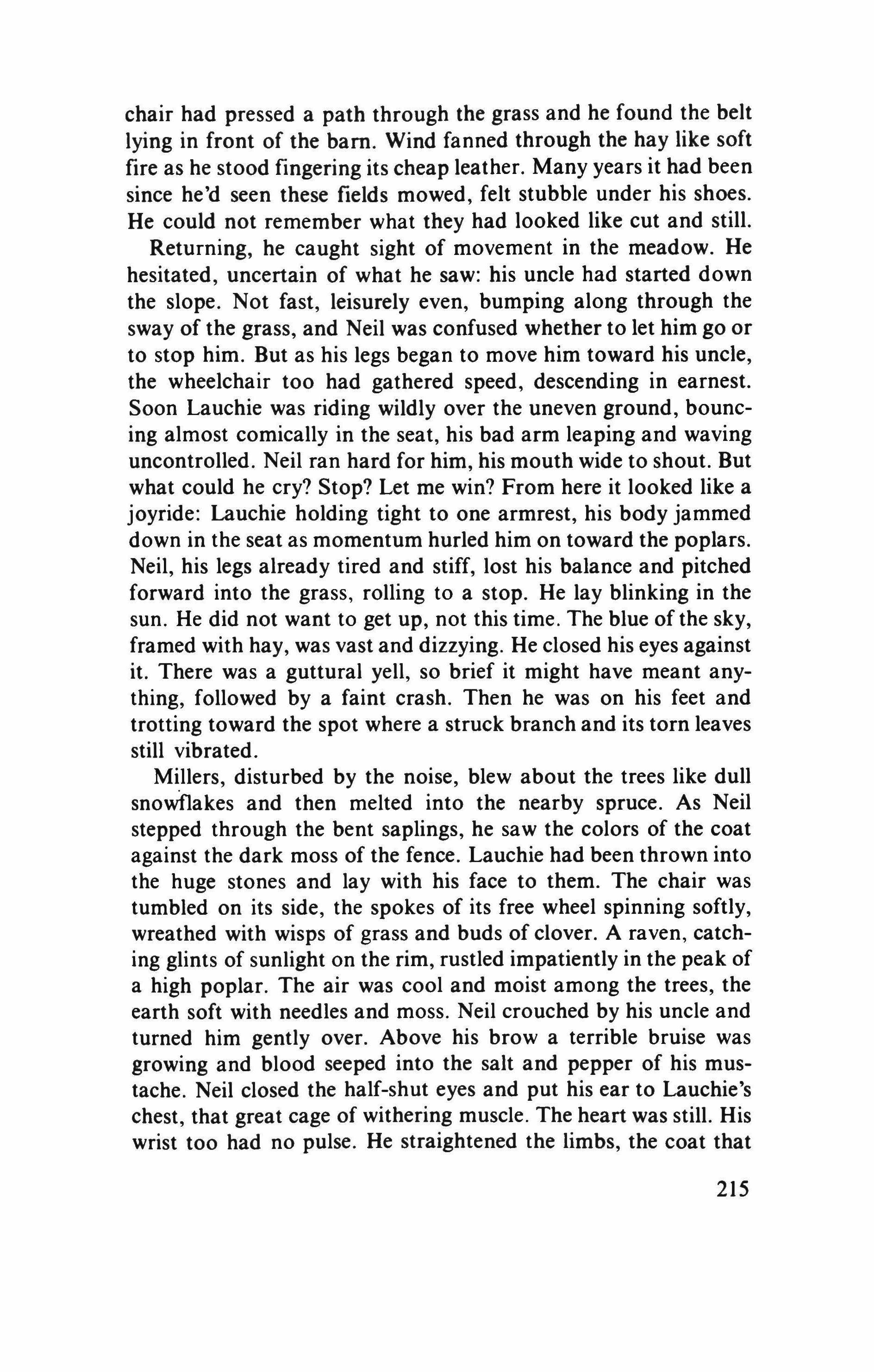
chair had pressed a path through the grass and he found the belt lying in front of the bam. Wind fanned through the hay like soft fire as he stood fingering its cheap leather. Many years it had been since he'd seen these fields mowed, felt stubble under his shoes. He could not remember what they had looked like cut and still. Returning, he caught sight of movement in the meadow. He hesitated, uncertain of what he saw: his uncle had started down the slope. Not fast, leisurely even, bumping along through the sway of the grass, and Neil was confused whether to let him go or to stop him. But as his legs began to move him toward his uncle, the wheelchair too had gathered speed, descending in earnest. Soon Lauchie was riding wildly over the uneven ground, bouncing almost comically in the seat, his bad arm leaping and waving uncontrolled. Neil ran hard for him, his mouth wide to shout. But what could he cry? Stop? Let me win? From here it looked like a joyride: Lauchie holding tight to one armrest, his body jammed down in the seat as momentum hurled him on toward the poplars. Neil, his legs already tired and stiff, lost his balance and pitched forward into the grass, rolling to a stop. He lay blinking in the sun. He did not want to get up, not this time. The blue of the sky, framed with hay, was vast and dizzying. He closed his eyes against it. There was a guttural yell, so brief it might have meant anything, followed by a faint crash. Then he was on his feet and trotting toward the spot where a struck branch and its torn leaves still vibrated.
Millers, disturbed by the noise, blew about the trees like dull snowflakes and then melted into the nearby spruce. As Neil stepped through the bent saplings, he saw the colors of the coat against the dark moss of the fence. Lauchie had been thrown into the huge stones and lay with his face to them. The chair was tumbled on its side, the spokes of its free wheel spinning softly, wreathed with wisps of grass and buds of clover. A raven, catching glints of sunlight on the rim, rustled impatiently in the peak of a high poplar. The air was cool and moist among the trees, the earth soft with needles and moss. Neil crouched by his uncle and turned him gently over. Above his brow a terrible bruise was growing and blood seeped into the salt and pepper of his mustache. Neil closed the half-shut eyes and put his ear to Lauchie's chest, that great cage of withering muscle. The heart was still. His wrist too had no pulse. He straightened the limbs, the coat that
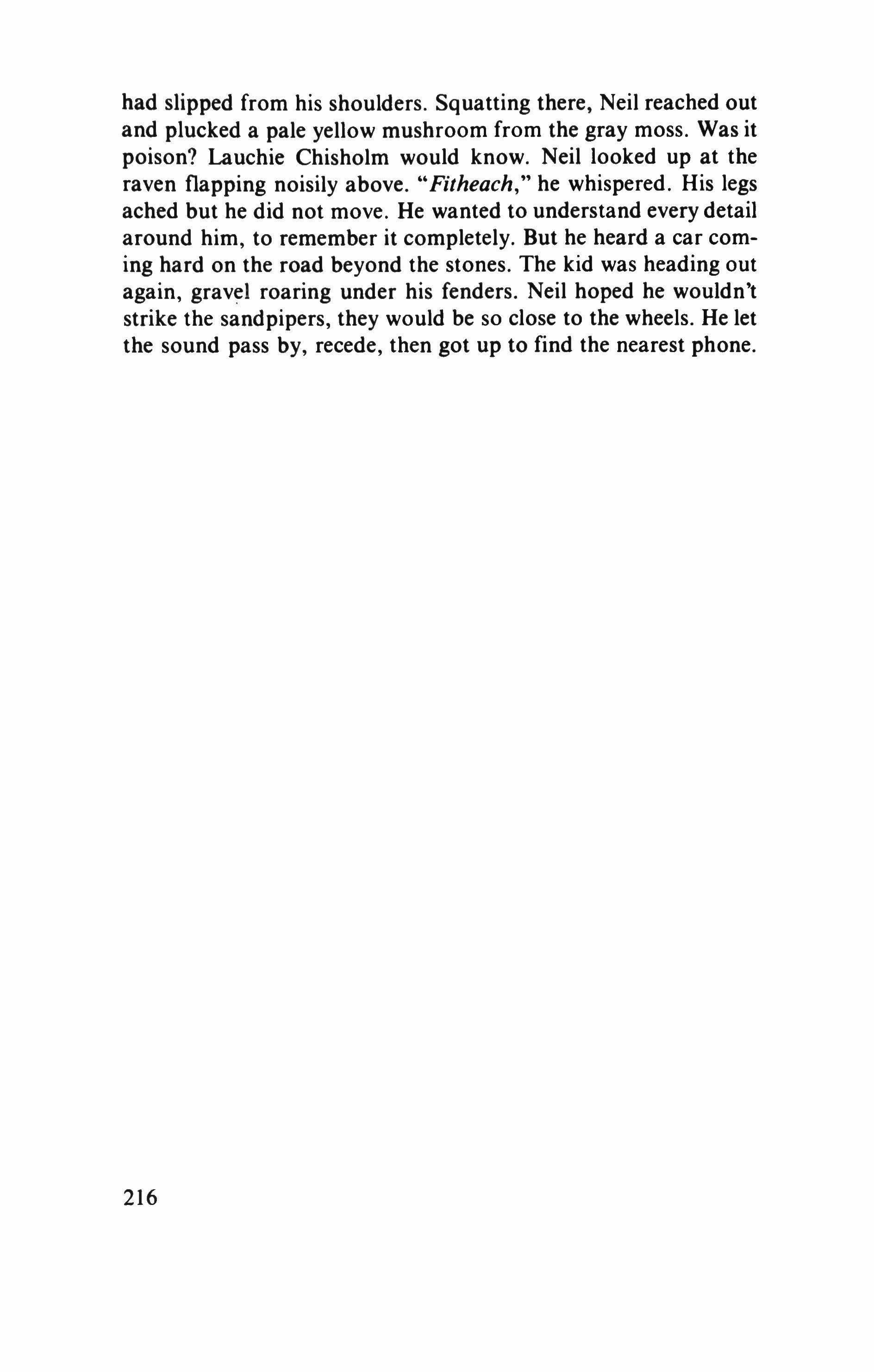
had slipped from his shoulders. Squatting there, Neil reached out and plucked a pale yellow mushroom from the gray moss. Was it poison? Lauchie Chisholm would know. Neil looked up at the raven flapping noisily above. "Fitheach," he whispered. His legs ached but he did not move. He wanted to understand every detail around him, to remember it completely. But he heard a car coming hard on the road beyond the stones. The kid was heading out again, gravel roaring under his fenders. Neil hoped he wouldn't strike the sandpipers, they would be so close to the wheels. He let the sound pass by, recede, then got up to find the nearest phone.
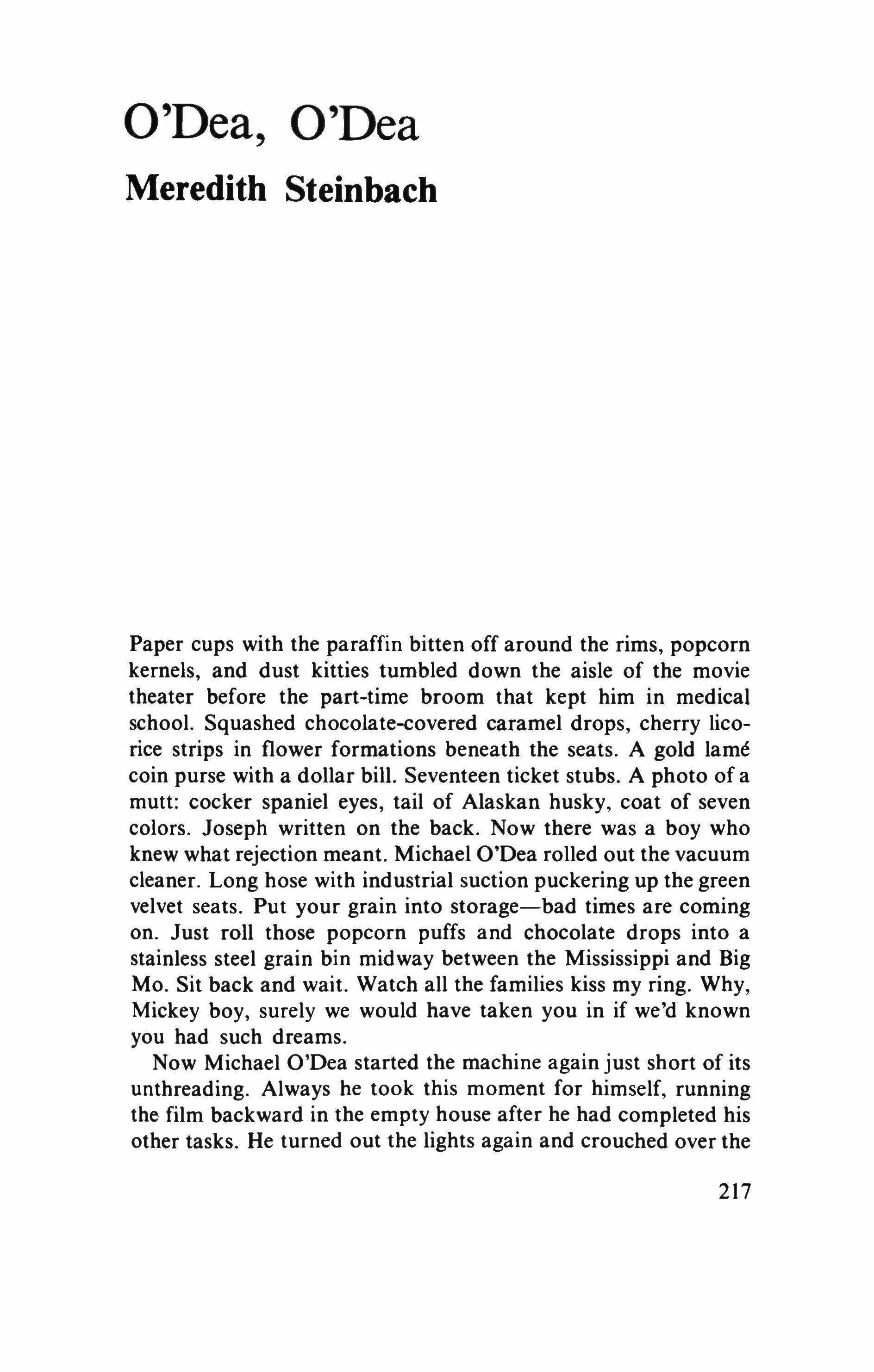
Paper cups with the paraffin bitten off around the rims, popcorn kernels, and dust kitties tumbled down the aisle of the movie theater before the part-time broom that kept him in medical school. Squashed chocolate-covered caramel drops, cherry licorice strips in flower formations beneath the seats. A gold lame coin purse with a dollar bill. Seventeen ticket stubs. A photo of a mutt: cocker spaniel eyes, tail of Alaskan husky, coat of seven colors. Joseph written on the back. Now there was a boy who knew what rejection meant. Michael O'Dea rolled out the vacuum cleaner. Long hose with industrial suction puckering up the green velvet seats. Put your grain into storage-bad times are coming on. Just roll those popcorn puffs and chocolate drops into a stainless steel grain bin midway between the Mississippi and Big Mo. Sit back and wait. Watch all the families kiss my ring. Why, Mickey boy, surely we would have taken you in if we'd known you had such dreams.
Now Michael O'Dea started the machine again just short of its unthreading. Always he took this moment for himself, running the film backward in the empty house after he had completed his other tasks. He turned out the lights again and crouched over the
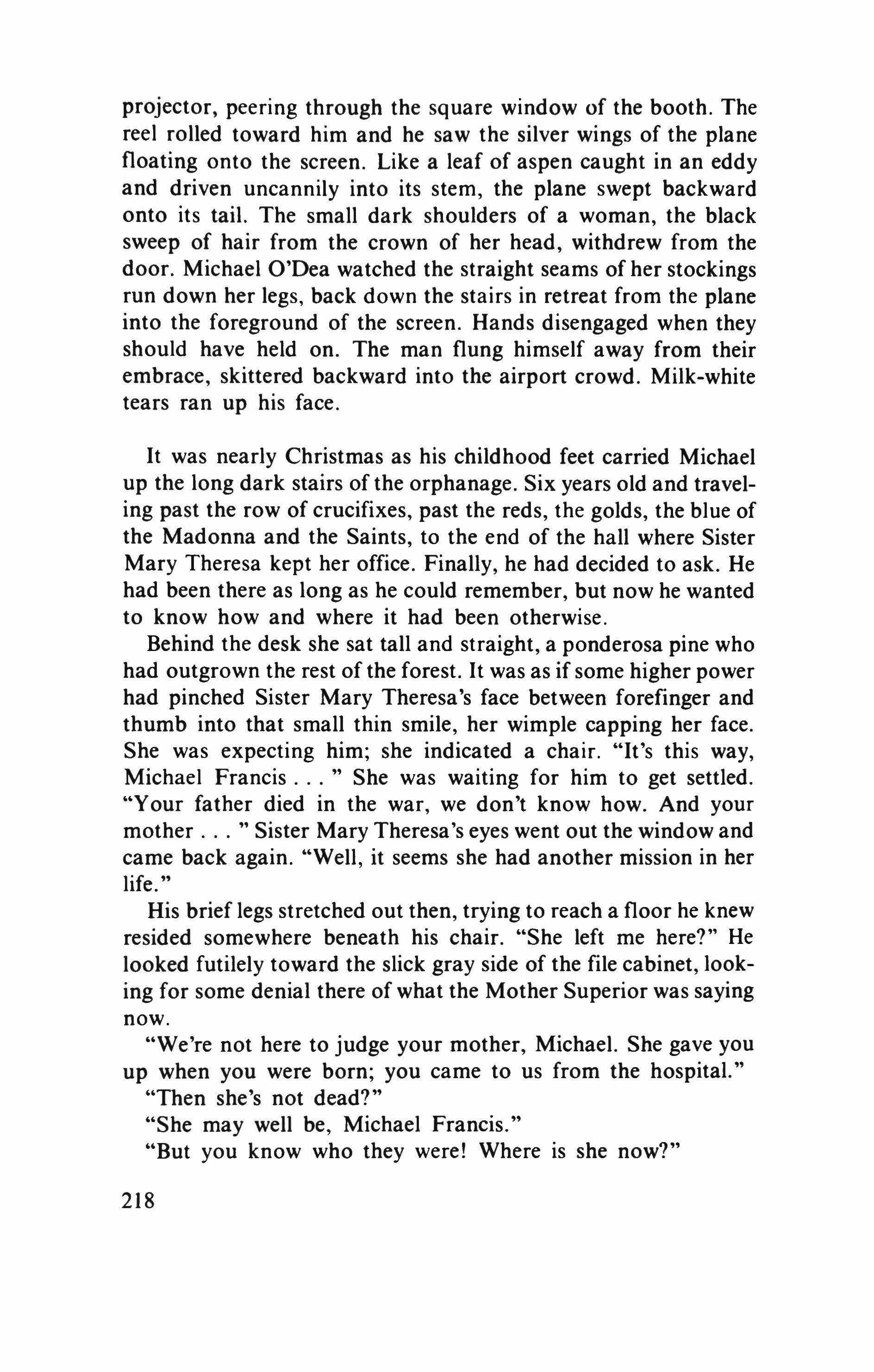
projector, peering through the square window of the booth. The reel rolled toward him and he saw the silver wings of the plane floating onto the screen. Like a leaf of aspen caught in an eddy and driven uncannily into its stem, the plane swept backward onto its tail. The small dark shoulders of a woman, the black sweep of hair from the crown of her head, withdrew from the door. Michael O'Dea watched the straight seams of her stockings run down her legs, back down the stairs in retreat from the plane into the foreground of the screen. Hands disengaged when they should have held on. The man flung himself away from their embrace, skittered backward into the airport crowd. Milk-white tears ran up his face.
It was nearly Christmas as his childhood feet carried Michael up the long dark stairs of the orphanage. Six years old and traveling past the row of crucifixes, past the reds, the golds, the blue of the Madonna and the Saints, to the end of the hall where Sister Mary Theresa kept her office. Finally, he had decided to ask. He had been there as long as he could remember, but now he wanted to know how and where it had been otherwise.
Behind the desk she sat tall and straight, a ponderosa pine who had outgrown the rest of the forest. It was as if some higher power had pinched Sister Mary Theresa's face between forefinger and thumb into that small thin smile, her wimple capping her face. She was expecting him; she indicated a chair. "It's this way, Michael Francis She was waiting for him to get settled. "Your father died in the war, we don't know how. And your mother " Sister Mary Theresa's eyes went out the window and came back again. "Well, it seems she had another mission in her life.
His brief legs stretched out then, trying to reach a floor he knew resided somewhere beneath his chair. "She left me here?" He looked futilely toward the slick gray side of the file cabinet, looking for some denial there of what the Mother Superior was saying now.
"We're not here to judge your mother, Michael. She gave you up when you were born; you came to us from the hospital."
"Then she's not dead?"
"She may well be, Michael Francis."
"But you know who they were! Where is she now?"
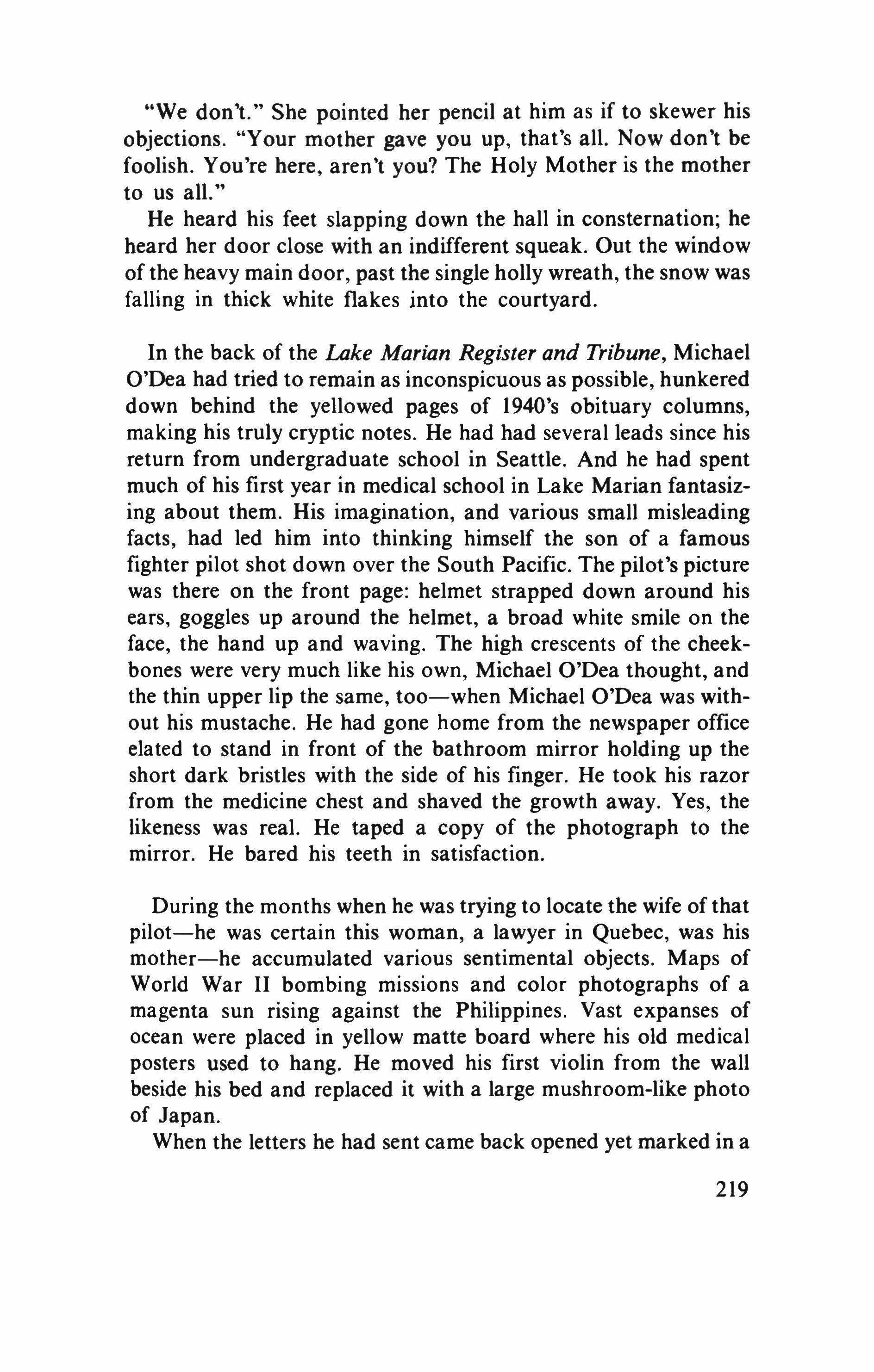
"We don't." She pointed her pencil at him as if to skewer his objections. "Your mother gave you up, that's all. Now don't be foolish. You're here, aren't you? The Holy Mother is the mother to us all."
He heard his feet slapping down the hall in consternation; he heard her door close with an indifferent squeak. Out the window of the heavy main door, past the single holly wreath, the snow was falling in thick white flakes into the courtyard.
In the back of the Lake Marian Register and Tribune, Michael O'Dea had tried to remain as inconspicuous as possible, hunkered down behind the yellowed pages of 1940's obituary columns, making his truly cryptic notes. He had had several leads since his return from undergraduate school in Seattle. And he had spent much of his first year in medical school in Lake Marian fantasizing about them. His imagination, and various small misleading facts, had led him into thinking himself the son of a famous fighter pilot shot down over the South Pacific. The pilot's picture was there on the front page: helmet strapped down around his ears, goggles up around the helmet, a broad white smile on the face, the hand up and waving. The high crescents of the cheekbones were very much like his own, Michael O'Dea thought, and the thin upper lip the same, too-when Michael O'Dea was without his mustache. He had gone home from the newspaper office elated to stand in front of the bathroom mirror holding up the short dark bristles with the side of his finger. He took his razor from the medicine chest and shaved the growth away. Yes, the likeness was real. He taped a copy of the photograph to the mirror. He bared his teeth in satisfaction.
During the months when he was trying to locate the wife of that pilot-he was certain this woman, a lawyer in Quebec, was his mother-he accumulated various sentimental objects. Maps of World War II bombing missions and color photographs of a magenta sun rising against the Philippines. Vast expanses of ocean were placed in yellow matte board where his old medical posters used to hang. He moved his first violin from the wall beside his bed and replaced it with a large mushroom-like photo of Japan.
When the letters he had sent came back opened yet marked in a
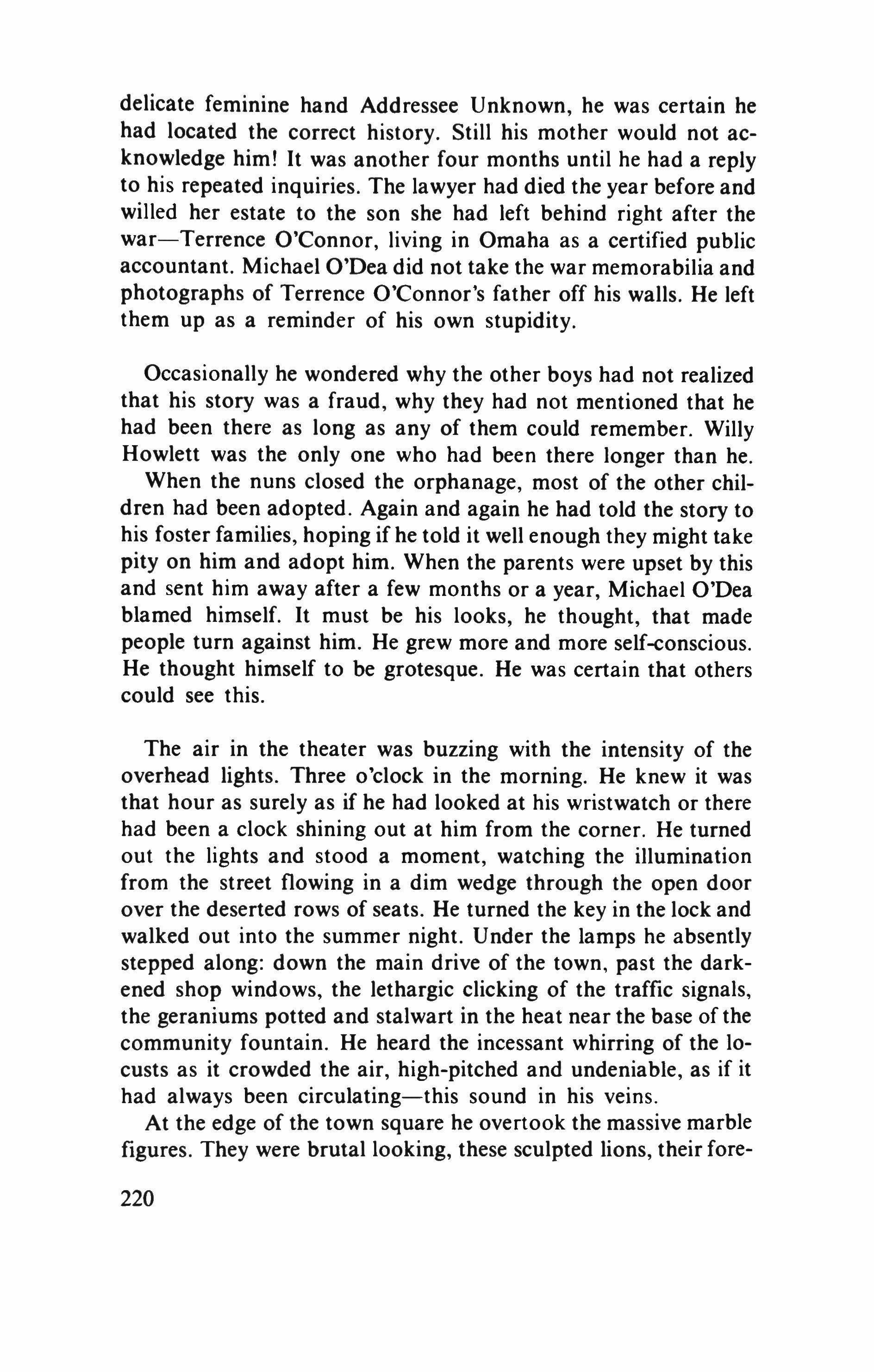
delicate feminine hand Addressee Unknown, he was certain he had located the correct history. Still his mother would not acknowledge him! It was another four months until he had a reply to his repeated inquiries. The lawyer had died the year before and willed her estate to the son she had left behind right after the war-Terrence O'Connor, living in Omaha as a certified public accountant. Michael O'Dea did not take the war memorabilia and photographs of Terrence O'Connor's father off his walls. He left them up as a reminder of his own stupidity.
Occasionally he wondered why the other boys had not realized that his story was a fraud, why they had not mentioned that he had been there as long as any of them could remember. Willy Howlett was the only one who had been there longer than he.
When the nuns closed the orphanage, most of the other children had been adopted. Again and again he had told the story to his foster families, hoping if he told it well enough they might take pity on him and adopt him. When the parents were upset by this and sent him away after a few months or a year, Michael O'Dea blamed himself. It must be his looks, he thought, that made people turn against him. He grew more and more self-conscious. He thought himself to be grotesque. He was certain that others could see this.
The air in the theater was buzzing with the intensity of the overhead lights. Three o'clock in the morning. He knew it was that hour as surely as if he had looked at his wristwatch or there had been a clock shining out at him from the corner. He turned out the lights and stood a moment, watching the illumination from the street flowing in a dim wedge through the open door over the deserted rows of seats. He turned the key in the lock and walked out into the summer night. Under the lamps he absently stepped along: down the main drive of the town, past the darkened shop windows, the lethargic clicking of the traffic signals, the geraniums potted and stalwart in the heat near the base of the community fountain. He heard the incessant whirring of the locusts as it crowded the air, high-pitched and undeniable, as if it had always been circulating-this sound in his veins.
At the edge of the town square he overtook the massive marble figures. They were brutal looking, these sculpted lions, their fore220
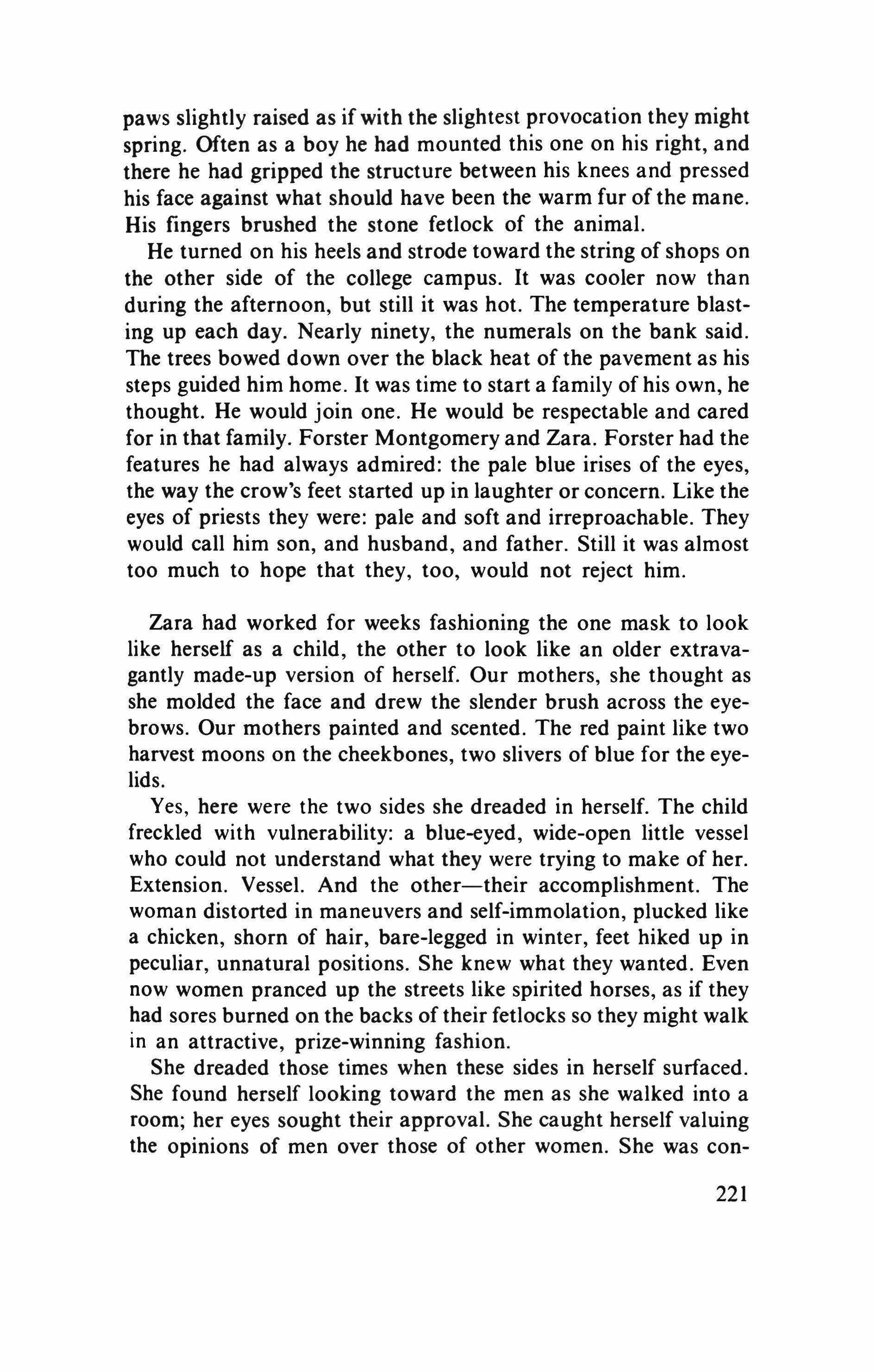
paws slightly raised as if with the slightest provocation they might spring. Often as a boy he had mounted this one on his right, and there he had gripped the structure between his knees and pressed his face against what should have been the warm fur of the mane. His fingers brushed the stone fetlock of the animal. He turned on his heels and strode toward the string of shops on the other side of the college campus. It was cooler now than during the afternoon, but still it was hot. The temperature blasting up each day. Nearly ninety, the numerals on the bank said. The trees bowed down over the black heat of the pavement as his steps guided him home. It was time to start a family of his own, he thought. He would join one. He would be respectable and cared for in that family. Forster Montgomery and Zara. Forster had the features he had always admired: the pale blue irises of the eyes, the way the crow's feet started up in laughter or concern. Like the eyes of priests they were: pale and soft and irreproachable. They would call him son, and husband, and father. Still it was almost too much to hope that they, too, would not reject him.
Zara had worked for weeks fashioning the one mask to look like herself as a child, the other to look like an older extravagantly made-up version of herself. Our mothers, she thought as she molded the face and drew the slender brush across the eyebrows. Our mothers painted and scented. The red paint like two harvest moons on the cheekbones, two slivers of blue for the eyelids.
Yes, here were the two sides she dreaded in herself. The child freckled with vulnerability: a blue-eyed, wide-open little vessel who could not understand what they were trying to make of her. Extension. Vessel. And the other-their accomplishment. The woman distorted in maneuvers and self-immolation, plucked like a chicken, shorn of hair, bare-legged in winter, feet hiked up in peculiar, unnatural positions. She knew what they wanted. Even now women pranced up the streets like spirited horses, as if they had sores burned on the backs of their fetlocks so they might walk in an attractive, prize-winning fashion.
She dreaded those times when these sides in herself surfaced. She found herself looking toward the men as she walked into a room; her eyes sought their approval. She caught herself valuing the opinions of men over those of other women. She was con-
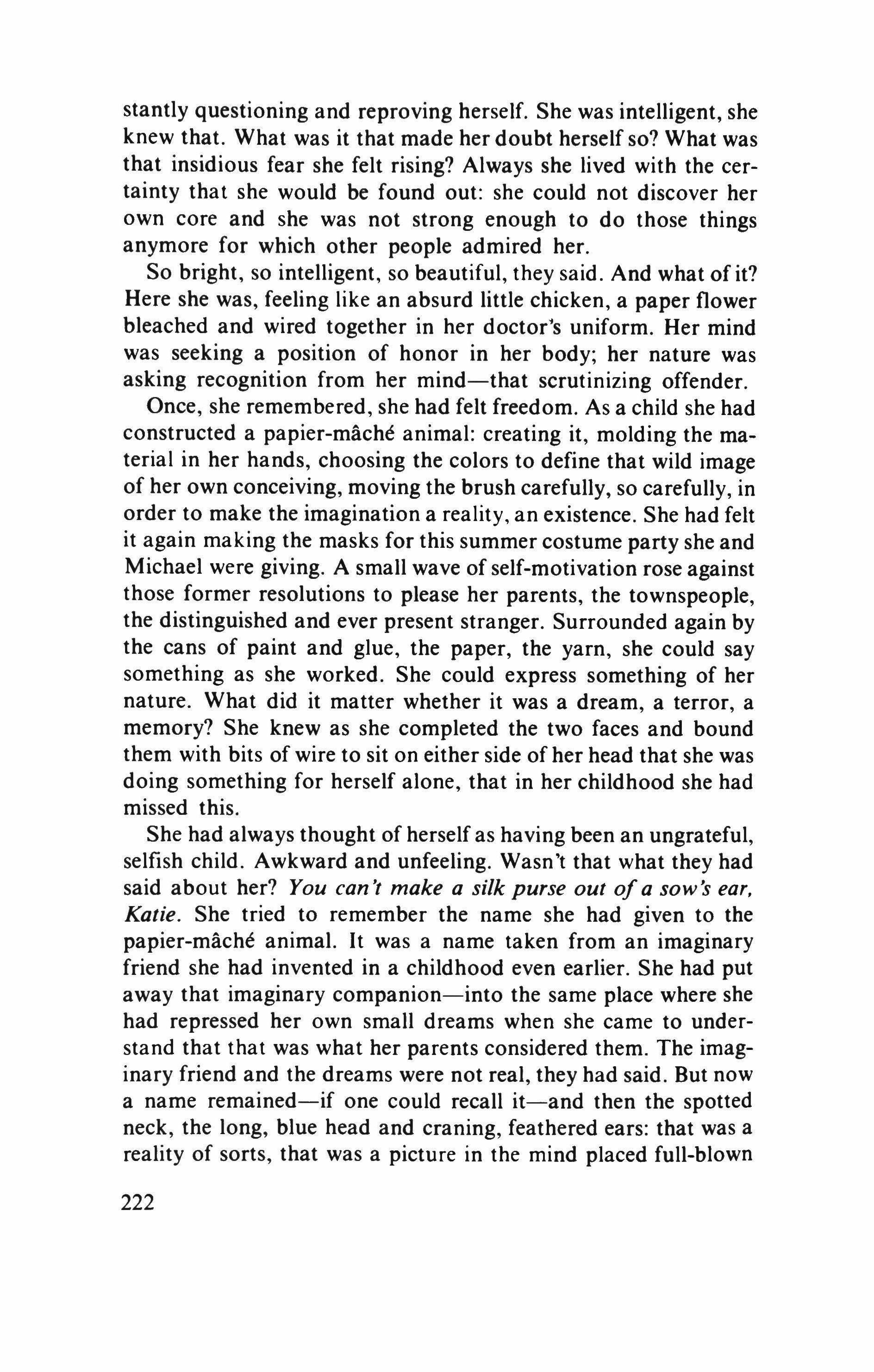
stantly questioning and reproving herself. She was intelligent, she knew that. What was it that made her doubt herself so? What was that insidious fear she felt rising? Always she lived with the certainty that she would be found out: she could not discover her own core and she was not strong enough to do those things anymore for which other people admired her.
So bright, so intelligent, so beautiful, they said. And what of it? Here she was, feeling like an absurd little chicken, a paper flower bleached and wired together in her doctor's uniform. Her mind was seeking a position of honor in her body; her nature was asking recognition from her mind-that scrutinizing offender.
Once, she remembered, she had felt freedom. As a child she had constructed a papier-mache animal: creating it, molding the material in her hands, choosing the colors to define that wild image of her own conceiving, moving the brush carefully, so carefully, in order to make the imagination a reality, an existence. She had felt it again making the masks for this summer costume party she and Michael were giving. A small wave of self-motivation rose against those former resolutions to please her parents, the townspeople, the distinguished and ever present stranger. Surrounded again by the cans of paint and glue, the paper, the yarn, she could say something as she worked. She could express something of her nature. What did it matter whether it was a dream, a terror, a memory? She knew as she completed the two faces and bound them with bits of wire to sit on either side of her head that she was doing something for herself alone, that in her childhood she had missed this.
She had always thought of herself as having been an ungrateful, selfish child. Awkward and unfeeling. Wasn't that what they had said about her? You can't make a silk purse out of a sows ear, Katie. She tried to remember the name she had given to the papier-mache animal. It was a name taken from an imaginary friend she had invented in a childhood even earlier. She had put away that imaginary companion-into the same place where she had repressed her own small dreams when she came to understand that that was what her parents considered them. The imaginary friend and the dreams were not real, they had said. But now a name remained-if one could recall it-and then the spotted neck, the long, blue head and craning, feathered ears: that was a reality of sorts, that was a picture in the mind placed full-blown

and tangible in the world. But she had learned one thing from her parents: a person might want something, might dream about it, but it was not enough. One had obligations to others. And if there were no others left? This, too, became an obligation. If a human being were to have any form of integrity at all, she had to find someone to serve.
The painted masks with their connecting auburn wig were on the sides of her head, her own face positioned like an indentured slave between them. Starting down the stairs, she caught another view of herself in the circular mirror that had perched so long beside her mother's bed. It was then the name of the papiermache animal came to her. A bit of gibberish out of infancy. "Bonen!" she laughed, staring at the mirror. She laughed out loud. Standing there in her nightgown, she was a three-headed creature with each pair of eyes looking out independently. It was as if she had created herself.
Up the stairs came Mrs. McGehry then, humming to herself until she spotted Zara on the landing. "Mary Magdalene!" the old woman cried. "You've become a crowd!"
Zara Montgomery sat in the automobile as Bridie McGehry retrieved the twin faces she had forgotten on the coffee table. The old woman danced down the front steps wearing a life-sized face over each ear, her yellow-white hair sticking out in short permanented tufts around the edges of her own face and the Montgomery masks. Bridie switched the skirt of her housedress, her little feet dipping in and around each other in fragmented steps. The blue eye-shadowed face turned, and then the child face.
"Bridie! You look just like me."
"Absolute nonsense," the old woman declared. "What I've got in this head, it will take you centuries to acquire."
"It's true," Zara laughed. "I'm not a swinger like you."
"Go on now," Mrs. McGehry poohed, handing her the masks. "Your Michael O'Dea will be in an absolute froth if you don't spin out of here." Quickly then, she leaned in through the window and pecked Zara on the cheek. "There now. That's for the real face. And don't you ever let me catch any blue eye-plaster on it. Hear me?" She turned, whisked up the walk, and shut the door.
"No blue eye-plaster!" Zara laughed as she started the car. Mrs. McGehry had not threatened the child face. Perhaps that was
223
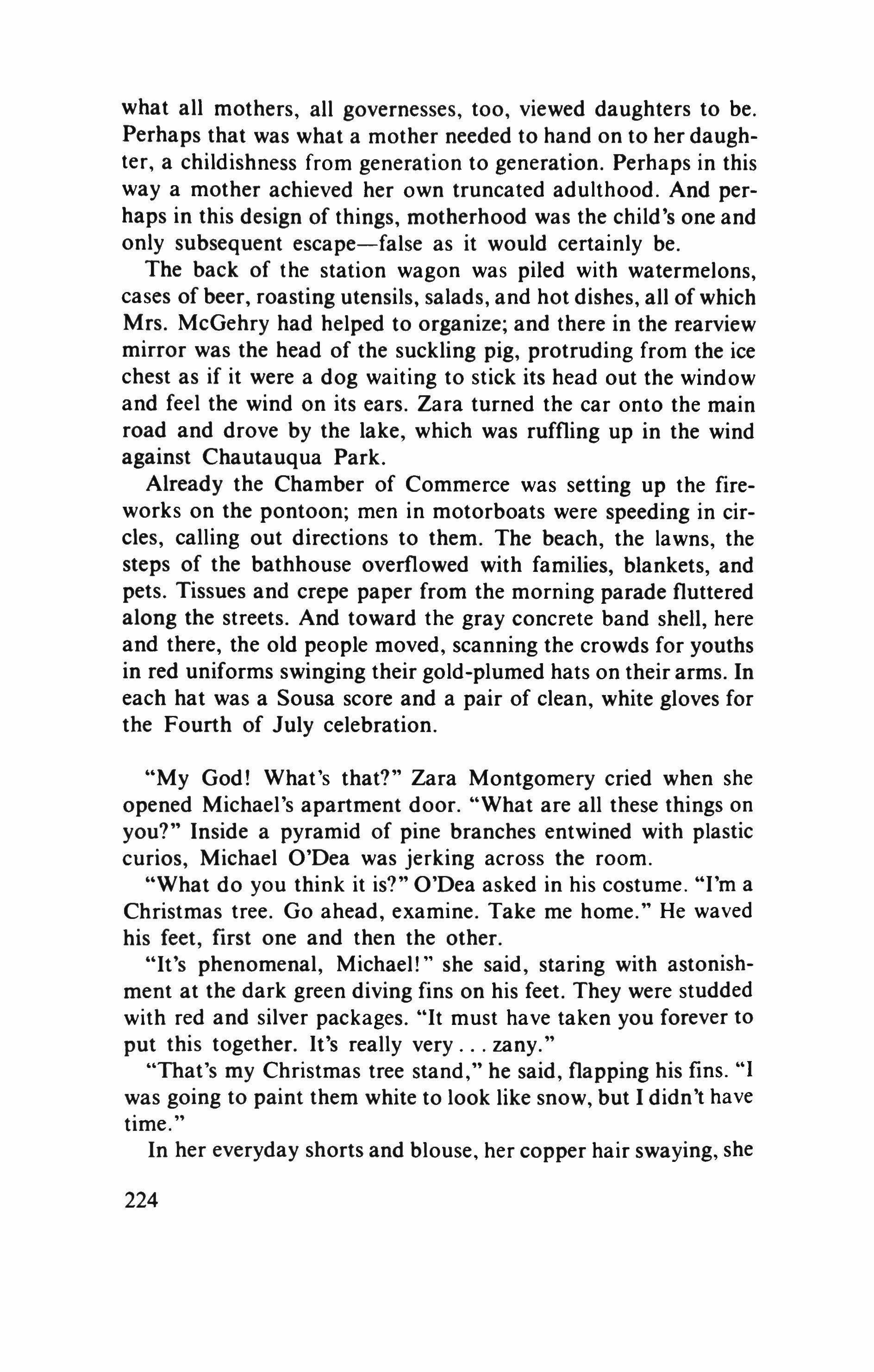
what all mothers, all governesses, too, viewed daughters to be. Perhaps that was what a mother needed to hand on to her daughter, a childishness from generation to generation. Perhaps in this way a mother achieved her own truncated adulthood. And perhaps in this design of things, motherhood was the child's one and only subsequent escape-false as it would certainly be.
The back of the station wagon was piled with watermelons, cases of beer, roasting utensils, salads, and hot dishes, all of which Mrs. McGehry had helped to organize; and there in the rearview mirror was the head of the suckling pig, protruding from the ice chest as if it were a dog waiting to stick its head out the window and feel the wind on its ears. Zara turned the car onto the main road and drove by the lake, which was ruffling up in the wind against Chautauqua Park.
Already the Chamber of Commerce was setting up the fireworks on the pontoon; men in motorboats were speeding in circles, calling out directions to them. The beach, the lawns, the steps of the bathhouse overflowed with families, blankets, and pets. Tissues and crepe paper from the morning parade fluttered along the streets. And toward the gray concrete band shell, here and there, the old people moved, scanning the crowds for youths in red uniforms swinging their gold-plumed hats on their arms. In each hat was a Sousa score and a pair of clean, white gloves for the Fourth of July celebration.
"My God! What's that?" Zara Montgomery cried when she opened Michael's apartment door. "What are all these things on you?" Inside a pyramid of pine branches entwined with plastic curios, Michael O'Dea was jerking across the room.
"What do you think it is?" O'Dea asked in his costume. "I'm a Christmas tree. Go ahead, examine. Take me home.'" He waved his feet, first one and then the other.
"It's phenomenal, Michael!" she said, staring with astonishment at the dark green diving fins on his feet. They were studded with red and silver packages. "It must have taken you forever to put this together. It's really very zany.'"
"That's my Christmas tree stand," he said, flapping his fins. "I was going to paint them white to look like snow, but I didn't have time.
In her everyday shorts and blouse, her copper hair swaying, she 224
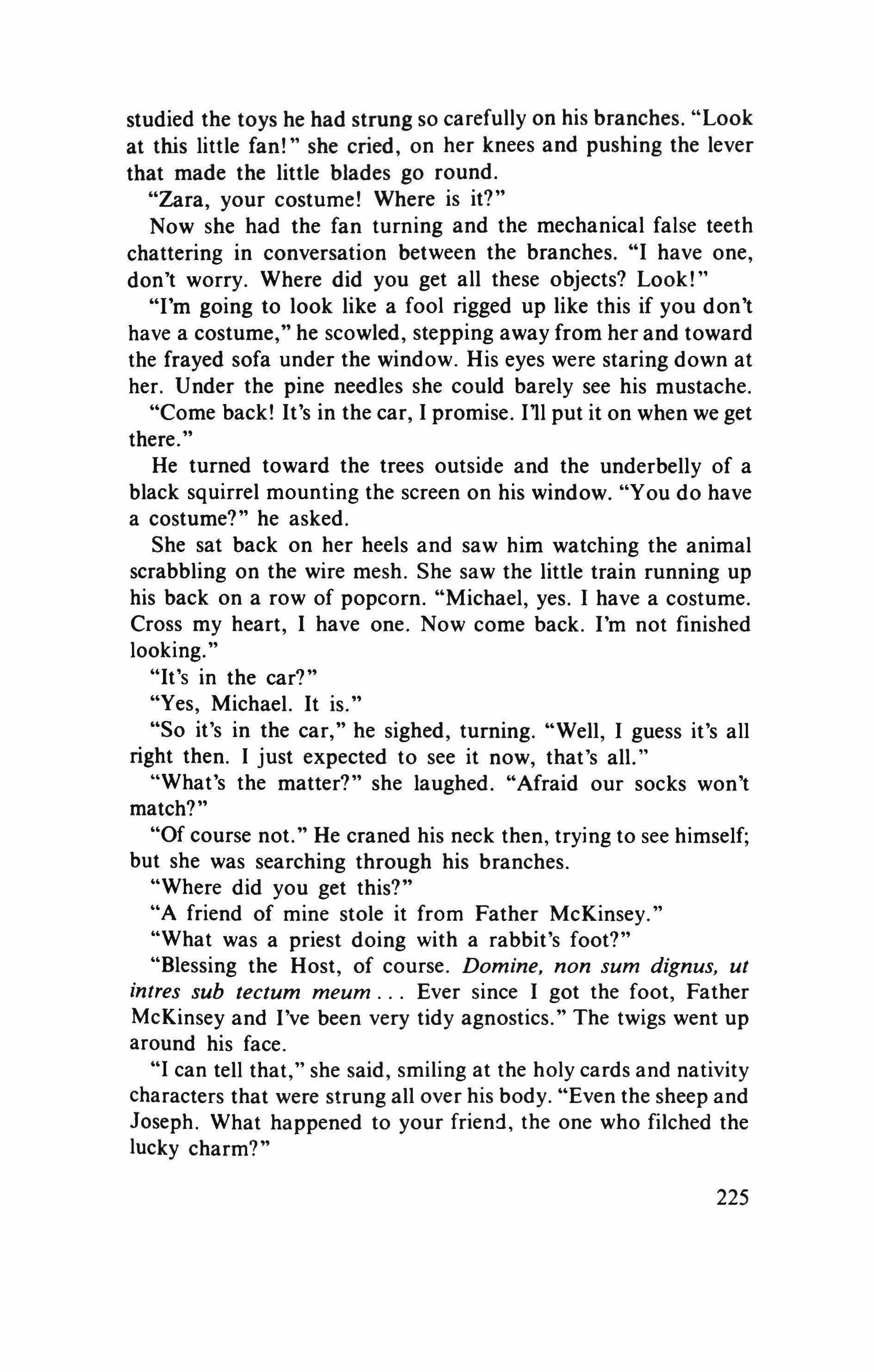
studied the toys he had strung so carefully on his branches. "Look at this little fan!" she cried, on her knees and pushing the lever that made the little blades go round.
"Zara, your costume! Where is it?"
Now she had the fan turning and the mechanical false teeth chattering in conversation between the branches. "I have one, don't worry. Where did you get all these objects? Look!"
"I'm going to look like a fool rigged up like this if you don't have a costume," he scowled, stepping away from her and toward the frayed sofa under the window. His eyes were staring down at her. Under the pine needles she could barely see his mustache.
"Come back! It's in the car, I promise. 111 put it on when we get there."
He turned toward the trees outside and the underbelly of a black squirrel mounting the screen on his window. "You do have a costume?" he asked.
She sat back on her heels and saw him watching the animal scrabbling on the wire mesh. She saw the little train running up his back on a row of popcorn. "Michael, yes. I have a costume. Cross my heart, I have one. Now come back. I'm not finished looking.
"It's in the car?"
"Yes, Michael. It is."
"So it's in the car," he sighed, turning. "Well, I guess it's all right then.• just expected to see it now, that's all."
"What's the matter?" she laughed. "Afraid our socks won't match?"
"Of course not." He craned his neck then, trying to see himself; but she was searching through his branches.
"Where did you get this?"
"A friend of mine stole it from Father McKinsey."
"What was a priest doing with a rabbit's foot?"
"Blessing the Host, of course. Domine, non sum dignus, ut intres sub tectum meum Ever since I got the foot, Father McKinsey and I've been very tidy agnostics." The twigs went up around his face.
"I can tell that," she said, smiling at the holy cards and nativity characters that were strung all over his body. "Even the sheep and Joseph. What happened to your friend, the one who filched the lucky charm?"
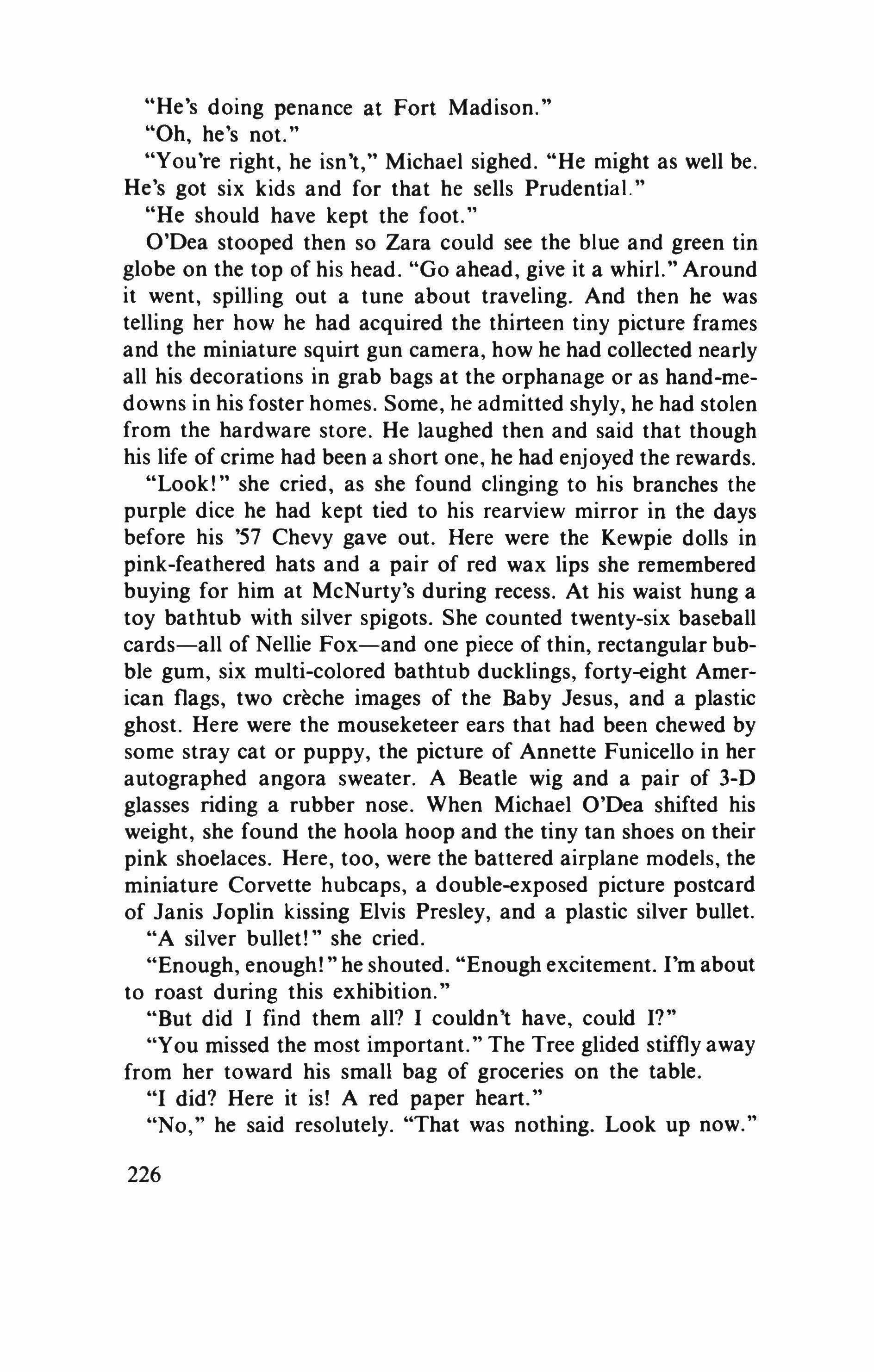
"He's doing penance at Fort Madison."
"Oh, he's not."
"You're right, he isn't," Michael sighed. "He might as well be. He's got six kids and for that he sells Prudential."
"He should have kept the foot."
O'Dea stooped then so Zara could see the blue and green tin globe on the top of his head. "Go ahead, give it a whirl." Around it went, spilling out a tune about traveling. And then he was telling her how he had acquired the thirteen tiny picture frames and the miniature squirt gun camera, how he had collected nearly all his decorations in grab bags at the orphanage or as hand-medowns in his foster homes. Some, he admitted shyly, he had stolen from the hardware store. He laughed then and said that though his life of crime had been a short one, he had enjoyed the rewards.
"Look!" she cried, as she found clinging to his branches the purple dice he had kept tied to his rearview mirror in the days before his '57 Chevy gave out. Here were the Kewpie dolls in pink-feathered hats and a pair of red wax lips she remembered buying for him at McNurty's during recess. At his waist hung a toy bathtub with silver spigots. She counted twenty-six baseball cards-all of Nellie Fox-and one piece of thin, rectangular bubble gum, six multi-colored bathtub ducklings, forty-eight American flags, two creche images of the Baby Jesus, and a plastic ghost. Here were the mouseketeer ears that had been chewed by some stray cat or puppy, the picture of Annette Funicello in her autographed angora sweater. A Beatle wig and a pair of 3-D glasses riding a rubber nose. When Michael O'Dea shifted his weight, she found the hoola hoop and the tiny tan shoes on their pink shoelaces. Here, too, were the battered airplane models, the miniature Corvette hubcaps, a double-exposed picture postcard of Janis Joplin kissing Elvis Presley, and a plastic silver bullet.
"A silver bullet!" she cried.
"Enough, enough!" he shouted. "Enough excitement. I'm about to roast during this exhibition."
"But did 1 find them all? 1 couldn't have, could I?"
"You missed the most important." The Tree glided stiffly away from her toward his small bag of groceries on the table.
"I did? Here it is! A red paper heart."
"No," he said resolutely. "That was nothing. Look up now."
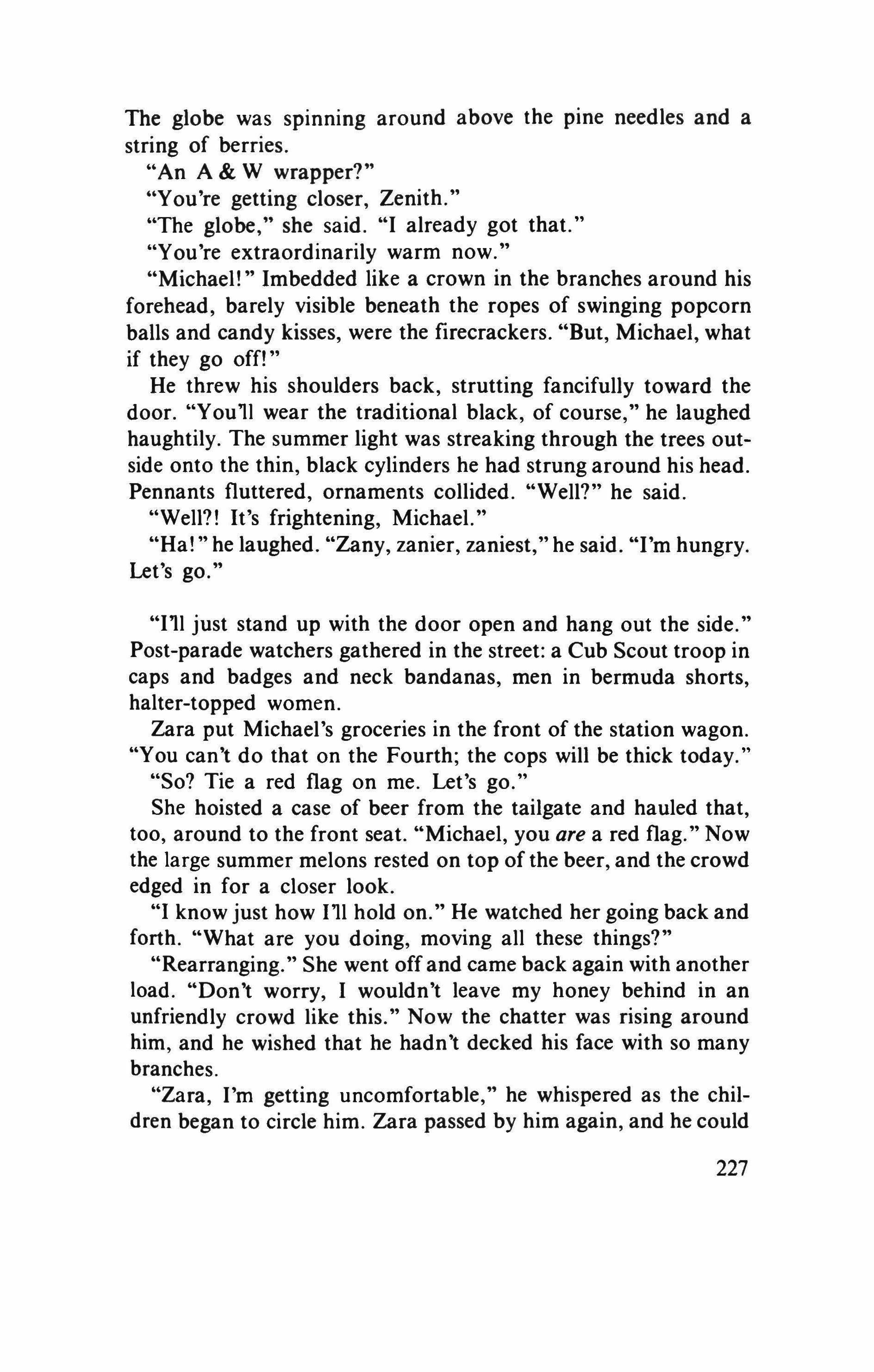
The globe was spinning around above the pine needles and a string of berries.
"An A & W wrapper?"
"You're getting closer, Zenith."
"The globe," she said. "I already got that."
"You're extraordinarily warm now."
"Michael!" Imbedded like a crown in the branches around his forehead, barely visible beneath the ropes of swinging popcorn balls and candy kisses, were the firecrackers. "But, Michael, what if they go off!"
He threw his shoulders back, strutting fancifully toward the door. "You'll wear the traditional black, of course," he laughed haughtily. The summer light was streaking through the trees outside onto the thin, black cylinders he had strung around his head. Pennants fluttered, ornaments collided. "Well?" he said.
"Well?! It's frightening, Michael."
"Ha!" he laughed. "Zany, zanier, zaniest," he said. "I'm hungry. Let's go."
"I'll just stand up with the door open and hang out the side." Post-parade watchers gathered in the street: a Cub Scout troop in caps and badges and neck bandanas, men in bermuda shorts, halter-topped women.
Zara put Michael's groceries in the front of the station wagon. "You can't do that on the Fourth; the cops will be thick today."
"So? Tie a red flag on me. Let's go."
She hoisted a case of beer from the tailgate and hauled that, too, around to the front seat. "Michael, you are a red flag." Now the large summer melons rested on top of the beer, and the crowd edged in for a closer look.
"I know just how I'll hold on." He watched her going back and forth. "What are you doing, moving all these things?"
"Rearranging." She went off and came back again with another load. "Don't worry, I wouldn't leave my honey behind in an unfriendly crowd like this." Now the chatter was rising around him, and he wished that he hadn't decked his face with so many branches.
"Zara, I'm getting uncomfortable," he whispered as the children began to circle him. Zara passed by him again, and he could
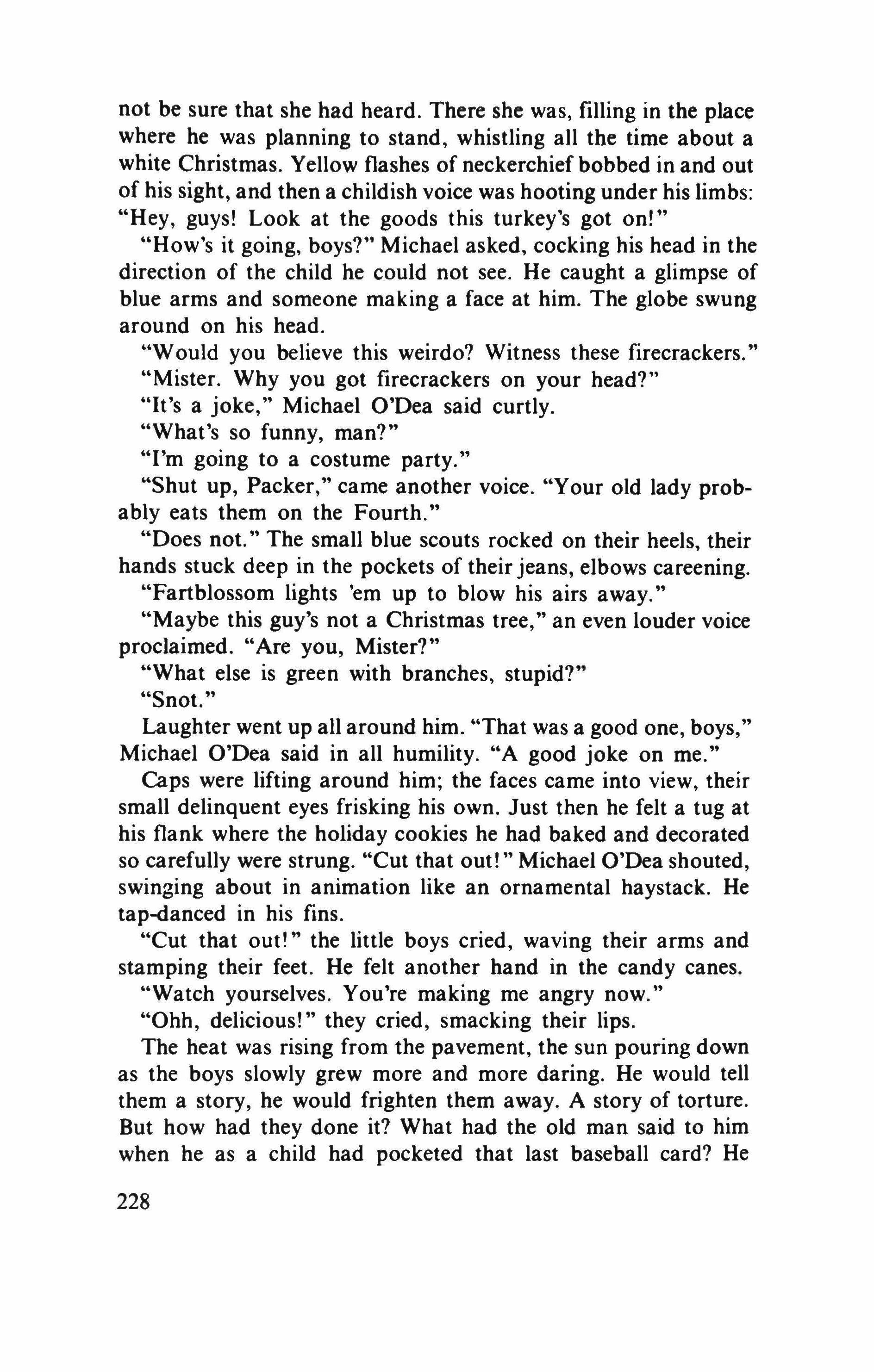
not be sure that she had heard. There she was, filling in the place where he was planning to stand, whistling all the time about a white Christmas. Yellow flashes of neckerchief bobbed in and out of his sight, and then a childish voice was hooting under his limbs: "Hey, guys! Look at the goods this turkey's got on!"
"How's it going, boys?" Michael asked, cocking his head in the direction of the child he could not see. He caught a glimpse of blue arms and someone making a face at him. The globe swung around on his head.
"Would you believe this weirdo? Witness these firecrackers."
"Mister. Why you got firecrackers on your head?"
"It's a joke," Michael O'Dea said curtly.
"What's so funny, man?"
"I'm going to a costume party."
"Shut up, Packer," came another voice. "Your old lady probably eats them on the Fourth."
"Does not." The small blue scouts rocked on their heels, their hands stuck deep in the pockets of their jeans, elbows careening.
"Fartblossom lights 'em up to blow his airs away."
"Maybe this guy's not a Christmas tree," an even louder voice proclaimed. "Are you, Mister?"
"What else is green with branches, stupid?" "Snot."
Laughter went up all around him. "That was a good one, boys," Michael O'Dea said in all humility. "A good joke on me."
Caps were lifting around him; the faces came into view, their small delinquent eyes frisking his own. Just then he felt a tug at his flank where the holiday cookies he had baked and decorated so carefully were strung. "Cut that out!" Michael O'Dea shouted, swinging about in animation like an ornamental haystack. He tap-danced in his fins.
"Cut that out!" the little boys cried, waving their arms and stamping their feet. He felt another hand in the candy canes.
"Watch yourselves. You're making me angry now."
"Ohh, delicious!" they cried, smacking their lips.
The heat was rising from the pavement, the sun pouring down as the boys slowly grew more and more daring. He would tell them a story, he would frighten them away. A story of torture. But how had they done it? What had the old man said to him when he as a child had pocketed that last baseball card? He
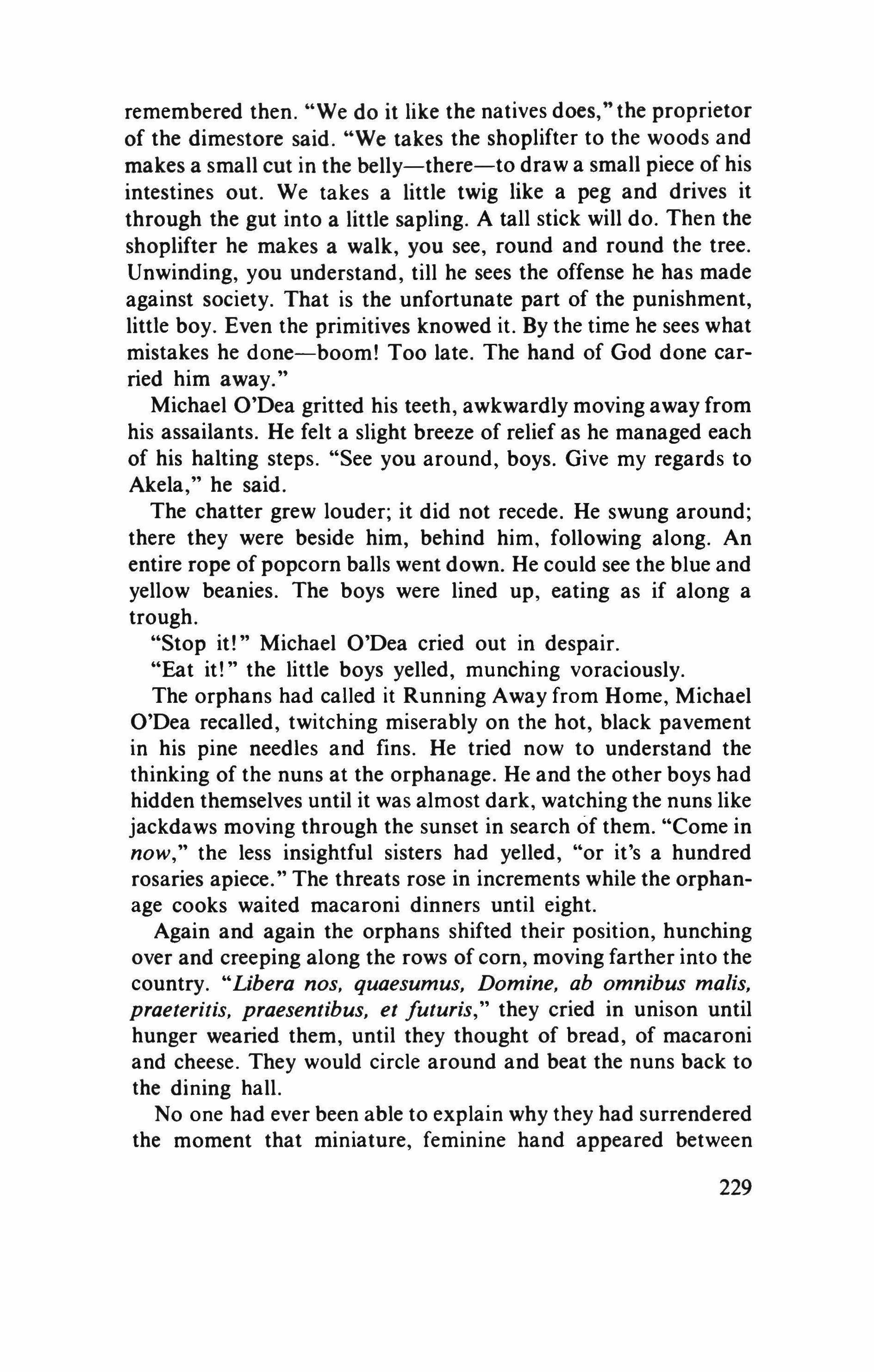
remembered then. "We do it like the natives does," the proprietor of the dimestore said. "We takes the shoplifter to the woods and makes a small cut in the belly-there-to draw a small piece of his intestines out. We takes a little twig like a peg and drives it through the gut into a little sapling. A tall stick will do. Then the shoplifter he makes a walk, you see, round and round the tree. Unwinding, you understand, till he sees the offense he has made against society. That is the unfortunate part of the punishment, little boy. Even the primitives knowed it. By the time he sees what mistakes he done-boom! Too late. The hand of God done carried him away."
Michael O'Dea gritted his teeth, awkwardly moving away from his assailants. He felt a slight breeze of relief as he managed each of his halting steps. "See you around, boys. Give my regards to Akela," he said.
The chatter grew louder; it did not recede. He swung around; there they were beside him, behind him, following along. An entire rope of popcorn balls went down. He could see the blue and yellow beanies. The boys were lined up, eating as if along a trough.
"Stop it!" Michael O'Dea cried out in despair.
"Eat it!" the little boys yelled, munching voraciously.
The orphans had called it Running Away from Home, Michael O'Dea recalled, twitching miserably on the hot, black pavement in his pine needles and fins. He tried now to understand the thinking of the nuns at the orphanage. He and the other boys had hidden themselves until it was almost dark, watching the nuns like jackdaws moving through the sunset in search of them. "Come in now," the less insightful sisters had yelled, "or it's a hundred rosaries apiece." The threats rose in increments while the orphanage cooks waited macaroni dinners until eight.
Again and again the orphans shifted their position, hunching over and creeping along the rows of corn, moving farther into the country. "Libera nos, quaesumus, Domine, ab omnibus malis, praeteritis, praesentibus, et futuris," they cried in unison until hunger wearied them, until they thought of bread, of macaroni and cheese. They would circle around and beat the nuns back to the dining hall.
No one had ever been able to explain why they had surrendered the moment that miniature, feminine hand appeared between
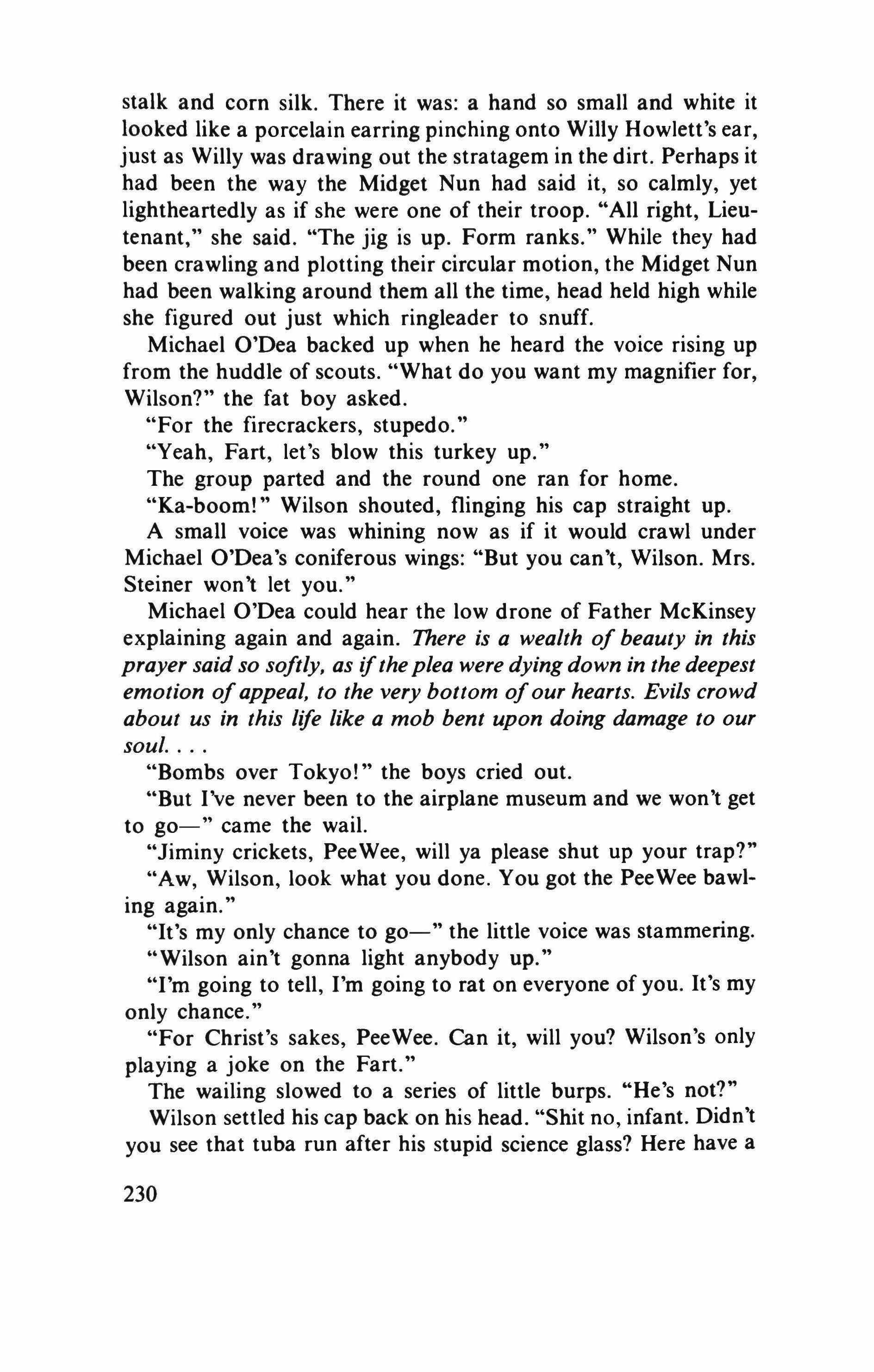
stalk and corn silk. There it was: a hand so small and white it looked like a porcelain earring pinching onto Willy Howlett's ear, just as Willy was drawing out the stratagem in the dirt. Perhaps it had been the way the Midget Nun had said it, so calmly, yet lightheartedly as if she were one of their troop. "All right, Lieutenant," she said. "The jig is up. Form ranks." While they had been crawling and plotting their circular motion, the Midget Nun had been walking around them all the time, head held high while she figured out just which ringleader to snuff.
Michael O'Dea backed up when he heard the voice rising up from the huddle of scouts. "What do you want my magnifier for, Wilson?" the fat boy asked.
"For the firecrackers, stupedo."
"Yeah, Fart, let's blow this turkey up."
The group parted and the round one ran for home.
"Ka-boorn!" Wilson shouted, flinging his cap straight up.
A small voice was whining now as if it would crawl under Michael O'Dea's coniferous wings: "But you can't, Wilson. Mrs. Steiner won't let you."
Michael O'Dea could hear the low drone of Father McKinsey explaining again and again. There is a wealth of beauty in this prayer said so softly, as iftheplea were dying down in the deepest emotion ofappeal, to the very bottom of our hearts. Evils crowd about us in this life like a mob bent upon doing damage to our soul
"Bombs over Tokyo!" the boys cried out.
"But I've never been to the airplane museum and we won't get to go-" came the wail.
"Jiminy crickets, PeeWee, will ya please shut up your trap?"
"Aw, Wilson, look what you done. You got the PeeWee bawling again."
"It's my only chance to go-" the little voice was stammering.
"Wilson ain't gonna light anybody up."
"I'm going to tell, I'm going to rat on everyone of you. It's my only chance."
"For Christ's sakes, PeeWee. Can it, will you? Wilson's only playing a joke on the Fart."
The wailing slowed to a series of little burps. "He's not?"
Wilson settled his cap back on his head. "Shit no, infant. Didn't you see that tuba run after his stupid science glass? Here have a
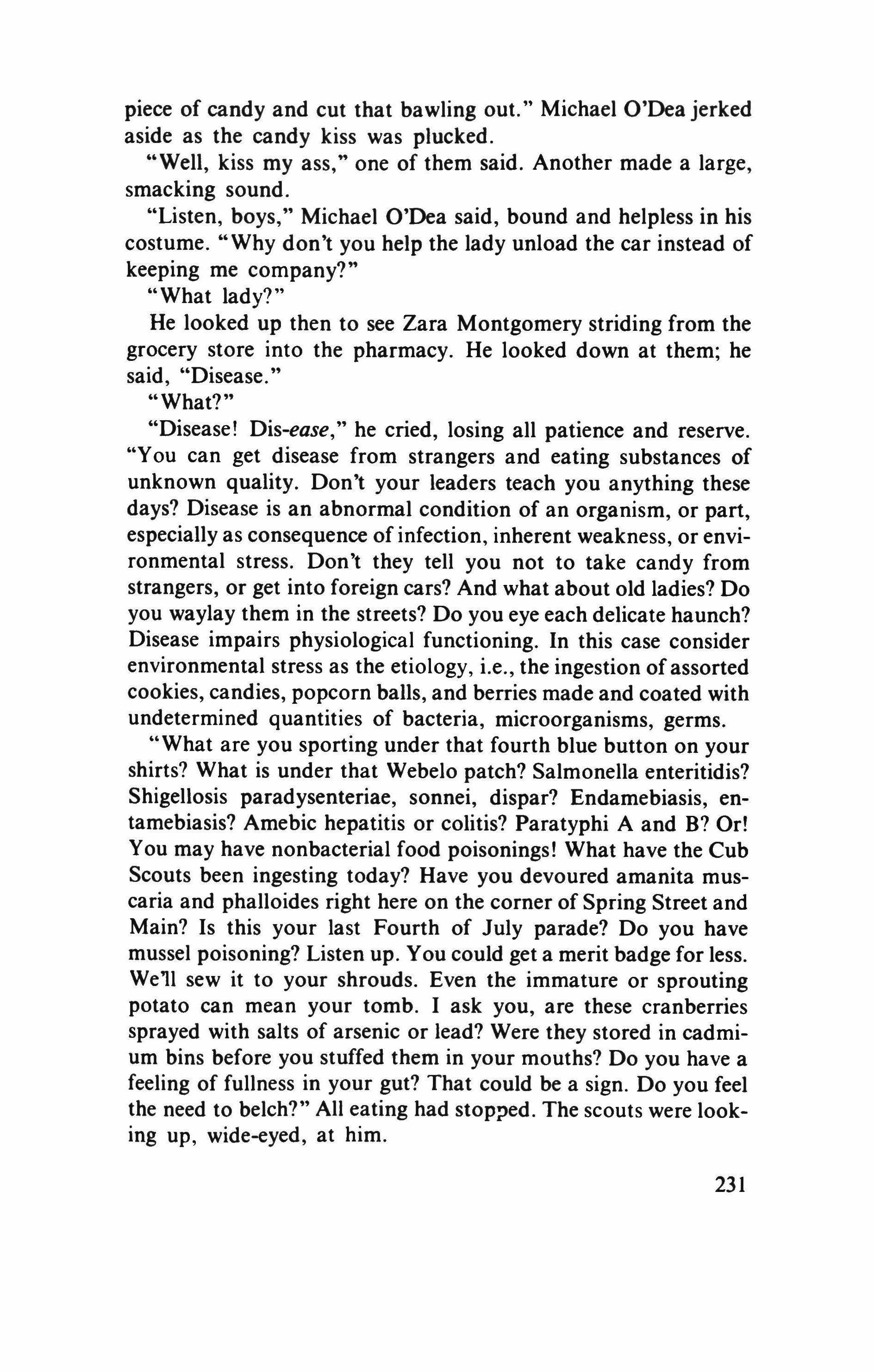
piece of candy and cut that bawling out." Michael O'Dea jerked aside as the candy kiss was plucked.
"Well, kiss my ass," one of them said. Another made a large, smacking sound.
"Listen, boys," Michael O'Dea said, bound and helpless in his costume. "Why don't you help the lady unload the car instead of keeping me company?"
"What lady?"
He looked up then to see Zara Montgomery striding from the grocery store into the pharmacy. He looked down at them; he said, "Disease."
"What?"
"Disease! Dis-ease," he cried, losing all patience and reserve. "You can get disease from strangers and eating substances of unknown quality. Don't your leaders teach you anything these days? Disease is an abnormal condition of an organism, or part, especially as consequence of infection, inherent weakness, or environmental stress. Don't they tell you not to take candy from strangers, or get into foreign cars? And what about old ladies? Do you waylay them in the streets? Do you eye each delicate haunch? Disease impairs physiological functioning. In this case consider environmental stress as the etiology, i.e., the ingestion ofassorted cookies, candies, popcorn balls, and berries made and coated with undetermined quantities of bacteria, microorganisms, germs.
"What are you sporting under that fourth blue button on your shirts? What is under that Webelo patch? Salmonella enteritidis?
Shigellosis paradysenteriae, sonnei, dispar? Endamebiasis, entamebiasis? Amebic hepatitis or colitis? Paratyphi A and B? Or! You may have nonbacterial food poisonings! What have the Cub Scouts been ingesting today? Have you devoured amanita muscaria and phalloides right here on the corner of Spring Street and Main? Is this your last Fourth of July parade? Do you have mussel poisoning? Listen up. You could get a merit badge for less. We'll sew it to your shrouds. Even the immature or sprouting potato can mean your tomb. I ask you, are these cranberries sprayed with salts of arsenic or lead? Were they stored in cadmium bins before you stuffed them in your mouths? Do you have a feeling of fullness in your gut? That could be a sign. Do you feel the need to belch?" All eating had stopped. The scouts were looking up, wide-eyed, at him.

"Other symptoms and signs may occur, perhaps as late as thirtysix hours from now. Watch for anorexia, postprandial nausea, abdominal distress, acid-base imbalance, prostration, and shock. Do you have a feeling of unnatural warmth or chills, constipation, hiccoughs, impotence, or bloody stools? Run home and check, little Webelos. In cases of botulism, visual disorders may set in. Dysarthria, dysphagia, nasal regurgitation, too. Are you seeing things you've never seen before? What? Someone gulped! Difficulty in swallowing often leads to aspiration pneumonia, Cublets. Think of that. The muscles of the extremities and trunk weaken prior to death. How do you know what a snack will cost you on the street? A Cub today, a worm tomorrow. And a bellyache in between."
Michael O'Dea paused to catch his breath. They were all looking up at him. Wilson was the first to speak. "Hey, man," he said, "what are you anyway? Some sort of sixties freak?"
Michael sighed. Zara Montgomery was nowhere in sight. He shifted his weight irritably in the heat and looked toward the pharmacy again. On the corner of Main Street and Spring, the silver edge of a telephone booth slid open. There, he thought as he swung in that direction, was his salvation: a slender blue skirt, blue blouse, and beanie. And there the blonde radiance and the den mother's pin, all striding with conviction toward his predicament. He said, "Mrs. Steiner, Mrs. Steiner! I'm Dr. O'Dea."
The young woman looked him up and down.
He nodded toward the boys. "I presume you are responsible for these he said as the globe on his head gave out an unprofessional squeak.
The woman's face turned up, staring adamantly into the bright lights of his eyes. "Well, you could hardly blame them, could you?" She took in her breath so sharply that he didn't know whether it was a low, seductive whistle or a hiss. Slowly she studied him again; she smirked at him. "Jerry, Tommy. Come on, boys. Leave the man's little popcorn balls alone."
Dismayed, Michael O'Dea watched their disorganized retreat as they scattered up over the curb and turned to face him. Mrs. Steiner stepped forward to converse with a man; and just behind her, like a row of mechanical carnival ducks, a series of solitary middle fingers shot straight up, one by one, saluting his benefi-
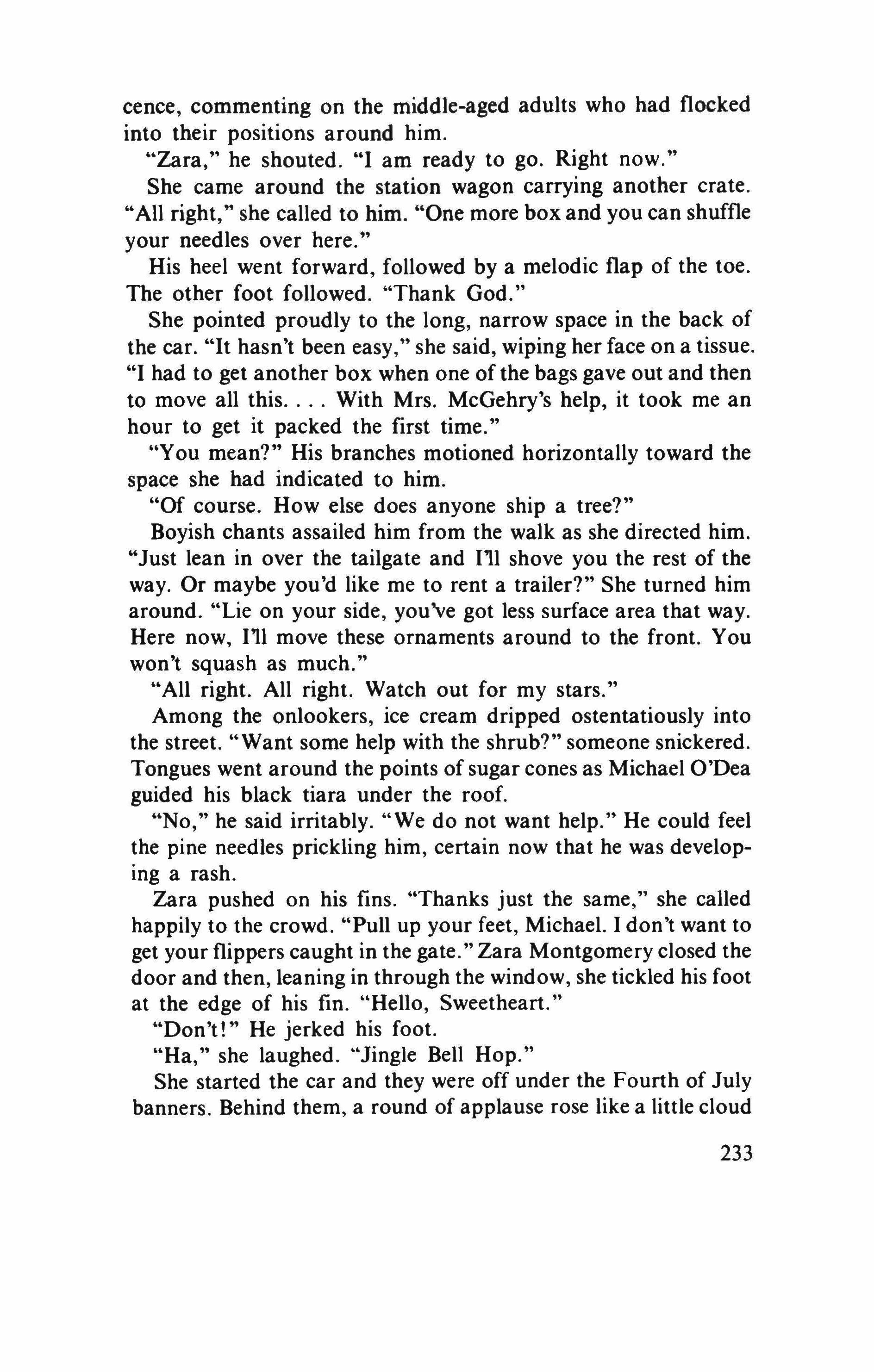
cence, commenting on the middle-aged adults who had flocked into their positions around him.
"Zara," he shouted. "I am ready to go. Right now."
She came around the station wagon carrying another crate All right," she called to him. "One more box and you can shuffle your needles over here."
His heel went forward, followed by a melodic flap of the toe. The other foot followed. "Thank God."
She pointed proudly to the long, narrow space in the back of the car. "It hasn't been easy," she said, wiping her face on a tissue. "I had to get another box when one of the bags gave out and then to move all this. With Mrs. McGehry's help, it took me an hour to get it packed the first time."
"You mean?" His branches motioned horizontally toward the space she had indicated to him.
"Of course. How else does anyone ship a tree?"
Boyish chants assailed him from the walk as she directed him. "Just lean in over the tailgate and I'll shove you the rest of the way. Or maybe you'd like me to rent a trailer?" She turned him around. "Lie on your side, you've got less surface area that way. Here now, 111 move these ornaments around to the front. You won't squash as much."
"All right. All right. Watch out for my stars."
Among the onlookers, ice cream dripped ostentatiously into the street. "Want some help with the shrub?" someone snickered. Tongues went around the points of sugar cones as Michael O'Dea guided his black tiara under the roof.
"No," he said irritably. "We do not want help." He could feel the pine needles prickling him, certain now that he was developing a rash.
Zara pushed on his fins. "Thanks just the same," she called happily to the crowd. "Pull up your feet, Michael. 1 don't want to get your flippers caught in the gate." Zara Montgomery closed the door and then, leaning in through the window, she tickled his foot at the edge of his fin. "Hello, Sweetheart."
"Don't!" He jerked his foot.
"Ha," she laughed. "Jingle Bell Hop."
She started the car and they were off under the Fourth of July banners. Behind them, a round of applause rose like a little cloud
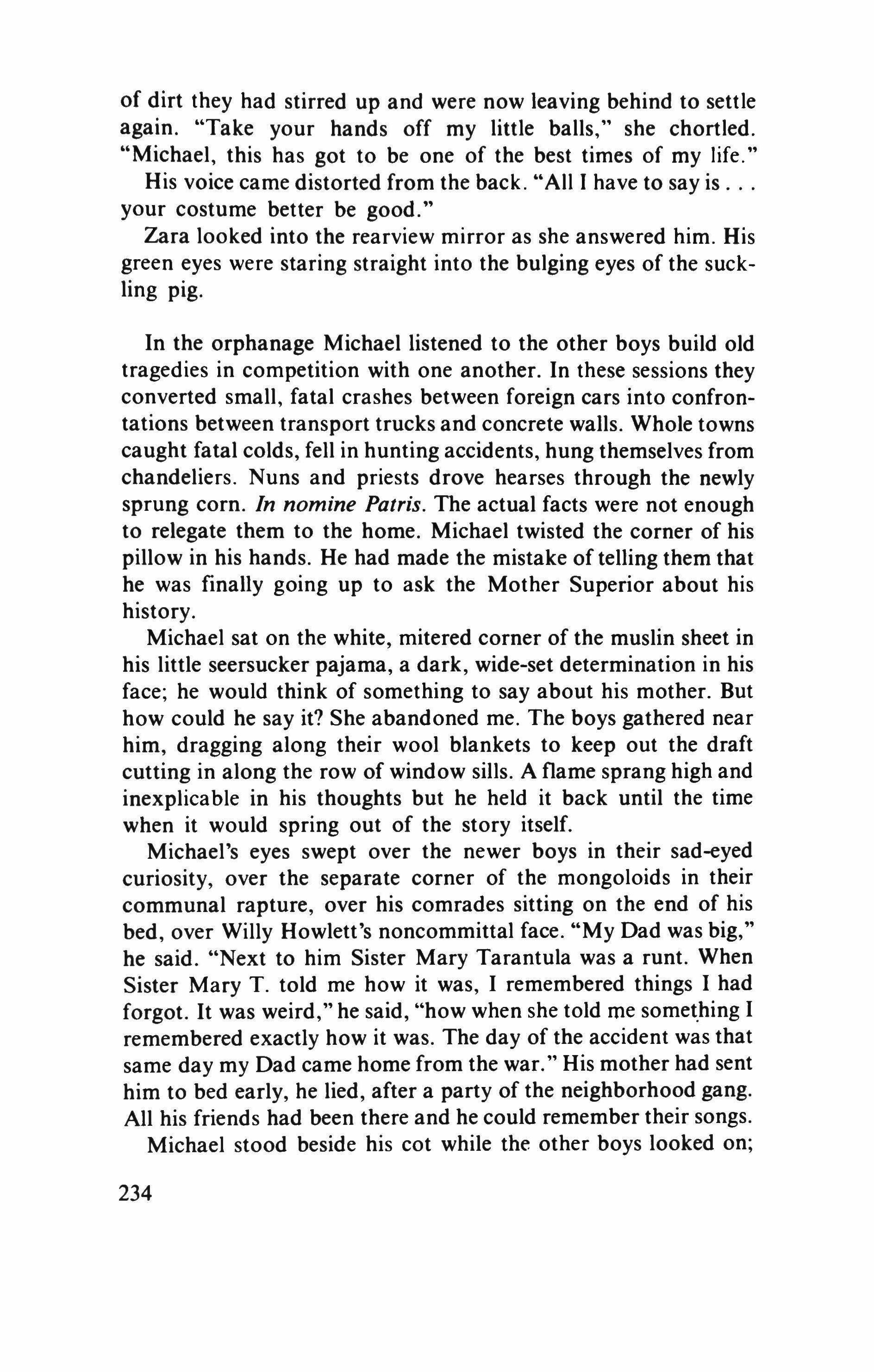
of dirt they had stirred up and were now leaving behind to settle again. "Take your hands off my little balls," she chortled. "Michael, this has got to be one of the best times of my life."
His voice came distorted from the back. "All I have to say is your costume better be good."
Zara looked into the rearview mirror as she answered him. His green eyes were staring straight into the bulging eyes of the suckling pig.
In the orphanage Michael listened to the other boys build old tragedies in competition with one another. In these sessions they converted small, fatal crashes between foreign cars into confrontations between transport trucks and concrete walls. Whole towns caught fatal colds, fell in hunting accidents, hung themselves from chandeliers. Nuns and priests drove hearses through the newly sprung corn. In nomine Parris. The actual facts were not enough to relegate them to the home. Michael twisted the corner of his pillow in his hands. He had made the mistake of telling them that he was finally going up to ask the Mother Superior about his history.
Michael sat on the white, mitered corner of the muslin sheet in his little seersucker pajama, a dark, wide-set determination in his face; he would think of something to say about his mother. But how could he say it? She abandoned me. The boys gathered near him, dragging along their wool blankets to keep out the draft cutting in along the row of window sills. A flame sprang high and inexplicable in his thoughts but he held it back until the time when it would spring out of the story itself.
Michael's eyes swept over the newer boys in their sad-eyed curiosity, over the separate corner of the mongoloids in their communal rapture, over his comrades sitting on the end of his bed, over Willy Howlett's noncommittal face. "My Dad was big," he said. "Next to him Sister Mary Tarantula was a runt. When Sister Mary T. told me how it was, I remembered things I had forgot. It was weird," he said, "how when she told me something I remembered exactly how it was. The day of the accident was that same day my Dad came home from the war." His mother had sent him to bed early, he lied, after a party of the neighborhood gang. All his friends had been there and he could remember their songs.
Michael stood beside his cot while the other boys looked on; 234
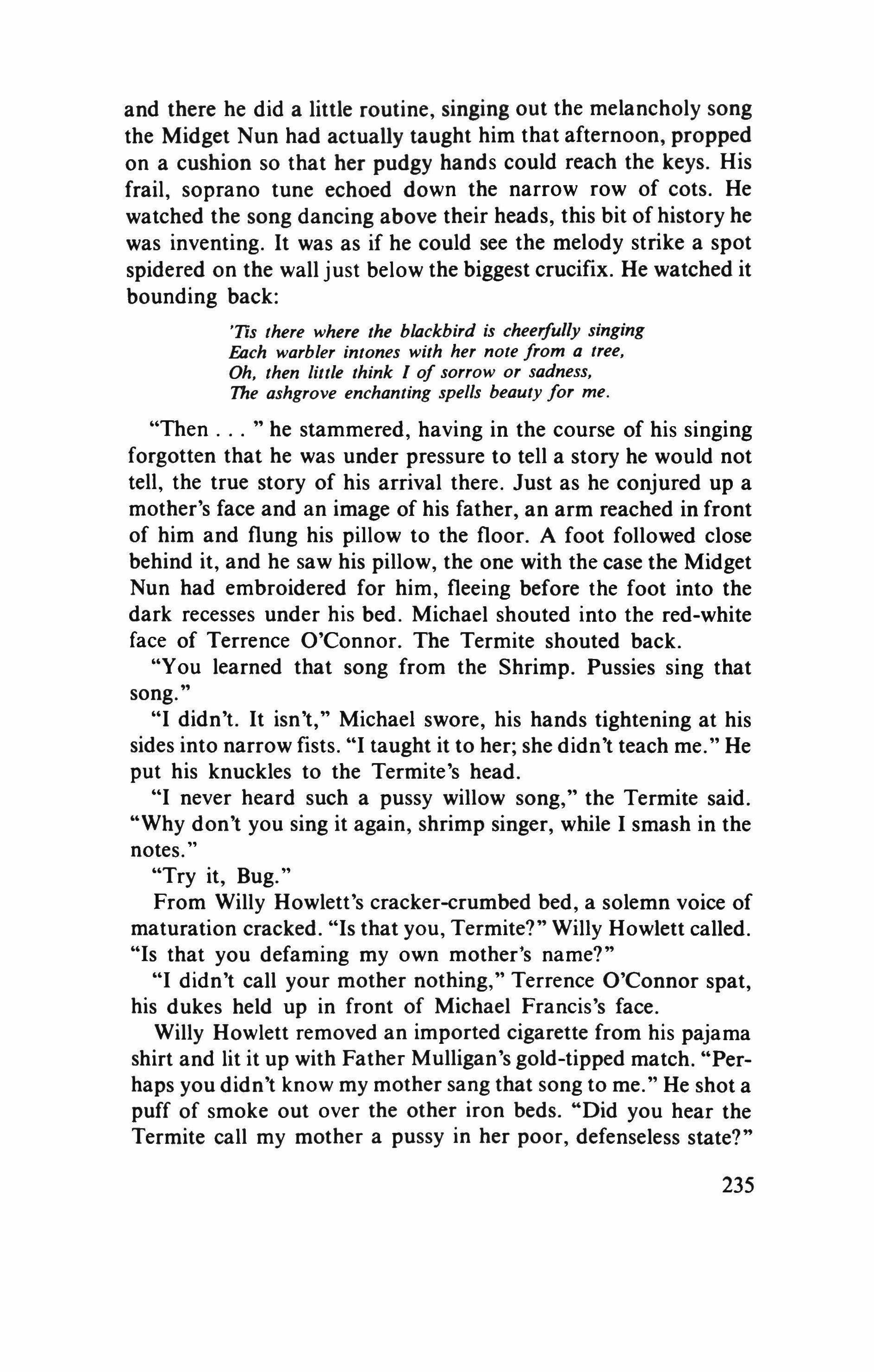
and there he did a little routine, singing out the melancholy song the Midget Nun had actually taught him that afternoon, propped on a cushion so that her pudgy hands could reach the keys. His frail, soprano tune echoed down the narrow row of cots. He watched the song dancing above their heads, this bit of history he was inventing. It was as if he could see the melody strike a spot spidered on the wall just below the biggest crucifix. He watched it bounding back:
'TIs there where the blackbird is cheerfully singing Each warbler intones with her note from a tree, Oh, then little think 1 of sorrow or sadness, The ashgrove enchanting spells beauty for me.
"Then "he stammered, having in the course of his singing forgotten that he was under pressure to tell a story he would not tell, the true story of his arrival there. Just as he conjured up a mother's face and an image of his father, an arm reached in front of him and flung his pillow to the floor. A foot followed close behind it, and he saw his pillow, the one with the case the Midget Nun had embroidered for him, fleeing before the foot into the dark recesses under his bed. Michael shouted into the red-white face of Terrence O'Connor. The Termite shouted back.
"You learned that song from the Shrimp. Pussies sing that song.
"I didn't. It isn't," Michael swore, his hands tightening at his sides into narrow fists. "I taught it to her; she didn't teach me." He put his knuckles to the Termite's head.
"I never heard such a pussy willow song," the Termite said. "Why don't you sing it again, shrimp singer, while I smash in the notes.
From Willy Howlett's cracker-crumbed bed, a solemn voice of maturation cracked. "Is that you, Termite?" Willy Howlett called. "Is that you defaming my own mother's name?"
"I didn't call your mother nothing," Terrence O'Connor spat, his dukes held up in front of Michael Francis's face.
Willy Howlett removed an imported cigarette from his pajama shirt and lit it up with Father Mulligan's gold-tipped match. "Perhaps you didn't know my mother sang that song to me." He shot a puff of smoke out over the other iron beds. "Did you hear the Termite call my mother a pussy in her poor, defenseless state?"
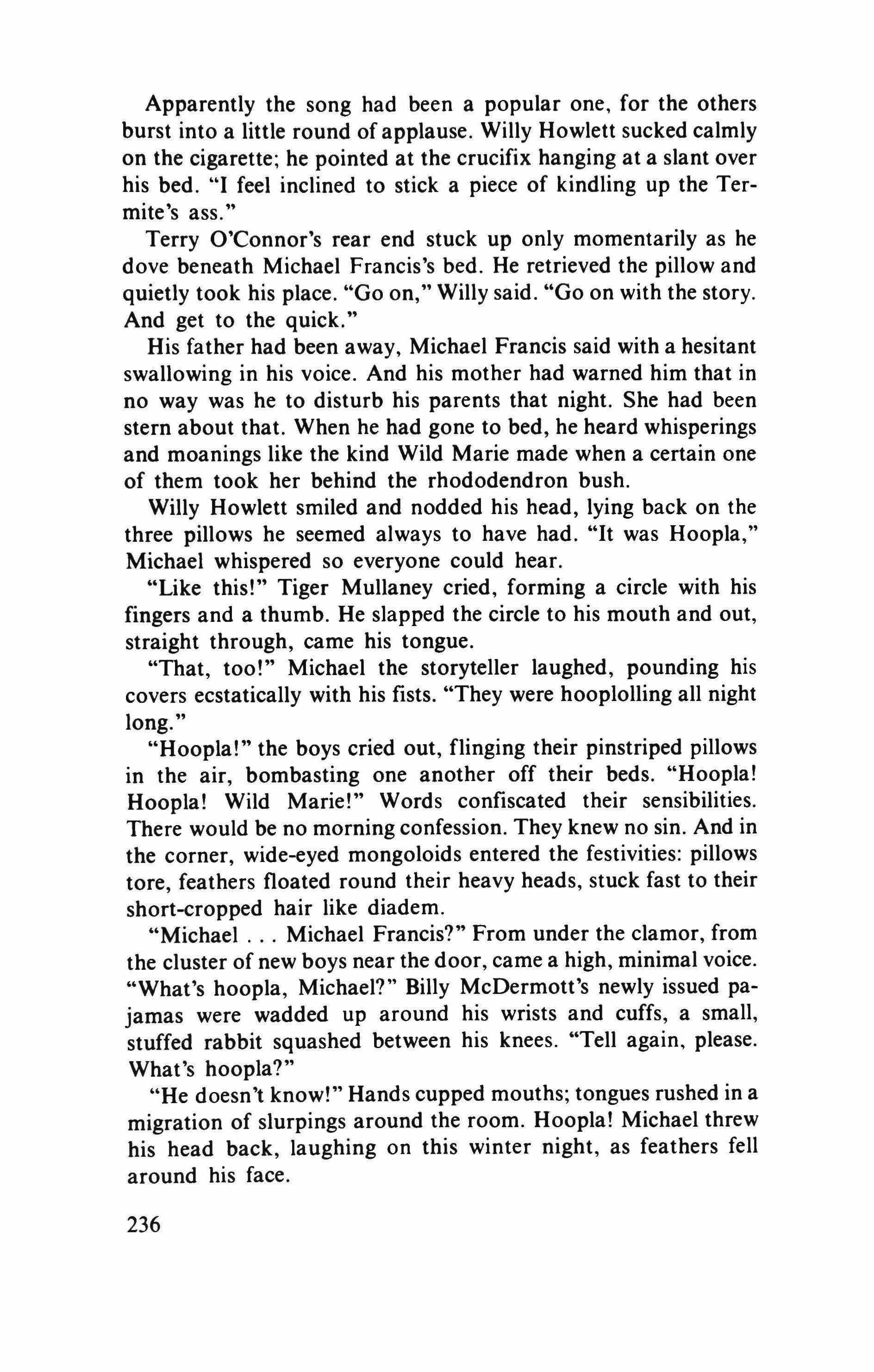
Apparently the song had been a popular one, for the others burst into a little round of applause. Willy Howlett sucked calmly on the cigarette; he pointed at the crucifix hanging at a slant over his bed. "I feel inclined to stick a piece of kindling up the Termite's ass."
Terry O'Connor's rear end stuck up only momentarily as he dove beneath Michael Francis's bed. He retrieved the pillow and quietly took his place. "Go on," Willy said. "Go on with the story. And get to the quick."
His father had been away, Michael Francis said with a hesitant swallowing in his voice. And his mother had warned him that in no way was he to disturb his parents that night. She had been stern about that. When he had gone to bed, he heard whisperings and moanings like the kind Wild Marie made when a certain one of them took her behind the rhododendron bush.
Willy Howlett smiled and nodded his head, lying back on the three pillows he seemed always to have had. "It was Hoopla," Michael whispered so everyone could hear.
"Like this!" Tiger Mullaney cried, forming a circle with his fingers and a thumb. He slapped the circle to his mouth and out, straight through, came his tongue.
"That, too!" Michael the storyteller laughed, pounding his covers ecstatically with his fists. "They were hooplolling all night long."
"Hoopla!" the boys cried out, flinging their pinstriped pillows in the air, bombasting one another off their beds. "Hoopla! Hoopla! Wild Marie!" Words confiscated their sensibilities. There would be no morning confession. They knew no sin. And in the corner, wide-eyed mongoloids entered the festivities: pillows tore, feathers floated round their heavy heads, stuck fast to their short-cropped hair like diadem.
"Michael Michael Francis?" From under the clamor, from the cluster of new boys near the door, came a high, minimal voice. "What's hoopla, Michael?" Billy McDermott's newly issued pajamas were wadded up around his wrists and cuffs, a small, stuffed rabbit squashed between his knees. "Tell again, please. What's hoopla?"
"He doesn't know!" Hands cupped mouths; tongues rushed in a migration of slurpings around the room. Hoopla! Michael threw his head back, laughing on this winter night, as feathers fell around his face.
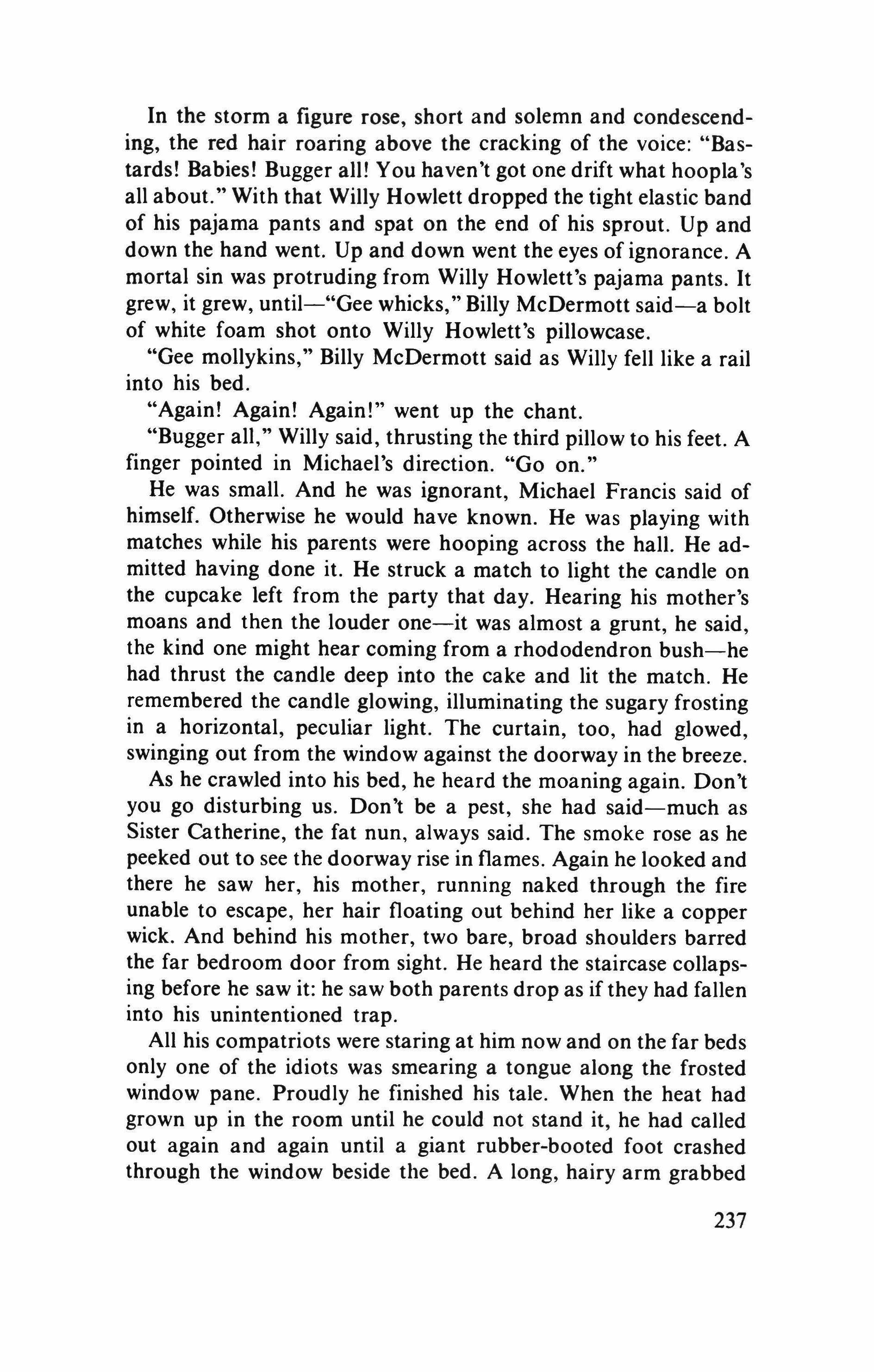
In the storm a figure rose, short and solemn and condescending, the red hair roaring above the cracking of the voice: "Bastards! Babies! Bugger all! You haven't got one drift what hoopla's all about." With that Willy Howlett dropped the tight elastic band of his pajama pants and spat on the end of his sprout. Up and down the hand went. Up and down went the eyes of ignorance. A mortal sin was protruding from Willy Howlett's pajama pants. It grew, it grew, until-"Gee whicks," Billy McDermott said-a bolt of white foam shot onto Willy Howlett's pillowcase.
"Gee mollykins," Billy McDermott said as Willy fell like a rail into his bed.
"Again! Again! Again!" went up the chant.
"Bugger all," Willy said, thrusting the third pillow to his feet. A finger pointed in Michael's direction. "Go on."
He was small. And he was ignorant, Michael Francis said of himself. Otherwise he would have known. He was playing with matches while his parents were hooping across the hall. He admitted having done it. He struck a match to light the candle on the cupcake left from the party that day. Hearing his mother's moans and then the louder one-it was almost a grunt, he said, the kind one might hear coming from a rhododendron bush-he had thrust the candle deep into the cake and lit the match. He remembered the candle glowing, illuminating the sugary frosting in a horizontal, peculiar light. The curtain, too, had glowed, swinging out from the window against the doorway in the breeze.
As he crawled into his bed, he heard the moaning again. Don't you go disturbing us. Don't be a pest, she had said-much as Sister Catherine, the fat nun, always said. The smoke rose as he peeked out to see the doorway rise in flames. Again he looked and there he saw her, his mother, running naked through the fire unable to escape, her hair floating out behind her like a copper wick. And behind his mother, two bare, broad shoulders barred the far bedroom door from sight. He heard the staircase collapsing before he saw it: he saw both parents drop as if they had fallen into his unintentioned trap.
All his compatriots were staring at him now and on the far beds only one of the idiots was smearing a tongue along the frosted window pane. Proudly he finished his tale. When the heat had grown up in the room until he could not stand it, he had called out again and again until a giant rubber-booted foot crashed through the window beside the bed. A long, hairy arm grabbed
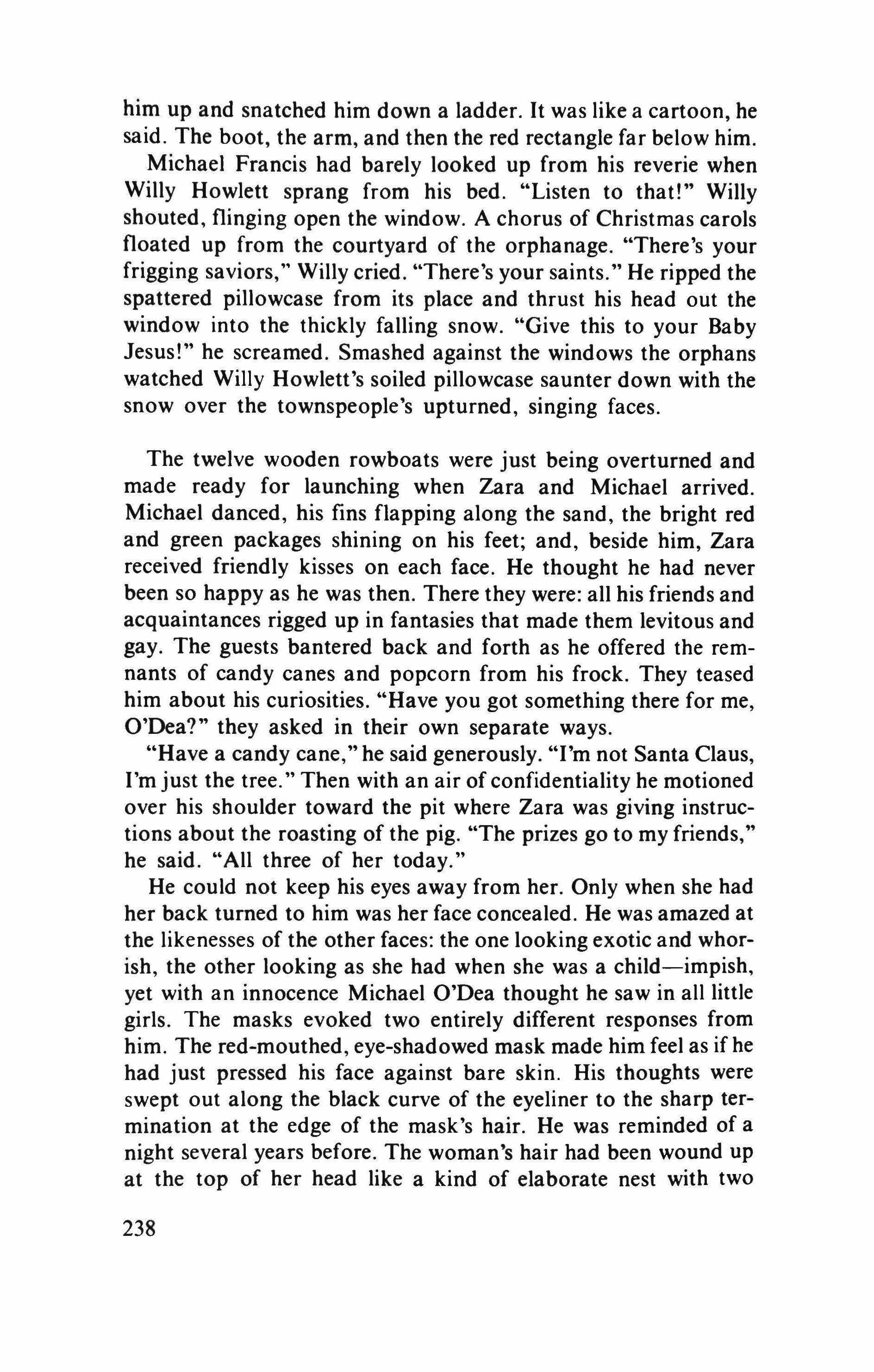
him up and snatched him down a ladder. It was like a cartoon, he said. The boot, the arm, and then the red rectangle far below him. Michael Francis had barely looked up from his reverie when Willy Howlett sprang from his bed. "Listen to that!" Willy shouted, flinging open the window. A chorus of Christmas carols floated up from the courtyard of the orphanage. "There's your frigging saviors," Willy cried. "There's your saints." He ripped the spattered pillowcase from its place and thrust his head out the window into the thickly falling snow. "Give this to your Baby Jesus!" he screamed. Smashed against the windows the orphans watched Willy Howlett's soiled pillowcase saunter down with the snow over the townspeople's upturned, singing faces.
The twelve wooden rowboats were just being overturned and made ready for launching when Zara and Michael arrived. Michael danced, his fins flapping along the sand, the bright red and green packages shining on his feet; and, beside him, Zara received friendly kisses on each face. He thought he had never been so happy as he was then. There they were: all his friends and acquaintances rigged up in fantasies that made them levitous and gay. The guests bantered back and forth as he offered the remnants of candy canes and popcorn from his frock. They teased him about his curiosities. "Have you got something there for me, O'Dea?" they asked in their own separate ways.
"Have a candy cane," he said generously. "I'm not Santa Claus, I'm just the tree." Then with an air of confidentiality he motioned over his shoulder toward the pit where Zara was giving instructions about the roasting of the pig. "The prizes go to my friends," he said. "All three of her today."
He could not keep his eyes away from her. Only when she had her back turned to him was her face concealed. He was amazed at the likenesses of the other faces: the one looking exotic and whorish, the other looking as she had when she was a child-impish, yet with an innocence Michael O'Dea thought he saw in all little girls. The masks evoked two entirely different responses from him. The red-mouthed, eye-shadowed mask made him feel as if he had just pressed his face against bare skin. His thoughts were swept out along the black curve of the eyeliner to the sharp termination at the edge of the mask's hair. He was reminded of a night several years before. The woman's hair had been wound up at the top of her head like a kind of elaborate nest with two

rhinestone butterflies pinned on one side. She reached across the table over their drinks. Her dark brown, painted nails crushed his lapel, and he felt his chest expand when he heard her speak.
"I want it extravagant," she said. "I don't get a performance at home. I need a performance. Know what I mean?"
"You're an attractive woman," he said. Her eyes were as brown as her nails, her cheeks cream-white beneath the rouge.
"I've heard it before." She leaned back, drawing on her cigarette, the smoke circling over her head.
"Your husband's at home then? Or is he working tonight?"
"Work!" she said. "That will be the day. I wait tables and he reads books."
Michael O'Dea took her coat from the chair and stood up, holding it open for her. In his apartment when he took hold of the woman's head and pulled it toward his own, he thought he heard the two winged hairpins smack together in noncommittal relief.
Zara turned in the long turquoise kaftan she had put on in the woods. She walked around the makeshift barbeque pit. That other face, the child face He remembered her sitting at the long table at the Montgomery house in that white leotard and frilly, short skirt, her pale blue ballet slippers muddied from playing catch with him outside.
"Pass your little guest the sweet potatoes, Zara," Kathryn Montgomery said.
Michael O'Dea was sitting up straight. He was poking his toe nervously in and out of a hole in his sock where nobody could see.
"So you're leaving the Murphys' soon?" Forster said to him.
"Yes, sir."
"And have you found a new situation for yourself?"
"Father McKinsey is working on it, Sir."
Forster Montgomery looked up toward his wife. "I suppose you'Il be wanting a home with lots of other children around," he said to Michael. "Is that right?"
Zara was bringing a small bite of steak up daintily to her mouth.
"Oh, no, sir. One sister would be good He fingered the edge of the tablecloth. "Or a brother, but I like sisters best."
"Maybe you'd like a home with a little more space in it? To romp around in, I mean." The doctor's eyes went back and forth between the boy's face and his wife's.
Kathryn laid down her fork. "Forster," she said. "Why don't
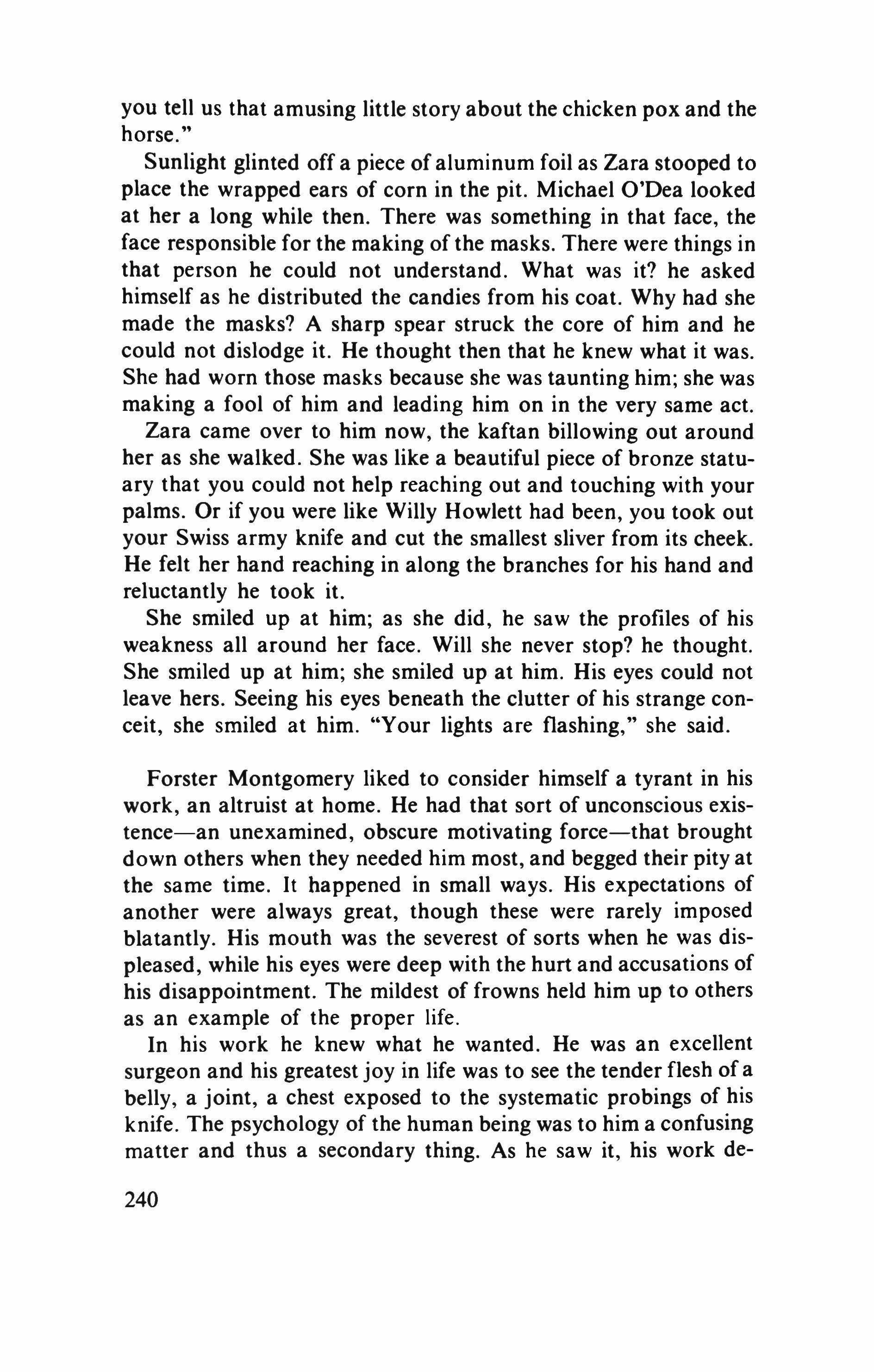
you tell us that amusing little story about the chicken pox and the horse.
Sunlight glinted off a piece of aluminum foil as Zara stooped to place the wrapped ears of corn in the pit. Michael O'Dea looked at her a long while then. There was something in that face, the face responsible for the making of the masks. There were things in that person he could not understand. What was it? he asked himself as he distributed the candies from his coat. Why had she made the masks? A sharp spear struck the core of him and he could not dislodge it. He thought then that he knew what it was. She had worn those masks because she was taunting him; she was making a fool of him and leading him on in the very same act.
Zara came over to him now, the kaftan billowing out around her as she walked. She was like a beautiful piece of bronze statuary that you could not help reaching out and touching with your palms. Or if you were like Willy Howlett had been, you took out your Swiss army knife and cut the smallest sliver from its cheek. He felt her hand reaching in along the branches for his hand and reluctantly he took it.
She smiled up at him; as she did, he saw the profiles of his weakness all around her face. Will she never stop? he thought. She smiled up at him; she smiled up at him. His eyes could not leave hers. Seeing his eyes beneath the clutter of his strange conceit, she smiled at him. "Your lights are flashing," she said.
Forster Montgomery liked to consider himself a tyrant in his work, an altruist at home. He had that sort of unconscious existence-an unexamined, obscure motivating force-that brought down others when they needed him most, and begged their pity at the same time. It happened in small ways. His expectations of another were always great, though these were rarely imposed blatantly. His mouth was the severest of sorts when he was displeased, while his eyes were deep with the hurt and accusations of his disappointment. The mildest of frowns held him up to others as an example of the proper life.
In his work he knew what he wanted. He was an excellent surgeon and his greatest joy in life was to see the tender flesh of a belly, a joint, a chest exposed to the systematic probings of his knife. The psychology of the human being was to him a confusing matter and thus a secondary thing. As he saw it, his work de-
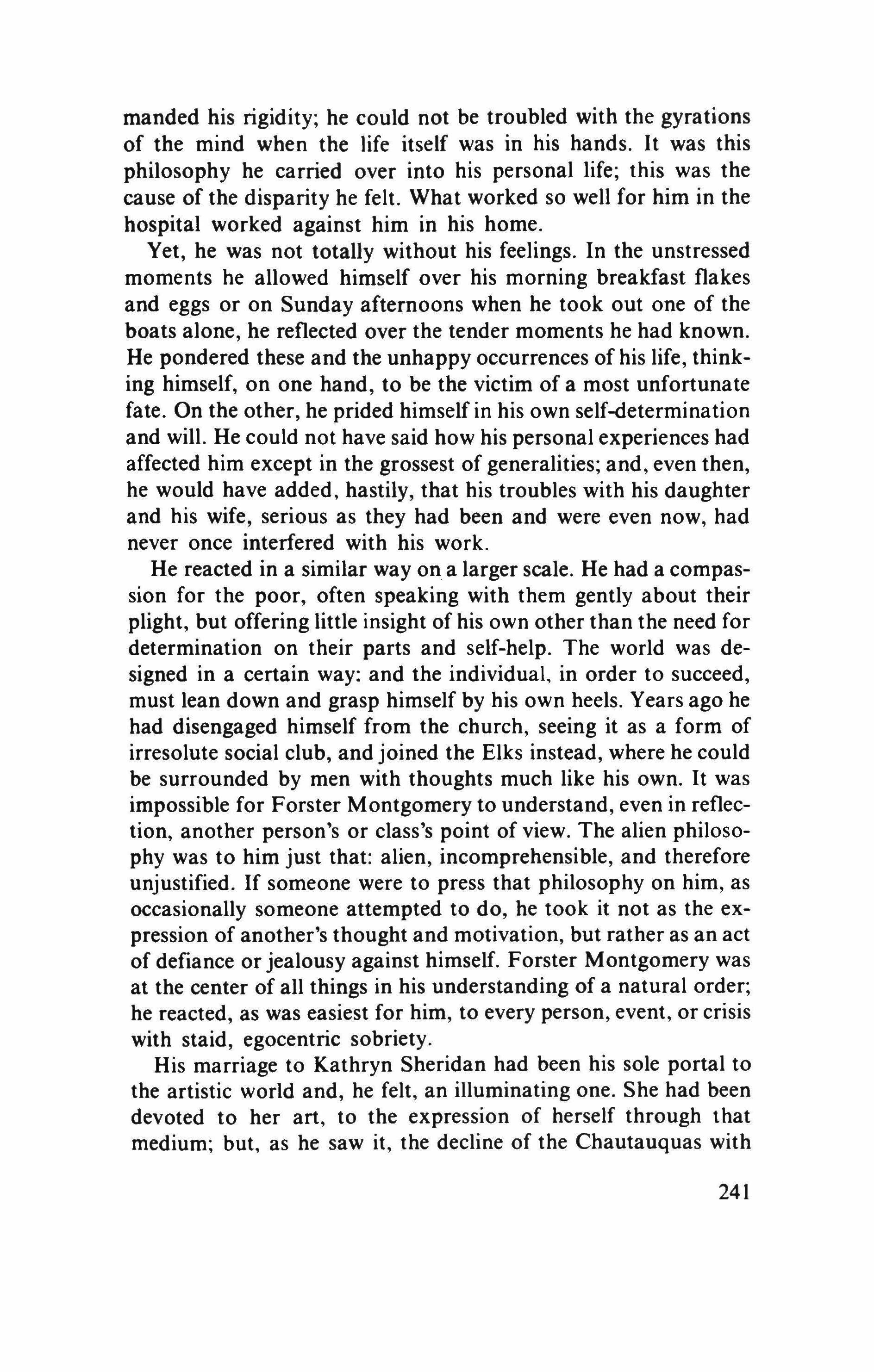
manded his rigidity; he could not be troubled with the gyrations of the mind when the life itself was in his hands. I t was this philosophy he carried over into his personal life; this was the cause of the disparity he felt. What worked so well for him in the hospital worked against him in his home.
Yet, he was not totally without his feelings. In the unstressed moments he allowed himself over his morning breakfast flakes and eggs or on Sunday afternoons when he took out one of the boats alone, he reflected over the tender moments he had known. He pondered these and the unhappy occurrences of his life, thinking himself, on one hand, to be the victim of a most unfortunate fate. On the other, he prided himself in his own self-determination and will. He could not have said how his personal experiences had affected him except in the grossest of generalities; and, even then, he would have added, hastily, that his troubles with his daughter and his wife, serious as they had been and were even now, had never once interfered with his work.
He reacted in a similar way on a larger scale. He had a compassion for the poor, often speaking with them gently about their plight, but offering little insight of his own other than the need for determination on their parts and self-help. The world was designed in a certain way: and the individual, in order to succeed, must lean down and grasp himself by his own heels. Years ago he had disengaged himself from the church, seeing it as a form of irresolute social club, and joined the Elks instead, where he could be surrounded by men with thoughts much like his own. It was impossible for Forster Montgomery to understand, even in reflection, another person's or class's point of view. The alien philosophy was to him just that: alien, incomprehensible, and therefore unjustified. If someone were to press that philosophy on him, as occasionally someone attempted to do, he took it not as the expression of another's thought and motivation, but rather as an act of defiance or jealousy against himself. Forster Montgomery was at the center of all things in his understanding of a natural order; he reacted, as was easiest for him, to every person, event, or crisis with staid, egocentric sobriety.
His marriage to Kathryn Sheridan had been his sole portal to the artistic world and, he felt, an illuminating one. She had been devoted to her art, to the expression of herself through that medium; but, as he saw it, the decline of the Chautauquas with

the Depression years and his wife's subsequent hermitage in his house, had been sheer inevitabilities. Such an end was totally predictable in a life based solely on the uncertainty of aesthetic whim.
When his daughter told him, finally, of her own decision to give up medicine for a less depressing, more artistic existence, Forster Montgomery was not hesitant to point out to her the difference in her parents' lives, setting out the young woman's mother in illustration of what might be expected from such an irresponsible choice. He described his own life then, saying that he always knew what to expect each day. His existence was not boring, nor would ever be. The security of having a reliable position, and a respectable one, he said, did not efface the total unpredictability of dealing with human life in the operating room.
When Zara objected adamantly, raising her voice and saying without hesitation that the flaw in her mother's life had not been in having sought to express herself in a highly unpredictable field but rather in having given up that pursuit in order to marry him, Forster Montgomery set down his coffee mug with a resolution that could be heard to the top of the house. His wife's marriage to him had not been a mistake; it had been a change of direction from an already declining, frivolous affair with a craze-ridden world.
With that he walked, stone-faced, from the room, cursing the influence of his wife, even now, on this daughter whom he had stringently directed in the technicalities of what he considered to be a man's world. He saw her decision as flightiness, an attribute his colleagues had continually ascribed to women in the field. Having no son to forward in his own desires, he had consistently denied this to them, saying that a human being was a dedicated and skilled physician or was not, regardless of sex. He was humiliated in the wake of her retreat. He felt that he had been in the wrong, something he rarely admitted to anyone, though he might this once have been able to admit his disappointment to Kathryn. He had wanted to admit a great many things to her before she had died, but always Zara was there with her, usurping his time. All together, he guessed, he had felt more resentment toward her than gratitude for caring for Kathryn. He knew it had not been easy for his daughter; however, the girl had had a good endurance for the situation. He could not see why that strength had dissipated now. He was in no way himself at fault, he said to himself.
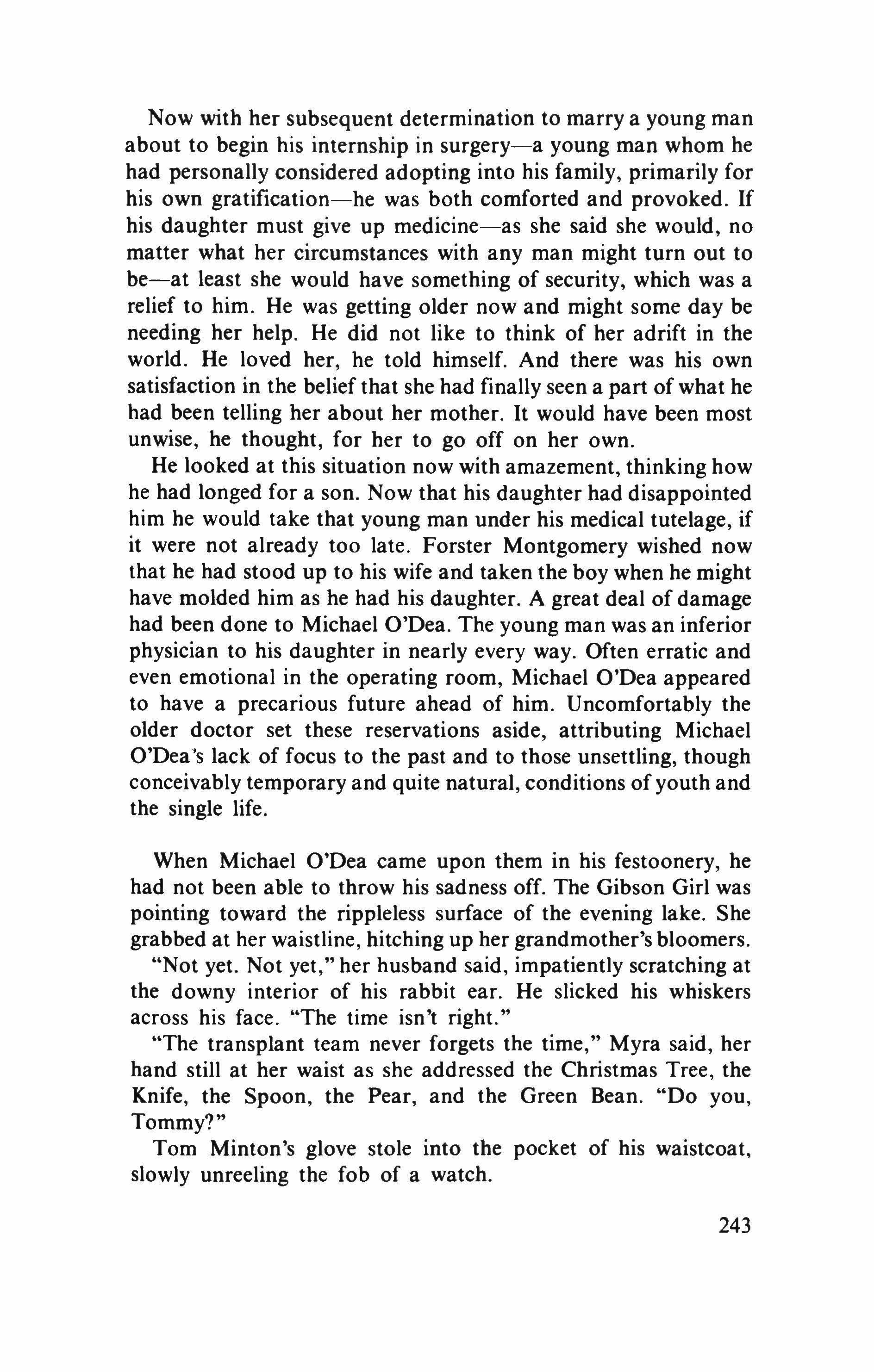
Now with her subsequent determination to marry a young man about to begin his internship in surgery-a young man whom he had personally considered adopting into his family, primarily for his own gratification-he was both comforted and provoked. If his daughter must give up medicine-as she said she would, no matter what her circumstances with any man might turn out to be-at least she would have something of security, which was a relief to him. He was getting older now and might some day be needing her help. He did not like to think of her adrift in the world. He loved her, he told himself. And there was his own satisfaction in the belief that she had finally seen a part of what he had been telling her about her mother. It would have been most unwise, he thought, for her to go off on her own.
He looked at this situation now with amazement, thinking how he had longed for a son. Now that his daughter had disappointed him he would take that young man under his medical tutelage, if it were not already too late. Forster Montgomery wished now that he had stood up to his wife and taken the boy when he might have molded him as he had his daughter. A great deal of damage had been done to Michael O'Dea. The young man was an inferior physician to his daughter in nearly every way. Often erratic and even emotional in the operating room, Michael O'Dea appeared to have a precarious future ahead of him. Uncomfortably the older doctor set these reservations aside, attributing Michael O'Dea's lack of focus to the past and to those unsettling, though conceivably temporary and quite natural, conditions of youth and the single life.
When Michael O'Dea came upon them in his festoonery, he had not been able to throw his sadness off. The Gibson Girl was pointing toward the rippleless surface of the evening lake. She grabbed at her waistline, hitching up her grandmother's bloomers.
"Not yet. Not yet," her husband said, impatiently scratching at the downy interior of his rabbit ear. He slicked his whiskers across his face. "The time isn't right."
"The transplant team never forgets the time," Myra said, her hand still at her waist as she addressed the Christmas Tree, the Knife, the Spoon, the Pear, and the Green Bean. "Do you, Tommy?"
Tom Minton's glove stole into the pocket of his waistcoat, slowly unreeling the fob of a watch.
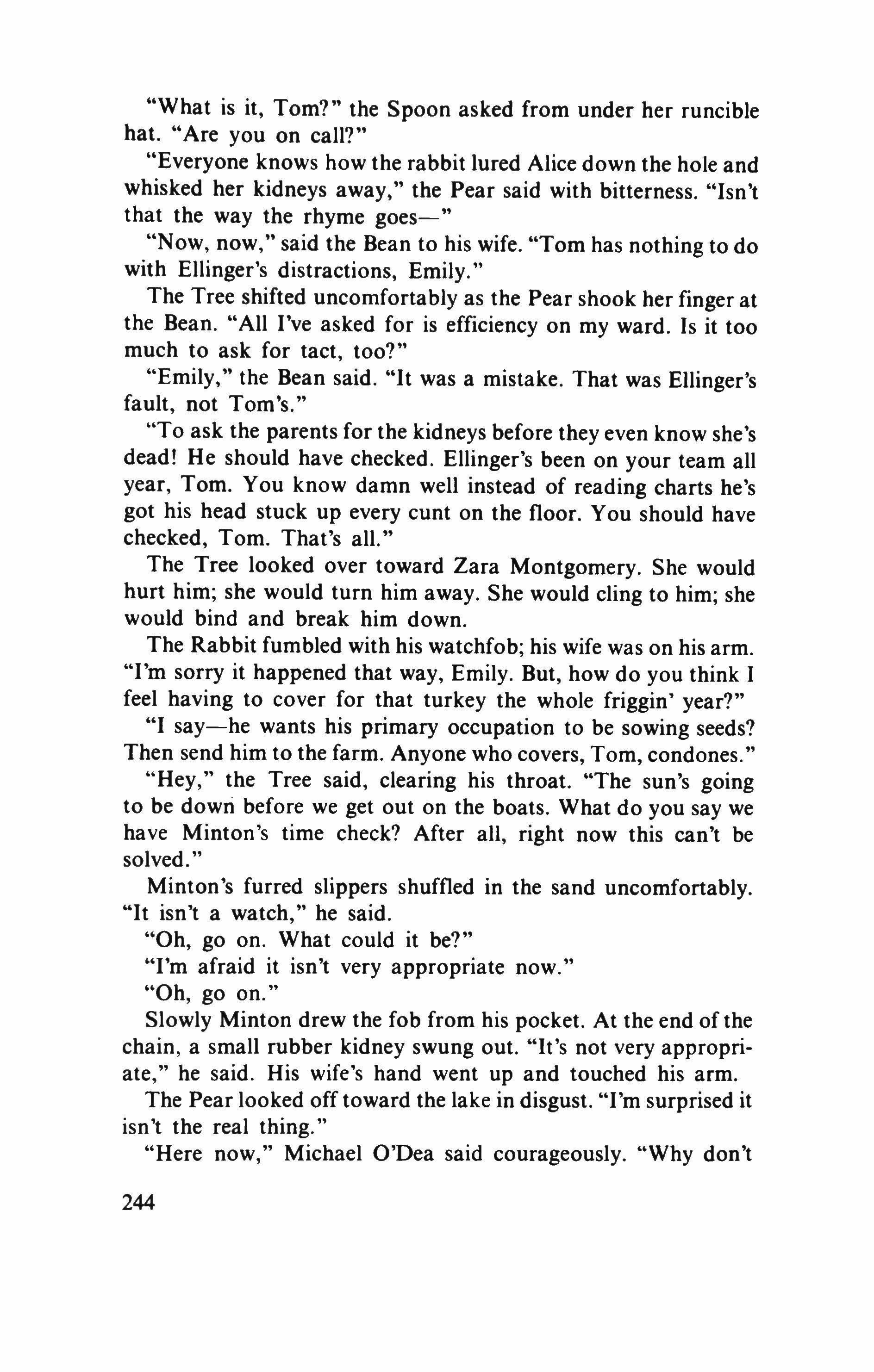
"What is it, Tom?" the Spoon asked from under her runcible hat. "Are you on call?"
"Everyone knows how the rabbit lured Alice down the hole and whisked her kidneys away," the Pear said with bitterness. "Isn't that the way the rhyme goes-"
"Now, now," said the Bean to his wife. "Tom has nothing to do with Ellinger's distractions, Emily."
The Tree shifted uncomfortably as the Pear shook her finger at the Bean. "All I've asked for is efficiency on my ward. Is it too much to ask for tact, too?"
"Emily," the Bean said. "It was a mistake. That was Ellinger's fault, not Tom's."
"To ask the parents for the kidneys before they even know she's dead! He should have checked. Ellinger's been on your team all year, Tom. You know damn well instead of reading charts he's got his head stuck up every cunt on the floor. You should have checked, Tom. That's all."
The Tree looked over toward Zara Montgomery. She would hurt him; she would turn him away. She would cling to him; she would bind and break him down.
The Rabbit fumbled with his watchfob; his wife was on his arm. "I'm sorry it happened that way, Emily. But, how do you think I feel having to cover for that turkey the whole friggin' year?"
"I say-he wants his primary occupation to be sowing seeds? Then send him to the farm. Anyone who covers, Tom, condones."
"Hey," the Tree said, clearing his throat. "The sun's going to be dowri before we get out on the boats. What do you say we have Minton's time check? After all, right now this can't be solved."
Minton's furred slippers shuffled in the sand uncomfortably. "It isn't a watch," he said.
"Oh, go on. What could it be?"
"I'm afraid it isn't very appropriate now."
"Oh, go on."
Slowly Minton drew the fob from his pocket. At the end of the chain, a small rubber kidney swung out. "It's not very appropriate," he said. His wife's hand went up and touched his arm.
The Pear looked off toward the lake in disgust. "I'm surprised it isn't the real thing."
"Here now," Michael O'Dea said courageously. "Why don't
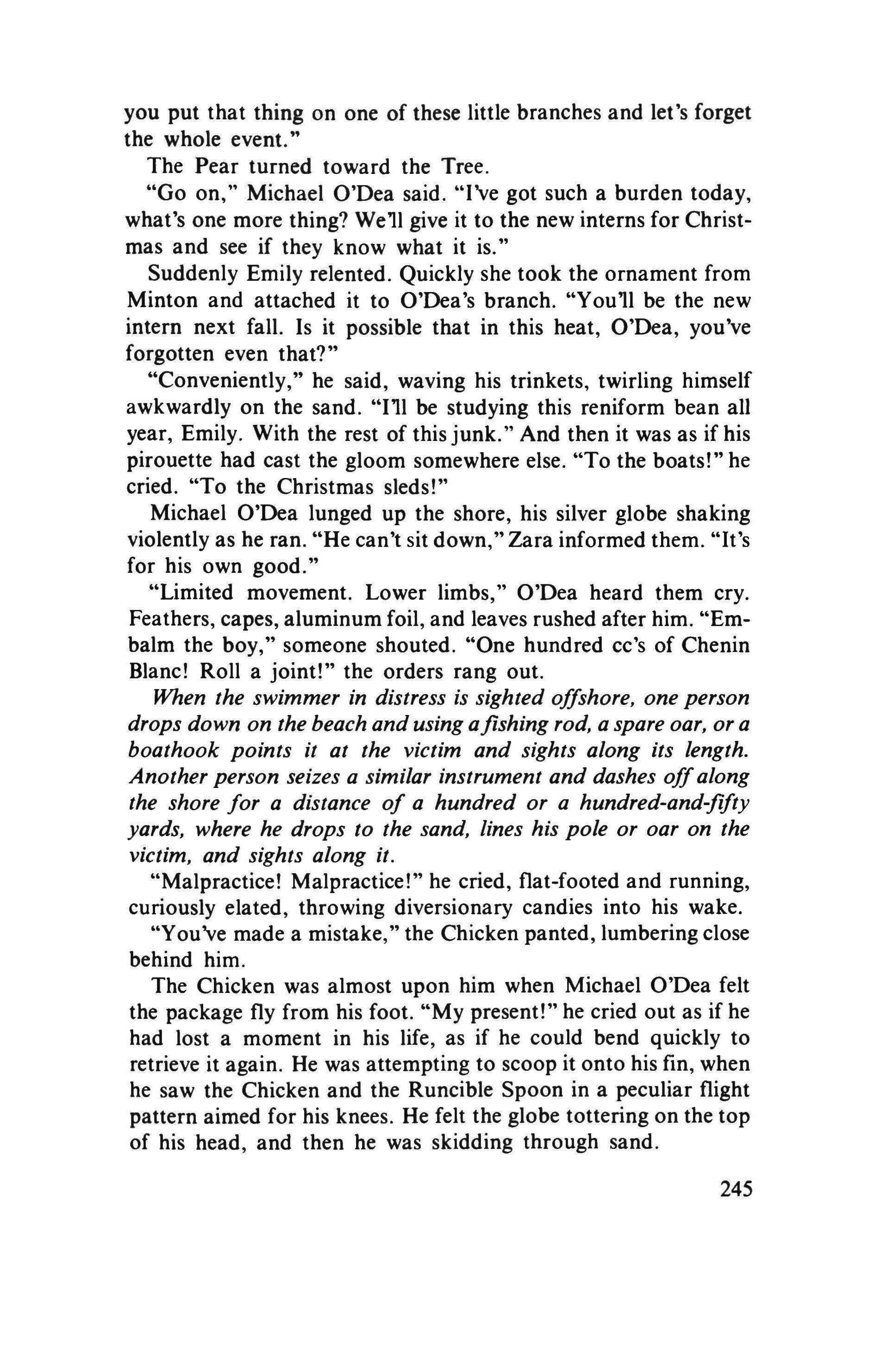
you put that thing on one of these little branches and let's forget the whole event."
The Pear turned toward the Tree.
"Go on," Michael O'Dea said. "I've got such a burden today, what's one more thing? We'll give it to the new interns for Christmas and see if they know what it is."
Suddenly Emily relented. Quickly she took the ornament from Minton and attached it to O'Dea's branch. "You'll be the new intern next fall. Is it possible that in this heat, O'Dea, you've forgotten even that?"
"Conveniently," he said, waving his trinkets, twirling himself awkwardly on the sand. "I'll be studying this reniform bean all year, Emily. With the rest of this junk." And then it was as if his pirouette had cast the gloom somewhere else. "To the boats!" he cried. "To the Christmas sleds!"
Michael O'Dea lunged up the shore, his silver globe shaking violently as he ran. "He can't sit down," Zara informed them. "It's for his own good."
"Limited movement. Lower limbs," O'Dea heard them cry. Feathers, capes, aluminum foil, and leaves rushed after him. "Embalm the boy," someone shouted. "One hundred cc's of Chenin Blanc! Roll a joint!" the orders rang out.
When the swimmer in distress is sighted offshore, one person drops down on the beach and using afishing rod, a spare oar, or a boathook points it at the victim and sights along its length. Another person seizes a similar instrument and dashes offalong the shore for a distance of a hundred or a hundred-and-fifty yards, where he drops to the sand, lines his pole or oar on the victim, and sights along it.
"Malpractice! Malpractice!" he cried, flat-footed and running, curiously elated, throwing diversionary candies into his wake.
"You've made a mistake," the Chicken panted, lumbering close behind him.
The Chicken was almost upon him when Michael O'Dea felt the package fly from his foot. "My present!" he cried out as if he had lost a moment in his life, as if he could bend quickly to retrieve it again. He was attempting to scoop it onto his fin, when he saw the Chicken and the Runcible Spoon in a peculiar flight pattern aimed for his knees. He felt the globe tottering on the top of his head, and then he was skidding through sand.
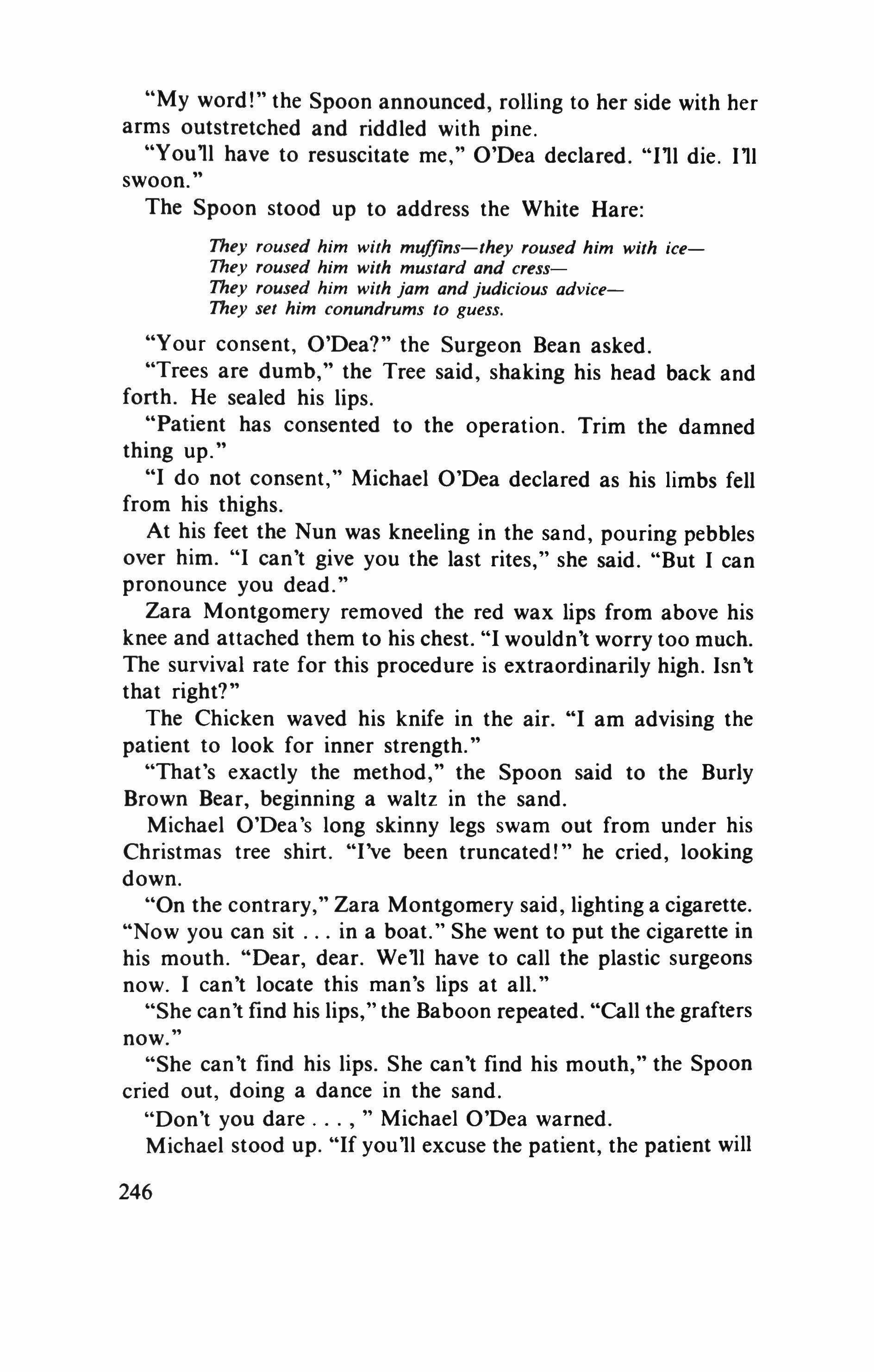
"My word!" the Spoon announced, rolling to her side with her arms outstretched and riddled with pine.
"You'll have to resuscitate me," O'Dea declared. "111 die. 111 swoon."
The Spoon stood up to address the White Hare: They roused him with muffins-they roused him with iceThey roused him with mustard and cressThey roused him with jam and judicious adviceThey set him conundrums to guess.
"Your consent, O'Dea?" the Surgeon Bean asked.
"Trees are dumb," the Tree said, shaking his head back and forth. He sealed his lips.
"Patient has consented to the operation. Trim the damned thing up."
"I do not consent," Michael O'Dea declared as his limbs fell from his thighs.
At his feet the Nun was kneeling in the sand, pouring pebbles over him. "I can't give you the last rites," she said. "But I can pronounce you dead."
Zara Montgomery removed the red wax lips from above his knee and attached them to his chest. "I wouldn't worry too much. The survival rate for this procedure is extraordinarily high. Isn't that right?"
The Chicken waved his knife in the air. "I am advising the patient to look for inner strength."
"That's exactly the method," the Spoon said to the Burly Brown Bear, beginning a waltz in the sand.
Michael O'Dea's long skinny legs swam out from under his Christmas tree shirt. "I've been truncated!" he cried, looking down.
"On the contrary," Zara Montgomery said, lighting a cigarette. "Now you can sit in a boat." She went to put the cigarette in his mouth. "Dear, dear. We'll have to call the plastic surgeons now. 1 can't locate this man's lips at all."
"She can't find his lips," the Baboon repeated. "Call the grafters now."
"She can't find his lips. She can't find his mouth," the Spoon cried out, doing a dance in the sand.
"Don't you dare Michael O'Dea warned. Michael stood up. "If you'll excuse the patient, the patient will 246

take a leak." The applause went up as he stepped into the row of scrub pines by the ridge, and then they heard him curse. One branch, two, an explosion of trinkets flew into the air.
"What's he doing?" they cried. "Shedding the rest of his skin?"
"O'Dea," the Chicken called out. "Is everything all right back there?"
They heard him swearing again, and the globe went flying, too.
"I know what it is," the Pirate shouted. "Ever try to pee without using your hands?"
"Shhh," someone insisted. "Be quiet now."
It was then that they heard it: the sound of water against a rock.
"Crescendo!" they cried. "A success!"
They had just scattered up and down the strand, choosing their boats when Michael O'Dea strode toward them out of the bushes, stark naked and proud in his tan. Slowly their amusement turned to laughter as he passed by each one, for there flying from his backside was the red, white, and blue of the upturned flag.
The wedding reception was all out of order now. Not that there had been much order to the dancing anyway. The reception had fallen to its own protocol: the father of the bride had been carried off after three dances for refusing to relinquish his daughter to her guests; young people had filched whole bottles of champagne from the banquet table and were lounging on white blankets around the east lawn. Under a tree near the ensemble, caterers clustered in red coats and exploded unpredictably into song; and on the grassy incline behind the Montgomery house the groom held children, each by a wrist and foot, and twirled them round and round.
From the corner of the summerhouse, Mrs. McGehry noticed this: Michael O'Dea's black tuxedo spinning on the grass, the stiff pastel petticoats whirling against the bushes like the wings of hummingbirds. "Finally we've spied the groom," she said to her friend from next door, Mabel Willoughby. "Now where's the bride? Where is that Zara Montgomery?"
Zara had spoken with Ed Anderson only once before this dance. She had watched his hair, soft and white from the sun, fluttering around his temples as they talked, watched him reach 247
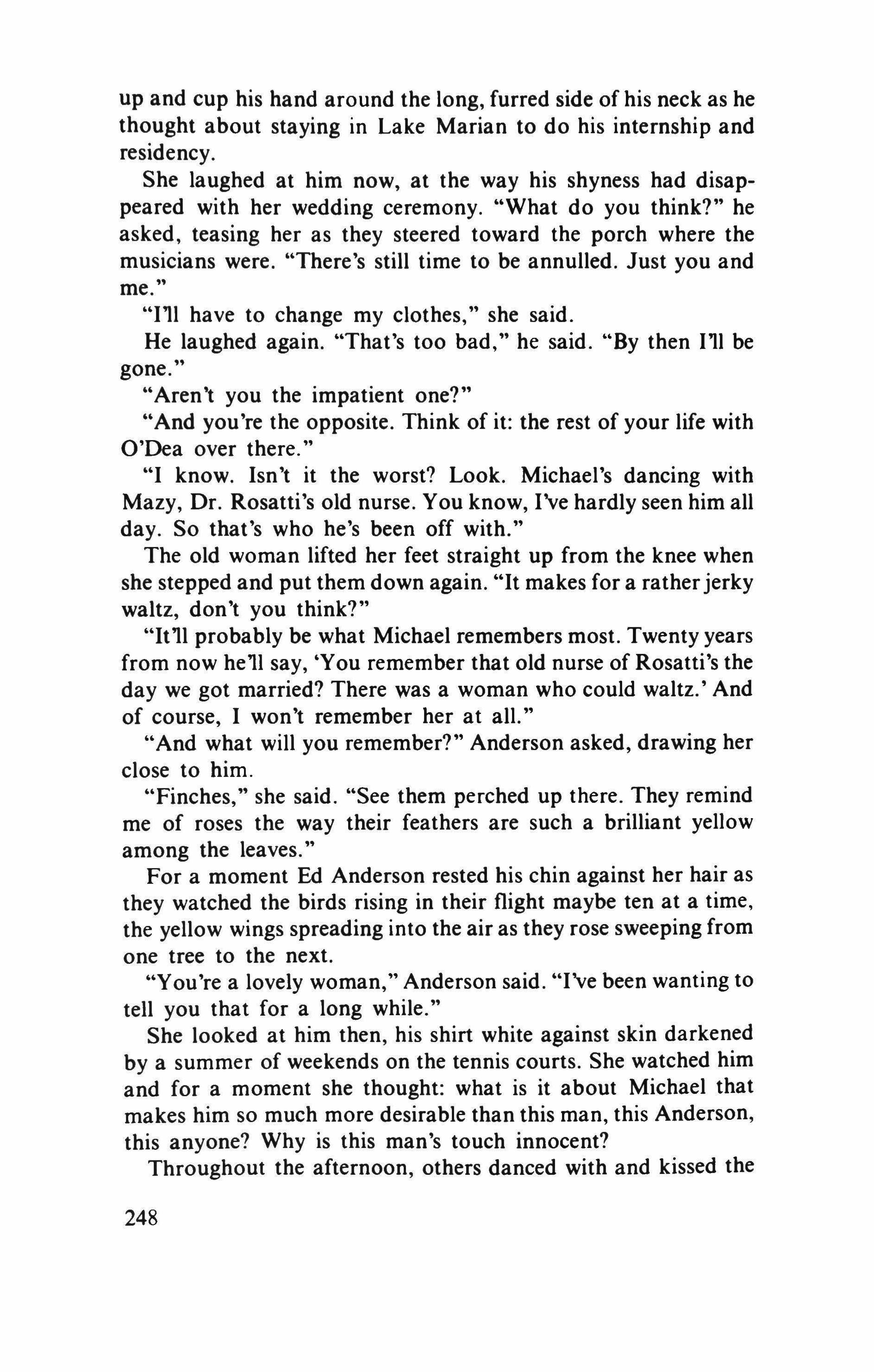
up and cup his hand around the long, furred side of his neck as he thought about staying in Lake Marian to do his internship and residency.
She laughed at him now, at the way his shyness had disappeared with her wedding ceremony. "What do you think?" he asked, teasing her as they steered toward the porch where the musicians were. "There's still time to be annulled. Just you and me."
"I'll have to change my clothes," she said. He laughed again. "That's too bad," he said. "By then I'll be gone. "
"Aren't you the impatient one?"
"And you're the opposite. Think of it: the rest of your life with O'Dea over there."
"I know. Isn't it the worst? Look. Michael's dancing with Mazy, Dr. Rosatti's old nurse. You know, I've hardly seen him all day. So that's who he's been off with."
The old woman lifted her feet straight up from the knee when she stepped and put them down again. "It makes for a ratherjerky waltz, don't you think?"
"It'll probably be what Michael remembers most. Twenty years from now he'll say, 'You remember that old nurse of Rosatti's the day we got married? There was a woman who could waltz.' And of course, I won't remember her at all."
"And what will you remember?" Anderson asked, drawing her close to him.
"Finches," she said. "See them perched up there. They remind me of roses the way their feathers are such a brilliant yellow among the leaves."
For a moment Ed Anderson rested his chin against her hair as they watched the birds rising in their flight maybe ten at a time, the yellow wings spreading into the air as they rose sweeping from one tree to the next.
"You're a lovely woman," Anderson said. "I've been wanting to tell you that for a long while."
She looked at him then, his shirt white against skin darkened by a summer of weekends on the tennis courts. She watched him and for a moment she thought: what is it about Michael that makes him so much more desirable than this man, this Anderson, this anyone? Why is this man's touch innocent?
Throughout the afternoon, others danced with and kissed the 248
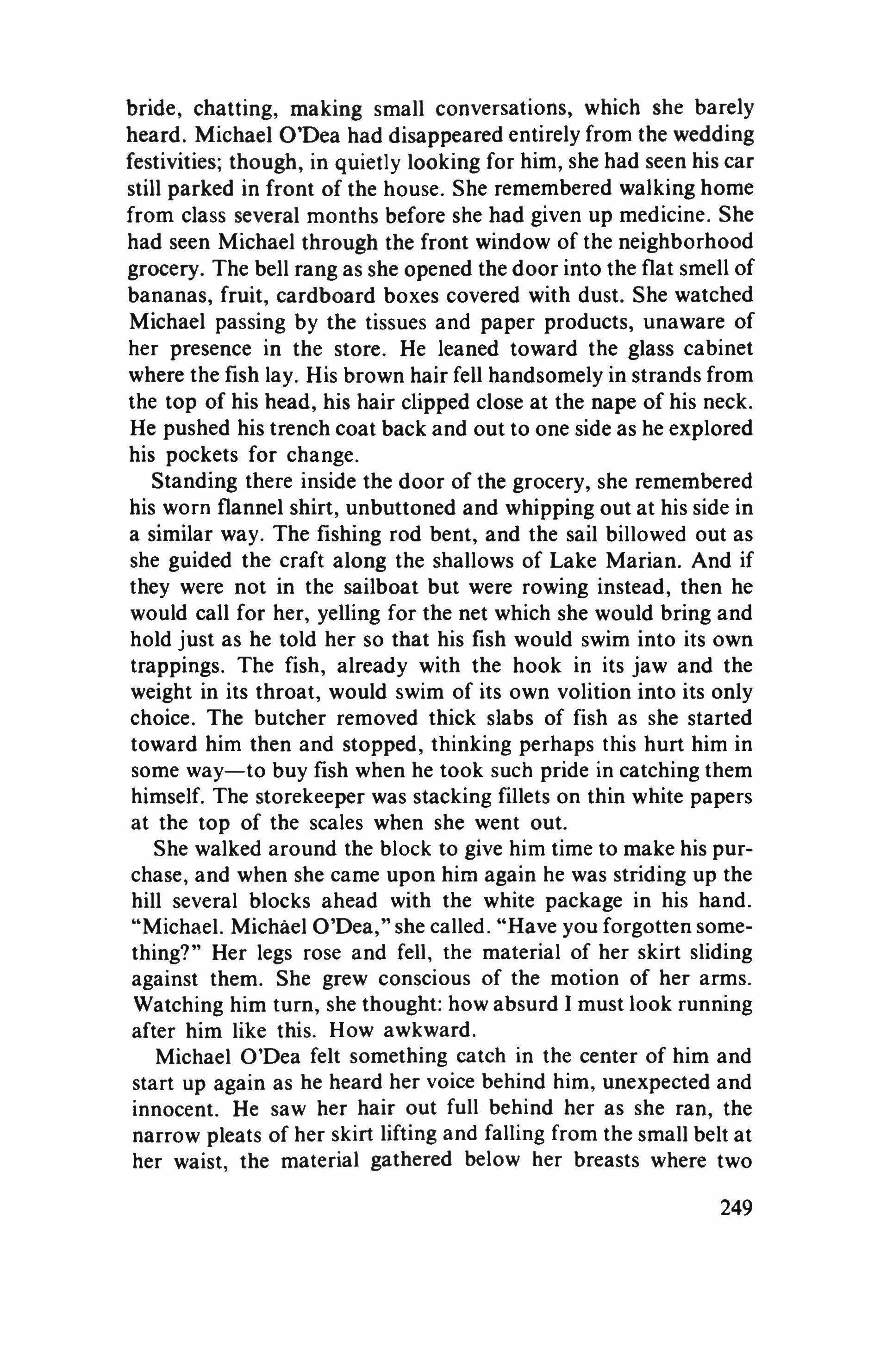
bride, chatting, making small conversations, which she barely heard. Michael O'Dea had disappeared entirely from the wedding festivities; though, in quietly looking for him, she had seen his car still parked in front of the house. She remembered walking home from class several months before she had given up medicine. She had seen Michael through the front window of the neighborhood grocery. The bell rang as she opened the door into the flat smell of bananas, fruit, cardboard boxes covered with dust. She watched Michael passing by the tissues and paper products, unaware of her presence in the store. He leaned toward the glass cabinet where the fish lay. His brown hair fell handsomely in strands from the top of his head, his hair clipped close at the nape of his neck. He pushed his trench coat back and out to one side as he explored his pockets for change.
Standing there inside the door of the grocery, she remembered his worn flannel shirt, unbuttoned and whipping out at his side in a similar way. The fishing rod bent, and the sail billowed out as she guided the craft along the shallows of Lake Marian. And if they were not in the sailboat but were rowing instead, then he would call for her, yelling for the net which she would bring and hold just as he told her so that his fish would swim into its own trappings. The fish, already with the hook in its jaw and the weight in its throat, would swim of its own volition into its only choice. The butcher removed thick slabs of fish as she started toward him then and stopped, thinking perhaps this hurt him in some way-to buy fish when he took such pride in catching them himself. The storekeeper was stacking fillets on thin white papers at the top of the scales when she went out.
She walked around the block to give him time to make his purchase, and when she came upon him again he was striding up the hill several blocks ahead with the white package in his hand
Michael. Michael 0'Dea, she called Have you forgotten something?" Her legs rose and fell, the material of her skirt sliding against them. She grew conscious of the motion of her arms. Watching him turn, she thought: how absurd I must look running after him like this. How awkward.
Michael O'Dea felt something catch in the center of him and start up again as he heard her voice behind him, unexpected and innocent. He saw her hair out full behind her as she ran, the narrow pleats of her skirt lifting and falling from the small belt at her waist, the material gathered below her breasts where two
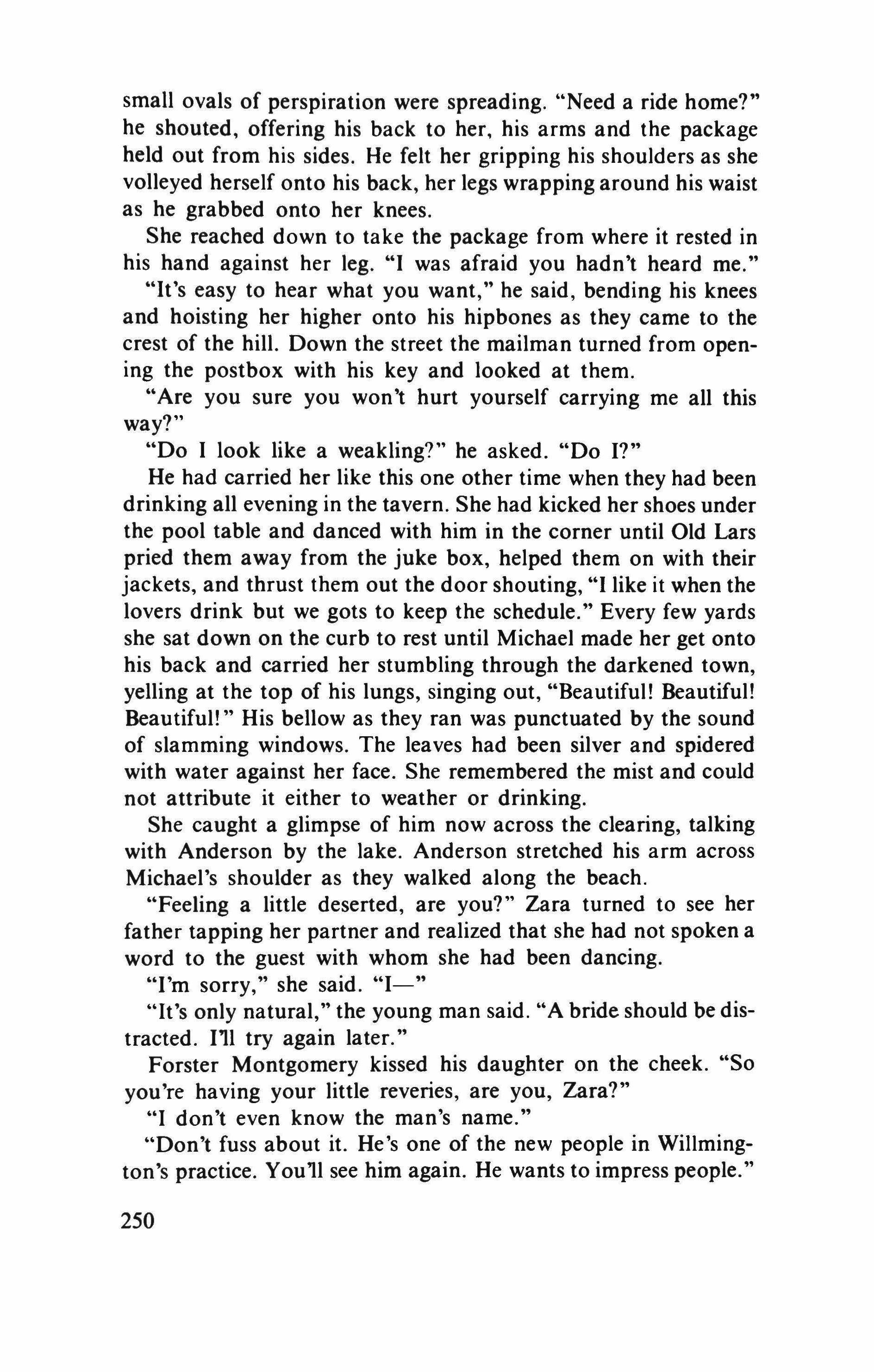
small ovals of perspiration were spreading. "Need a ride home?" he shouted, offering his back to her, his arms and the package held out from his sides. He felt her gripping his shoulders as she volleyed herself onto his back, her legs wrapping around his waist as he grabbed onto her knees.
She reached down to take the package from where it rested in his hand against her leg. "I was afraid you hadn't heard me."
"It's easy to hear what you want," he said, bending his knees and hoisting her higher onto his hipbones as they came to the crest of the hill. Down the street the mailman turned from opening the postbox with his key and looked at them.
"Are you sure you won't hurt yourself carrying me all this way?"
"Do I look like a weakling?" he asked. "Do I?"
He had carried her like this one other time when they had been drinking all evening in the tavern. She had kicked her shoes under the pool table and danced with him in the corner until Old Lars pried them away from the juke box, helped them on with their jackets, and thrust them out the door shouting, "I like it when the lovers drink but we gots to keep the schedule." Every few yards she sat down on the curb to rest until Michael made her get onto his back and carried her stumbling through the darkened town, yelling at the top of his lungs, singing out, "Beautiful! Beautiful! Beautiful!" His bellow as they ran was punctuated by the sound of slamming windows. The leaves had been silver and spidered with water against her face. She remembered the mist and could not attribute it either to weather or drinking.
She caught a glimpse of him now across the clearing, talking with Anderson by the lake. Anderson stretched his arm across Michael's shoulder as they walked along the beach.
"Feeling a little deserted, are you?" Zara turned to see her father tapping her partner and realized that she had not spoken a word to the guest with whom she had been dancing.
"I'm sorry," she said. "1-"
"It's only natural," the young man said. "A bride should be distracted. 111 try again later."
Forster Montgomery kissed his daughter on the cheek. "So you're having your little reveries, are you, Zara?"
"I don't even know the man's name."
"Don't fuss about it. He's one of the new people in Willmington's practice. You'll see him again. He wants to impress people."
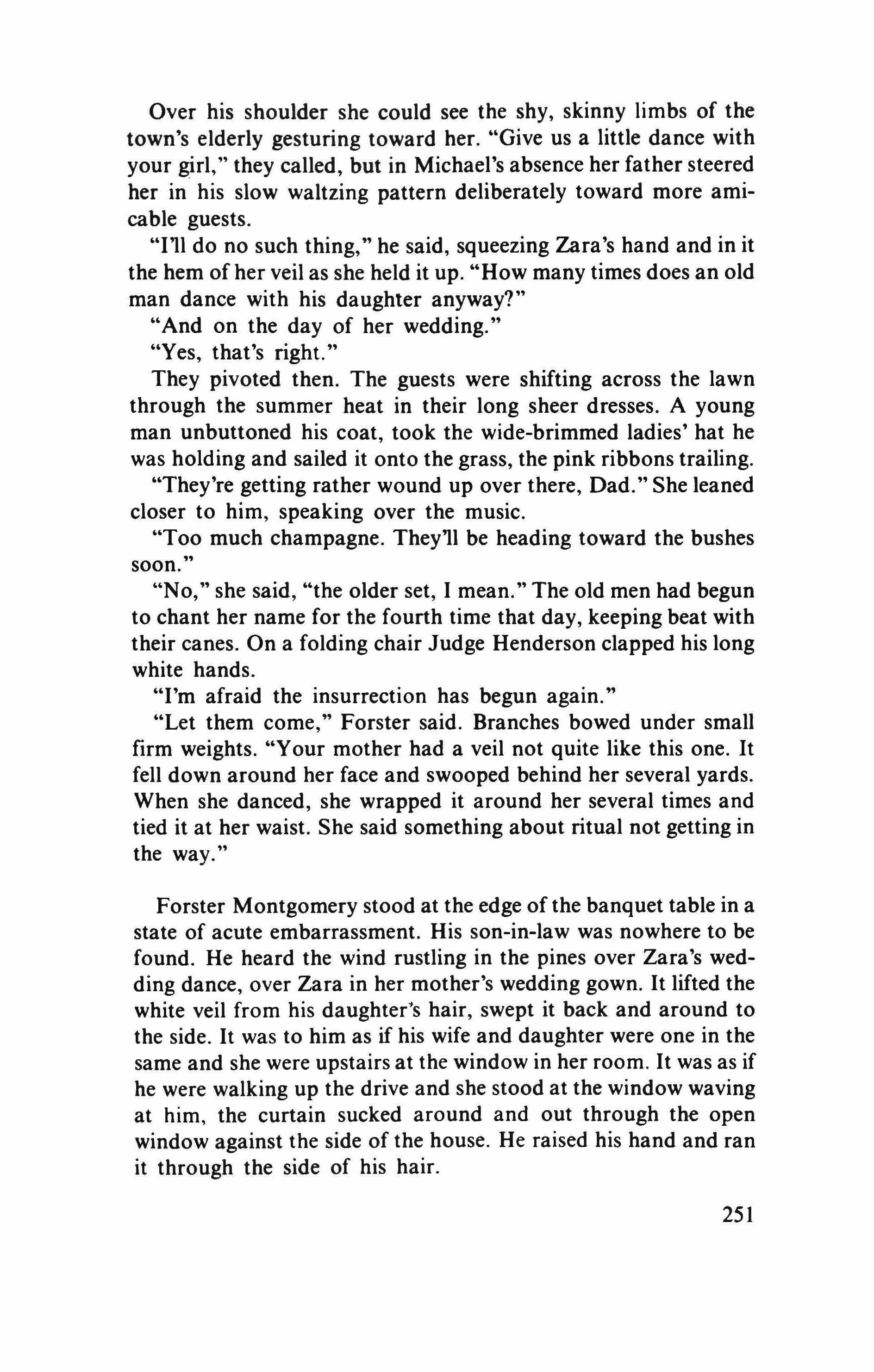
Over his shoulder she could see the shy, skinny limbs of the town's elderly gesturing toward her. "Give us a little dance with your girl," they called, but in Michael's absence her father steered her in his slow waltzing pattern deliberately toward more amicable guests.
"111 do no such thing," he said, squeezing Zara's hand and in it the hem of her veil as she held it up. "How many times does an old man dance with his daughter anyway?"
"And on the day of her wedding."
"Yes, that's right."
They pivoted then. The guests were shifting across the lawn through the summer heat in their long sheer dresses. A young man unbuttoned his coat, took the wide-brimmed ladies' hat he was holding and sailed it onto the grass, the pink ribbons trailing.
"They're getting rather wound up over there, Dad." She leaned closer to him, speaking over the music.
"Too much champagne. They'll be heading toward the bushes soon."
"N0, " she said, "the older set, I mean." The old men had begun to chant her name for the fourth time that day, keeping beat with their canes. On a folding chair Judge Henderson clapped his long white hands.
"I'm afraid the insurrection has begun again."
"Let them come," Forster said. Branches bowed under small firm weights. "Your mother had a veil not quite like this one. It fell down around her face and swooped behind her several yards. When she danced, she wrapped it around her several times and tied it at her waist. She said something about ritual not getting in the way."
Forster Montgomery stood at the edge of the banquet table in a state of acute embarrassment. His son-in-law was nowhere to be found. He heard the wind rustling in the pines over Zara's wedding dance, over Zara in her mother's wedding gown. It lifted the white veil from his daughter'S hair, swept it back and around to the side. It was to him as if his wife and daughter were one in the same and she were upstairs at the window in her room. It was as if he were walking up the drive and she stood at the window waving at him, the curtain sucked around and out through the open window against the side of the house. He raised his hand and ran it through the side of his hair.
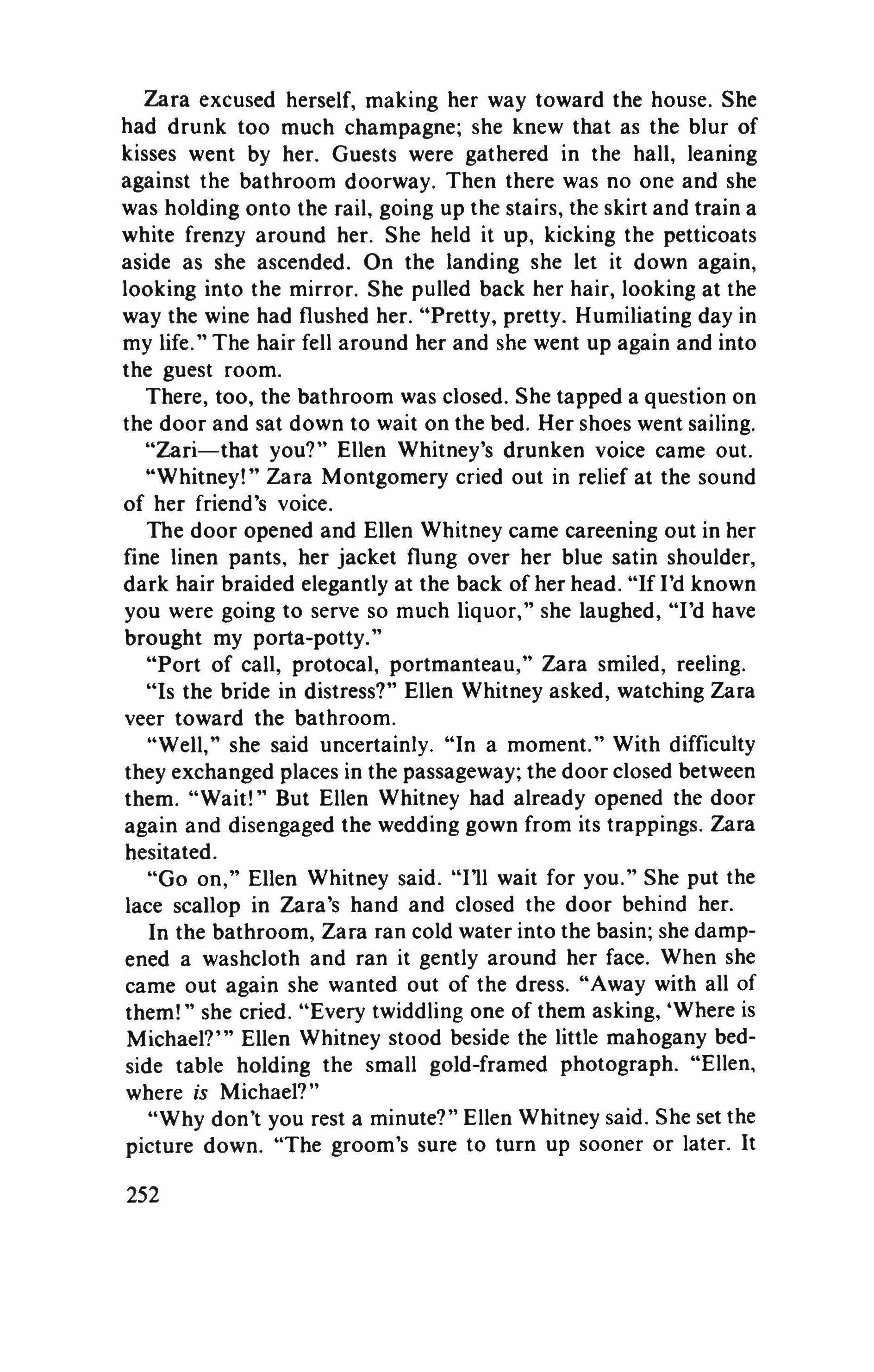
Zara excused herself, making her way toward the house. She had drunk too much champagne; she knew that as the blur of kisses went by her. Guests were gathered in the hall, leaning against the bathroom doorway. Then there was no one and she was holding onto the rail, going up the stairs, the skirt and train a white frenzy around her. She held it up, kicking the petticoats aside as she ascended. On the landing she let it down again, looking into the mirror. She pulled back her hair, looking at the way the wine had flushed her. "Pretty, pretty. Humiliating day in my life." The hair fell around her and she went up again and into the guest room.
There, too, the bathroom was closed. She tapped a question on the door and sat down to wait on the bed. Her shoes went sailing.
"Zari-that you?" Ellen Whitney's drunken voice came out. "Whitney!" Zara Montgomery cried out in relief at the sound of her friend's voice.
The door opened and Ellen Whitney came careening out in her fine linen pants, her jacket flung over her blue satin shoulder, dark hair braided elegantly at the back of her head. "If I'd known you were going to serve so much liquor," she laughed, "I'd have brought my porta-potty."
"Port of call, protocal, portmanteau," Zara smiled, reeling.
"Is the bride in distress?" Ellen Whitney asked, watching Zara veer toward the bathroom.
"Well," she said uncertainly. "In a moment." With difficulty they exchanged places in the passageway; the door closed between them. "Wait!" But Ellen Whitney had already opened the door again and disengaged the wedding gown from its trappings. Zara hesitated.
"Go on," Ellen Whitney said. "I'll wait for you." She put the lace scallop in Zara's hand and closed the door behind her.
In the bathroom, Zara ran cold water into the basin; she dampened a washcloth and ran it gently around her face. When she came out again she wanted out of the dress. "Away with all of them!" she cried. "Every twiddling one of them asking, 'Where is Michael?'" Ellen Whitney stood beside the little mahogany bedside table holding the small gold-framed photograph. "Ellen, where is Michael?"
"Why don't you rest a minute?" Ellen Whitney said. She set the picture down. "The groom's sure to turn up sooner or later. It
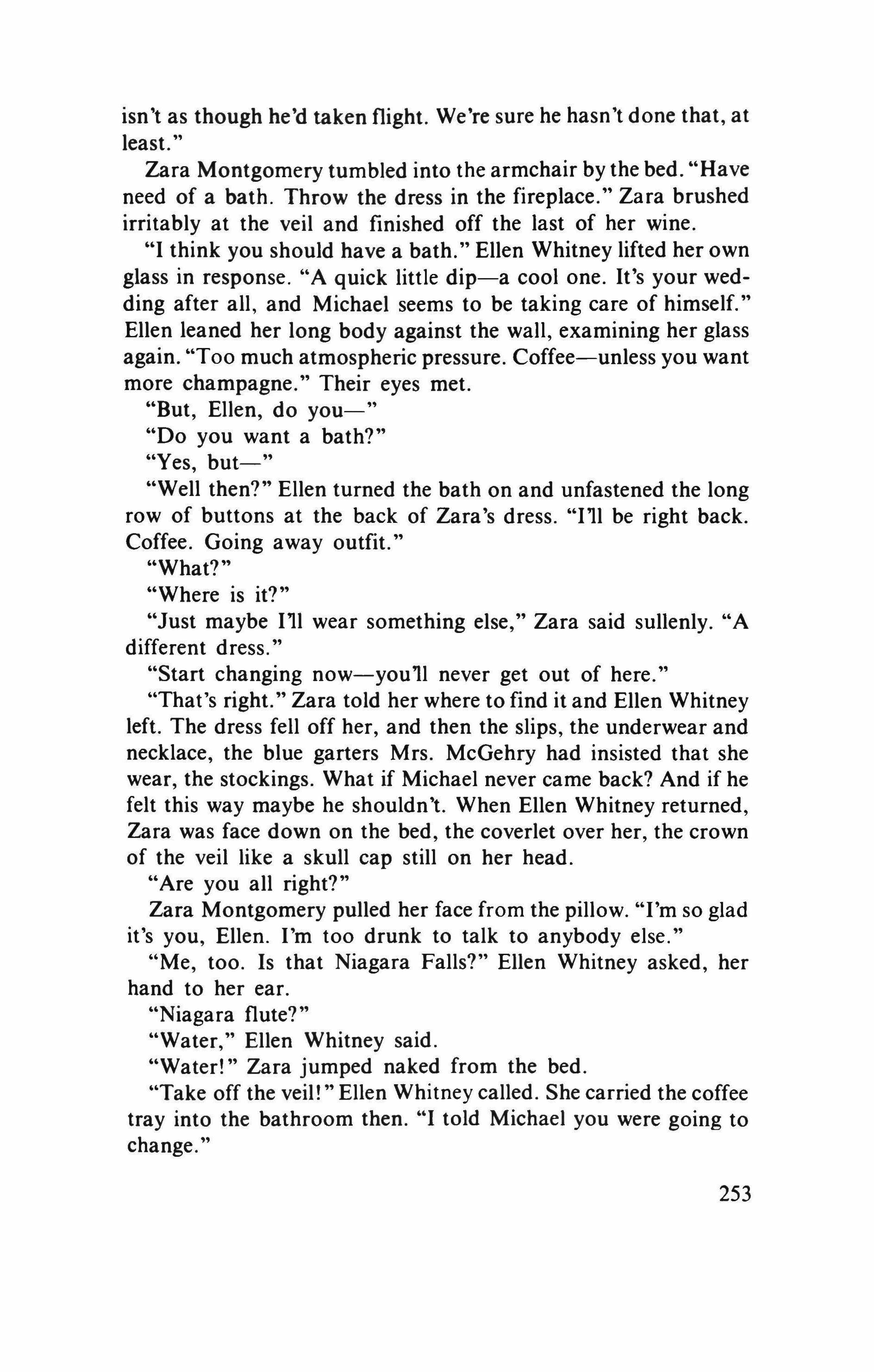
isn't as though he'd taken flight. We're sure he hasn't done that, at least."
Zara Montgomery tumbled into the armchair by the bed. "Have need of a bath. Throw the dress in the fireplace." Zara brushed irritably at the veil and finished off the last of her wine.
"I think you should have a bath." Ellen Whitney lifted her own glass in response. "A quick little dip-a cool one. It's your wedding after all, and Michael seems to be taking care of himself." Ellen leaned her long body against the wall, examining her glass again. "Too much atmospheric pressure. Coffee-unless you want more champagne." Their eyes met.
"But, Ellen, do you-"
"Do you want a bath?"
"Yes, but-to
"Well then?" Ellen turned the bath on and unfastened the long row of buttons at the back of Zara's dress. "Ill be right back. Coffee. Going away outfit."
"What?"
"Where is it?"
"Just maybe III wear something else," Zara said sullenly. "A different dress."
"Start changing now=-you'll never get out of here."
"That's right." Zara told her where to find it and Ellen Whitney left. The dress fell off her, and then the slips, the underwear and necklace, the blue garters Mrs. McGehry had insisted that she wear, the stockings. What if Michael never came back? And if he felt this way maybe he shouldn't. When Ellen Whitney returned, Zara was face down on the bed, the coverlet over her, the crown of the veil like a skull cap still on her head.
"Are you all right?"
Zara Montgomery pulled her face from the pillow. "I'm so glad it's you, Ellen. I'm too drunk to talk to anybody else."
"Me, too. Is that Niagara Falls?" Ellen Whitney asked, her hand to her ear.
"Niagara flute?"
"Water," Ellen Whitney said.
"Water!" Zara jumped naked from the bed.
"Take off the veil!" Ellen Whitney called. She carried the coffee tray into the bathroom then. "I told Michael you were going to change."
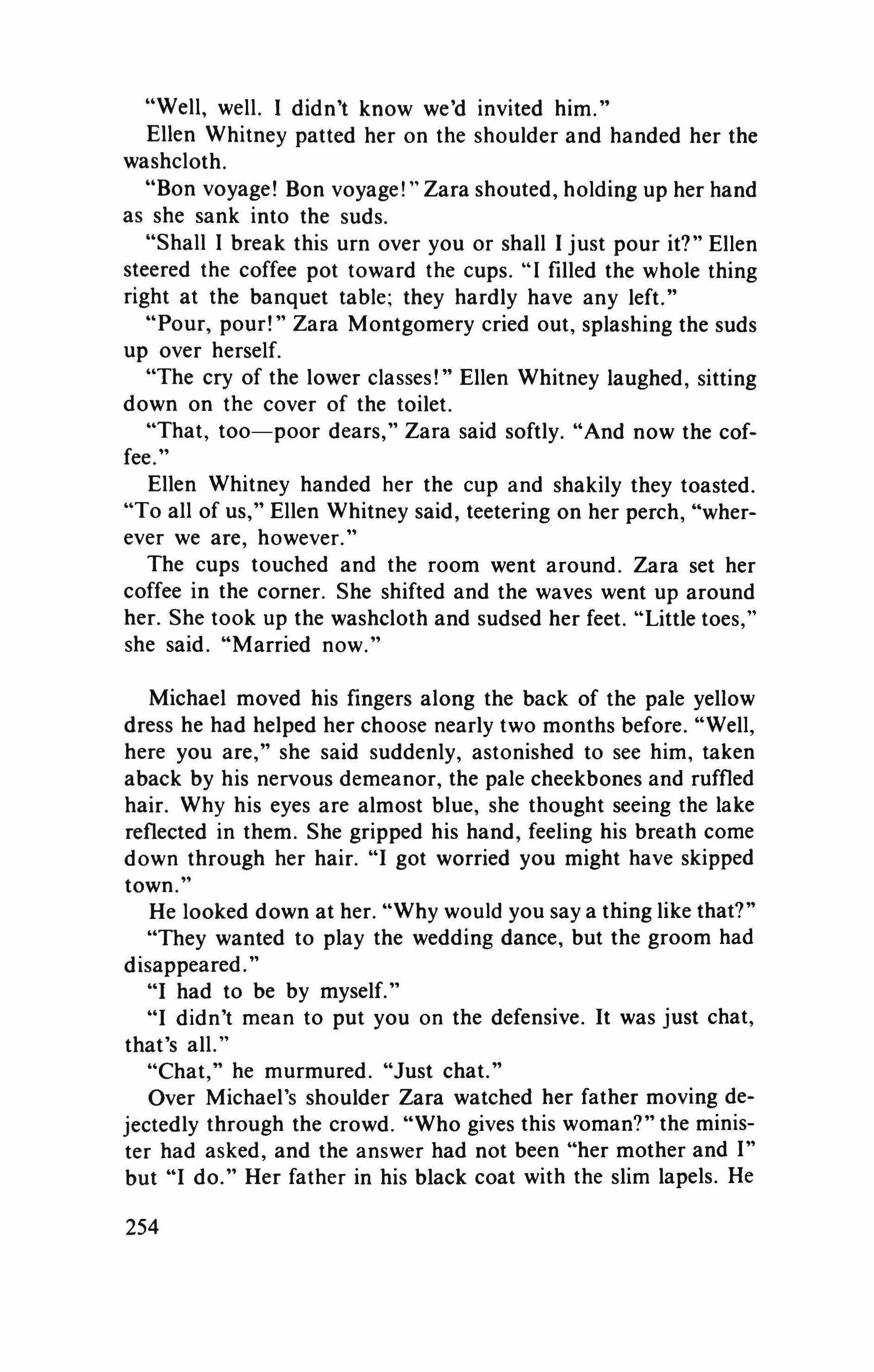
"Well, well. I didn't know we'd invited him."
Ellen Whitney patted her on the shoulder and handed her the washcloth.
"Bon voyage! Bon voyage!" Zara shouted, holding up her hand as she sank into the suds.
"Shall I break this urn over you or shall I just pour it?" Ellen steered the coffee pot toward the cups. "I filled the whole thing right at the banquet table; they hardly have any left."
"Pour, pour!" Zara Montgomery cried out, splashing the suds up over herself.
"The cry of the lower classes!" Ellen Whitney laughed, sitting down on the cover of the toilet.
"That, too-poor dears," Zara said softly. "And now the coffee. "
Ellen Whitney handed her the cup and shakily they toasted. "To all of us," Ellen Whitney said, teetering on her perch, "wherever we are, however."
The cups touched and the room went around. Zara set her coffee in the corner. She shifted and the waves went up around her. She took up the washcloth and sudsed her feet. "Little toes," she said. "Married now."
Michael moved his fingers along the back of the pale yellow dress he had helped her choose nearly two months before. "Well, here you are," she said suddenly, astonished to see him, taken aback by his nervous demeanor, the pale cheekbones and ruffled hair. Why his eyes are almost blue, she thought seeing the lake reflected in them. She gripped his hand, feeling his breath come down through her hair. "I got worried you might have skipped town.
He looked down at her. "Why would you say a thing like that?"
"They wanted to play the wedding dance, but the groom had disappeared.
"I had to be by myself."
"I didn't mean to put you on the defensive. It was just chat, that's all."
"Chat," he murmured. "Just chat."
Over Michael's shoulder Zara watched her father moving dejectedly through the crowd. "Who gives this woman?" the minister had asked, and the answer had not been "her mother and I" but "I do." Her father in his black coat with the slim lapels. He

lifted his hand and waved to her. She saw his lips moving but the crowd closed around him again. Zara's hand settled onto Michael's coat as they danced. "Are you having a good time?" she asked.
"Yes. Are you?"
"People seem to be having a good time. Did you see the old men badgering Father?"
"Here. This is for your crowd." He kissed her abruptly then and heard the hoot go up among them. He felt his shoulders broaden under the eyes of the guests. "You're beautiful," he said, holding her slightly away from him while they waltzed. Zara turned her face up toward his, but he was paying no attention now.
'It is this. it is this-" We have had that before, The Bellman indignantly said.
And the Baker replied. 'Let me say it once more. It is this. it is this that I dread.•
The Chicken with the Rabbit, the Pirate and the Runcible Spoon, the Pear with King Kong, the Poet and the Green String Bean: they were all waltzing now to the chant of the Spoon:
I engage with the Snark-every night after darkIn a dreamy. deliriousfight;>
And I serve it with greens in those shadowy scenes. And I use it for striking a light:
But if ever I meet with a Boojum, that day. In a moment (of this I am sure).
I shall softly and suddenly vanish awayAnd the notion I cannot endure.
"N0, Michael." She touched his arm sympathetically. "You're the beautiful one." He felt as ifin desperation she had wrung herself against him then. He detached her fingers from his hands. Away, he turned. Away from her, him, them. He would not continue it. Through the crowds he pressed, rushing past their fallen smiles. The music had stopped as one by one they nudged each other. The violinist's bow hung between music stand and instrument. He had come to the back ofthe house now, the walk running like a decision between back door and drive. He turned toward where she stood white-lipped among the silent others. Her eyes shown like two milky saucers in her head.
To advance, retreat. To retreat, advance. He had lost his life and found it at once. Back and forth, here and there, he sped on the little walk among the walnut trees. Away! He beat his infant fists against his impressionable head.
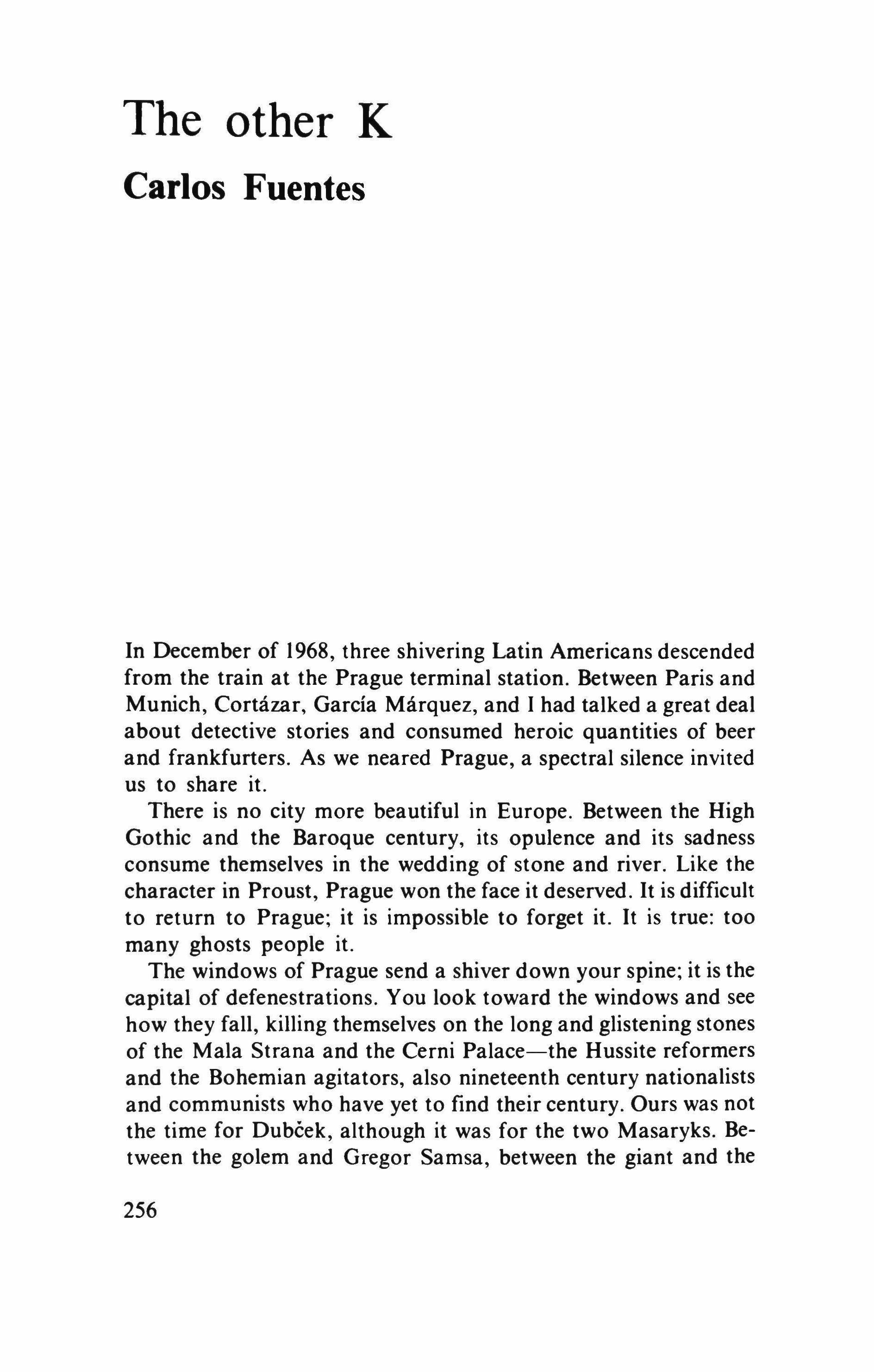
In December of 1968, three shivering Latin Americans descended from the train at the Prague terminal station. Between Paris and Munich, Cortazar, Garcia Marquez, and I had talked a great deal about detective stories and consumed heroic quantities of beer and frankfurters. As we neared Prague, a spectral silence invited us to share it.
There is no city more beautiful in Europe. Between the High Gothic and the Baroque century, its opulence and its sadness consume themselves in the wedding of stone and river. Like the character in Proust, Prague won the face it deserved. It is difficult to return to Prague; it is impossible to forget it. It is true: too many ghosts people it.
The windows of Prague send a shiver down your spine; it is the capital of defenestrations. You look toward the windows and see how they fall, killing themselves on the long and glistening stones of the Mala Strana and the Cerni Palace-the Hussite reformers and the Bohemian agitators, also nineteenth century nationalists and communists who have yet to find their century. Ours was not the time for Dubcek, although it was for the two Masaryks. Between the golem and Gregor Samsa, between the giant and the
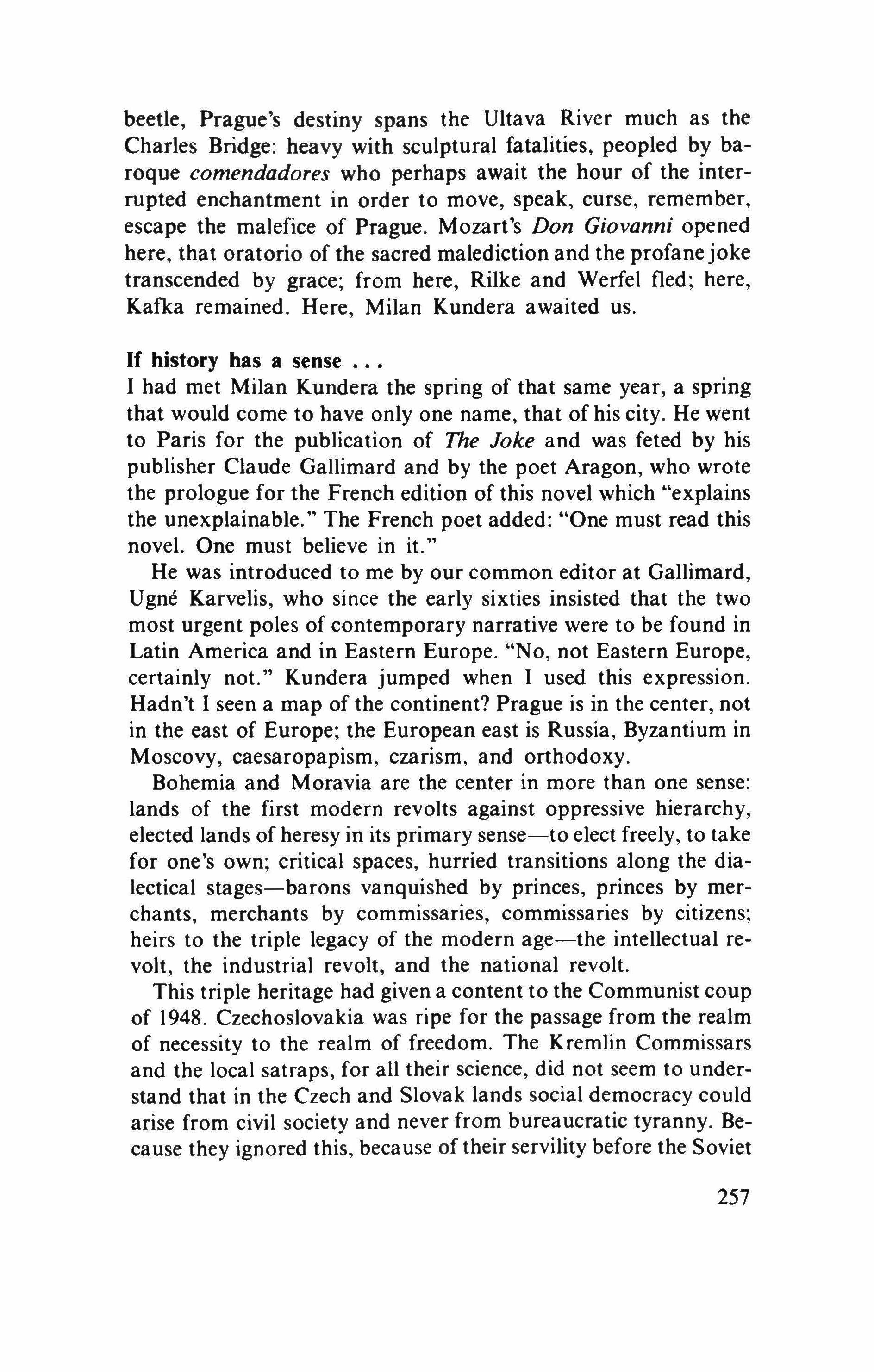
beetle, Prague's destiny spans the Ultava River much as the Charles Bridge: heavy with sculptural fatalities, peopled by baroque comendadores who perhaps await the hour of the interrupted enchantment in order to move, speak, curse, remember, escape the malefice of Prague. Mozart's Don Giovanni opened here, that oratorio of the sacred malediction and the profanejoke transcended by grace; from here, Rilke and Werfel fled; here, Kafka remained. Here, Milan Kundera awaited us.
If history has a sense
I had met Milan Kundera the spring of that same year, a spring that would come to have only one name, that of his city. He went to Paris for the publication of The Joke and was feted by his publisher Claude Gallimard and by the poet Aragon, who wrote the prologue for the French edition of this novel which "explains the unexplainable." The French poet added: "One must read this novel. One must believe in it."
He was introduced to me by our common editor at Gallimard, Ugne Karvelis, who since the early sixties insisted that the two most urgent poles of contemporary narrative were to be found in Latin America and in Eastern Europe. "No, not Eastern Europe, certainly not." Kundera jumped when I used this expression. Hadn't I seen a map of the continent? Prague is in the center, not in the east of Europe; the European east is Russia, Byzantium in Moscovy, caesaropapism, czarism, and orthodoxy.
Bohemia and Moravia are the center in more than one sense: lands of the first modern revolts against oppressive hierarchy, elected lands of heresy in its primary sense-to elect freely, to take for one's own; critical spaces, hurried transitions along the dialectical stages-barons vanquished by princes, princes by merchants, merchants by commissaries, commissaries by citizens; heirs to the triple legacy of the modern age-the intellectual revolt, the industrial revolt, and the national revolt.
This triple heritage had given a content to the Communist coup of 1948. Czechoslovakia was ripe for the passage from the realm of necessity to the realm of freedom. The Kremlin Commissars and the local satraps, for all their science, did not seem to understand that in the Czech and Slovak lands social democracy could arise from civil society and never from bureaucratic tyranny. Because they ignored this, because of their servility before the Soviet

model-already set at a distance by Gramsci when he spoke of the absence of an autonomous society in Russia-the party bureaucrats bound Czechoslovakia, strapped her to Stalinist terror, informers, trials against degraded comrades, the executions of the Communists of tomorrow by the Communists of yesterday. If history has a sense, Dubcek and his Communist companions did nothing but afford it one. As of January 1968, from inside the political and bureaucratic machinery of Czech Communism, these men took the step forward that, ironically, by making effective the substantive promises of Marxist orthodoxy, rendered useless its formal constructions. If it be true (and it was, and it is) that Czech socialism was the product, not of an underdevelopment hungry for accelerated capitalization in exchange for political numbness, but of an economically and politically fulsome capitalist industrial development, then it was true (and it is, and it will be) that the next step was to admit the gradual withering away of the State as the social groups took on their autonomous functions. Socialist society started to occupy the spaces of Communist bureaucracy. Central planning gave way to the initiative of workers' councils, the Prague politburo to the local political organizations. A fundamental decision was made: at all levels of the Party, democracy would express itself through the secret vote. Undoubtedly, it was this last measure that most irritated the Soviet Union. Nothing was more acrimoniously objected to by the Russian officials against Dubcek. In order to fully realize this democratic step, the Czech Communists moved forward the date of their Congress. The country was politically decentralized but democratically united by one extraordinary fact: the appearance of a free press, a press truly representative of the diverse social groups. The press of the agricultural workers, of the industrial workers, of the students, of the scientific investigators, of the intellectuals and artists, of the small shopkeepers, of the newspapermen themselves, of each and everyone of the active components of Czech society. In the socialist democracy of Dubcek and his companions, the initiatives of the national State were commented upon, complemented, criticized, and limited by the information of the social groups; conversely, these groups took initiatives that were commented upon and criticized by the official press. This multiplication of powers and opinions within Communism was
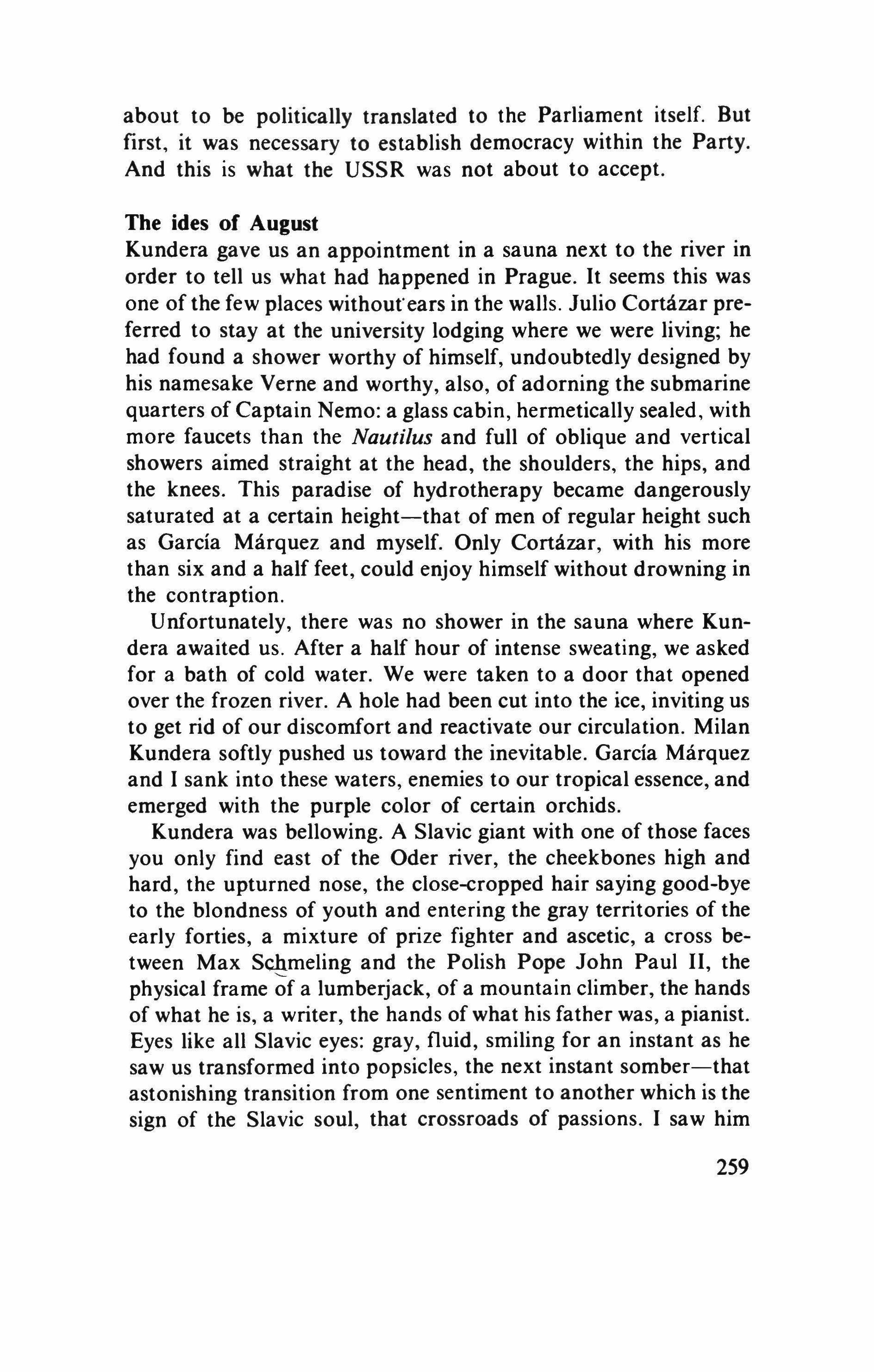
about to be politically translated to the Parliament itself. But first, it was necessary to establish democracy within the Party. And this is what the USSR was not about to accept.
Kundera gave us an appointment in a sauna next to the river in order to tell us what had happened in Prague. It seems this was one of the few places without' ears in the walls. Julio Cortazar preferred to stay at the university lodging where we were living; he had found a shower worthy of himself, undoubtedly designed by his namesake Verne and worthy, also, of adorning the submarine quarters of Captain Nemo: a glass cabin, hermetically sealed, with more faucets than the Nautilus and full of oblique and vertical showers aimed straight at the head, the shoulders, the hips, and the knees. This paradise of hydrotherapy became dangerously saturated at a certain height-that of men of regular height such as Garcia Marquez and myself. Only Cortazar, with his more than six and a half feet, could enjoy himself without drowning in the contraption.
Unfortunately, there was no shower in the sauna where Kundera awaited us. After a half hour of intense sweating, we asked for a bath of cold water. We were taken to a door that opened over the frozen river. A hole had been cut into the ice, inviting us to get rid of our discomfort and reactivate our circulation. Milan Kundera softly pushed us toward the inevitable. Garcia Marquez and I sank into these waters, enemies to our tropical essence, and emerged with the purple color of certain orchids.
Kundera was bellowing. A Slavic giant with one of those faces you only find east of the Oder river, the cheekbones high and hard, the upturned nose, the close-cropped hair saying good-bye to the blondness of youth and entering the gray territories of the early forties, a mixture of prize fighter and ascetic, a cross between Max Schmeling and the Polish Pope John Paul II, the physical frame �f a lumberjack, of a mountain climber, the hands of what he is, a writer, the hands of what his father was, a pianist. Eyes like all Slavic eyes: gray, fluid, smiling for an instant as he saw us transformed into popsicles, the next instant somber-that astonishing transition from one sentiment to another which is the sign of the Slavic soul, that crossroads of passions. I saw him 259

laughing; I imagined him as a legendary figure, an ancient huntsman of the Tatra mountains carrying on his shoulders the furs he ripped off the bears in order to look more like them.
Humor and sadness: Kundera, Prague. Anger and tears. The Russians were loved in Prague; they were the liberators of 1945, the vanquishers of Hitlerian satanism. How was one to understand that now they were here entering Prague on their tanks to crush Communists in the name of Communism, when they should be celebrating the triumph of Czech Communism in the name of socialist internationalism? How to understand it? Anger: a girl offers a bouquet of flowers to a Soviet soldier riding atop his tank; the soldier reaches forward to take the bouquet and kiss the girl; the girl spits at the face of the soldier. Astonishment. Where are we? many Soviet soldiers ask themselves. Why are we received in this way, with spits, with insults, with flaming barricades, if we came to save Communism from an imperialist conspiracy? Where are we? ask the Asian soldiers; they told us we were sent to crush an insurrection in a Soviet republic-where are we? Where? "We who lived all our lives for the future," says Aragon.
Where? There is anger, but there is also humor, as in the eyes of Kundera. Closely watched trains: the trains that enter Czechoslovakia carrying troops from the Soviet Union blow their whistles, ride and ride, go around and end by coming back to the frontier from which they originally parted. The resistance to the invasion organizes itself through underground radios. The Soviet army faces a gigantic joke: the switchmen sidetrack the military trains, the military trucks obey the mistaken signs on the highways, the radios of the Czech resistance cannot be found.
The good soldier Schweik heads the maneuvers against the invader and the invader starts getting nervous. Marshall Gretckho, commander of the forces of the Warsaw Pact, uselessly has the facade of the National Museum in Prague machine-gunned; the citizens of Kafka's homeland called it EI Gretckho's mural. An Asian soldier, who has never seen them before, crashes against the glass partitions of the stores in the underground subway of Venceslas Square and Czechs put up a sign on the broken glass: NOTHING STOPS THE SOVIET SOLDIER. The Russian troops enter Marienbad by night, where a cowboy movie is being shown in an outdoor movie house; they listen to Gary Cooper's shots; they arrive with their machine guns at the ready, and fire against the
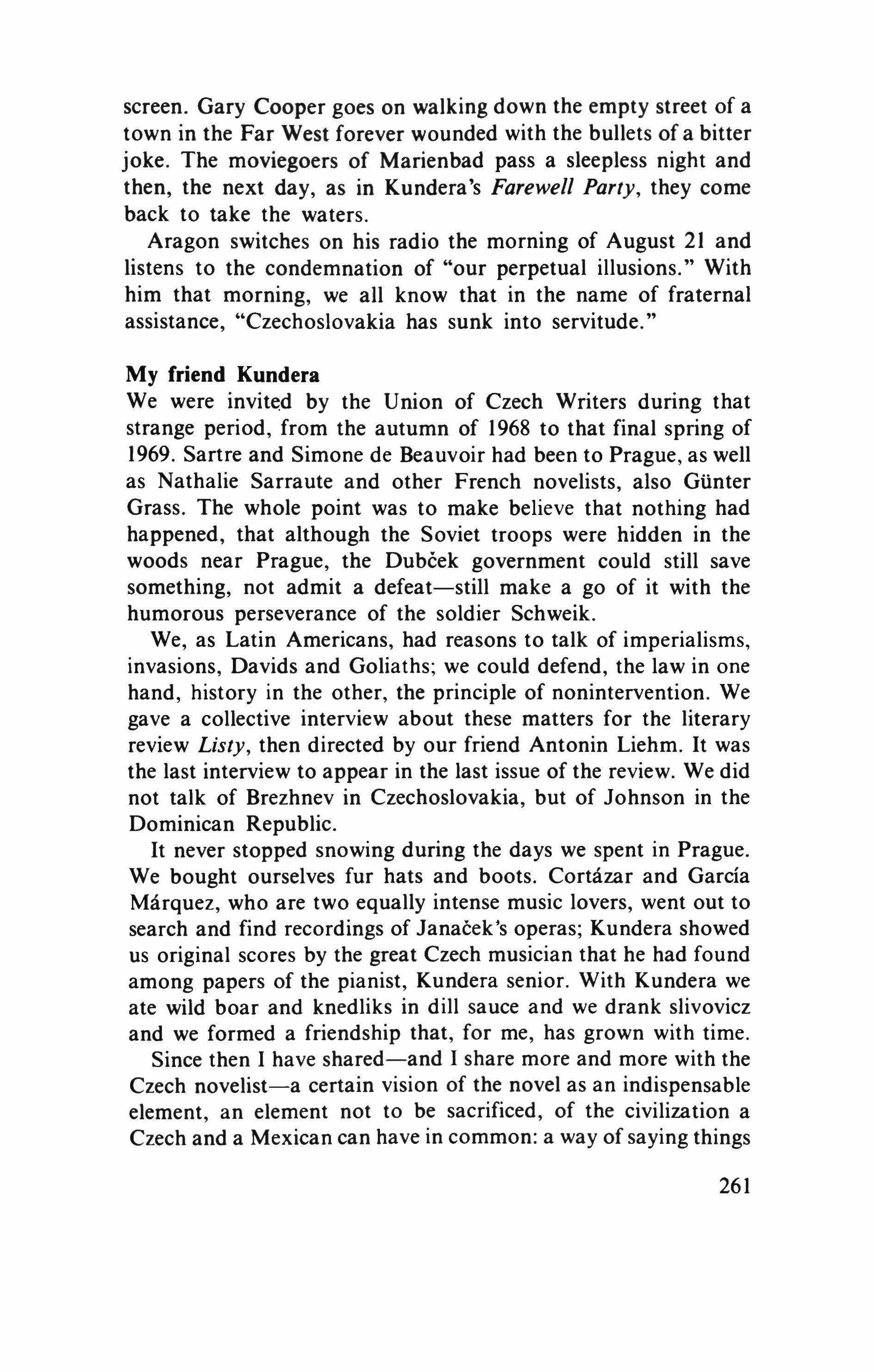
screen. Gary Cooper goes on walking down the empty street of a town in the Far West forever wounded with the bullets of a bitter joke. The moviegoers of Marienbad pass a sleepless night and then, the next day, as in Kundera's Farewell Party, they come back to take the waters.
Aragon switches on his radio the morning of August 21 and listens to the condemnation of "our perpetual illusions." With him that morning, we all know that in the name of fraternal assistance, "Czechoslovakia has sunk into servitude."
We were invited by the Union of Czech Writers during that strange period, from the autumn of 1968 to that final spring of 1969. Sartre and Simone de Beauvoir had been to Prague, as well as Nathalie Sarraute and other French novelists, also GUnter Grass. The whole point was to make believe that nothing had happened, that although the Soviet troops were hidden in the woods near Prague, the Dubcek government could still save something, not admit a defeat-still make a go of it with the humorous perseverance of the soldier Schweik.
We, as Latin Americans, had reasons to talk of imperialisms, invasions, Davids and Goliaths; we could defend, the law in one hand, history in the other, the principle of nonintervention. We gave a collective interview about these matters for the literary review Listy, then directed by our friend Antonin Liehm. It was the last interview to appear in the last issue of the review. We did not talk of Brezhnev in Czechoslovakia, but of Johnson in the Dominican Republic.
It never stopped snowing during the days we spent in Prague. We bought ourselves fur hats and boots. Cortazar and Garcia Marquez, who are two equally intense music lovers, went out to search and find recordings of Janacek's operas; Kundera showed us original scores by the great Czech musician that he had found among papers of the pianist, Kundera senior. With Kundera we ate wild boar and knedliks in dill sauce and we drank slivovicz and we formed a friendship that, for me, has grown with time.
Since then I have shared-and I share more and more with the Czech novelist-a certain vision of the novel as an indispensable element, an element not to be sacrificed, of the civilization a Czech and a Mexican can have in common: a way of saying things

that could not be said any other way. We talked a lot then and later, in Paris, in Nice-when he traveled with his beautiful wife Vera to France and there found a new home because in his "normalized" homeland his novels cannot be published or read. *
One can laugh bitterly. The great literature of a fragile language, ambushed in the heart of Europe, has to be written and published outside its territory. The novel, supposedly in agony, has so much life that it must be murdered. The "exquisite corpse" must be forbidden because, it seems, it is a dangerous corpse. "The novel is as indispensable to man as bread," says Aragon in his prologue to the French edition of The Joke. Why? Because in it one will find the key to what the historian, the conquering mythographer, ignores or dissembles.
"The novel is not menaced by exhaustion," says Kundera, "but by the ideological state of the contemporary world. There is nothing more opposed to the spirit of the novel, which is profoundly linked to the discovery of the relativity of the world, than the totalitarian mentality dedicated to the implantation of an only truth.
Can the man who thus speaks then write, in order to oppose one ideology, novels of the opposite ideology? Borges says of the Koran that it is an Arab book because no camels are ever mentioned in it. Elizabeth Pochoda has noted that the longevity of political oppression in Czechoslovakia is witnessed in the novels of Kundera because it is never mentioned.
The condemnation of totalitarianism doesn't deserve a novel, says Kundera. What he finds interesting is the similarity between totalitarianism and "the immemorial and fascinating dream of a harmonious society where private life and public life form but one unity and all are united around one will and one faith. It is not accidental that the most favored genre in the culminating period of Stalinism was the idyll."
The word has been spoken and no one expected it. The word is a scandal. It is comfortable to protect oneself behind the grotesque definition of art offered by Stalin: "Socialist content and national form." It is very amusing and very bitter (the bitter joke is really a structure of the narrative universe of Kundera) to translate this definition into pragmatic terms, as a Prague critic exIn the winter of 1979 Kundera was deprived of his citizenship by the Prague government. He now resides in Paris, where he teaches at the Sorbonne.
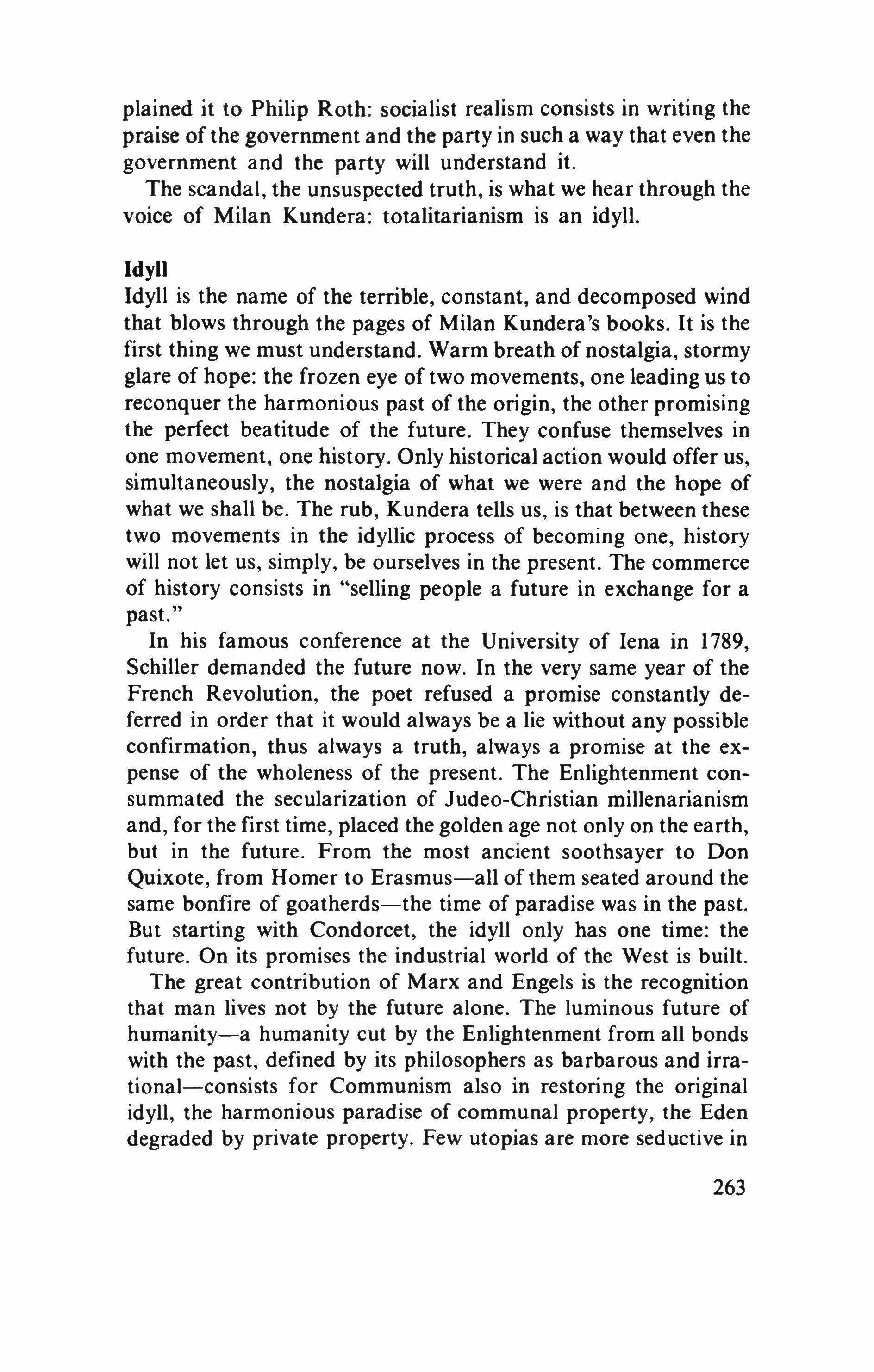
plained it to Philip Roth: socialist realism consists in writing the praise of the government and the party in such a way that even the government and the party will understand it.
The scandal, the unsuspected truth, is what we hear through the voice of Milan Kundera: totalitarianism is an idyll.
Idyll is the name of the terrible, constant, and decomposed wind that blows through the pages of Milan Kundera's books. It is the first thing we must understand. Warm breath of nostalgia, stormy glare of hope: the frozen eye of two movements, one leading us to reconquer the harmonious past of the origin, the other promising the perfect beatitude of the future. They confuse themselves in one movement, one history. Only historical action would offer us, simultaneously, the nostalgia of what we were and the hope of what we shall be. The rub, Kundera tells us, is that between these two movements in the idyllic process of becoming one, history will not let us, simply, be ourselves in the present. The commerce of history consists in "selling people a future in exchange for a past.
In his famous conference at the University of lena in 1789, Schiller demanded the future now. In the very same year of the French Revolution, the poet refused a promise constantly deferred in order that it would always be a lie without any possible confirmation, thus always a truth, always a promise at the expense of the wholeness of the present. The Enlightenment consummated the secularization of Judeo-Christian millenarianism and, for the first time, placed the golden age not only on the earth, but in the future. From the most ancient soothsayer to Don Quixote, from Homer to Erasmus-all of them seated around the same bonfire of goatherds-the time of paradise was in the past. But starting with Condorcet, the idyll only has one time: the future. On its promises the industrial world of the West is built.
The great contribution of Marx and Engels is the recognition that man lives not by the future alone. The luminous future of humanity-a humanity cut by the Enlightenment from all bonds with the past, defined by its philosophers as barbarous and irrational-consists for Communism also in restoring the original idyll, the harmonious paradise of communal property, the Eden degraded by private property. Few utopias are more seductive in 263
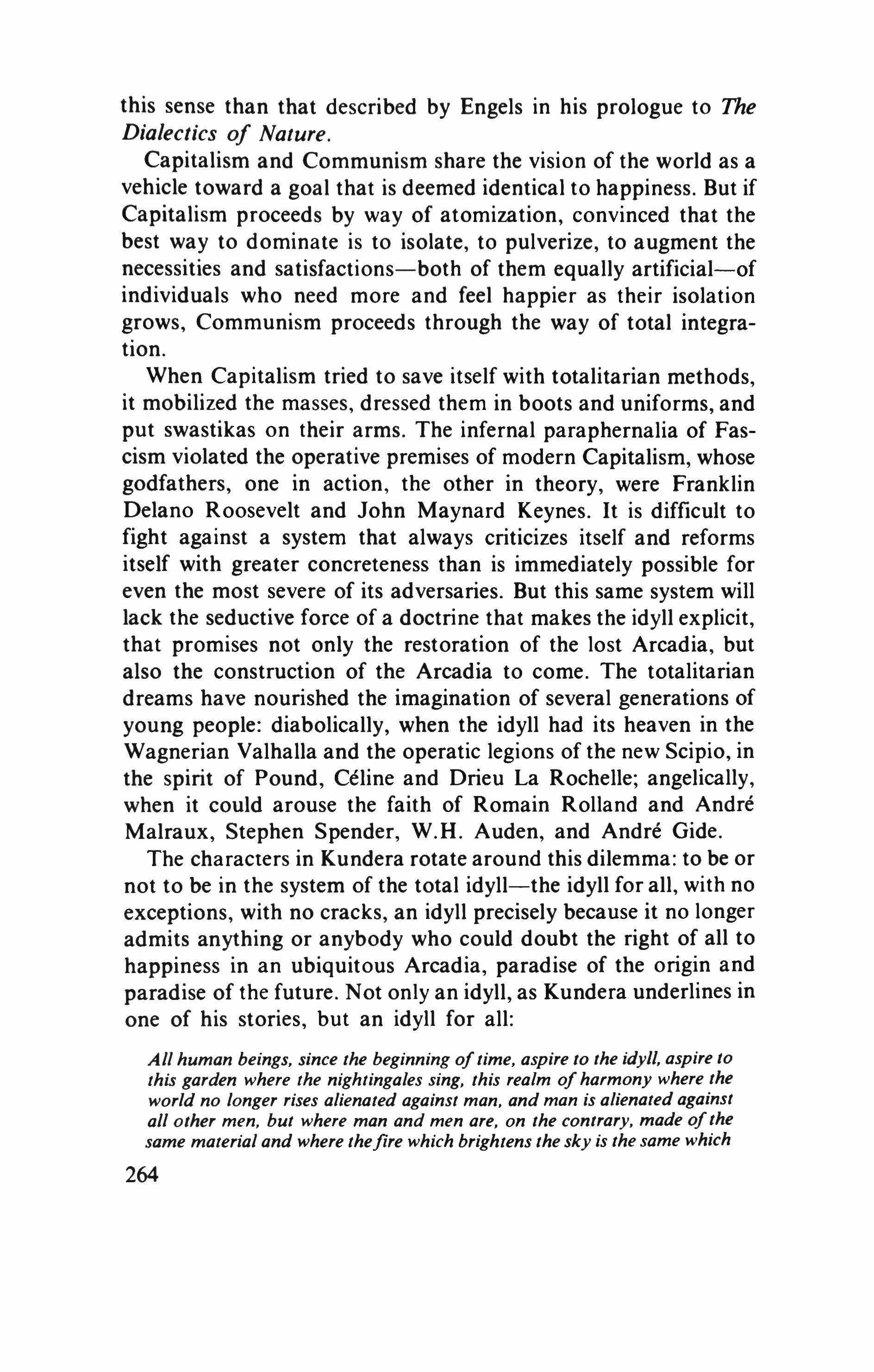
this sense than that described by Engels in his prologue to The Dialectics of Nature.
Capitalism and Communism share the vision of the world as a vehicle toward a goal that is deemed identical to happiness. But if Capitalism proceeds by way of atomization, convinced that the best way to dominate is to isolate, to pulverize, to augment the necessities and satisfactions-both of them equally artificial-of individuals who need more and feel happier as their isolation grows, Communism proceeds through the way of total integration.
When Capitalism tried to save itself with totalitarian methods, it mobilized the masses, dressed them in boots and uniforms, and put swastikas on their arms. The infernal paraphernalia of Fascism violated the operative premises of modern Capitalism, whose godfathers, one in action, the other in theory, were Franklin Delano Roosevelt and John Maynard Keynes. It is difficult to fight against a system that always criticizes itself and reforms itself with greater concreteness than is immediately possible for even the most severe of its adversaries. But this same system will lack the seductive force of a doctrine that makes the idyll explicit, that promises not only the restoration of the lost Arcadia, but also the construction of the Arcadia to come. The totalitarian dreams have nourished the imagination of several generations of young people: diabolically, when the idyll had its heaven in the Wagnerian Valhalla and the operatic legions of the new Scipio, in the spirit of Pound, Celine and Drieu La Rochelle; angelically, when it could arouse the faith of Romain Rolland and Andre Malraux, Stephen Spender, W.H. Auden, and Andre Gide.
The characters in Kundera rotate around this dilemma: to be or not to be in the system of the total idyll-the idyll for all, with no exceptions, with no cracks, an idyll precisely because it no longer admits anything or anybody who could doubt the right of all to happiness in an ubiquitous Arcadia, paradise of the origin and paradise of the future. Not only an idyll, as Kundera underlines in one of his stories, but an idyll for all:
All human beings, since the beginning oftime, aspire to the idyll, aspire to this garden where the nightingales sing, this realm ofharmony where the world no longer rises alienated against man, and man is alienated against all other men, but where man and men are, on the contrary, made ofthe same material and where thefire which brightens the sky is the same which 264
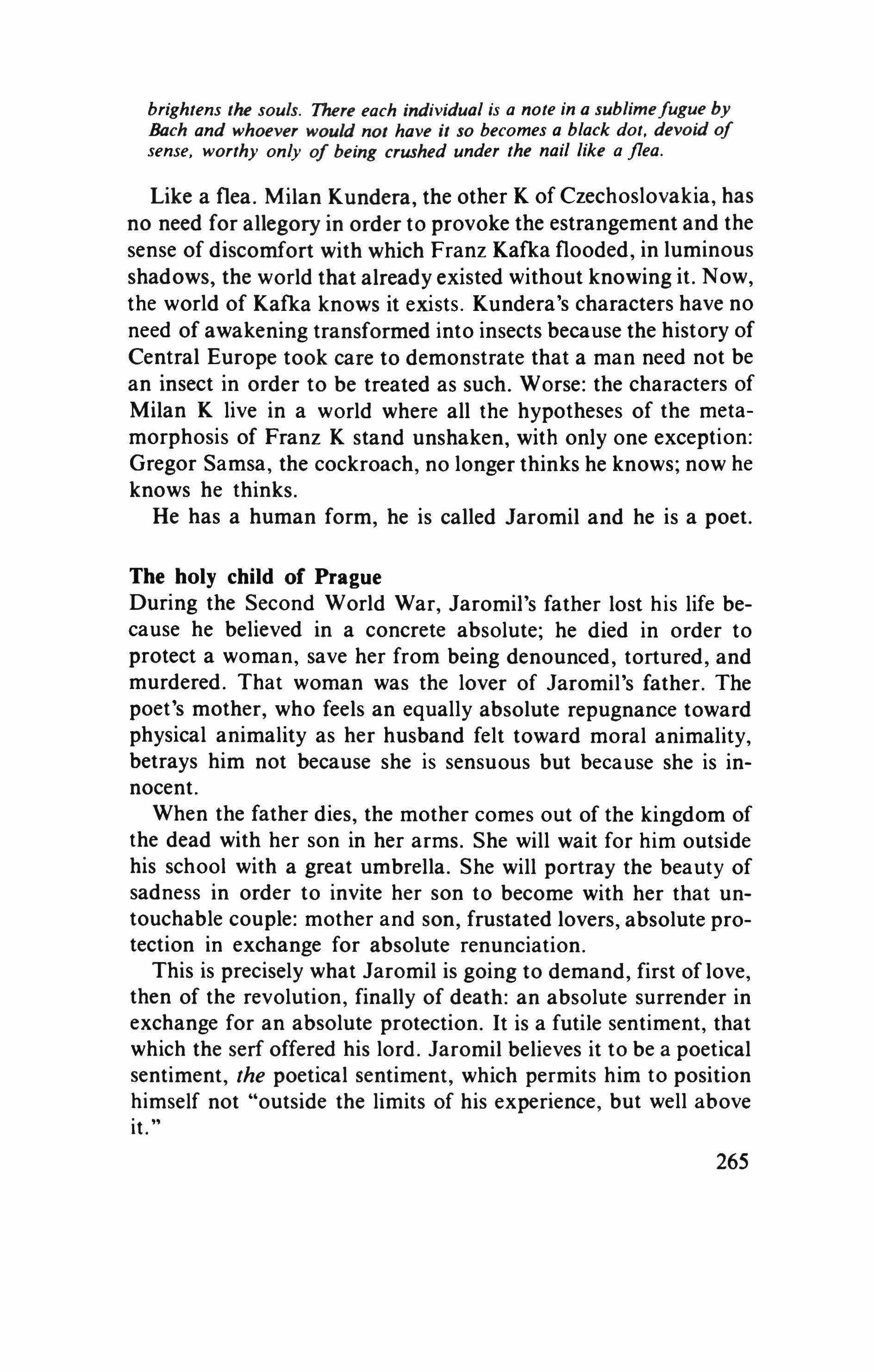
brightens the souls. There each individual is a note in a sublimefugue by Bach and whoever would not have it so becomes a black dot, devoid of sense, worthy only of being crushed under the nail like a flea.
Like a flea. Milan Kundera, the other K of Czechoslovakia, has no need for allegory in order to provoke the estrangement and the sense of discomfort with which Franz Kafka flooded, in luminous shadows, the world that already existed without knowing it. Now, the world of Kafka knows it exists. Kundera's characters have no need of awakening transformed into insects because the history of Central Europe took care to demonstrate that a man need not be an insect in order to be treated as such. Worse: the characters of Milan K live in a world where all the hypotheses of the metamorphosis of Franz K stand unshaken, with only one exception: Gregor Samsa, the cockroach, no longer thinks he knows; now he knows he thinks.
He has a human form, he is called Jaromil and he is a poet.
During the Second World War, Jaromil's father lost his life because he believed in a concrete absolute; he died in order to protect a woman, save her from being denounced, tortured, and murdered. That woman was the lover of Jaromil's father. The poet's mother, who feels an equally absolute repugnance toward physical animality as her husband felt toward moral animality, betrays him not because she is sensuous but because she is innocent.
When the father dies, the mother comes out of the kingdom of the dead with her son in her arms. She will wait for him outside his school with a great umbrella. She will portray the beauty of sadness in order to invite her son to become with her that untouchable couple: mother and son, frustated lovers, absolute protection in exchange for absolute renunciation.
This is precisely what Jaromil is going to demand, first of love, then of the revolution, finally of death: an absolute surrender in exchange for an absolute protection. It is a futile sentiment, that which the serf offered his lord. Jaromil believes it to be a poetical sentiment, the poetical sentiment, which permits him to position himself not "outside the limits of his experience, but well above it.
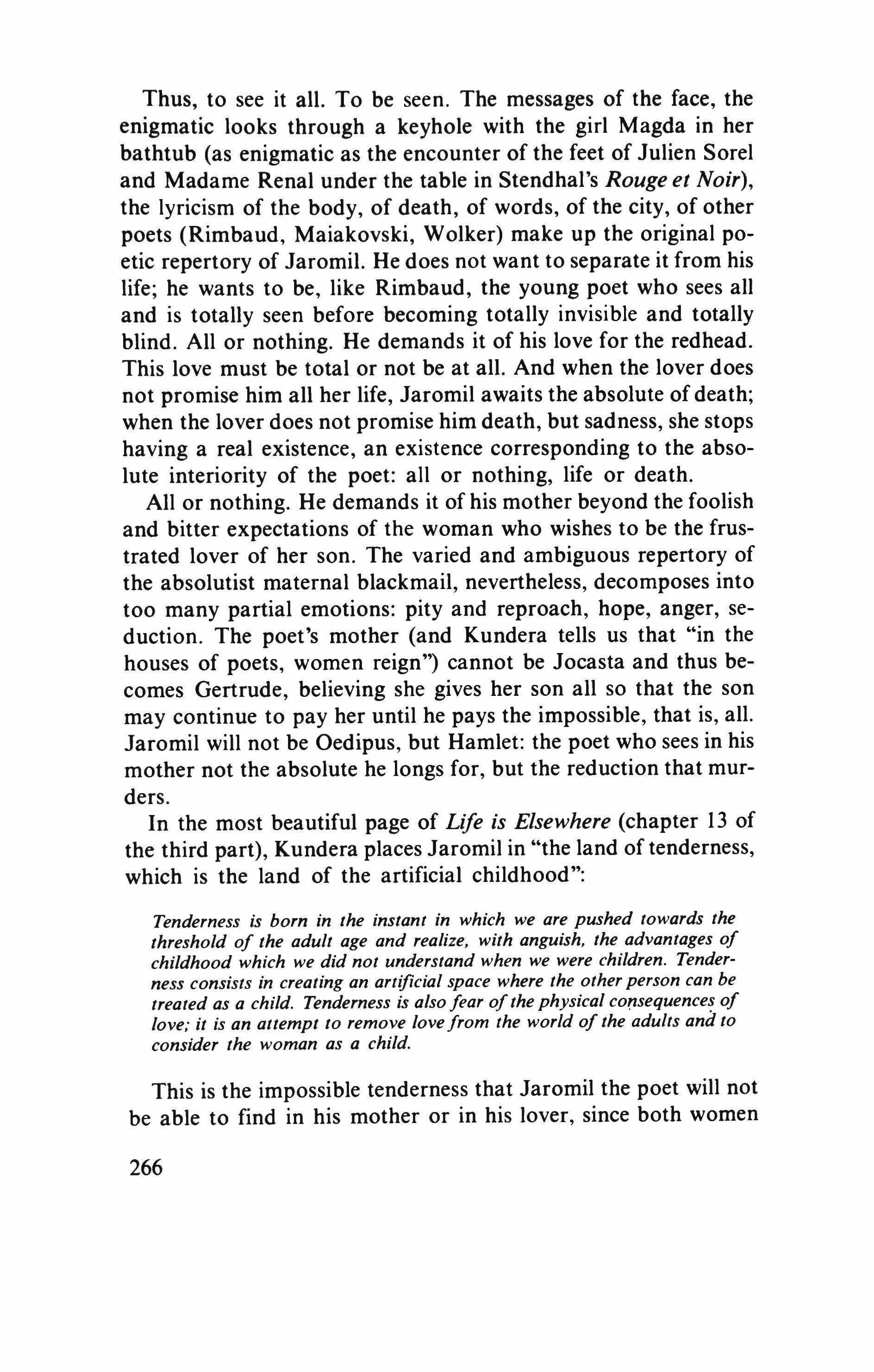
Thus, to see it all. To be seen. The messages of the face, the enigmatic looks through a keyhole with the girl Magda in her bathtub (as enigmatic as the encounter of the feet of Julien Sorel and Madame Renal under the table in Stendhal's Rouge et Noir), the lyricism of the body, of death, of words, of the city, of other poets (Rimbaud, Maiakovski, Wolker) make up the original poetic repertory of Jaromil. He does not want to separate it from his life; he wants to be, like Rimbaud, the young poet who sees all and is totally seen before becoming totally invisible and totally blind. All or nothing. He demands it of his love for the redhead. This love must be total or not be at all. And when the lover does not promise him all her life, Jaromil awaits the absolute of death; when the lover does not promise him death, but sadness, she stops having a real existence, an existence corresponding to the absolute interiority of the poet: all or nothing, life or death.
All or nothing. He demands it of his mother beyond the foolish and bitter expectations of the woman who wishes to be the frustrated lover of her son. The varied and ambiguous repertory of the absolutist maternal blackmail, nevertheless, decomposes into too many partial emotions: pity and reproach, hope, anger, seduction. The poet's mother (and Kundera tells us that "in the houses of poets, women reign") cannot be Jocasta and thus becomes Gertrude, believing she gives her son all so that the son may continue to pay her until he pays the impossible, that is, all. Jaromil will not be Oedipus, but Hamlet: the poet who sees in his mother not the absolute he longs for, but the reduction that murders.
In the most beautiful page of Life is Elsewhere (chapter 13 of the third part), Kundera places Jaromil in "the land of tenderness, which is the land of the artificial childhood":
Tenderness is born in the instant in which we are pushed towards the threshold of the adult age and realize, with anguish, the advantages of childhood which we did not understand when we were children. Tenderness consists in creating an artificial space where the other person can be treated as a child. Tenderness is also fear ofthe physical consequences of love; it is an attempt to remove lovefrom the world of the adults and to consider the woman as a child.
This is the impossible tenderness that Jaromil the poet will not be able to find in his mother or in his lover, since both women
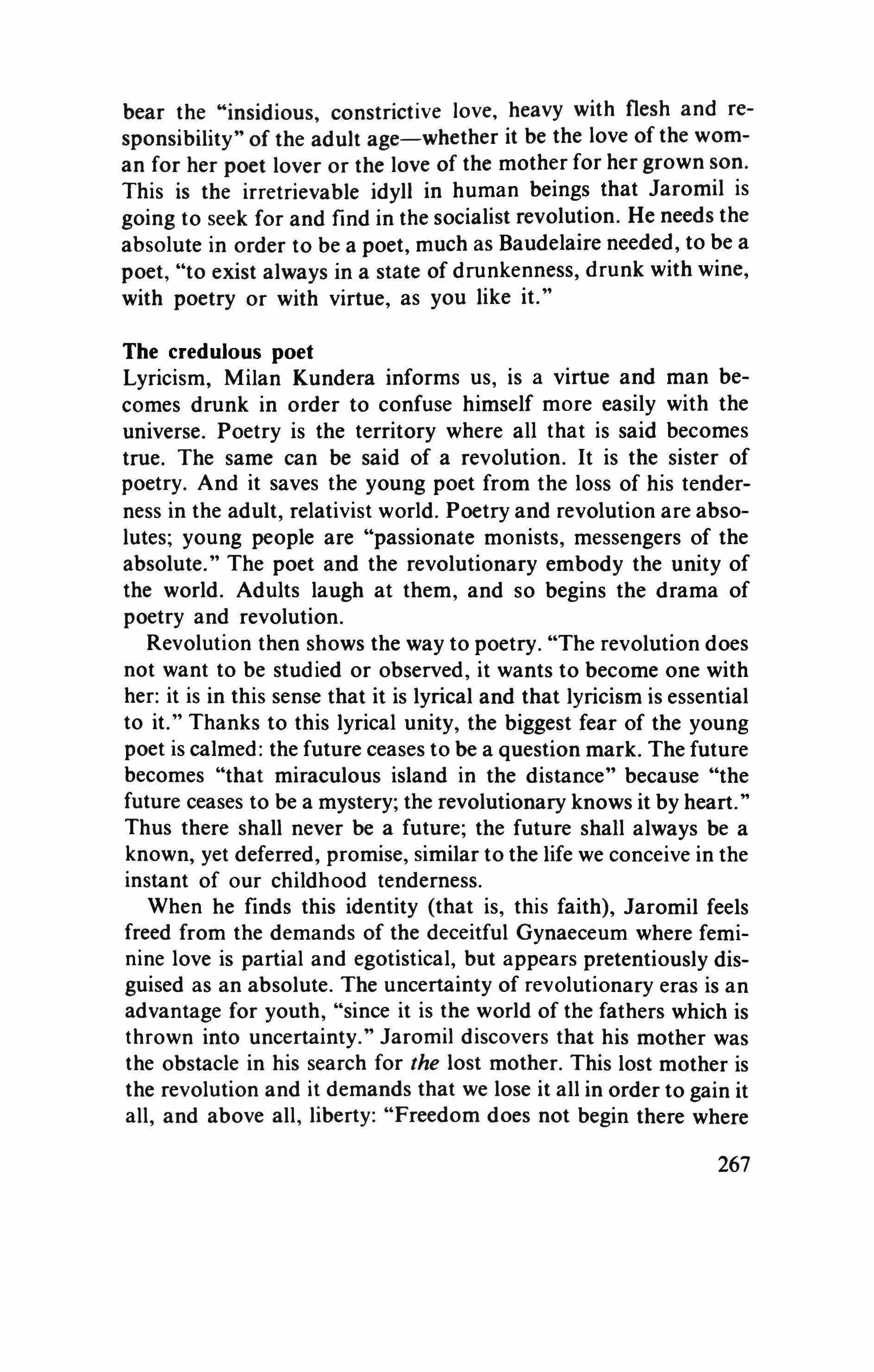
bear the "insidious, constnctive love, heavy with flesh and responsibility" of the adult age-whether it be the love of the woman for her poet lover or the love of the mother for her grown son. This is the irretrievable idyll in human beings that Jaromil is going to seek for and find in the socialist revolution. He needs the absolute in order to be a poet, much as Baudelaire needed, to be a poet, "to exist always in a state of drunkenness, drunk with wine, with poetry or with virtue, as you like it."
The credulous poet Lyricism, Milan Kundera informs us, is a virtue and man becomes drunk in order to confuse himself more easily with the universe. Poetry is the territory where all that is said becomes true. The same can be said of a revolution. It is the sister of poetry. And it saves the young poet from the loss of his tenderness in the adult, relativist world. Poetry and revolution are absolutes; young people are "passionate monists, messengers of the absolute." The poet and the revolutionary embody the unity of the world. Adults laugh at them, and so begins the drama of poetry and revolution.
Revolution then shows the way to poetry. "The revolution does not want to be studied or observed, it wants to become one with her: it is in this sense that it is lyrical and that lyricism is essential to it." Thanks to this lyrical unity, the biggest fear of the young poet is calmed: the future ceases to be a question mark. The future becomes "that miraculous island in the distance" because "the future ceases to be a mystery; the revolutionary knows it by heart. Thus there shall never be a future; the future shall always be a known, yet deferred, promise, similar to the life we conceive in the instant of our childhood tenderness.
When he finds this identity (that is, this faith), Jaromil feels freed from the demands of the deceitful Gynaeceum where feminine love is partial and egotistical, but appears pretentiously disguised as an absolute. The uncertainty of revolutionary eras is an advantage for youth, "since it is the world of the fathers which is thrown into uncertainty." Jaromil discovers that his mother was the obstacle in his search for the lost mother. This lost mother is the revolution and it demands that we lose it all in order to gain it all, and above all, liberty: "Freedom does not begin there where
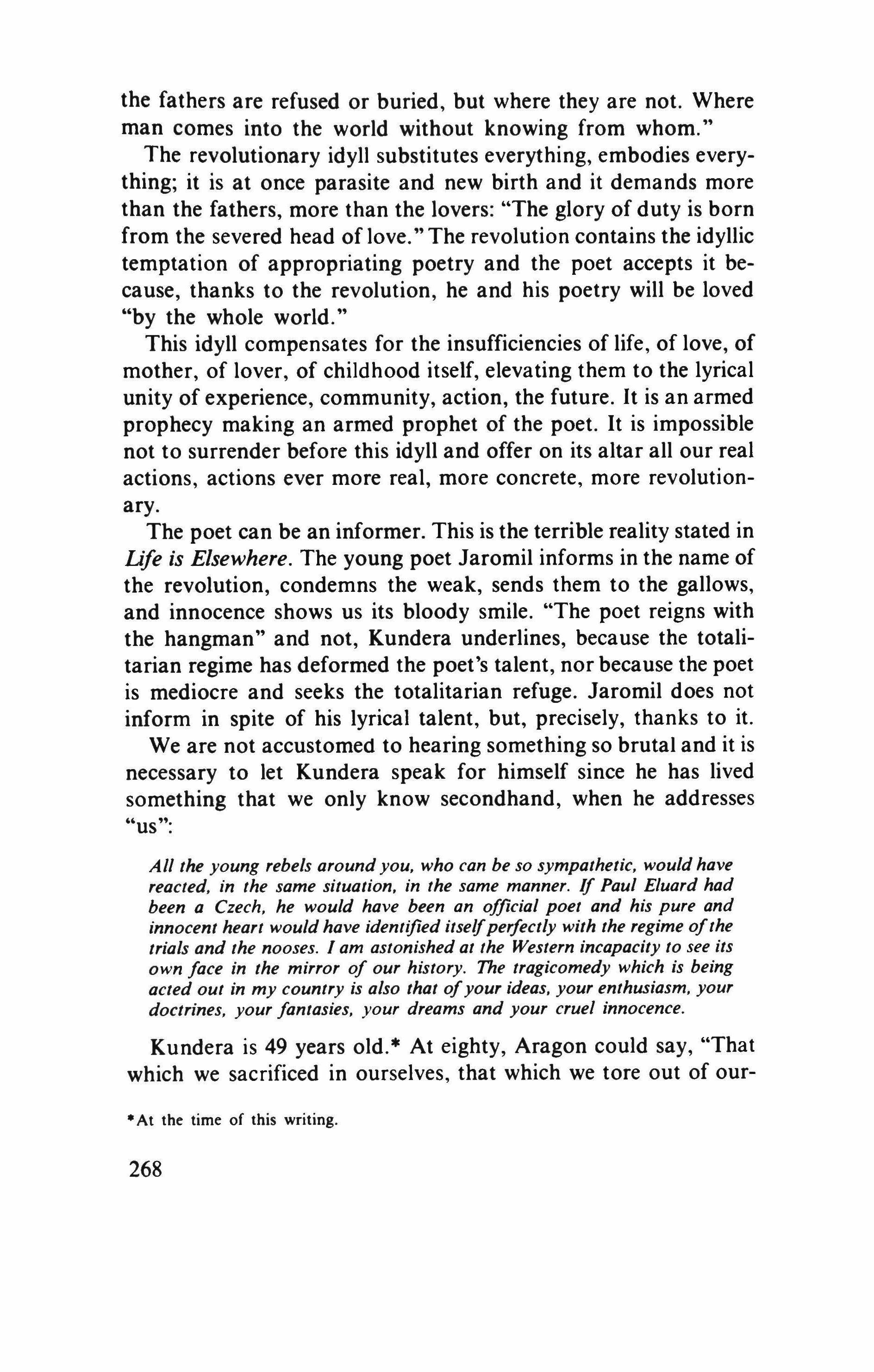
the fathers are refused or buried, but where they are not. Where man comes into the world without knowing from whom."
The revolutionary idyll substitutes everything, embodies everything; it is at once parasite and new birth and it demands more than the fathers, more than the lovers: "The glory of duty is born from the severed head of love." The revolution contains the idyllic temptation of appropriating poetry and the poet accepts it because, thanks to the revolution, he and his poetry will be loved "by the whole world."
This idyll compensates for the insufficiencies of life, of love, of mother, of lover, of childhood itself, elevating them to the lyrical unity of experience, community, action, the future. It is an armed prophecy making an armed prophet of the poet. It is impossible not to surrender before this idyll and offer on its altar all our real actions, actions ever more real, more concrete, more revolutionary.
The poet can be an informer. This is the terrible reality stated in life is Elsewhere. The young poet Jaromil informs in the name of the revolution, condemns the weak, sends them to the gallows, and innocence shows us its bloody smile. "The poet reigns with the hangman" and not, Kundera underlines, because the totalitarian regime has deformed the poet's talent, nor because the poet is mediocre and seeks the totalitarian refuge. Jaromil does not inform in spite of his lyrical talent, but, precisely, thanks to it.
We are not accustomed to hearing something so brutal and it is necessary to let Kundera speak for himself since he has lived something that we only know secondhand, when he addresses "us":
All the young rebels around you. who can be so sympathetic. would have reacted. in the same situation. in the same manner. If Paul Eluard had been a Czech. he would have been an official poet and his pure and innocent heart would have identified itselfperfectly with the regime ofthe trials and the nooses. I am astonished at the Western incapacity to see its own face in the mirror of our history. The tragicomedy which is being acted out in my country is also that ofyour ideas. your enthusiasm. your doctrines. your fantasies. your dreams and your cruel innocence.
Kundera is 49 years old." At eighty, Aragon could say, "That which we sacrificed in ourselves, that which we tore out of our-
At the time of this writing.
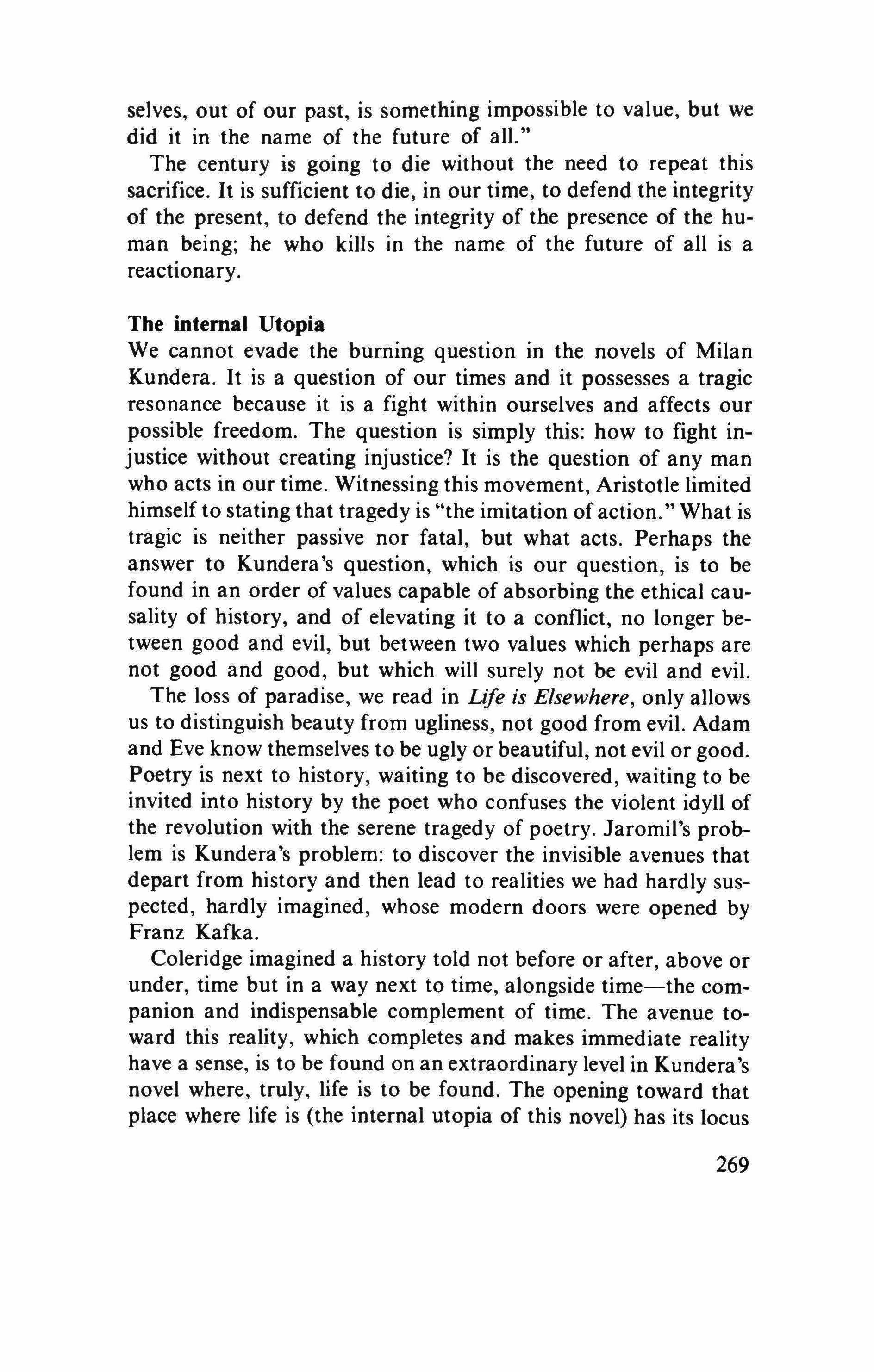
selves, out of our past, is something impossible to value, but we did it in the name of the future of all."
The century is going to die without the need to repeat this sacrifice. It is sufficient to die, in our time, to defend the integrity of the present, to defend the integrity of the presence of the human being; he who kills in the name of the future of all is a reactionary.
We cannot evade the burning question in the novels of Milan Kundera. It is a question of our times and it possesses a tragic resonance because it is a fight within ourselves and affects our possible freedom. The question is simply this: how to fight injustice without creating injustice? It is the question of any man who acts in our time. Witnessing this movement, Aristotle limited himself to stating that tragedy is "the imitation of action." What is tragic is neither passive nor fatal, but what acts. Perhaps the answer to Kundera's question, which is our question, is to be found in an order of values capable of absorbing the ethical causality of history, and of elevating it to a conflict, no longer between good and evil, but between two values which perhaps are not good and good, but which will surely not be evil and evil.
The loss of paradise, we read in life is Elsewhere, only allows us to distinguish beauty from ugliness, not good from evil. Adam and Eve know themselves to be ugly or beautiful, not evil or good. Poetry is next to history, waiting to be discovered, waiting to be invited into history by the poet who confuses the violent idyll of the revolution with the serene tragedy of poetry. Jaromil's problem is Kundera's problem: to discover the invisible avenues that depart from history and then lead to realities we had hardly suspected, hardly imagined, whose modern doors were opened by Franz Kafka.
Coleridge imagined a history told not before or after, above or under, time but in a way next to time, alongside time-the companion and indispensable complement of time. The avenue toward this reality, which completes and makes immediate reality have a sense, is to be found on an extraordinary level in Kundera's novel where, truly, life is to be found. The opening toward that place where life is (the internal utopia of this novel) has its locus
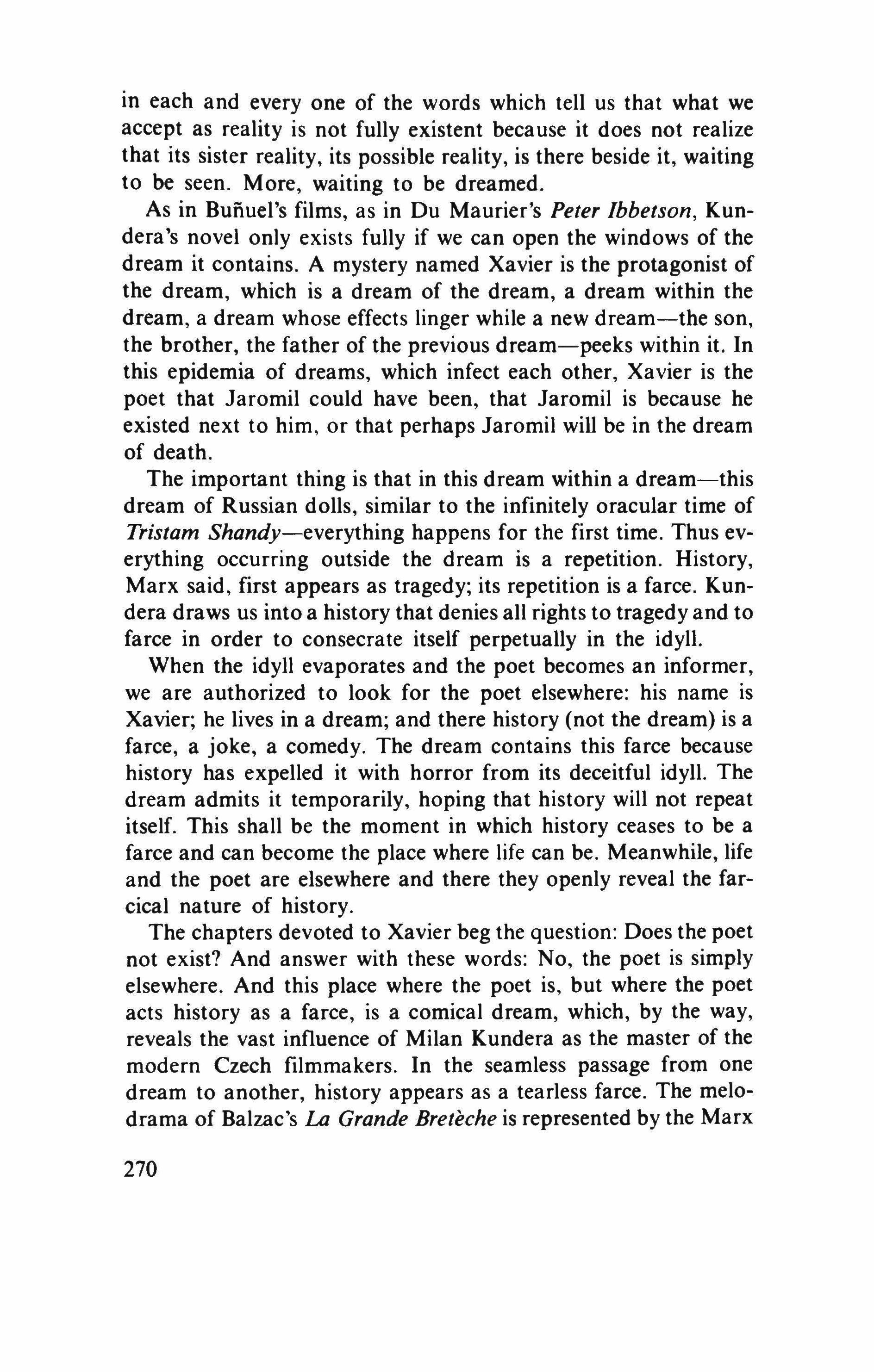
in each and everyone of the words which tell us that what we accept as reality is not fully existent beca use it does not realize that its sister reality, its possible reality, is there beside it, waiting to be seen. More, waiting to be dreamed.
As in Bufiuel's films, as in Du Maurier's Peter Ibbetson, Kundera's novel only exists fully if we can open the windows of the dream it contains. A mystery named Xavier is the protagonist of the dream, which is a dream of the dream, a dream within the dream, a dream whose effects linger while a new dream-the son, the brother, the father of the previous dream-peeks within it. In this epidemia of dreams, which infect each other, Xavier is the poet that Jaromil could have been, that Jaromil is because he existed next to him, or that perhaps Jaromil will be in the dream of death.
The important thing is that in this dream within a dream-this dream of Russian dolls, similar to the infinitely oracular time of Tristam Shandy-everything happens for the first time. Thus everything occurring outside the dream is a repetition. History, Marx said, first appears as tragedy; its repetition is a farce. Kundera draws us into a history that denies all rights to tragedy and to farce in order to consecrate itself perpetually in the idyll.
When the idyll evaporates and the poet becomes an informer, we are authorized to look for the poet elsewhere: his name is Xavier; he lives in a dream; and there history (not the dream) is a farce, a joke, a comedy. The dream contains this farce because history has expelled it with horror from its deceitful idyll. The dream admits it temporarily, hoping that history will not repeat itself. This shall be the moment in which history ceases to be a farce and can become the place where life can be. Meanwhile, life and the poet are elsewhere and there they openly reveal the farcical nature of history.
The chapters devoted to Xavier beg the question: Does the poet not exist? And answer with these words: No, the poet is simply elsewhere. And this place where the poet is, but where the poet acts history as a farce, is a comical dream, which, by the way, reveals the vast influence of Milan Kundera as the master of the modern Czech filmmakers. In the seamless passage from one dream to another, history appears as a tearless farce. The melodrama of Balzac's La Grande Breteche is represented by the Marx

Brothers, who, as everyone knows, are the fathers of the Marx Sisters, the "Little Daisies" of anarchy in socialism imagined by the filmmaker Vera Chytilova. The perverse dream of the movies is the nightmare and the ambition of Jaromil to be seen by all, to feel that "all the eyes turned towards him." In the cinema and in theater, all the others-the world-see us. The undoubted terror of German expressionist film consists precisely in this possibility of always being seen by another one, much as Fritz Lang's Mabuse incessantly sees us from his cell in the madhouse or as Peter Lorre, the vampire of Dusseldorf in M, is seen by the thousand eyes of a mendicant night.
That which has been seen by all cannot have any pretenses to originality or, for that matter, virginity. Represented as oneiric theater and rewritten as impossible novel, history always appears as a farce. But if it be only a farce, this is a tragedy-such is the sense of the joke in Kundera. In a world deprived of humor, the joke can only be the refusal of the universe: "a sock in the statue of Apollo," a policeman locked forever in a closet, walled in like a character from Edgar Allan Poe played by Buster Keaton. Jokes, humor, are exceptional and liberating: they reveal the farce; they mock the law; they essay freedom. Because of this, the law denounces the joke as a crime.
Dura lex
In both K's, Kafka and Kundera, rules a hermetic legality. Liberty is no longer possible because liberty is already perfect. Such is the solemn reality of the law. There is no paradox in this statement. Freedom supposes a certain vision of things; it holds the minimal possibility of giving a sense to the world.
But in the world of the penal laws of Kafka and of the scientific socialism of Kundera, this is no longer possible. The world already has a sense and this sense is given by the law, says Kafka. And Kundera adds, the world of scientific socialism already has a sense and the revolutionary law, which is nothing but objectified history, common and idyllic, gives it to the world. It is useless to search for another meaning. You insist? Then you will be eliminated in the name of the law, the revolution, and history.
Given this premise, authentic freedom becomes a self-destructive enterprise. The person who defends himself only hurts him-
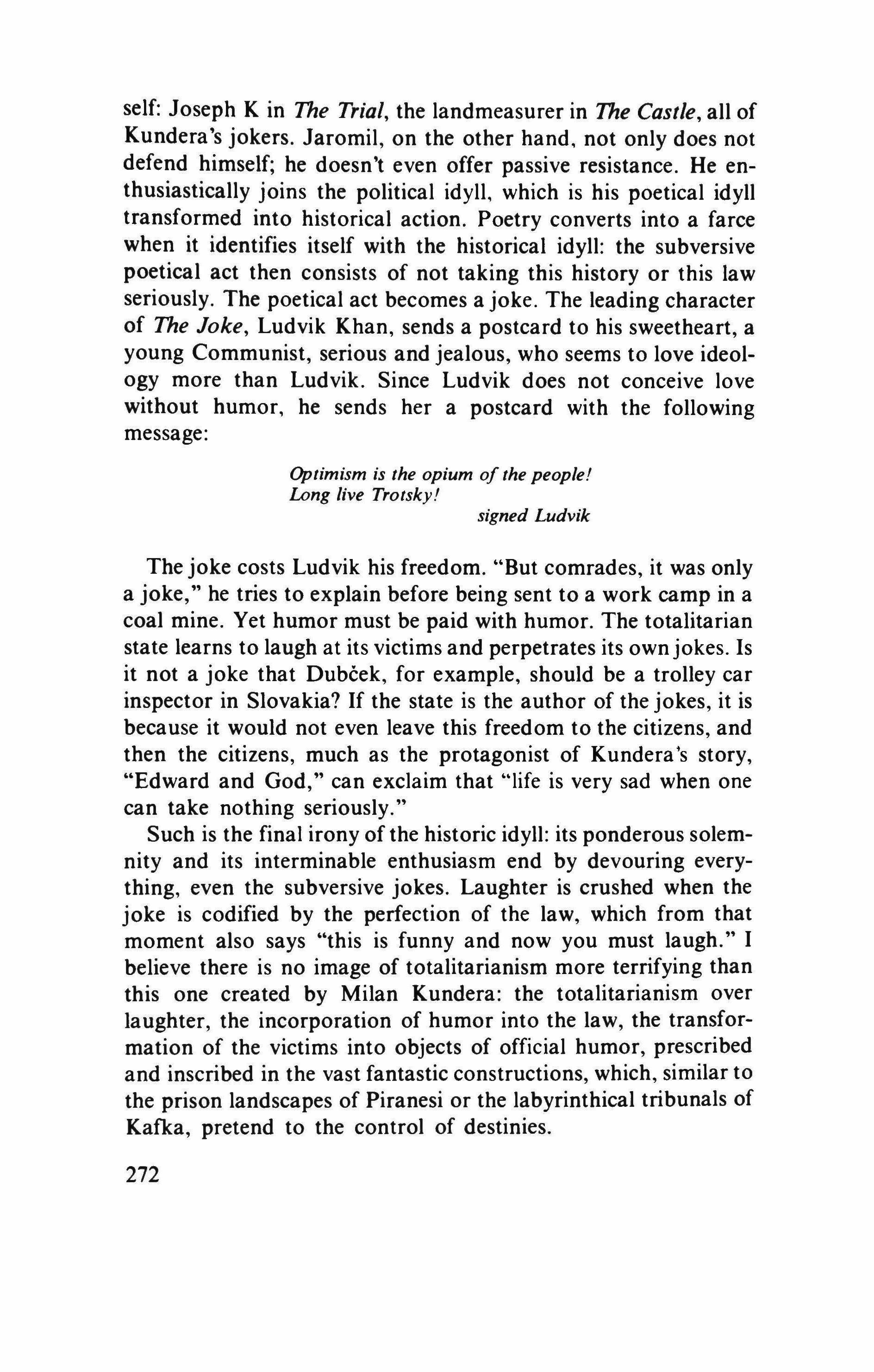
self: Joseph K in The Trial, the landmeasurer in The Castle, all of Kundera's jokers. Jaromil, on the other hand, not only does not defend himself; he doesn't even offer passive resistance. He enthusiastically joins the political idyll, which is his poetical idyll transformed into historical action. Poetry converts into a farce when it identifies itself with the historical idyll: the subversive poetical act then consists of not taking this history or this law seriously. The poetical act becomes a joke. The leading character of The Joke, Ludvik Khan, sends a postcard to his sweetheart, a young Communist, serious and jealous, who seems to love ideology more than Ludvik. Since Ludvik does not conceive love without humor, he sends her a postcard with the following message:
Optimism is the opium of the people! Long live Trotsky! signed Ludvik
The joke costs Ludvik his freedom. "But comrades, it was only a joke," he tries to explain before being sent to a work camp in a coal mine. Yet humor must be paid with humor. The totalitarian state learns to laugh at its victims and perpetrates its own jokes. Is it not a joke that Dubcek, for example, should be a trolley car inspector in Slovakia? If the state is the author of the jokes, it is because it would not even leave this freedom to the citizens, and then the citizens, much as the protagonist of Kundera's story, "Edward and God," can exclaim that "life is very sad when one can take nothing seriously."
Such is the final irony of the historic idyll: its ponderous solemnity and its interminable enthusiasm end by devouring everything, even the subversive jokes. Laughter is crushed when the joke is codified by the perfection of the law, which from that moment also says "this is funny and now you must laugh." I believe there is no image of totalitarianism more terrifying than this one created by Milan Kundera: the totalitarianism over laughter, the incorporation of humor into the law, the transformation of the victims into objects of official humor, prescribed and inscribed in the vast fantastic constructions, which, similar to the prison landscapes of Piranesi or the labyrinthical tribunals of Kafka, pretend to the control of destinies.
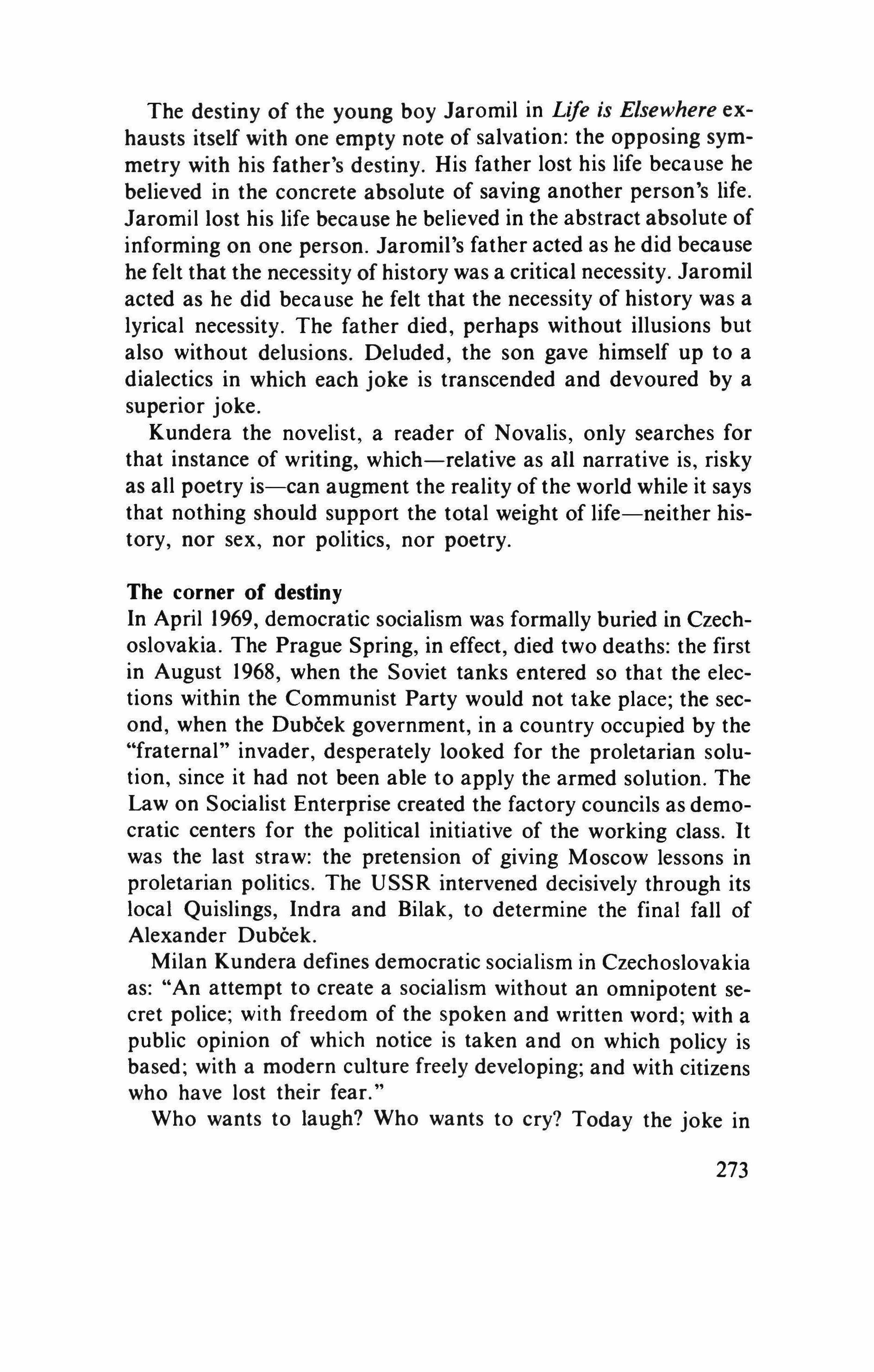
The destiny of the young boy Jaromil in Life is Elsewhere exhausts itself with one empty note of salvation: the opposing symmetry with his father's destiny. His father lost his life because he believed in the concrete absolute of saving another person's life. Jaromillost his life because he believed in the abstract absolute of informing on one person. Jaromil's father acted as he did because he felt that the necessity of history was a critical necessity. Jaromil acted as he did because he felt that the necessity of history was a lyrical necessity. The father died, perhaps without illusions but also without delusions. Deluded, the son gave himself up to a dialectics in which each joke is transcended and devoured by a superior joke.
Kundera the novelist, a reader of Novalis, only searches for that instance of writing, which-relative as all narrative is, risky as all poetry is-can augment the reality of the world while it says that nothing should support the total weight of life-neither history, nor sex, nor politics, nor poetry.
In April 1969, democratic socialism was formally buried in Czechoslovakia. The Prague Spring, in effect, died two deaths: the first in August 1968, when the Soviet tanks entered so that the elections within the Communist Party would not take place; the second, when the Dubeek government, in a country occupied by the "fraternal" invader, desperately looked for the proletarian solution, since it had not been able to apply the armed solution. The Law on Socialist Enterprise created the factory councils as democratic centers for the political initiative of the working class. It was the last straw: the pretension of giving Moscow lessons in proletarian politics. The USSR intervened decisively through its local Quislings, Indra and Bilak, to determine the final fall of Alexander Dubeek.
Milan Kundera defines democratic socialism in Czechoslovakia as: "An attempt to create a socialism without an omnipotent secret police; with freedom of the spoken and written word; with a public opinion of which notice is taken and on which policy is based; with a modern culture freely developing; and with citizens who have lost their fear."
Who wants to laugh? Who wants to cry? Today the joke in 273
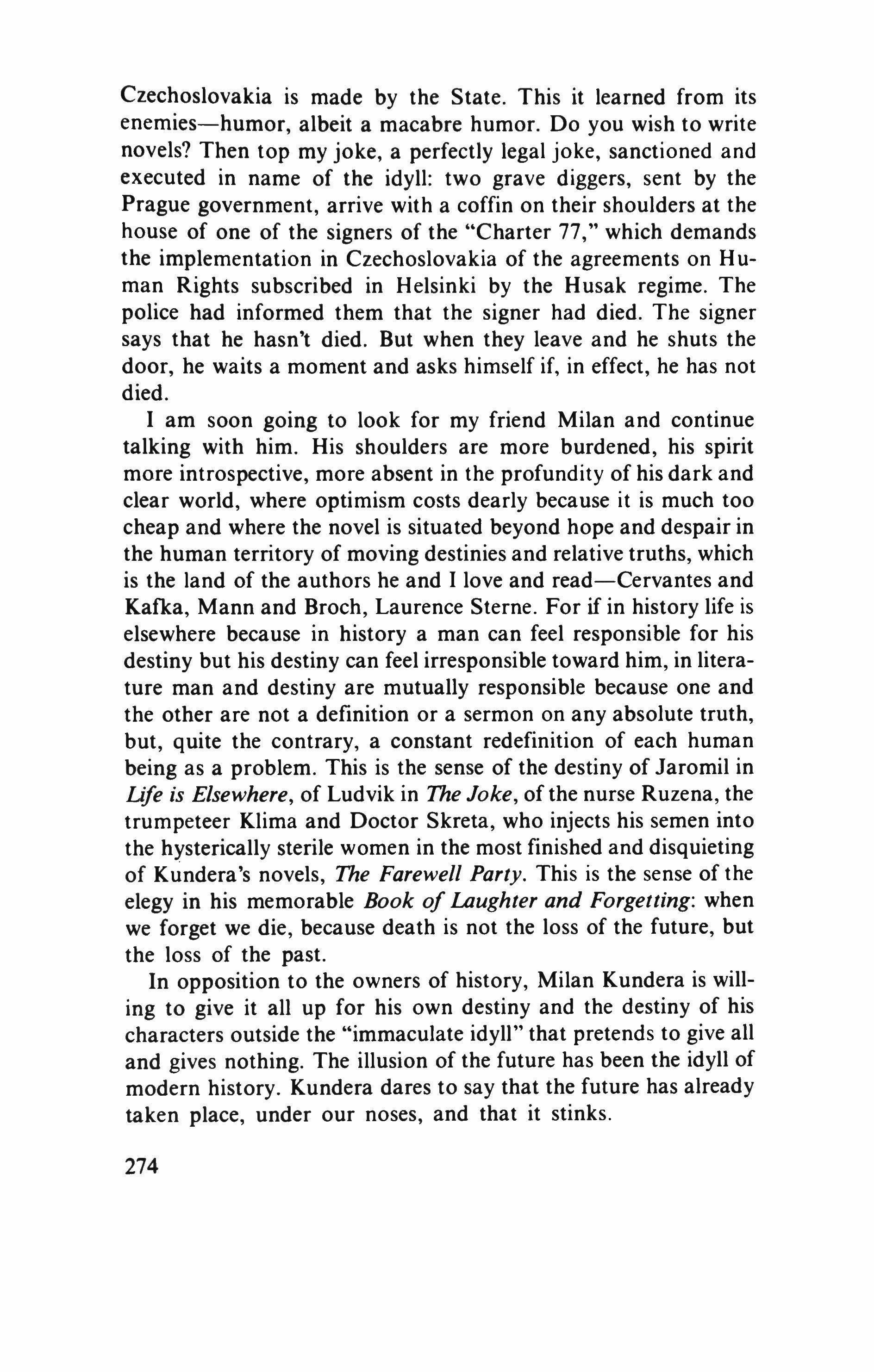
Czechoslovakia is made by the State. This it learned from its enemies-humor, albeit a macabre humor. Do you wish to write novels? Then top my joke, a perfectly legal joke, sanctioned and executed in name of the idyll: two grave diggers, sent by the Prague government, arrive with a coffin on their shoulders at the house of one of the signers of the "Charter 77," which demands the implementation in Czechoslovakia of the agreements on H uman Rights subscribed in Helsinki by the Husak regime. The police had informed them that the signer had died. The signer says that he hasn't died. But when they leave and he shuts the door, he waits a moment and asks himself if, in effect, he has not died.
I am soon going to look for my friend Milan and continue talking with him. His shoulders are more burdened, his spirit more introspective, more absent in the profundity of his dark and clear world, where optimism costs dearly because it is much too cheap and where the novel is situated beyond hope and despair in the human territory of moving destinies and relative truths, which is the land of the authors he and I love and read-Cervantes and Kafka, Mann and Broch, Laurence Sterne. For if in history life is elsewhere because in history a man can feel responsible for his destiny but his destiny can feel irresponsible toward him, in literature man and destiny are mutually responsible because one and the other are not a definition or a sermon on any absolute truth, but, quite the contrary, a constant redefinition of each human being as a problem. This is the sense of the destiny of Jaromil in life is Elsewhere, of Ludvik in The Joke, of the nurse Ruzena, the trumpeteer Klima and Doctor Skreta, who injects his semen into the hysterically sterile women in the most finished and disquieting of Kundera's novels, The Farewell Party. This is the sense of the elegy in his memorable Book of Laughter and Forgetting: when we forget we die, because death is not the loss of the future, but the loss of the past.
In opposition to the owners of history, Milan Kundera is willing to give it all up for his own destiny and the destiny of his characters outside the "immaculate idyll" that pretends to give all and gives nothing. The illusion of the future has been the idyll of modern history. Kundera dares to say that the future has already taken place, under our noses, and that it stinks.
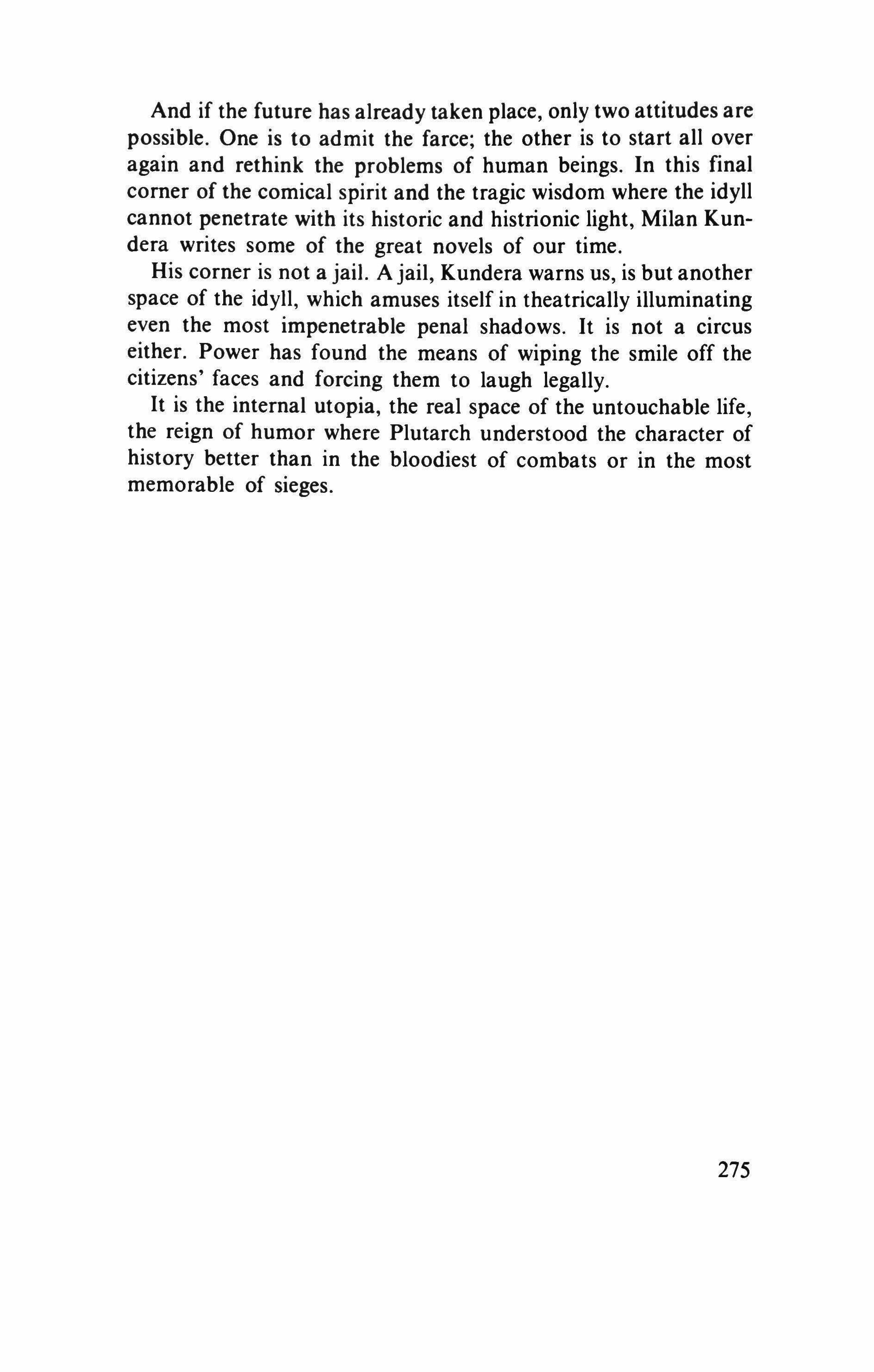
And if the future has already taken place, only two attitudes are possible. One is to admit the farce; the other is to start all over again and rethink the problems of human beings. In this final comer of the comical spirit and the tragic wisdom where the idyll cannot penetrate with its historic and histrionic light, Milan Kundera writes some of the great novels of our time.
His comer is not a jail. A jail, Kundera warns us, is but another space of the idyll, which amuses itself in theatrically illuminating even the most impenetrable penal shadows. It is not a circus either. Power has found the means of wiping the smile off the citizens' faces and forcing them to laugh legally.
It is the internal utopia, the real space of the untouchable life, the reign of humor where Plutarch understood the character of history better than in the bloodiest of combats or in the most memorable of sieges.
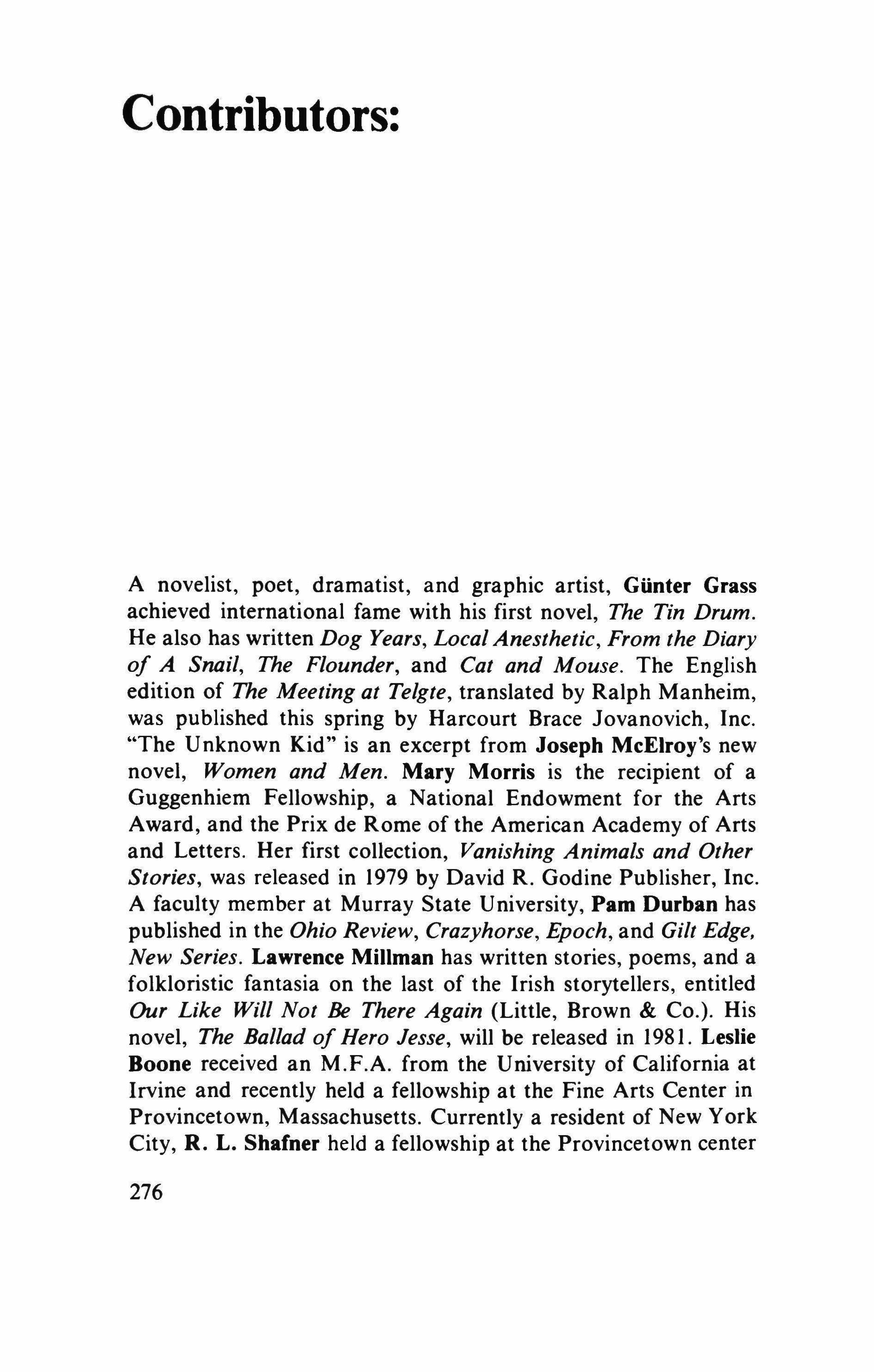
A novelist, poet, dramatist, and graphic artist, GUnter Grass achieved international fame with his first novel, The Tin Drum. He also has written Dog Years, Local Anesthetic, From the Diary of A Snail, The Flounder, and Cat and Mouse. The English edition of The Meeting at Telgte, translated by Ralph Manheim, was published this spring by Harcourt Brace Jovanovich, Inc. "The Unknown Kid" is an excerpt from Joseph McElroy's new novel, Women and Men. Mary Morris is the recipient of a Guggenhiem Fellowship, a National Endowment for the Arts Award, and the Prix de Rome of the American Academy of Arts and Letters. Her first collection, Vanishing Animals and Other Stories, was released in 1979 by David R. Godine Publisher, Inc. A faculty member at Murray State University, Pam Durban has published in the Ohio Review, Crazyhorse, Epoch, and Gilt Edge, New Series. Lawrence Millman has written stories, poems, and a folkloristic fantasia on the last of the Irish storytellers, entitled Our Like Will Not Be There Again (Little, Brown & Co.). His novel, The Ballad of Hero Jesse, will be released in 1981. Leslie Boone received an M.F.A. from the University of California at Irvine and recently held a fellowship at the Fine Arts Center in Provincetown, Massachusetts. Currently a resident of New York City, R. L. Shafner held a fellowship at the Provincetown center
276
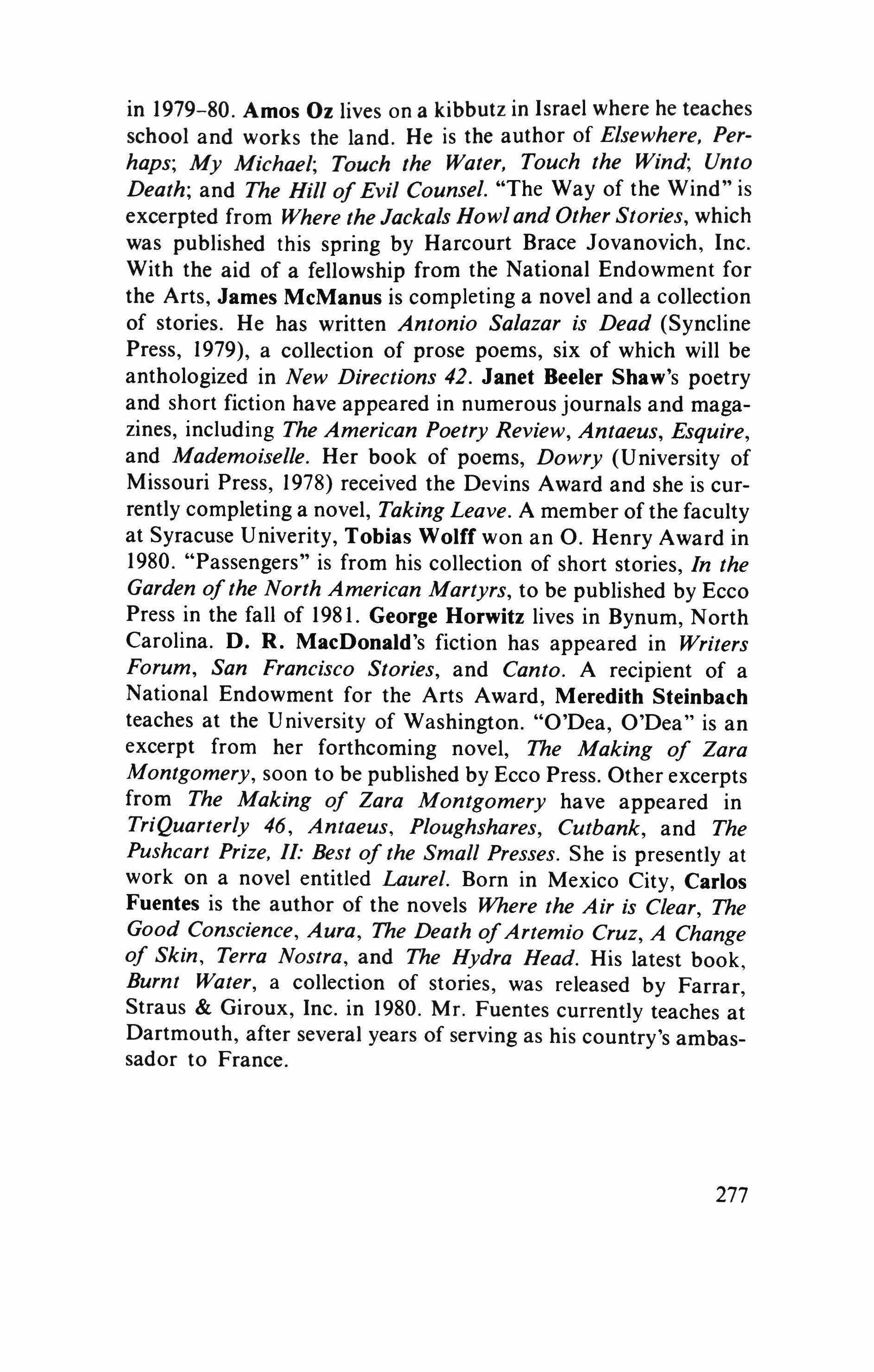
in 1979-80. Amos Oz lives on a kibbutz in Israel where he teaches school and works the land. He is the author of Elsewhere, Perhaps; My Michael; Touch the Water, Touch the Wind; Unto Death; and The Hill of Evil Counsel. "The Way of the Wind" is excerpted from Where the Jackals Howl and Other Stories, which was published this spring by Harcourt Brace Jovanovich, Inc. With the aid of a fellowship from the National Endowment for the Arts, James McManus is completing a novel and a collection of stories. He has written Antonio Salazar is Dead (Syncline Press, 1979), a collection of prose poems, six of which will be anthologized in New Directions 42. Janet Beeler Shaw's poetry and short fiction have appeared in numerous journals and magazines, including The American Poetry Review, Antaeus, Esquire, and Mademoiselle. Her book of poems, Dowry (University of Missouri Press, 1978) received the Devins Award and she is currently completing a novel, Taking Leave. A member of the faculty at Syracuse Univerity, Tobias Wolff won an O. Henry Award in 1980. "Passengers" is from his collection of short stories, In the Garden of the North American Martyrs, to be published by Ecco Press in the fall of 1981. George Horwitz lives in Bynum, North Carolina. D. R. MacDonald's fiction has appeared in Writers Forum, San Francisco Stories, and Canto. A recipient of a National Endowment for the Arts Award, Meredith Steinbach teaches at the University of Washington. "O'Dea, O'Dea" is an excerpt from her forthcoming novel, The Making of Zara Montgomery, soon to be published by Ecco Press. Other excerpts from The Making of Zara Montgomery have appeared in TriQuarterly 46, Antaeus, Ploughshares, Cutbank, and The Pushcart Prize, II: Best of the Small Presses. She is presently at work on a novel entitled Laurel. Born in Mexico City, Carlos Fuentes is the author of the novels Where the Air is Clear, The Good Conscience, Aura, The Death ofArtemio Cruz, A Change of Skin, Terra Nostra, and The Hydra Head. His latest book, Burnt Water, a collection of stories, was released by Farrar, Straus & Giroux, Inc. in 1980. Mr. Fuentes currently teaches at Dartmouth, after several years of serving as his country's ambassador to France.

1n the first issue of its new series, Granta devoted an entire issue to America's great writers of fiction, publishing work by William Gass, John Hawkes, Joyce Carol Oates, Tillie Olsen, Susan Sontag, James Purdy, Ronald Sukenick, Stanley Elkin, Theodore Solotaroff, and Leonard Michaels.
In Britain, a first printing of this issue is already a collector's item. It's easy to see why. It's also easy to see why Granta's other issues will be issues to collect.
The forthcoming publications are as varied as the contributors. Two volumes look at the British Novel, and easily demonstrate that fiction in Britain, long believed dormant, is in fact entering a new and extraordinary era, written by a new generation of writers. Like Ian McEwan, Bruce Chatwin, Desmond Hogan, Michael Hofmann, Kazuo Ishiguro, Neil Jordan, Richard Thornley, and Salman Rushdie.
There's a special volume, nearly 400 pages long, of new German Writing, which, with over 35 contributors, shows that much more is going on in the Continent than ever before. Plus, an entire issue devoted to Magic Realism.
Granta is the most important publication to appear in Britain in years. Collect them and find out why.
An annual subscription of four issues is $20 for individuals and $30 for institutions.
Granta, King's College, Cambridge CB2 1 ST, England
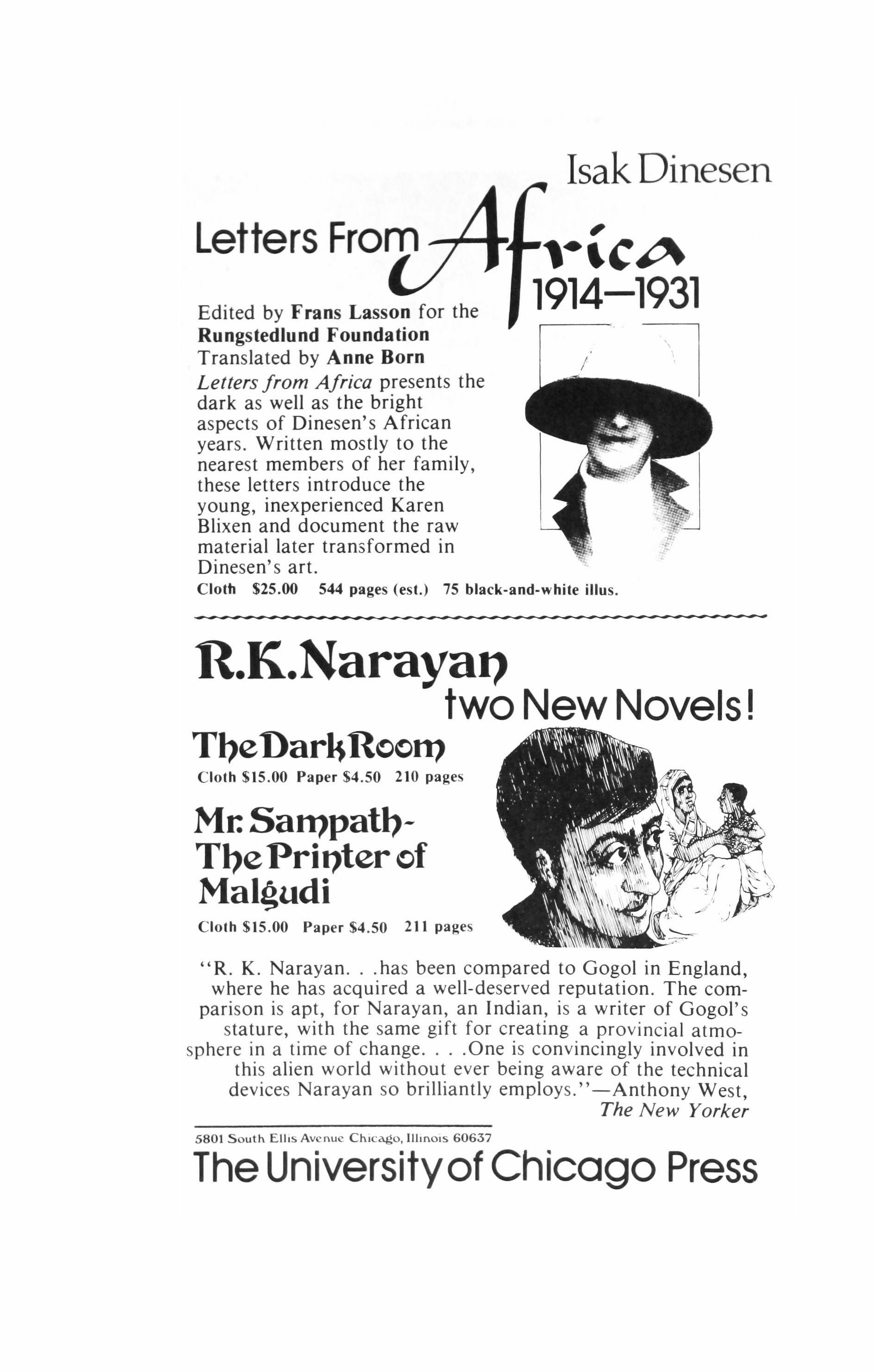
for the 1914-1931
Rungstedlund Foundation
Translated by Anne Born I ',
Letters from Africa presents the dark as well as the bright aspects of Dinesen's African years. Written mostly to the nearest members of her family, these letters introduce the young, inexperienced Karen Blixen and document the raw material later transformed in Dinesen's art.
Cloth $25.00 544 pages (est.) 75 black-and-white iIIus.
Cloth $15.00 Paper $4.50 210 pages
Cloth $15.00 Paper $4.50 211 pages
"R. K. Narayan has been compared to Gogol in England, where he has acquired a well-deserved reputation. The comparison is apt, for Narayan, an Indian, is a writer of Gogol's stature, with the same gift for creating a provincial atmosphere in a time of change One is convincingly involved in this alien world without ever being aware of the technical devices Narayan so brilliantly employs. "-Anthony West, The New Yorker
RARITAN will be a critical review of the important and controversial issues and events in literature and the arts, politics, popular culture, the social and natural sciences. It will be especially concerned with locating cultural power, the forces that shape our ways of receiving and judging books, performances, and intellectual movements. Publication will begin in spring of 1981.
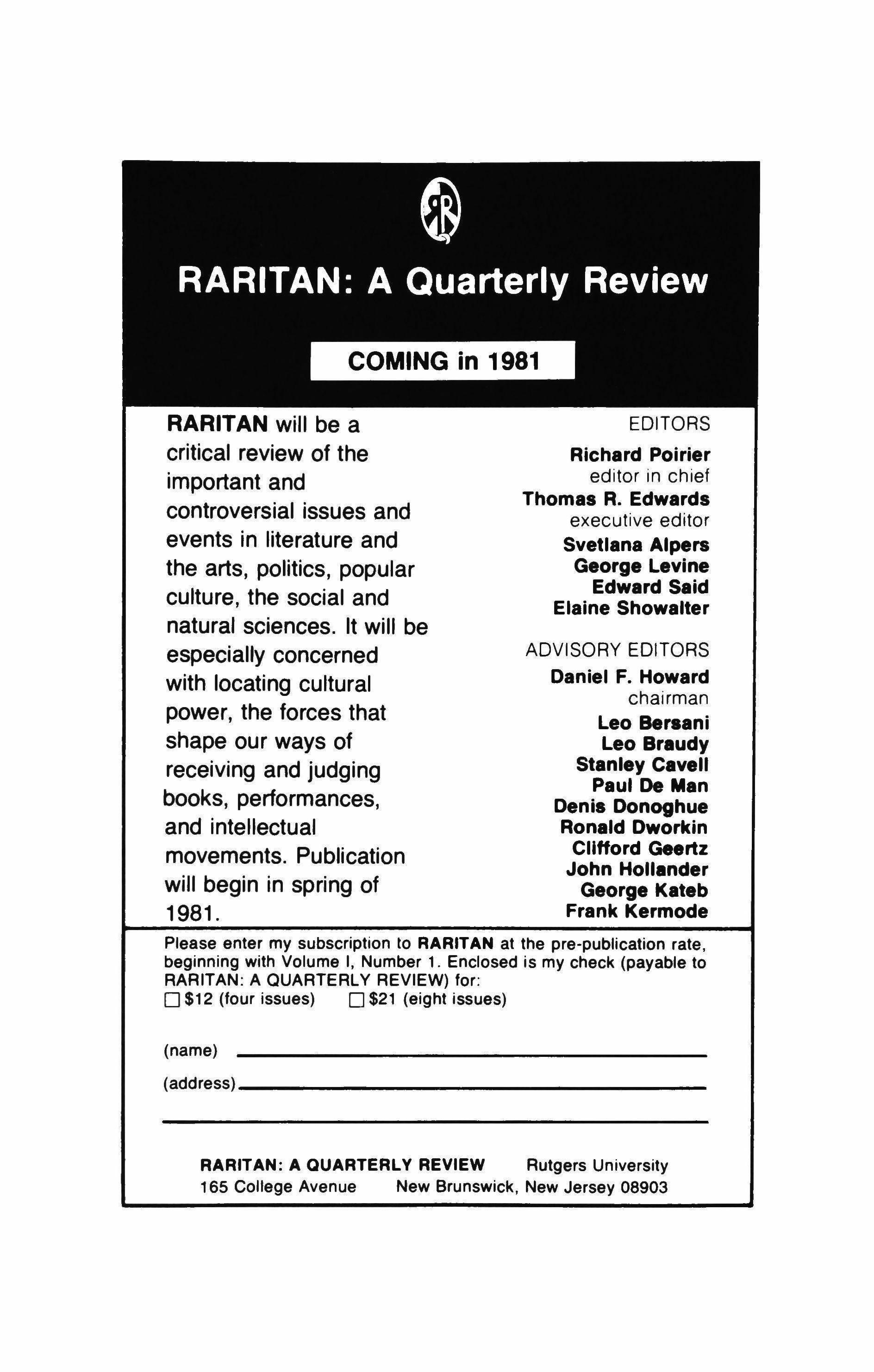
EDITORS
Richard Poirier editor in chief
Thomas R. Edwards executive editor
Svetlana Alpers
George Levine
Edward Said
Elaine Showalter
ADVISORY EDITORS
Daniel F. Howard
chairman
Leo Bersani
Leo Braudy
Stanley Cavell
Paul De Man
Denis Donoghue
Ronald Dworkin
Clifford Geertz
John Hollander
George Kateb
Frank Kermode
Please enter my subscription to RARITAN at the pre-publication rate, beginning with Volume I, Number 1. Enclosed is my check (payable to RARITAN: A QUARTERLY REVIEW) for:
0$12 (four issues) 0 $21 (eight issues)
(name)
(address)
RARITAN: A QUARTERLY REVIEW
165 College Avenue
Rutgers University
New Brunswick, New Jersey 08903
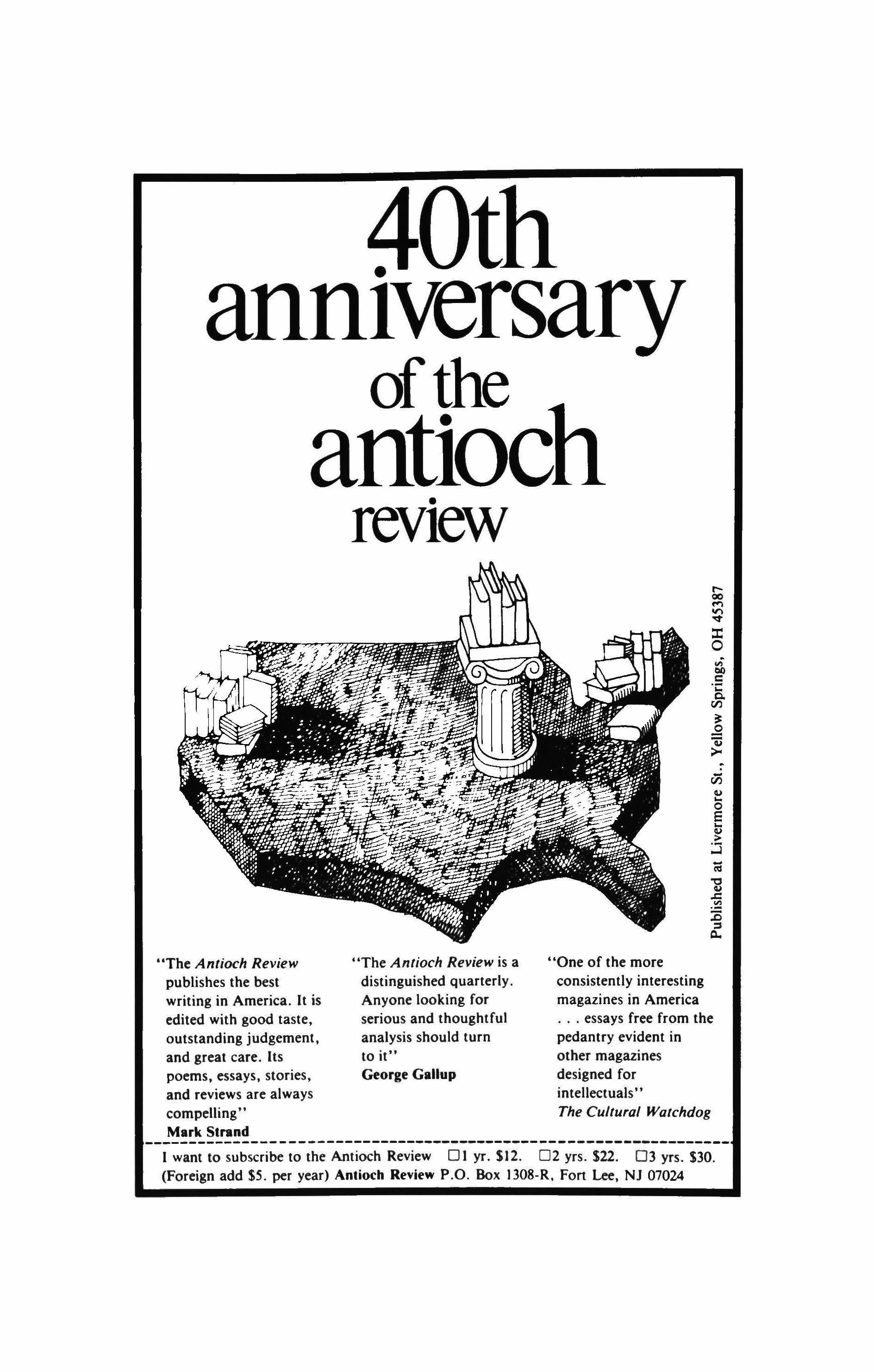
"The Antioch Review publishes the best writing in America. It is edited with good taste, outstanding judgement, and great care. Its poems, essays, stories, and reviews are always compelling"
Mark Strand"The Antioch Review is a distinguished quarterly. Anyone looking for serious and thoughtful analysis should turn to it"
George Gallup"One of the more consistently interesting magazines in America essays free from the pedantry evident in other magazines designed for intellectuals" The Cultural Watchdog
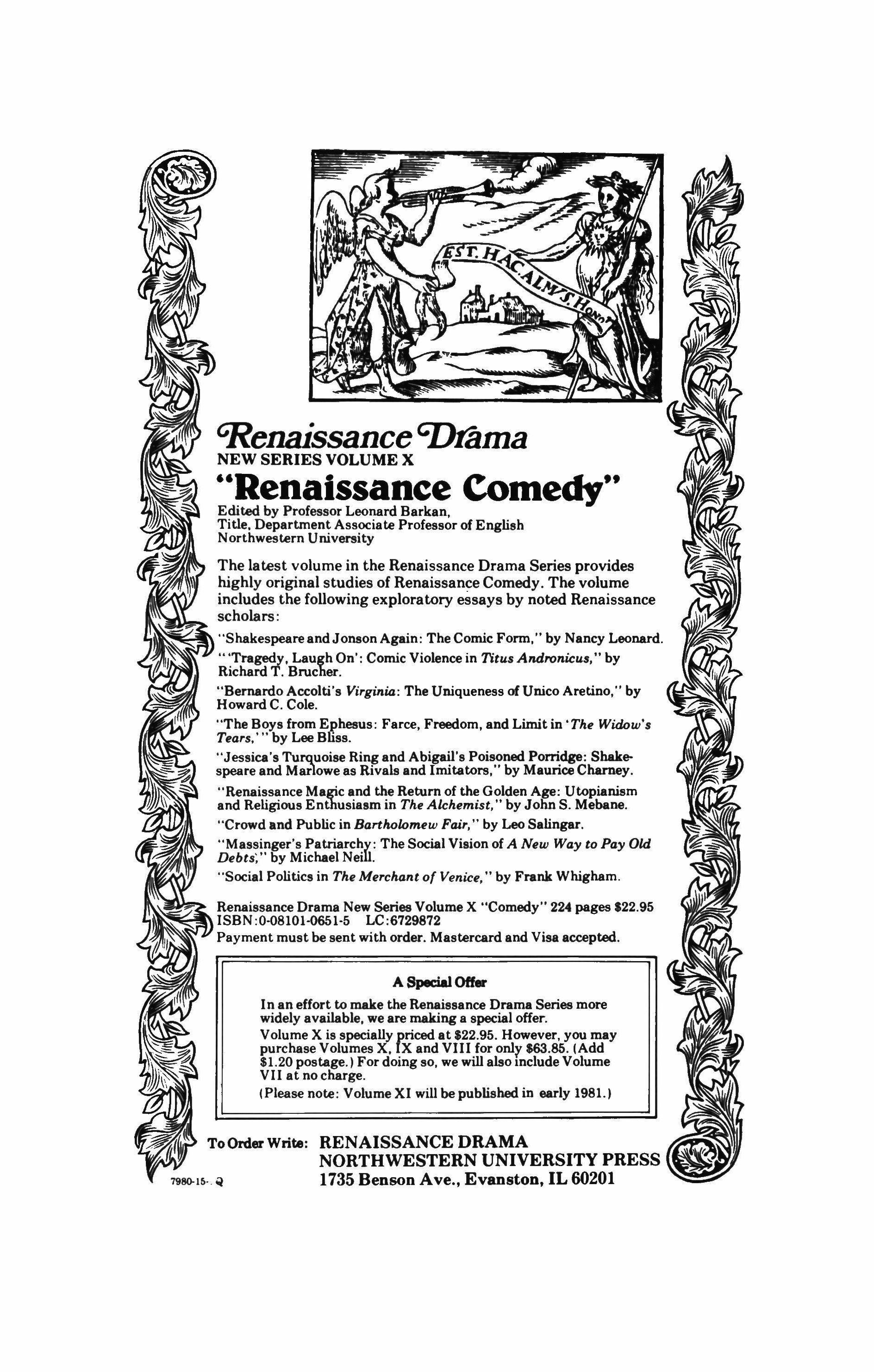
NEW SERIES VOLUME X
Edited by Professor Leonard Barkan, Title, Department Associate Professor of English Northwestern University
The latest volume in the Renaissance Drama Series provides highly original studies of Renaissance Comedy. The volume includes the following exploratory essays by noted Renaissance scholars:
"Shakespeare and Jonson Again: The Comic Form," by Nancy Leonard.
"'Tragedy, Laugh On': Comic Violence in Titus Andronicus," by Richard T. Brucher.
"Bernardo Accolti's Virgini4: The Uniqueness of Unico Aretino," by Howard C. Cole.
"The Boys from Ephesus: Farce, Freedom, and Limit in 'The Widow's Tears, by Lee Bliss.
"Jessica's Turquoise Ring and Abigail's Poisoned Porridge: Shakespeare and Marlowe as Rivals and Imitators," by Maurice Charney.
"Renaissance Magic and the Return of the Golden Age: Utopianism and Religious Enthusiasm in The Alchemist," by John S. Mebane.
"Crowd and Public in Bartholomew Fair," by Leo Salingar.
"Massinger's Patriarchy: The Social Vision of A New Way to Pay Old Debts;" by Michael Neill.
"Social Politics in The Merchant of Venice," by Frank Whigham.
Renaissance Drama New Series Volume X "Comedy" 224 pages 122.95
ISBN:0-GSI0l-0651·5 LC:6729872
1;'" ",,"','., Payment must be sent with order. Mastercard and Visa accepted.
In an effort to make the Renaissance Drama Series more widely available, we are making a special offer. Volume X is specially priced at 122.95. However, you may purchase Volumes X, IX and VIII foronir S63.85.(Add $1.20 postage.) For doing so, we will also include Volume VII at no charge.
(Please note: Volume XI will be published in early 19S1.)
ToOrder Write: RENAISSANCE
Thomas Hill Schaub. "With scholarly care, a disciplined methodology, and the infectious excitement of a critic with a mission, Schaub explicates Pynchon's curious fictional world, with particular emphasis on The Crying of Lot 49 and Gravity's &linbow Considering the range and density of Pynchon's material, Schaub is unusually lucid and informative." - Earl Rovit, Library Journal. "This is the most important and insightful book on Pynchon yet written, and I recommend it unreservedly." - Edward Mendelson. 175 pages. $13.50.
James M. Mellard. Focusing on three wellknown twentieth-century texts - Faulkner's The Sound and the Fury, Heller's Catch-22, and Brautigan's Trout Fishing in America - Mellard guides us through the difficult terrain of the modernist novel in America. "This is a very fine work. It is written with clarity and grace; its structure is logical, firm; it shows sound and extensive scholarship in its field; its thesis, controversial as it may prove, is useful and defensible." - Ihab Hassan. 223 pages. $15.00
The Makin� of a Post-Contemporary American Fiction SECOND EDmON
Jerome Klinkowitz. In the first edition of this book, Klinkowitz analyzed the work of eight "postcontemporary fictionists" (Kurt Vonnegut, [r., Donald Barthelme, Jerzy Kosinski. Amiri Baraka, James Park Sloan, Ronald Sukenick, Raymond Federman, and Gilbert Sorrentino) - writers whose "disruptive" style exploits language, content, and form to create a new art form. This new edition includes a substantial "Postface" that looks at some of the most recent efforts by these authors, as well as greatly expanded and updated bibliographies. an essential survey, distinguished by superb scholarship and considerable critical acumen."Charles Caramello, Studies in the Novel. 306 pages. Cloth, $15.95; paper, $6.50
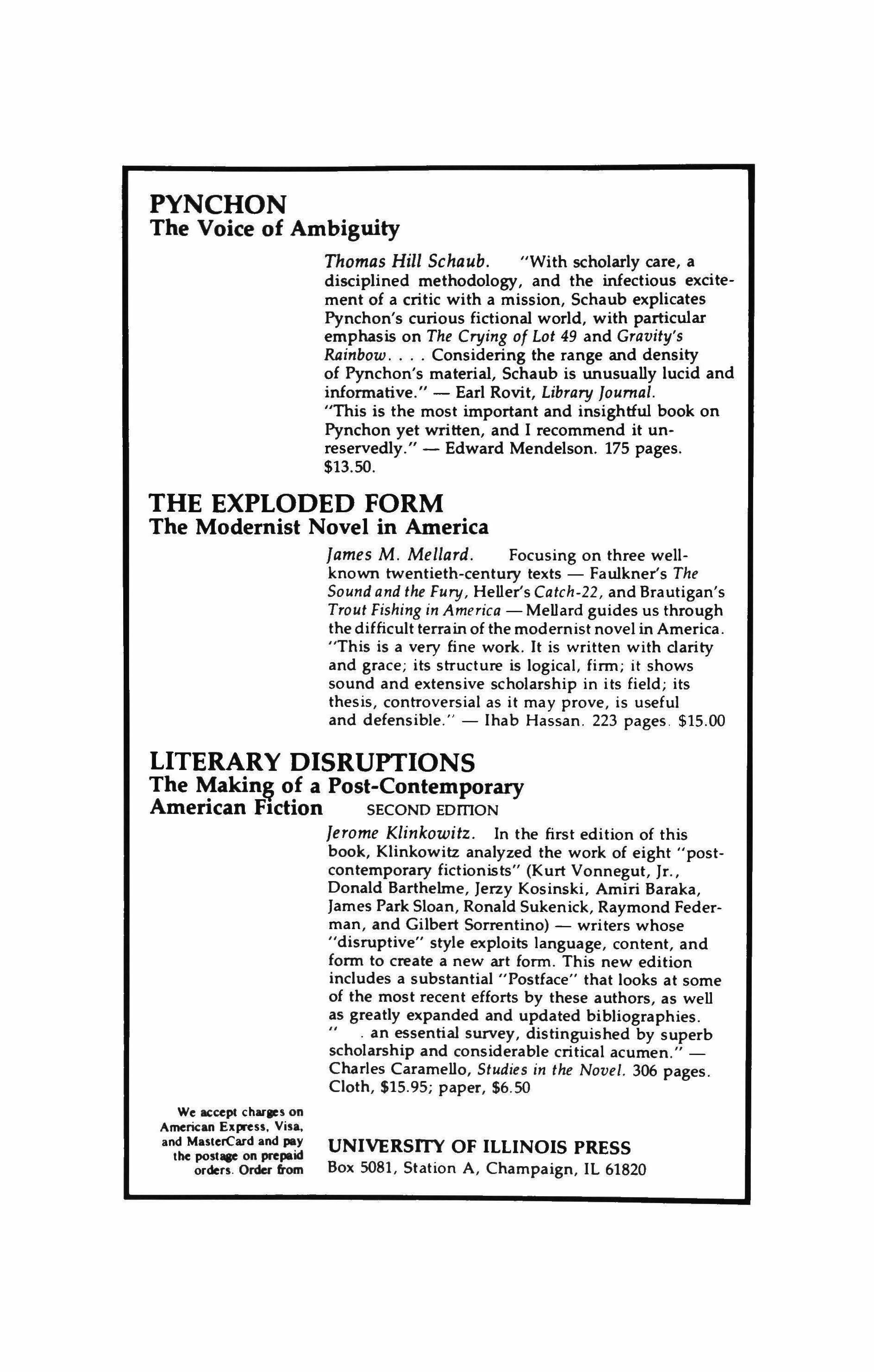
We Keept charte! on American Express, Visa, and MasterCard and pay
UNIVERSITY OF ILLINOIS PRESS the post. on prepaid orders. Order from Box 5081, Station A, Champaign, IL 61820


